

EVANSTON, ILLINOIS
NORTHWESTERN UNIVERSITY ARCHIVES
EDITOR ....••.••••••.•••• Charles Newman
EXECUTIVE EDITOR Elliott Anderson
MANAGING EDITOR .•••••••• Suzanne Kurman
ART DIRECTOR ...••..•••.• Lawrence Levy
ASSOCIATE EDITOR Timothy O'Grady
ASSISTANT EDITORS •..•.•.. Darcie Sanders
Mary Elinore Smith
ADVISORY EDITORS •...••..• Gerald Graff
Peter Michelson

FULFILLMENT
Lillian Kacyn
Angela Novak
Debbie Petranek
TriQuarterIy is an international journal of arts, letters, and opinion published in the fall, winter, and spring at Northwestern University, Evanston, Illinois 60201. Subscription rates: One year $7.00; two years $12.00; three years $17.00. Foreign subscriptions $.75 per year additional. Single copies usually $2.50. Back issue prices on request. Contributions, correspondence, and subscriptions should be addressed to TriQuarterIy, University Hall 101, Northwestern University, Evanston, llIinois 60201. The editors invite submissions, but queries are strongly suggested. No manuscript will be returned unless accompanied by a stamped, self-addressed envelope. All manuscripts accepted for publication become the property of TrlQuarterIy, unless otherwise indicated. Copyright © 1973 by Northwestern University Press. All rights reserved. The views expressed in this magazine are to be attributed to the writers, not the editors or sponsors. Printed in the United States of America. Claims for missing numbers will be honored only within the four-month period after month of issue.
NATIONAL DISTRmUTOR TO RETAIL TRADE: B. DEBOER, 188 HIGH STREET, NUTLEY, NEW JERSEY 07110. DISTRmUTOR FOR GREAT BRITAIN AND EUROPE: B. F. STEVENS,. BROWN, LTD., ARDON HOUSE, MILL LANE, GODALMING, SURREY, ENGLAND. DIsTRmUTOR FOR THE NETHERLANDS: M. VAN GELDERN ZOON, N,Vl, N. Z. VOORBUROWAL 140-142 AMSTERDAM, HOLLAND.
REPRINTS OF BACK ISSUES OF TriQuarterIy ARE NOW AVAILABLE IN FULL FORMAT FROM KRAUS REPRINT COMPANY, ROUTE 100, MILLWOOD, NEW YORK 10546, AND IN MICROFILM FROM UNIVERSITY MICROFILMS, A XEROX COMPANY, ANN ARBOR, MICHIGAN 48106.
CHARLES NEWMAN

STANLEY ELKIN
ALVIN GREENBERG
THOMAS MC GUANE
WARREN FINE
JONATHAN BAUMBACH
A. B. PAULSON
M. G. STEPHENS
HENRY H. ROTH
"HERB" JOHNSON
WALTER ABISH
PATRICK F. CAHILL
JOE MCBRIEN
ROBERT COOVER
JOYCE CAROL OATES
JERRY BUMPUS
RUSSELL EDSON
ALAIN ROBBE-GRILLET
PHILIP I>TEVICK
ROBERT ONOPA
GERALD C,RAFF
ELWOOD H. SMITH
Introduction
The uses and abuses of death: a little rumble through the remnants of literary culture 3
Fiction
The making of Ashenden 42 The discovery of America 104 Ninety-two in the shade 119 Margaret said: 173 The traditional story returns 184 "2" 192
The last poetry reading 193 from Love zap 202
A "Bob" Brown sampler:
morceaux choisis from the novels 215 from Minds meet 232 from Harlequin's numbers 246 New York to Nova Scotia, New Brunswick 256 The public burning of Julius and Ethel Rosenberg: an historical romance 262 Meredith Dawe 282 Beginnings 299
Theater
The children 310
Foreign perspectives
The still abode of David Hamilton 323
Criticism
Scherezade runs out of plots, goes on talking; the king, puzzled, listens: an essay on new fiction 332 The end of art as a spiritual project 363 The myth of the postmodernist breakthrough 383
cover illustration
Text on cover from Walt Whitman's "Respondez"
The uses and abuses of death: a little rumble through the remnants ofliterary culture
CHARLES NEWMAN
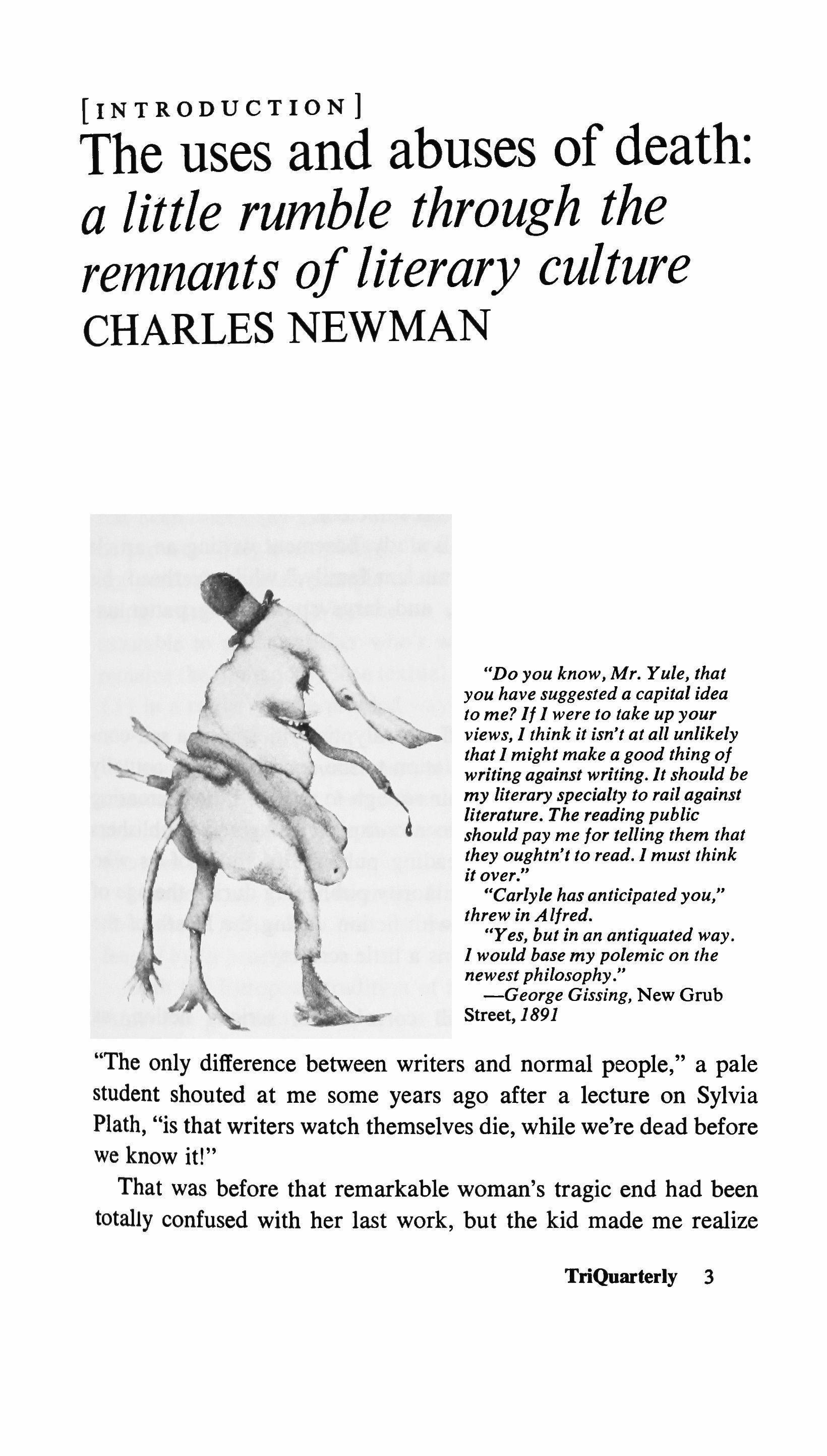
"Do you know, Mr. Yule, that you have suggested a capital idea to me? If I were to take up your views, I think it isn't at all unlikely that I might make a good thing of writing against writing. It should be my literary specialty to rail against literature. The reading public should pay me for telling them that they oughtn't to read. I must think it over."
"Carlyle has anticipated you," threw in Alfred.
"Yes, but in an antiquated way. I would base my polemic on the newest philosophy."
-George Gissing, New Grub Street, 1891
"The only difference between writers and normal people," a pale student shouted at me some years ago after a lecture on Sylvia Plath, "is that writers watch themselves die, while we're dead before we know it!"
That was before that remarkable woman's tragic end had been totally confused with her last work, but the kid made me realize
[INTRODUCTION]
TriQuarterly 3
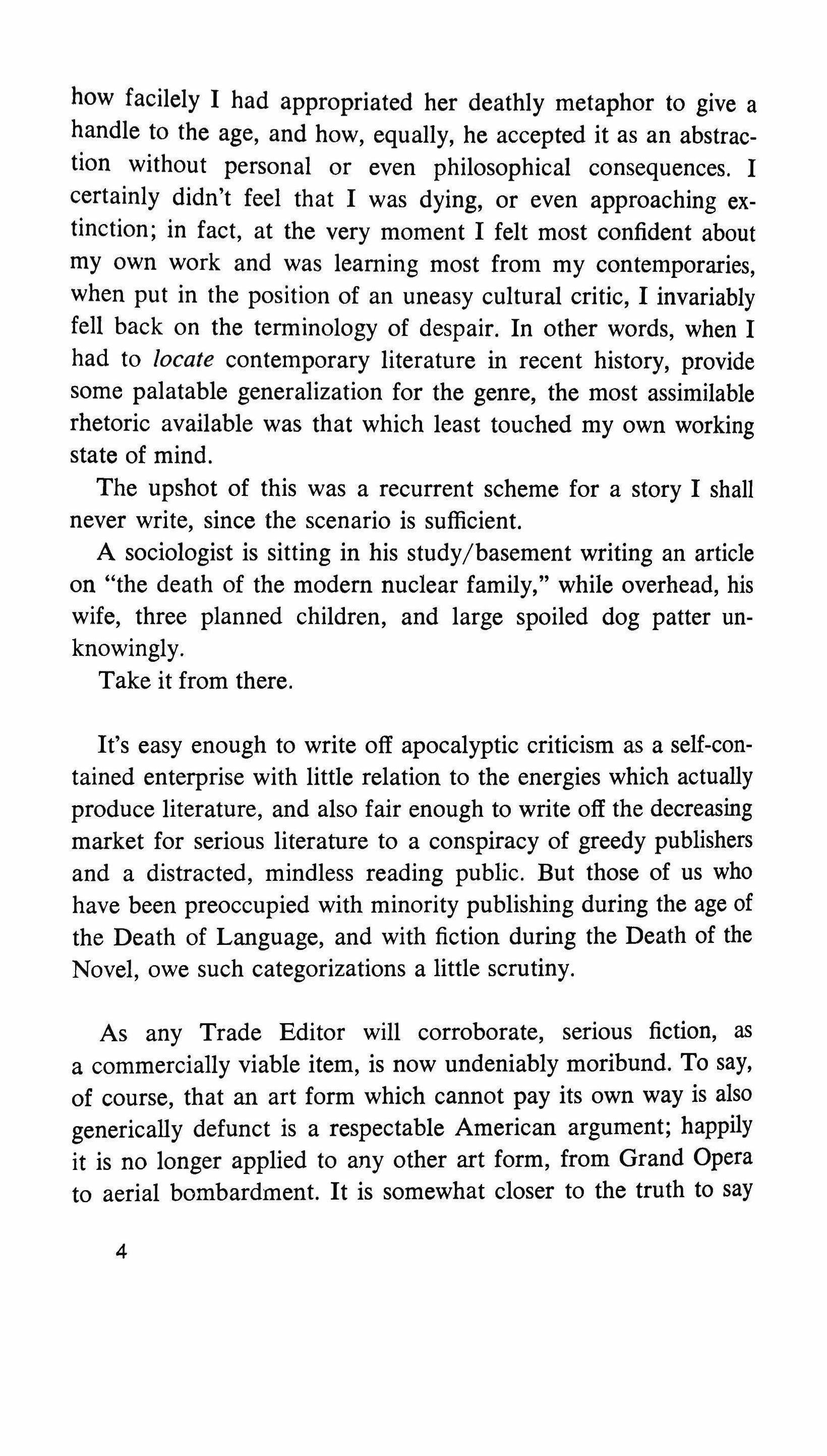
how facilely I had appropriated her deathly metaphor to give a handle to the age, and how, equally, he accepted it as an abstraction without personal or even philosophical consequences. I certainly didn't feel that I was dying, or even approaching extinction; in fact, at the very moment I felt most confident about my own work and was learning most from my contemporaries, when put in the position of an uneasy cultural critic, I invariably fell back on the terminology of despair. In other words, when I had to locate contemporary literature in recent history, provide some palatable generalization for the genre, the most assimilable rhetoric available was that which least touched my own working state of mind.
The upshot of this was a recurrent scheme for a story I shall never write, since the scenario is sufficient.
A sociologist is sitting in his study/basement writing an article on "the death of the modem nuclear family," while overhead, his wife, three planned children, and large spoiled dog patter unknowingly.
Take it from there.
It's easy enough to write off apocalyptic criticism as a self-contained enterprise with little relation to the energies which actually produce literature, and also fair enough to write off the decreasing market for serious literature to a conspiracy of greedy publishers and a distracted, mindless reading public. But those of us who have been preoccupied with minority publishing during the age of the Death of Language, and with fiction during the Death of the Novel, owe such categorizations a little scrutiny.
As any Trade Editor will corroborate, serious fiction, as a commercially viable item, is now undeniably moribund. To say, of course, that an art form which cannot pay its own way is also generically defunct is a respectable American argument; happily it is no longer applied to any other art form, from Grand Opera to aerial bombardment. It is somewhat closer to the truth to say
4
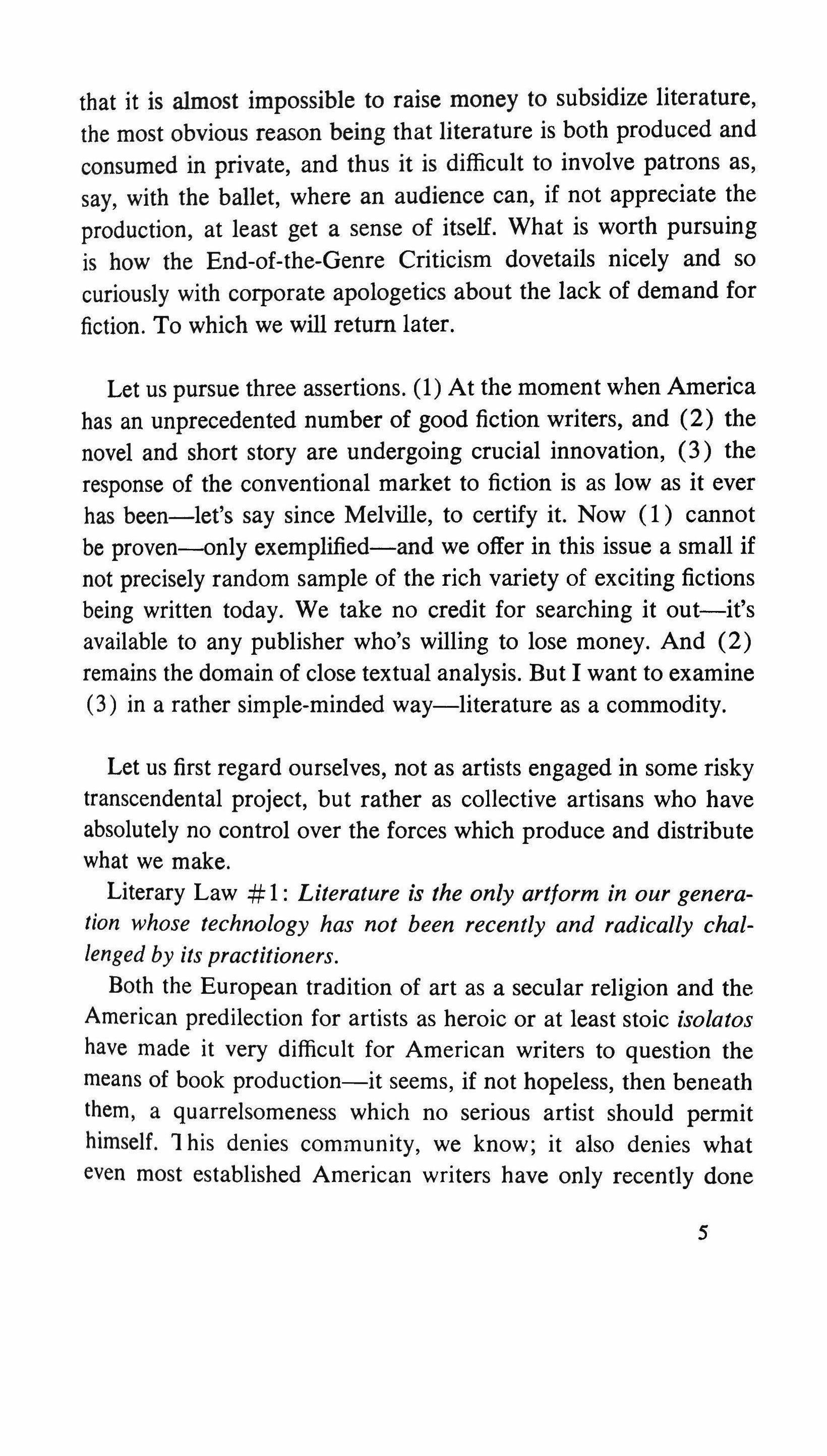
that it is almost impossible to raise money to subsidize literature, the most obvious reason being that literature is both produced and consumed in private, and thus it is difficult to involve patrons as, say, with the ballet, where an audience can, if not appreciate the production, at least get a sense of itself. What is worth pursuing is how the End-of-the-Genre Criticism dovetails nicely and so curiously with corporate apologetics about the lack of demand for fiction. To which we will return later.
Let us pursue three assertions. (1) At the moment when America has an unprecedented number of good fiction writers, and (2) the novel and short story are undergoing crucial innovation, (3) the response of the conventional market to fiction is as low as it ever has been-let's say since Melville, to certify it. Now (1) cannot be proven-only exemplified-and we offer in this issue a small if not precisely random sample of the rich variety of exciting fictions being written today. We take no credit for searching it out-it's available to any publisher who's willing to lose money. And (2) remains the domain of close textual analysis. But I want to examine (3) in a rather simple-minded way-literature as a commodity.
Let us first regard ourselves, not as artists engaged in some risky transcendental project, but rather as collective artisans who have absolutely no control over the forces which produce and distribute what we make.
Literary Law # 1: Literature is the only artjorm in our generation whose technology has not been recently and radically challenged by its practitioners.
Both the European tradition of art as a secular religion and the American predilection for artists as heroic or at least stoic isolatos have made it very difficult for American writers to question the means of book production-it seems, if not hopeless, then beneath them, a quarrelsomeness which no serious artist should permit himself. 1 his denies community, we know; it also denies what even most established American writers have only recently done 5

without: a sense of audience. I think it's fair to say that no serious fiction writer in America today can tell you who he is writing for. That is not death, but it is narcosis. It doesn't affect genius or human will, it can never be used as an excuse for failed experiments, but it does have serious cumulative effect on the development of the genre, as well as the health of a culture. It forces us to rely on either a pride or a cynicism which is not earned.
Over the last decade, our writers have become increasingly characterized by the extent of their brain damage-no accident that Barthelme is the Salinger of the sixties-and fiction writing itself has been described as a kind of timeworn self-indulgence in an increasingly nonverbal society, the last gasp of privatism and individualism in a world which can be saved only by destroying the last links to language, by a collective sensory experience beyond symbol and sign. At any rate, we have rarely viewed our writers as functional craftsmen, and the refusal to accept artists as anything but madmen or eremites is not exactly new. But the fashion to celebrate writers for the damage they do themselves, to see their power as commensurate with the pain they inflict, has reached a new intensity. No accident that the exemplary narrative voice of the decade is paranoia, or that, in a time when the most effective form of private politics is assassination, self-loathing should be the primary mode of our best poets.
Perhaps in the sixties our sense of self was so diminished that fiction-whose traditional domain is the relation of the private self to its public contexts-was preempted by the confessional shriek, a cry so intense and deafening that it hardly required narrative momentum.
It is a little nostalgic to recall that early on in the sixties, we were told what was "out there" was so fascinating that only documentary reportage could be equal to it, and this was cause enough for ignoring the fictional imagination which had somehow not kept pace with reality. But in the end, the decade was chronicled in poetic fragments, in suicide's dreams, not by our essayistes. If fiction could not keep pace with the relevance of the New
6

Journalism, neither, it would seem, could it be adequate for a "counter culture" in which Reality became totally privatized. Its middle distance strategy was not serviceable for either the Think Piece or the Hallucination. And being told one is anachronistic is, after all, better than being told one is untalented or unpopularit absolves everyone of responsibility. One could argue, as I have elsewhere, * that if the novel remains the unequaled medium for fusing the imaginary and analytical faculties, intuition with concrete social analysis, then given what we have recently lived through, fiction will reclaim its share of our attention. It would
certainly seem that the cultural antennae are increasingly to be found in prose, rather than poetry. But such speculations do not confront the argument which proposes an intrinsic devolution of a genre. And my point is, bluntly, that we are determined not by genre, but by a hopelessly anachronistic technology. In other words, the cost of producing and marketing what we make has simply exceeded the industry's profit margin, and this particular disease has been masked long enough by theories of dying forms and metaphors of terminal illness.
It doesn't take a Marxist to understand the effect of conglomerate mergers in trade publishing-it is the American fate of our time and I don't suppose that writers should be exempted from it more than anyone else. Nor am I complaining that the book business is a business; but that as long as we are so absorbed by the deaths of certain traditions, we must understand that businesses, like genres, have their own cycles of expiration. In other words, conglomerates, given their internal capitalization, their high salaries and wage scales, can compete only through constant expansion fueled by continuous breakthroughs in technology. This is not to suggest that corporate ownership automatically reduces the options of a publisher-indeed you could argue with some hopeful logic that working for RCA would allow one to take more
'" "Beyond Omniscience: Notes Toward a Future for the Novel," TriQuarterlv 10, 1967.
7
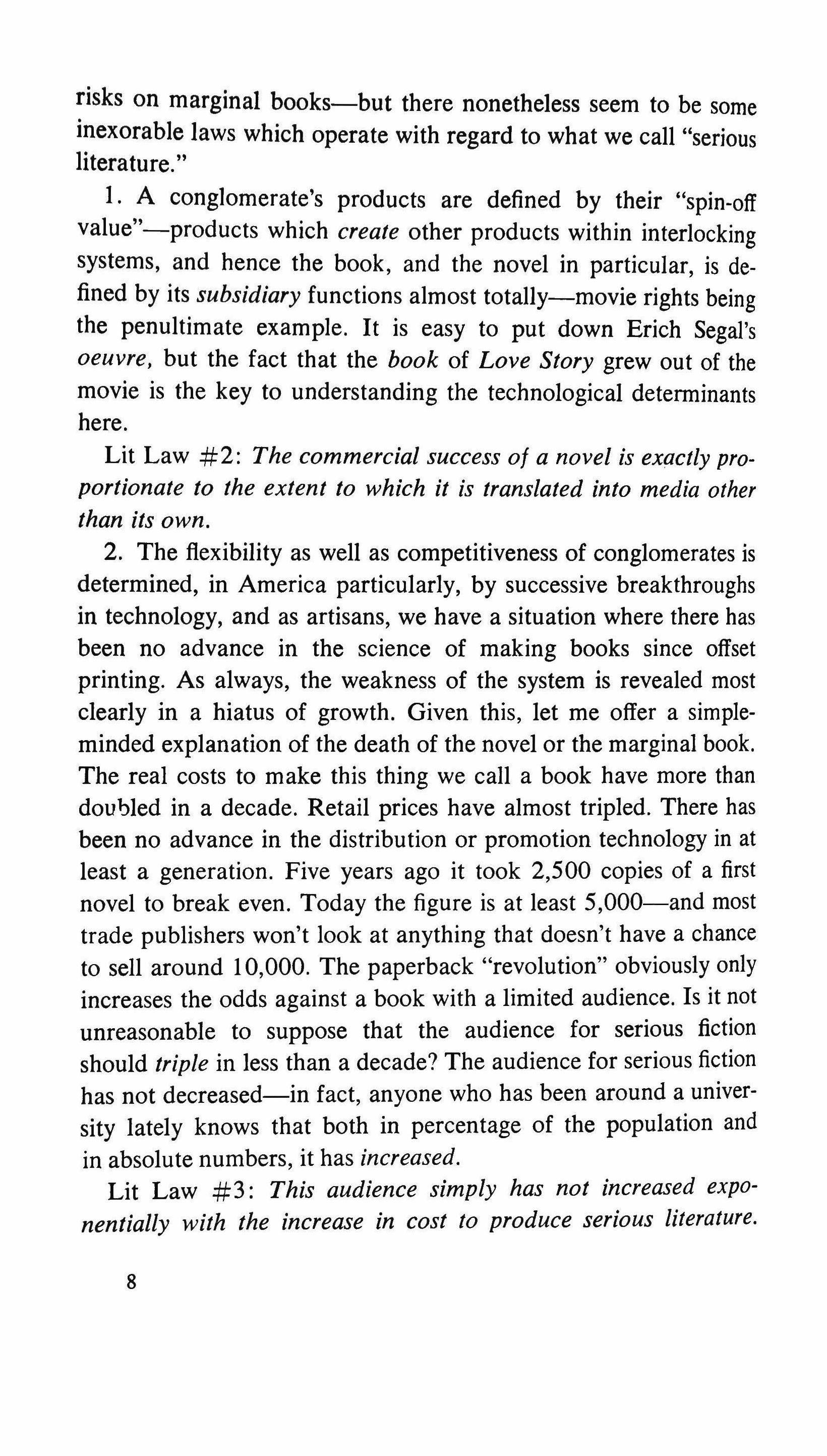
risks on marginal books-but there nonetheless seem to be some inexorable laws which operate with regard to what we call "serious literature.
1. A conglomerate's products are defined by their "spin-off value"-products which create other products within interlocking systems, and hence the book, and the novel in particular, is defined by its subsidiary functions almost totally-movie rights being the penultimate example. It is easy to put down Erich Segal's oeuvre, but the fact that the book of Love Story grew out of the movie is the key to understanding the technological determinants here.
Lit Law #2: The commercial success of a novel is exactly proportionate to the extent to which it is translated into media other than its own.
2. The flexibility as well as competitiveness of conglomerates is determined, in America particularly, by successive breakthroughs in technology, and as artisans, we have a situation where there has been no advance in the science of making books since offset printing. As always, the weakness of the system is revealed most clearly in a hiatus of growth. Given this, let me offer a simpleminded explanation of the death of the novel or the marginal book. The real costs to make this thing we call a book have more than doubled in a decade. Retail prices have almost tripled. There has been no advance in the distribution or promotion technology in at least a generation. Five years ago it took 2,500 copies of a first novel to break even. Today the figure is at least 5,000-and most trade publishers won't look at anything that doesn't have a chance to sell around 10,000. The paperback "revolution" obviously only increases the odds against a book with a limited audience. Is it not unreasonable to suppose that the audience for serious fiction should triple in less than a decade? The audience for serious fiction has not decreased-in fact, anyone who has been around a university lately knows that both in percentage of the population and in absolute numbers, it has increased.
Lit Law #3: This audience simply has not increased exponentially with the increase in cost to produce serious literature.
8
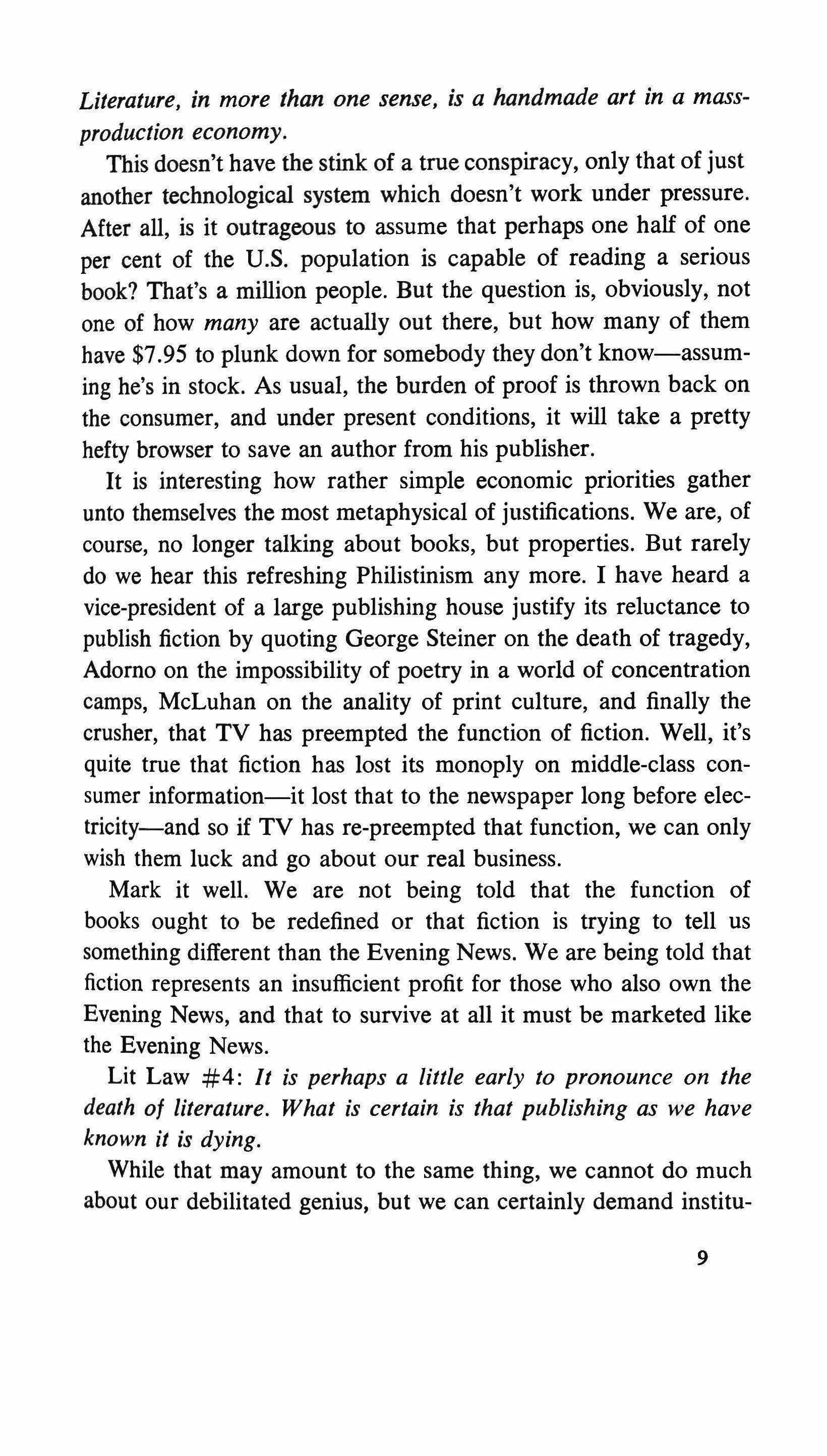
Literature, in more than one sense, is a handmade art in a massproduction economy.
This doesn't have the stink of a true conspiracy, only that of just another technological system which doesn't work under pressure. After all, is it outrageous to assume that perhaps one half of one per cent of the U.S. population is capable of reading a serious book? That's a million people. But the question is, obviously, not one of how many are actually out there, but how many of them have $7.95 to plunk down for somebody they don't know-assuming he's in stock. As usual, the burden of proof is thrown back on the consumer, and under present conditions, it will take a pretty hefty browser to save an author from his publisher.
It is interesting how rather simple economic priorities gather unto themselves the most metaphysical of justifications. We are, of course, no longer talking about books, but properties. But rarely do we hear this refreshing Philistinism any more. I have heard a vice-president of a large publishing house justify its reluctance to publish fiction by quoting George Steiner on the death of tragedy, Adorno on the impossibility of poetry in a world of concentration camps, McLuhan on the anality of print culture, and finally the crusher, that TV has preempted the function of fiction. Well, it's quite true that fiction has lost its monoply on middle-class consumer information-it lost that to the newspaper long before electricity-and so if TV has re-preempted that function, we can only wish them luck and go about our real business.
Mark it well. We are not being told that the function of books ought to be redefined or that fiction is trying to tell us something different than the Evening News. We are being told that fiction represents an insufficient profit for those who also own the Evening News, and that to survive at all it must be marketed like the Evening News.
Lit Law #4: It is perhaps a little early to pronounce on the death of literature. What is certain is that publishing as we have known it is dying.
While that may amount to the same thing, we cannot do much about our debilitated genius, but we can certainly demand institu9
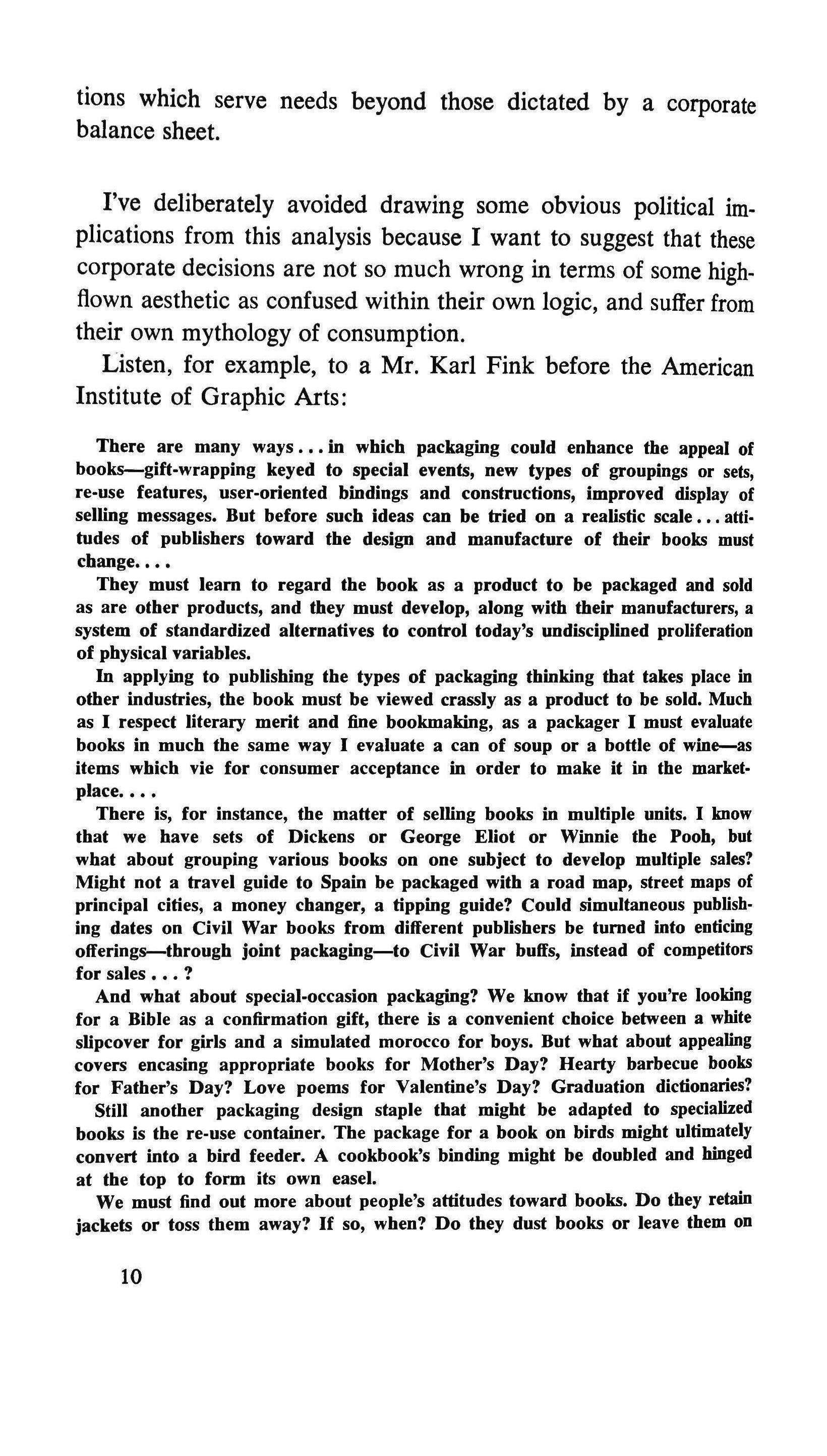
tions which serve needs beyond those dictated by a corporate balance sheet.
I've deliberately avoided drawing some obvious political implications from this analysis because I want to suggest that these corporate decisions are not so much wrong in terms of some highflown aesthetic as confused within their own logic, and suffer from their own mythology of consumption.
Listen, for example, to a Mr. Karl Fink before the American Institute of Graphic Arts:
There are many ways in which packaging could enhance the appeal of books-gift-wrapping keyed to special events, new types of groupings or sets, re-use features, user-oriented bindings and constructions, improved display of selling messages. But before such ideas can be tried on a realistic scale attitudes of publishers toward the design and manufacture of their books must change
They must learn to regard the book as a product to be packaged and sold as are other products, and they must develop, along with their manufacturers, a system of standardized alternatives to control today's undisciplined proliferation of physical variables.
In applying to publishing the types of packaging thinking that takes place in other industries, the book must be viewed crassly as a product to be sold. Much as I respect literary merit and fine bookmaking, as a packager I must evaluate books in much the same way I evaluate a can of soup or a bottle of wine--as items which vie for consumer acceptance in order to make it in the marketplace
There is, for instance, the matter of selling books in multiple units. I know that we have sets of Dickens or George Eliot or Winnie the Pooh, but what about grouping various books on one subject to develop multiple sales? Might not a travel guide to Spain be packaged with a road map, street maps of principal cities, a money changer, a tipping guide? Could simultaneous publishing dates on Civil War books from different publishers be turned into enticing offerings--through joint packaging-to Civil War buffs, instead of competitors for sales ?
And what about special-occasion packaging? We know that if you're looking for a Bible as a confirmation gift, there is a convenient choice between a white slipcover for girls and a simulated morocco for boys. But what about appealing covers encasing appropriate books for Mother's Day? Hearty barbecue books for Father's Day? Love poems for Valentine's Day? Graduation dictionaries?
Still another packaging design staple that might be adapted to specialized books is the re-use container. The package for a book on birds might ultimately convert into a bird feeder. A cookbook's binding might be doubled and hinged at the top to form its own easel.
We must find out more about people's attitudes toward books. Do they retain jackets or toss them away? If so, when? Do they dust books or leave them on
10
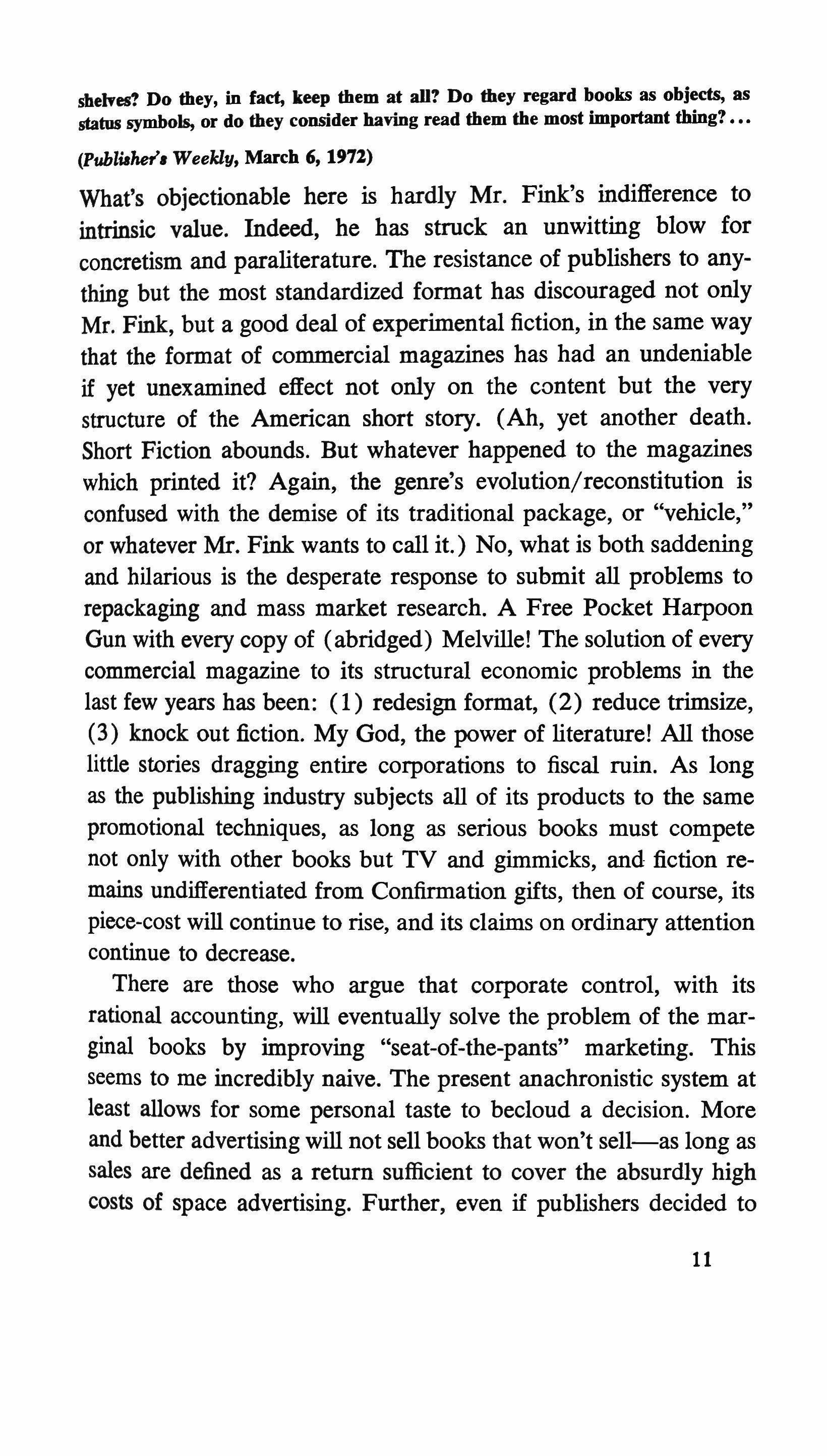
she es? Do they, in fact, keep them at all? Do they regard books as objects, as status symbols, or do they consider having read them the most important thing?
(PublilheJl, Weekly, March 6, 1972)
What's objectionable here is hardly Mr. Fink's indifference to intrinsic value. Indeed, he has struck an unwitting blow for concretism and paraliterature. The resistance of publishers to anything but the most standardized format has discouraged not only Mr. Fink, but a good deal of experimental fiction, in the same way that the format of commercial magazines has had an undeniable if yet unexamined effect not only on the content but the very structure of the American short story. (Ah, yet another death. Short Fiction abounds. But whatever happened to the magazines which printed it? Again, the genre's evolution/reconstitution is confused with the demise of its traditional package, or "vehicle," or whatever Mr. Fink wants to call it.) No, what is both saddening and hilarious is the desperate response to submit all problems to repackaging and mass market research. A Free Pocket Harpoon Gun with every copy of (abridged) Melville! The solution of every commercial magazine to its structural economic problems in the last few years has been: (1) redesign format, (2) reduce trimsize, (3) knock out fiction. My God, the power of literature! All those little stories dragging entire corporations to fiscal ruin. As long as the publishing industry subjects all of its products to the same promotional techniques, as long as serious books must compete not only with other books but TV and gimmicks, and fiction remains undifferentiated from Confirmation gifts, then of course, its piece-cost will continue to rise, and its claims on ordinary attention continue to decrease.
There are those who argue that corporate control, with its rational accounting, will eventually solve the problem of the marginal books by improving "seat-of-the-pants" marketing. This seems to me incredibly naive. The present anachronistic system at least allows for some personal taste to becloud a decision. More and better advertising will not sell books that won't sell-as long as sales are defined as a return sufficient to cover the absurdly high costs of space advertising. Further, even if publishers decided to
11
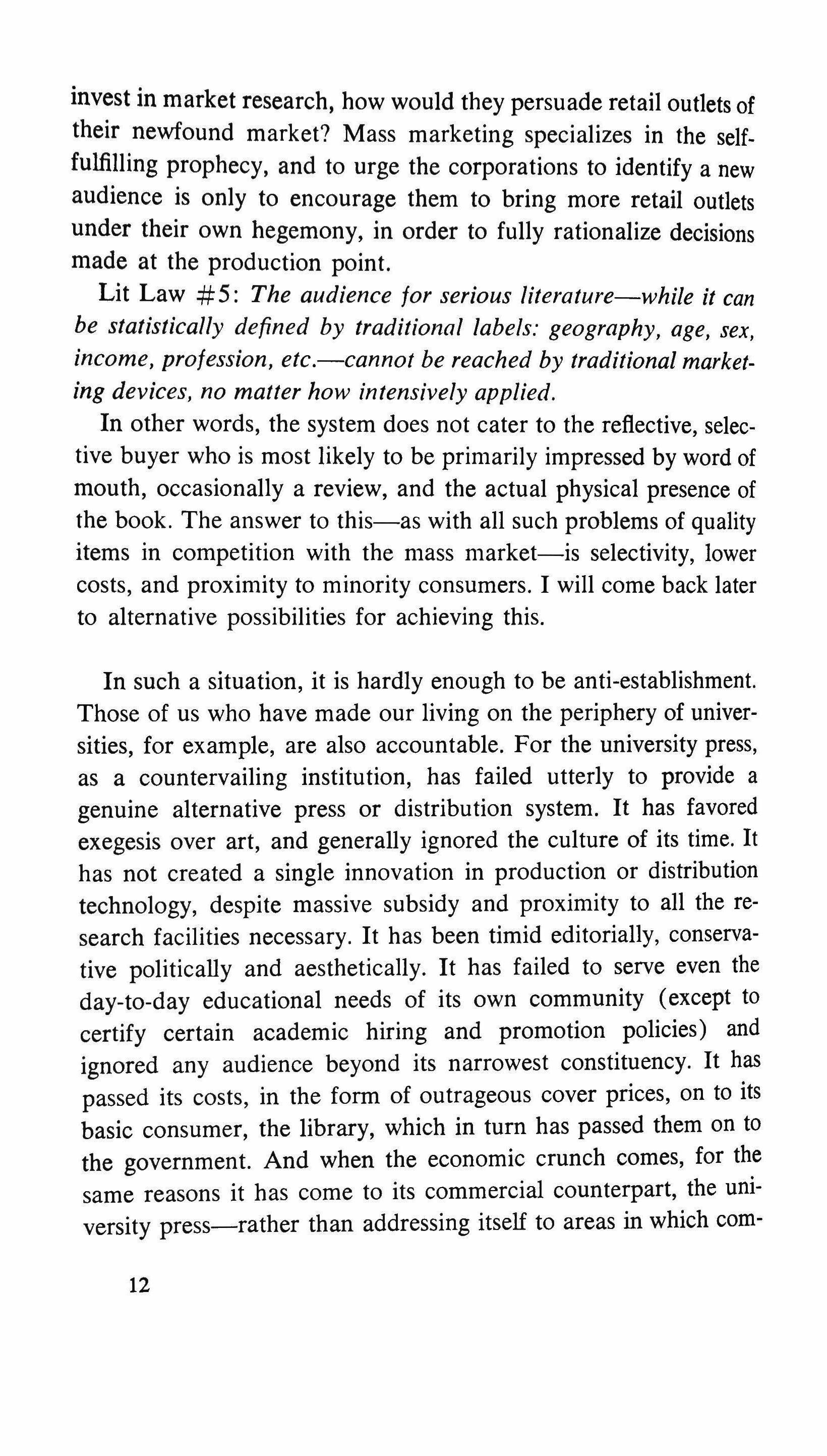
invest in market research, how would they persuade retail outlets of their newfound market? Mass marketing specializes in the selffulfilling prophecy, and to urge the corporations to identify a new audience is only to encourage them to bring more retail outlets under their own hegemony, in order to fully rationalize decisions made at the production point.
Lit Law #5: The audience for serious literature-while it can be statistically defined by traditional labels: geography, age, sex, income, profession, etc.-cannot be reached by traditional marketing devices, no matter how intensively applied.
In other words, the system does not cater to the reflective, selective buyer who is most likely to be primarily impressed by word of mouth, occasionally a review, and the actual physical presence of the book. The answer to this-as with all such problems of quality items in competition with the mass market-is selectivity, lower costs, and proximity to minority consumers. I will come back later to alternative possibilities for achieving this.
In such a situation, it is hardly enough to be anti-establishment. Those of us who have made our living on the periphery of universities, for example, are also accountable. For the university press, as a countervailing institution, has failed utterly to provide a genuine alternative press or distribution system. It has favored exegesis over art, and generally ignored the culture of its time. It has not created a single innovation in production or distribution technology, despite massive subsidy and proximity to all the research facilities necessary. It has been timid editorially, conservative politically and aesthetically. It has failed to serve even the day-to-day educational needs of its own community (except to certify certain academic hiring and promotion policies) and ignored any audience beyond its narrowest constituency. It has passed its costs, in the form of outrageous cover prices, on to its basic consumer, the library, which in turn has passed them on to the government. And when the economic crunch comes, for the same reasons it has come to its commercial counterpart, the university press-rather than addressing itself to areas in which com-
12

mercial publishers default, rather than acting like a subsidized countervailing institution-it too defines literature as marginal, and the first things to go are the poetry series, the literary reviews, the search for the unexpected imagination, all these "luxuries" whose constituency is never represented on policy-making boards. A strange situation-information which should be in retrieval systems, information which is of use only to a handful of specialists, is produced in twelve-dollar limited editions; while literature which not only has a wider minority audience, and whose only possible medium is the book, is ignored. The university press is as venally bound to a guaranteed library sale of specialist nonfiction as is a commercial publisher to the guaranteed sale on Greyhound bus station racks, and with the same result-the forfeiture of cultivating an audience.
The first university press which puts its dissertations and statistical abstracts on microfilm, rethinks what ought to be printed, and devotes itself to literature and the art of its time and place will make an indelible mark on this century, and perhaps even regain the respect for continuity and independent judgment which the university has forfeited.
There are, of course, a few exceptions in both academic and commercial publishing, and we have been fortunate enough to gain their .support. But our position as a kind of broker between the solitary writer and the institutions which alone can give him the audience he deserves, has forced home the less than perfect relationship between them. It's not much fun to be simply an exception which proves the rule. And while we have certainly been lucky to survive as long as we have, we have seen too much talent come our way in the last few years to believe, as we once did, that it will find its own level. It is harder to break in now than it ever was, and even established talents have minimal claims on their potential audience. We frankly think it's pathetic that an extract of a novel in small-fry TriQuarterly may well reach more active readers than the eventual casebound edition from a commercial publisher. Our purpose is not merely to indict, but to try
13

to see these as problems whose solutions are explicitly political and technological, and not caused by some vague, incurable cultural malaise.
II. Let's be clear on what we're complaining about. Any assessment of the present literary situation must begin with the redefinition of "censorship" and "relevance," those sub-indexes of free speech and intellectual freedom. It's quite clear, for example, that a commercial publisher can absorb such criticism by pointing out its youth list, its woman's list, its black list. Indeed, when social issues are most polarized, it is perhaps easiest for the establishment to compartmentalize its market and to diffuse criticism with an illusion of contemporaneity. But the alacrity to cash in the literary chips on issues pre-glamorized by the media in no sense represents a more venturesome commitment to serious analysis or to the issues-as Youth and Black culture are already finding out, as the returns start coming in. Nor does this, of course, have anything to do at all with either social relevance or literary innovation, which have only the most tenuous relationship, and that established by hindsight.
Further, literary freedom has become equated almost solely with the license to use explicit language to describe sexuality. And in this case, the increase in pornography is seen as the last breakthrough in the fight for freedom of expression. Again, to ignore the question of intrinsic merit, it should be understood that the freedom to say or read "fuck" is directed more at the engorgement of the volume market than the satisfaction of either erotic desire or the elimination of constraint. Alas, explicit politics or explicit sex has little to do with releasing the energies of serious literature. And such increased tolerance is no avant garde, only a middleclass acceptance of colloquial speech once limited to rare book and locker rooms.
In such a context, freedom of expression has come to mean little more than saying in public what was once formerly said or read in private, without unpleasant consequences. Most Americans under-
14
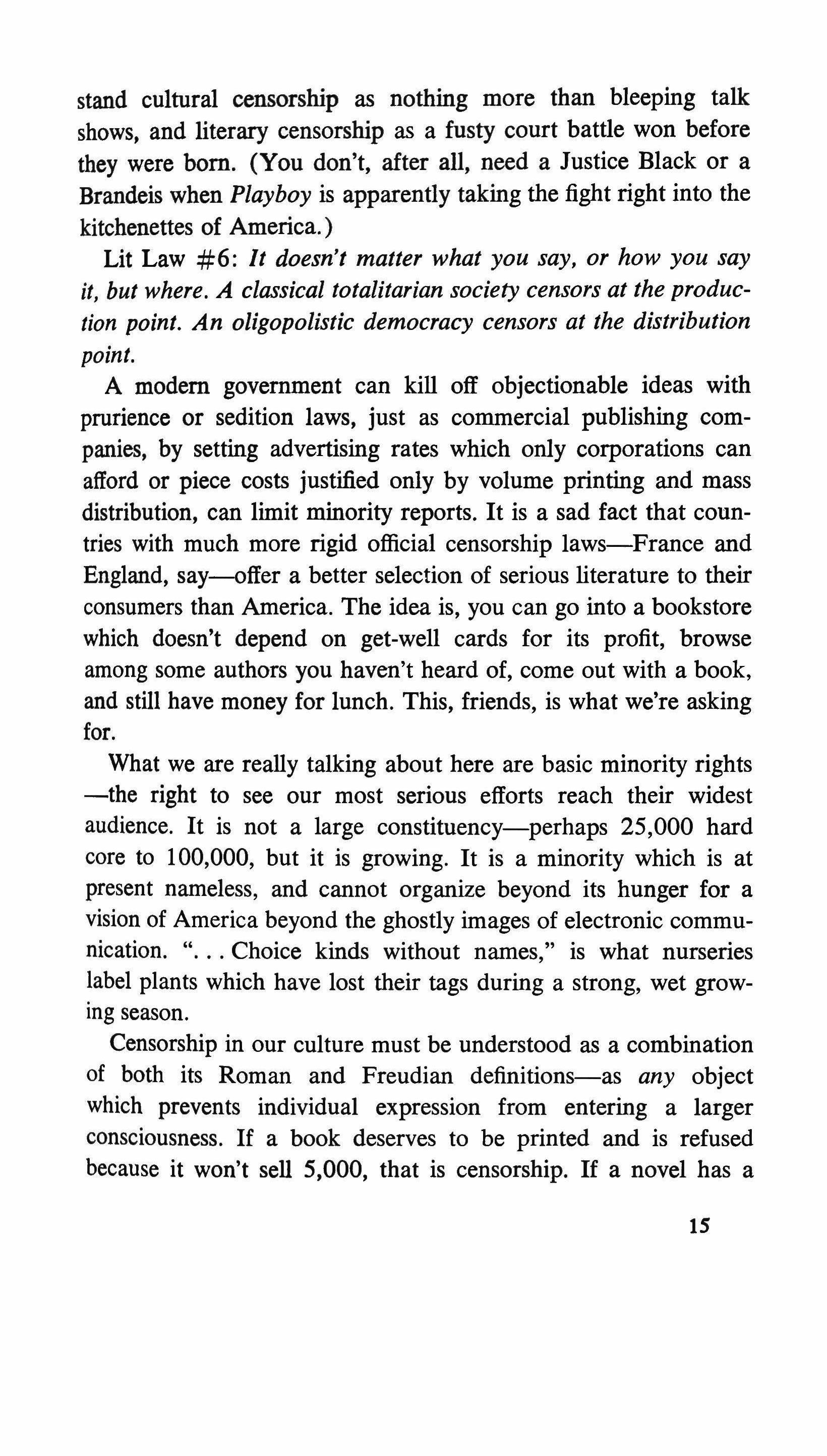
stand cultural censorship as nothing more than bleeping talk shows, and literary censorship as a fusty court battle won before they were born. (You don't, after all, need a Justice Black or a Brandeis when Playboy is apparently taking the fight right into the kitchenettes of America.)
Lit Law #6: It doesn't matter what you say, or how you say it, but where. A classical totalitarian society censors at the production point. An oligopolistic democracy censors at the distribution point.
A modem government can kill off objectionable ideas with prurience or sedition laws, just as commercial publishing companies, by setting advertising rates which only corporations can afford or piece costs justified only by volume printing and mass distribution, can limit minority reports. It is a sad fact that countries with much more rigid official censorship laws-France and England, say-offer a better selection of serious literature to their consumers than America. The idea is, you can go into a bookstore which doesn't depend on get-well cards for its profit, browse among some authors you haven't heard of, come out with a book, and still have money for lunch. This, friends, is what we're asking for.
What we are really talking about here are basic minority rights -the right to see our most serious efforts reach their widest audience. It is not a large constituency-perhaps 25,000 hard core to 100,000, but it is growing. It is a minority which is at present nameless, and cannot organize beyond its hunger for a vision of America beyond the ghostly images of electronic communication. Choice kinds without names," is what nurseries label plants which have lost their tags during a strong, wet growing season.
Censorship in our culture must be understood as a combination of both its Roman and Freudian definitions-as any object which prevents individual expression from entering a larger consciousness. If a book deserves to be printed and is refused because it won't sell 5,000, that is censorship. If a novel has a
15

potential audience of 20,000 and receives a quarter of that because it is not reviewed, promoted, or in stock, that is censorship. It hardly matters whether this is due to ideological opposition, official ignorance, a conspiracy of indifference, or the exigencies of a free market, it has the same effect-the denial of a rightful audience and the loss of community. If we were told, for example, that an anti-establishment novel in Poland was printed in a small edition, went unpromoted and unreviewed, and then was rapidly allowed to go out of print, we would know the reasons why. Here, it happens every day and we are not scandalized. There is no fundamental difference between initially restricting information and making utterly unreasonable demands on the consumer. In fact, where censorship has a more bureaucratic structure, in Central Europe for example, a controversial play may be allowed to be printed but not performed, a similar novel permitted to be read aloud at a club, but not printed and circulated. There, censorship works by denying the medium best suited to the form, and by delimiting the potential audience. It has a familiar ring.
There are several reasons why we have not been able to develop a significant theory of how (and why) America restricts literary as well as larger political options. The first is, of course, that we have relied on the European model of repression rather than really investigating the American tactic of absorption-the supermarket censors in its own way just as much as the ministry of culture. But even more importantly, the escalation of rhetoricall sides accusing each other of being "dead"-has so banalized polemic that it is a rarity not only to see a limited and telling attack upon the establishment, but even to recognize a true expression of agony. The "Grateful Dead" indeed. (As G. Graff says, it used to be that one tried to prove one's enemies wrong. But now that right and wrong are "meaningless" categories, it is better to identify the opposition as "dead." The Death Argument saves a lot of trouble because reasons are irrelevant; it is basically unanswerable, and it implies that the prosecutors are "the lively ones.")
To illustrate, look at this press release which recently came into the office-its heading:
16
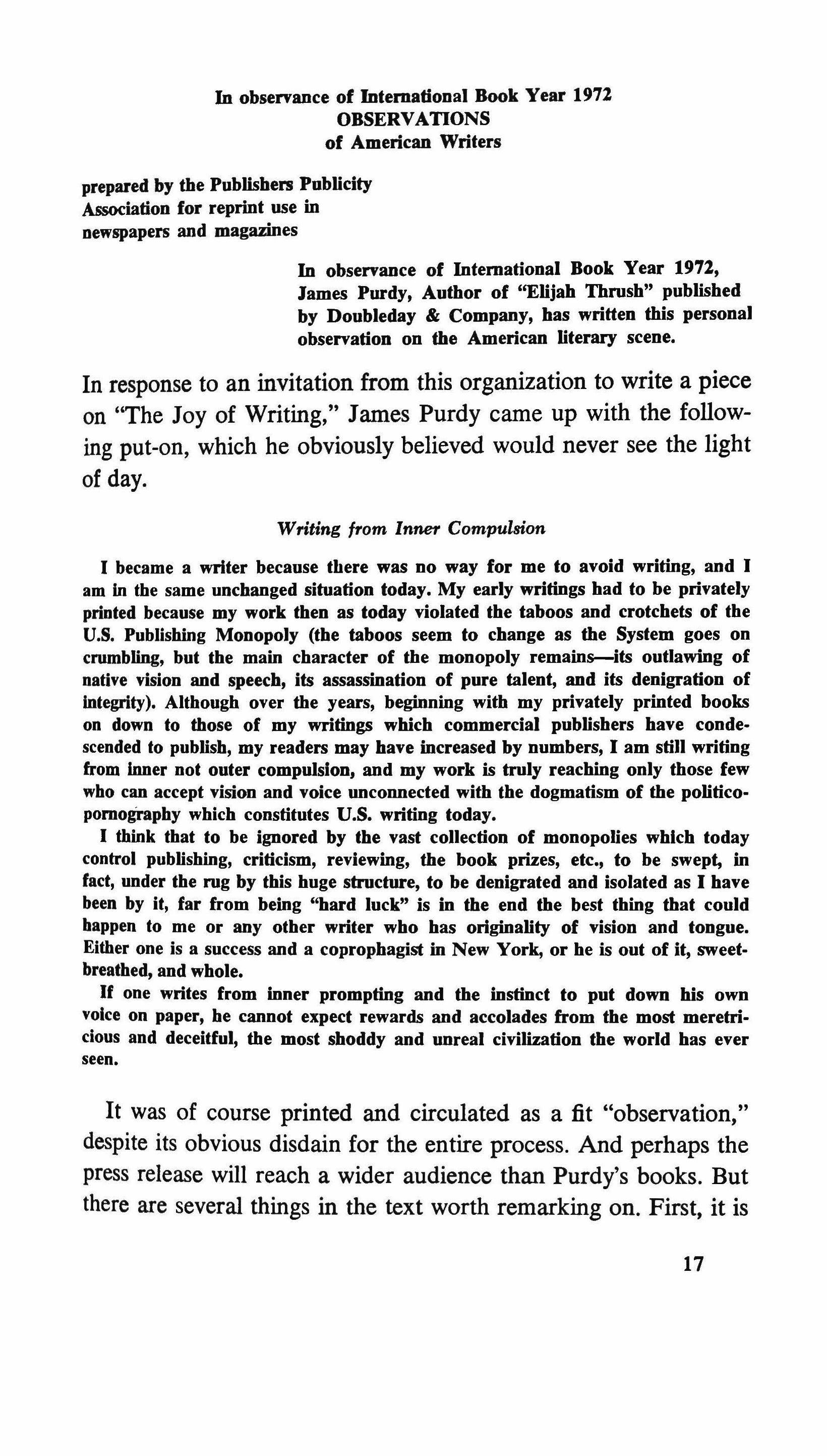
In observance of International Book Year 1972 OBSERVATIONS of American Writers
prepared by the Publishers Publicity Association for reprint use in newspapers and magazines
In observance of International Book Year 1972, James Purdy, Author of ''Elijah Thrush" published by Doubleday & Company, has written this personal observation on the American literary scene.
In response to an invitation from this organization to write a piece on "The Joy of Writing," James Purdy came up with the following put-on, which he obviously believed would never see the light of day.
Writing from InRe1' Compulsion
I became a writer because there was no way for me to avoid writing, and I am in the same unchanged situation today. My early writings had to be privately printed because my work then as today violated the taboos and crotchets of the U.S. Publishing Monopoly (the taboos seem to change as the System goes on crumbling, but the main character of the monopoly remains-its outlawing of native vision and speech, its assassination of pure talent, and its denigration of integrity). Although over the years, beginning with my privately printed books on down to those of my writings which commercial publishers have condescended to publish, my readers may have increased by numbers, I am still writing from inner not outer compulsion, and my work is truly reaching only those few who can accept vision and voice unconnected with the dogmatism of the politicopomog'raphy which constitutes U.S. writing today.
I think that to be ignored by the vast collection of monopolies which today control publishing, criticism, reviewing, the book prizes, etc., to be swept, in fact, under the rug by this huge structure, to be denigrated and isolated as I have been by it, far from being "hard luck" is in the end the best thing that could happen to me or any other writer who has originality of vision and tongue. Either one is a success and a coprophagist in New York, or he is out of it, sweetbreathed, and whole.
If one writes from inner prompting and the instinct to put down his own voice on paper, he cannot expect rewards and accolades from the most meretricious and deceitful, the most shoddy and unreal civilization the world has ever seen.
It was of course printed and circulated as a fit "observation," despite its obvious disdain for the entire process. And perhaps the press release will reach a wider audience than Purdy's books. But there are several things in the text worth remarking on. First, it is
17
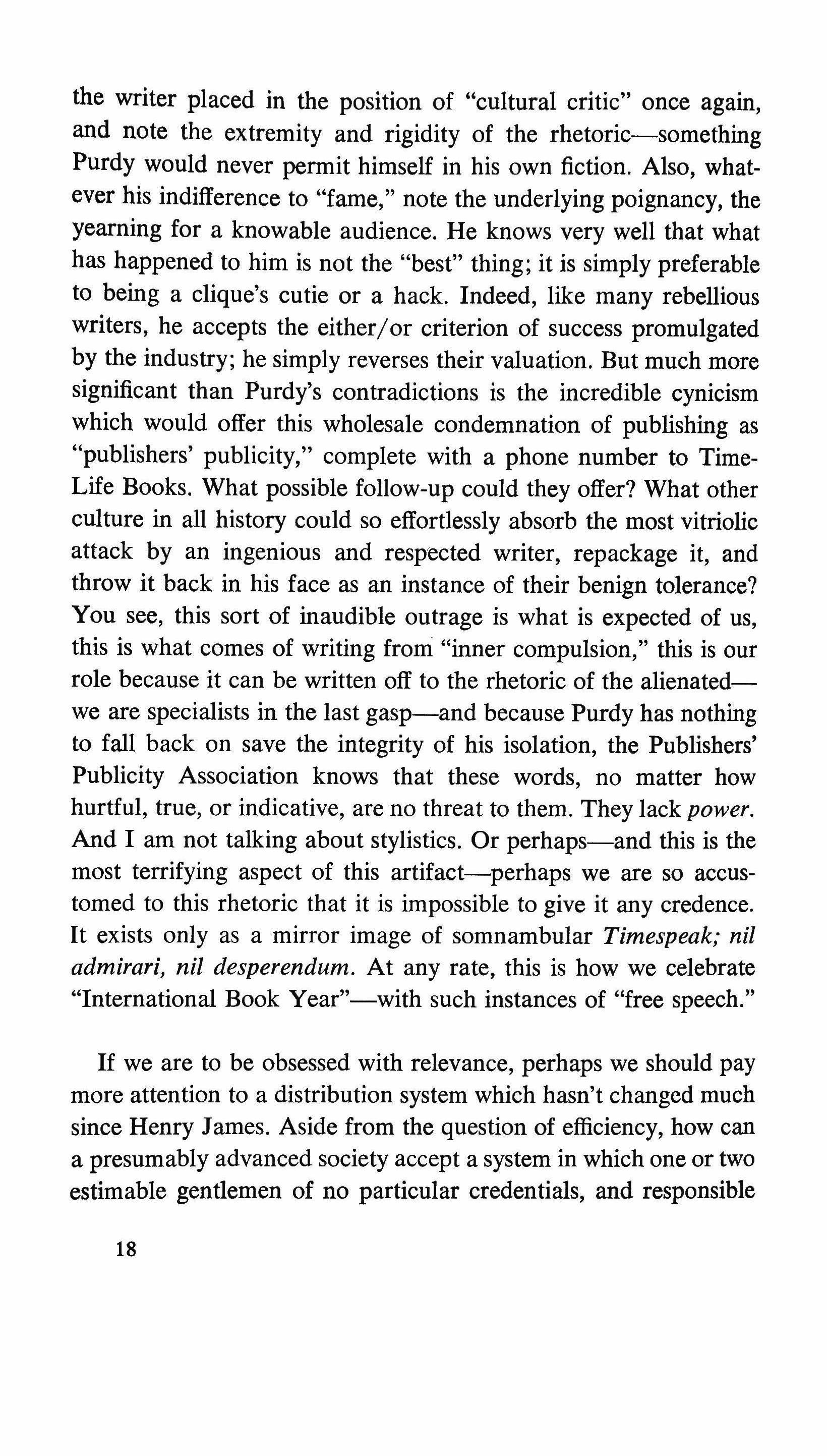
the writer placed in the position of "cultural critic" once again, and note the extremity and rigidity of the rhetoric-something Purdy would never permit himself in his own fiction. Also, whatever his indifference to "fame," note the underlying poignancy, the yearning for a knowable audience. He knows very well that what has happened to him is not the "best" thing; it is simply preferable to being a clique's cutie or a hack. Indeed, like many rebellious writers, he accepts the either/or criterion of success promulgated by the industry; he simply reverses their valuation. But much more significant than Purdy's contradictions is the incredible cynicism which would offer this wholesale condemnation of publishing as "publishers' publicity," complete with a phone number to TimeLife Books. What possible follow-up could they offer? What other culture in all history could so effortlessly absorb the most vitriolic attack by an ingenious and respected writer, repackage it, and throw it back in his face as an instance of their benign tolerance? You see, this sort of inaudible outrage is what is expected of us, this is what comes of writing froni "inner compulsion," this is our role because it can be written off to the rhetoric of the alienatedwe are specialists in the last gasp-and because Purdy has nothing to fall back on save the integrity of his isolation, the Publishers' Publicity Association knows that these words, no matter how hurtful, true, or indicative, are no threat to them. They lack power. And I am not talking about stylistics. Or perhaps-and this is the most terrifying aspect of this artifact-perhaps we are so accustomed to this rhetoric that it is impossible to give it any credence. It exists only as a mirror image of somnambular Timespeak; nil admirari, nil desperendum. At any rate, this is how we celebrate "International Book Year"-with such instances of "free speech."
If we are to be obsessed with relevance, perhaps we should pay more attention to a distribution system which hasn't changed much since Henry James. Aside from the question of efficiency, how can a presumably advanced society accept a system in which one or two estimable gentlemen of no particular credentials, and responsible
18
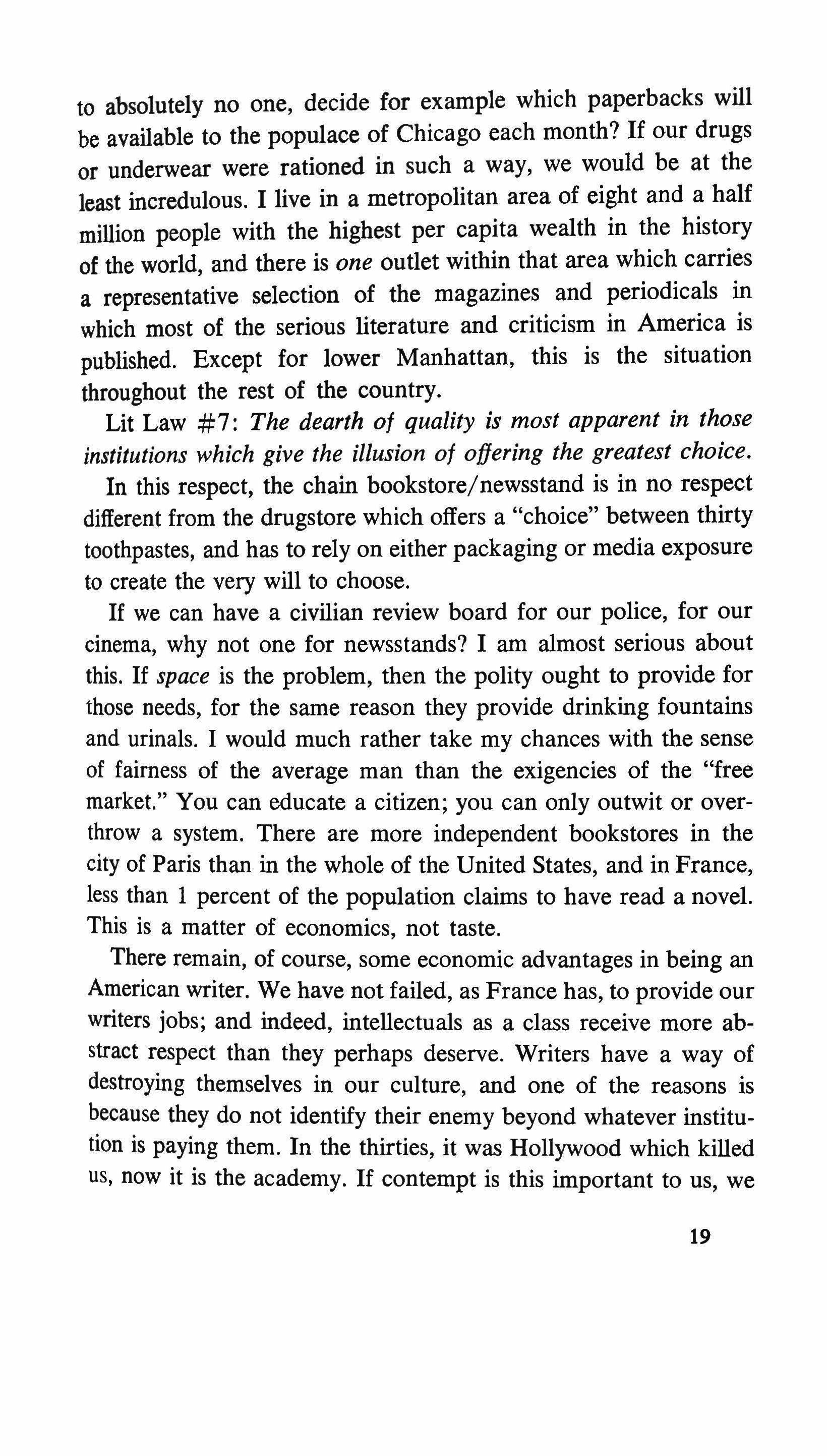
to absolutely no one, decide for example which paperbacks will be available to the populace of Chicago each month? If our drugs or underwear were rationed in such a way, we would be at the least incredulous. I live in a metropolitan area of eight and a half million people with the highest per capita wealth in the history of the world, and there is one outlet within that area which carries a representative selection of the magazines and periodicals in which most of the serious literature and criticism in America is published. Except for lower Manhattan, this is the situation throughout the rest of the country.
Lit Law #7: The dearth of quality is most apparent in those institutions which give the illusion of offering the greatest choice.
In this respect, the chain bookstore/newsstand is in no respect different from the drugstore which offers a "choice" between thirty toothpastes, and has to rely on either packaging or media exposure to create the very will to choose.
If we can have a civilian review board for our police, for our cinema, why not one for newsstands? I am almost serious about this. If space is the problem, then the polity ought to provide for those needs, for the same reason they provide drinking fountains and urinals. I would much rather take my chances with the sense of fairness of the average man than the exigencies of the "free market." You can educate a citizen; you can only outwit or overthrow a system. There are more independent bookstores in the city of Paris than in the whole of the United States, and in France, less than 1 percent of the population claims to have read a novel. This is a matter of economics, not taste.
There remain, of course, some economic advantages in being an American writer. We have not failed, as France has, to provide our writers jobs; and indeed, intellectuals as a class receive more abstract respect than they perhaps deserve. Writers have a way of destroying themselves in our culture, and one of the reasons is because they do not identify their enemy beyond whatever institution is paying them. In the thirties, it was Hollywood which killed us, now it is the academy. If contempt is this important to us, we
19

ought to make heavier use of it. The anti-intellectualism of the fifties is largely over, though it resurfaces periodically on the mystical left as it once did on the Philistine right. In many respects, the teaching of literature, and the health and honesty of high journalism, the opportunities for free-lancing, have never been better. The prose and editorial acuity of a Sports Illustrated, say, is of higher quality than in most literary magazines.
We have failed in what we presumably do best-to make our technology responsive to a pluralistic society, to pragmatically facilitate communication, to offer alternatives to a diverse public which we must respect as basically curious if easily distracted. The literary act is the most intense and private and individual transaction of a species which is defined, for better or worse, by language. And in our time, such an act becomes exemplary beyond its purely aesthetic function.
The most powerful idea to come out of the 20th century American experiment was the transfer of an Enlightenment view of political life to culture itself. For if our politics have been basically conservative, it is in the operation of our cultural and artistic life that our more radical ideals have had their greatest expression. Against the European notion of culture as standards enforced by an elite, we have come to see culture as a series of alternatives, and the greatest legacy of the otherwise dissipated radical politics of the sixties (as well as the greatest oversight of the liberal mind) was the realization that the communications structure must be changed before you can hope to alter, much less bind, thought and action. In this respect, the two cultures' debate, and the fifties' distinction between hi/Io mass/mid cult, are no longer appropriate analytical weapons. Mass Culture, in and of itself, is in no sense an enemy of serious literature, any more than a "classical" FM station is damaged by hard rock; our anger must be directed at proper objects, at those agencies which homogenize mass culture as well as ignoring "serious" art. Mass Culture provides about the only sense of past available to an average American; its health is contingent upon the health of innovation.
20

We ought to recognize, however, that the media have preempted the function of the writer as celebrity. We have many writers the equal of Hemingway and Fitzgerald, but no one equal to their public function-no one whom the public can either fear or heroize. And frankly, with whom would they identify? Mailer? Capote? (Mailer is most interesting, not for his boorish existential posturings, but for the way he has personally taken on, and overridden, the technological determinants of the industry. He remains the only serious writer who has managed to use the media faster than they have used him-though it seems a pretty close race at times.) The talk show is, after all, an attempt to create through form what was once content, to create through instantaneous exposure what was once mythology or at least romantic rumor. At least people could genuinely envy Hemingway or sympathize with Fitzgerald, for their self-promotion was related directly to the forces which produced their art; their posturing was a way of testing the reality of their audience, and there can be little such testing through the tube, even if Homer himself were MC. But we should suffer little nostalgia over this. After all, it's demonstrably destructive for writers to live out the fantasies of their public; they should rather be read than recognized. We have grown up to the extent that we can see that artists might have other serious social roles besides that of the celebrity. To this extent, literature has certainly become de-prophetized, and the only societies in which a writer can still claim this sort of charisma are those where the government either officially honors its writers or punishes them publicly. It is hard to imagine an American government getting around to doing either. This partly accounts for the non-polemical situation of literature at the moment-it is difficult, and appropriately so, to compete with athletes, activists and experts for public posture-but it is more than that. The left has been isolated so completely that we have a situation where almost all writers share roughly the same politics, while differing radically over aesthetic strategies. (Indeed, our time is marked by the confusion of the two.) There is a battle coming between the
21
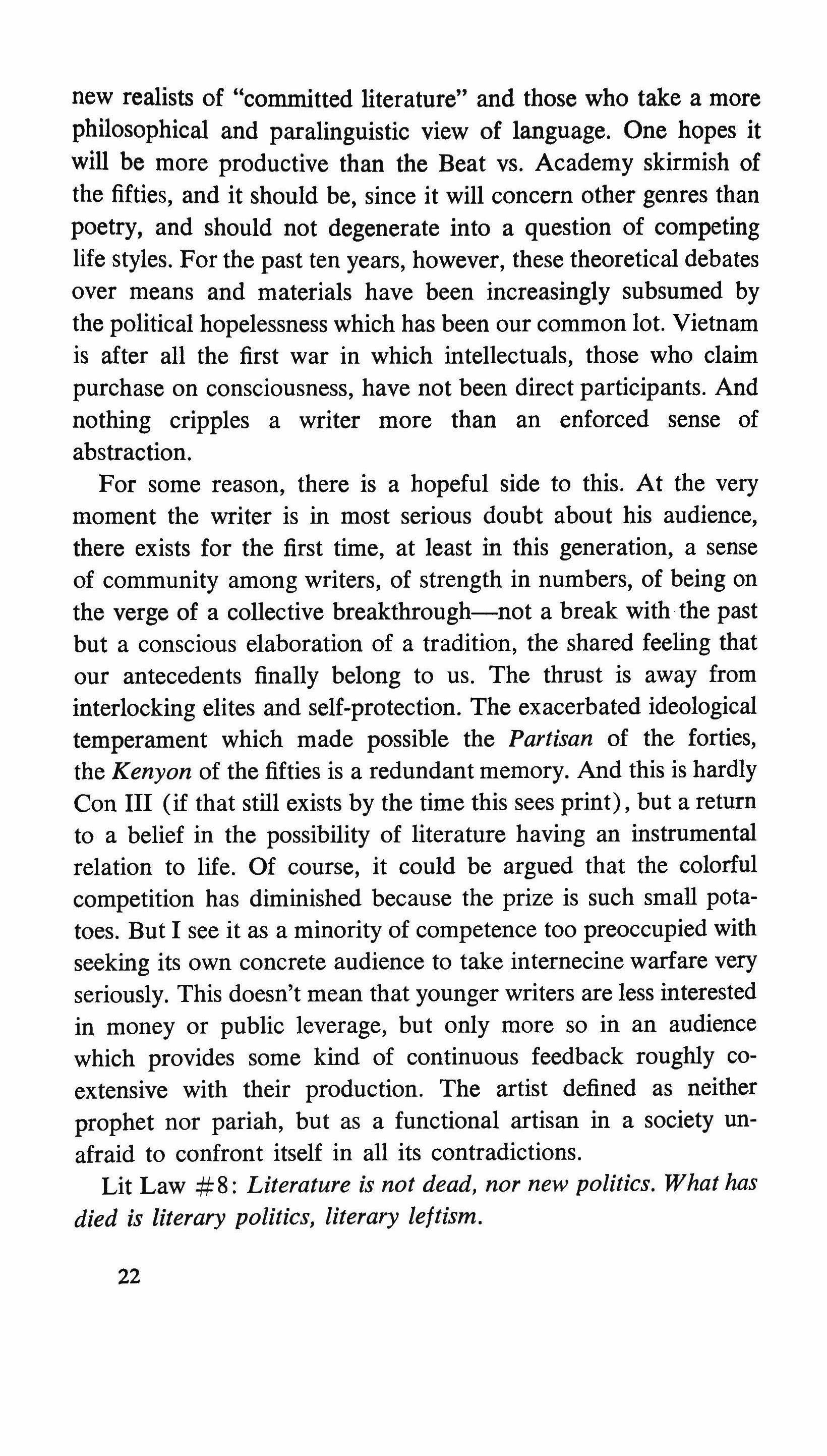
new realists of "committed literature" and those who take a more philosophical and paralinguistic view of language. One hopes it will be more productive than the Beat vs. Academy skirmish of the fifties, and it should be, since it will concern other genres than poetry, and should not degenerate into a question of competing life styles. For the past ten years, however, these theoretical debates over means and materials have been increasingly subsumed by the political hopelessness which has been our common lot. Vietnam is after all the first war in which intellectuals, those who claim purchase on consciousness, have not been direct participants. And nothing cripples a writer more than an enforced sense of abstraction.
For some reason, there is a hopeful side to this. At the very moment the writer is in most serious doubt about his audience, there exists for the first time, at least in this generation, a sense of community among writers, of strength in numbers, of being on the verge of a collective breakthrough-not a break with the past but a conscious elaboration of a tradition, the shared feeling that our antecedents finally belong to us. The thrust is away from interlocking elites and self-protection. The exacerbated ideological temperament which made possible the Partisan of the forties, the Kenyon of the fifties is a redundant memory. And this is hardly Con III (if that still exists by the time this sees print), but a return to a belief in the possibility of literature having an instrumental relation to life. Of course, it could be argued that the colorful competition has diminished because the prize is such small potatoes. But I see it as a minority of competence too preoccupied with seeking its own concrete audience to take internecine warfare very seriously. This doesn't mean that younger writers are less interested in money or public leverage, but only more so in an audience which provides some kind of continuous feedback roughly coextensive with their production. The artist defined as neither prophet nor pariah, but as a functional artisan in a society unafraid to confront itself in all its contradictions.
Lit Law #8: Literature is not dead, nor new politics. What has died is literary politics, literary leftism.
22
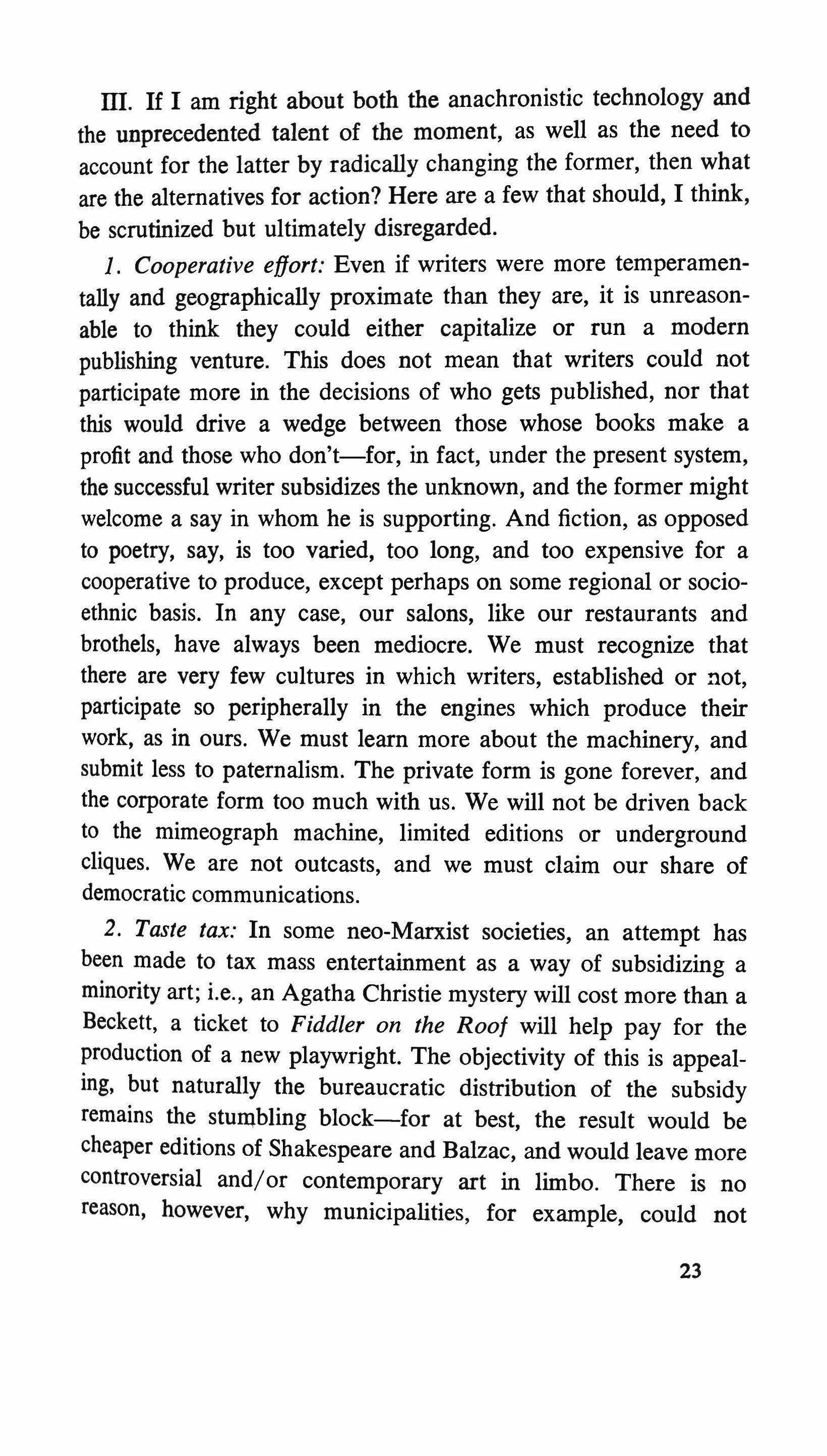
ill. If I am right about both the anachronistic technology and the unprecedented talent of the moment, as well as the need to account for the latter by radically changing the former, then what are the alternatives for action? Here are a few that should, I think, be scrutinized but ultimately disregarded.
1. Cooperative effort: Even if writers were more temperamentally and geographically proximate than they are, it is unreasonable to think they could either capitalize or run a modern publishing venture. This does not mean that writers could not participate more in the decisions of who gets published, nor that this would drive a wedge between those whose books make a profit and those who don't-for, in fact, under the present system, the successful writer subsidizes the unknown, and the former might welcome a say in whom he is supporting. And fiction, as opposed to poetry, say, is too varied, too long, and too expensive for a cooperative to produce, except perhaps on some regional or socioethnic basis. In any case, our salons, like our restaurants and brothels, have always been mediocre. We must recognize that there are very few cultures in which writers, established or not, participate so peripherally in the engines which produce their work, as in ours. We must learn more about the machinery, and submit less to paternalism. The private form is gone forever, and the corporate form too much with us. We will not be driven back to the mimeograph machine, limited editions or underground cliques. We are not outcasts, and we must claim our share of democratic communications.
2. Taste tax: In some neo-Marxist societies, an attempt has been made to tax mass entertainment as a way of subsidizing a minority art; i.e., an Agatha Christie mystery will cost more than a Beckett, a ticket to Fiddler on the Roof will help pay for the production of a new playwright. The objectivity of this is appealing, but naturally the bureaucratic distribution of the subsidy remains the stumbling block-for at best, the result would be cheaper editions of Shakespeare and Balzac, and would leave more controversial and/or contemporary art in limbo. There is no reason, however, why municipalities, for example, could not
23

directly tax profit-making entertainment enterprises, and specifically earmark revenue for disbursement. If we rely too heavily on private endowment for literary art, the hardback novel, like a decent season ticket to the opera, will remain a prerogative of the rich.
3. Individual support: It is idle to suppose that we can expect much help for individual writers from corporate conglomerates, or from the "general interest" magazines now also accountable to their ledgers. But again, it is missing the point to blame those agencies whose avowed intention, after all, is to make money. The foundations have also admitted, by cutting back already meager support to creative writers, that they have no way of choosing between writers, or, for that matter, the literary magazines in which most of them publish. It is not surprising, then, that the few grants made to writers are in the form of rewards for a successful career, or that the only grant made to a literary magazine by a large private foundation in the last twenty years has been the recent Ford bequest of $50,000 to you guessed it-Encounter Magazine. In reply to a request for "clarification," a memo from W. McNeil Lowry, "Vice President in charge of Humanities and Arts," to President McGeorge Bundy is worth quoting in part, at least for unborn rhetoricians.
Throughout its existence, the Division of the Foundation that has been most concerned with humanistic and artistic periodicals has not been able to adopt an open policy of potential support to all the important literary, artistic and scholarly journals or other periodicals. The fields covered by the Division of Humanities and the Arts range through all the humanistic, creative and performing arts. In all these fields, there are periodicals of varying quality but a large number which are outlets for creative writers. There are also possible gaps which need to be filled by publications concerning the arts which do not actually exist. [sic]
The Ford Foundation staff for many years have studied this question and in that study have drawn upon the experience of other publications. The staff has concluded that in most cases even a commitment of Ford Foundation support over periods as short as two or three years would not leave the publication in a sound position for permanent operations through other support or other income. We do not pretend that there is not more to do for the Ford Foundation in helping advance opportunities for creative writers. We have found, rightly or wrongly, that the way of direct subsidy of individual literary magazines or the field as a whole is a way fraught with too many difficulties.
24
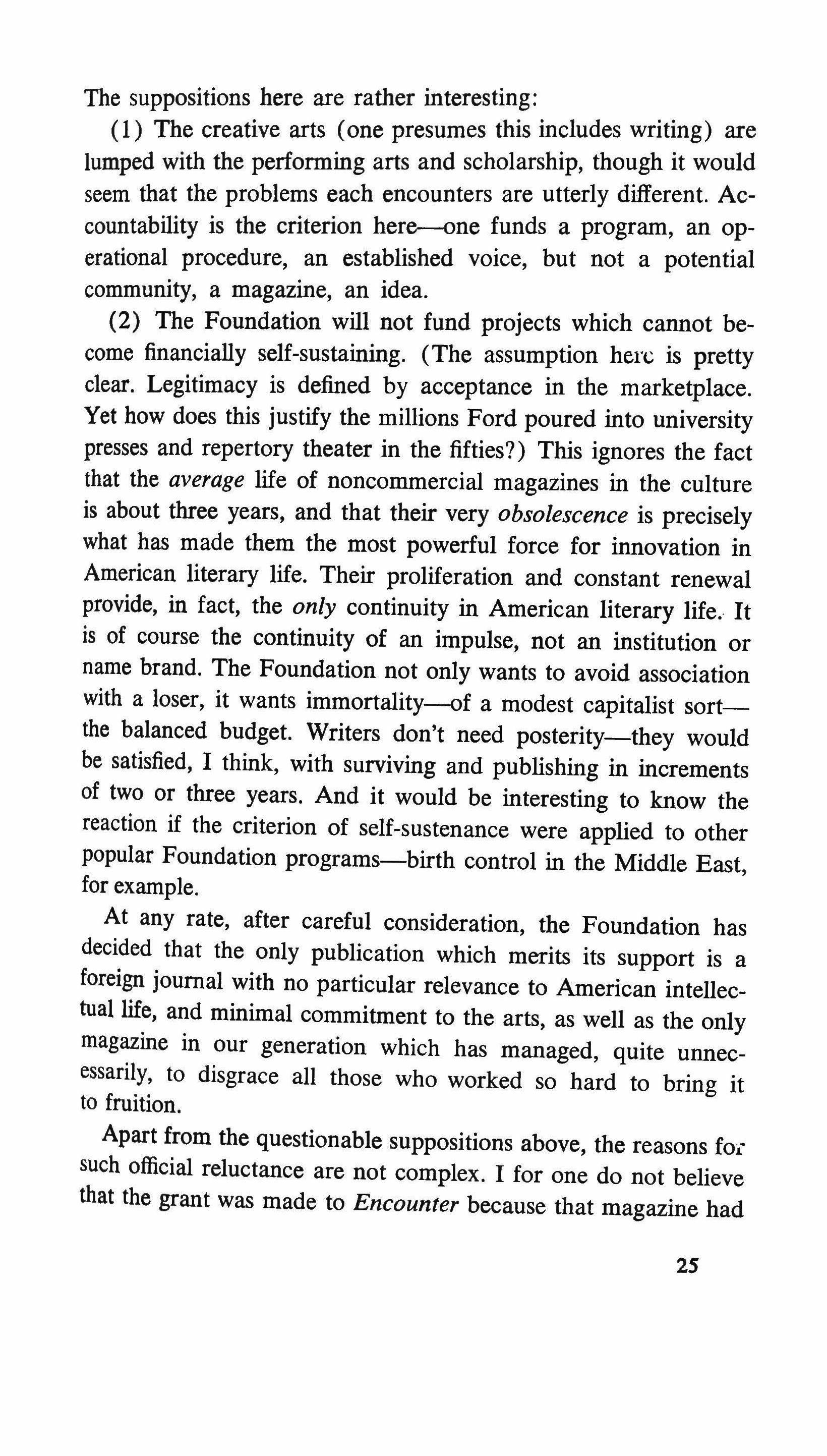
The suppositions here are rather interesting:
( 1) The creative arts (one presumes this includes writing) are lumped with the performing arts and scholarship, though it would seem that the problems each encounters are utterly different. Accountability is the criterion here=-one funds a program, an operational procedure, an established voice, but not a potential community, a magazine, an idea.
(2) The Foundation will not fund projects which cannot become financially self-sustaining. (The assumption here is pretty clear. Legitimacy is defined by acceptance in the marketplace. Yet how does this justify the millions Ford poured into university presses and repertory theater in the fifties?) This ignores the fact that the average life of noncommercial magazines in the culture is about three years, and that their very obsolescence is precisely what has made them the most powerful force for innovation in American literary life. Their proliferation and constant renewal provide, in fact, the only continuity in American literary life. It is of course the continuity of an impulse, not an institution or name brand. The Foundation not only wants to avoid association with a loser, it wants immortality-of a modest capitalist sortthe balanced budget. Writers don't need posterity-they would be satisfied, I think, with surviving and publishing in increments of two or three years. And it would be interesting to know the reaction if the criterion of self-sustenance were applied to other popular Foundation programs-birth control in the Middle East, for example.
At any rate, after careful consideration, the Foundation has decided that the only publication which merits its support is a foreign journal with no particular relevance to American intellectual life, and minimal commitment to the arts, as well as the only magazine in our generation which has managed, quite unnecessarily, to disgrace all those who worked so hard to bring it to fruition.
Apart from the questionable suppositions above, the reasons fo: such official reluctance are not complex. I for one do not believe that the grant was made to Encounter because that magazine had 25
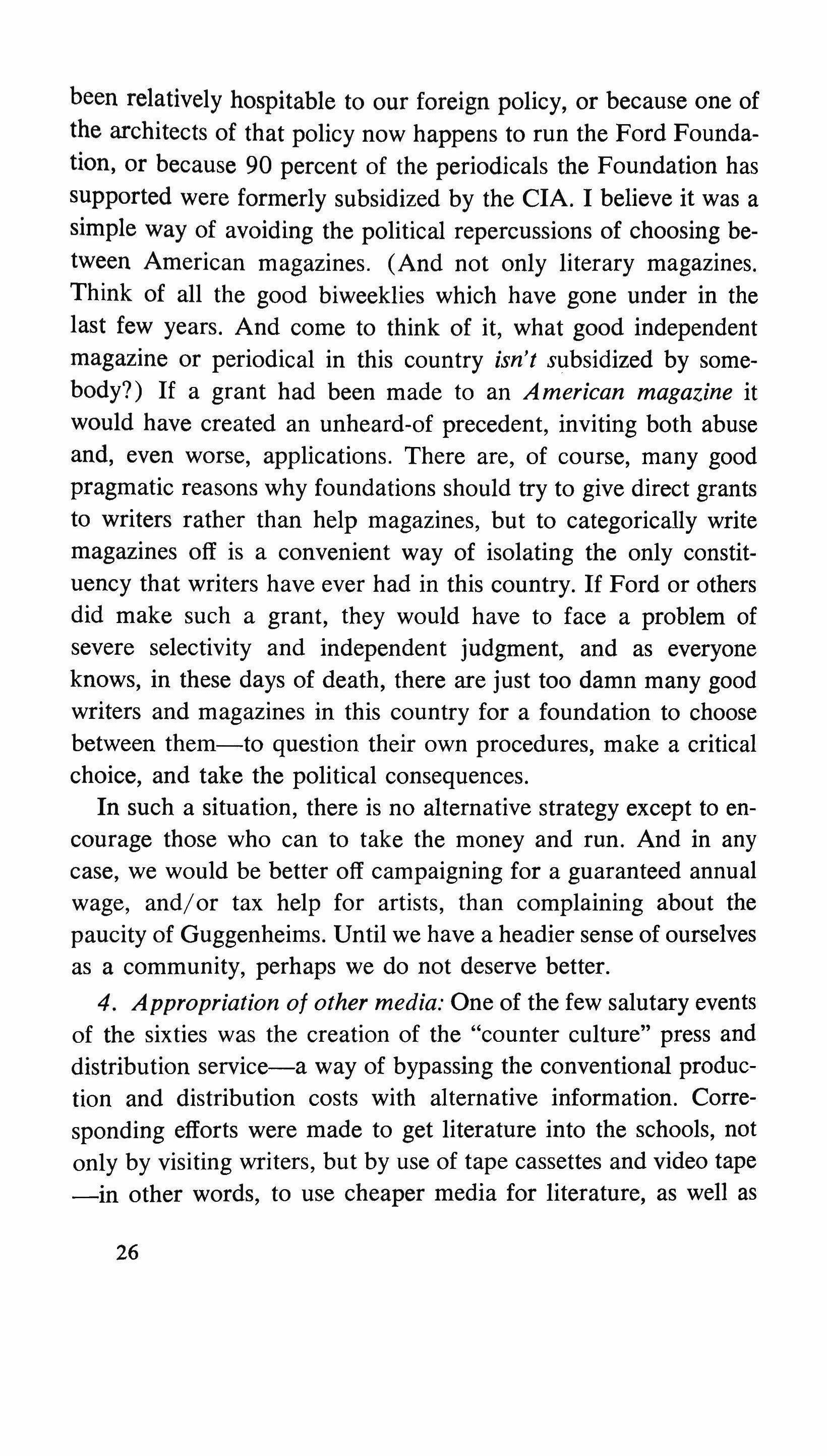
been relatively hospitable to our foreign policy, or because one of the architects of that policy now happens to run the Ford Foundation, or because 90 percent of the periodicals the Foundation has supported were formerly subsidized by the CIA. I believe it was a simple way of avoiding the political repercussions of choosing between American magazines. (And not only literary magazines. Think of all the good biweeklies which have gone under in the last few years. And come to think of it, what good independent magazine or periodical in this country isn't subsidized by somebody?) If a grant had been made to an American magazine it would have created an unheard-of precedent, inviting both abuse and, even worse, applications. There are, of course, many good pragmatic reasons why foundations should try to give direct grants to writers rather than help magazines, but to categorically write magazines off is a convenient way of isolating the only constituency that writers have ever had in this country. If Ford or others did make such a grant, they would have to face a problem of severe selectivity and independent judgment, and as everyone knows, in these days of death, there are just too damn many good writers and magazines in this country for a foundation to choose between them-to question their own procedures, make a critical choice, and take the political consequences. In such a situation, there is no alternative strategy except to encourage those who can to take the money and run. And in any case, we would be better off campaigning for a guaranteed annual wage, and/or tax help for artists, than complaining about the paucity of Guggenheims. Until we have a headier sense of ourselves as a community, perhaps we do not deserve better.
4. Appropriation of other media: One of the few salutary events of the sixties was the creation of the "counter culture" press and distribution service-a way of bypassing the conventional production and distribution costs with alternative information. Corresponding efforts were made to get literature into the schools, not only by visiting writers, but by use of tape cassettes and video tape -in other words, to use cheaper media for literature, as well as
26

to identify it as a living process created by human beings, rather than just part of an infinite abstract curriculum. Fiction, a magazine in tabloid format published three times a year and selling 50,000 in its first edition, is the most admirable example of this to date. When it can afford to come out monthly, can afford sufficient space to print more than extracts, and each city has its own variant, it will add immeasurably to our culture. Until then, it will survive as only another littlemag-a collectors' item dependent on the energies of a few unpaid enthusiasts. Furthermore, there is only so much we can learn from the methodology of the counter culture and more palatable media; even personal appearances are not going to alleviate the problem of genre. Our medium, both physical and intellectual, for better or worse, is the Book, a machine of pages. It is a fine thing for a poet to read to young people, as long as they have an odds-on chance of following him up on the page--otherwise, we have reverted to celebrity function. The "oral tradition" notwithstanding, literature is the aural written down, the aural become visual. We are not pedagogues, entertainers, therapists, magicians, shamans or ideologues. We are something less than each and something more than all of them together. However much the entire notion of the book is redefined, our parameters remain the printed page. The alternative press has prospered, not because it has discovered either a new consciousness or a new form, but because, like any profit-making operation, it has succeeded in selling basic consumer information to the new middle class. And if we did not survive between ads for Ford and Chanel, there is no reason to suppose that ads for herbs and stud service will carry us. Whatever else, the counter culture will not be remembered for its sentences. To take literature into the streets is a fine thing as long as it does not serve-like so much recent surrogate radicalism-as as shortlived flouting of an establishment which congratulates itself on being able to absorb such oblique challenges. Literature can create a community only by challenging that community's most deeply held notions about itself. And when all is said and done, we can-
27

not really appropriate other media--only know our own limitations better.
5. Self-support: There is a more drastic alternative, first suggested by Michael Anania of Swallow Press over a plate of Saltimboca Sicilia at his private literary haunt. Let all books of "literary value" be supplied with a coupon, and let all publishers and magazines require that each manuscript submitted for publication be accompanied by three such coupons. This alone would subsidize literature for a decade. (Thus qualifying the author, perhaps, for a Ford grant.) As Kenneth Patchen once said, "People who say they like poetry and don't buy any are a pack of cheap sons-ofbitches." This would also postpone the possibility of our becoming the first culture with more good writers than readers.
IV. All right, then. What in God's name do we have a right to expect? The following options seem to me minimal and practical, and could be accomplished at the cost of a few B-52 sorties:
1. An alternative distribution service: To cop a phrase, this has to do with the death of the library and the death of the independent bookstore. (And while we're on the subject, if youth has no interest in books, how do you account for the soaring theft rate? Does ripping off a book have to do with a lack of respect for literature or for the lubricant of the system?) The public library of Carnegie and its librarian, the bookstores with knowledgeable clerks-the visible proprietors-are doubtless finished. With any other commodity, specialization would be the obvious solution. We must create an institution which is something between a repository of all culture and a boutique. And this has to do with the basic needs of democracy and not some remaindered aesthetics. Such an alternative seems to me the only genuine way of ameliorating the present situation.
Lit Law #9: Literature is the last serious artform which has any pretensions about paying its own way in the marketplace. Literature requires, in short, what every other surviving mode of creative expression has had in any country under any system,
28
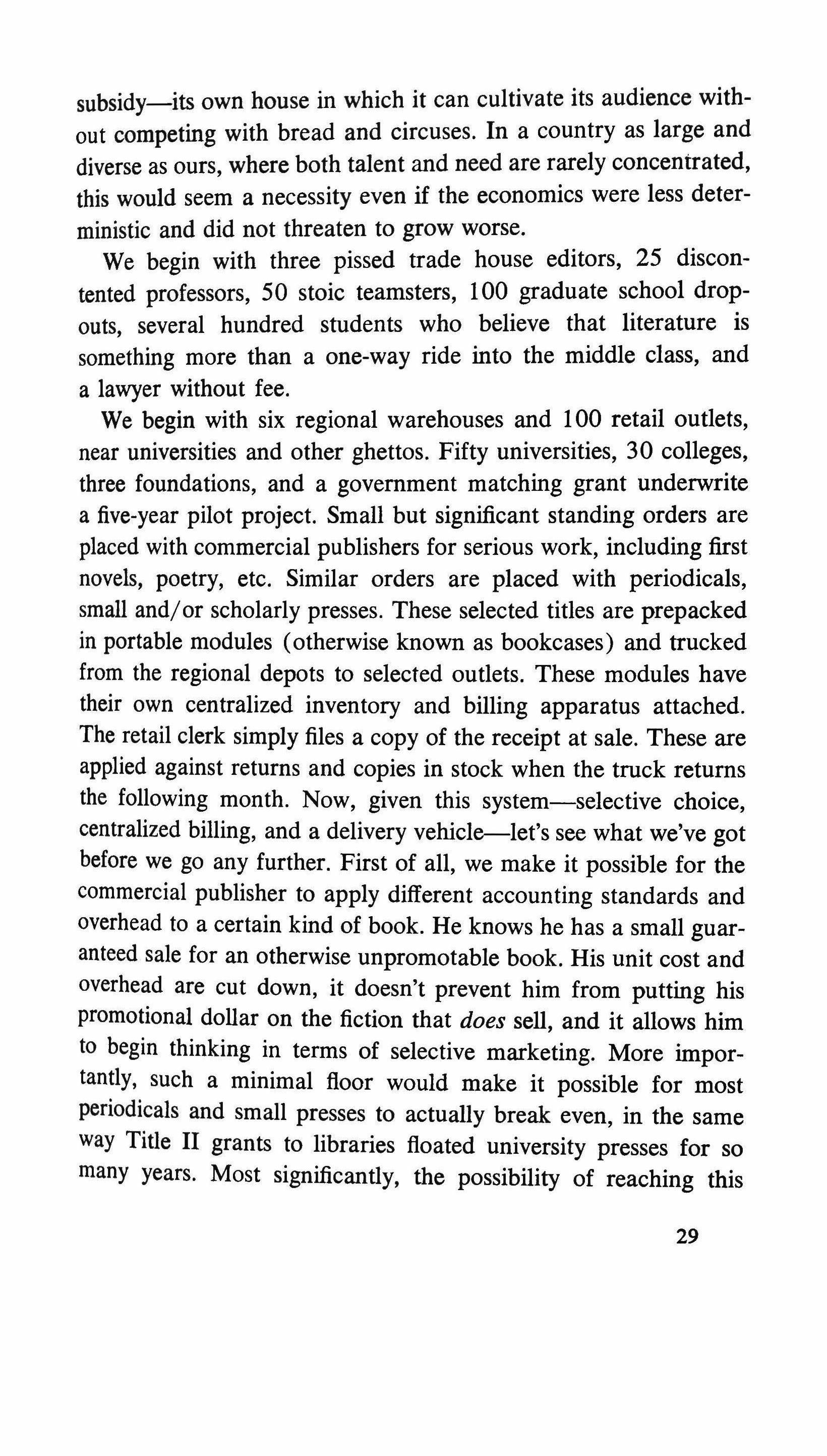
subsidy-its own house in which it can cultivate its audience without competing with bread and circuses. In a country as large and diverse as ours, where both talent and need are rarely concentrated, this would seem a necessity even if the economics were less deterministic and did not threaten to grow worse.
We begin with three pissed trade house editors, 25 discontented professors, 50 stoic teamsters, 100 graduate school dropouts, several hundred students who believe that literature is something more than a one-way ride into the middle class, and a lawyer without fee.
We begin with six regional warehouses and 100 retail outlets, near universities and other ghettos. Fifty universities, 30 colleges, three foundations, and a government matching grant underwrite a five-year pilot project. Small but significant standing orders are placed with commercial publishers for serious work, including first novels, poetry, etc. Similar orders are placed with periodicals, small and/or scholarly presses. These selected titles are prepacked in portable modules (otherwise known as bookcases) and trucked from the regional depots to selected outlets. These modules have their own centralized inventory and billing apparatus attached. The retail clerk simply files a copy of the receipt at sale. These are applied against returns and copies in stock when the truck returns the following month. Now, given this system-selective choice, centralized billing, and a delivery vehicle-let's see what we've got before we go any further. First of all, we make it possible for the commercial publisher to apply different accounting standards and overhead to a certain kind of book. He knows he has a small guaranteed sale for an otherwise unpromotable book. His unit cost and overhead are cut down, it doesn't prevent him from putting his promotional dollar on the fiction that does sell, and it allows him to begin thinking in terms of selective marketing. More importantly, such a minimal floor would make it possible for most periodicals and small presses to actually break even, in the same way Title II grants to libraries floated university presses for so many years. Most significantly, the possibility of reaching this
29
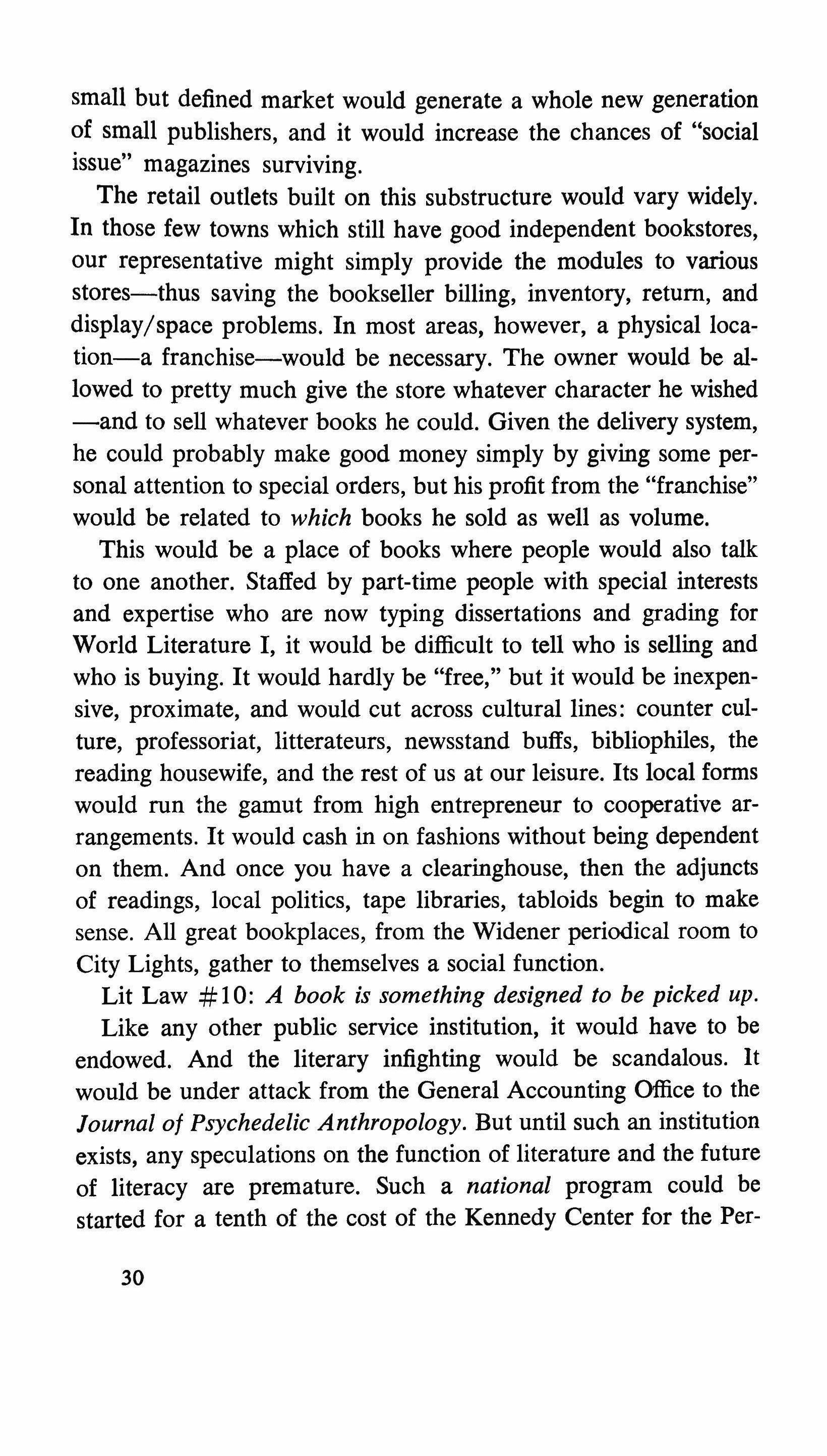
small but defined market would generate a whole new generation of small publishers, and it would increase the chances of "social issue" magazines surviving.
The retail outlets built on this substructure would vary widely. In those few towns which still have good independent bookstores, our representative might simply provide the modules to various stores-thus saving the bookseller billing, inventory, return, and display/space problems. In most areas, however, a physicallocation-a franchise-would be necessary. The owner would be allowed to pretty much give the store whatever character he wished -and to sell whatever books he could. Given the delivery system, he could probably make good money simply by giving some personal attention to special orders, but his profit from the "franchise" would be related to which books he sold as well as volume.
This would be a place of books where people would also talk to one another. Staffed by part-time people with special interests and expertise who are now typing dissertations and grading for World Literature I, it would be difficult to tell who is selling and who is buying. It would hardly be "free," but it would be inexpensive, proximate, and would cut across cultural lines: counter culture, professoriat, litterateurs, newsstand buffs, bibliophiles, the reading housewife, and the rest of us at our leisure. Its local forms would run the gamut from high entrepreneur to cooperative arrangements. It would cash in on fashions without being dependent on them. And once you have a clearinghouse, then the adjuncts of readings, local politics, tape libraries, tabloids begin to make sense. All great bookplaces, from the Widener periodical room to City Lights, gather to themselves a social function.
Lit Law #10: A book is something designed to be picked up.
Like any other public service institution, it would have to be endowed. And the literary infighting would be scandalous. It would be under attack from the General Accounting Office to the Journal of Psychedelic Anthropology. But until such an institution exists, any speculations on the function of literature and the future of literacy are premature. Such a national program could be started for a tenth of the cost of the Kennedy Center for the Per-
30
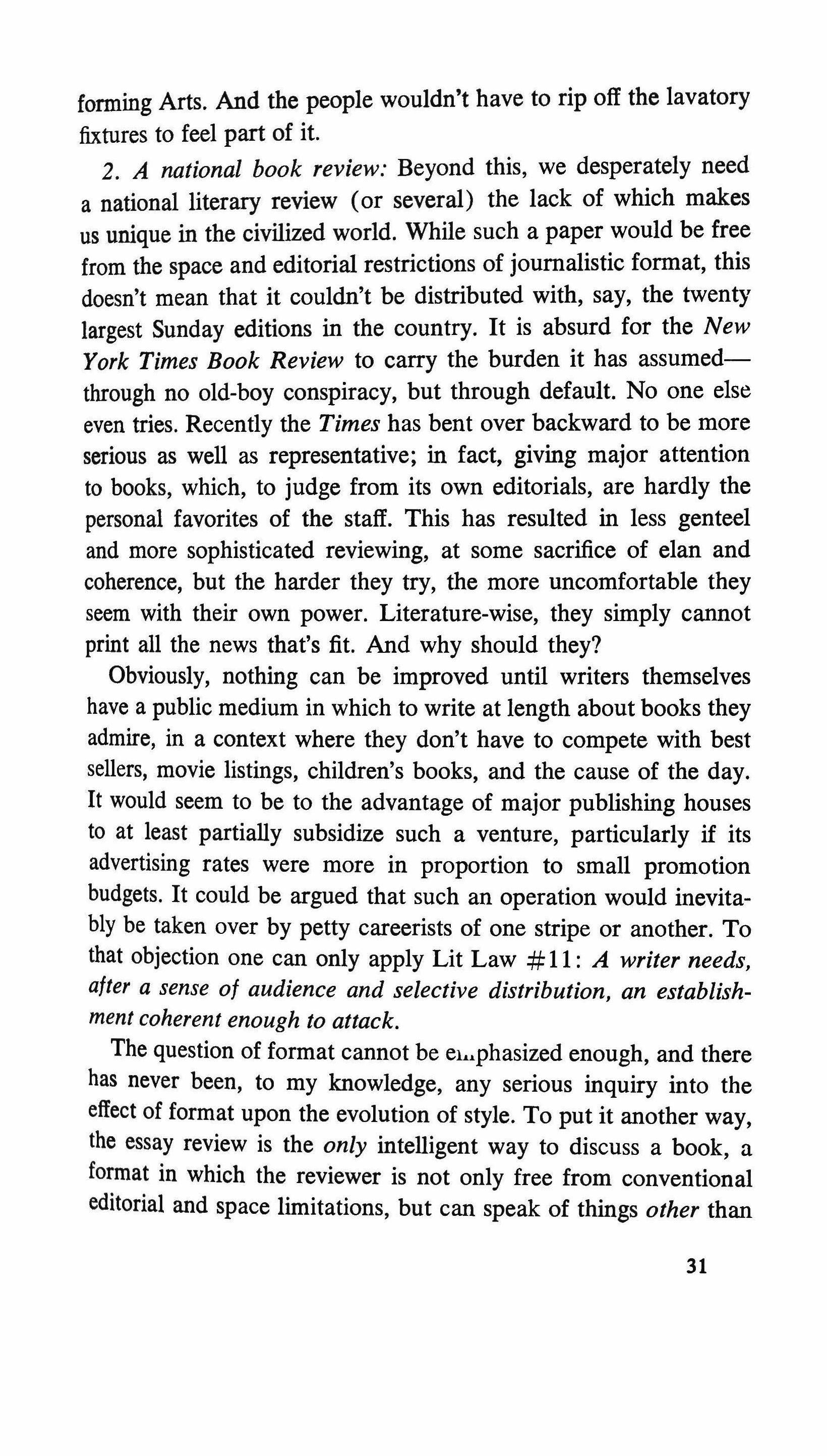
forming Arts. And the people wouldn't have to rip off the lavatory fixtures to feel part of it.
2. A national book review: Beyond this, we desperately need a national literary review (or several) the lack of which makes us unique in the civilized world. While such a paper would be free from the space and editorial restrictions of journalistic format, this doesn't mean that it couldn't be distributed with, say, the twenty largest Sunday editions in the country. It is absurd for the New York Times Book Review to carry the burden it has assumedthrough no old-boy conspiracy, but through default. No one else even tries. Recently the Times has bent over backward to be more serious as well as representative; in fact, giving major attention to books, which, to judge from its own editorials, are hardly the personal favorites of the staff. This has resulted in less genteel and more sophisticated reviewing, at some sacrifice of elan and coherence, but the harder they try, the more uncomfortable they seem with their own power. Literature-wise, they simply cannot print all the news that's fit. And why should they?
Obviously, nothing can be improved until writers themselves have a public medium in which to write at length about books they admire, in a context where they don't have to compete with best sellers, movie listings, children's books, and the cause of the day. It would seem to be to the advantage of major publishing houses to at least partially subsidize such a venture, particularly if its advertising rates were more in proportion to small promotion budgets. It could be argued that such an operation would inevitably be taken over by petty careerists of one stripe or another. To that objection one can only apply Lit Law # 11: A writer needs, after a sense of audience and selective distribution, an establishment coherent enough to attack.
The question of format cannot be en.phasized enough, and there has never been, to my knowledge, any serious inquiry into the effect of format upon the evolution of style. To put it another way, the essay review is the only intelligent way to discuss a book, a format in which the reviewer is not only free from conventional editorial and space limitations, but can speak of things other than
31

the book-the presumptions which inform his analysis, for example-and not worry much about coming up a box score. The discussion of a book, in particular a work of creative prose, must take place within a wider discourse, or it is nothing more than a hole in the air.
I bring up this obviety only to recall that literary reviews, as well as larger, middle-ground magazines, have failed utterly as an alternative reviewing medium. Not only because they are hopelessly behind schedule, but because they have adopted either the most truncated "books in brief" format-a plot summary in an incomplete sentence, aureoled by an adjective of praise or blame -or that penultimate absurdity of criticism, the omnibus review or "chronicle"-which is of course nothing but a collection of "books in brief" that tries to look like an essay, a consideration of books which have nothing in common save their date of publication. The "books in brief" format gives the illusion of "keeping up," the chronicle creates the illusion of synthesis. Both smack of desperation, in which commercial indifference and academic pretension are indistinguishable. Perhaps it should not be surprising that the most successful-and deservedly so-intellectual review of the decade, the New York Review of Books, treats fiction as an occasional brunch of leftovers, in which each paragraph is likely to begin, "This novel fails because
It is time to invoke the one man/one book rule. It is also time to rethink reviewing formats created in 18th century tabloid newspapers, and 19th century periodicals. It is useless to speculate on the life of a genre or bemoan the confusion of critical standards as long as there remain so few avenues for leisurely and intelligent discourse.
Lit Law #12: Suitable reviewing media must offer a combination of the amplitude of a periodical with a journalistic vehicle. So far, we have created only the silliest sort of compromises, and writers themselves must accept their share of blame.
3. Assistance to alternative magazines and publishers: What is obvious now is that an entirely new kind of magazine will have to come into existence: a kind of hybrid between the leisurely quar-
32
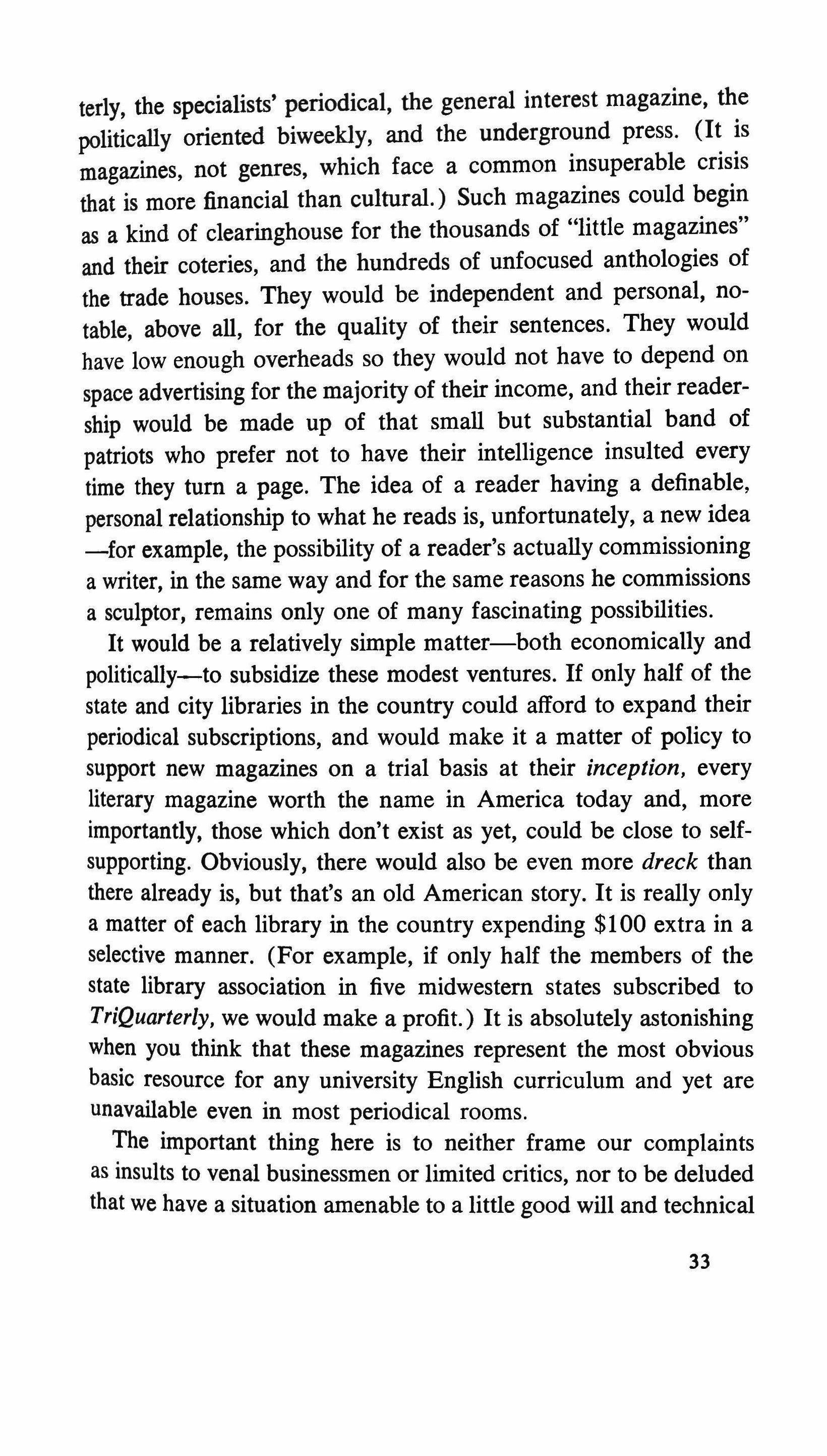
terly, the specialists' periodical, the general interest magazine, the politically oriented biweekly, and the underground press. (It is magazines, not genres, which face a common insuperable crisis that is more financial than cultural.) Such magazines could begin as a kind of clearinghouse for the thousands of "little magazines" and their coteries, and the hundreds of unfocused anthologies of the trade houses. They would be independent and personal, notable, above all, for the quality of their sentences. They would have low enough overheads so they would not have to depend on space advertising for the majority of their income, and their readership would be made up of that small but substantial band of patriots who prefer not to have their intelligence insulted every time they tum a page. The idea of a reader having a definable, personal relationship to what he reads is, unfortunately, a new idea -for example, the possibility of a reader's actually commissioning a writer, in the same way and for the same reasons he commissions a sculptor, remains only one of many fascinating possibilities. It would be a relatively simple matter-both economically and politically-to subsidize these modest ventures. If only half of the state and city libraries in the country could afford to expand their periodical subscriptions, and would make it a matter of policy to support new magazines on a trial basis at their inception, every literary magazine worth the name in America today and, more importantly, those which don't exist as yet, could be close to selfsupporting. Obviously, there would also be even more dreck than there already is, but that's an old American story. It is really only a matter of each library in the country expending $100 extra in a selective manner. (For example, if only half the members of the state library association in five midwestern states subscribed to TriQuarteriy, we would make a profit.) It is absolutely astonishing when you think that these magazines represent the most obvious basic resource for any university English curriculum and yet are unavailable even in most periodical rooms. The important thing here is to neither frame our complaints as insults to venal businessmen or limited critics, nor to be deluded that we have a situation amenable to a little good will and technical
33
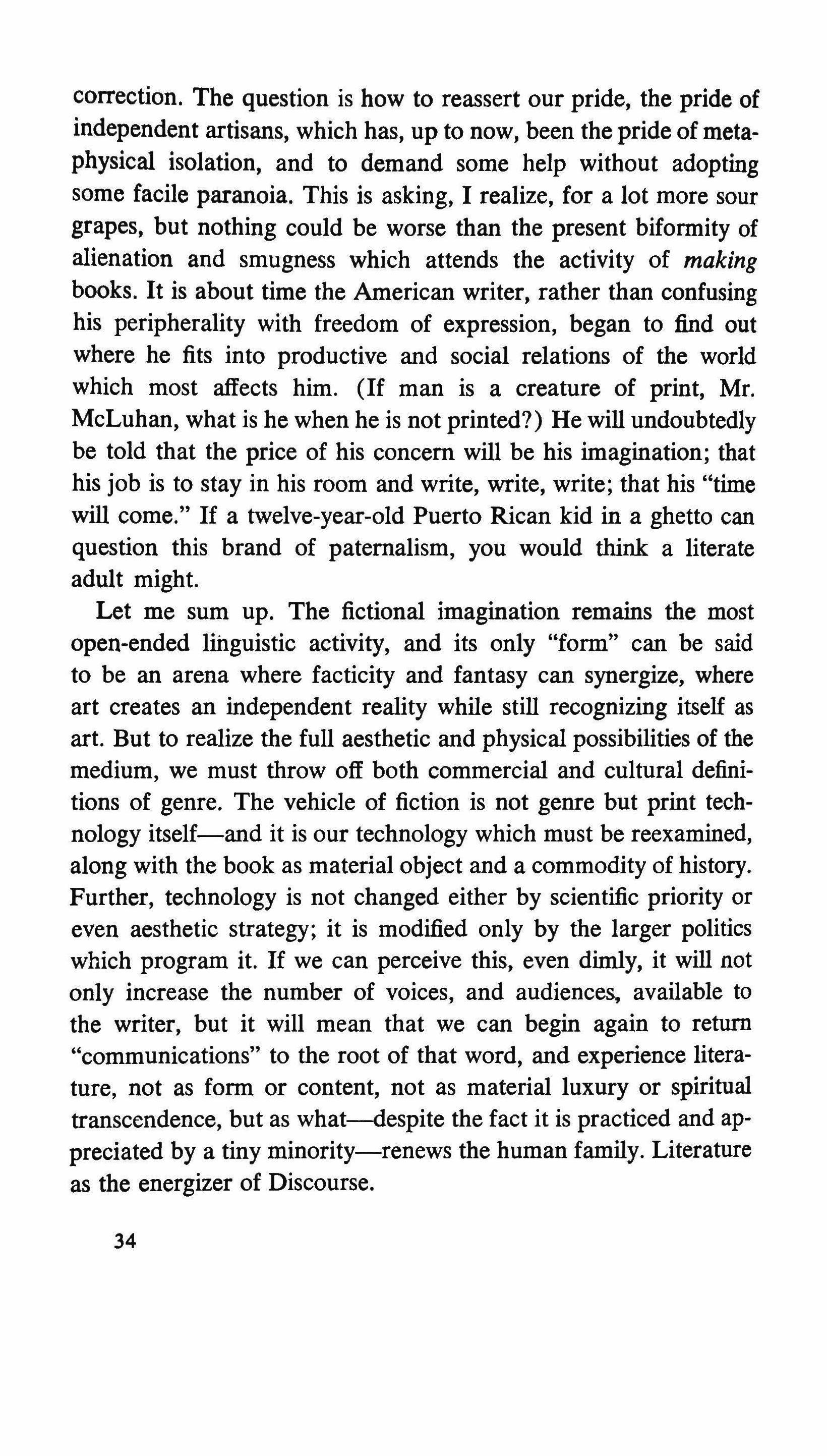
correction. The question is how to reassert our pride, the pride of independent artisans, which has, up to now, been the pride of metaphysical isolation, and to demand some help without adopting some facile paranoia. This is asking, I realize, for a lot more sour grapes, but nothing could be worse than the present biformity of alienation and smugness which attends the activity of making books. It is about time the American writer, rather than confusing his peripherality with freedom of expression, began to find out where he fits into productive and social relations of the world which most affects him. (If man is a creature of print, Mr. McLuhan, what is he when he is not printed?) He will undoubtedly be told that the price of his concern will be his imagination; that his job is to stay in his room and write, write, write; that his "time will come." If a twelve-year-old Puerto Rican kid in a ghetto can question this brand of paternalism, you would think a literate adult might.
Let me sum up. The fictional imagination remains the most open-ended linguistic activity, and its only "form" can be said to be an arena where facticity and fantasy can synergize, where art creates an independent reality while still recognizing itself as art. But to realize the full aesthetic and physical possibilities of the medium, we must throw off both commercial and cultural definitions of genre. The vehicle of fiction is not genre but print technology itself-and it is our technology which must be reexamined, along with the book as material object and a commodity of history. Further, technology is not changed either by scientific priority or even aesthetic strategy; it is modified only by the larger politics which program it. If we can perceive this, even dimly, it will not only increase the number of voices, and audiences, available to the writer, but it will mean that we can begin again to return "communications" to the root of that word, and experience literature, not as form or content, not as material luxury or spiritual transcendence, but as what--despite the fact it is practiced and appreciated by a tiny minority-renews the human family. Literature as the energizer of Discourse.
34
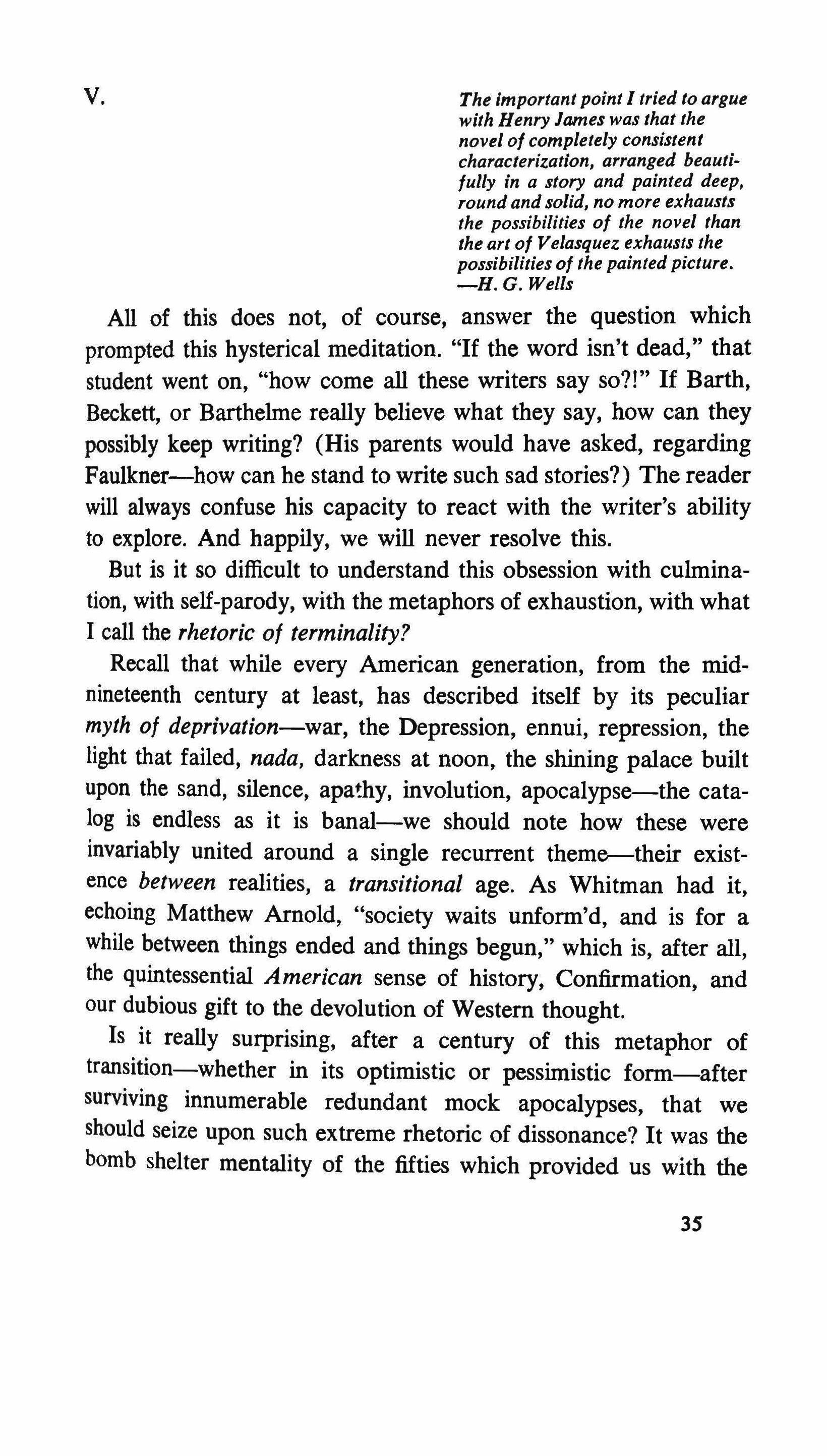
The important point I tried to argue with Henry James was that the novel ofcompletely consistent characterization, arranged beautifully in a story and painted deep, round and solid, no more exhausts the possibilities of the novel than the art of Velasquez exhausts the possibilities of the paintedpicture.
-H.G. Wells
All of this does not, of course, answer the question which prompted this hysterical meditation. "If the word isn't dead," that student went on, "how come all these writers say so?!" If Barth, Beckett, or Barthelme really believe what they say, how can they possibly keep writing? (His parents would have asked, regarding Faulkner-how can he stand to write such sad stories?) The reader will always confuse his capacity to react with the writer's ability to explore. And happily, we will never resolve this.
But is it so difficult to understand this obsession with culmination, with self-parody, with the metaphors of exhaustion, with what I call the rhetoric of terminality?
Recall that while every American generation, from the midnineteenth century at least, has described itself by its peculiar myth of deprivation-war, the Depression, ennui, repression, the light that failed, nada, darkness at noon, the shining palace built upon the sand, silence, apathy, involution, apocalypse-the catalog is endless as it is banal-we should note how these were invariably united around a single recurrent theme-their existence between realities, a transitional age. As Whitman had it, echoing Matthew Arnold, "society waits unform'd, and is for a while between things ended and things begun," which is, after all, the quintessential American sense of history, Confirmation, and our dubious gift to the devolution of Western thought.
Is it really surprising, after a century of this metaphor of transition-whether in its optimistic or pessimistic form-after surviving innumerable redundant mock apocalypses, that we should seize upon such extreme rhetoric of dissonance? It was the bomb shelter mentality of the fifties which provided us with the 35
V.
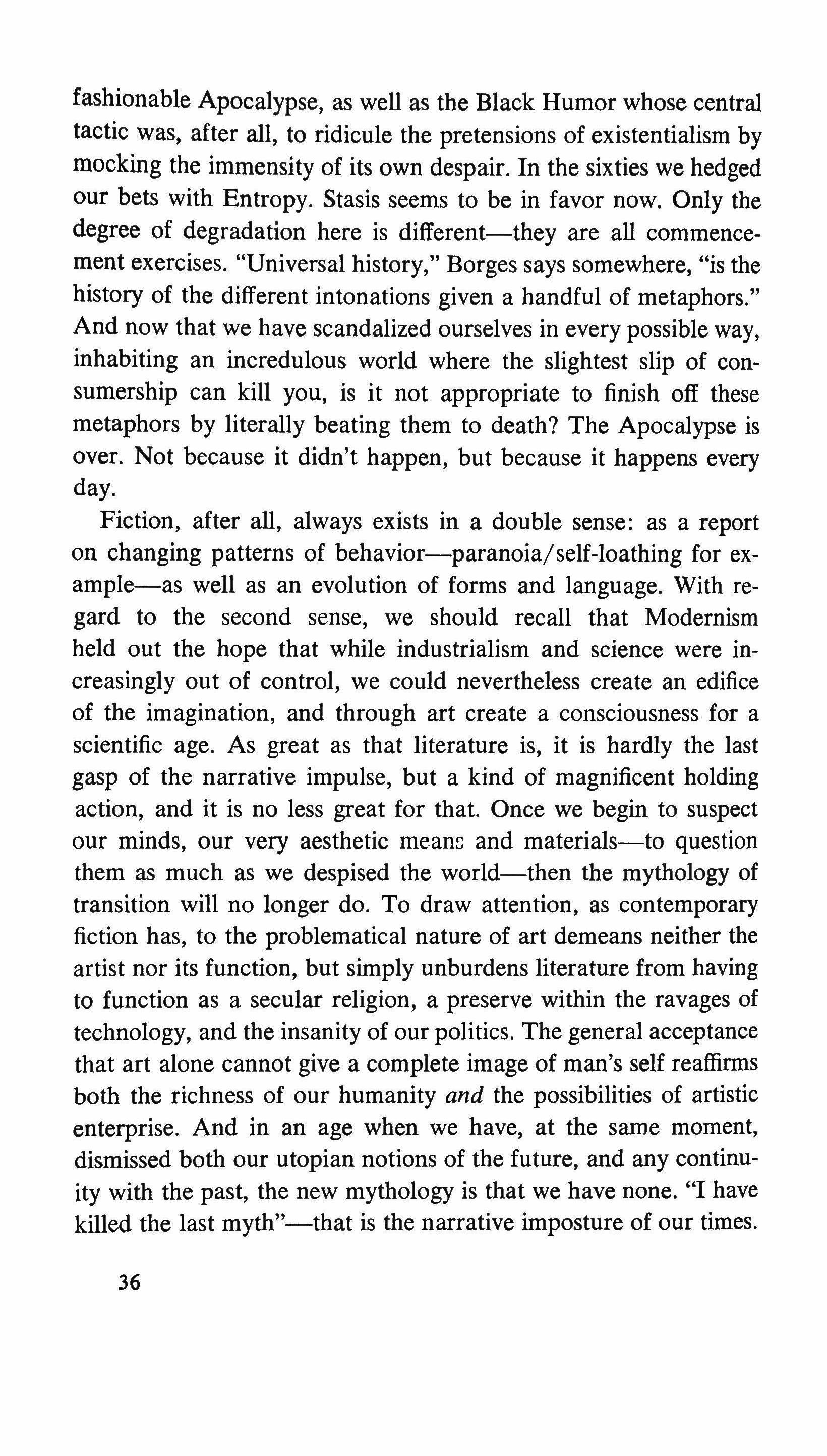
fashionable Apocalypse, as well as the Black Humor whose central tactic was, after all, to ridicule the pretensions of existentialism by mocking the immensity of its own despair. In the sixties we hedged our bets with Entropy. Stasis seems to be in favor now. Only the degree of degradation here is different-they are all commencement exercises. "Universal history," Borges says somewhere, "is the history of the different intonations given a handful of metaphors." And now that we have scandalized ourselves in every possible way, inhabiting an incredulous world where the slightest slip of consumership can kill you, is it not appropriate to finish off these metaphors by literally beating them to death? The Apocalypse is over. Not because it didn't happen, but because it happens every day.
Fiction, after all, always exists in a double sense: as a report on changing patterns of behavior-paranoia/self-Ioathing for example-as well as an evolution of forms and language. With regard to the second sense, we should recall that Modernism held out the hope that while industrialism and science were increasingly out of control, we could nevertheless create an edifice of the imagination, and through art create a consciousness for a scientific age. As great as that literature is, it is hardly the last gasp of the narrative impulse, but a kind of magnificent holding action, and it is no less great for that. Once we begin to suspect our minds, our very aesthetic means and materials-to question them as much as we despised the world-then the mythology of transition will no longer do. To draw attention, as contemporary fiction has, to the problematical nature of art demeans neither the artist nor its function, but simply unburdens literature from having to function as a secular religion, a preserve within the ravages of technology, and the insanity of our politics. The general acceptance that art alone cannot give a complete image of man's self reaffirms both the richness of our humanity and the possibilities of artistic enterprise. And in an age when we have, at the same moment, dismissed both our utopian notions of the future, and any continuity with the past, the new mythology is that we have none. "I have killed the last myth"-that is the narrative imposture of our times.
36

And it is important to see this as appropriate aesthetic strategy, not as divination or cosmic necessity. Literature is not religion, or philosophy, or psychology, it is not a political act, or intrinsically virtuous, neither weapon nor sanctuary, and least of all it is not therapy. Literature attends primarily to worn-out metaphors, and we are just beginning to discover that these metaphors are not national treasures or genre properties, but transcultural phenomena. Literature is in this sense "behind the times," for it has been the last artform to be internationalized.
While this strategy may be to some extent self-canceling (and not a little self-righteous), it is not self-deceptive. For those writers and critics who would write off writing with writing, who proclaim the terminus of language, are in fact making, however obliquely, the highest claims for their own use of it. ("The language is dead. Long live my lingo!") In the same gesture in which such a writer proclaims the extinction of the language animal, he affirms the power of his own speech, and this is a paradox which is finally, even marvelously, unassimilable. In this situation, it is of distinct benefit to adopt the pose of the Last Artist, to play dead, to have, in fancy, the last word.
The trick, as always, is to make them pay attention. And while the tone of much of this literature is both self-parodic and contemptuous of the reader, its very limitations are what intensify its claim on our attention. For the presumption here is roughly this: that, for better or worse, there is no existence for our species beyond language. No recovery of our primordial origins, no technarchic utopia of undifferentiated consciousness; and literature, that which challenges the established language of the moment, may be understood in terms of simple survival rather than transcendence. Language for these writers is a given, a phenomenon which is neither autonomous nor coextensive with our lives. And literature, thus, is a gift-not the property of a class or even an individual prophet-a present, which like all exemplary endowments, creates its own terms of acceptance. This view of literature, although stripped of the older sanctions of High Art, nevertheless reasserts in a hardheaded way the primacy of language in our
37

lives, language as reorientive enterprise, and in so doing proclaims the continuity of the Modernist impulse by taking its assumptions to a logical if unsettling conclusion.
A matter of Tactics, remember. If one poses as the "last" writer, if one writes the "last" novel, one is also the beginning as well. One has one's tale firmly in one's mouth. Being last, after all, is a good way to survive and a good way of being visible. Also, posing as terminal redirects our attention, by sleight of hand, to how we became-the reinvention of history, by tearing it from encrusted fonn and stale metaphor-and while that is not necessarily like the stories we have known, it is still the function of narrative.
Last Lit Law: The End Game strategy is not only subversive for its own sake; it is the best way of opening up the game again.
Fiction since Joyce has been more a vehicle for the many voices of the intellect and verbal innovation than a story-telling machine. Indeed, it has come to rely upon its own linguistic awareness of itself, rather than plot or character development, to provide its momentum. At the very moment we begin to understand this, the impulse seems to be waning, and the age of involution already past. Barthelme is, after all, the most imitated writer in the country today-fully as much as Salinger and Hemingway were. (One index of genius is the extent to which it prompts redundancy in lesser talents.) And whatever else one can say about such self-consciousness, linear sequential omniscient narrative will never be the same again. Or to put it another way, it has become possible again, because it has a much richer context of alternatives, because it is no longer low-grade entertainment or a "classic," but has resumed serious negotiations with philosophy, politics, and that reopened debate on how we see. The space for inscription has lost its edges. This does not mean that fiction has given up the prerogative of telling us how to live-the necessity to change one's perception, question one's aesthetic expectations, is as didactic as any other moralism.
This is in no way to deny the legitimate crisis of confidence which pervades the literary arts to the extent that they maintain
38
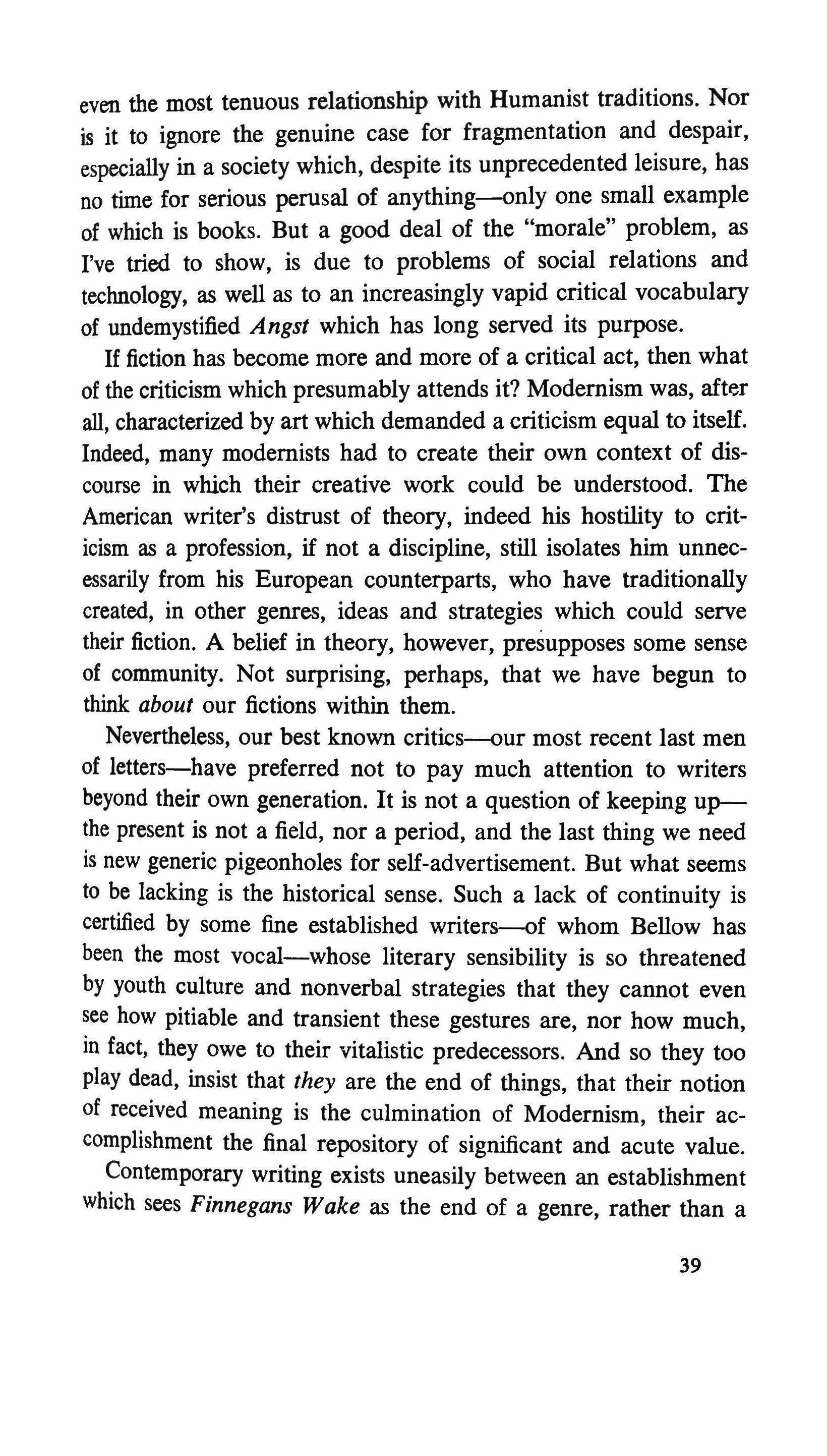
even the most tenuous relationship with Humanist traditions. Nor is it to ignore the genuine case for fragmentation and despair, especially in a society which, despite its unprecedented leisure, has no time for serious perusal of anything-only one small example of which is books. But a good deal of the "morale" problem, as I've tried to show, is due to problems of social relations and technology, as well as to an increasingly vapid critical vocabulary of undemystified Angst which has long served its purpose. If fiction has become more and more of a critical act, then what of the criticism which presumably attends it? Modernism was, after all, characterized by art which demanded a criticism equal to itself. Indeed, many modernists had to create their own context of discourse in which their creative work could be understood. The American writer's distrust of theory, indeed his hostility to criticism as a profession, if not a discipline, still isolates him unnecessarily from his European counterparts, who have traditionally created, in other genres, ideas and strategies which could serve their fiction. A belief in theory, however, presupposes some sense of community. Not surprising, perhaps, that we have begun to think about our fictions within them.
Nevertheless, our best known critics-our most recent last men of letters--have preferred not to pay much attention to writers beyond their own generation. It is not a question of keeping up-the present is not a field, nor a period, and the last thing we need is new generic pigeonholes for self-advertisement. But what seems to be lacking is the historical sense. Such a lack of continuity is certified by some fine established writers-of whom Bellow has been the most vocal-whose literary sensibility is so threatened by youth culture and nonverbal strategies that they cannot even see how pitiable and transient these gestures are, nor how much, in fact, they owe to their vitalistic predecessors. And so they too play dead, insist that they are the end of things, that their notion of received meaning is the culmination of Modernism, their accomplishment the final repository of significant and acute value. Contemporary writing exists uneasily between an establishment which sees Finnegans Wake as the end of a genre, rather than a
39

beginning, and a counter culture which sees itself as somehow sprung fully armed from the void-"we are the other people""nuthin' like us ever was!"
Clearly we have a considerable body of fiction which exemplifies new possibilities for narrative-as well as the entire aesthetic enterprise itself-writing which cannot be explained by reference to modernist masters, or assimilated by a literary culture still ruled by modernist assumptions. But just as clearly, most claims for a "new sensibility," whether literary or in terms of mass consciousness, seem perversely ahistorical and obscurantist-and only deflect whatever genuine claims might be made for contemporary writing. It is very American that the young should see themselves with no antecedents-but a little more surprising that established critics and writers see themselves without contemporary consequences. If we have changed so much, then never has a major mutation been absorbed so quickly or described so sloppily. More likely, our extreme rhetoric is both energizing and masking whatever significant change is occurring. And if we can only really understand what is happening to us by watching ourselves describe it, then the strategy of dying, of feigned exhaustion again reasserts tactical supremacy. For by posing as last, a culmination in an age which views itself as ahistorical, you gain attention, if not affection, from those who can only see themselves as specialists in the new, and who are yet to be.
It's not as if we haven't died before, after all. In 1782 Johnson is moaning, "Pope dead, Swift dead, Gray dead-there is nothing to look forward to." Not much, except the picaresque novel. And some forty years ago, in Madrid, while Ortega is telling us that the novel is no longer an "exploitable mine," that it too is dying, elsewhere, within the year, The Great Gatsby, In Our Time, An American Tragedy, The Magic Mountain, The Counterfeiters, and Passage to India, among others, see print.
There remains the fascinating possibility that the sixties were a total aberration-not only politically but aesthetically-and clearly there seems to be some relationship between failed social
40
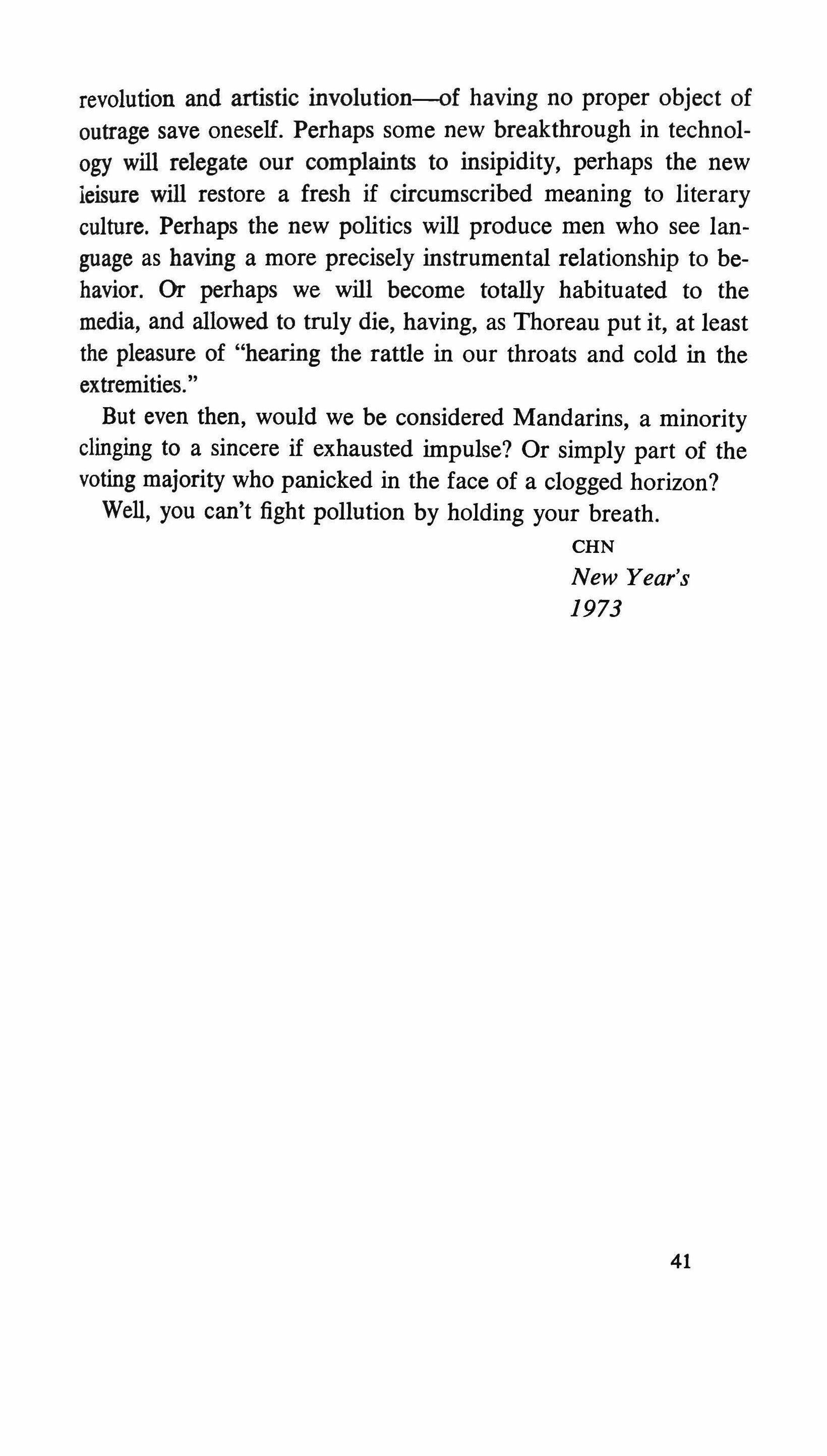
revolution and artistic involution--of having no proper object of outrage save oneself. Perhaps some new breakthrough in technology will relegate our complaints to insipidity, perhaps the new leisure will restore a fresh if circumscribed meaning to literary culture. Perhaps the new politics will produce men who see language as having a more precisely instrumental relationship to behavior. Or perhaps we will become totally habituated to the media, and allowed to truly die, having, as Thoreau put it, at least the pleasure of "hearing the rattle in our throats and cold in the extremities.
But even then, would we be considered Mandarins, a minority clinging to a sincere if exhausted impulse? Or simply part of the voting majority who panicked in the face of a clogged horizon?
Well, you can't fight pollution by holding your breath.
CHN
New Year's 1973
41
The making ofAshenden STANLEY ELKIN

I've been spared a lot, one of the blessed of the earth, at least one of its lucky, that privileged handful of the dramatically prospering, the sort whose secrets are asked, like the hundred year old man. There is no secret of course. Most of what happens to us is simple accident. Highish birth and a smooth network of appropriate connection like a tea service written into the will. But surely something in the blood too, locked into good fortune's dominant genes like a blast ripening in a time bomb. Set to go off, my good looks and intelligence, yet exceptional still, take away my mouthful of silver spoon and lapful of luxury, Something my own, not passed on or handed down, something seized, wrested, my good character hopefully, my taste perhaps. What's mine, what's mine? Say taste-the soul's harmless appetite.
I've money, I'm rich. The heir to four fortunes. Grandfather on Mother's side was a Newpert. The family held some good real estate in Rhode Island until they sold it for many times what they gave for it. Grandmother on Father's side was a Salts, whose bottled mineral water, once available only through prescription
42 TriQuarterly
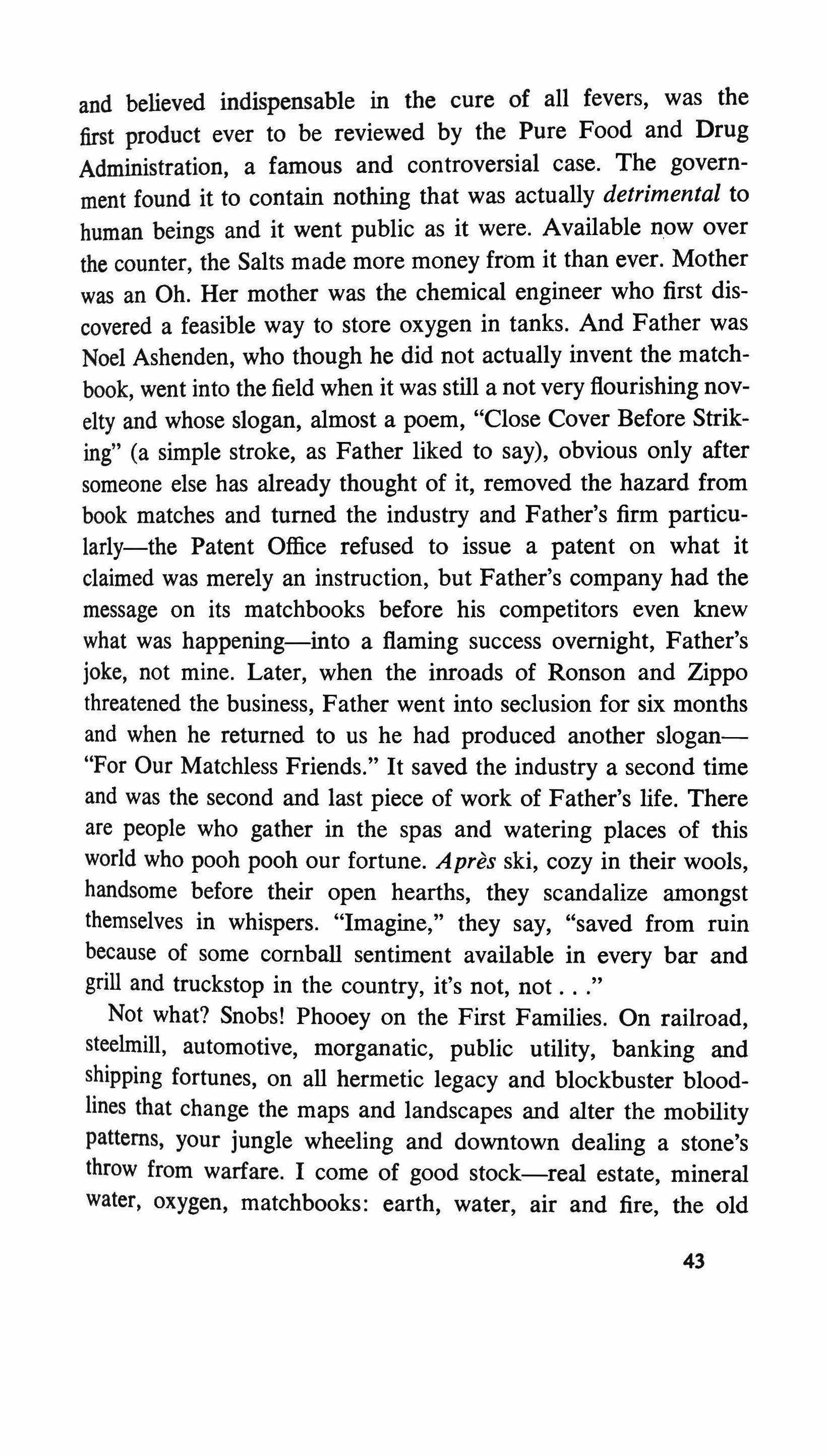
and believed indispensable in the cure of all fevers, was the first product ever to be reviewed by the Pure Food and Drug Administration, a famous and controversial case. The government found it to contain nothing that was actually detrimental to human beings and it went public as it were. Available now over the counter, the Salts made more money from it than ever. Mother was an Oh. Her mother was the chemical engineer who first discovered a feasible way to store oxygen in tanks. And Father was Noel Ashenden, who though he did not actually invent the matchbook, went into the field when it was still a not very flourishing novelty and whose slogan, almost a poem, "Close Cover Before Striking" (a simple stroke, as Father liked to say), obvious only after someone else has already thought of it, removed the hazard from book matches and turned the industry and Father's firm particularly-the Patent Office refused to issue a patent on what it claimed was merely an instruction, but Father's company had the message on its matchbooks before his competitors even knew what was happening-into a flaming success overnight, Father's joke, not mine. Later, when the inroads of Ronson and Zippo threatened the business, Father went into seclusion for six months and when he returned to us he had produced another slogan"For Our Matchless Friends." It saved the industry a second time and was the second and last piece of work of Father's life. There are people who gather in the spas and watering places of this world who pooh pooh our fortune. Apres ski, cozy in their wools, handsome before their open hearths, they scandalize amongst themselves in whispers. "Imagine," they say, "saved from ruin because of some cornball sentiment available in every bar and grill and truckstop in the country, it's not, not "
Not what? Snobs! Phooey on the First Families. On railroad, steelmill, automotive, morganatic, public utility, banking and shipping fortunes, on all hermetic legacy and blockbuster bloodlines that change the maps and landscapes and alter the mobility patterns, your jungle wheeling and downtown dealing a stone's throw from warfare. I come of good stock-real estate, mineral water, oxygen, matchbooks: earth, water, air and fire, the old
43
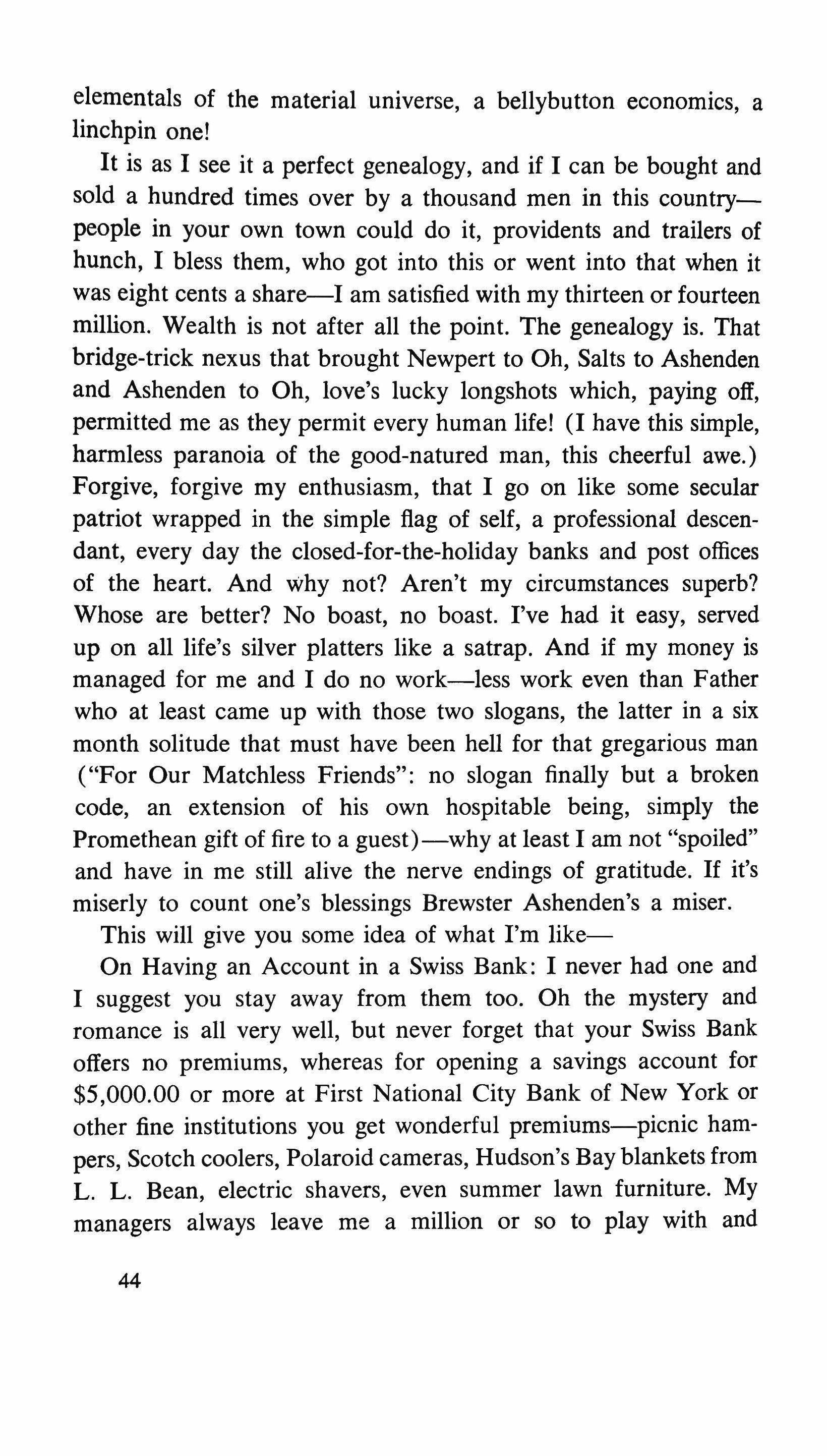
elementals of the material universe, a bellybutton economics, a linchpin one!
It is as 1 see it a perfect genealogy, and if 1 can be bought and sold a hundred times over by a thousand men in this countrypeople in your own town could do it, providents and trailers of hunch, 1 bless them, who got into this or went into that when it was eight cents a share--I am satisfied with my thirteen or fourteen million. Wealth is not after all the point. The genealogy is. That bridge-trick nexus that brought Newpert to Oh, Salts to Ashenden and Ashenden to Oh, love's lucky longshots which, paying off, permitted me as they permit every human life! (I have this simple, harmless paranoia of the good-natured man, this cheerful awe.) Forgive, forgive my enthusiasm, that I go on like some secular patriot wrapped in the simple flag of self, a professional descendant, every day the c1osed-for-the-holiday banks and post offices of the heart. And why not? Aren't my circumstances superb? Whose are better? No boast, no boast. I've had it easy, served up on all life's silver platters like a satrap. And if my money is managed for me and 1 do no work-less work even than Father who at least came up with those two slogans, the latter in a six month solitude that must have been hell for that gregarious man ("For Our Matchless Friends": no slogan finally but a broken code, an extension of his own hospitable being, simply the Promethean gift of fire to a guest)-why at least 1 am not "spoiled" and have in me still alive the nerve endings of gratitude. If it's miserly to count one's blessings Brewster Ashenden's a miser. This will give you some idea of what I'm like-
On Having an Account in a Swiss Bank: I never had one and 1 suggest you stay away from them too. Oh the mystery and romance is all very well, but never forget that your Swiss Bank offers no premiums, whereas for opening a savings account for $5,000.00 or more at First National City Bank of New York or other fine institutions you get wonderful premiums-picnic hampers, Scotch coolers, Polaroid cameras, Hudson's Bay blankets from L. L. Bean, electric shavers, even summer lawn furniture. My managers always leave me a million or so to play with and
44

this is how I do it. I suppose I've received hundreds of such bonuses. Usually I give them to friends or as gifts at Christmas to doormen and other loosely connected personnel of the household, but often I keep them and use them myself. I'm not stingy. Of course I can afford to buy these things-and I do, I enjoy making purchases-but somehow nothing brings the joy of existence home to me more than these premiums. Something for nothing-the two-suiter from Chase Manhattan and my own existence, luggage a bonus and life a bonus, too. Like having a film star next to you on your flight from the Coast. There are treats of high order, adventure like cash in the street.
Let's enjoy ourselves I say. Let's have fun. Lord, let us live in the sand by the surf of the sea and play till cows come home. We'll have a house on the Vineyard and a brownstone in the seventies and a pied-a-terre in a world capital when something big is breaking. (Put the Cardinal in the back bedroom where the sun gilds the bay at afternoon tea and give us the courage to stand up to secret police at the door, to top all threats with threats of our own, the nicknames of mayors and ministers, the fast comeback at the front stairs, authority on us like the funny squiggle the counterfeiters miss.) Re-Columbus us. Engage us with the overlooked, a knowledge of optics say, or a gift for the tides. (My pal, the heir to most of the vegetables in inland Nebraska, has become a superb amateur oceanographer. The marine studies people invite him to Wood's Hole each year. He has a wave named for him.) Make us good at things, the counter-tenor and the German lenguage, and teach us to stand up as easily in our amateur standing as the best man at a roommate's wedding. Give us hard tummies behind the cummerbund and long swimmer's muscles under the hound's tooth so that we may enjoy our long life. And may all our stocks rise to the occasion of our best possibilities and our humanness be bullish, too.
Speaking personally I am glad to be a heroic man.
I am pleased that I am attractive to women but grateful I'm no bounder. Though I'm touched when married women fall in love with me, as frequently they do, I am rarely, I think, to blame.
45

I never encourage these fits and do my best to get them over their derangements so as not to lose the friendship of their husbands when they are known to me or the neutral friendship of the ladies themselves. This happens less than you might think, however, for whenever I am a houseguest at the home of a married friend I always make it a point to bring a girl along. These girls are from all walks of life-models, showgirls, starlets, actresses, tennis professionals, singers, heiresses and the daughters of the diplomats of most of the nations of the free world. All walks. They tend, however, to conform to a single physical type, and are almost always tall, tan, slender and blonde, the girl from Ipanema as a wag friend of mine has it. They are always sensitive and intelligent and good at sailing and the Australian crawl. They are never blemished in any way, for even something like a tiny beauty mark on the inside of a thigh or above the shoulder blade is enough to tum me off, and their breaths must be as sweet at three in the morning as they are at noon. (I never see a woman who is dieting for diet sours the breath.) Arm hair, of course, is repellent to me though a soft blonde down is now and then acceptable. I know 1 sound a prig. I'm not. I am, well, classical, drawn by perfection as to some magnetic, Platonic pole, idealism and beauty's true North.
But if I'm demanding as regards the type I fall in love withI do fall in love, I'm not Don Juan-I try to be charming to all women, the flawed as well as the unflawed. I know that times have changed and that less is expected of gentlemen these days, that there's more "openness" between the sexes and that this is, in the main, a healthy development. Still, in certain respects I am old fashioned, I'm the first to admit it, and not only find myself incapable of strong language in the presence of a lady-I rarely use it at any time, even a "damn," even a "hell"-but become enraged when someone else uses it and immediately want to call him out. I'm the same way if there's a child about or a man over the age of fifty-seven if he is not vigorous. The leopard cannot change his spots. I'm a gentleman, an opener of doors and doffer of hats and after you firster, meek in the elevator and kind to the
46

help. 1 maintain a fund which 1 use to shell out for the abortions of girls other men have gotten into trouble, or, if the young lady prefers, 1 have a heart-to-heart with the young man. And although I've no sisters 1 have a brother's temperament, all good counsel and real concern. Even without a sister of my own-or a brother either for that matter, I'm an only child-I lend an ear and do for other fellows' sisses the moral forks.
Still, there's fun in me, and danger, too. I'm this orphan now (with thirteen or fourteen million), but that's recent. Father and Mother died early this year, Mother first and Father a few days later-Father, too, was courteous to women-and I'm afraid that when they were alive 1 gave my parents some grisly moments with my exploits, put their hearts in their mouths and gray in their hair. 1 have been a fighter pilot for the RAF (I saw some action in Suez) and a mercenary on the Ria/ran side, as well as a sort of free-lance spy on some of your South American and Greek juntas. (I'm not political, but the average generalissimo cheats at cards; it's curious, I've noticed that though they steal the picture cards they rarely play them. 1 suppose it's a class thing; your military man would rather beat you with a nine than a King.) 1 am Johnny-on-the-spot at disasters-I was at Peru when the earth fell-lending a hand, pulling my oar, the sort of man who knocks your teeth out if he catches you abusing the water ration in the lifeboat and then turns around and offers his own meager mouthful to a woman or a man over fifty-seven. Chavez is my friend and the Chicago Seven, though 1 had to stop seeing them because of the foul language. (I love Jerry Rubin too much to tear his head off, and 1 saw that's what it would come to.) And here and there 1 have had Mafioso for friends-wonderful family men the Cosa Nostra, 1 respect that-and the Astronauts of course. 1 spent a weightless week-end with them in an anti-gravity chamber in Houston one time, coming down only to take a long distance phone call from a girl in trouble. And, let's see, sixty hours in the bathysphere with Cousteau, fathoms below where the ordinary fish run. So 1 have been weightless and 1 have been gravid, falling in free-fall like a spider down its filament and
47
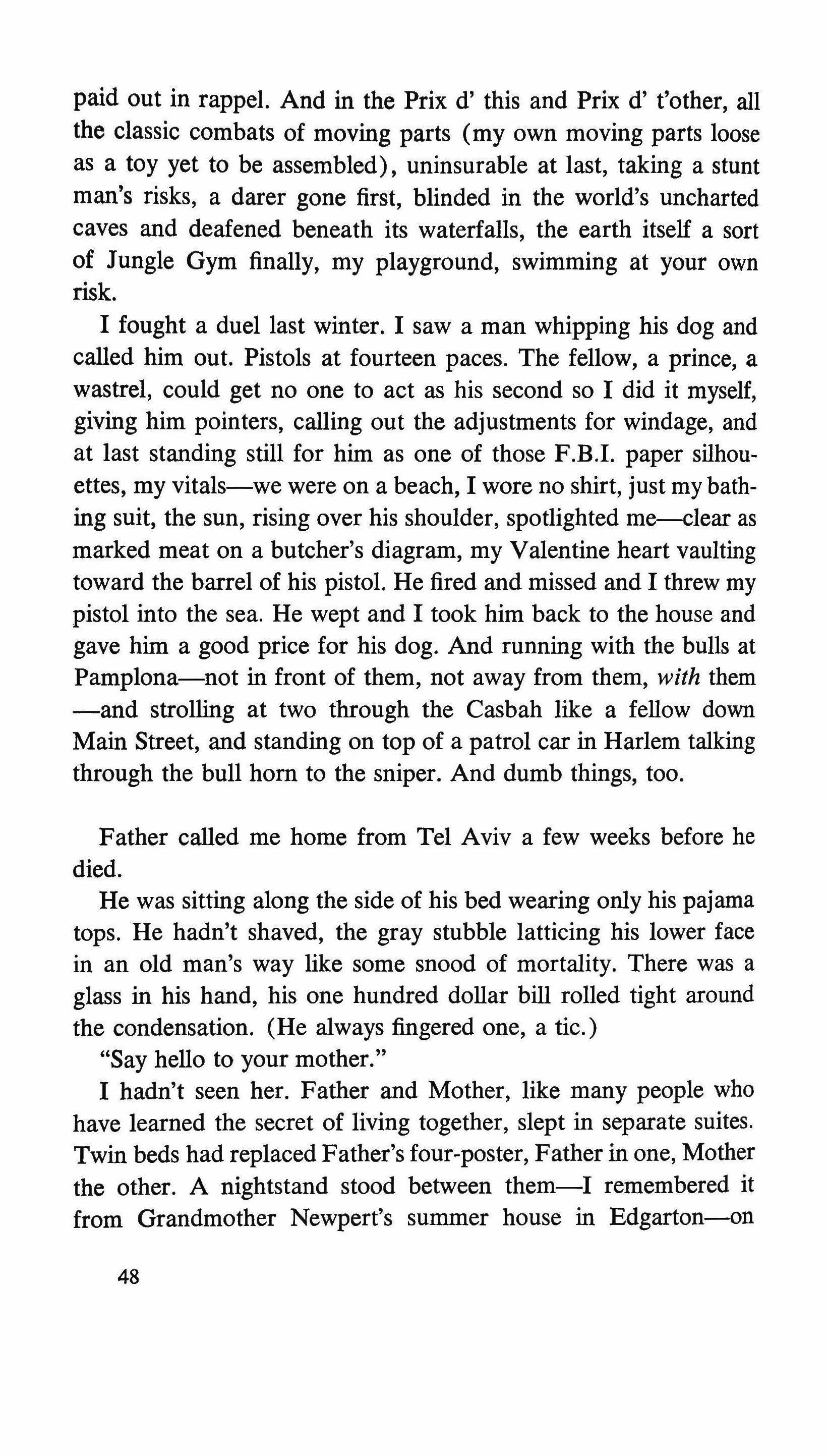
paid out in rappel. And in the Prix d' this and Prix d' t'other, all the classic combats of moving parts (my own moving parts loose as a toy yet to be assembled), uninsurable at last, taking a stunt man's risks, a darer gone first, blinded in the world's uncharted caves and deafened beneath its waterfalls, the earth itself a sort of Jungle Gym finally, my playground, swimming at your own risk.
I fought a duel last winter. I saw a man whipping his dog and called him out. Pistols at fourteen paces. The fellow, a prince, a wastrel, could get no one to act as his second so I did it myself, giving him pointers, calling out the adjustments for windage, and at last standing still for him as one of those F.B.I. paper silhouettes, my vitals-we were on a beach, I wore no shirt, just my bathing suit, the sun, rising over his shoulder, spotlighted me-clear as marked meat on a butcher's diagram, my Valentine heart vaulting toward the barrel of his pistol. He fired and missed and I threw my pistol into the sea. He wept and I took him back to the house and gave him a good price for his dog. And running with the bulls at Pamplona-not in front of them, not away from them, with them -and strolling at two through the Casbah like a fellow down Main Street, and standing on top of a patrol car in Harlem talking through the bull hom to the sniper. And dumb things, too.
Father called me home from Tel Aviv a few weeks before he died.
He was sitting along the side of his bed wearing only his pajama tops. He hadn't shaved, the gray stubble latticing his lower face in an old man's way like some snood of mortality. There was a glass in his hand, his one hundred dollar bill rolled tight around the condensation. (He always fingered one, a tic.)
"Say hello to your mother."
I hadn't seen her. Father and Mother, like many people who have learned the secret of living together, slept in separate suites. Twin beds had replaced Father's four-poster, Father in one, Mother the other. A nightstand stood between them-I remembered it from Grandmother Newpert's summer house in Edgarton-on
48
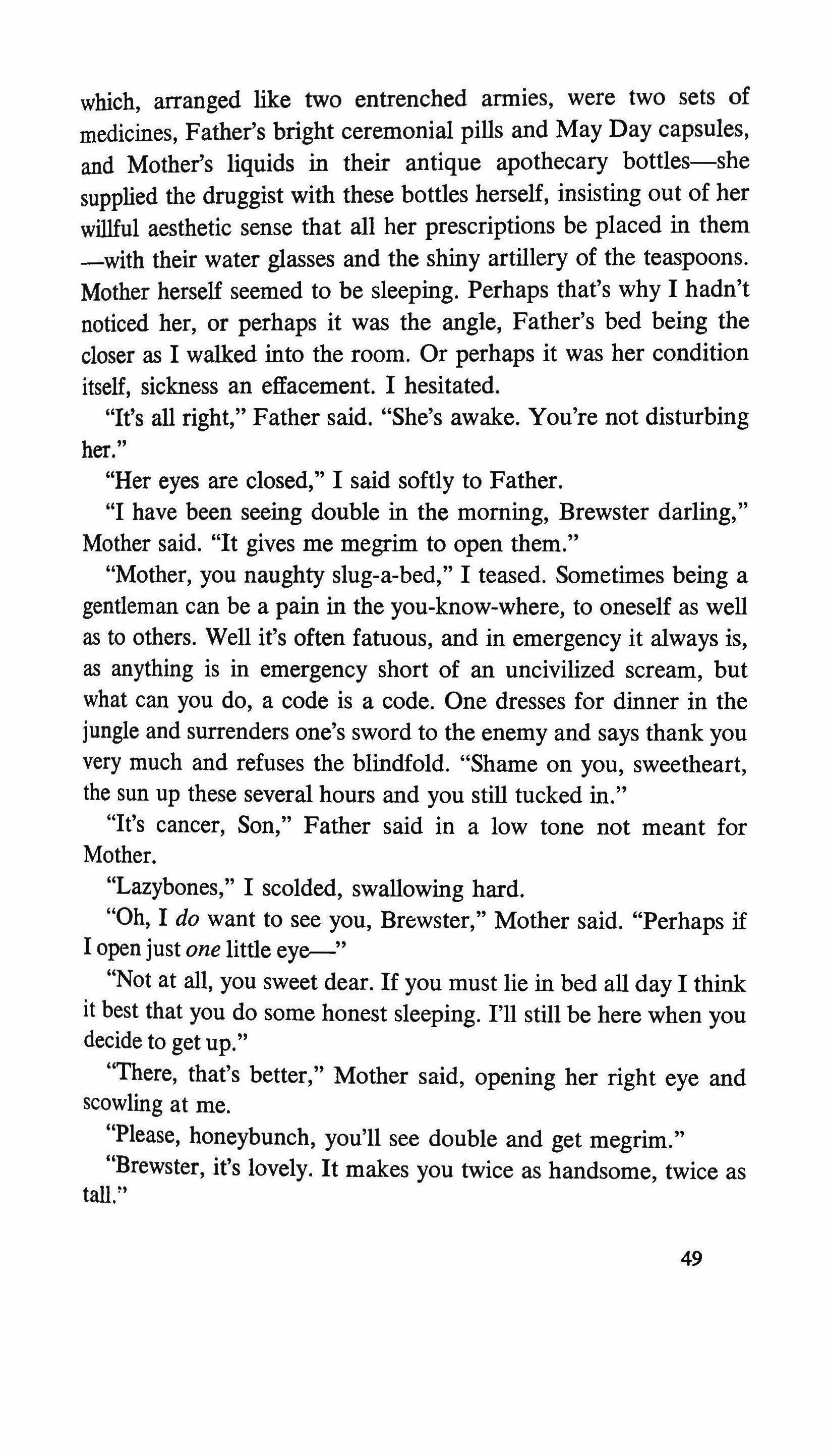
which, arranged like two entrenched armies, were two sets of medicines, Father's bright ceremonial pills and May Day capsules, and Mother's liquids in their antique apothecary bottles-she supplied the druggist with these bottles herself, insisting out of her willful aesthetic sense that all her prescriptions be placed in them -with their water glasses and the shiny artillery of the teaspoons. Mother herself seemed to be sleeping. Perhaps that's why I hadn't noticed her, or perhaps it was the angle, Father's bed being the closer as I walked into the room. Or perhaps it was her condition itself, sickness an effacement. I hesitated.
"It's all right," Father said. "She's awake. You're not disturbing her."
"Her eyes are closed," I said softly to Father.
"I have been seeing double in the morning, Brewster darling," Mother said. "It gives me megrim to open them."
"Mother, you naughty slug-a-bed," I teased. Sometimes being a gentleman can be a pain in the you-know-where, to oneself as well as to others. Well it's often fatuous, and in emergency it always is, as anything is in emergency short of an uncivilized scream, but what can you do, a code is a code. One dresses for dinner in the jungle and surrenders one's sword to the enemy and says thank you very much and refuses the blindfold. "Shame on you, sweetheart, the sun up these several hours and you still tucked in."
"It's cancer, Son," Father said in a low tone not meant for Mother.
"Lazybones," I scolded, swallowing hard.
"Oh, I do want to see you, Brewster," Mother said. "Perhaps if I open just one little eye-"
"Not at all, you sweet dear. If you must lie in bed all day I think it best that you do some honest sleeping. I'll still be here when you decide to get up."
"There, that's better," Mother said, opening her right eye and scowling at me.
"Please, honeybunch, you'll see double and get megrim."
"Brewster, it's lovely. It makes you twice as handsome, twice as tall." 49
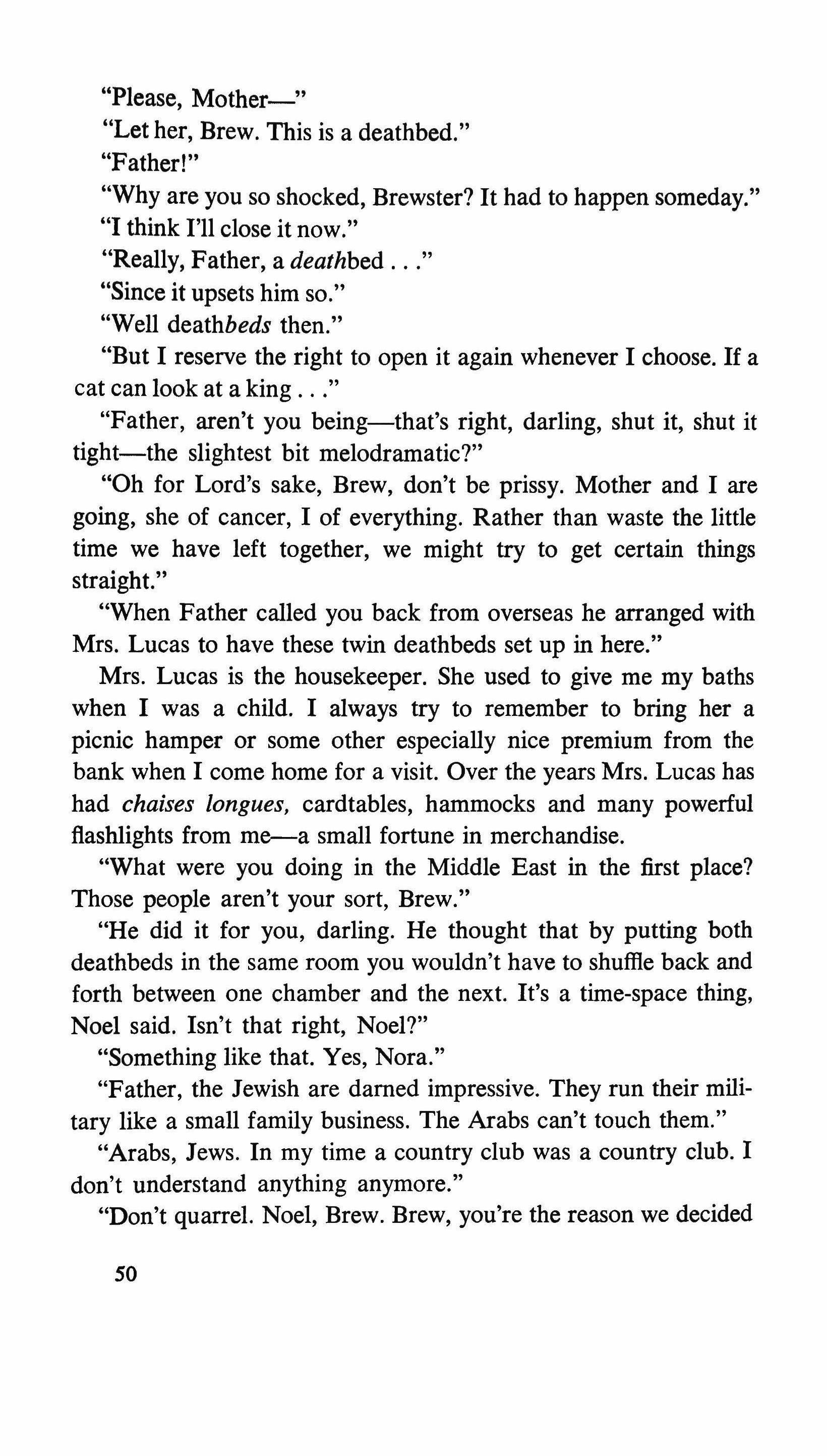
"Please, Mother-"
"Let her, Brew. This is a deathbed."
"Father!"
"Why are you so shocked, Brewster? It had to happen someday."
"I think I'll close it now."
"Really, Father, a deathbed
"Since it upsets him so."
"Well deathbeds then."
"But I reserve the right to open it again whenever I choose. If a cat can look at a king
"Father, aren't you being-that's right, darling, shut it, shut it tight-the slightest bit melodramatic?"
"Oh for Lord's sake, Brew, don't be prissy. Mother and I are going, she of cancer, I of everything. Rather than waste the little time we have left together, we might try to get certain things straight."
"When Father called you back from overseas he arranged with Mrs. Lucas to have these twin deathbeds set up in here."
Mrs. Lucas is the housekeeper. She used to give me my baths when I was a child. I always try to remember to bring her a picnic hamper or some other especially nice premium from the bank when I come home for a visit. Over the years Mrs. Lucas has had chaises longues, cardtables, hammocks and many powerful flashlights from me-a small fortune in merchandise.
"What were you doing in the Middle East in the first place? Those people aren't your sort, Brew."
"He did it for you, darling. He thought that by putting both deathbeds in the same room you wouldn't have to shuffle back and forth between one chamber and the next. It's a time-space thing, Noel said. Isn't that right, Noel?"
"Something like that. Yes, Nora."
"Father, the Jewish are darned impressive. They run their military like a small family business. The Arabs can't touch them."
"Arabs, Jews. In my time a country club was a country club. I don't understand anything anymore."
"Don't quarrel. Noel, Brew. Brew, you're the reason we decided so

to have deathbeds in the first place. Well, my family has always had them, of course. None of this hole-and-corner hospital stuff for them. I don't speak against hospitals, mind you, they're all very well if you're going to get better, but, goodness, if you're really dying it's so much more pleasant for the immediate family if they can be saved from those drafty, smelly hospital corridors. Grandmother Oh herself, though she invented the oxygen tank, refused the tent when her time came if it meant going to a hospital."
"Brr."
"Are you addressing me, Father?"
"What? No, no, I have this chill."
"Let me help you." I lifted his legs into the bed gently. I took the glass out of his hand and set it down, unpeeling the $100 bill as if it were a beer label. I placed his head back on the pillow and, smoothing the sheets, started to cover him when Father grinned.
"Close cover before striking," he said hoarsely. That broke the ice and we all laughed.
"Nothing important ever gets said in a hospital," Father said after a while. "There's too much distraction. The room, the gadgets, the flowers and who sent what, the nurses coming in for one thing or another. Nothing important gets said."
I nodded.
"Mother's right, Brewster. The deathbed has been a tradition in our family. This twin bed business is a little vulgar perhaps, but it can't be helped. We'll have a deathbed vigil. It's a leisure thing. It's elegant."
"Please, Father, let's not have any more of this morbid stuff about dying," I said, getting the upper hand on myself. "It's my notion you're both goldbricking, that you'll be out on the links again in no time, your handicap lower than ever."
"It's heart, Brew," Father said gloomily. "It's Meniere's disease. It's TB and a touch of MS that hangs on like a summer cold. It's a spot of Black Lung."
"Black Lung?"
"Do you know how many matches I've struck in my time?"
51
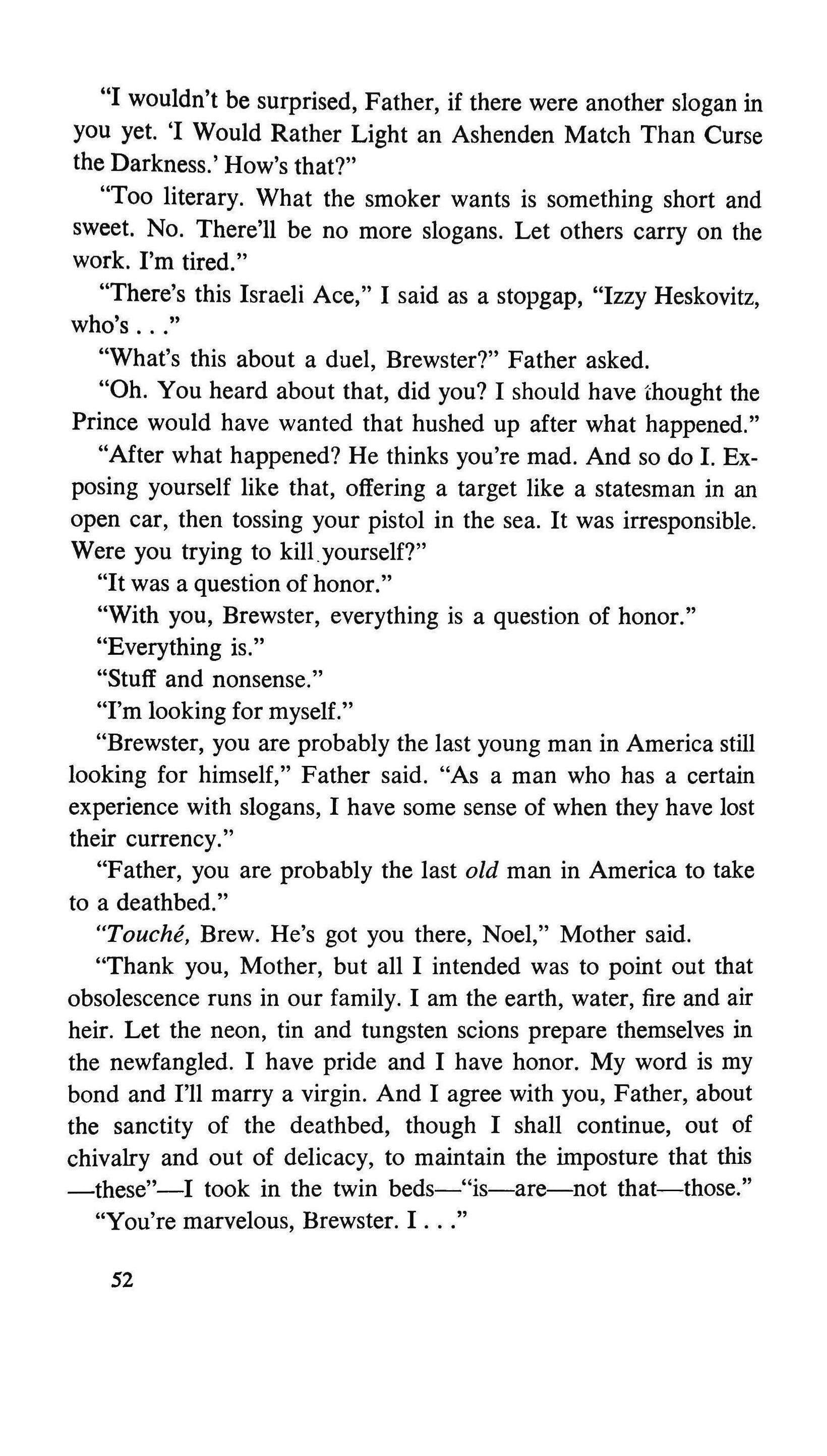
"I wouldn't be surprised, Father, if there were another slogan in you yet. 'I Would Rather Light an Ashenden Match Than Curse the Darkness.' How's that?"
"Too literary. What the smoker wants is something short and sweet. No. There'll be no more slogans. Let others carry on the work. I'm tired."
"There's this Israeli Ace," I said as a stopgap, "Izzy Heskovitz, who's
"What's this about a duel, Brewster?" Father asked.
"Oh. You heard about that, did you? I should have thought the Prince would have wanted that hushed up after what happened."
"After what happened? He thinks you're mad. And so do I. Exposing yourself like that, offering a target like a statesman in an open car, then tossing your pistol in the sea. It was irresponsible. Were you trying to kill.yourself?"
"It was a question of honor."
"With you, Brewster, everything is a question of honor."
"Everything is."
"Stuff and nonsense."
"I'm looking for myself."
"Brewster, you are probably the last young man in America still looking for himself," Father said. "As a man who has a certain experience with slogans, I have some sense of when they have lost their currency."
"Father, you are probably the last old man in America to take to a deathbed."
"Touche, Brew. He's got you there, Noel," Mother said.
"Thank you, Mother, but all I intended was to point out that obsolescence runs in our family. I am the earth, water, fire and air heir. Let the neon, tin and tungsten scions prepare themselves in the newfangled. I have pride and I have honor. My word is my bond and I'll marry a virgin. And I agree with you, Father, about the sanctity of the deathbed, though I shall continue, out of chivalry and out of delicacy, to maintain the imposture that this -these"-I took in the twin beds-"is-are-not that-those."
"You're marvelous, Brewster. I
52
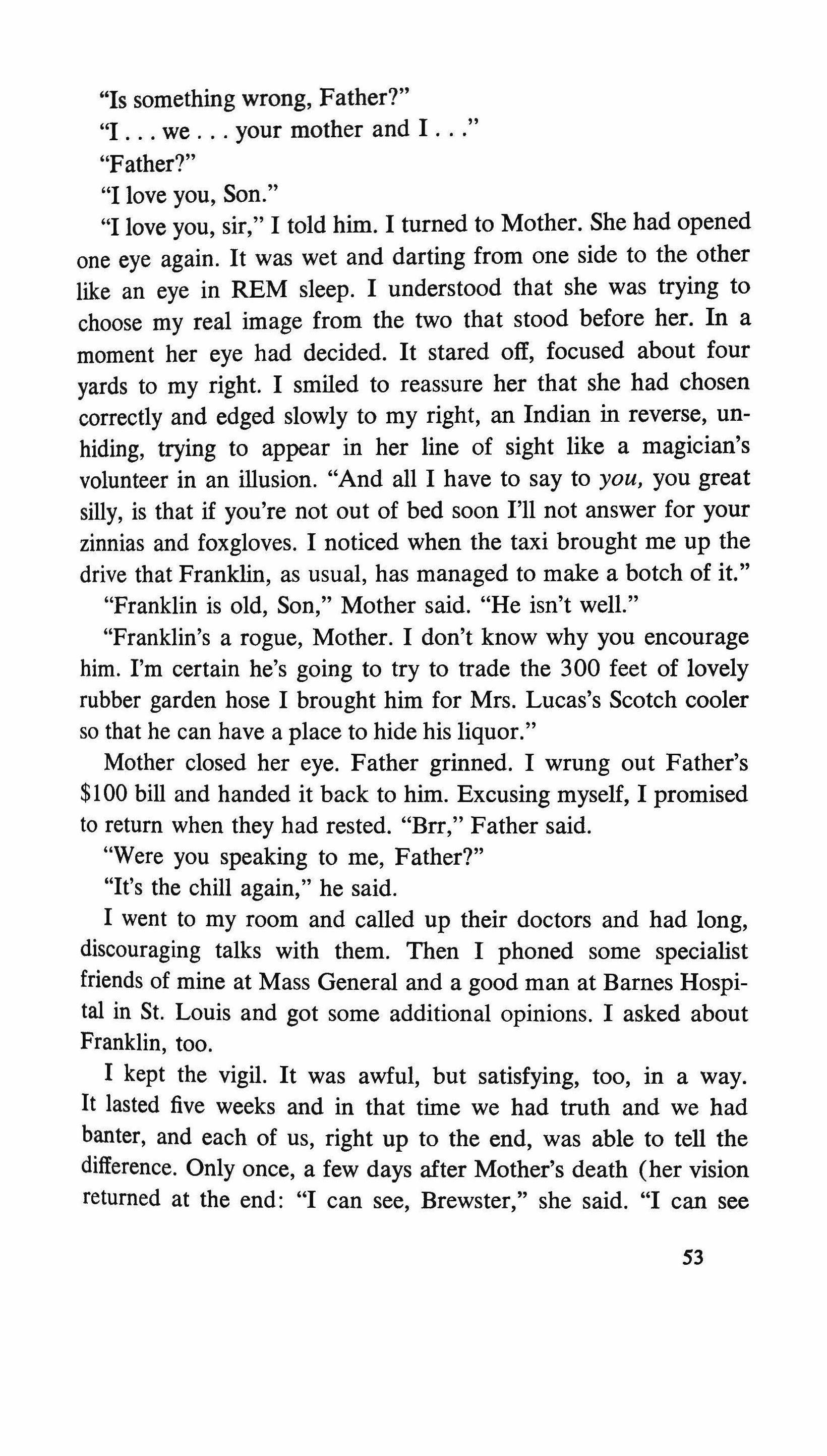
"Is something wrong, Father?"
''I we your mother and I " "Father?"
"I love you, Son."
"I love you, sir," I told him. I turned to Mother. She had opened one eye again. It was wet and darting from one side to the other like an eye in REM sleep. I understood that she was trying to choose my real image from the two that stood before her. In a moment her eye had decided. It stared off, focused about four yards to my right. I smiled to reassure her that she had chosen correctly and edged slowly to my right, an Indian in reverse, unhiding, trying to appear in her line of sight like a magician's volunteer in an illusion. "And all I have to say to you, you great silly, is that if you're not out of bed soon I'll not answer for your zinnias and foxgloves. I noticed when the taxi brought me up the drive that Franklin, as usual, has managed to make a botch of it."
"Franklin is old, Son," Mother said. "He isn't well."
"Franklin's a rogue, Mother. I don't know why you encourage him. I'm certain he's going to try to trade the 300 feet of lovely rubber garden hose I brought him for Mrs. Lucas's Scotch cooler so that he can have a place to hide his liquor."
Mother closed her eye. Father grinned. I wrung out Father's $100 bill and handed it back to him. Excusing myself, I promised to return when they had rested. "BIT," Father said.
"Were you speaking to me, Father?"
"It's the chill again," he said.
I went to my room and called up their doctors and had long, discouraging talks with them. Then I phoned some specialist friends of mine at Mass General and a good man at Barnes Hospital in St. Louis and got some additional opinions. I asked about Franklin, too.
I kept the vigil. It was awful, but satisfying, too, in a way. It lasted five weeks and in that time we had truth and we had banter, and each of us, right up to the end, was able to tell the difference. Only once, a few days after Mother's death (her vision returned at the end: "I can see, Brewster," she said. "I can see
S3

far and 1 can see straight"; these were not her last words; I'll not tell you her last words for they were meant only for Father and myself, though 1 have written them down elsewhere to preserve for my children should 1 ever have them) did Father's spirits flag. He had gotten up from his bed to attend the funeralthrough a signal courtesy to an out-of-stater, the Governor of Massachusetts permitted Mother to be buried on Copp's Hill Burying Ground near the Old North Church in Boston-and we had just come back together into the house. Mrs. Lucas and Franklin were weeping and 1 helped Father upstairs and back into his deathbed. He was too weak just then to try to get his pajamas on. "You know, Brew," he said, "I sure wish you hadn't thrown that damned pistol into the ocean."
"Oh Father," 1 said, "never mind. Tomorrow when you're stronger we'll go to town and buy a fresh brace and stroll the woods and shoot the birds from their trees just as we used to."
He was dead in his own tree a few days later. 1 sensed it coming and had moved into the room with him where 1 lay next to him all night in the twin bed, only Grandmother Newpert's nightstand between us-Mother's effects, the lovely old apothecary bottles and her drinking glass and medicine spoons having been cleared away. I was awake the entire night, hanging on his broken breath and old man's groans like a detective in films on the croaks of a victim. I listened for a message from the coma and tried to parse delirium as if it were only a sort of French. Shall a man of honor and pride still searching for himself in his late thirties deny the sybil in a goner's gasps? (I even asked one or two questions, pressing him in his terminal pain, pursuing him through the mazes of his dissolution, his deathbed my Ouija board.) Then, once, just before dawn, a bird twittered in the garden and Father came out of it. For fifteen minutes he talked sense, speaking rapidly and with an astonishing cogency that was more mysterious somehow than all his moans and nightmares. He spoke of ways to expedite the probating of the two wills, of flaws in the nature of his estate, instructing me where to consolidate and where to trim. He told me the names of what lawyers to trust, which
S4
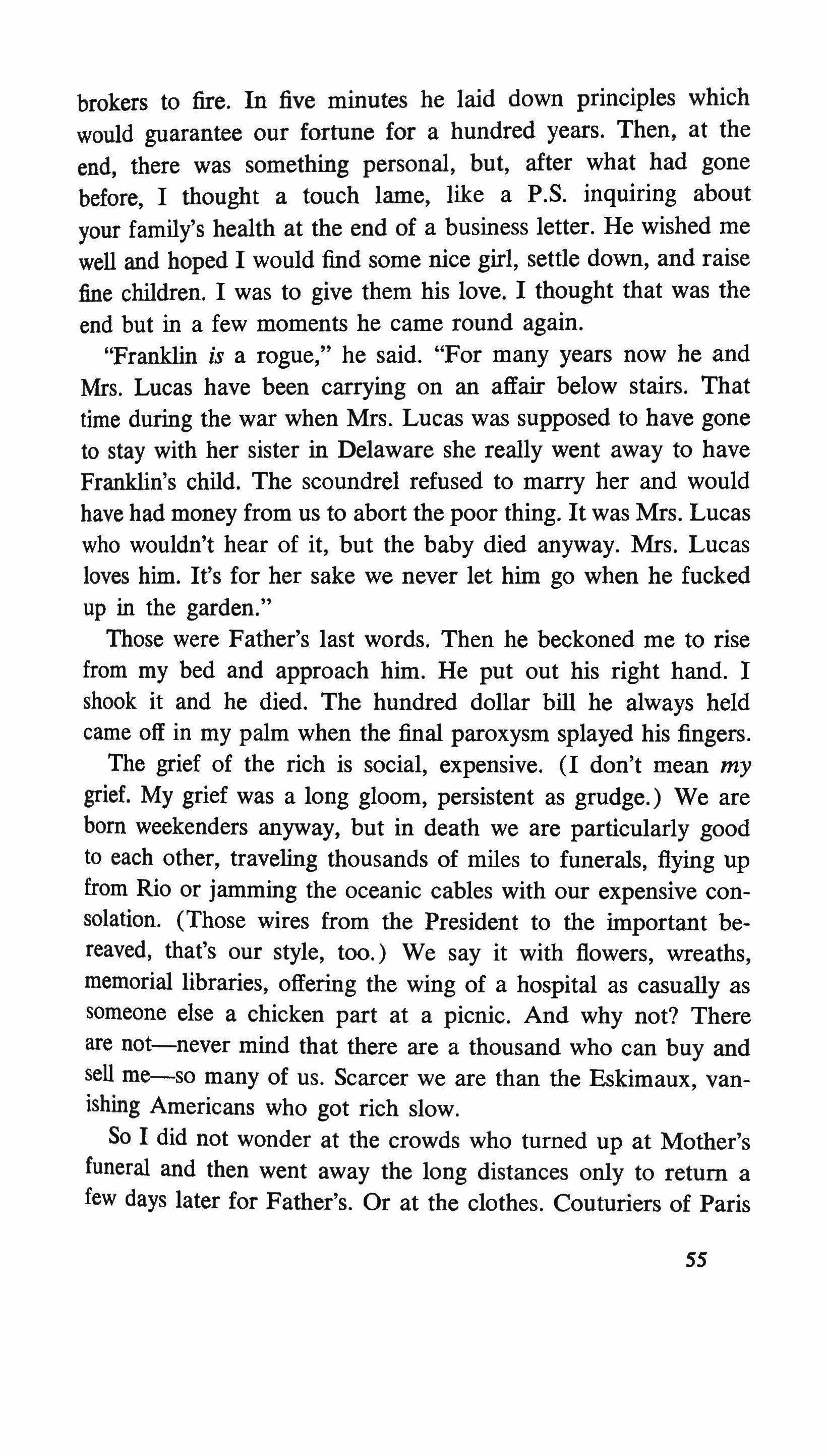
brokers to fire. In five minutes he laid down principles which would guarantee our fortune for a hundred years. Then, at the end, there was something personal, but, after what had gone before, I thought a touch lame, like a P.S. inquiring about your family's health at the end of a business letter. He wished me well and hoped I would find some nice girl, settle down, and raise fine children. I was to give them his love. I thought that was the end but in a few moments he came round again.
"Franklin is a rogue," he said. "For many years now he and Mrs. Lucas have been carrying on an affair below stairs. That time during the war when Mrs. Lucas was supposed to have gone to stay with her sister in Delaware she really went away to have Franklin's child. The scoundrel refused to marry her and would have had money from us to abort the poor thing. It was Mrs. Lucas who wouldn't hear of it, but the baby died anyway. Mrs. Lucas loves him. It's for her sake we never let him go when he fucked up in the garden."
Those were Father's last words. Then he beckoned me to rise from my bed and approach him. He put out his right hand. I shook it and he died. The hundred dollar bill he always held came off in my palm when the final paroxysm splayed his fingers.
The grief of the rich is social, expensive. (I don't mean my grief. My grief was a long gloom, persistent as grudge.) We are born weekenders anyway, but in death we are particularly good to each other, traveling thousands of miles to funerals, flying up from Rio or jamming the oceanic cables with our expensive consolation. (Those wires from the President to the important bereaved, that's our style, too.) We say it with flowers, wreaths, memorial libraries, offering the wing of a hospital as casually as someone else a chicken part at a picnic. And why not? There are not-never mind that there are a thousand who can buy and sell me--so many of us. Scarcer we are than the Eskimaux, vanishing Americans who got rich slow.
So I did not wonder at the crowds who turned up at Mother's funeral and then went away the long distances only to return a few days later for Father's. Or at the clothes. Couturiers of Paris ss

and London and New York-those splendid cities, listed always together and making a sound on the page like a label on scent-taxed to the breaking point to come up with dresses in death's delicious high fashion, the rich taking big casualties that season, two new mourning originals in less than two weeks and the fitter in fits. The men splendid in their decent dark. Suits cunningly not black, off black, proper, the longitudes of their decency in their wiry pinstripes, a gent's torso bound up in vest and crisscrossed by watch chains and Phi Beta Kappa keys in the innocent para-militarism of the civilian respectable, men somehow more vital at the graveside in the burdensome clothes than in Bermudas on beaches or dinner jackets in hotel suites with cocktails in their hands, a woman on the bedspread and the band playing on the beach and the telephone ringing. All the women were beautiful, gorgeous, grieving's colors good for them, aloof mantles which made them seem-though I knew better-unattainable, virgins again yet sexy still as secret drinkers. God, how I lusted when I was with them! I could barely put two words together for them or accept their condolences without feeling my importunate, inopportune blood thicken, my senses ticklish as if the Persian whores had gotten to them. Adding to my gloom of course, dishonoring my parents in their death as I never had while they lived.
Only the necessity to cope saved me from some sacrilege. (Oh the confidence of lust! Surely that's the basis of its evil. The assumptions it permits one, glossing reality like a boy in the dark, touching himself and thinking of his mother's bridge guests.) Somehow, however, I managed to see my tailor, somehow got the arrangements made, somehow wrote the necessary checks and visited the near-at-hand safety deposit boxes before they were red-flagged, somehow got through the inventories, spoke to the obituary people at The Times, prepared the eulogies somehow, and fielded all the questions of the well-meaning that are asked at times like these.
"Will there be a Foundation, do you suppose, Ashenden?" asked an old friend of the family who had himself been an heir
56

for as long as we had known him. (And oh, the effect of that "Ashenden"! It was the first time one had been thus addressed, at least officially, since one's roommates at prep school and college, thinking of their own inheritances, had used it to try on.)
"I don't know, sir. It's too early to tell. I shall have to wait until the estate is properly probated before I can be certain what there is."
"Of course, of course," he said, "but it's never too soon to start thinking about a Foundation, fixing your goals."
"Yes, sir."
"Let me give you a little advice on that score. The Arts. There are those who swear by diseases and the various social ills, but I'm not one of them. And of the Arts I think the performing arts give you your best return. You get invited backstage."
"I'll have to look into it."
"Look into it."
And one of Mother's friends wondered if marriage was in the offing.
"Now you really are eligible, Brewster," she said. "Oh you were before, of course, but now you must certainly feel a bit of pressure to put your affairs in order and begin to think about the next generation."
It was a rude thing to say (although something like these had been almost Father's last words to me), but the truth was I did feel it. Perhaps that was what my shameful lust had been about, nature's way of pointing me to my duty. My search for myself seemed trivial child's play now. Honor did subsist in doing right by the generations. I know what you're thinking: Who's this imposter, this namby with no will of his own? If he's so rich, why ain't he smart? Meaning glacial, indifferent, unconscious of the swath of world he cuts as the blade of what it leaves bleeding-the cosmos as rich man's butter pat. Listen, disdain's easy, a mug's game, but look once close at anything and you'll break your heart.
I was inconsolable, grave at the graveside, beside myself like a fulfillment of Mother's prophetic double-vision.
"People lose parents," a Securities and Exchange Commission
57

cousin told me. (Yes yes, it's nothing, only Nature bottoming out.) "Sons lose mothers," he said, his gray hair, trimmed that morning, wet looking. "Fathers die."
"Don't look," I said wildly, "shut an eye, I am beside myself." I keened like a widow, a refugee from hardest times, a daughter with the Cossacks, a son chopped in the thresher. I would go about in black, I thought, and be superstitious. My features will thicken and no one will know how old I am.
"There there," he told me, "there there."
"There there. There there," said this one and that one.
My pals did not know what to make of me.
"My God, Ashenden," one said, a roommate from prep school, "have you seen the will? Is it awful?"
"I've been left everything," I told him coolly.
He nudged me in the ribs. I would have called him out had I not been in mourning.
Only the sight of Mrs. Lucas saved me. The thought of that brave woman's travail enabled me to control myself at last. I no longer wept openly and settled into a silent, standoffish grimness, despair like an ingrown toenail on a man of fashion. The weekends began.
All my adult life I have been a guest in other people's houses, following the sun and seasons like a migratory bird, an instinct in me, the rich man's cunning feel for ripeness, some oyster-in-an-"r"-month notion working there which knows without reference to anything outside itself when to pack the tennis press, when to bring along the German field glasses to look at a friend's birds, the telescope to stare at his stars, the rubber suit to swim in beneath his waters when the exotic fish are running. It's not in The Times when the black dinner jacket comes off and the white one goes on. It's something surer, subtler, the delicate guidance system of the privileged, my playboy astronomy.
The weekends began, and the midweeks and week and two week stretches in the country. I was very grateful to my friends' sense of what I needed then. Where before I was welcome I was
58

now-willingly-pursued. My friends were marvelous. And not a mean motive between them. If I can't say as much for myself. In the luggage now with the bandboxes of equipment, the rider's boots and touch footballs and hiker's gear, was a lover's wardrobe, shirts like the breasts of birds, custom ties that camouflaged themselves against their backgrounds or stood out like dye in the sea, ascots like bunting for the throat's centennial, the handmade jackets and perfect trousers and tack room leathers. I dressed to kill, slay should I meet her, the mother of my children. (These were my mourning togs, mind.) And if I brought the best that could be had it was not out of vanity but only respect for that phantom girl who would be so exquisite herself, so refined and blessed with taste that it would have been as dangerous for her to look at the undistinguished as for another to stare directly into the eclipse. So it was actually humility that made me dress as I did, simple self-effacement, the old knight's old modesty, shyness so capitulative prostration was only a kind of militant attention, a death defying leap to the earth. And since I had never met her, nor knew her name, nor had a clue to where she might be hanging out, I traveled alone, for the first time taking along no guest of the guest. Which my friends put down to decency, the 30 or 60 or 90 days celibacy of the orphaned. Though it wasn't that. It was a strange period of my life. My friends, innocent of my intentions, and honoring what they supposed to be my bereavement, omitted to invite any girls for me at all and I found myself on this odd bachelor circuit, several times meeting the same male house guest I had met at someone else's a few weeks before. We crossed each other's paths like traveling salesmen with identical territories. And I rode and hunted and fished and stayed up all hours playing whist or backgammon or chess with my hosts or the other male guest, settled before fires with sherry and cognac, oddly domestic, as if what lowed the generations was a debt already paid, a trip in the time machine, keeping late hours in libraries until the odor of leather became actually offensive to me. Those few times I retired early it was on my host's instructions. (I am an obedient guest.) The next morning there was to
S9
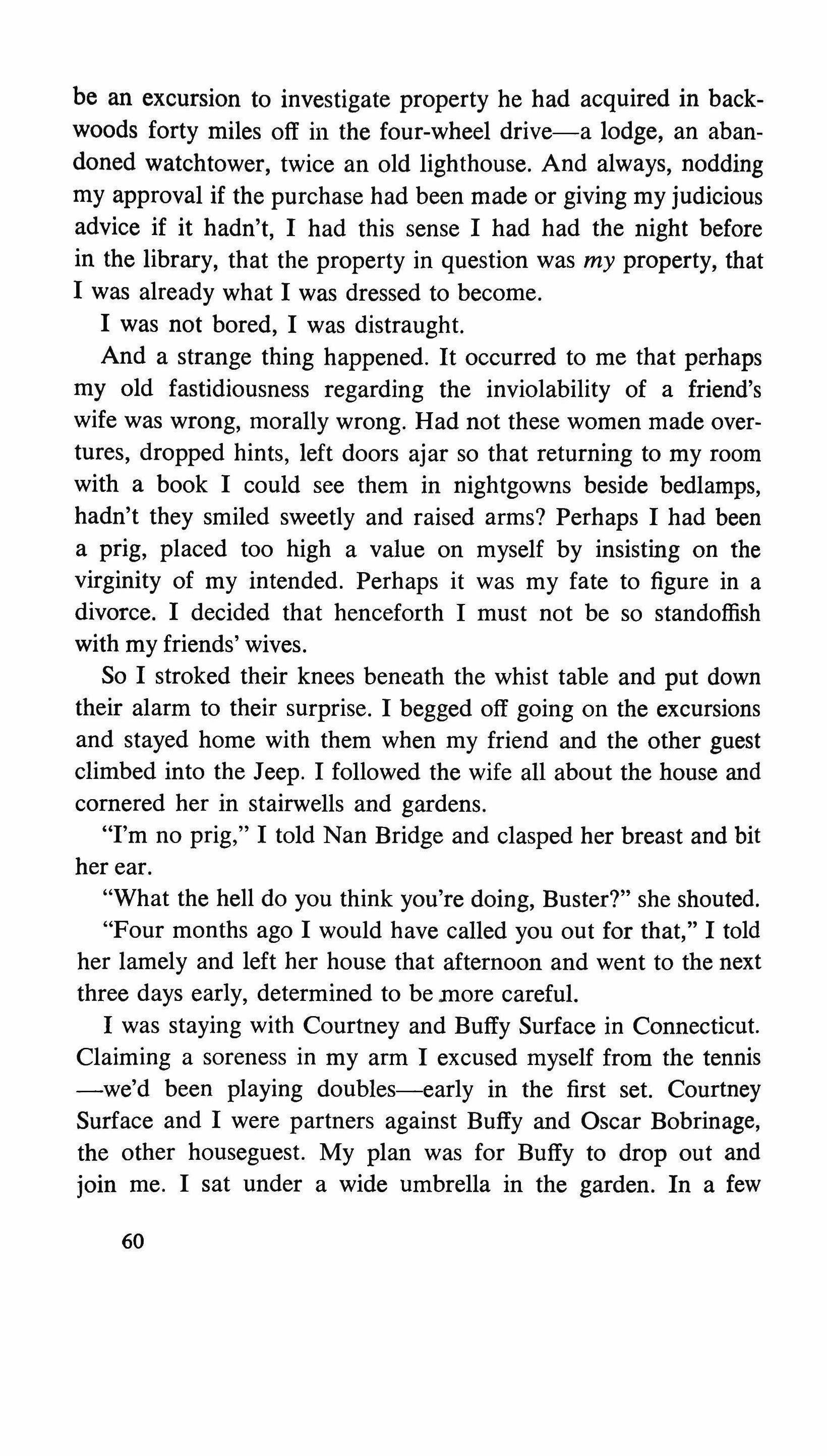
be an excursion to investigate property he had acquired in backwoods forty miles off in the four-wheel drive-a lodge, an abandoned watchtower, twice an old lighthouse. And always, nodding my approval if the purchase had been made or giving my judicious advice if it hadn't, I had this sense I had had the night before in the library, that the property in question was my property, that I was already what I was dressed to become.
I was not bored, I was distraught.
And a strange thing happened. It occurred to me that perhaps myoId fastidiousness regarding the inviolability of a friend's wife was wrong, morally wrong. Had not these women made overtures, dropped hints, left doors ajar so that returning to my room with a book I could see them in nightgowns beside bedlamps, hadn't they smiled sweetly and raised arms? Perhaps I had been a prig, placed too high a value on myself by insisting on the virginity of my intended. Perhaps it was my fate to figure in a divorce. I decided that henceforth I must not be so standoffish with my friends' wives.
So I stroked their knees beneath the whist table and put down their alarm to their surprise. I begged off going on the excursions and stayed home with them when my friend and the other guest climbed into the Jeep. I followed the wife all about the house and cornered her in stairwells and gardens.
"I'm no prig," I told Nan Bridge and clasped her breast and bit her ear.
"What the hell do you think you're doing, Buster?" she shouted.
"Four months ago I would have called you out for that," I told her lamely and left her house that afternoon and went to the next three days early, determined to be more careful.
I was staying with Courtney and Buffy Surface in Connecticut.
Claiming a soreness in my arm I excused myself from the tennis -we'd been playing doubles-early in the first set. Courtney Surface and I were partners against Buffy and Oscar Bobrinage, the other houseguest. My plan was for Buffy to drop out and join me. I sat under a wide umbrella in the garden. In a few
60

minutes someone came up behind me. "Where does it hurt? I'll rub it for you."
"No thank you, Oscar."
"No trouble, Brewster."
"I've a heating pad from Chase Manhattan in my suitcase, Osc," I told him dejectedly.
That night I was more obvious. I left the library and mentioned as casually as I could that I was going out for a bit of air. It has been my observation that the predisposition for encounter precedes encounter, that one must set oneself as one would a table. I never stroll the strand in moonlight except I'm about the heart's business, or cross bridges toward dawn unless I mean to save the suicides. There are natural laws, magnetism. A wish pulls fate.
I was passing the gazebo and wondering about the colors of the flowers in the dark, the queer consolidation of noon's bright pigment, yellow sunk in on yellow a thousand times as if struck by gravity. I thought of popular songs, their tunes and words. I meant for once to do away with polite conversation should Buffy appear, to stun her with my need and force. (Of all my friends Buffy was the most royally aloof. She had maddening ways of turning aside any question or statement that was the least bit threatening.) I heard the soft crunch of gravel.
"Oscar?"
"No, it's Buffy. Were you looking for Oscar?"
"I thought he might be looking for me."
"Quel ioli," Buffy said. She knew the idioms of eleven modem languages. I gazed into her eyes.
"How are you and Courtney, Buffy?"
"Mon Dieul lQue pasa? II est onze heures et demi;" she said.
"BufJy, how are you and Courtney?"
"Courtney's been off erythromycin five days now and General Parker says there's no sign of redness. God bless wonder drugs. Darauf kannst du Gift nehmen,"
"Do you ever think of Madrid, Buffy?" Once, in a night club In Madrid on New Year's Eve she had kissed me. It was before she
61

and Courtney met, but my memory of such things is long lasting and profound. I never forget the blandest intimacy. "Do you?"
"Oh, Brewster, I have every hope that when Juan Carlos is restored the people will accept him."
"Buffy, we kissed each other on New Year's Eve in Madrid in 1966 before you ever heard of Courtney Surface."
"Autres temps, autres moeurs,"
"I can't accept that, Buff. Forgive me, dear, but when I left the game this morning you stayed behind to finish out the set against Courtney. Yes and before that you were Oscar's partner. Doesn't that indicate to you a certain aberrant competitiveness between you and your husband?"
"Oh, but darling, we play for money. Pisica bldndii pgarie rau. Didn't you know that? We earn each other's birthday presents. We've an agreement. We don't buy a gift unless we win the money for it from the other fellow. I'll tell you something, entre nous. I get ripped off because I throw games. I do. I take dives. I go into the tank. Damit kannst du keinen Blumentopf verlieren. Isn't that awful? Aren't I terrible? But that's how Courtney got the money together to buy me Nancy's Treehouse. Have you seen her? She's the most marvelous beast. I was just going out to the stables to check on her when I ran into you. If you'd like to accompany me come along 10 mas pronto posible," "No."
"De gustibus."
"That's not a modern language, Buffy."
"People grow, darling."
"Buffy, as your house guest I demand that you listen to me. I am almost forty years old and I am one of the three or four dozen truly civilized men in the world and I have been left a fortune. A fortune! And though I have always had the use of the money, I have never till now had the control of it. Up to now I have been an adventurer. The adventures, God save me, were meant to teach me life. Danger builds strong bodies twelve ways, I thought. Action and respite have been the pattern of my existence, Buffy. Through shot and shell on hands and knees one
62

day and breakfast in bed at Claridge the next. I have lived my life like a fighter pilot, beefed up like a gladiator, like a stuffed goose, like a Thanksgiving turkey. I am this civilizedthing. Trained and skilled and good. I mean good, Buffy, a strict observer till night before last of every commandment there is. Plus an eleventh. Honor thy world, I mean. I've done that. I'm versed in it, up to my ears in it as you are in idioms. I was an environmentalist a decade before it was an issue. When I first noticed the deer were scrawnier than they'd been when I was a boy and the water in the rivers where I swam no longer tasted like peaches.
"I've been a scholar of the world-oh, an amateur, I grant you, but a scholar just the same. I understand things. I know literature and math and science and art. I know everything. How paper is made, glass blown, marble carved, things about furniture, stuff about cheese. This isn't a boast. With forty years to do it in and nothing to distract you like earning a living or raising a family you can learn almost all there is to learn if you leave out the mystery and the ambiguity. If you omit the riddles and finesse the existential.
"No, wait! I'm perfectly aware that I'm barking up the wrong tree-do you have that idiom, my dear?-but looky looky I'm speaking my heart. I'm in mourning, Buff. Here's how I do it. By changing my life. By taking this precious, solipsistic civilization of mine-Buffy, listen to me, dear; it's not enough that there are only three or four dozen truly civilized men in the worldthis precious civilization of mine and passing it on to sons, daughters, all I can get."
"Was ist los?" she said miserably.
"Time and tide."
"Pauvre gar�on.
"Buffy, pauvre garcon me no pauvres garcons:"
She looked at me for a moment with as much feeling as I had looked at her.
"Jane USes Lipton."
"What?"
63
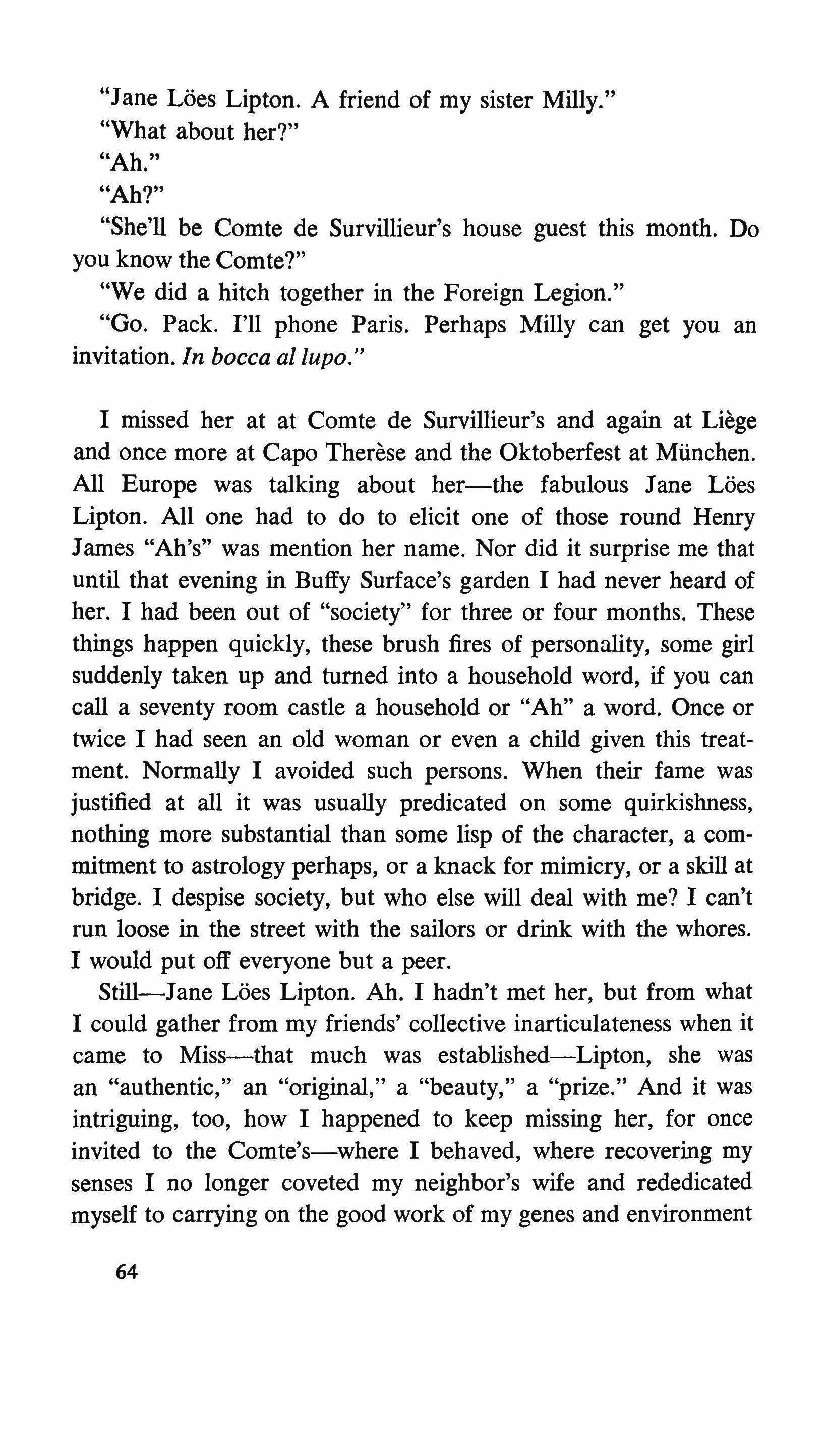
"Jane Loes Lipton. A friend of my sister Milly."
"What about her?"
"Ah."
"Ah?"
"She'll be Comte de Survillieur's house guest this month. Do you know the Comte?"
"We did a hitch together in the Foreign Legion."
"Go. Pack. I'll phone Paris. Perhaps Milly can get you an invitation. In bocca allupo."
I missed her at at Comte de Survillieur's and again at Liege and once more at Capo Therese and the Oktoberfest at Munchen. All Europe was talking about her-the fabulous Jane Loes Lipton. All one had to do to elicit one of those round Henry James "Ah's" was mention her name. Nor did it surprise me that until that evening in Buffy Surface's garden I had never heard of her. I had been out of "society" for three or four months. These things happen quickly, these brush fires of personality, some girl suddenly taken up and turned into a household word, if you can call a seventy room castle a household or "Ah" a word. Once or twice I had seen an old woman or even a child given this treatment. Normally I avoided such persons. When their fame was justified at all it was usually predicated on some quirkishness, nothing more substantial than some lisp of the character, a commitment to astrology perhaps, or a knack for mimicry, or a skill at bridge. I despise society, but who else will deal with me? I can't run loose in the street with the sailors or drink with the whores. I would put off everyone but a peer.
Still-Jane Loes Lipton. Ah. I hadn't met her, but from what I could gather from my friends' collective inarticulateness when it came to Miss-that much was established-Lipton, she was an "authentic," an "original," a "beauty," a "prize." And it was intriguing, too, how I happened to keep missing her, for once invited to the Comte's-where I behaved, where recovering my senses I no longer coveted my neighbor's wife and rededicated myself to carrying on the good work of my genes and environment
64
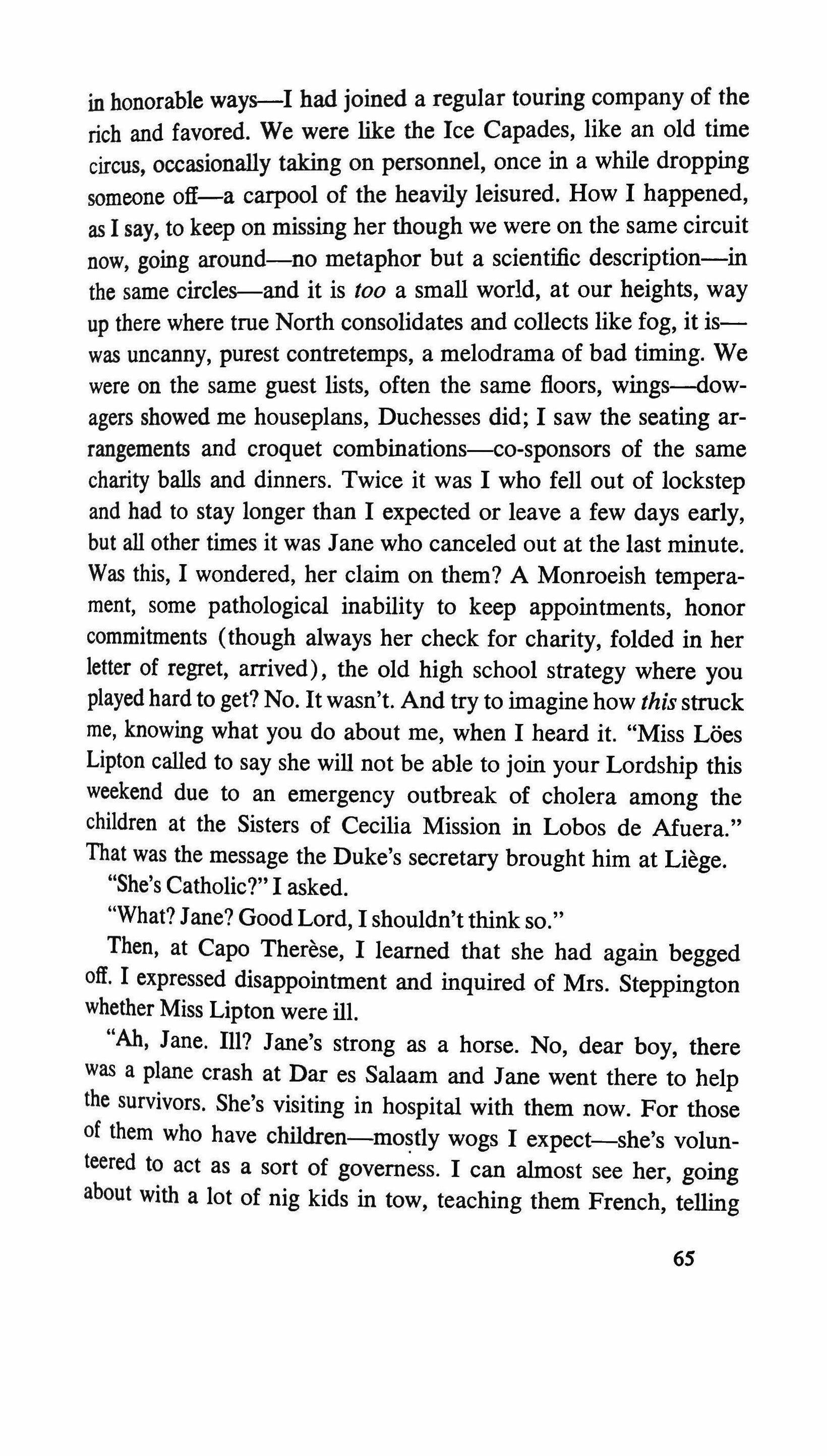
in honorable ways-I had joined a regular touring company of the rich and favored. We were like the Ice Capades, like an old time circus, occasionally taking on personnel, once in a while dropping someone off-a carpool of the heavily leisured. How I happened, as I say, to keep on missing her though we were on the same circuit now, going around-no metaphor but a scientific description-in the same circles-and it is too a small world, at our heights, way up there where true North consolidates and collects like fog, it iswas uncanny, purest contretemps, a melodrama of bad timing. We were on the same guest lists, often the same floors, wings-dowagers showed me houseplans, Duchesses did; I saw the seating arrangements and croquet combinations-co-sponsors of the same charity balls and dinners. Twice it was I who fell out of lockstep and had to stay longer than I expected or leave a few days early, but all other times it was Jane who canceled out at the last minute. Was this, I wondered, her claim on them? A Monroeish temperament, some pathological inability to keep appointments, honor commitments (though always her check for charity, folded in her letter of regret, arrived), the old high school strategy where you played hard to get? No. It wasn't. And try to imagine how this struck me, knowing what you do about me, when I heard it. "Miss Loes Lipton called to say she will not be able to join your Lordship this weekend due to an emergency outbreak of cholera among the children at the Sisters of Cecilia Mission in Lobos de Afuera." That was the message the Duke's secretary brought him at Liege.
"She's Catholic?" I asked.
"What? Jane? Good Lord, I shouldn't think so."
Then, at Capo Therese, I learned that she had again begged off. I expressed disappointment and inquired of Mrs. Steppington whether Miss Lipton were ill.
"Ah, Jane. Ill? Jane's strong as a horse. No, dear boy, there was a plane crash at Dar es Salaam and Jane went there to help the survivors. She's visiting in hospital with them now. For those of them who have children-mostly wogs I expect-she's volunteered to act as a sort of governess. I can almost see her, going about with a lot of nig kids in tow, teaching them French, telling
6S
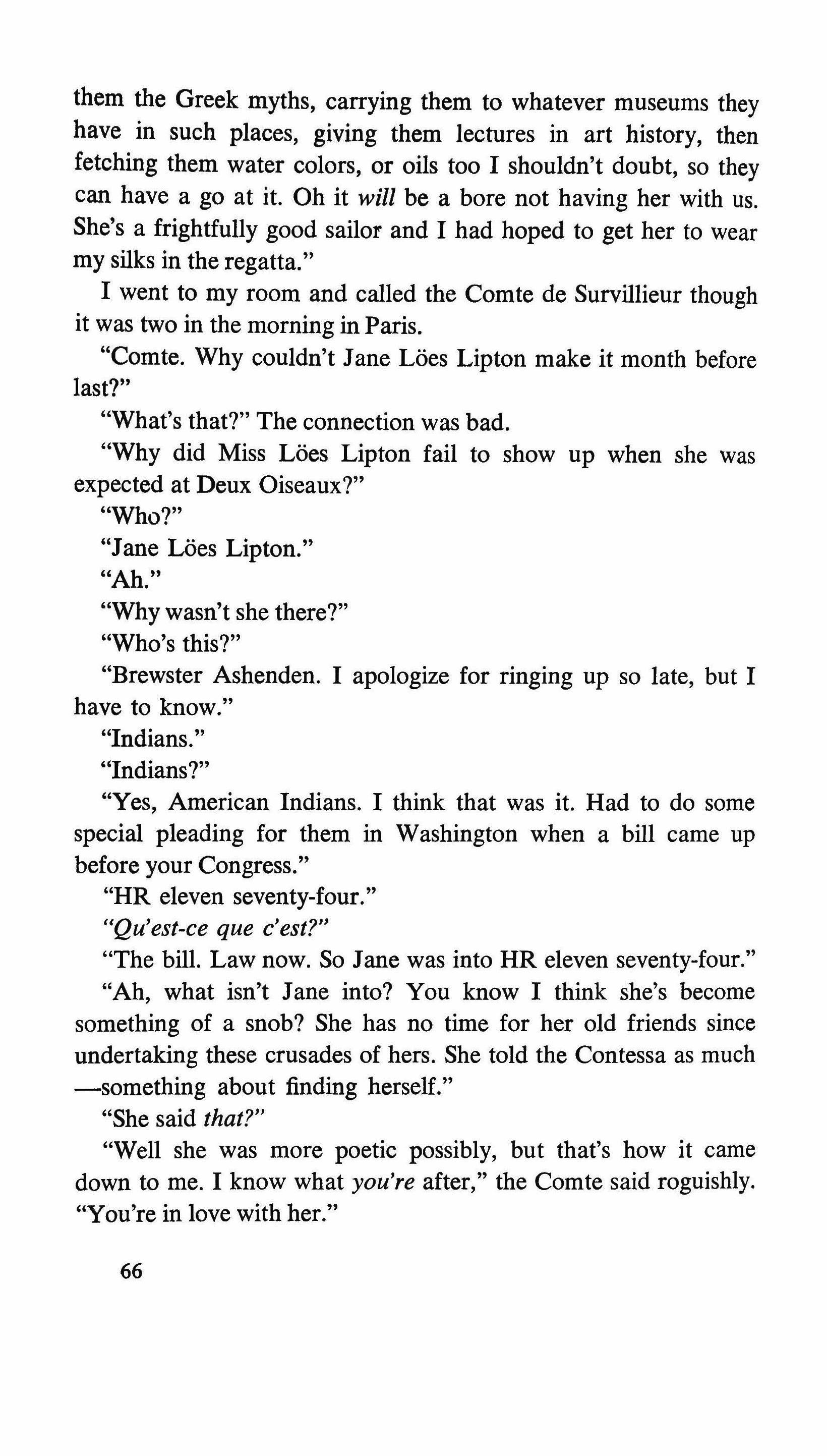
them the Greek myths, carrying them to whatever museums they have in such places, giving them lectures in art history, then fetching them water colors, or oils too I shouldn't doubt, so they can have a go at it. Oh it will be a bore not having her with us. She's a frightfully good sailor and I had hoped to get her to wear my silks in the regatta."
I went to my room and called the Comte de Survillieur though it was two in the morning in Paris.
"Comte. Why couldn't Jane Loes Lipton make it month before last?"
"What's that?" The connection was bad.
"Why did Miss Loes Lipton fail to show up when she was expected at Deux Oiseaux?"
"Who?"
"Jane Loes Lipton."
"Ah."
"Why wasn't she there?"
"Who's this?"
"Brewster Ashenden. I apologize for ringing up so late, but I have to know."
"Indians.
"Indians?"
"Yes, American Indians. I think that was it. Had to do some special pleading for them in Washington when a bill came up before your Congress."
"HR eleven seventy-four."
"Qu'est-ce que c'est?"
"The bill. Law now. So Jane was into HR eleven seventy-four."
"Ah, what isn't Jane into? You know I think she's become something of a snob? She has no time for her old friends since undertaking these crusades of hers. She told the Contessa as much -something about finding herself."
"She said that?"
"Well she was more poetic possibly, but that's how it came down to me. I know what you're after," the Comte said roguishly. "You're in love with her."
66

''I've never even met her."
"You're in love with her. Half Europe is. But unless you're a black or redskin or have arranged in some other way to cripple yourself you haven't a chance. Arse over tip in love, mon cher old comrade."
We rang off.
In the following weeks I heard of Jane USes Lipton that she had turned up in Hanoi to see if there weren't some way of getting negotiations off dead center, that she had published a book that broke the code in Oriental rugs, that she had directed an underground movie in Sweden which despite its frank language and graphic detail was so sensitive it was to be distributed with a "G" rating, and that she was back in America visiting outdoor art fairs and buying up the paintings of clowns and seascapes and rowboats turned over on beaches for a show she was putting together for the Metropolitan to be called "Shopping Center Primitive: Collectors' Items from the Twenty-third Century." One man said she could be seen in Dacca on Bangladesh Educational Television in a series called "Cooking Nutritious Meals for Large Families from Garbage and Without Fire," and another that she had become a sort of spiritual adviser to the statesmen of overdeveloped nations. Newspapers reported her on the scene wherever the earth quaked or the ships foundered or the forests burned.
Certainly she could not have had so many avatars. Certainly most was rumor, speculation knit from Jane's motives and sympathies. (Yet I heard people never known to lie, rock-ofgibraltarish types who didn't get the point of jokes, swear to their testimony.) Where there's smoke there's fire. If most was exaggerated, much was true.
Ah, Jane, oh Loes Lipton, Candy Striper to the Cosmos, when would I meet you, swap traveler's tales of what was to be found in those hot jungles of self-seeking, those voyages to the center of the soul and other uncharted places, those steeps and deeps and lost coves and far shelves of being? Ah, Jane, half Europe loves you.
I went to London and stayed in The Bottom, the tall new hotel
67

there. Lonely as Frank Sinatra on an album cover I went up to their revolving cocktail lounge on the fiftieth floor, The Top of the Bottom, and ran into Freddy Plympton.
"She's here."
"Jane Loes Lipton? I've heard that one before." (We hadn't been talking of her. How did I know that's who he meant? I don't know, I knew.)
"No, no, she is, at my country place. She's there now. She's exhausted, poor dear, and tells me her doctor has commanded her temporarily to resign from all volunteer fire departments. So she's here. I've got her. She's with Lady Plympton right this moment. I had to come to town on business or I'd be with her. I'm going back in the morning. Ever meet her? Want to come down?"
"She's there? She's really there?"
"Want to come down?"
There's been too much pedigree in this account, I think. (Put it down to metaphysics, not vanity. In asking "Who?" I'm wondering "What?" Even the trees have names, the rocks and clouds and grasses do. The world's a picture postcard sent from a far hotel. "Here's my room, this is what the stamps in this country look like, that's the strange color of the sand here, the people all wear these curious hats.") Bear with me.
Freddy Plympton is noble. The family is old-whose isn't, eh? we were none of us born yesterday; look it up in Burke's Peerage where it gets three pages, in Debrett where it gets four-and his great estate, Duluth, one of the finest in England. Though he could build a grander if he chose. Freddy's real wealth comes from the gambling casinos he owns. He is an entrepreneur of chance, a fortune teller. (The biggest gaming palaces and highest stakes in Europe, to say nothing of hotels in Aruba and boats beyond the twelV� mile limit and a piece of the action in church Bingo basements and punchboards all over the world, the newsprint for which is supplied from his own forests in Norway and is printed on his own presses.) Having started from scratch, from choosing odds-
68

or-evens for cash with his roommate at Harrow, a sheikh's son with a finger missing from his left hand-he was left handedwhich made him constitutionally unable to play the game-"He thought 'even,' you see," Freddy explains-taking the boy, neither of them more than fourteen, to the cleaners in the fifth form. It, the young sheikh's deformity, was Freddy's initial lesson in what it means to have the house odds in your favor and taught him never to enter any contest in which he did not have the edge. Freddy has a passion. It is not gambling. "Gambling's my work, old bean," Freddy says. He uses these corny aristocratic epithets. They make him seem fatuous but are as functional to his profession as a drawl to a hired gun. "I'm no gambler at all actually. I'm this sort of mathematician. Please don't gamble with me, please don't accept my bets. We're friends and I'm ruthless. Not vicious-ruthless. I never surrender an advantage. Since I know the odds and respect them, to do so would be a sort of cheating, and since I'm honorable I couldn't think of that. Don't 'play' with me. We're friends. I was never the sheikh's friend, or of any of those feet-offthe-ground fleugenmensch sons of rich men I lived with at Harrow and Cambridge and who gave me my stake. Where I was meditative they were speculative. I like you, as I like anyone who doesn't confuse his need with his evidence. Let's never gamble." So he has a passion but it isn't gambling.
Animals. Beasts rather. Duluth contains perhaps the most superb private zoo in the world, a huge game park, larger than Whipsnade and much more dangerous. Where Whipsnade hedges with moats and illusions, at Duluth the animals are given absolute freedom. An enormous, camouflaged electrified fence, the largest in the world, runs about the entire estate. ("We control the current. The jolt merely braces the larger animals and only stuns the smaller, puts them unconscious.") Although from time to time a few of the animals have fought and occasionally killed each other, an attempt has been made to introduce as near perfect an ecological balance as possible, vegetarians and carnivores who find the flesh of the beasts with whom they must live inimical, some almost religious constraint in the jaws and digestion, some
69
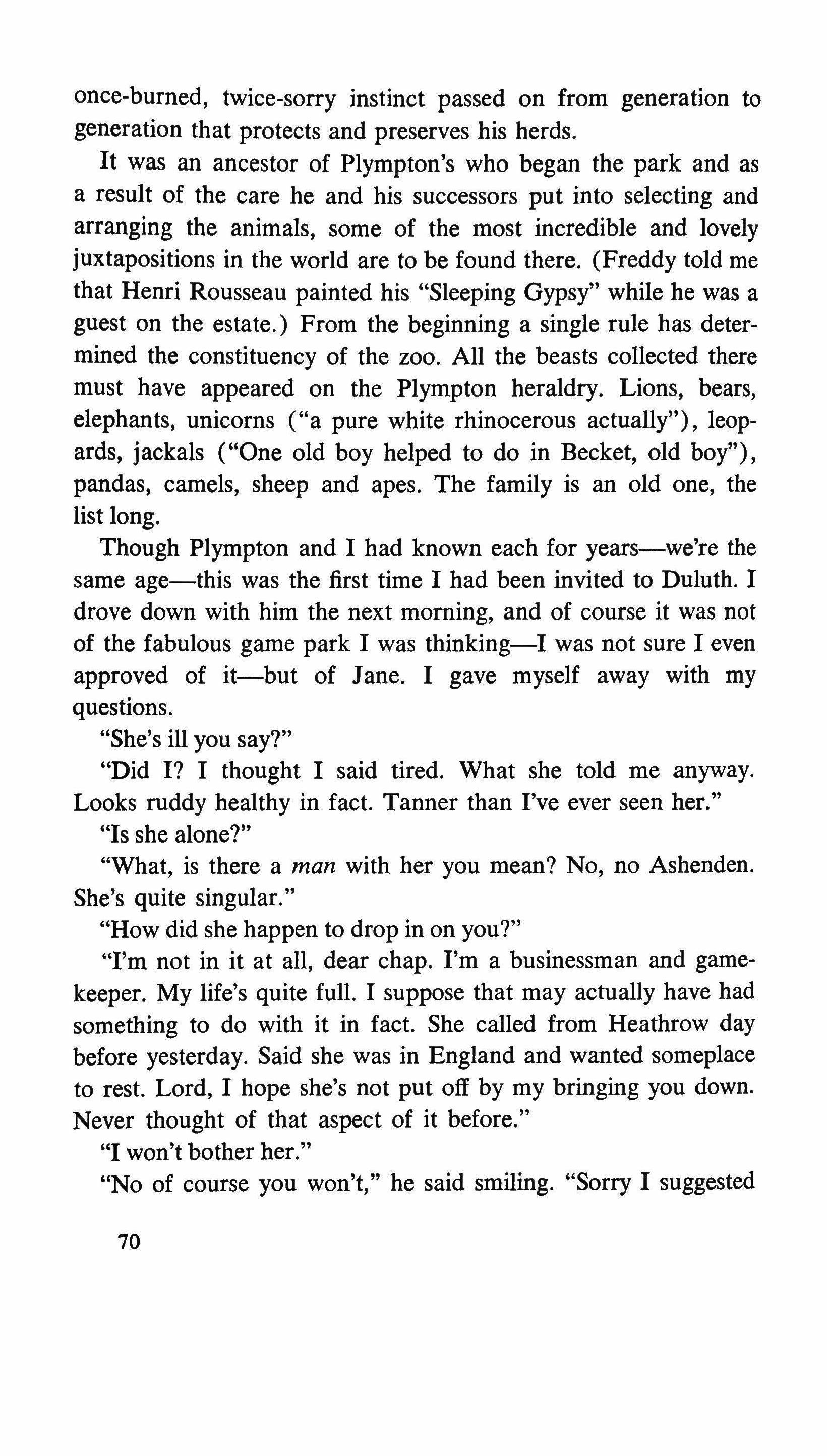
once-burned, twice-sorry instinct passed on from generation to generation that protects and preserves his herds.
It was an ancestor of Plympton's who began the park and as a result of the care he and his successors put into selecting and arranging the animals, some of the most incredible and lovely juxtapositions in the world are to be found there. (Freddy told me that Henri Rousseau painted his "Sleeping Gypsy" while he was a guest on the estate.) From the beginning a single rule has determined the constituency of the zoo. All the beasts collected there must have appeared on the Plympton heraldry. Lions, bears, elephants, unicorns ("a pure white rhinocerous actually"), leopards, jackals ("One old boy helped to do in Becket, old boy"), pandas, camels, sheep and apes. The family is an old one, the list long.
Though Plympton and I had known each for years-we're the same age-this was the first time I had been invited to Duluth. I drove down with him the next morning, and of course it was not of the fabulous game park I was thinking-I was not sure I even approved of it-but of Jane. I gave myself away with my questions.
"She's ill you say?"
"Did I? I thought I said tired. What she told me anyway. Looks ruddy healthy in fact. Tanner than I've ever seen her."
"Is she alone?"
"What, is there a man with her you mean? No, no Ashenden. She's quite singular."
"How did she happen to drop in on you?"
"I'm not in it at all, dear chap. I'm a businessman and gamekeeper. My life's quite full. I suppose that may actually have had something to do with it in fact. She called from Heathrow day before yesterday. Said she was in England and wanted someplace to rest. Lord, I hope she's not put off by my bringing you down. Never thought of that aspect of it before."
"I won't bother her."
"No of course you won't," he said smiling. "Sorry I suggested
70

that. Just thinking out loud. A man concerned with animals must always be conscious of who can go into the cage with whom. It's a social science, zoology is, very helpful in making up parties. I suppose mine, when I trouble to give them, are among the most gemutlich. in Europe. Indeed, now I think of it, I must have realized as soon as I saw you last night that you'd be acceptable to Jane or I'd never have asked you. Have you known her long?"
"We've never met."
"What, never met and so keen?" I smiled lamely and Freddy patted my knee. "I understand. I do. I feel you hoping. And I quite approve. Just don't confuse your hope with your evidence." He studied me for a moment. "But then you wouldn't do, would you, or I'd not be so fond of you."
"You do understand quite a lot, Freddy."
"Who? Me? I'm objective is all. Yearning, I can smell yearning a mile off."
"I shall have to shower."
"Not at all, not at all. It stinks only when untempered by reason. In your case I smell reason a mile off, too. Eminently suitable, eminently," he pronounced. "I wouldn't bet against it," he added seriously, and I felt so good about this last that I had to change the subject. I questioned him about Duluth which, till then, I hadn't even thought of. Now, almost superstitiously, I refused to think about Jane. Every time he gave me an opening I closed it, choosing as one does who has so much at stake and success seems within his grasp to steer clear of the single thing that is of any interest to him. We spoke trivially the whole time and my excitement and happiness were incandescent.
"How many miles do you get to the gallon in this Bentley of yours, Plympton?" I asked, and even before he could answer I turned to look out the window and exclaim, "Look, look at the grass, so green it is. That's your English climate for you. If rain's the price a nation must pay to achieve a grass that green, then one must just as well pay up, and be still about it. Who's your tailor? I'm thinking of having some things made." When we left the M-4
71
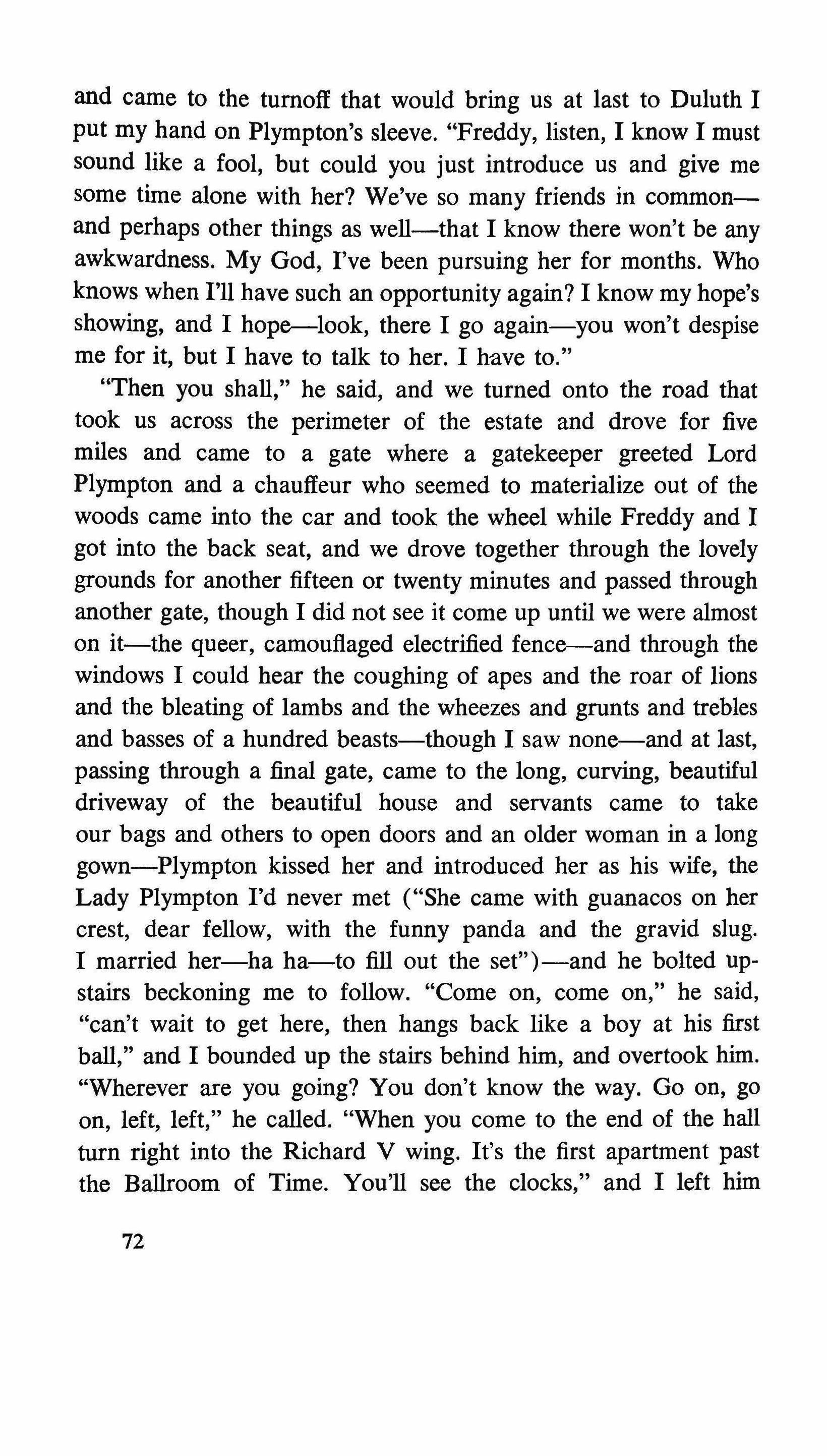
and came to the turnoff that would bring us at last to Duluth I put my hand on Plympton's sleeve. "Freddy, listen, I know I must sound like a fool, but could you just introduce us and give me some time alone with her? We've so many friends in commonand perhaps other things as well-that I know there won't be any awkwardness. My God, I've been pursuing her for months. Who knows when I'll have such an opportunity again? I know my hope's showing, and I hope-look, there I go again-you won't despise me for it, but I have to talk to her. I have to."
"Then you shall," he said, and we turned onto the road that took us across the perimeter of the estate and drove for five miles and came to a gate where a gatekeeper greeted Lord Plympton and a chauffeur who seemed to materialize out of the woods came into the car and took the wheel while Freddy and I got into the back seat, and we drove together through the lovely grounds for another fifteen or twenty minutes and passed through another gate, though I did not see it come up until we were almost on it-the queer, camouflaged electrified fence-and through the windows I could hear the coughing of apes and the roar of lions and the bleating of lambs and the wheezes and grunts and trebles and basses of a hundred beasts-though I saw none-and at last, passing through a final gate, came to the long, curving, beautiful driveway of the beautiful house and servants came to take our bags and others to open doors and an older woman in a long gown-Plympton kissed her and introduced her as his wife, the Lady Plympton I'd never met ("She came with guanacos on her crest, dear fellow, with the funny panda and the gravid slug. I married her-ha ha-to fill out the set")-and he bolted upstairs beckoning me to follow. "Come on, come on," he said, "can't wait to get here, then hangs back like a boy at his first ball," and I bounded up the stairs behind him, and overtook him. "Wherever are you going? You don't know the way. Go on, go on, left, left," he called. "When you come to the end of the hall turn right into the Richard V wing. It's the first apartment past the Ballroom of Time. You'll see the clocks," and I left him
72
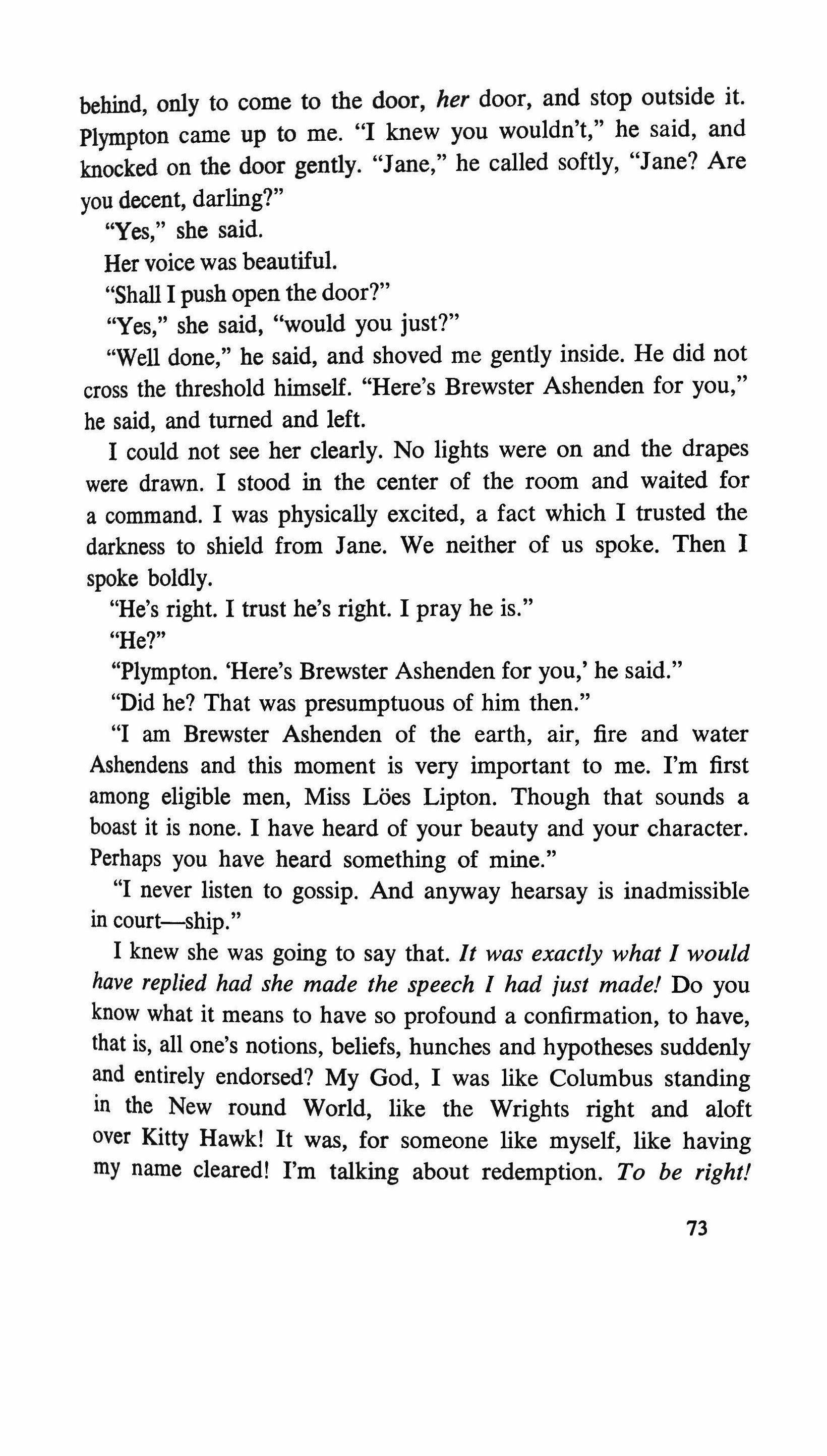
behind, only to come to the door, her door, and stop outside it. Plympton came up to me. "I knew you wouldn't," he said, and knocked on the door gently. "Jane," he called softly, "Jane? Are you decent, darling?"
"Yes," she said. Her voice was beautiful.
"Shall 1 push open the door?"
"Yes," she said, "would you just?"
"Well done," he said, and shoved me gently inside. He did not cross the threshold himself. "Here's Brewster Ashenden for you," he said, and turned and left.
I could not see her clearly. No lights were on and the drapes were drawn. 1 stood in the center of the room and waited for a command. 1 was physically excited, a fact which 1 trusted the darkness to shield from Jane. We neither of us spoke. Then I spoke boldly.
"He's right. I trust he's right. I pray he is." "He?"
"Plympton. 'Here's Brewster Ashenden for you,' he said."
"Did he? That was presumptuous of him then."
"I am Brewster Ashenden of the earth, air, fire and water Ashendens and this moment is very important to me. I'm first among eligible men, Miss Loes Lipton. Though that sounds a boast it is none. I have heard of your beauty and your character. Perhaps you have heard something of mine."
"I never listen to gossip. And anyway hearsay is inadmissible in court-ship."
1 knew she was going to say that. It was exactly what I would have replied had she made the speech I had just made! Do you know what it means to have so profound a confirmation, to have, that is, all one's notions, beliefs, hunches and hypotheses suddenly and entirely endorsed? My God, 1 was like Columbus standing in the New round World, like the Wrights right and aloft over Kitty Hawk! It was, for someone like myself, like having my name cleared! I'm talking about redemption. To be right!
73

That's everything in life, you know. To be right, absolutely right, 100% correct in all the essentials, that's all we want. And whoever is? Brewster Ashenden-once. I had so much to tell her.
I began to talk, a mile a minute, filling her in, breathlessly bringing her up to date, a Greek stranger's after-dinner talk in a king's gold palace on an inaccessible island in a red and distant sea. A necessary entertainment. Until then I had not known my life had been a story. Then, though I could not see it in the dark room, she held up her hand for me to stop. It was exactly where I would have held up my hand had Jane been speaking.
"Yes," she said of my life, "it was the same with me." Neither of us could speak for a time. Then, gaily-"Oh, Brewster, think of all the-"
"-coastlines?" I said.
"Yes," she said, "yes. All the coastlines, bays, sounds, capes and peninsulas, the world's beaches scribbled 'round all the countries and continents and islands. All the Cannes and Hamptons yet to be. Shores in Norway like a golden lovely dust. Spain's wild hairline, Portugal's long face like an impression on coins. The nubbed antlers of Scandinavia and the great South American porterhouse. The French teapot and Italian boot and Australia like a Scottie in profile."
"Asia running like a watercolor, dripping Japan and all the rest," we said together.
"Yes, yes," she said. "God I love the world."
"There's no place like it."
"Let me wash up on seashores and eat the local specialties, one fish giving way to another every two or three hundred miles along the great continuous coasts like an exquisite, delicious evolution. Thank God for money and jet airplanes. Let me out at the outpost. Do you feel that way?"
"What, are you kidding? An earth, fire, air and water guy like me? I do, I do."
"Family's important," she said.
"You bet it is."
She giggled. "My grandfather, a New Yorker, was told to go
74

west for his health. Grandfather hated newspapers, he didn't trust them and said all news, even of wars, heavy weather and the closing markets, was just cheap gossip. He thought all they were good for, since he held that calendars were vulgar, was the date printed at the top of the page. In Arizona he had The New York Times sent to him daily, though of course it always arrived a day or two late. So for him the 11 th was the 9th or the 10th, and he went through the last four years of his life a day or two behind actual time. He refused to make the 24 or 48 hour adjustment and Grandfather's Christmas and New Year's were celebrated after everyone else's. He went to church on Easter Tuesday."
"Easter Tuesday, that's very funny."
"I love the idiosyncratic, for it is all that constitutes integrity. Difference, nuance, hues and shade. Spectra, Brewster. That's why we travel perhaps, why we're found on all this planet's exotic strands, cherishing peculiarities, finding lost causes, chipping in to save the primitive wherever it occurs-"
"Listen to her talk. Is that a sweetheart?"
"-refusing to let it die though the old ways are the worst ways and unhealthy, bad for the teeth and the balanced diet and the comfort and the longevity. Is that selfish?"
"I think so."
"Yes," she said pensively. "Of course it is. All taste's a cruelty at last. We impede history with our Sierra Clubs and our closed societies. We'll have to answer for that I suppose. Oh wellBrewster, do you have uncles? Tell me about your uncles."
"I had an Uncle Clifford who believed that disease could be contracted only by being transferred by a draft when one was traveling at high speeds. For this reason he wore a paper bag over his head even in a closed car. He cut out holes for the eyes for despite his odd notion he dearly loved to travel and watch the scenery go by. Even going up in elevators he wore this paper bag though he strolled at ease through the contagion wards of hospitals doing charity to the poor."
"Marvelous.
"Yes."
75
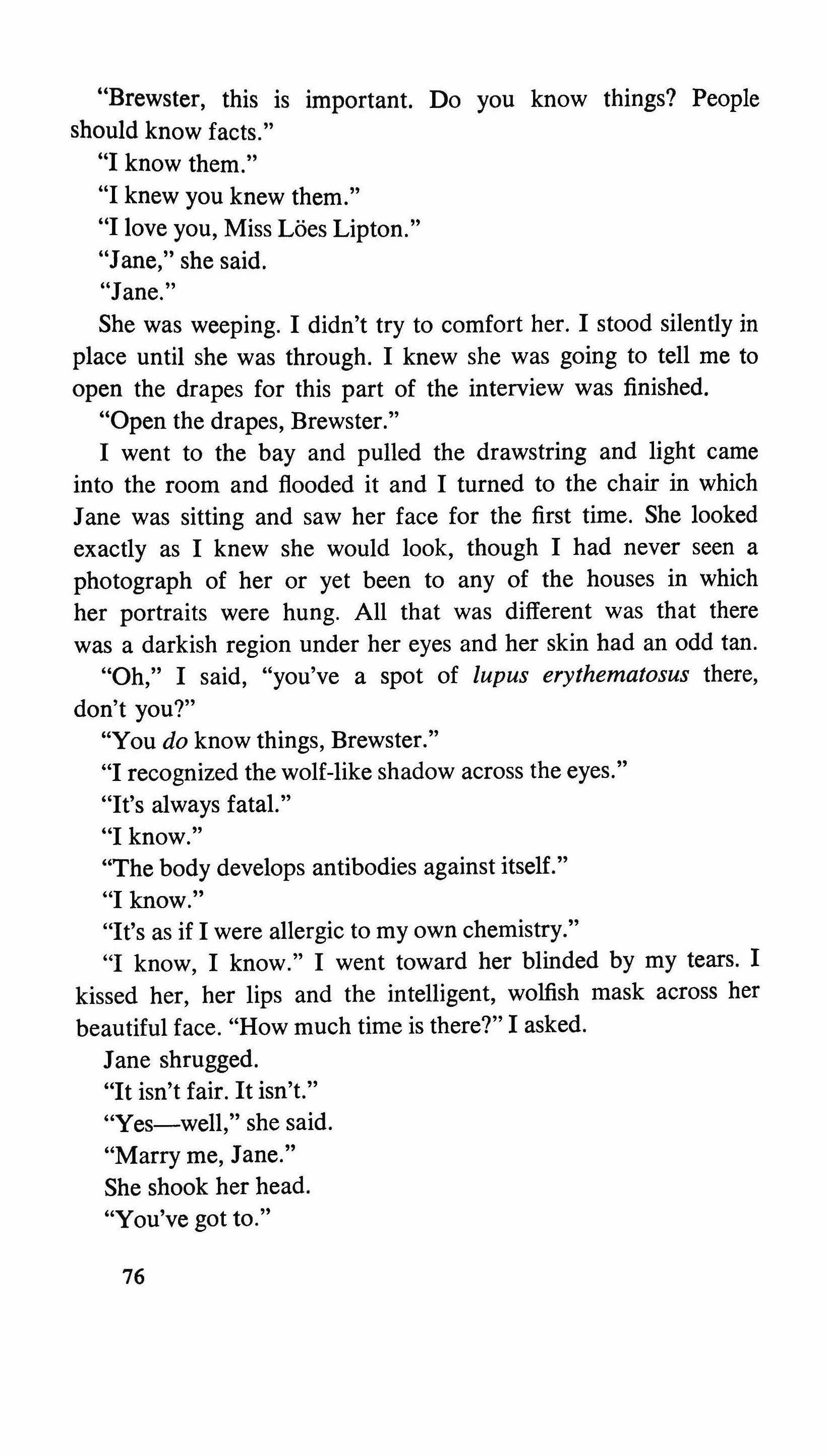
"Brewster, this is important. Do you know things? People should know facts."
"I know them."
"I knew you knew them."
"I love you, Miss USes Lipton."
"Jane," she said. "Jane."
She was weeping. I didn't try to comfort her. I stood silently in place until she was through. I knew she was going to tell me to open the drapes for this part of the interview was finished.
"Open the drapes, Brewster."
I went to the bay and pulled the drawstring and light came into the room and flooded it and I turned to the chair in which
Jane was sitting and saw her face for the first time. She looked exactly as I knew she would look, though I had never seen a photograph of her or yet been to any of the houses in which her portraits were hung. All that was different was that there was a darkish region under her eyes and her skin had an odd tan.
"Oh," I said, "you've a spot of lupus erythematosus there, don't you?"
"You do know things, Brewster."
"I recognized the wolf-like shadow across the eyes."
"It's always fatal."
"I know."
"The body develops antibodies against itself."
"I know."
"It's as if I were allergic to my own chemistry."
"I know, I know." I went toward her blinded by my tears. I kissed her, her lips and the intelligent, wolfish mask across her beautiful face. "How much time is there?" I asked.
Jane shrugged.
"It isn't fair. It isn't."
"Yes-well," she said.
"Marry me, Jane."
She shook her head.
"You've got to."
76

"No," she said.
"Because of this fatal disease? That doesn't matter to me. I beg your pardon, Jane, if that sounds callous. I don't mean that your mortality doesn't matter to me. I mean that now that I've found you I can't let you go, no matter how little time you might have left."
"Do you think that's why I refused you? Because I'm going to die? Everyone dies. I refuse you because of what you are and because of what I am."
"But we're the same. We know each other inside out."
"No. There's a vast gulf between us."
"No Jane. I know what you're going to say before you say it, what you're going to do before you do it."
"No."
"Yes. I swear. Yes." She smiled, and the wolf mask signal of her disease made her uncanny. "You mean because I don't know why you refuse me? Is that what you mean?" She nodded. "Then you see I do know. I knew that it was because I didn't know why you refused me. Oh, I'm so confused. I'm-Wait. Oh. Is it what I think it is?" She nodded. "Oh my God. Jane, please. I wasn't thinking. You let me go on. I was too hasty in telling you my life. It's because you're pure and I'm not. That's it, isn't it? Isn't that it?" She nodded. "Jane, I'm a man," I pleaded. "It's different with a man. Listen," I said, "I can be pure. I can be again. I will be."
"There isn't time."
"There is, there is."
"If I thought there were-Oh, Brewster, if I really thought there were-" she said, and broke off.
"There is. I make a vow. I make a holy vow." I crossed my heart.
She studied me. "I believe you," she said finally. "That is I believe you seriously wish to undo what you have done to yourself. I believe in your penitent spirit I mean. No. Don't kiss me. You must be continent from here on out. Then-"
"We'll see?"
"We'll see."
77

"The next time, lane, the next time you see me. I swear I will have met your conditions."
I bowed and left and was told where I was to sleep by a grinning Plympton. He asked if, now that I had seen lane, I should like to go with him on a tour of the estate.
"Not just yet, Freddy, I think."
"1ane gave you something to think about, did she?"
"Something like that."
He took me to my rooms, a suite which, though it was Victorian, struck me as the most modern I had thus far seen in the castle.
Was ever any man set such a task by a woman? To undo defilement and regain innocence, to take an historical corruption and will it annulled, whisking it out of time as if it were a damaged egg going by on a conveyor belt. And not given years-lane's disease was progressive, the mask a manifestation in one of its last stages-nor deserts to do it in. Not telling beads or contemplating from some Himalayan hillside God's extensive Oneness. No, nor chanting a long, cunning train of box-car mantras as it moves across the mind's trestle and over the soul's deep, vertiginous drop. No, no, and no question either of simply distributing the wealth or embracing the leper or going about in rags-I still wore my mourning togs, that lover's wardrobe, those Savile Rowand Carnaby Street whippery flags of self-or doing those bows and scrapes that were only courtesy's moral minuet, and no time, no time at all for the long Yoga life, the self's Spring Cleaning that could drag on years. What had to be done had to be done now, in these comfortable Victorian quarters on a velvet loveseat or in the high four-poster, naked cherubs climbing the bedposts, the burnished dimples of their wooden behinds glistening in the light from the fresh laid fire. By a gilded chamber pot, beneath a silken awning, next to a window with one of the loveliest views in England. That, at least, I could change. I drew the thick drapes across the bayed glass and, influenced perhaps by the firelight and the Baker Street ambiance, got out my carpet slippers and red smoking jacket. I really had to laugh. This won't do, I thought. How do you expect to bring about these important structural changes and get
78
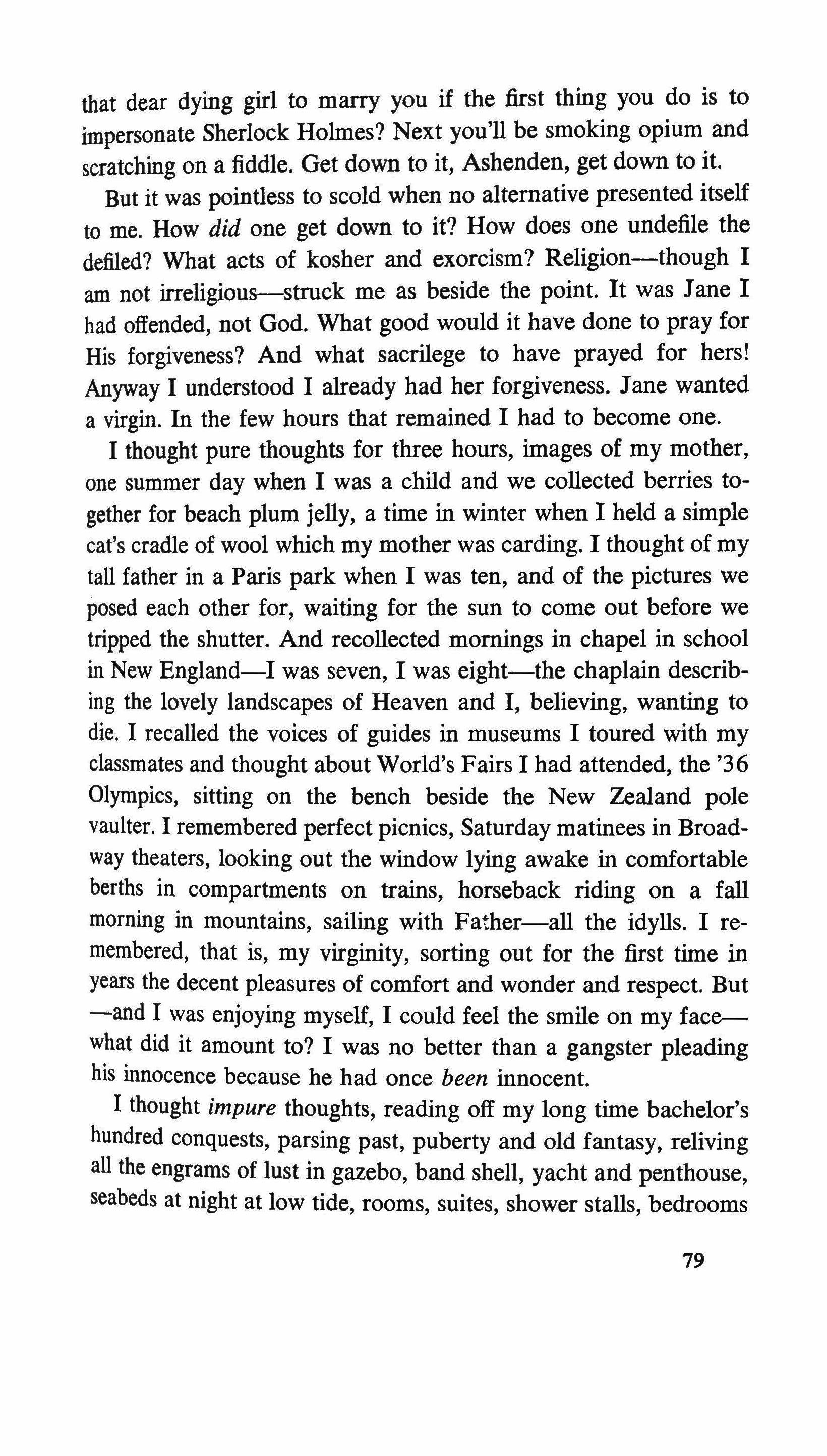
that dear dying girl to marry you if the first thing you do is to impersonate Sherlock Holmes? Next you'll be smoking opium and scratching on a fiddle. Get down to it, Ashenden, get down to it.
But it was pointless to scold when no alternative presented itself to me. How did one get down to it? How does one undefile the defiled? What acts of kosher and exorcism? Religion-though I am not irreligious-struck me as beside the point. It was Jane I had offended, not God. What good would it have done to pray for His forgiveness? And what sacrilege to have prayed for hers!
Anyway I understood I already had her forgiveness. Jane wanted a virgin. In the few hours that remained I had to become one.
I thought pure thoughts for three hours, images of my mother, one summer day when I was a child and we collected berries together for beach plum jelly, a time in winter when I held a simple eat's cradle of wool which my mother was carding. I thought of my tall father in a Paris park when I was ten, and of the pictures we posed each other for, waiting for the sun to come out before we tripped the shutter. And recollected mornings in chapel in school in New England-I was seven, I was eight-the chaplain describing the lovely landscapes of Heaven and I, believing, wanting to die. I recalled the voices of guides in museums I toured with my classmates and thought about World's Fairs I had attended, the '36 Olympics, sitting on the bench beside the New Zealand pole vaulter. I remembered perfect picnics, Saturday matinees in Broadway theaters, looking out the window lying awake in comfortable berths in compartments on trains, horseback riding on a fall morning in mountains, sailing with Father-all the idylls. I remembered, that is, my virginity, sorting out for the first time in years the decent pleasures of comfort and wonder and respect. But -and I was enjoying myself, I could feel the smile on my facewhat did it amount to? I was no better than a gangster pleading his innocence because he had once been innocent.
I thought impure thoughts, reading off my long time bachelor's hundred conquests, parsing past, puberty and old fantasy, reliving all the engrams of lust in gazebo, band shell, yacht and penthouse, seabeds at night at low tide, rooms, suites, shower stalls, bedrooms
79
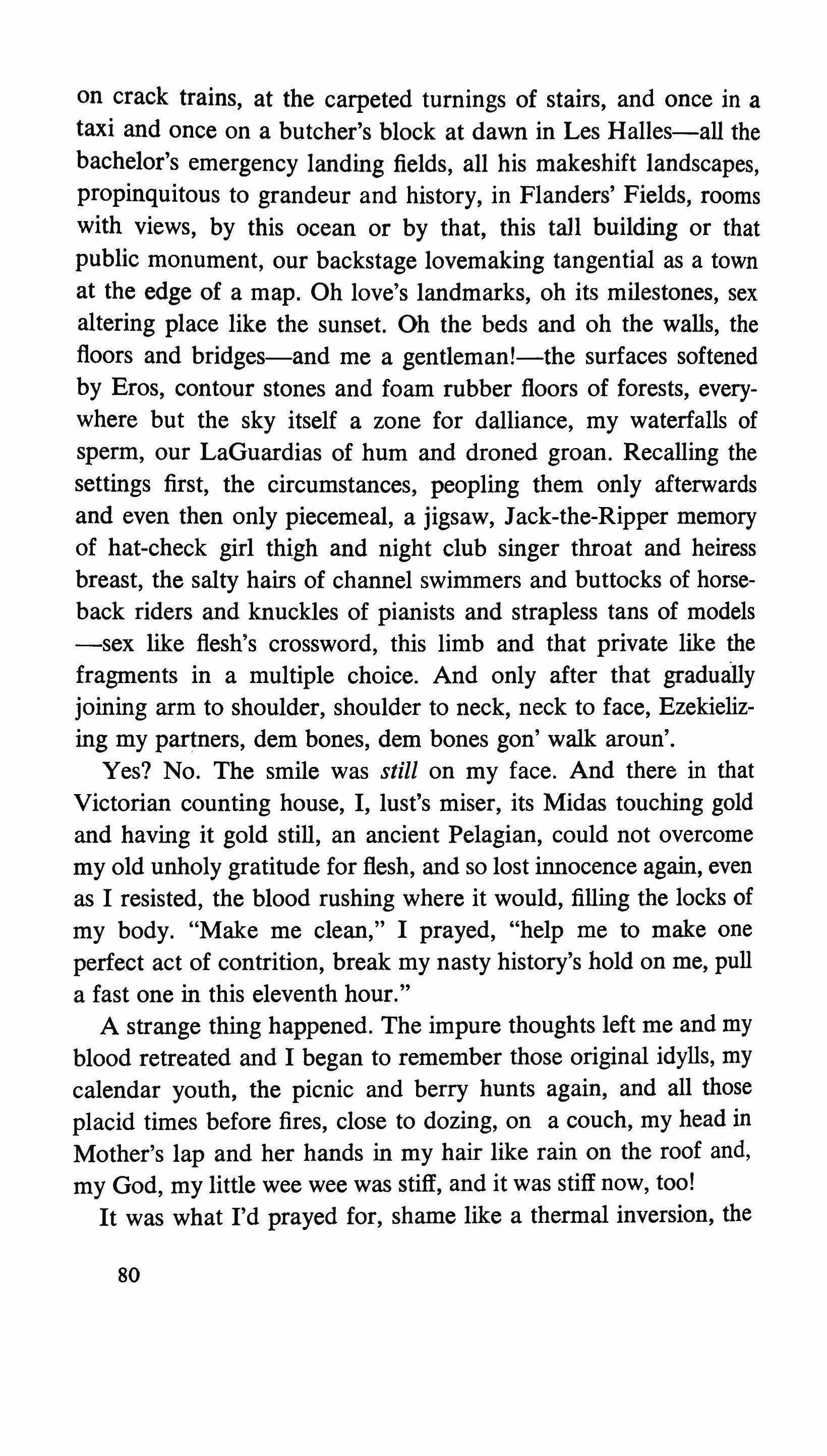
on crack trains, at the carpeted turnings of stairs, and once in a taxi and once on a butcher's block at dawn in Les Halles-all the bachelor's emergency landing fields, all his makeshift landscapes, propinquitous to grandeur and history, in Flanders' Fields, rooms with views, by this ocean or by that, this tall building or that public monument, our backstage lovemaking tangential as a town at the edge of a map. Oh love's landmarks, oh its milestones, sex altering place like the sunset. Oh the beds and oh the walls, the floors and bridges-and me a gentleman!-the surfaces softened by Eros, contour stones and foam rubber floors of forests, everywhere but the sky itself a zone for dalliance, my waterfalls of sperm, our LaGuardias of hum and droned groan. Recalling the settings first, the circumstances, peopling them only afterwards and even then only piecemeal, a jigsaw, Jack-the-Ripper memory of hat-check girl thigh and night club singer throat and heiress breast, the salty hairs of channel swimmers and buttocks of horseback riders and knuckles of pianists and strapless tans of models -sex like flesh's crossword, this limb and that private like the fragments in a multiple choice. And only after that gradually joining arm to shoulder, shoulder to neck, neck to face, Ezekielizing my partners, dem bones, dem bones gon' walk aroun'.
Yes? No. The smile was still on my face. And there in that Victorian counting house, I, lust's miser, its Midas touching gold and having it gold still, an ancient Pelagian, could not overcome myoid unholy gratitude for flesh, and so lost innocence again, even as I resisted, the blood rushing where it would, filling the locks of my body. "Make me clean," I prayed, "help me to make one perfect act of contrition, break my nasty history's hold on me, pull a fast one in this eleventh hour."
A strange thing happened. The impure thoughts left me and my blood retreated and I began to remember those original idylls, my calendar youth, the picnic and berry hunts again, and all those placid times before fires, close to dozing, on a couch, my head in Mother's lap and her hands in my hair like rain on the roof and, my God, my little wee wee was stiff, and it was stiff now, too!
It was what I'd prayed for, shame like a thermal inversion, the
80

self-loathing that is purity. The sailing lessons and horseback rides and lectures and daytrips come back tainted, soured. I saw how pleased I'd been, how smug, Why I'm free, I thought, and was. "I've licked it, Jane," I said. "I'm pure, holy as a wafer, my heart pink as rare meat. I was crap. Look at me now." If she won't have me, I thought, it's not my fault. I rushed out to show myself to her and tell her what I'd discovered and ran over it again to see if I had it straight. "Jane," I'd say, "I'm bad, unsavory from the word go, hold your nose. To be good subsists in such understanding. So innocence is knowledge, not its lack. See, morality's easy, clear, where's the mystery?" But when I stepped outside my suite the house was dark. Time had left me behind. The long night of the soul goes by in a minute. It must have been three or four in the morning. I couldn't wake Jane. She was dying of lupus erythematosus and needed her rest. I didn't know where Plympton slept or I would have roused him. Too exhilarated by my virtue to sleep, I went outside.
But it was not "outside" as you and I know it. Say rather it was a condition, like the out-of-doors in a photograph, the colors fixed and temperature unfelt, simply not factors, the wind stilled and the air light and so wide somehow he could walk without touching it. It was as if he moved in an enormous diorama of nature, a creche of the elements. Brewster Ashenden was rich. He had lain on his back on Ontario turf farms and played the greens of St. Andrews and Burning Tree, but he had never felt anything like Duluth's perfect grass, even in moonlight green as billiard cloth, soft and springy as theater seats. The moon, perfectly round and bright as a tennis shoe-he could make out its craters, like the eternally curving seams of a Spaulding-enabled him to see perfectly, the night no more than the vaguest atmosphere, distant objects gyroscopically stilled like things glimpsed through the whirling blades of a fan. What he saw was like the landscapes behind madonnas in classical paintings-one missed only the carefully drawn pillars and far, tiny palaces-blue hilled horizons, knolls at the end of space, complex shores that trailed eccentrically about fiat, blackish
81
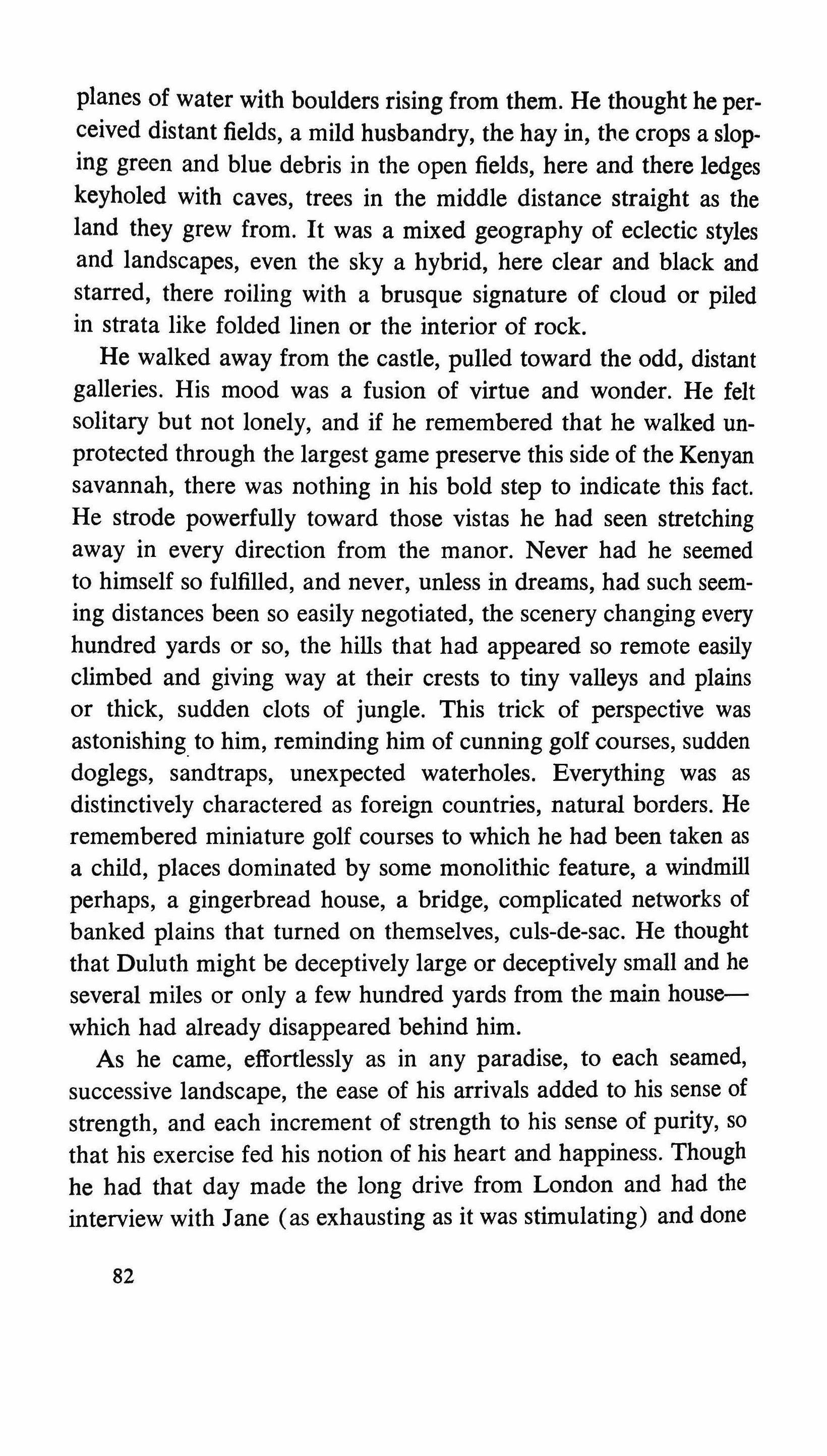
planes of water with boulders rising from them. He thought he perceived distant fields, a mild husbandry, the hay in, the crops a sloping green and blue debris in the open fields, here and there ledges keyholed with caves, trees in the middle distance straight as the land they grew from. It was a mixed geography of eclectic styles and landscapes, even the sky a hybrid, here clear and black and starred, there roiling with a brusque signature of cloud or piled in strata like folded linen or the interior of rock.
He walked away from the castle, pulled toward the odd, distant galleries. His mood was a fusion of virtue and wonder. He felt solitary but not lonely, and if he remembered that he walked unprotected through the largest game preserve this side of the Kenyan savannah, there was nothing in his bold step to indicate this fact. He strode powerfully toward those vistas he had seen stretching away in every direction from the manor. Never had he seemed to himself so fulfilled, and never, unless in dreams, had such seeming distances been so easily negotiated, the scenery changing every hundred yards or so, the hills that had appeared so remote easily climbed and giving way at their crests to tiny valleys and plains or thick, sudden clots of jungle. This trick of perspective was astonishing. to him, reminding him of cunning golf courses, sudden doglegs, sandtraps, unexpected waterholes. Everything was as distinctively charactered as foreign countries, natural borders. He remembered miniature golf courses to which he had been taken as a child, places dominated by some monolithic feature, a windmill perhaps, a gingerbread house, a bridge, complicated networks of banked plains that turned on themselves, culs-de-sac. He thought that Duluth might be deceptively large or deceptively small and he several miles or only a few hundred yards from the main house-which had already disappeared behind him.
As he came, effortlessly as in any paradise, to each seamed, successive landscape, the ease of his arrivals added to his sense of strength, and each increment of strength to his sense of purity, so that his exercise fed his notion of his heart and happiness. Though he had that day made the long drive from London and had the interview with Jane (as exhausting as it was stimulating) and done
82
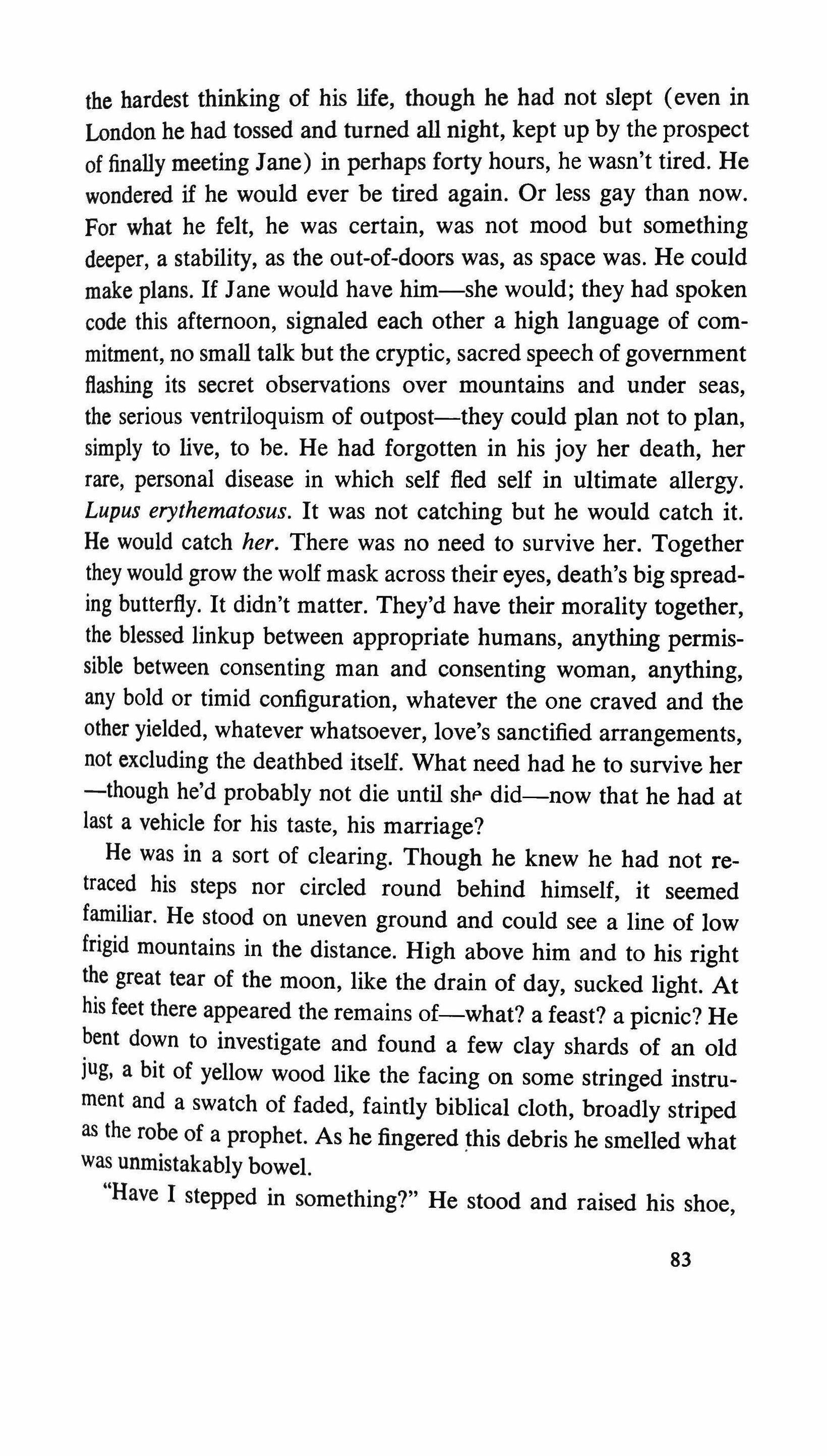
the hardest thinking of his life, though he had not slept (even in London he had tossed and turned all night, kept up by the prospect of finally meeting Jane) in perhaps forty hours, he wasn't tired. He wondered if he would ever be tired again. Or less gay than now. For what he felt, he was certain, was not mood but something deeper, a stability, as the out-of-doors was, as space was. He could make plans. If Jane would have him-she would; they had spoken code this afternoon, signaled each other a high language of commitment, no small talk but the cryptic, sacred speech of government flashing its secret observations over mountains and under seas, the serious ventriloquism of outpost-they could plan not to plan, simply to live, to be. He had forgotten in his joy her death, her rare, personal disease in which self fled self in ultimate allergy. Lupus erythematosus. It was not catching but he would catch it. He would catch her. There was no need to survive her. Together they would grow the wolf mask across their eyes, death's big spreading butterfly. It didn't matter. They'd have their morality together, the blessed linkup between appropriate humans, anything permissible between consenting man and consenting woman, anything, any bold or timid configuration, whatever the one craved and the other yielded, whatever whatsoever, love's sanctified arrangements, not excluding the deathbed itself. What need had he to survive her -though he'd probably not die until she did-now that he had at last a vehicle for his taste, his marriage?
He was in a sort of clearing. Though he knew he had not retraced his steps nor circled round behind himself, it seemed familiar. He stood on uneven ground and could see a line of low frigid mountains in the distance. High above him and to his right the great tear of the moon, like the drain of day, sucked light. At his feet there appeared the remains of-what? a feast? a picnic? He bent down to investigate and found a few clay shards of an old jug, a bit of yellow wood like the facing on some stringed instrument and a swatch of faded, faintly biblical cloth, broadly striped as the robe of a prophet. As he fingered this debris he smelled what was unmistakably bowel.
"Have I stepped in something?" He stood and raised his shoe, 83

but his glance slid off it to the ground where he saw two undisturbed lumps, round as hamburger, of congealing lion waste. It came to him at once. "I knew it was familiar! 'The Sleeping Gypsy.' This is where it was painted!" He looked suspiciously at the mangled mandolin-facing and smashed jug and at the tough cloth which he now perceived had been forcibly torn. My God, he thought, the lion must have eaten the poor fellow. The picture had been painted almost seventy-five years earlier but he understood from his reading that lions often returned to the scenes of their most splendid kills, somehow passing on to succeeding generations this odd, historical instinct of theirs. Nervously he edged away, and though the odor of lion dung still stung his nostrils, it was gradually replaced by more neutral smells. Clearly, however, he was near the beasts.
He turned but could not find the castle. He was not yet frightened. From what he had already seen of Duluth he understood that it was a series of cunningly stitched enclaves, of arch and formal transistorized prospects that swallowed each other transitionlessly. It seemed to be the antithesis of a maze, a surface of turned corners that opened up on fresh surprises. Sooner or later -he thought of himself as walking along an enormous Mobius Strip-he would automatically be brought back to his starting point. If he was a little uneasy it was only because of the proximity of the animals, whose presence he felt and smelled rather than saw or heard.
Meanwhile, quickening his pace, he came with increasing frequency to experience a series of deja vus, puzzling at first but then suddenly-and disappointingly-explicable. He had hoped, as scenes became familiar to him, that he was already retracing his steps, but a few seconds' perusal of each place where the deja vu occurred indicated otherwise. These were not places he had ever been, only places he had seen. "The Sleeping Gypsy" and the diorama effect he had first noticed when leaving the castle! Certainly, he thought, the paintings! Here's Cranach the Elder's "Stag Hunt." Unmistakably. And a few moments later-I'll be darned,
84
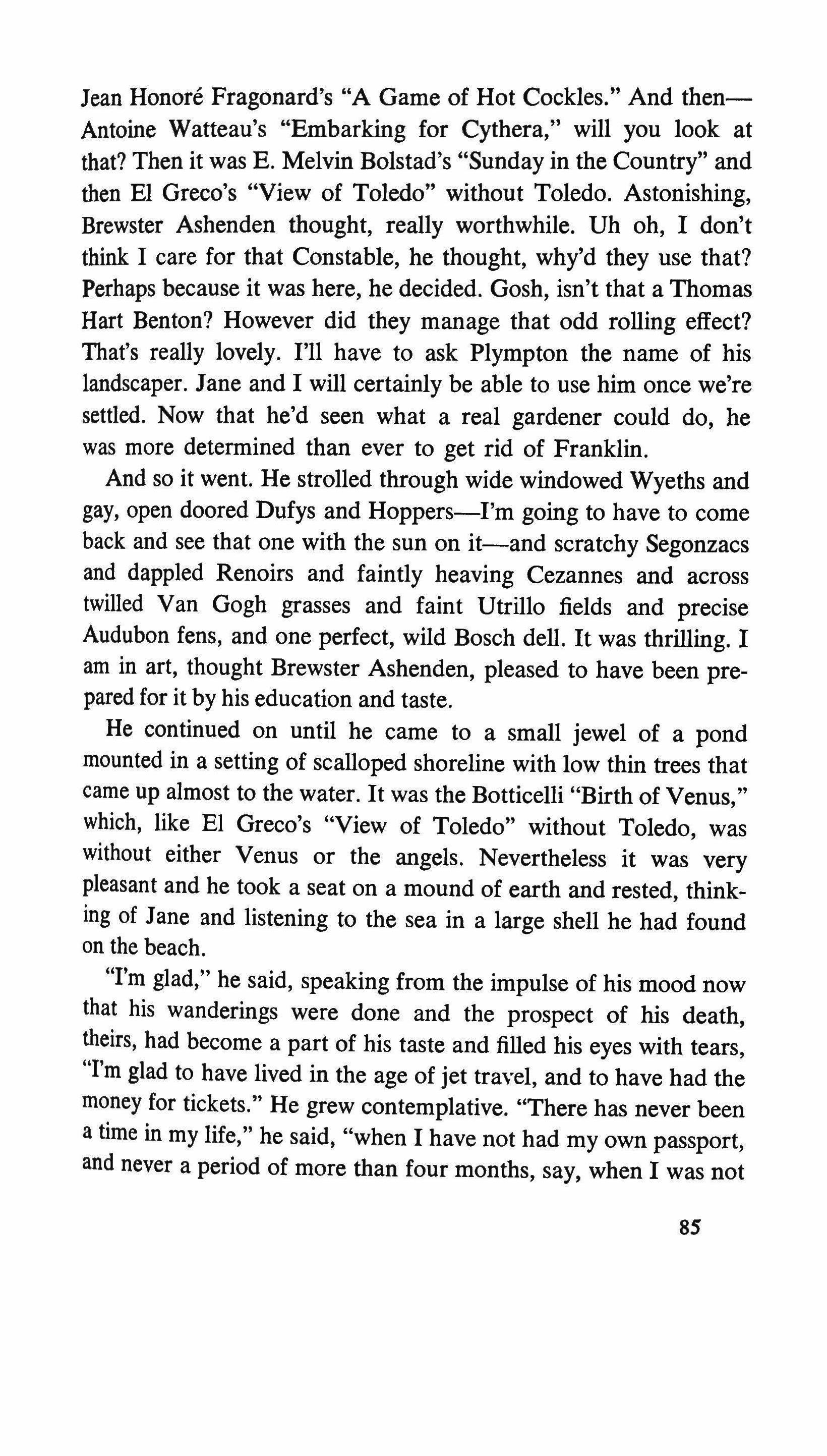
Jean Honore Fragonard's "A Game of Hot Cockles." And thenAntoine Watteau's "Embarking for Cythera," will you look at that? Then it was E. Melvin Bolstad's "Sunday in the Country" and then EI Greco's "View of Toledo" without Toledo. Astonishing, Brewster Ashenden thought, really worthwhile. Uh oh, I don't think I care for that Constable, he thought, why'd they use that? Perhaps because it was here, he decided. Gosh, isn't that a Thomas Hart Benton? However did they manage that odd rolling effect? That's really lovely. I'll have to ask Plympton the name of his landscaper. Jane and I will certainly be able to use him once we're settled. Now that he'd seen what a real gardener could do, he was more determined than ever to get rid of Franklin.
And so it went. He strolled through wide windowed Wyeths and gay, open doored Dufys and Hoppers-I'm going to have to come back and see that one with the sun on it-and scratchy Segonzacs and dappled Renoirs and faintly heaving Cezannes and across twilled Van Gogh grasses and faint Vtrillo fields and precise Audubon fens, and one perfect, wild Bosch dell. It was thrilling. I am in art, thought Brewster Ashenden, pleased to have been prepared for it by his education and taste.
He continued on until he came to a small jewel of a pond mounted in a setting of scalloped shoreline with low thin trees that came up almost to the water. It was the Botticelli "Birth of Venus," which, like EI Greco's "View of Toledo" without Toledo, was without either Venus or the angels. Nevertheless it was very pleasant and he took a seat on a mound of earth and rested, thinking of Jane and listening to the sea in a large shell he had found on the beach.
"I'm glad," he said, speaking from the impulse of his mood now that his wanderings were done and the prospect of his death, theirs, had become a part of his taste and filled his eyes with tears, "I'm glad to have lived in the age of jet travel, and to have had the money for tickets." He grew contemplative. "There has never been a time in my life," he said, "when I have not had my own passport, and never a period of more than four months, say, when I was not 8S
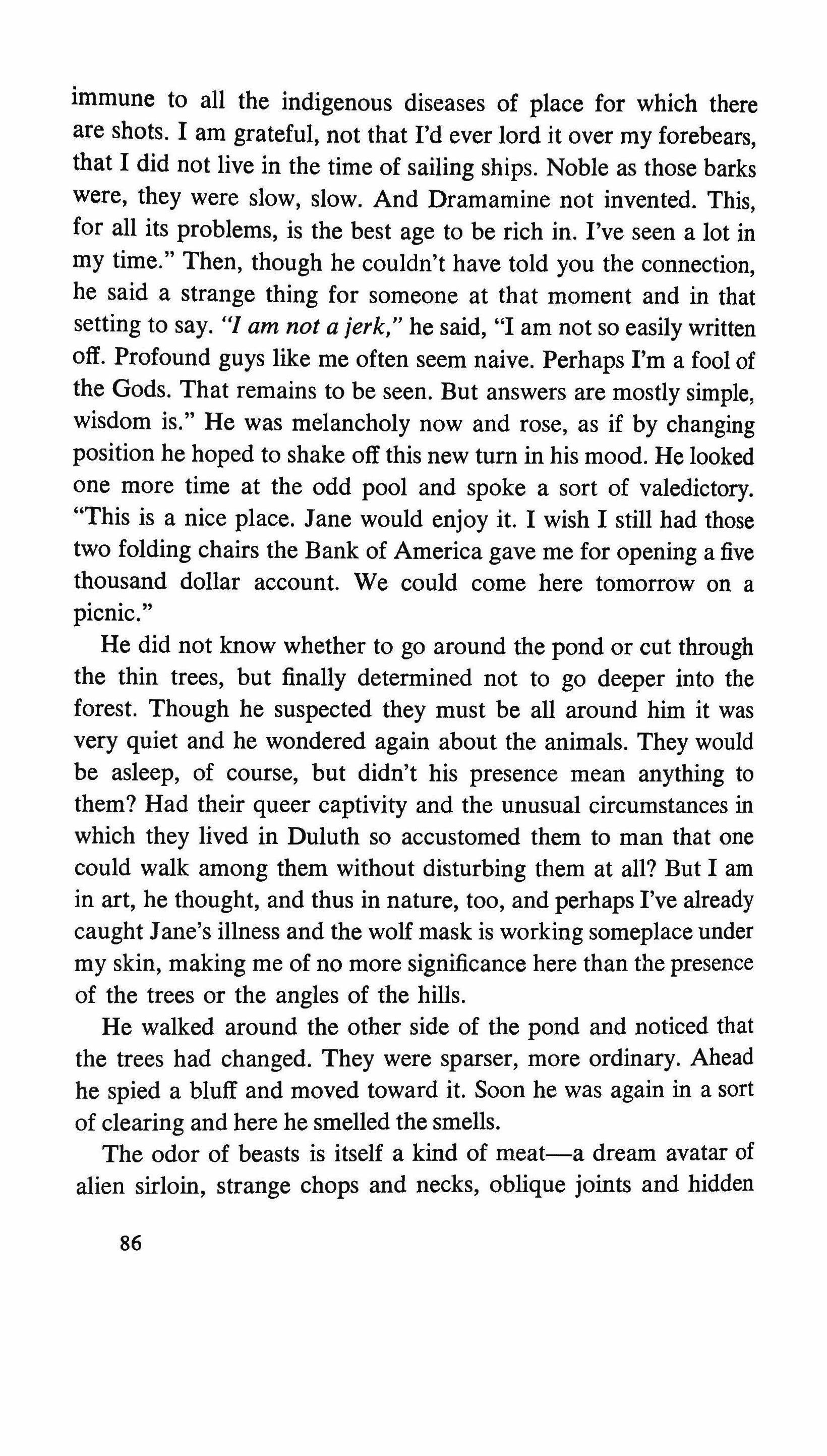
immune to all the indigenous diseases of place for which there are shots. I am grateful, not that I'd ever lord it over my forebears, that I did not live in the time of sailing ships. Noble as those barks were, they were slow, slow. And Dramamine not invented. This, for all its problems, is the best age to be rich in. I've seen a lot in my time." Then, though he couldn't have told you the connection, he said a strange thing for someone at that moment and in that setting to say. "I am not a jerk," he said, "I am not so easily written off. Profound guys like me often seem naive. Perhaps I'm a fool of the Gods. That remains to be seen. But answers are mostly simple, wisdom is." He was melancholy now and rose, as if by changing position he hoped to shake off this new turn in his mood. He looked one more time at the odd pool and spoke a sort of valedictory. "This is a nice place. Jane would enjoy it. I wish I still had those two folding chairs the Bank of America gave me for opening a five thousand dollar account. We could come here tomorrow on a picnic."
He did not know whether to go around the pond or cut through the thin trees, but finally determined not to go deeper into the forest. Though he suspected they must be all around him it was very quiet and he wondered again about the animals. They would be asleep, of course, but didn't his presence mean anything to them? Had their queer captivity and the unusual circumstances in which they lived in Duluth so accustomed them to man that one could walk among them without disturbing them at all? But I am in art, he thought, and thus in nature, too, and perhaps I've already caught Jane's illness and the wolf mask is working someplace under my skin, making me of no more significance here than the presence of the trees or the angles of the hills.
He walked around the other side of the pond and noticed that the trees had changed. They were sparser, more ordinary. Ahead he spied a bluff and moved toward it. Soon he was again in a sort of clearing and here he smelled the smells.
The odor of beasts is itself a kind of meat-a dream avatar of alien sirloin, strange chops and necks, oblique joints and hidden
86

livers and secret roasts. There are nude juices in it and licey furs, and all the flesh's vegetation. It is friction which rubs the fleshly chemistry, releasing it, sending skyhigh the queer subversive gases of oblique life forms. It is noxious. Separated as we are from animals in zoos by glass cages and fenced off moats and by, as well, the counter odors of human crowds, melting ice cream, peanut shells crushed underfoot, snow cones, mustard, bits of bun, all the detritus of a Sunday outing, we rarely smell it. What gets through is dissipated, for a beast in civilization does not even smell like a beast in the wild. Already evolution has begun its gentling work, as though the animals might actually feel compunction, some subtle, aggravating modesty. But there, in Plympton's jungle, the smells were uninhibited, biological, profane. Their acidity brought tears to Ashenden's eyes and he had to rub them. When he took his hands away he saw where he was.
He had entered, he knew, the last of the pictures. Although he could not at first identify it, much was familiar. The vegetation, for example, was unmistakably Rousseau, with here and there a Gauguin calabash or stringy palm. There were other palms, hybrid as the setting itself, queer gigantic leaves flying from conventional European trunks. The odor was fierce but he couldn't leave. At his feet were thick Rousseauvian candelabras of grass and before him vertical pagoda clusters of enormous flowers, branches dangerously bent under the weight of heavy leaves like the notched ears of elephants. Everywhere were fernlike trees, articulated as spine or rib cage, a wide net of the greenly skeletal and the crossed swords of tall grasses. There were rusts and tawns and huge wigwam shapes and shadows like the entrances to caves, black as yawns. The odor was even more overpowering than before, and had he not seen the vegetation, turgent as the full moon, he would have thought himself at the fermented source of the winish world. Yet the leaves and grasses and bushes and flowers were ripe. He reached out and touched a leaf in a low branch and licked his hand and it was sweet. Still, the place stank. The smell was acrid, actually hot. Here the forest was made impenetrable by its very
87
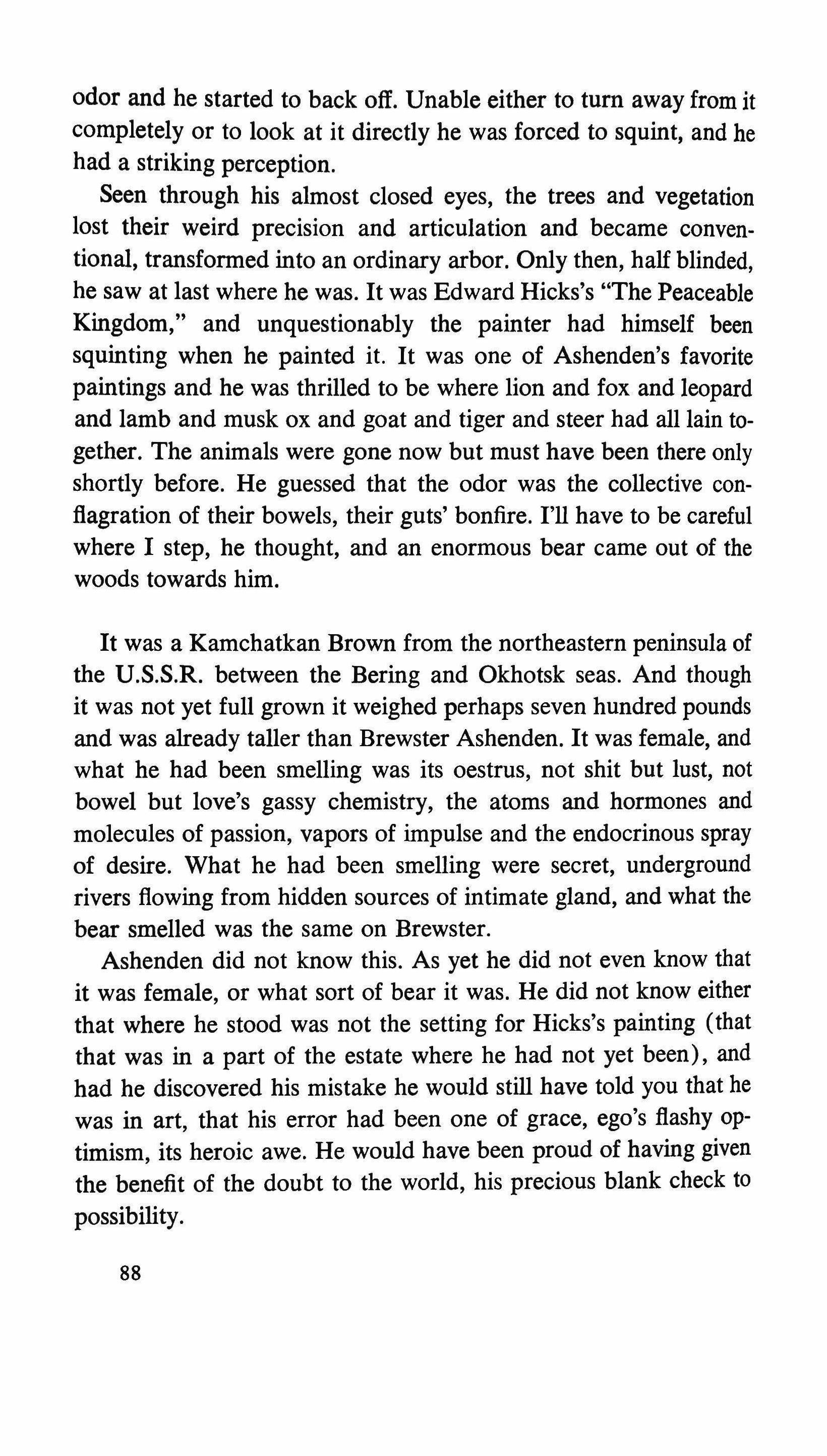
odor and he started to back off. Unable either to turn away from it completely or to look at it directly he was forced to squint, and he had a striking perception.
Seen through his almost closed eyes, the trees and vegetation lost their weird precision and articulation and became conventional, transformed into an ordinary arbor. Only then, half blinded, he saw at last where he was. It was Edward Hicks's "The Peaceable Kingdom," and unquestionably the painter had himself been squinting when he painted it. It was one of Ashenden's favorite paintings and he was thrilled to be where lion and fox and leopard and lamb and musk ox and goat and tiger and steer had all lain together. The animals were gone now but must have been there only shortly before. He guessed that the odor was the collective conflagration of their bowels, their guts' bonfire. I'll have to be careful where I step, he thought, and an enormous bear came out of the woods towards him.
It was a Kamchatkan Brown from the northeastern peninsula of the U.S.S.R. between the Bering and Okhotsk seas. And though it was not yet full grown it weighed perhaps seven hundred pounds and was already taller than Brewster Ashenden. It was female, and what he had been smelling was its oestrus, not shit but lust, not bowel but love's gassy chemistry, the atoms and hormones and molecules of passion, vapors of impulse and the endocrinous spray of desire. What he had been smelling were secret, underground rivers flowing from hidden sources of intimate gland, and what the bear smelled was the same on Brewster.
Ashenden did not know this. As yet he did not even know that it was female, or what sort of bear it was. He did not know either that where he stood was not the setting for Hicks's painting (that that was in a part of the estate where he had not yet been), and had he discovered his mistake he would still have told you that he was in art, that his error had been one of grace, ego's flashy optimism, its heroic awe. He would have been proud of having given the benefit of the doubt to the world, his precious blank check to possibility.
88
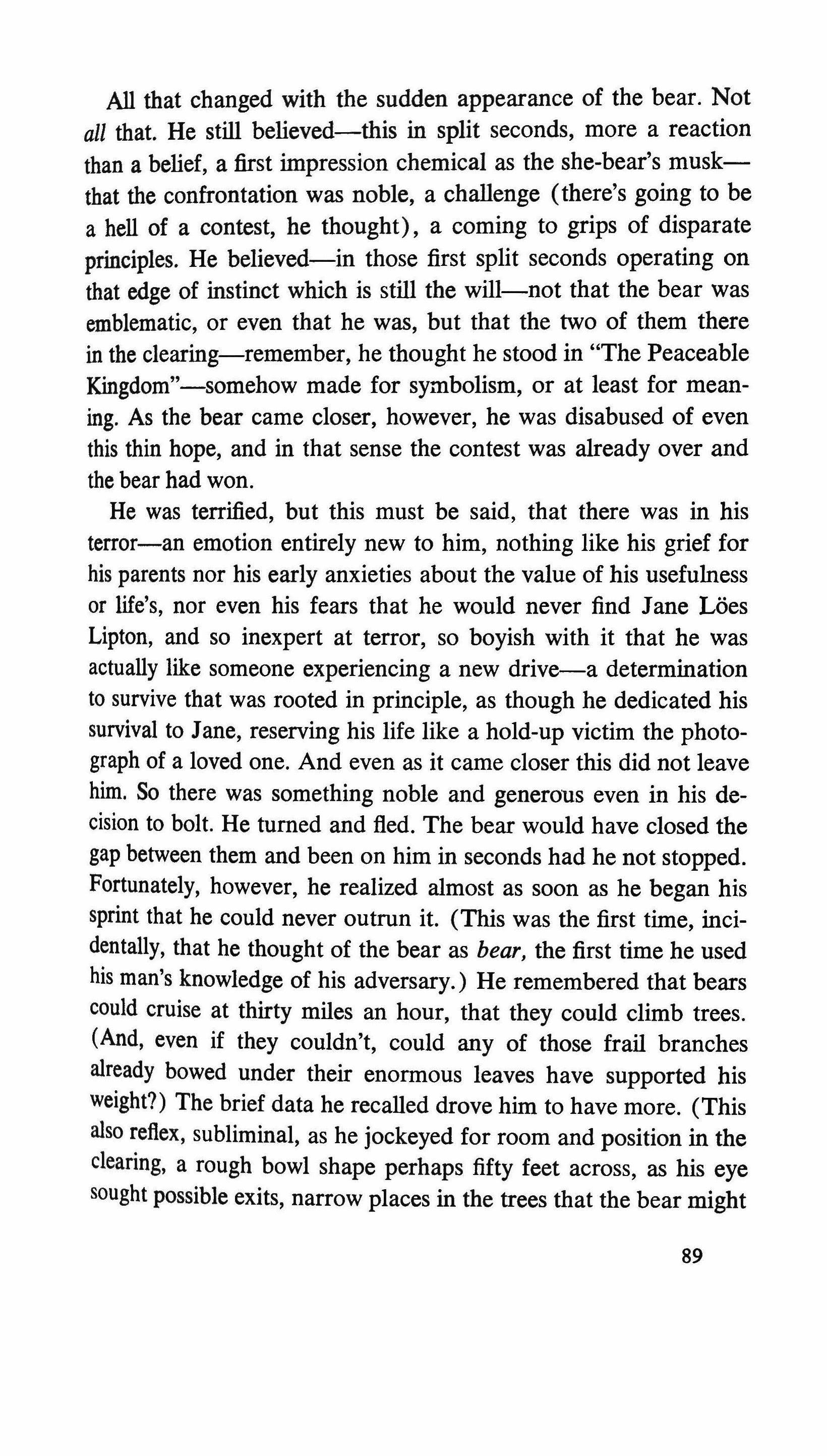
All that changed with the sudden appearance of the bear. Not all that. He still believed-this in split seconds, more a reaction than a belief, a first impression chemical as the she-bear's muskthat the confrontation was noble, a challenge (there's going to be a hell of a contest, he thought), a coming to grips of disparate principles. He believed-in those first split seconds operating on that edge of instinct which is still the will-not that the bear was emblematic, or even that he was, but that the two of them there in the clearing-remember, he thought he stood in "The Peaceable Kingdom"-somehow made for symbolism, or at least for meaning. As the bear came closer, however, he was disabused of even this thin hope, and in that sense the contest was already over and the bear had won.
He was terrified, but this must be said, that there was in his terror-an emotion entirely new to him, nothing like his grief for his parents nor his early anxieties about the value of his usefulness or life's, nor even his fears that he would never find Jane Loes Lipton, and so inexpert at terror, so boyish with it that he was actually like someone experiencing a new drive-a determination to survive that was rooted in principle, as though he dedicated his survival to Jane, reserving his life like a hold-up victim the photograph of a loved one. And even as it came closer this did not leave him. So there was something noble and generous even in his decision to bolt. He turned and fled. The bear would have closed the gap between them and been on him in seconds had he not stopped. Fortunately, however, he realized almost as soon as he began his sprint that he could never outrun it. (This was the first time, incidentally, that he thought of the bear as bear, the first time he used his man's knowledge of his adversary.) He remembered that bears could cruise at thirty miles an hour, that they could climb trees. (And, even if they couldn't, could any of those frail branches already bowed under their enormous leaves have supported his weight?) The brief data he recalled drove him to have more. (This also reflex, subliminal, as he jockeyed for room and position in the clearing, a rough bowl shape perhaps fifty feet across, as his eye sought possible exits, narrow places in the trees that the bear might 89
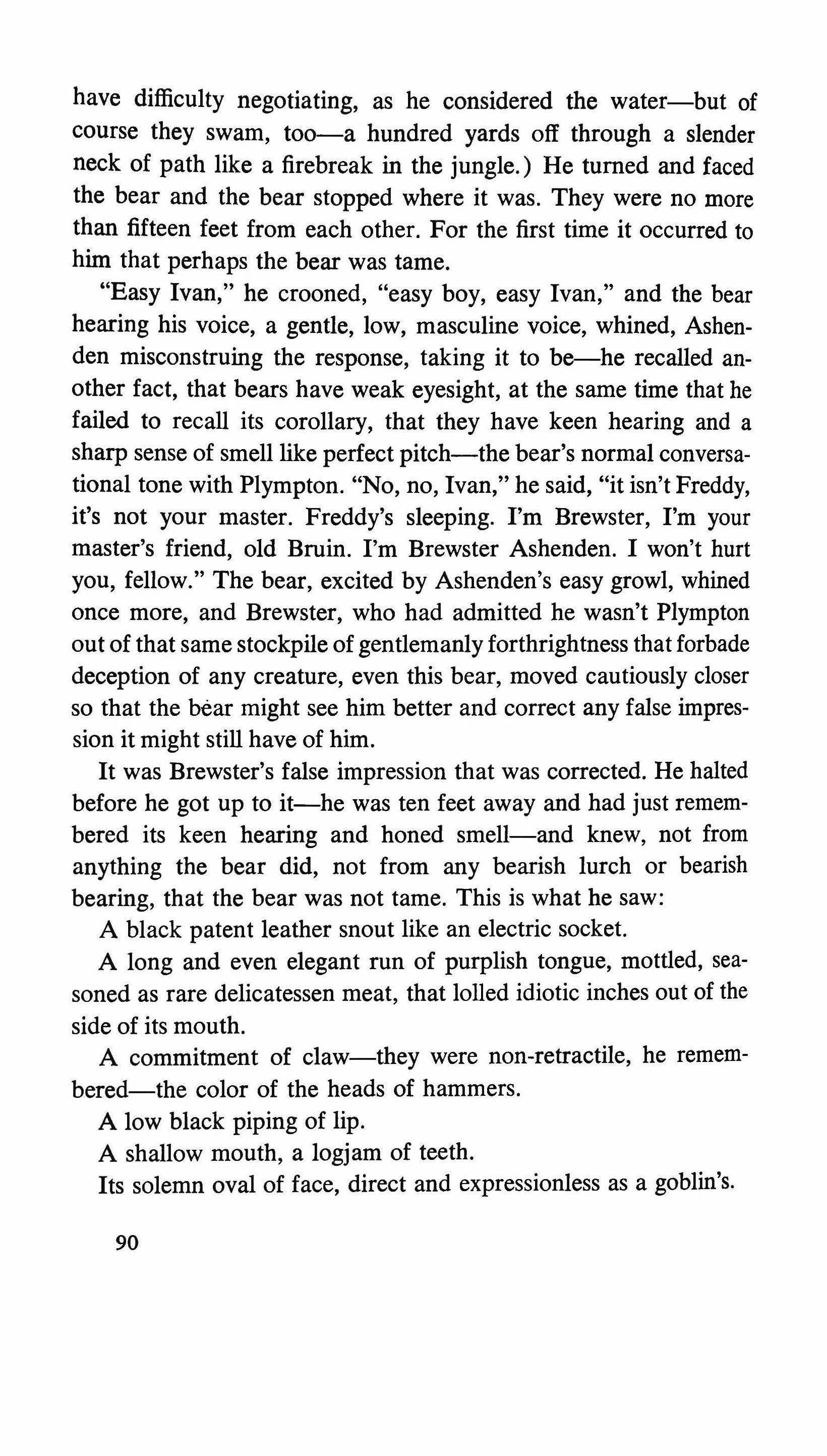
have difficulty negotiating, as he considered the water-but of course they swam, too-a hundred yards off through a slender neck of path like a firebreak in the jungle.) He turned and faced the bear and the bear stopped where it was. They were no more than fifteen feet from each other. For the first time it occurred to him that perhaps the bear was tame.
"Easy Ivan," he crooned, "easy boy, easy Ivan," and the bear hearing his voice, a gentle, low, masculine voice, whined, Ashenden misconstruing the response, taking it to be-he recalled another fact, that bears have weak eyesight, at the same time that he failed to recall its corollary, that they have keen hearing and a sharp sense of smell like perfect pitch-the bear's normal conversational tone with Plympton. "No, no, Ivan," he said, "it isn't Freddy, it's not your master. Freddy's sleeping. I'm Brewster, I'm your master's friend, old Bruin. I'm Brewster Ashenden. I won't hurt you, fellow." The bear, excited by Ashenden's easy growl, whined once more, and Brewster, who had admitted he wasn't Plympton out of that same stockpile of gentlemanlyforthrightness that forbade deception of any creature, even this bear, moved cautiously closer so that the bear might see him better and correct any false impression it might still have of him.
It was Brewster's false impression that was corrected. He halted before he got up to it-he was ten feet away and had just remembered its keen hearing and honed smell-and knew, not from anything the bear did, not from any bearish lurch or bearish bearing, that the bear was not tame. This is what he saw:
A black patent leather snout like an electric socket.
A long and even elegant run of purplish tongue, mottled, seasoned as rare delicatessen meat, that lolled idiotic inches out of the side of its mouth.
A commitment of claw-they were non-retractile, he remembered-the color of the heads of hammers.
A low black piping of lip.
A shallow mouth, a logjam of teeth.
Its solemn oval of face, direct and expressionless as a goblin's.
90

Ears, high on its head and discrete as antlers.
Its stolid, plantigrade stance, a flash as it took a step towards him of the underside of its smooth, hairless paws, vaguely like the bottoms of carpet slippers.
A battering ram of head and neck, pendent from a hump of muscle on its back, high as a bull's or buffalo's.
The coarse shag upholstery of its blunt body, greasy as furniture.
He knew it was not tame even when it settled dog fashion on the ground and its short, thick limbs seemed to disappear, its body hiding in its body. And he whirled suddenly and ran again and the bear was after him. Over his shoulder he could see, despite its speed, the slow, ponderous meshing of muscle and fat behind its fur like a child rustling a curtain, and while he was still looking at this the bear felled him. He was not sure whether it had raised its paw against him, or butted him, or collided with him, but he was sent sprawling-a grand fall, an amusing and almost painless one.
He found himself on the ground, his limbs spraddled, like someone old and sitting on a beach, and it was terrible to Ashenden that for all his sudden speed and the advantage of surprise and the fact that the bear had been settled dog fashion and even the distance he had been sent flying, he was no more than a few feet from the place where he had begun his run.
Actually it took him several seconds before he realized that he no longer saw the bear.
"Thank God," he said, "I'm saved," and with a lightning stroke the bear reached down from behind Ashenden's back and tore away his fly, including the underwear. Then, just as quickly, it was in front of him. "Hey," Ashenden cried, bringing his legs together and covering himself with his hands. The tear in his trousers was exactly like the inside concatenary seam along the thigh and crotch of riding pants.
"��ng," said the bear in the International Phonetic Alphabet. Brewster scrambled to his knees and the bear watched him. "6?>hwm.
91

"All right," Ashenden said, "back off!" His voice was sharp and commanding as he could make it. "Back off, I said!"
"KHAer KH<Yonn."
"Go," he commanded. "Go on. Shoo. Shoo you." And still barking orders at it-he had adopted the masterful, no nonsense style of the animal trainer-he rose to his feet and actually shoved the bear as hard as he could. Surprisingly it yielded and Brewster, encouraged, punched it with all his considerable strength along the side of its head. It shook itself briefly and, as if it meant to do no more than simply alter its position, dropped to the ground, rolled over-the movement like the practiced effort of a cripple, clumsy yet incredibly powerful-and sat up. It was sitting in much the same position as Ashenden's a moment before, and it was only then that Ashenden saw its sex billowing the heavy curtain of hair that hung above its groin-a swollen, grotesque ring of vulva the color and texture of an ear and crosshatched with long loose hairs; a distended pucker of vagina; a Hack tunnel of oviduct; an inner tube of cunt. Suddenly the she-bear strummed itself with a brusque downbeat of claw and moaned. Ashenden moved back and the bear made another gesture, oddly whorish and insistent. It was as if it beckoned Ashenden across a barrier not of animal and man but of language-Chinese, say, and Rumanian. It made its strange movement again and this time barked its moan, a command, a grammar of high complication, of difficult, irregular case and gender and tense, a classic of aberrant syntax. This was exactly as he took it, like a student of language who for the first time finds himself hearing in real and ordinary life a unique textbook usage.
Oh God, he thought, I understand Bear!
He did not know what to do, and felt in his pockets for weapons and scanned the ground for rocks and the bear, watching him, emitted a queer growl and Ashenden understood that, too.
She-it was the first time he allowed himself to acknowledge her sex-had mistaken his rapid, reflexive frisking for courtship and perhaps his hurried glances at the ground for some stagey, bumpkin shyness.
92

"Look here," Ashenden said, "I'm a man and you're a bear," and it was precisely as he had addressed those wives of his hosts and fellow guests who had made overtures to him, exactly as he might put off all those girls whose station in life, inferior to his own, made them ineligible. There was reproof in his declaration yet an acknowledgment too that he was flattered and even, to soften his demurrer, a touch of gallant regret. He turned as he might have turned in a drawing room or at the landing of a staircase and the bear roared and Ashenden, terrorized, turned back to face it. If before he had made blunders of grace, now, inspired by his opportunities--close calls arbitrarily exalted or debased menhe corrected them, and made a remarkable speech.
"You're in rut. There are evidently no male bears here. Listen, you look familiar. I've seen your kind in circuses. You must be Kamchatkan. You stand on your hind legs in the center ring and wear an apron and a dowdy hat with flowers on it that stand up stiff as pipes. You wheel a cub in a carriage and do jointed, clumsy curtseys, and the muzzle's just for show, reassurance, state law and municipal ordinance and an increment of the awful to suggest your beastliness as the apron and hat your matronliness. Your decals are on the walls of playrooms and nurseries and in the anterooms of pediatricians' offices. So there must be something in you domestic to begin with, and it is to that which I now appeal, Madam."
The bear, seated and whimpering throughout Ashenden's speech, was in a frenzy now, still of noise, not yet of motion, though it strummed its genitalia like a guitar and Brewster, the concomitant insights of danger on him like prophecy, shuddered, understanding that though he now appreciated his situation he had still made one mistake. No, he thought, not madam. If there were no male bears-and wouldn't there be if she were in oestrus?-it was because the bear was not yet full-grown and had not till now needed mates. It was this which alarmed him more than anything he had yet realized. It meant that these feelings were new to her, horrid sensations of mad need, ecstasy in extremis. She would kill him. 93
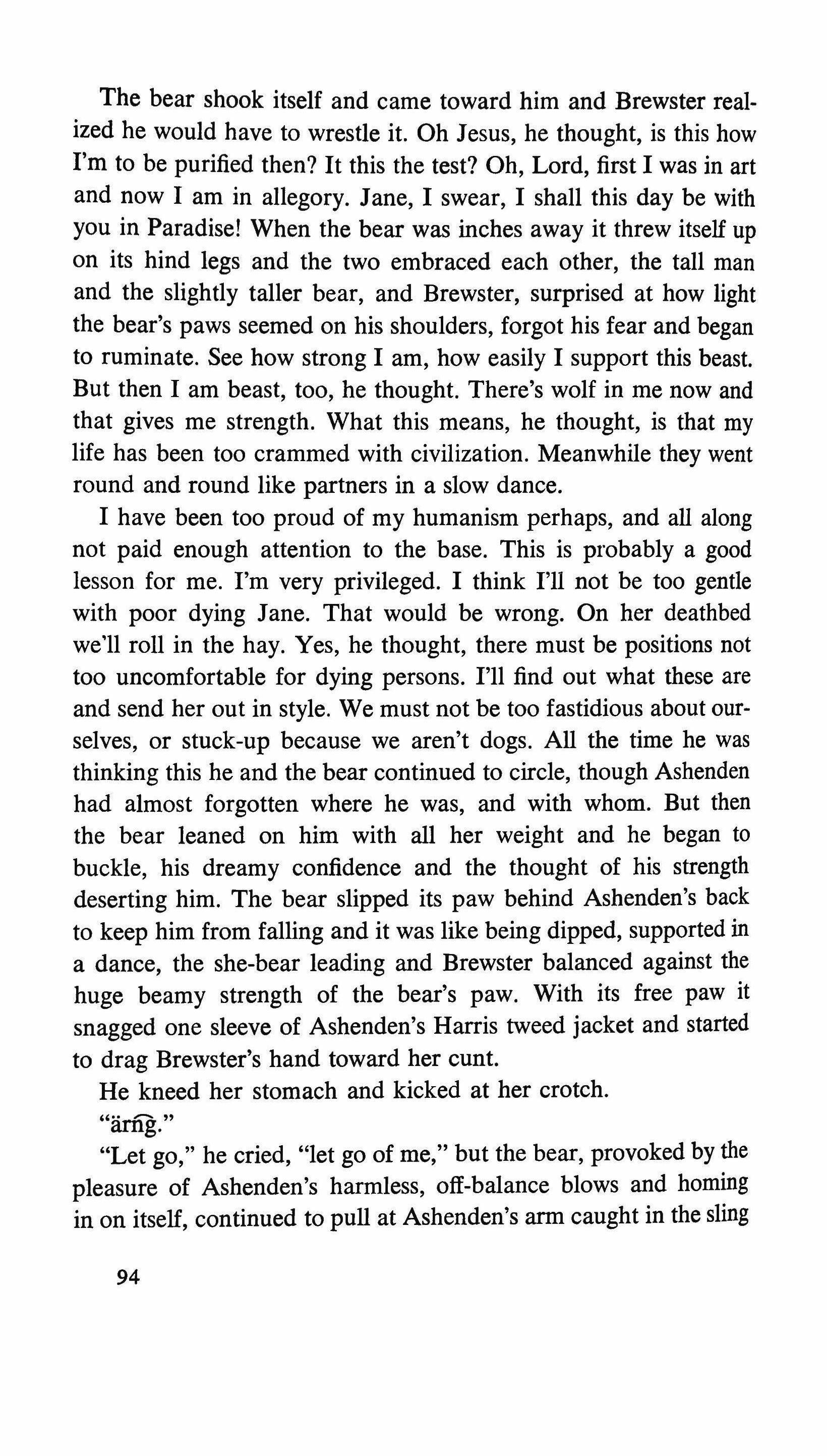
The bear shook itself and came toward him and Brewster realized he would have to wrestle it. Oh Jesus, he thought, is this how I'm to be purified then? It this the test? Oh, Lord, first I was in art and now I am in allegory. Jane, I swear, I shall this day be with you in Paradise! When the bear was inches away it threw itself up on its hind legs and the two embraced each other, the tall man and the slightly taller bear, and Brewster, surprised at how light the bear's paws seemed on his shoulders, forgot his fear and began to ruminate. See how strong I am, how easily I support this beast. But then I am beast, too, he thought. There's wolf in me now and that gives me strength. What this means, he thought, is that my life has been too crammed with civilization. Meanwhile they went round and round like partners in a slow dance.
I have been too proud of my humanism perhaps, and all along not paid enough attention to the base. This is probably a good lesson for me. I'm very privileged. I think I'll not be too gentle with poor dying Jane. That would be wrong. On her deathbed we'll roll in the hay. Yes, he thought, there must be positions not too uncomfortable for dying persons. I'll find out what these are and send her out in style. We must not be too fastidious about ourselves, or stuck-up because we aren't dogs. All the time he was thinking this he and the bear continued to circle, though Ashenden had almost forgotten where he was, and with whom. But then the bear leaned on him with all her weight and he began to buckle, his dreamy confidence and the thought of his strength deserting him. The bear slipped its paw behind Ashenden's back to keep him from falling and it was like being dipped, supported in a dance, the she-bear leading and Brewster balanced against the huge beamy strength of the bear's paw. With its free paw it snagged one sleeve of Ashenden's Harris tweed jacket and started to drag Brewster's hand toward her cunt.
He kneed her stomach and kicked at her crotch.
"arng."
"Let go," he cried, "let go of me," but the bear, provoked by the pleasure of Ashenden's harmless, off-balance blows and homing in on itself, continued to pull at Ashenden's arm caught in the sling
94
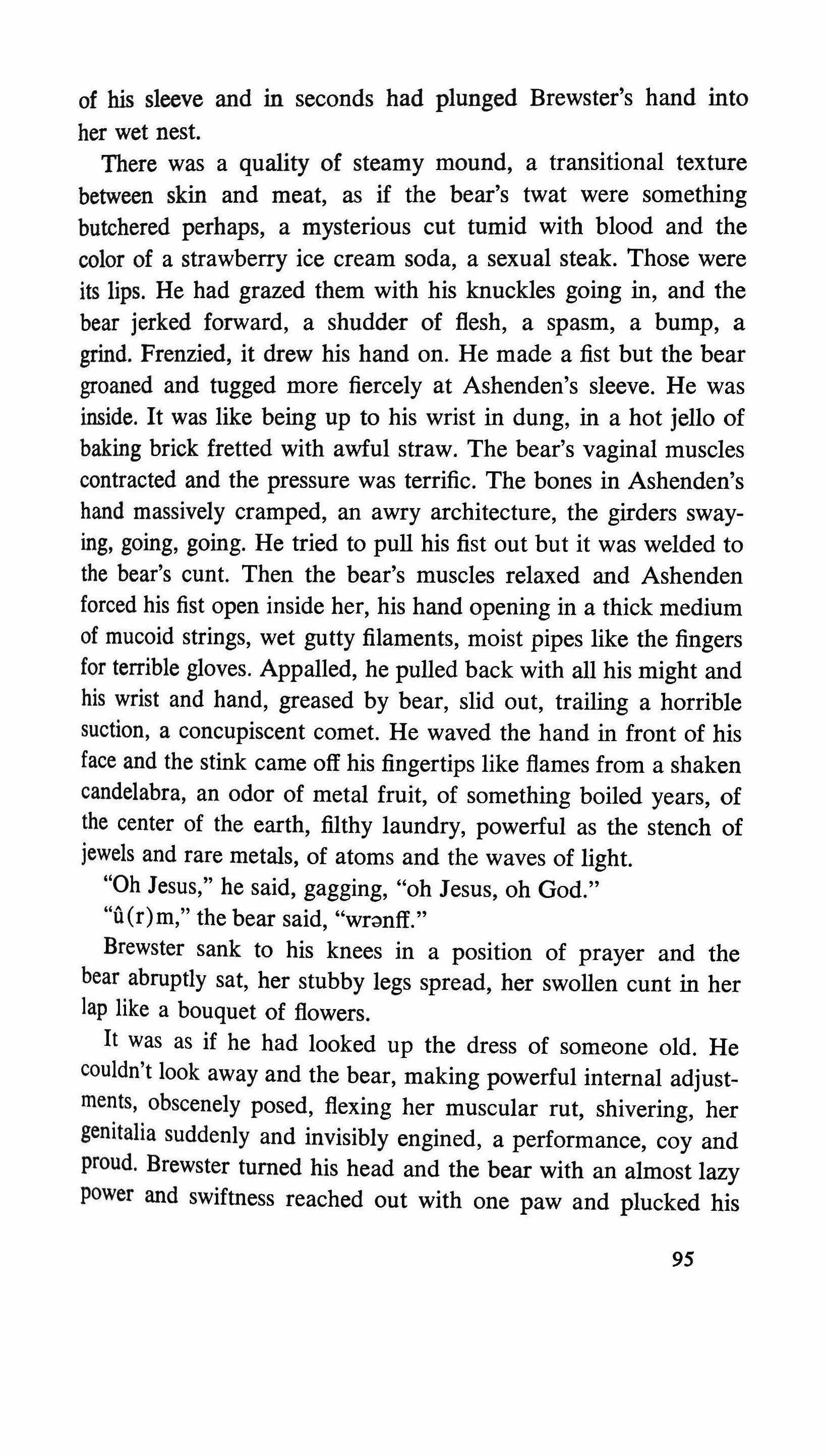
of his sleeve and in seconds had plunged Brewster's hand into her wet nest.
There was a quality of steamy mound, a transitional texture between skin and meat, as if the bear's twat were something butchered perhaps, a mysterious cut tumid with blood and the color of a strawberry ice cream soda, a sexual steak. Those were its lips. He had grazed them with his knuckles going in, and the bear jerked forward, a shudder of flesh, a spasm, a bump, a grind. Frenzied, it drew his hand on. He made a fist but the bear groaned and tugged more fiercely at Ashenden's sleeve. He was inside. It was like being up to his wrist in dung, in a hot jello of baking brick fretted with awful straw. The bear's vaginal muscles contracted and the pressure was terrific. The bones in Ashenden's hand massively cramped, an awry architecture, the girders swaying, going, going. He tried to pull his fist out but it was welded to the bear's cunt. Then the bear's muscles relaxed and Ashenden forced his fist open inside her, his hand opening in a thick medium of mucoid strings, wet gutty filaments, moist pipes like the fingers for terrible gloves. Appalled, he pulled back with all his might and his wrist and hand, greased by bear, slid out, trailing a horrible suction, a concupiscent comet. He waved the hand in front of his face and the stink came off his fingertips like flames from a shaken candelabra, an odor of metal fruit, of something boiled years, of the center of the earth, filthy laundry, powerful as the stench of jewels and rare metals, of atoms and the waves of light.
"Oh Jesus," he said, gagging, "oh Jesus, oh God."
"u(r)m," the bear said, "wronff."
Brewster sank to his knees in a position of prayer and the bear abruptly sat, her stubby legs spread, her swollen cunt in her lap like a bouquet of flowers.
It was as if he had looked up the dress of someone old. He couldn't look away and the bear, making powerful internal adjustments, obscenely posed, flexing her muscular rut, shivering, her genitalia suddenly and invisibly engined, a performance, coy and proud. Brewster turned his head and the bear with an almost lazy power and swiftness reached out with one paw and plucked his
95

cock out of his torn trousers. Ashenden winced-not in pain, the paw's blow had been gentle and accurate as a surgical thrust, his penis hooked, almost comfortable, a heel in a shoe, snug in the bear's curved claws smooth and cool as piano keys-and looked down.
"OER�KH."
\,....I
His penis was erect. "That's Jane's, not yours," he shouted. "My left hand doesn't know what my right hand is doing!"
The bear snorted and swiped with the broad edge of her forepaw against each side of Ashenden's peter. Her fur, lanolized by oestrus, was incredibly'soft, the two swift strokes gestures of forbidden brunette possibility.
And of all the things he'd said and thought and felt that night, this was the most reasonable, the most elegantly strategic-that he would have to satisfy the bear, make love to the bear, [uck the bear. And this was the challenge which had at last defined itself, the test he'd longed for and was now to have. Here was the problem. Not whether it was possible for a mere man of something less than one hundred and eighty pounds to make love to an enormous monster of almost half a ton, not whether a normal man like himself could negotiate the barbarous terrains of the beast or bring the bear off before it killed him, but merely how he, Brewster Ashenden of the proud old families, of the air, water, fire and earth Ashendens, one of the most fastidious men alive, could bring himself to do it, how, in short, he could get it up for a bear!
But he had forgotten-and now remembered-it was already up. And if he had told the bear it was for Jane and not for it, he had spoken in frenzy, in terror and error and shock. And this occurred to him: that he had not been thinking of Jane at all, that she was as distant from his mind at that moment as the warranties he possessed for all the electric blankets and clock radios and space heaters he'd picked up for opening accounts in banks, as distant as the owner's manuals stuffed into drawers for all that stuff, as forgotten as all the tennis matches he'd played on the clay and
96
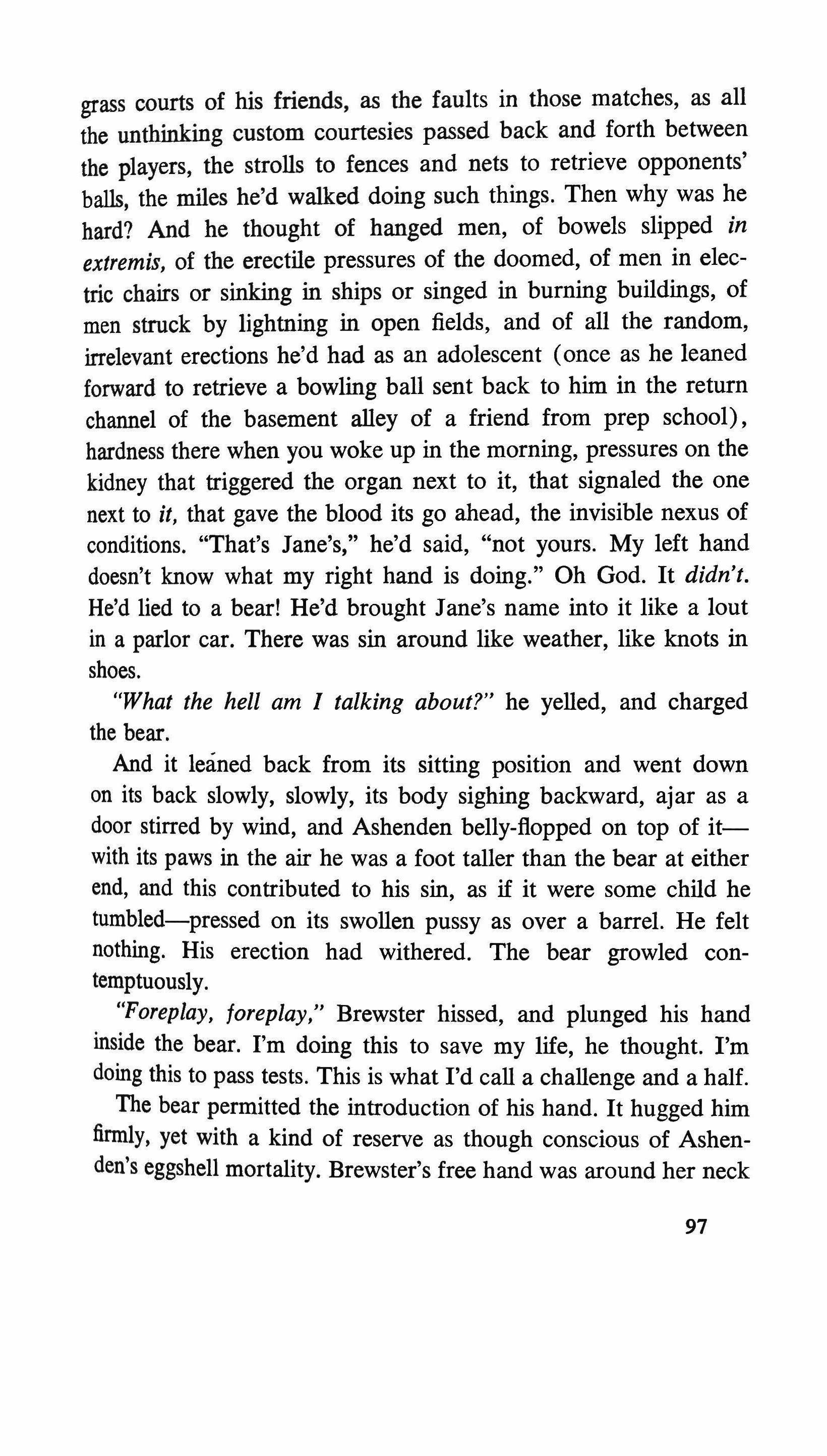
grass courts of his friends, as the faults in those matches, as all the unthinking custom courtesies passed back and forth between the players, the strolls to fences and nets to retrieve opponents' balls, the miles he'd walked doing such things. Then why was he hard? And he thought of hanged men, of bowels slipped in extremis, of the erectile pressures of the doomed, of men in electric chairs or sinking in ships or singed in burning buildings, of men struck by lightning in open fields, and of all the random, irrelevant erections he'd had as an adolescent (once as he leaned forward to retrieve a bowling ball sent back to him in the return channel of the basement alley of a friend from prep school), hardness there when you woke up in the morning, pressures on the kidney that triggered the organ next to it, that signaled the one next to it, that gave the blood its go ahead, the invisible nexus of conditions. "That's Jane's," he'd said, "not yours. My left hand doesn't know what my right hand is doing." Oh God. It didn't. He'd lied to a bear! He'd brought Jane's name into it like a lout in a parlor car. There was sin around like weather, like knots in shoes.
"What the hell am I talking about?" he yelled, and charged the bear.
And it leaned back from its sitting position and went down on its back slowly, slowly, its body sighing backward, ajar as a door stirred by wind, and Ashenden belly-flopped on top of itwith its paws in the air he was a foot taller than the bear at either end, and this contributed to his sin, as if it were some child he tumbled-pressed on its swollen pussy as over a barrel. He felt nothing. His erection had withered. The bear growled contemptuously.
"Foreplay, foreplay," Brewster hissed, and plunged his hand inside the bear. I'm doing this to save my life, he thought. I'm doing this to pass tests. This is what I'd call a challenge and a half.
The bear permitted the introduction of his hand. It hugged him firmly, yet with a kind of reserve as though conscious of Ashenden's eggshell mortality. Brewster's free hand was around her neck
97

while the other moved around inside the bear insinuatingly. He felt a clit like a baseball. One hand high and one hand low, his head, mouth closed, buried in the mound of fur just to the side of the bear's neck, he was like a man doing the Australian crawl. The bear shifted. Still locked together the two of them rolled over and over through the peaceable kingdom. For Ashenden it was like being run over, but she permitted him to come out on top. His hand had taken a terrific wrenching however, and he knew he had to get it out before it swelled and he was unable to move it.
Jesus, I've stubbed my hand, he thought, and began to withdraw it gently, gingerly through a booby-trapped channel of obstacle grown enormous by his injury, a minefield of pain. The bear lay stock still as he reeled in his hand, climbing out of her cunt as up a rope. (Perhaps this feels good to her, he thought tenderly.) At last, love's Little Jack Horner, it was out and Ashcnden, his hand bent at almost a right angle to his wrist, felt disarmed. What he had counted on-without realizing he counted on it-was no longer available to him. He would not be able to manipulate the bear, he would not be able to get away with merely jerking it off. It was another. illusion stripped away. He would have to screw the animal conventionally.
Come on, he urged his cock, wax, grow, grow. He pled with his penis and took it in his good hand and rubbed it furiously, desperately, polishing it like an heirloom, Aladdinizing it helplessly, uselessly. Meanwhile, tears in his own, he looked deep into the bear's eyes and stalling blew crazy kisses to it off his broken hand and said foolish things, making it incredible promises, keeping up a lame chatter, like pepper talk around an infield.
"Just a minute. Hold on a sec. I'm almost ready. It's going to be something. It's really I've just got to Look, there's really nothing to worry about. Everything's going to work out fine. I'm going to be a man for you, darling. Just give me a chance, will you? Listen," he said, "I love you. 1 don't think 1 can live without you. 1 want you to marry me." He didn't know what he was saying, merely jabbered, unconsciously selecting, with a sort
98

of sexual guile he hadn't known he possessed, phrases from love, the compromising salestalk of romantic stall. He had been maidenized, a game, scared bride at the bedside. He began to hear himself, to listen to what he was saying. He'd never spoken this way to a woman in his life. Where did he get this stuff? Where did it come from? It was the shallow language of two-timers, of drummers with farm girls, of whores holding out and gigolos holding in, the conversation of cuckoldry, of all amorous greed. It was base and cheap and tremendously exciting and suddenly Ashenden felt a stirring, the beginning of a faint lust. He moved to the spark like an arsonist and gazed steadily at the enormous hulk of impatient bear, at its black eyes cute as coal or checkers on a snowman. Yes, he thought, afraid he'd lose it, yes. I am the wuvver of the teddy bear, big bwown bear's wittle white man.
He unbuckled his pants and let them drop and stepped out of his underwear feeling moonlight on his ass. He moved out of his jacket and tore off his shirt, his undershirt. He ran up against the bear. He slapped at it with his dick. He turned his back to it and moved the spread cheeks of his behind up and down on its pelt. He climbed it, impaling himself on the strange softness of the enormous toy. He kissed it.
Pet, pet, he thought. "Pet," he moaned, his eyes closed now. "My pet, my pet." Yes, he thought, yes. And remembered, saw, suddenly, all the animals he had ever petted, all the furry underbellies, writhing, inviting his nails, all the babies whose rubbery behinds he'd squeezed, the little girls he'd drawn toward him and held between his knees to comfort or tell a secret, their hair tickling his face, all small boys whose heads he'd rubbed, and cheeks taken between his fingers. We are all sodomites, he thought. There is disparity at the source of love. We are all sodomites, all pederasts, all dikes and queens and mother fuckers.
"Hey bear," he whispered, "d'ja ever notice how all the short, bald, fat men get all the tall, good-looking blondes?" He was stiffening fast. "Hey bear, m'am," he said, leaning naked against her fur, bare-assed and upright on a bear rug, "there's something
99
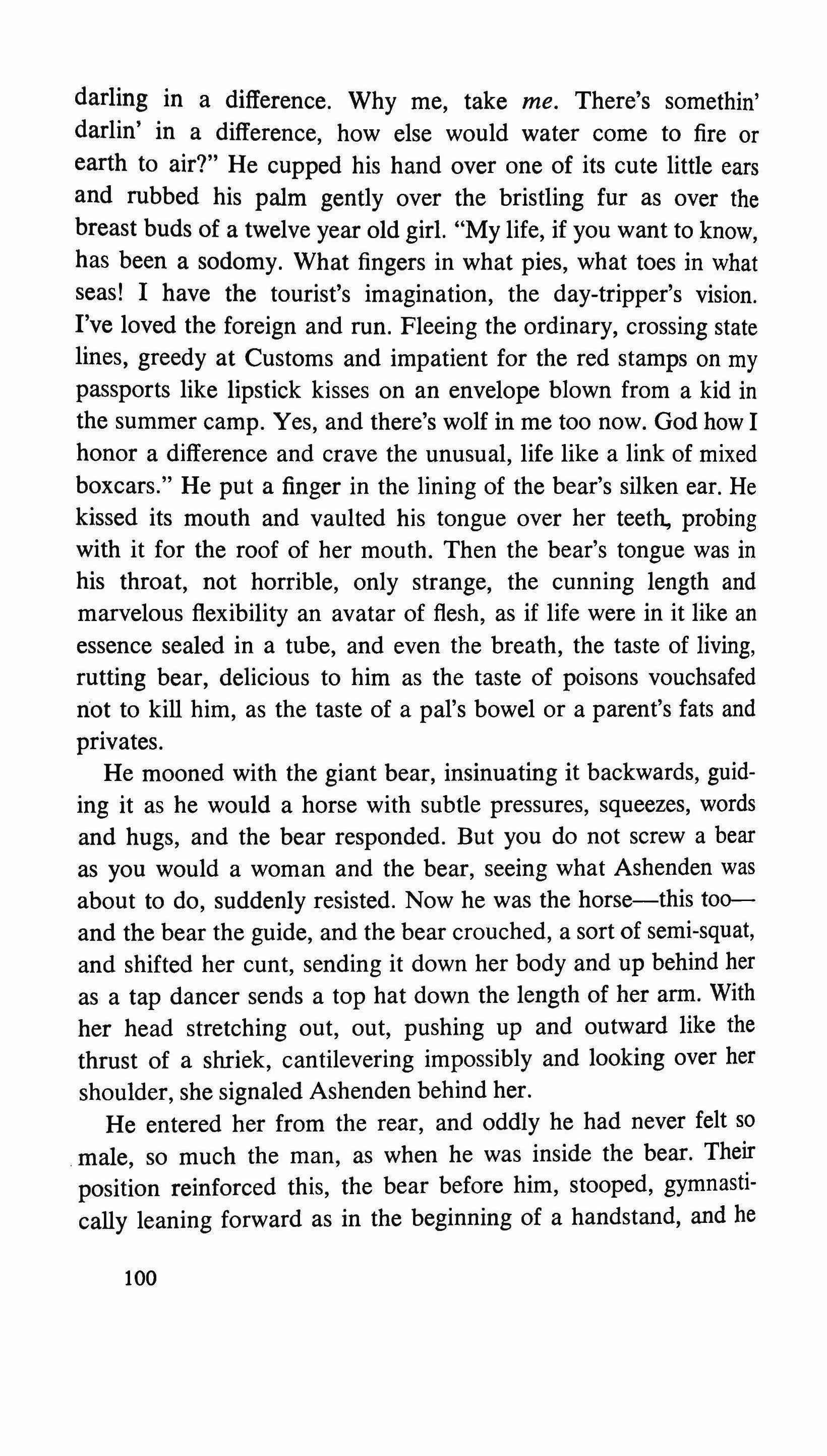
darling in a difference. Why me, take me. There's somethin' darlin' in a difference, how else would water come to fire or earth to air?" He cupped his hand over one of its cute little ears and rubbed his palm gently over the bristling fur as over the breast buds of a twelve year old girl. "My life, if you want to know, has been a sodomy. What fingers in what pies, what toes in what seas! I have the tourist's imagination, the day-tripper's vision. I've loved the foreign and run. Fleeing the ordinary, crossing state lines, greedy at Customs and impatient for the red stamps on my passports like lipstick kisses on an envelope blown from a kid in the summer camp. Yes, and there's wolf in me too now. God how I honor a difference and crave the unusual, life like a link of mixed boxcars." He put a finger in the lining of the bear's silken ear. He kissed its mouth and vaulted his tongue over her teeth, probing with it for the roof of her mouth. Then the bear's tongue was in his throat, not horrible, only strange, the cunning length and marvelous flexibility an avatar of flesh, as if life were in it like an essence sealed in a tube, and even the breath, the taste of living, rutting bear, delicious to him as the taste of poisons vouchsafed not to kill him, as the taste of a pal's bowel or a parent's fats and privates.
He mooned with the giant bear, insinuating it backwards, guiding it as he would a horse with subtle pressures, squeezes, words and hugs, and the bear responded. But you do not screw a bear as you would a woman and the bear, seeing what Ashenden was about to do, suddenly resisted. Now he was the horse-this tooand the bear the guide, and the bear crouched, a sort of semi-squat, and shifted her cunt, sending it down her body and up behind her as a tap dancer sends a top hat down the length of her arm. With her head stretching out, out, pushing up and outward like the thrust of a shriek, cantilevering impossibly and looking over her shoulder, she signaled Ashenden behind her.
He entered her from the rear, and oddly he had never felt so male, so much the man, as when he was inside the bear. Their position reinforced this, the bear before him, stooped, gymnastically leaning forward as in the beginning of a handstand, and he 100
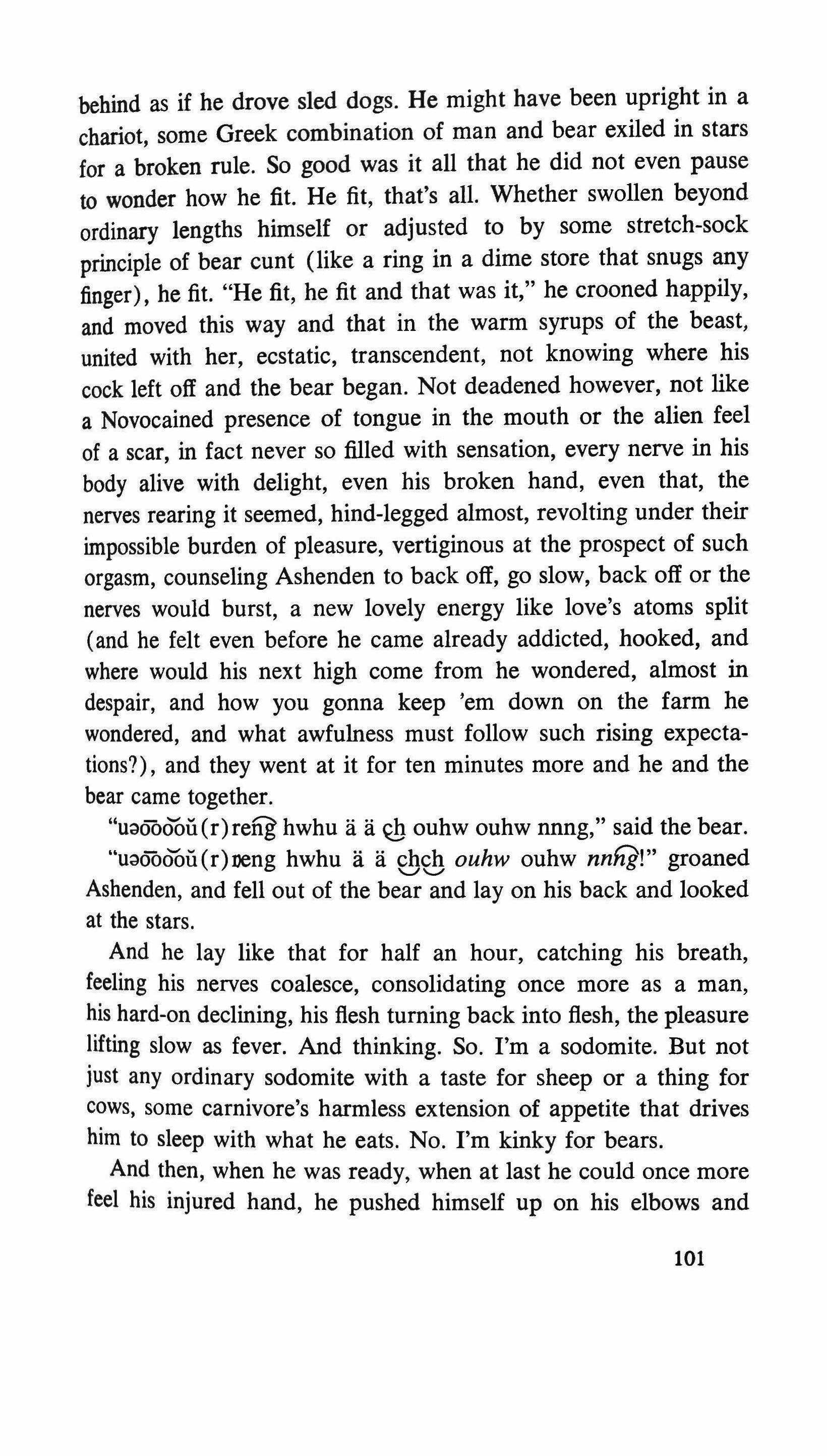
behind as if he drove sled dogs. He might have been upright in a chariot, some Greek combination of man and bear exiled in stars for a broken rule. So good was it all that he did not even pause to wonder how he fit. He fit, that's all. Whether swollen beyond ordinary lengths himself or adjusted to by some stretch-sock principle of bear cunt (like a ring in a dime store that snugs any finger), he fit. "He fit, he fit and that was it," he crooned happily, and moved this way and that in the warm syrups of the beast, united with her, ecstatic, transcendent, not knowing where his cock left off and the bear began. Not deadened however, not like a Novocained presence of tongue in the mouth or the alien feel of a scar, in fact never so filled with sensation, every nerve in his body alive with delight, even his broken hand, even that, the nerves rearing it seemed, hind-legged almost, revolting under their impossible burden of pleasure, vertiginous at the prospect of such orgasm, counseling Ashenden to back off, go slow, back off or the nerves would burst, a new lovely energy like love's atoms split (and he felt even before he came already addicted, hooked, and where would his next high come from he wondered, almost in despair, and how you gonna keep 'em down on the farm he wondered, and what awfulness must follow such rising expectations?), and they went at it for ten minutes more and he and the bear came together.
"u�oooou(r)reng hwhu a a 0 ouhw ouhw nnng," said the bear.
"u;}oooou(r)reng hwhu a a chch ouhw ouhw nnng!" groaned '-./ '--" Ashenden, and fell out of the bear and lay on his back and looked at the stars.
And he lay like that for half an hour, catching his breath, feeling his nerves coalesce, consolidating once more as a man, his hard-on declining, his flesh turning back into flesh, the pleasure lifting slow as fever. And thinking. So. I'm a sodomite. But not just any ordinary sodomite with a taste for sheep or a thing for cows, some carnivore's harmless extension of appetite that drives him to sleep with what he eats. No. I'm kinky for bears.
And then, when he was ready, when at last he could once more feel his injured hand, he pushed himself up on his elbows and
101

looked around. The bear was gone though he thought he saw its shape reclined, sleeping, beside a tree.
He stood up and looked down and examined himself. He put his clothes back on and they hung on him like flayed skin and he was conscious of vague withdrawal symptoms in his nuts. He moved into the moonlight. His penis looked as if it had been dipped in blood. Had it still been erect the blood might perhaps have gone unnoticed, a faint flush. No longer distended it seemed horrid, wet, thick as paint. He cupped his hand beneath himself and caught one drop in his palm. He shook his head. "My God," he said, "I haven't just screwed a bear, I've fucked a virgin!" Now his old honor came back to chide him. He thought of Jane dying in the castle, of the wolf mask binding her eyes like a dark handkerchief on the vision of a condemned prisoner, of it binding his own and of the tan beard across his face like a robber's bandana. Ashenden shuddered. But perhaps it was not contagious unless from love and honor's self-inflicted homeopathy. Surely he would not have to die with her. All he had to do was tell her he had failed the test, that he had not met her conditions. Then he knew that he would never tell her this, that he would tell her nothing, that he would not even see her, that tomorrow-today, in an hour or so when the sun was up--he would have Plympton's man take him to the station, that he would board a train, go to London, rest there for a day or two, take in a show, perhaps go to the zoo, book passage to someplace far, someplace wild, further and wilder than he had ever been, look it over, get its feel, with an idea of maybe settling down one day. He'd better get started. He had to change.
He remembered that he was still exposed and thought to cover himself lest someone see him, but first he thought he'd better wipe the blood off his penis. There was a fresh handkerchief in his pocket. He took it out and unfolded it and strolled over to the pond. He dipped the handkerchief in the water and rubbed himself briskly, his organ tingling quite suddenly with a new surge of pleasure, but a pleasure mitigated by twinges of pain. He felt
102

soreness, a bruise. He placed the handkerchief back in his pocket and handled himself tenderly, lightly, as one goes over a tire to find a puncture. There was a small cut on the underside of his penis that he must have picked up from the bear but hadn't noticed before. The blood, he thought, it could have been mine. Maybe I was the virgin. Maybe I was. It was good news. Though he was a little sad. Post-coitum tristesse, he thought. It'll pass. He started back through art to the house, but first he looked over his shoulder to see where the bear was sleeping. And he thought again of how grand it had been, and wondered if it was possible that something might come of it. And he thought, seeing ahead, speculating about the generations that would follow his own-air. Water, he thought. Fire. Earth, he thought.-And honey.
103
The discovery ofAmerica
ALVIN GREENBERG
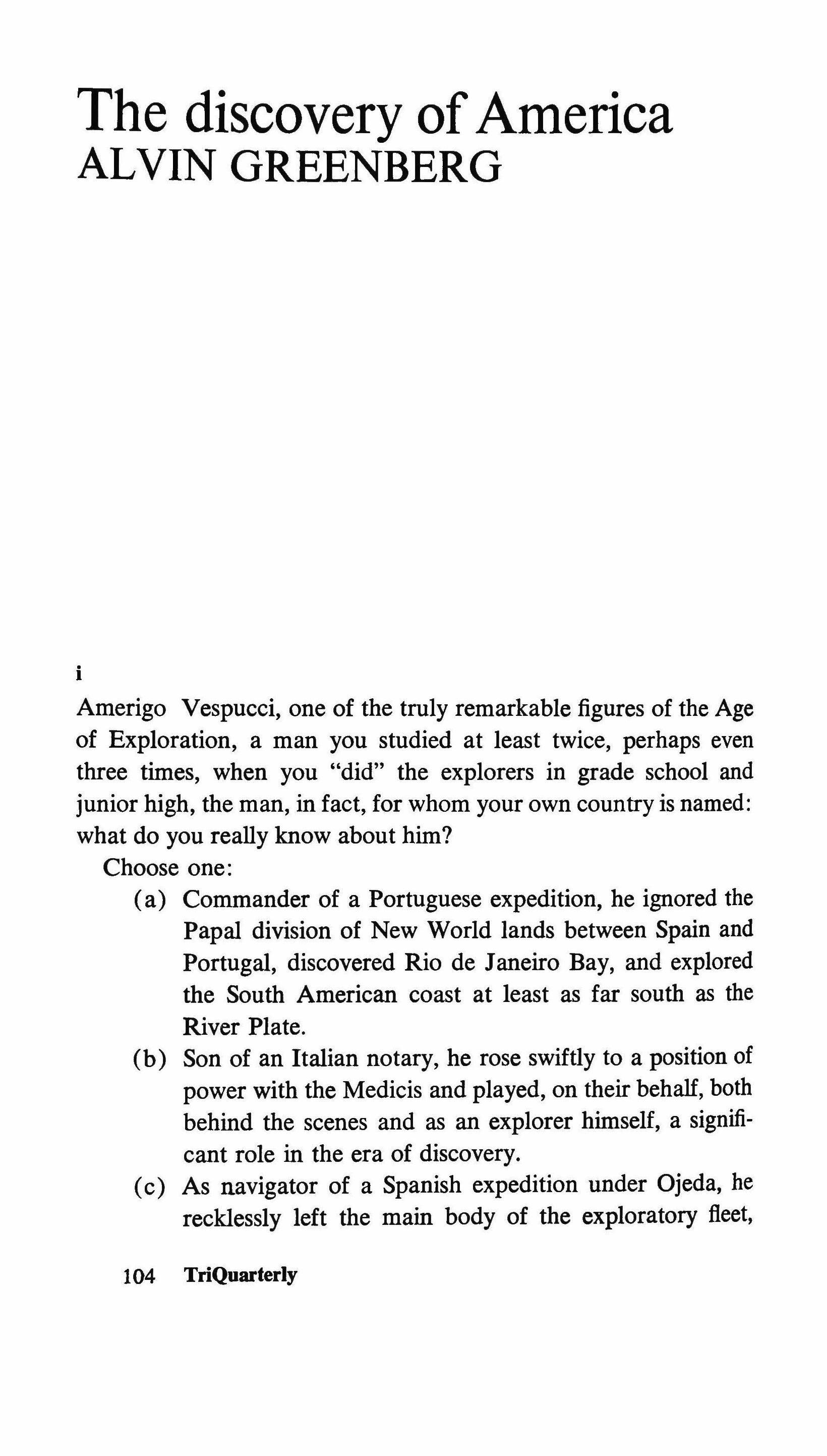
Amerigo Vespucci, one of the truly remarkable figures of the Age of Exploration, a man you studied at least twice, perhaps even three times, when you "did" the explorers in grade school and junior high, the man, in fact, for whom your own country is named: what do you really know about him?
Choose one:
(a) Commander of a Portuguese expedition, he ignored the Papal division of New World lands between Spain and Portugal, discovered Rio de Janeiro Bay, and explored the South American coast at least as far south as the River Plate.
(b) Son of an Italian notary, he rose swiftly to a position of power with the Medicis and played, on their behalf, both behind the scenes and as an explorer himself, a significant role in the era of discovery.
(c) As navigator of a Spanish expedition under Ojeda, he recklessly left the main body of the exploratory fleet, 104 TrlQuarterly
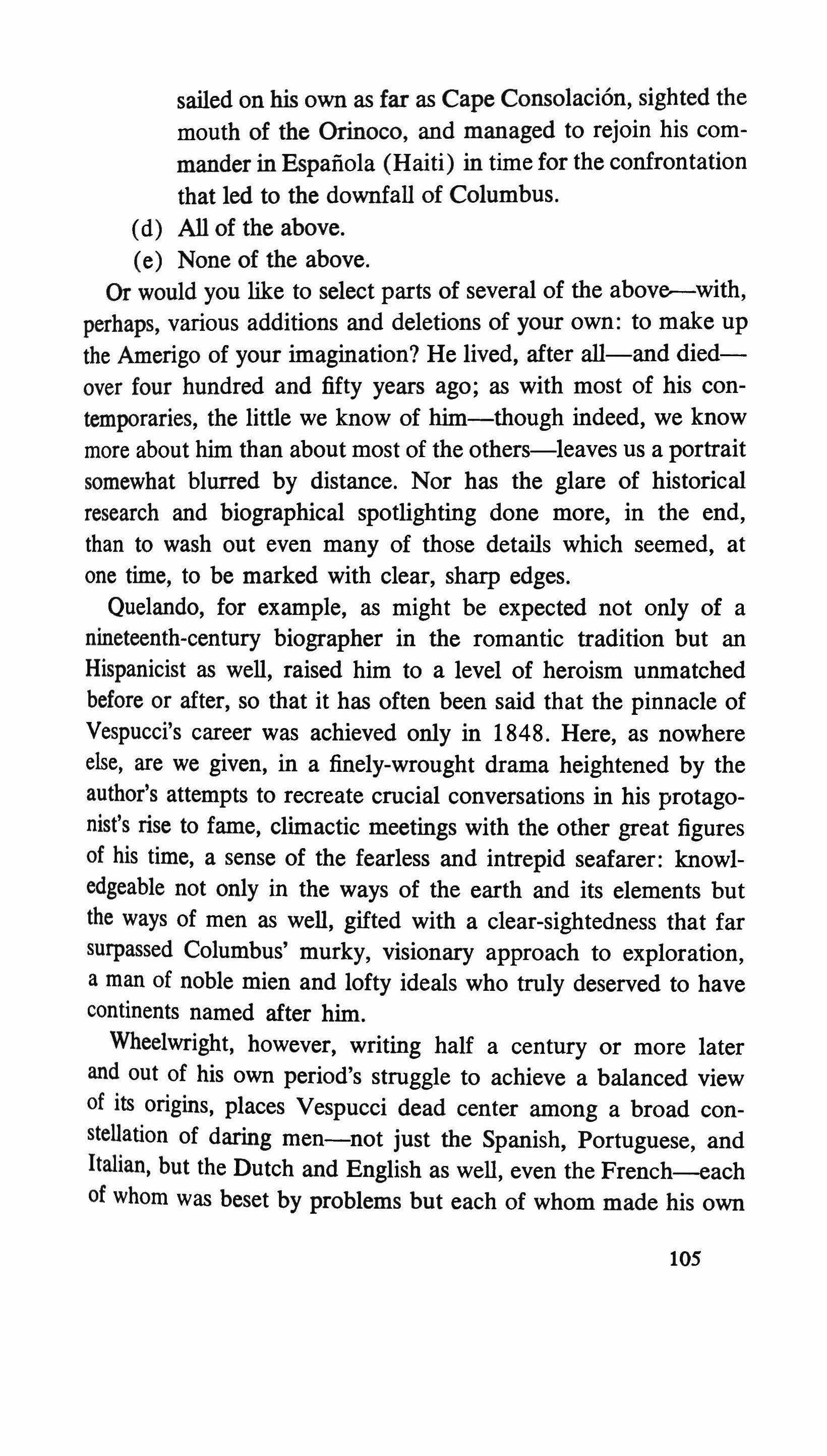
sailed on his own as far as Cape Consolaci6n, sighted the mouth of the Orinoco, and managed to rejoin his commander in Espanola (Haiti) in time for the confrontation that led to the downfall of Columbus.
(d) All of the above.
(e) None of the above.
Or would you like to select parts of several of the above=-with, perhaps, various additions and deletions of your own: to make up the Amerigo of your imagination? He lived, after all-and diedover four hundred and fifty years ago; as with most of his contemporaries, the little we know of him-though indeed, we know more about him than about most of the others-leaves us a portrait somewhat blurred by distance. Nor has the glare of historical research and biographical spotlighting done more, in the end, than to wash out even many of those details which seemed, at one time, to be marked with clear, sharp edges.
Quelando, for example, as might be expected not only of a nineteenth-century biographer in the romantic tradition but an Hispanicist as well, raised him to a level of heroism unmatched before or after, so that it has often been said that the pinnacle of Vespucci's career was achieved only in 1848. Here, as nowhere else, are we given, in a finely-wrought drama heightened by the author's attempts to recreate crucial conversations in his protagonist's rise to fame, climactic meetings with the other great figures of his time, a sense of the fearless and intrepid seafarer: knowledgeable not only in the ways of the earth and its elements but the ways of men as well, gifted with a clear-sightedness that far surpassed Columbus' murky, visionary approach to exploration, a man of noble mien and lofty ideals who truly deserved to have continents named after him.
Wheelwright, however, writing half a century or more later and out of his own period's struggle to achieve a balanced view of its origins, places Vespucci dead center among a broad constellation of daring men-not just the Spanish, Portuguese, and Italian, but the Dutch and English as well, even the French-each of whom was beset by problems but each of whom made his own
105

unique and necessary contribution to the opening up of the western hemisphere. And Schwartzkopf, on the other hand, viewing this character-for such time makes him, does it not, a character rather than a person?-not only in the light of more recent historical evidence but also with the more cynical gaze that has become the scholarly hallmark of this our own time, denigrates him to a mere fourth-rate talent: a shallow imitator attempting to walk in the giant footsteps of Columbus; a small-time promoter who knew a good thing when he saw it but had neither the bravery nor the intelligence that swept others of his age to great accomplishments; a moderate success only at the sort of court intrigue through which he might secure a safe and profitable postpreferably at home, where he could reap the benefits while others risked their lives on dangerous seas and in unknown lands.
Not one of those, of course, is the Amerigo Vespucci of our childhood; he whose dotted red line followed Columbus' looping black ones across the blue mid-Atlantic in our fifth grade social studies book; he whose name we affixed in the proper blank space following the question, "After what great explorer was America named?"; he who was, in spite of that glowing mark of recognition, given only a single line in the text, and in the eighth grade shared a paragraph with Cortez and Balboa. Nope, not him.
But at a distance of almost five centuries, who could hope to keep a steady eye on things? First you squint and peer across the ages like a chimpanzee imitating a human frown, looking at the exact spot where your teacher is pointing. And if you see only a dull haze there, with a faint glimmer suggesting movement of some sort, nonetheless you tell her, when she asks, that what you see there is just what she told you you'd see there. Perhaps the second or third time, you actually do see what you're supposed to see. What else? Only much later, perhaps, when no one cares whether you look or not-when, maybe, no one really wants you to look any longer-you begin to wonder what it was that was really there after all. You try to remember how it was done, to find the right direction. You look, you squint, you hunch down and shade your eyes with your hands.
106
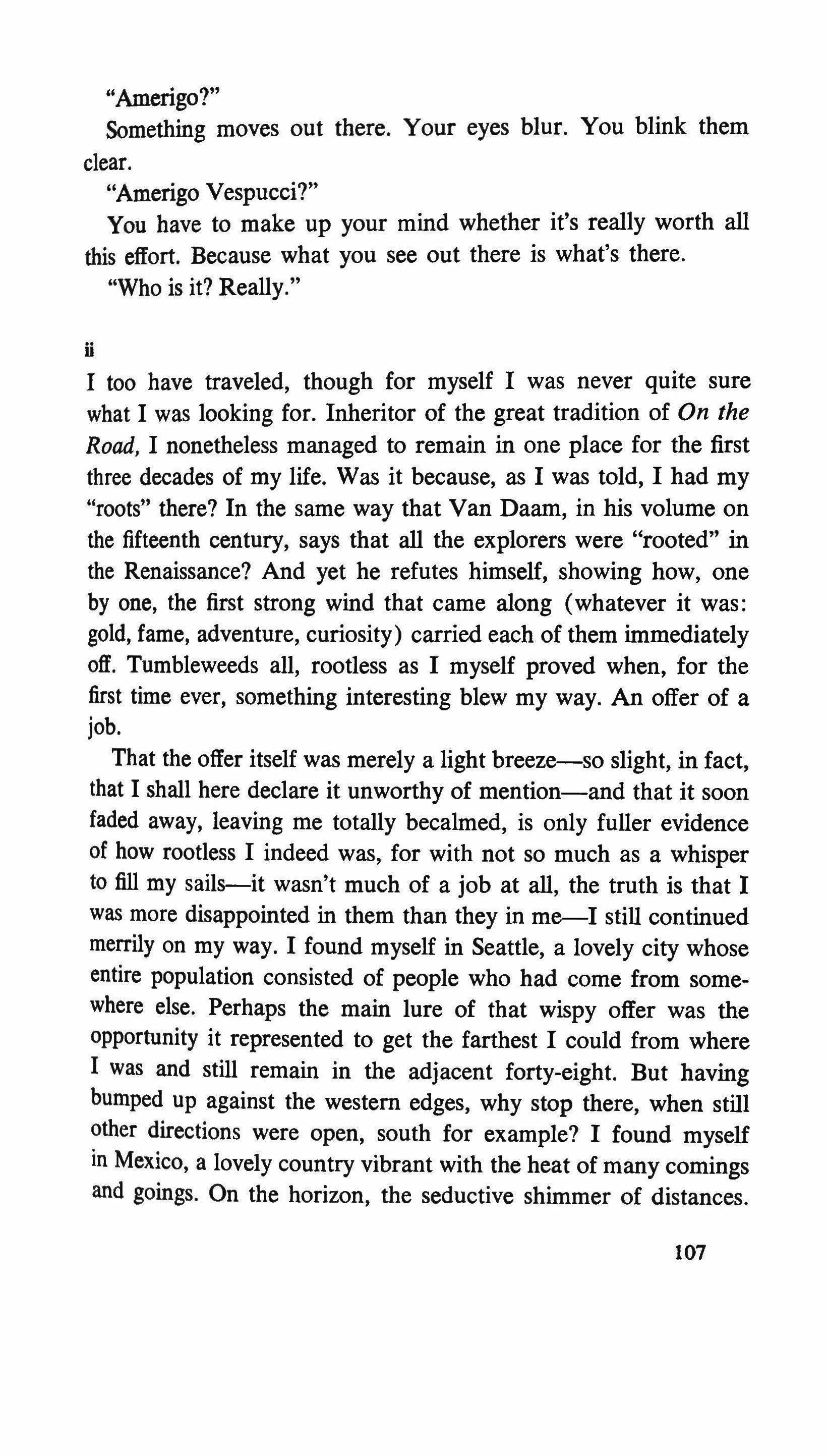
"Amerigo?"
Something moves out there. Your eyes blur. You blink them clear.
"Amerigo Vespucci?"
You have to make up your mind whether it's really worth all this effort. Because what you see out there is what's there. "Who is it? Really."
ii
I too have traveled, though for myself I was never quite sure what I was looking for. Inheritor of the great tradition of On the Road, I nonetheless managed to remain in one place for the first three decades of my life. Was it because, as I was told, I had my "roots" there? In the same way that Van Daam, in his volume on the fifteenth century, says that all the explorers were "rooted" in the Renaissance? And yet he refutes himself, showing how, one by one, the first strong wind that came along (whatever it was: gold, fame, adventure, curiosity) carried each of them immediately off. Tumbleweeds all, rootless as I myself proved when, for the first time ever, something interesting blew my way. An offer of a job.
That the offer itself was merely a light breeze-so slight, in fact, that I shall here declare it unworthy of mention-and that it soon faded away, leaving me totally becalmed, is only fuller evidence of how rootless I indeed was, for with not so much as a whisper to fill my sails-it wasn't much of a job at all, the truth is that I was more disappointed in them than they in me-I still continued merrily on my way. I found myself in Seattle, a lovely city whose entire population consisted of people who had come from somewhere else. Perhaps the main lure of that wispy offer was the opportunity it represented to get the farthest I could from where I was and still remain in the adjacent forty-eight. But having bumped up against the western edges, why stop there, when still other directions were open, south for example? I found myself in Mexico, a lovely country vibrant with the heat of many comings and goings. On the horizon, the seductive shimmer of distances.
107
Back in the States, I found myself in a lovely southern town, full of people who had never been anywhere else. One of the few respectable cities in the world not built on water of any sort. And not a hundred miles from my starting point.
I have looked on the maps and observed the remarkable shapes -the circles, the ellipses, the figure eights-transcribed thereon by the voyages of the great explorers. And then I see on the map that my own journey has been more or less ovoid in shape. An egg, set big end up, with a crack in the upper right shoulder, where the end has failed to come together with the beginning:

Around the perimeter of that figure I have traveled with an increasingly large entourage, all of us gaining, by stages, a gradual awareness of what lies in the center of it: who is really there. We have me surrounded at last, except for that one small gap already noted. Through it.
Through it what? I leak away? I escape?
I emerge.
It is noon, but frighteningly dark. Amerigo Vespucci sits, crosslegged on the empty deck, in the crucial chapter of the Jones volume in the Lives of Great Men series, riding out a sudden storm that has descended almost as soon as he and his comrades have turned their backs on the Western lands and set out for home. It is a sort of storm that Vespucci and his companions have never seen before, for which they have no name except terror. The sailors huddle below, their moans blotted out by the wind. Even Ojeda keeps to his cabin; and only Vespucci, who has just left that foulsmelling den, knows how sick the commander really is. Columbus, he also knows, is reported to be a fine sailor, is said never to have been sick at sea. Already Vespucci knows that this is only because there is no weather for Columbus except what blows
108
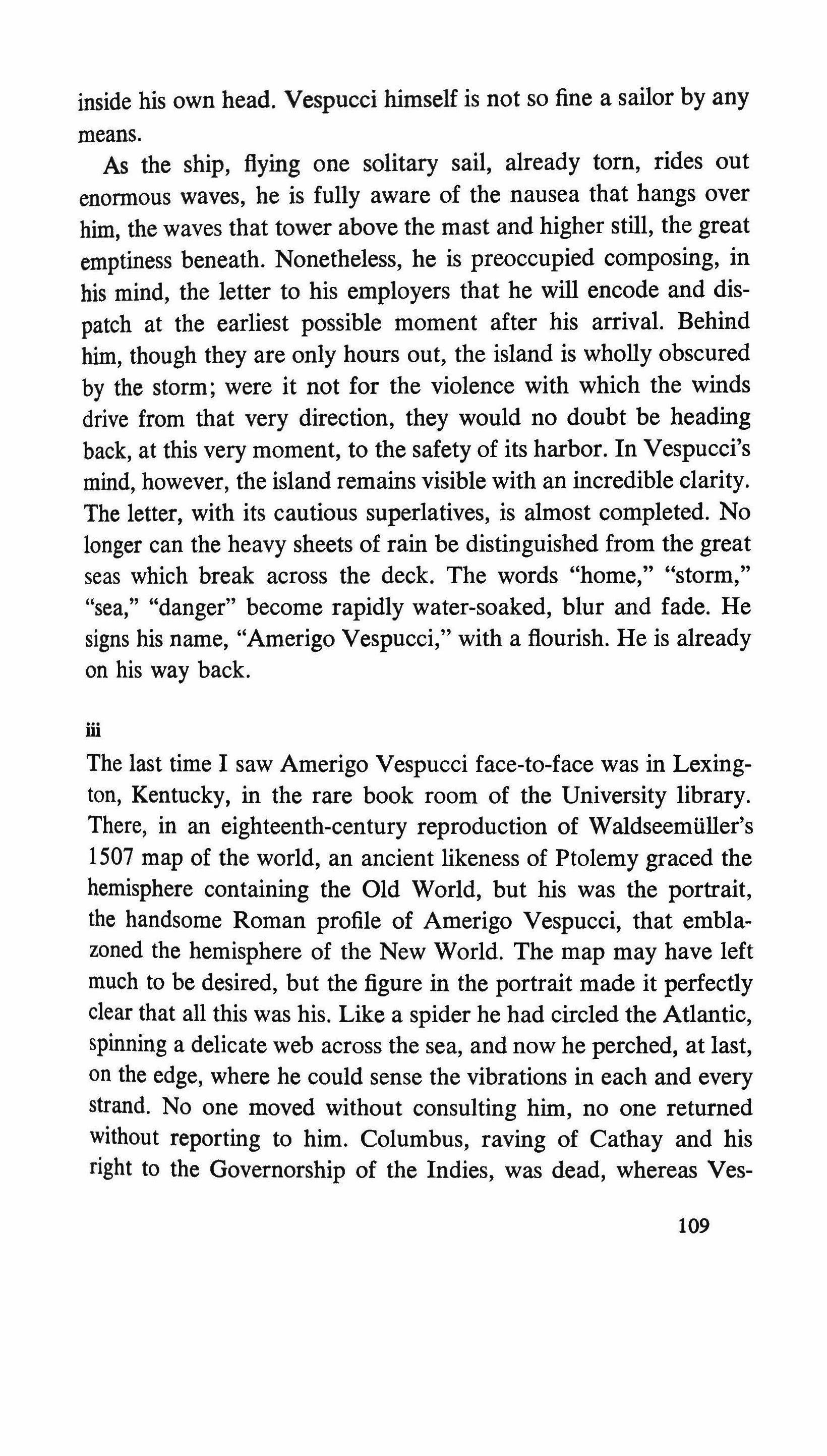
inside his own head. Vespucci himself is not so fine a sailor by any means.
As the ship, flying one solitary sail, already torn, rides out enormous waves, he is fully aware of the nausea that hangs over him, the waves that tower above the mast and higher still, the great emptiness beneath. Nonetheless, he is preoccupied composing, in his mind, the letter to his employers that he will encode and dispatch at the earliest possible moment after his arrival. Behind him, though they are only hours out, the island is wholly obscured by the storm; were it not for the violence with which the winds drive from that very direction, they would no doubt be heading back, at this very moment, to the safety of its harbor. In Vespucci's mind, however, the island remains visible with an incredible clarity. The letter, with its cautious superlatives, is almost completed. No longer can the heavy sheets of rain be distinguished from the great seas which break across the deck. The words "home," "storm," "sea," "danger" become rapidly water-soaked, blur and fade. He signs his name, "Amerigo Vespucci," with a flourish. He is already on his way back.
iii
The last time I saw Amerigo Vespucci face-to-face was in Lexington, Kentucky, in the rare book room of the University library. There, in an eighteenth-century reproduction of Waldseemliller's 1507 map of the world, an ancient likeness of Ptolemy graced the hemisphere containing the Old World, but his was the portrait, the handsome Roman profile of Amerigo Vespucci, that emblazoned the hemisphere of the New World. The map may have left much to be desired, but the figure in the portrait made it perfectly clear that all this was his. Like a spider he had circled the Atlantic, spinning a delicate web across the sea, and now he perched, at last, on the edge, where he could sense the vibrations in each and every strand. No one moved without consulting him, no one returned without reporting to him. Columbus, raving of Cathay and his right to the Governorship of the Indies, was dead, whereas Ves-
109

pucci had achieved a position that knotted together the strands of his Portuguese, Spanish, and Italian enterprises and, save for those late-comers the Dutch and English, virtually put him in charge of the opening up of the New World.
What, I had to wonder, perched along on the edge of a dusty desk in a stifling, windowless room, peering at the book lying open on my lap, had his true orders been? To keep a watchful eye on the Jew Columbus? To test the real limits of Spanish and Portuguese power in the western hemisphere? To gain the confidence of governments that would enable him to work his way into a seat of knowledge and influence from which he could well advise his real employers? For that was what he finally did, gaining, in spite of his dubious reports on and actions in the New World, so stable a reputation as a scrupulous man and a brilliant navigator that he was at last recalled to Spain, appointed to the Commercial House for the West Indies, and, finally, made piloto mayor, Chief Navigator-a position that empowered him to examine and license all pilots embarking on voyages of exploration, to prepare maps of newly discovered lands and the routes for reaching them, and to interpret and co-ordinate the continuing stream of valuable information which the explorers were required to furnish.
Did he, I wondered-not a two-hour drive myself, and that in an air-conditioned car, from closing the circuit of my own journeying-did he, I wondered, still take his orders, then, from the Medici? Or did he, in those long ellipses his ships described upon the unpredictable Atlantic, discover something more about who was in the center of those voyages than he had originally been contracted for? What of this man, I wondered, this solid-looking middle-aged man whose profiled gaze on the page before me incorporated both the Americas? Why, in his mid-fifties, did he suddenly decide to take up Spanish citizenship? Who was this historical stranger who peeled back the illusions of his time to reveal the old lands of the east as the New World of the west, who left us a name from which it appears we shall never escape and, though he did not bargain like Columbus for 10 percent of the gross and a family title in perpetuity, left his wife Maria
110

with a generous pension, provided by the Spanish government in recognition of his great contribution? What of him?
In a Seattle bar tucked away under the edge of the bridge that spans the Union Canal and called, I have no doubt, though I don't remember having ever seen the name posted anywhere, the Bridge Cafe, I discussed with a fellow worker, over watery dark beer, the question of roots. His, not mine.
"If I ever had them," I told him, "I've cut them off, they're gone. Thirty years of roots is enough to strangle on. Who needs roots? If you want some, you can have mine."
He didn't want my roots, of course, he wanted his own. Seattle, with its mild weather and perpetual rains, was green all year round. On its steep hillsides gardens flowered among the rocks, tended or not. Strangers from the most distant parts of the country met here and merged; families blossomed from them. A mere passerby who found a certain relief even in riding the ferryboats aimlessly about Puget Sound, I found the whole process vaguely suspect.
"Is it possible," I inquired of this friend, whose doubly mixed parentage left open to him, still, the choice of whether to be Jew or Protestant, American or Canadian, "to really 'put down' roots? Aren't roots what you grow from rather than to?"
When he was finished with his lecture on taking cuttings from house plants, and the discursion on the rooting of ivies in water or vermiculite, and had begun to muse, over the empty pitcher of beer, about the fertile growth potential of residency in the United States watered by Canadian citizenship, I found it necessary to object that we had had enough, that the analogy had become uselessly complicated.
"Besides," I pointed out, "all analogies are false analogies."
"There have been some very interesting comparisons between the lives of certain men," he said, cutting my objection adrift with a little smile. "Some have even been known to structure their lives on the analogy of prior models."
The pitcher of beer sat empty on the table before us. From the way he had pushed his chair back from the table, angled it
111

toward me, and planted his feet firmly on the floor between us, I could tell he had just begun. Newcomers drifted in through the doorway, pausing to shake the rain from their clothing and let their eyes adjust to the darkness. The vast, dim interior of the Bridge Cafe began to fill up with sullen examples.
In a living room in one of the great cities of the Ohio Valley I met, recumbent among the bric-a-brac of nations-ivory elephants, teak end tables, flamingoes carved from bone, cloisonne cigarette boxes-the "world traveler." He told me, at some length, how he went to "New York" to see the "Empire State Building" and, after that, to "Acapulco" to see the "ocean" and then, the following year, to "Japan" to see the "Japanese," including a stopover, on his return, in "Hawaii" to see a "volcano." He was, he said, an avid traveler who never tired of such opportunities to see "the world" and was always eager, when he returned, to tell his friends about "Tel Aviv," the "Eiffel Tower," or "camels." With rare exceptions, he claimed, his trips always went smoothly throughout. The "weather" was always perfect. Only occasionally was he annoyed when the people of some "foreign country" failed to try hard enough to understand him, when a ticket agent confessed that the "flight" on which he had been scheduled was oversold, or when he was overcharged for a "meal." But such occurrences never bothered him for long, for he knew that they did the same things to you in "Las Vegas" and "Miami Beach" as in "Tangiers" or "Hong Kong." He had long since learned to adopt a philosophical attitude toward "events." What he said was, "Things work out for the best," and nothing that had ever "happened" or that anyone had ever "said," whether in "Cincinnati" or in "Bangkok," had ever shaken his faith in that statement.
The first time I met Amerigo Vespucci was on the one occasion of my venturing into the center of that ovoid already described-a ruthless day and night dash westward across the August-roasted flatlands of Indiana, Illinois, Missouri, Kansas, and eastern Colo-
112

rado in a black and white air-conditioned Chrysler: into the eastern Rockies. On the road up Pikes Peak I skidded past one of those little roadside shrines, the kind which, though rarely seen in the United States, border all the highways of Mexico yet seem always unvisited by tourists or anyone else. What did I see this time, out of the corner of my eye, up there just above the timberline? I wasn't sure, but I wanted to stop, all the same. It was a full mile before I found a graveled turnaround where I could leave the car off the road and walk back down. Almost everyone who passed offered me a ride in one direction or the other. "Something wrong with your car?" No.
Yes. There was no doubt about it. The shrine was unmarked, as they always are-one is expected to know one's saints-but the little statue in it was unmistakable. I knelt down before it, in the drainage ditch by the side of the road. A plaster niche, resting back against the solid, soaring granite of the mountainside, but molded, if my eyes didn't deceive me, rather vaguely in the shape of a seashell. Now the cars that passed me no longer stopped but only slowed, while their occupants pointed. Children poked their heads out of windows. The "pilgrim" turned and looked back at them over his shoulder. Did he, in his crisp blue sport shirt, look like a dedicated worshipper who had just trudged to the 12,000 foot level (we were that near the top)? Up here, perhaps, they were willing to take most anything for granted. A discovery was a discovery, always worth pointing at, like Cripple Creek somewhere down below us.
Inside the weathered, crumbling plaster shell, paint peelinghe was almost stripped down to pale white flesh-Amerigo also pointed. Seated on a globe, the great bulge of South America just slipping out from beneath his left thigh and a cluster of navigational instruments firmly grasped in his left hand, his right arm pointed straight out, toward me. Or, when I scooted aside, at the horizon. What did he see? Unlike Columbus, who died still believing-or still trying to convince himself-that he had landed on the islands off the east coast of the Asian mainland, Vespucci, after
113

his second voyage-or at least after his final voyage, however many it was he actually took-realized that he had come upon a "new world." Was that his real discovery? What did he point at now? I followed the direction of the arm. There was nothing there. Only the emptiness between mountains. It was him all right. When I had climbed back at last to my car, it wouldn't start. Vapor lock, I was assured by the first of many passing motorists who stopped to offer their assistance. This diagnosis was confirmed by all. Just wait, they instructed. I waited, evening approached, the skies began to run through their changes of color, every bit as beautiful and spacious as claimed, but the car still refused to start. It's always vapor lock up here, I was assured, but nonetheless with some help I got the car turned around and pointed downhill, not realizing until it started to roll silently ahead that, well-equipped as it was, without the motor running I had no power for the power steering, no power for the power brakes. 0 Amerigo, what have you done to me upon these precipices!
At a roadside turnoff high in the Sierras south of Mexico City, south even of Cuemavaca and Oaxaca, in arid, desolate country where not a cow or a goat had strayed across the road in hours, and hardly a village had been seen beside it, we parked and dropped the tailgate of our station wagon to prepare a picnic lunch. We opened the ham and rolls bought earlier in the morning, the children returned from their trips behind some nearby boulders to cluster around us, a man in immaculate white clothing, leading a burro, came walking around a bend in the highway. Friendly tourists all, we waved, he crossed over to our side of the road, the children clutched sandwiches in one hand and petted his animal with the other, we invited him, in our rudimentary Spanish, to eat with us, but he politely refused. He seemed far more interested in the car than in us or in our food, and examined its dusty blue length quite thoroughly before turning at last to us.
"Americano?" he asked. He was obviously friendly, with an unladen burro had nothing to sell, but as I stuffed the last bite of sandwich into my mouth and wiped my mayonnaise-covered fingers
114
on my pants, I wondered about that word he had chosen to use and whether it wasn't, here and now, time to do something about it.
"No," I answered him, in the best Spanish I could muster, "no soy americano solamente."
"No americano?" he said, puzzled. Even my family, generally prompted by good manners to ignore my struggles with foreign languages, looked around at me in rather quizzical fashion.
"Yo soy norte americano," I explained. No one moved.
"Yo soy un hombre de los Estados Unidos," I continued, after a brief pause.
"Yo soy un gringo," I added, thinking to make a joke, but he didn't even smile.
"Y usted es un mexicano," I concluded, "pero los dos son americanos. "
There, the point had been made. I was a gringo all right, there wasn't anything I could do about that, but I wasn't one of your greedy gringos, I didn't want all the Americas for myself.
"Usted es americano," he said, and walked away, burro in tow.
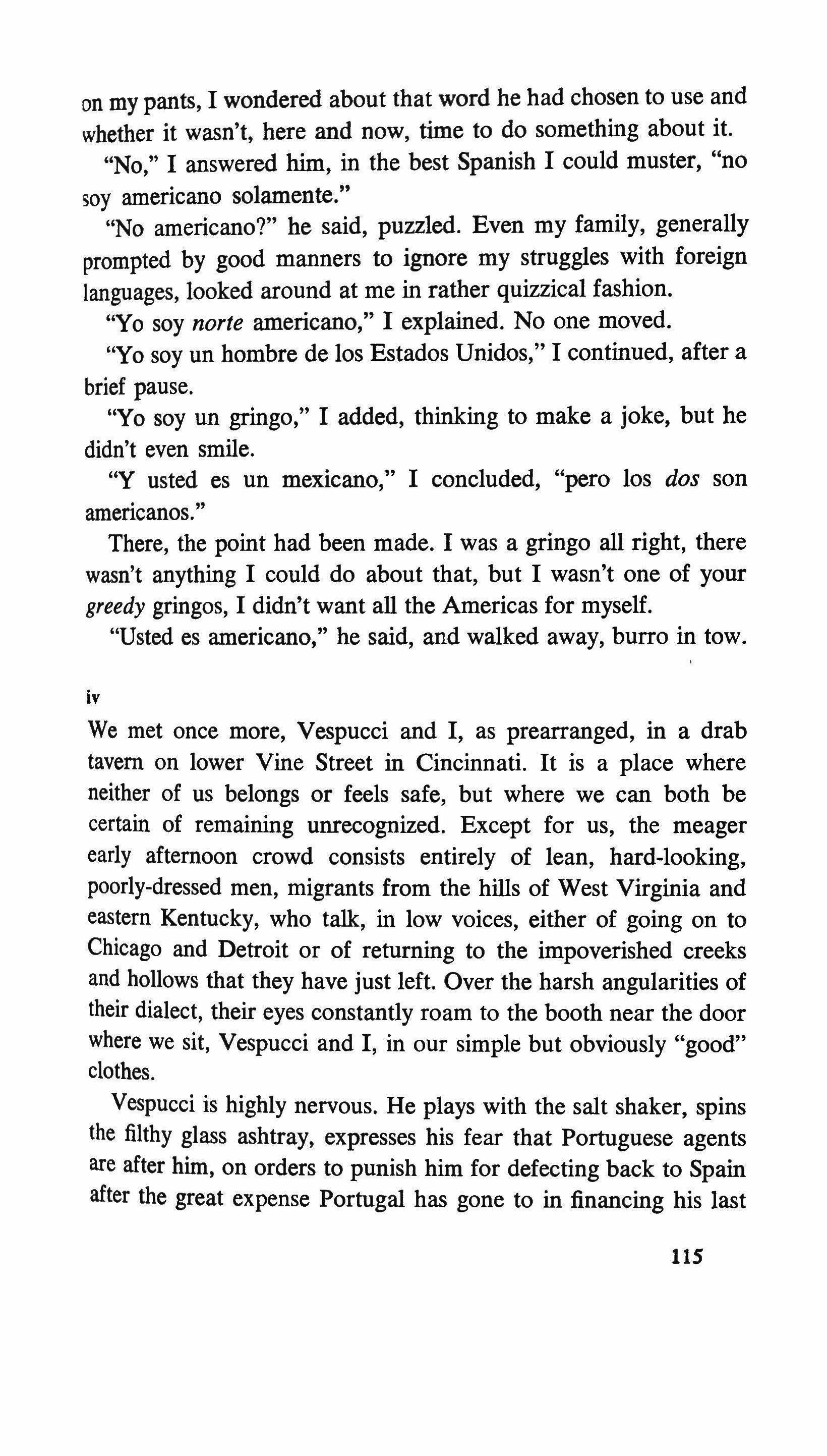
iv
We met once more, Vespucci and I, as prearranged, in a drab tavern on lower Vine Street in Cincinnati. It is a place where neither of us belongs or feels safe, but where we can both be certain of remaining unrecognized. Except for us, the meager early afternoon crowd consists entirely of lean, hard-looking, poorly-dressed men, migrants from the hills of West Virginia and eastern Kentucky, who talk, in low voices, either of going on to Chicago and Detroit or of returning to the impoverished creeks and hollows that they have just left. Over the harsh angularities of their dialect, their eyes constantly roam to the booth near the door where we sit, Vespucci and I, in our simple but obviously "good" clothes.
Vespucci is highly nervous. He plays with the salt shaker, spins the filthy glass ashtray, expresses his fear that Portuguese agents are after him, on orders to punish him for defecting back to Spain after the great expense Portugal has gone to in financing his last 115

expedition. What do they mean by "punish"? Has he really done any harm to anyone? Would they be satisfied by having him return to sail under the Portuguese flag once again? Was it not in the service of the King of Portugal that he first opened the eyes of the world to what was really out there? What does he care whose flag he sails under, whose money is behind a voyage, is it not discovery alone which counts?
Even the bartender has paused, in his wiping of glasses, to stare open-mouthed at this sudden outburst, though in all probability he has not understood a single word of Vespucci's rapid-fire monologue. He and his other customers turn back to their own affairs as I break in to explain, calmly and slowly, how I myself have now finally completed the last unfinished leg of my own circular journey. I say "circular" because I fear that in his agitated state he will not have the patience to listen to a more elaborate explanation of the sort of figure I think I have been mapping out for myself. With a last brief lurch, I am right back where I started, I tell him. He can hardly sit still any longer. There are private letters, letters which he wrote to the Medici-"for their eyes only" -which, it now appears, have fallen into the wrong hands. Was it before or after their delivery? One way or another, the effects on his reputation are apt to be severe, are they not? What will people think of him, in years to come? He only wanted to do what was right, isn't that so? Isn't that what he wanted?
I put my hand on his. How can I stop here? I ask him. I don't even want to be seen here, that's why we agreed to meet in a place like this, where I couldn't be brought to a halt by cries of recognition but could complete my round and keep on going, just one more major journey that could carry me well on beyond where I started. He jerks his hand away from me, not sure he even wants to hear talk of another voyage. Where? Why? Hasn't he done' enough already? What of his wife and children at home in Seville? He is standing now, pushing against the table in the booth, almost shouting. All that sailing, all that vast traveling round and round, what did I think he hoped to find in the center of it? What? The
116
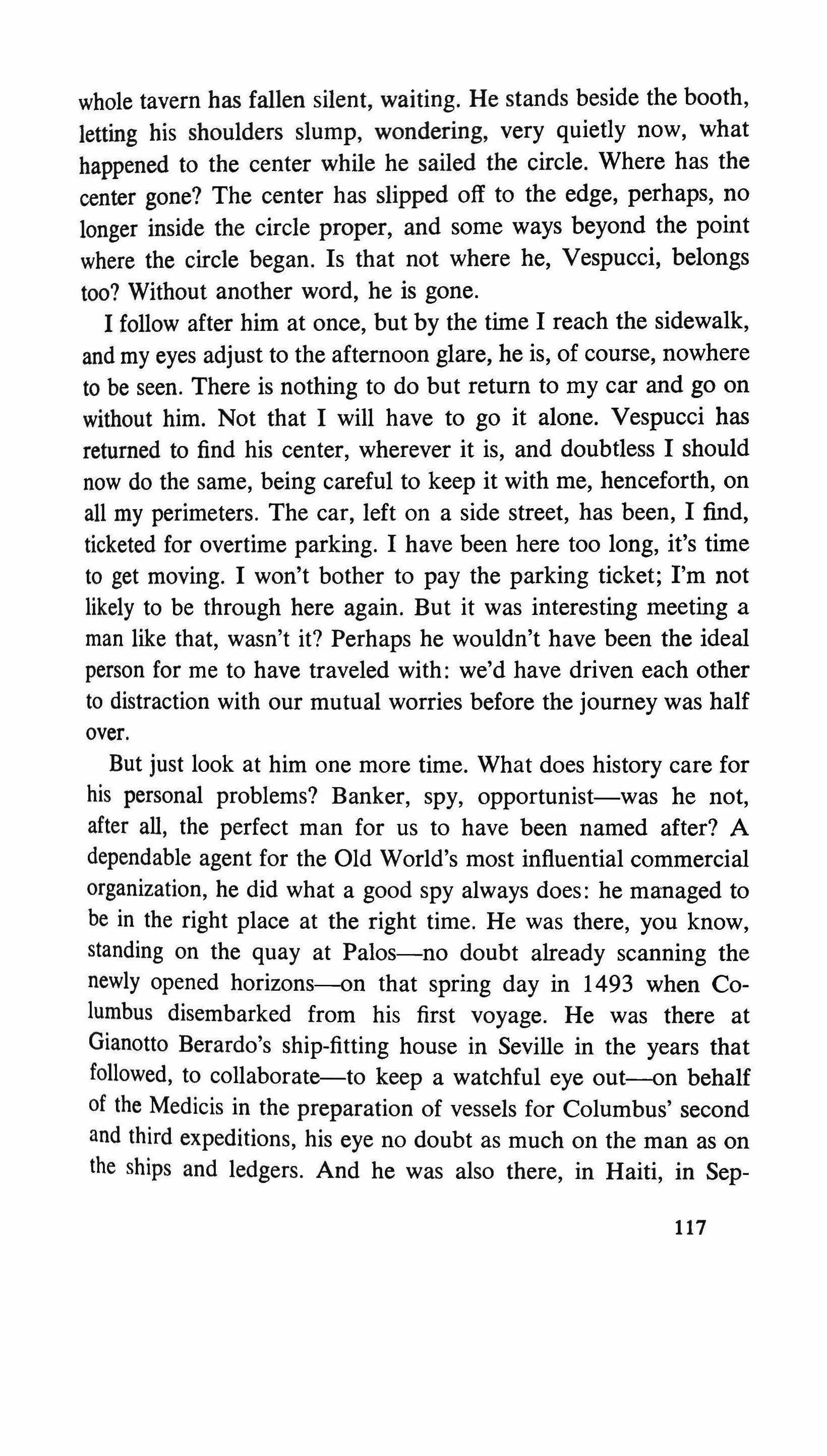
whole tavern has fallen silent, waiting. He stands beside the booth, letting his shoulders slump, wondering, very quietly now, what happened to the center while he sailed the circle. Where has the center gone? The center has slipped off to the edge, perhaps, no longer inside the circle proper, and some ways beyond the point where the circle began. Is that not where he, Vespucci, belongs too? Without another word, he is gone.
I follow after him at once, but by the time I reach the sidewalk, and my eyes adjust to the afternoon glare, he is, of course, nowhere to be seen. There is nothing to do but return to my car and go on without him. Not that I will have to go it alone. Vespucci has returned to find his center, wherever it is, and doubtless I should now do the same, being careful to keep it with me, henceforth, on all my perimeters. The car, left on a side street, has been, I find, ticketed for overtime parking. I have been here too long, it's time to get moving. I won't bother to pay the parking ticket; I'm not likely to be through here again. But it was interesting meeting a man like that, wasn't it? Perhaps he wouldn't have been the ideal person for me to have traveled with: we'd have driven each other to distraction with our mutual worries before the journey was half over.
But just look at him one more time. What does history care for his personal problems? Banker, spy, opportunist-was he not, after all, the perfect man for us to have been named after? A dependable agent for the Old World's most influential commercial organization, he did what a good spy always does: he managed to be in the right place at the right time. He was there, you know, standing on the quay at Palos-no doubt already scanning the newly opened horizons--on that spring day in 1493 when Columbus disembarked from his first voyage. He was there at Gianotto Berardo's ship-fitting house in Seville in the years that followed, to collaborate-to keep a watchful eye out--on behalf of the Medicis in the preparation of vessels for Columbus' second and third expeditions, his eye no doubt as much on the man as on the ships and ledgers. And he was also there, in Haiti, in Sep-
117
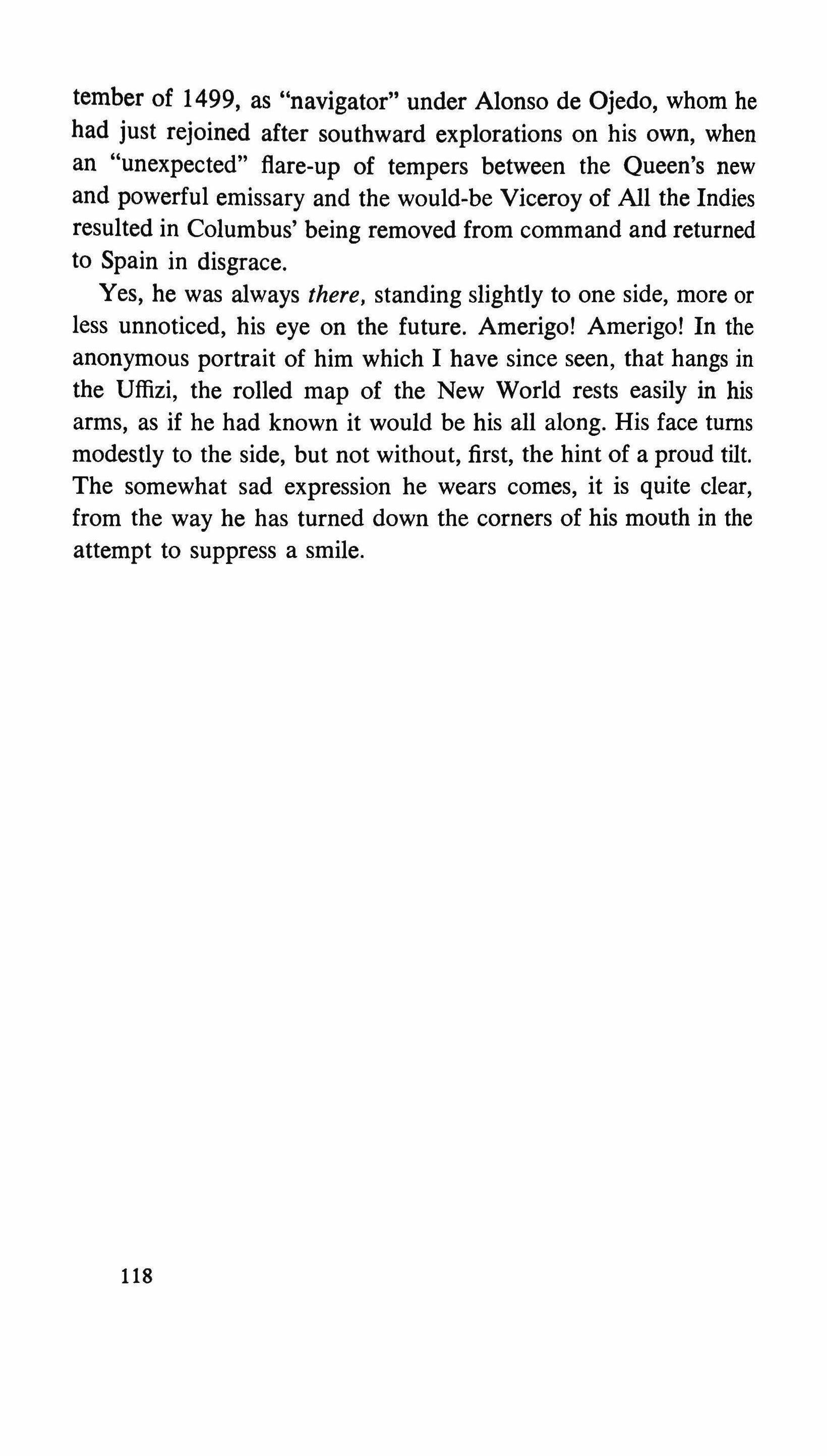
tember of 1499, as "navigator" under Alonso de Ojedo, whom he had just rejoined after southward explorations on his own, when an "unexpected" flare-up of tempers between the Queen's new and powerful emissary and the would-be Viceroy of All the Indies resulted in Columbus' being removed from command and returned to Spain in disgrace.
Yes, he was always there, standing slightly to one side, more or less unnoticed, his eye on the future. Amerigo! Amerigo! In the anonymous portrait of him which I have since seen, that hangs in the Uffizi, the rolled map of the New World rests easily in his arms, as if he had known it would be his all along. His face turns modestly to the side, but not without, first, the hint of a proud tilt. The somewhat sad expression he wears comes, it is quite clear, from the way he has turned down the corners of his mouth in the attempt to suppress a smile.
118
Ninety-two in the shade THOMAS McGUANE
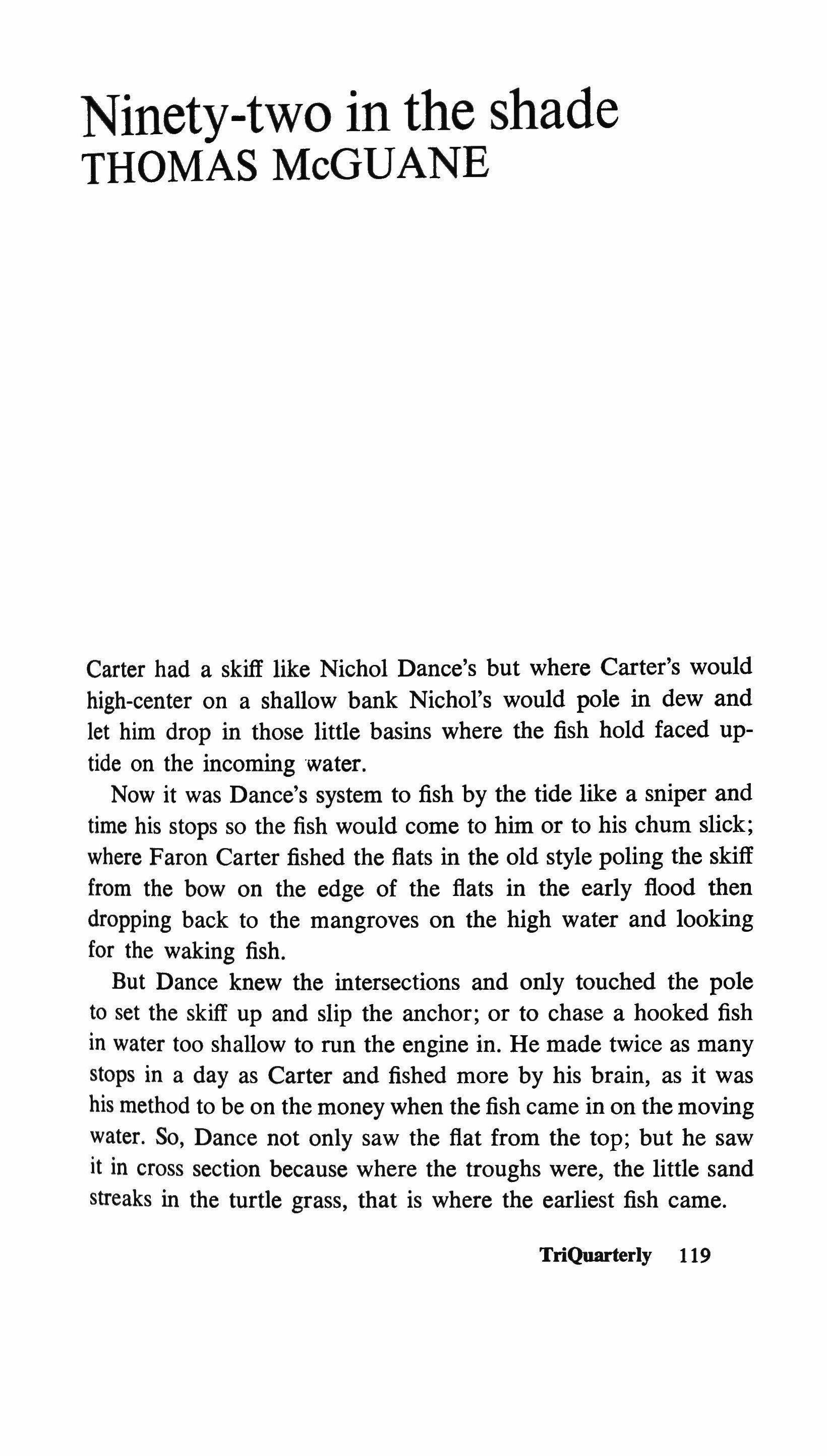
Carter had a skiff like Nichol Dance's but where Carter's would high-center on a shallow bank Nichol's would pole in dew and let him drop in those little basins where the fish hold faced uptide on the incoming water.
Now it was Dance's system to fish by the tide like a sniper and time his stops so the fish would come to him or to his chum slick; where Faron Carter fished the flats in the old style poling the skiff from the bow on the edge of the flats in the early flood then dropping back to the mangroves on the high water and looking for the waking fish.
But Dance knew the intersections and only touched the pole to set the skiff up and slip the anchor; or to chase a hooked fish in water too shallow to run the engine in. He made twice as many stops in a day as Carter and fished more by his brain, as it was his method to be on the money when the fish came in on the moving water. So, Dance not only saw the flat from the top; but he saw it in cross section because where the troughs were, the little sand streaks in the turtle grass, that is where the earliest fish came.
TriQuarterIy 119
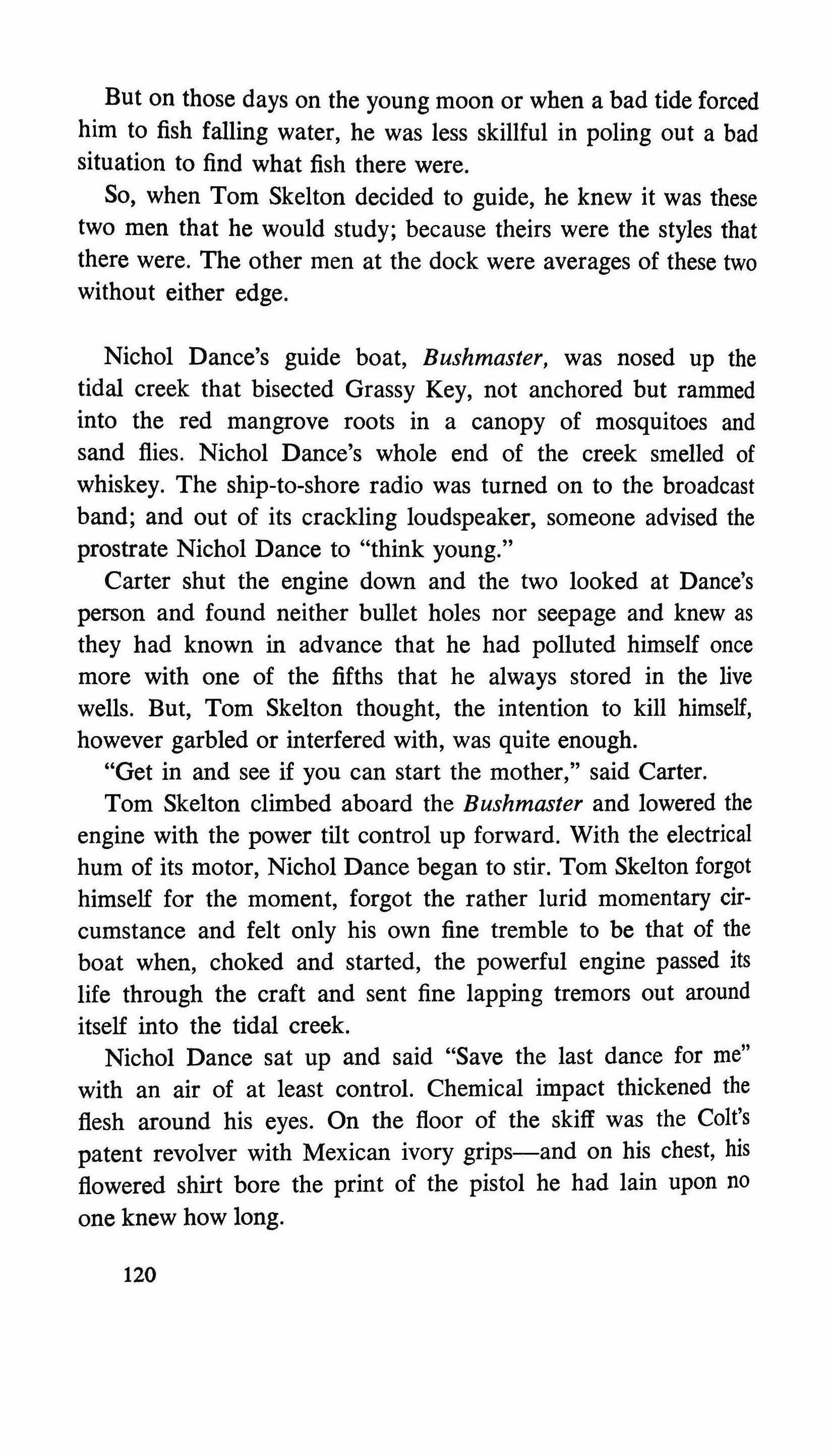
But on those days on the young moon or when a bad tide forced him to fish falling water, he was less skillful in poling out a bad situation to find what fish there were.
So, when Tom Skelton decided to guide, he knew it was these two men that he would study; because theirs were the styles that there were. The other men at the dock were averages of these two without either edge.
Nichol Dance's guide boat, Bushmaster, was nosed up the tidal creek that bisected Grassy Key, not anchored but rammed into the red mangrove roots in a canopy of mosquitoes and sand flies. Nichol Dance's whole end of the creek smelled of whiskey. The ship-to-shore radio was turned on to the broadcast band; and out of its crackling loudspeaker, someone advised the prostrate Nichol Dance to "think young."
Carter shut the engine down and the two looked at Dance's person and found neither bullet holes nor seepage and knew as they had known in advance that he had polluted himself once more with one of the fifths that he always stored in the live wells. But, Tom Skelton thought, the intention to kill himself, however garbled or interfered with, was quite enough.
"Get in and see if you can start the mother," said Carter. Tom Skelton climbed aboard the Bushmaster and lowered the engine with the power tilt control up forward. With the electrical hum of its motor, Nichol Dance began to stir. Tom Skelton forgot himself for the moment, forgot the rather lurid momentary circumstance and felt only his own fine tremble to be that of the boat when, choked and started, the powerful engine passed its life through the craft and sent fine lapping tremors out around itself into the tidal creek.
Nichol Dance sat up and said "Save the last dance for IDe" with an air of at least control. Chemical impact thickened the flesh around his eyes. On the floor of the skiff was the Colt's patent revolver with Mexican ivory grips-and on his chest, his flowered shirt bore the print of the pistol he had lain upon no one knew how long.
120

Dance's uncanny presence produced a momentary silence in which the dry velocities of birds could be heard in the brushy creek. Even the bubbling of crustaceans on the red mangrove roots around him and the slow tidal seepage seemed to rise a measure or so while Nichol Dance looked them over with the same remote gaze you would understandably associate with the recently raised dead.
"A person can scarcely be deliberate any more," he said.
"What seems so exclusive to you about that?" Carter inquired.
"Does it need to be exclusive for me to bring it up?"
"No "
"You're the Skelton kid that's always on the God damn flat in front of me."
"That's right," Skelton said positively to this basilisk drunk.
"I wonder how come."
"I enjoy water sports."
"Ha, ha, well. Very good. But child, I can't recommend it."
"I wasn't inquiring along those lines," Tom Skelton said.
"I was explaining along those lines," Dance said.
"But I'd of known," Tom Skelton said, "that a person would spoil a boat trip if he only went out to shoot himself."
"Now look here, fucker, I didn't come here to be sassed-"
"Neither did I."
Nichol Dance picked up the Colt's patent revolver and discharged it into the mangroves all around Tom Skelton with a collective noise that was close to that of war.
"Fucker," he said, HI don't seem to have your attention."
Carter said, "You have rattled the boy. Now let's just all of our selfs unwind and go home."
And Dance said to Carter, "But we've kept so many from crowding our trade, it discourages me to come across a hard case." Then he smiled radiantly.
"I'm not a hard case. I am going to guide is all."
Nichol Dance looked at Tom Skelton and laughed without deriding him. Underneath all of this, it is to be noted, the Top Ten murmured at them from Key West. Nichol Dance stared a moment
121

at Tom Skelton with only mildly drunken appreciation. He said, "Then why don't you just do the little thing."
"I think he means to," said Carter, "now let's run before the sun sets."
Nichol Dance said to Carter, "Let him lead us, Cart."
Well, all right. Skelton reversed the engine, eased backwards in the narrow marshy quarters past Carter who followed backing after him, the sandy turbulence on the creekbottom lifting and carrying downtide. Dance sat at ease in one of the fighting chairs, his face still blurred, but the impression of durability remained in the compression ridges of flesh under his eyes. Otherwise, Nichol Dance was just another displaced bumpkin run out of his own unmortgaged bar for shooting a man in the horse business through the wishbone in not quite disputable self-defense; part of that world of American bad actors who, when the chips are down, go to Florida; and Nichol Dance, saloon keeping master bass angler of no particular place, drifted to the Keys to break in on tarpon and bonefish under Faron Carter. The immense amount of brokerage-letter writing, conferences, the recommendations of mutual acquaintances and clients-toward this arrangement cannot be summarized, A more remarkable thing was that Dance over a decade's time came to equal the master without once resorting to rivalry. In a certain light, such a thing is serene.
When Tom Skelton had running room, a nicety of judgment based on a precise guess of distance between propellor and ocean bottom, he put the skiff up on a plane and ran the shallow bank on a dead course for the Harbor Keys then swung abruptly southwest on the crawfishermen's wheel track-a wandering trough perhaps two feet wide-which at this tide was absolutely the only way to cross the bank that separated them from Key West. Nichol Dance turned his head on a dark and sun wrinkled neck to look at Carter and raise his eyebrows. Skelton centered the bow on the stacks of Key West Electric and made for home.
Winter ducks and cormorants got up in front of the approaching skiffs and coursed off at angles to the boat's running course. Sea fans, coral heads, yellow cap rock, stone-crab and crawfish
122

pots were inordinate and clear in the shallow water. The trap markers were affixed to Clorox bottle floats that hung downtide on yellow lines; but Skelton by painful and slow process knew very well how to run the country having slept out in mosquito bogs for his misjudgments and having poled the better parts of full days upwind and uptide with bent drive shafts and wiped out propellors for having had on the map of his brain previously unlocated coral heads or discarded ice cans from commercial boats.
Well astern now, on Mente Chica Key, the outline of a bat tower could be seen against the smeared and windless sky. Skelton's father told him that a madman in Key West had written a book about that bat tower for which he should have been thrashed.
"Leave it at the fuel dock," said Dance now more bleary than ever but still letting a thin devilish gas from slightly pursed lips evidence a dire bowel chemistry.
Roy, the dockmaster, stood beside the two pumps with a mild visual suggestion that he was the third. He made no move to throw them a line as Tom eased in and reversed the engines for a nice eggshell landing that lifted Dance's eyebrows once more. Behind them Carter was just now mooring; and Tom Skelton's brain was virtually tumid with the navigational errors he had not made.
"Why my God," said Roy, "the original survivor."
Nichol Dance did not look up but kept his reddening neck bent while he refueled the skiff.
"I mean, what makes folks keep signing up on these rescue missions?" Roy enquired.
When Nichol raised himself up to fix Roy with a more than baleful stare, Roy flushed very slightly but did not, you could see, deviate from his curious course.
"What ails you?" said Nichol Dance.
"Ails me?"
"Is it something I might see about?"
Roy, the dockmaster, twice Nichol Dance's size, with the fame of maddened rages on his side, said: "Nichol, that is what I have been trying to touch upon."
Carter, by this time, saw even from his distance what was afoot
123

exactly; but the interval, even from Skelton's proximate view, between releasing the gas pump and arriving on the dock with the ash handled kill-gaff in hand was imperceptible. Skelton supposed there had been some prelude even some subsequent move by the immense dockmaster; but Nichol Dance was a trifle surer with the gaff and the dockmaster was quickly down, neatly skewered between hip and shortribs; while Nichol Dance, standing over as he thrashed, gripped the hardwood handle with both hands and bore down as though to kill a snake. Nichol Dance said to Carter, "Call a doctor for this New Jersey arc welder polack." Carter ran to the pay phone and Dance disimpaled the dockmaster who lay bleeding, glaring and holding himself in with laced fingers. Then to Skelton, he said, "Better get some law in here too before I think to wind this bug fucker's clock."
He looked at Roy.
"Roy, I'd go to Raiford Prison over you, if I needed."
"I see that you would."
When Tom Skelton came back, they sat to wait. First the ambulance came and took off the dockmaster. Then Nichol Dance handed Skelton a list of his bookings and told him to use the skiff. "I will call you from the joint as to what cut from your proceeds would be usual."
"How did you pick me?"
"If I gave the bookings to Cart, I'd lose them. Anybody you'd guide I'm going to get back."
It was a messy beginning. Still he could regard his start with no sense of incursion by the events that surrounded it. He had enormous hopes for the future. Mucus egg congestions are related to radiant sea creatures via indecipherable links of change.
Tom Skelton would not have picked a fuselage in a vacant lot next door to a rummy hotel if he had had a choice; but when the money ran out and half a dozen career daydreams collapsed like a telescope, those who might have helped failed to dart to his side. Impecunious as could be, his neighbors found his sidetrip into education rather fancy to begin with. House painting, culling
124

shrimp and the half-assed dream of being a guide had a homely recognizability. His popularity returned.
The fuselage, a remnant of a crash landed Navy reconnaissance plane, rested logically on a concrete form and had by now in the quick tropical growing seasons become impressively laced with strangler fig (a plant whose power was now slowly buckling the riveted aluminum panels); bougainvillea, confederate star jasmine and a delicate form of trumpeter vine whose blue translucent blossoms cascaded around the compression sealed aerodynamic doorway.
Within the last month, a rummy drill sergeant had taken a room; and every morning at seven o'clock he drilled the winos in the back yard, the winos lurching across the packed earth under the Key West sun, feet dragging in the dust and heads swinging under incomplete control on helpless and attenuated necks, hair slicked down, whitish blurred beards on some, veinous noses, broken teeth and bruises from falls. From his window in the morning Skelton could only see the tops of their heads gliding and abruptly changing positions beyond the fence, the commands ringing out from the drill sergeant, the slow inexorable rise of absurd dust.
But today, coming home and closing the door, and opening his mind to the familiarity of his fuselage, Skelton felt a certain relief to be away from Carter and Dance" among whom he felt himself to be entirely the rube. Here in the fuselage, among Bohlke's Fishes of the Bahamas, Field Notes on the Physiology of Marine Invertebrates and the entire Modern Library from which, how many years ago, he had meant to assault the world on the most primal terms. Amid such familiaries, with all his ambitions flowing at once on parallel courses, it seemed to matter quite a lot less. He was a function of those continuities.
He dialed his mother's house.
"Hyello."
"Mother, Tom. I can't make it for dinner; but I'll stop in sometime this evening. How's Dad?"
"He's resting nicely; if your grandpa would leave him be "
125

"Oh, for Christ's sakes, is he over there?"
"He came on the bike."
"How's Dad taking it?"
"Not so well to tell the truth."
"Okay. I'll get by there."
Skelton warmed some food from the Frigidaire: picadillo, fried plantains, yellow rice, black beans; making notes to himself on a pad. He ate and ruminated, the sound of commands coming through the fuselage window; the plaint of catbirds and the gentle flutter of vine and leaf touching the yielding airstream contours of the fuselage. Skelton liked this place with its utilitarian bunk, desk, card table, propane stove and Frigidaire. He could sit on top of it by way of a Pullman ladder he had installed, and look out among the tin roofs, the beautiful old shipwright houses and the poinciana trees that grew with vivid mystery along his street. The cemetery was close enough so he could see from the foot of his street the Bronze Victorian sailor, holding his oar, of the monument to the sailors of the Maine; and save for one house he could have seen across to the tennis courts and the statue of Jose Marti whose bust appeared that of a schoolboy in a false moustache, thumbing marble pages with a languorous hand; a memorial with some private character not lost in the inscription.
THE CUBAN LIBERTY APOSTLE
WISHED TO OFFER TO THE PEOPLE OF KEY WEST WHAT WAS LEFT OF IDS HEART.
Nor in the graven homage of "Los Caballeros de la Luz," the horsemen of the light. Skelton could not see these things without some irrational desire to be a liberty apostle and horseman of the light, a shy delivery boy of eternity'S loops.
A seabird crowded sky made it quite impossible for Skelton to stay very long on land; and on the days when exaggerated tide fell below the mean-low, exposing the flats around Key West and filling downwind side streets with the smell of ocean at its most fecund, he could grow quite frantic about it.
126

Today's revelations, the skiff and the bookings, he paid into his system slowly, having what he wanted.
He walked to his family's house on Peacon Lane, pulling the bell on the gate and waiting for his mother. She came without a word and let him through to the patio of old red street bricks. The deep bay porch swept out upon the patio in a watery green cascade of vegetation and light, deep red pots of ferns hanging from the porch roof. At the far end of the patio a small sprinkler turned and flung chains of glittering water up into the foliage-broken light; and high on the center of the green floored porch was his father in his bed, covered by a gauzy mosquito canopy, his grandfather in a Cuban wicker chair beside.
"How are things?" "Fine."
"Mother, how are they?"
"Go over and talk to them." She still had an arbitrary air born in the preposterous circumstances of meeting and marrying Skelton's father.
"Evening, Grandpa." "Tom."
"How're you feeling, Dad?"
"He feels perfectly well," volunteered the grandfather.
"If no one will get that asshole out of here," said the muted figure inside the gauze, "I will shit my pants and die on purpose."
"Do it!" said the grandfather, "you malinger well enough." "Grandpa.
"Every doctor in Key West says it is in his head-" Missus Skelton was silent in the kitchen, an absentee ballot.
Skelton's father began to eat his pillow. Skelton reached gently under the canopy and pulled it from his tearing jaws; fluffs of eider-down drifted on the porch.
"Someone run shit pig into the Gulf Stream," said Skelton's father. The grandfather stood and lashed into the gauze before Skelton forcibly seated him again.
"Go ahead," said the grandfather, drawing his glass of rum from under the chair. "Gang up."
127

"Come on now, Grandpa."
"Got a job yet, bright boy?"
"I'm starting in the morning."
"At what?"
"Guiding.
"Terrific. I'll see you at the Red Doors with the rest of the drunken charter boat captains."
"I won't be at the Red Doors. And I'm skiff guiding anyway."
"Throw the old fart's ass over the wall," said Skelton's father.
"I'm hungry!" the old man bellowed toward the kitchen. Then in a hushed voice, "Look! Look!-He's playing dead."
Skelton stood by the canopy. His father seemed to have passed. "Dad?"
"Let me go."
A stertorous sigh passed through the youthful looking man. He sat up suddenly and looked all about his familiar surroundings. "Piss."
"Not so easy there, is it now?" chuckled the grandfather. Missus Skelton came to the door of the porch: "Soup's on!"
"What are we having?" the grandfather inquired. "You'lllike it."
"What are we having?"
"Jewfish chowder."
"I'm leaving. I can't eat that. I can't eat nigger food."
The grandfather went into the pantry and came out with a glass of water which he hurled through the canopy into the face of Skelton's father. "Life is beautiful!" he roared. "Can't you understand one thing? Get out of bed!"
Probably seven months in bed had atrophied his muscles; so the grandfather's call for a Lazarus was a little fanciful. In any case, the often unpleasant old man hurried across the patio and out of the gate without another word. A whole section of the gauze was wet and clear. Inside, Skelton's father muttered with hatred.
Skelton was tasting the chowder, looking at chunks of jewfish and discs of carrots, parsnips, pieces of potato, onions, streaks of tomato turning and disappearing in the fragrant bisque with the
128
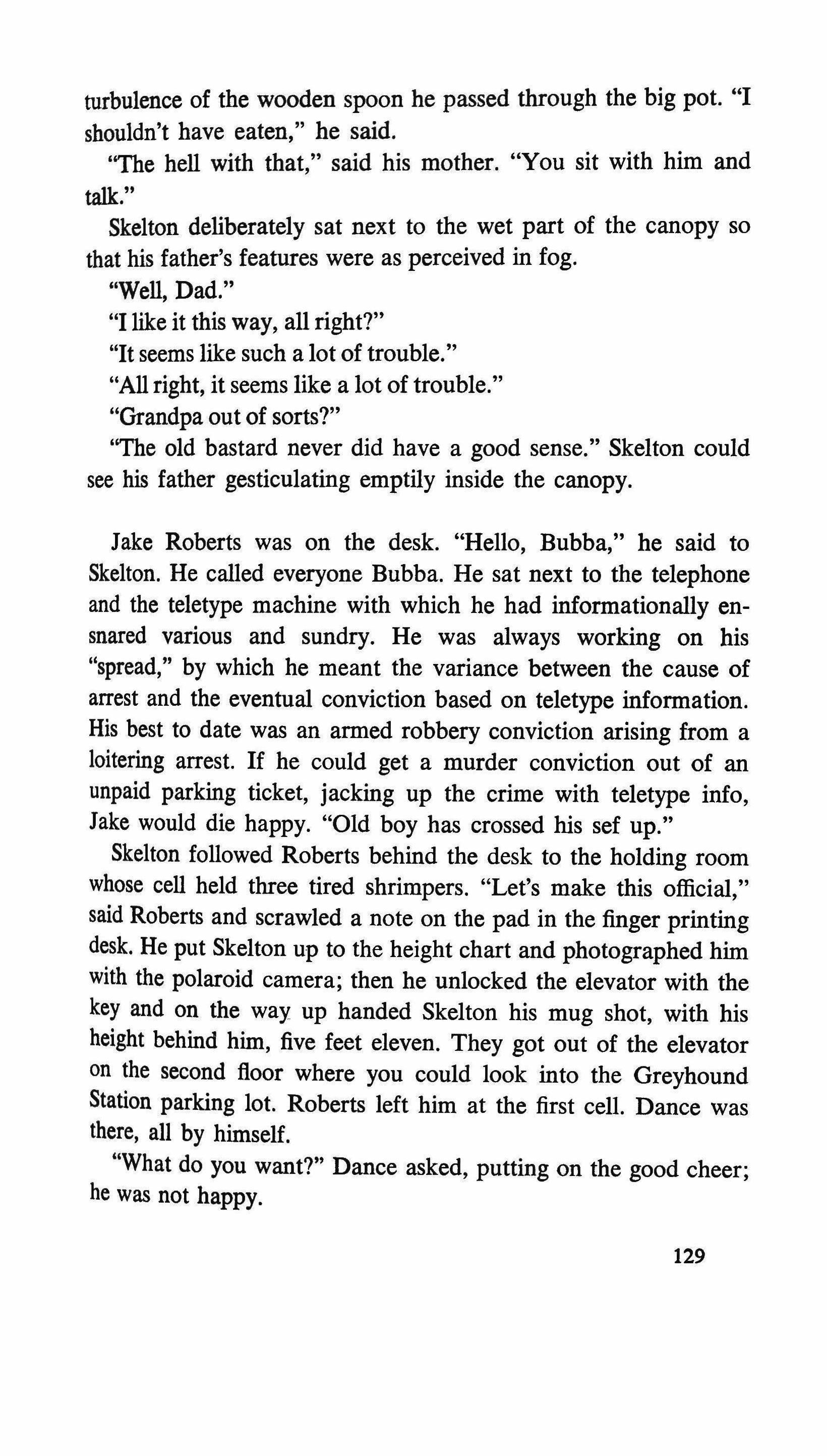
turbulence of the wooden spoon he passed through the big pot. "I shouldn't have eaten," he said.
"The hell with that," said his mother. "You sit with him and talk."
Skelton deliberately sat next to the wet part of the canopy so that his father's features were as perceived in fog.
"Well, Dad."
"I like it this way, all right?"
"It seems like such a lot of trouble."
"All right, it seems like a lot of trouble."
"Grandpa out of sorts?"
''The old bastard never did have a good sense." Skelton could see his father gesticulating emptily inside the canopy.
Jake Roberts was on the desk. "Hello, Bubba," he said to Skelton. He called everyone Bubba. He sat next to the telephone and the teletype machine with which he had informationally ensnared various and sundry. He was always working on his "spread," by which he meant the variance between the cause of arrest and the eventual conviction based on teletype information. His best to date was an armed robbery conviction arising from a loitering arrest. If he could get a murder conviction out of an unpaid parking ticket, jacking up the crime with teletype info, Jake would die happy. "Old boy has crossed his sef up."
Skelton followed Roberts behind the desk to the holding room whose cell held three tired shrimpers. "Let's make this official," said Roberts and scrawled a note on the pad in the finger printing desk. He put Skelton up to the height chart and photographed him with the polaroid camera; then he unlocked the elevator with the key and on the way up handed Skelton his mug shot, with his height behind him, five feet eleven. They got out of the elevator on the second floor where you could look into the Greyhound Station parking lot. Roberts left him at the first cell. Dance was there, all by himself.
"What do you want?" Dance asked, putting on the good cheer; he was not happy. 129
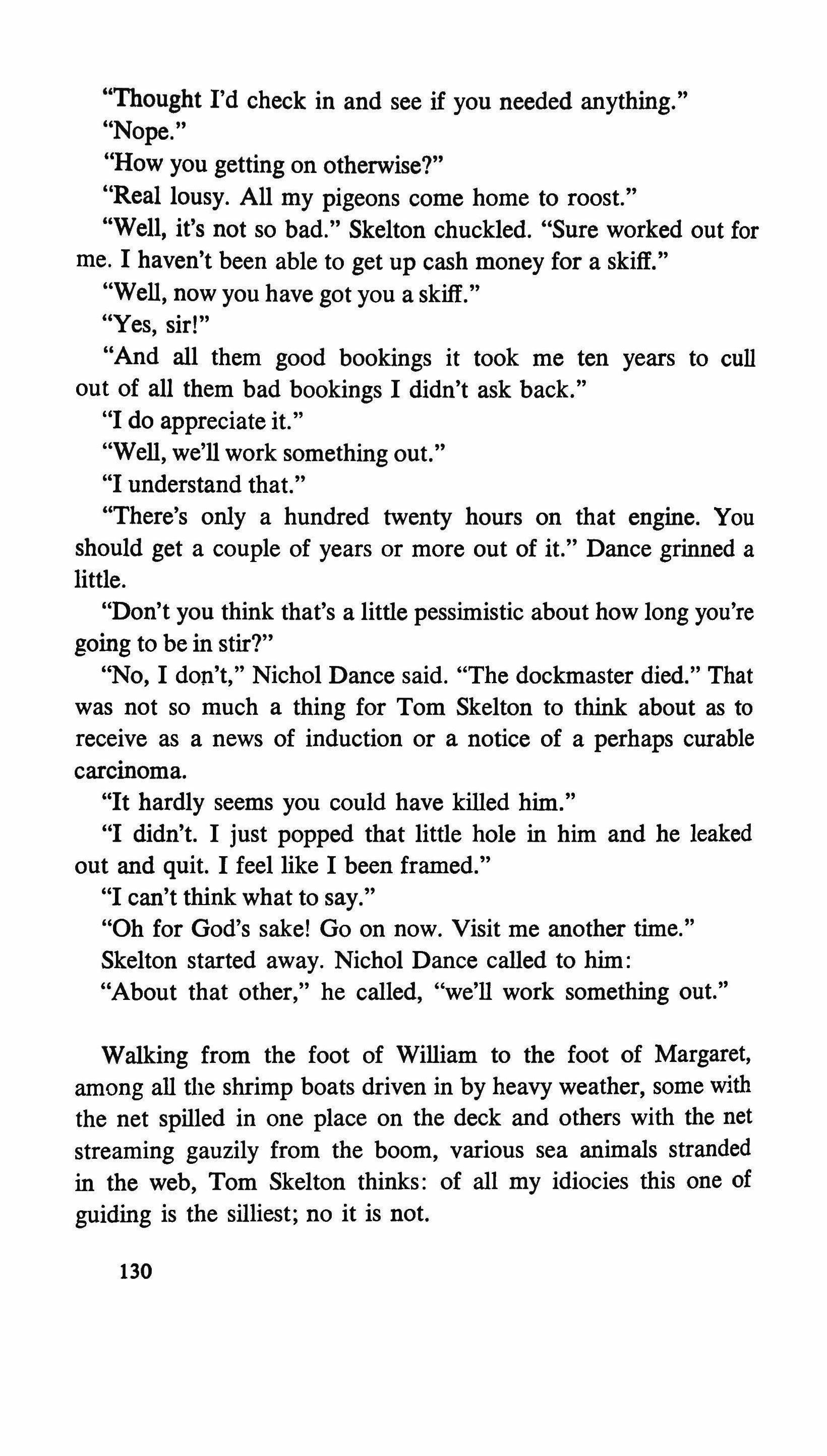
"Thought I'd check in and see if you needed anything." "Nope."
"How you getting on otherwise?"
"Real lousy. All my pigeons come home to roost."
"Well, it's not so bad." Skelton chuckled. "Sure worked out for me. I haven't been able to get up cash money for a skiff."
"Well, now you have got you a skiff."
"Yes, sir!"
"And all them good bookings it took me ten years to cull out of all them bad bookings I didn't ask back."
"I do appreciate it."
"Well, we'll work something out."
"I understand that."
"There's only a hundred twenty hours on that engine. You should get a couple of years or more out of it." Dance grinned a little.
"Don't you think that's a little pessimistic about how long you're going to be in stir?"
''No, I don't," Nichol Dance said. "The dockmaster died." That was not so much a thing for Tom Skelton to think about as to receive as a news of induction or a notice of a perhaps curable carcinoma.
"It hardly seems you could have killed him."
"I didn't. I just popped that little hole in him and he leaked out and quit. I feel like I been framed."
"I can't think what to say."
"Oh for God's sake! Go on now. Visit me another time."
Skelton started away. Nichol Dance called to him:
"About that other," he called, "we'll work something out."
Walking from the foot of William to the foot of Margaret, among all the shrimp boats driven in by heavy weather, some with the net spilled in one place on the deck and others with the net streaming gauzily from the boom, various sea animals stranded in the web, Tom Skelton thinks: of all my idiocies this one of guiding is the silliest; no it is not.
130
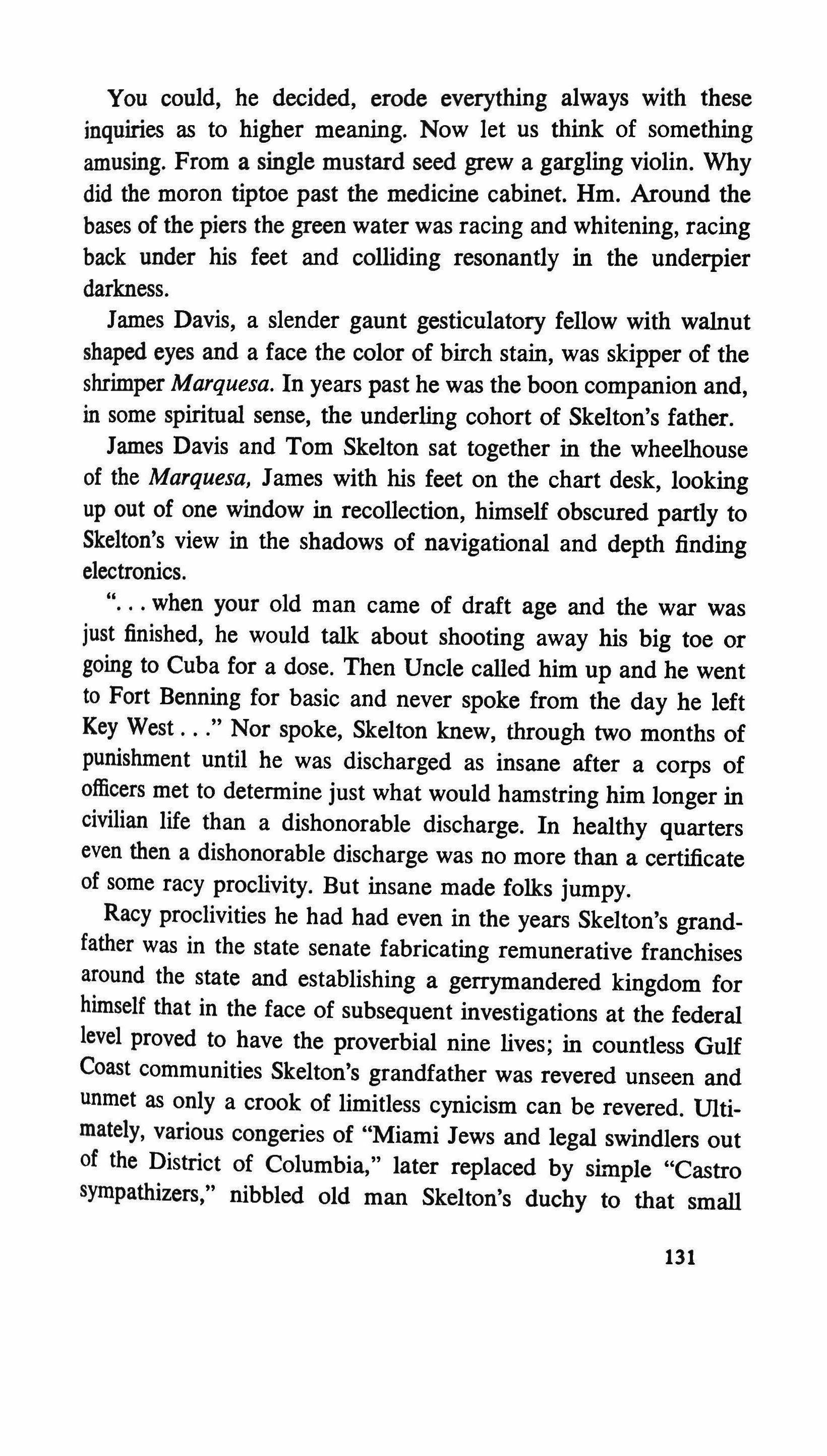
You could, he decided, erode everything always with these inquiries as to higher meaning. Now let us think of something amusing. From a single mustard seed grew a gargling violin. Why did the moron tiptoe past the medicine cabinet. Hm. Around the bases of the piers the green water was racing and whitening, racing back under his feet and colliding resonantly in the underpier darkness.
James Davis, a slender gaunt gesticulatory fellow with walnut shaped eyes and a face the color of birch stain, was skipper of the shrimper Marquesa. In years past he was the boon companion and, in some spiritual sense, the underling cohort of Skelton's father.
James Davis and Tom Skelton sat together in the wheelhouse of the Marquesa, James with his feet on the chart desk, looking up out of one window in recollection, himself obscured partly to Skelton's view in the shadows of navigational and depth finding electronics.
when your old man came of draft age and the war was just finished, he would talk about shooting away his big toe or going to Cuba for a dose. Then Uncle called him up and he went to Fort Benning for basic and never spoke from the day he left Key West Nor spoke, Skelton knew, through two months of punishment until he was discharged as insane after a corps of officers met to determine just what would hamstring him longer in civilian life than a dishonorable discharge. In healthy quarters even then a dishonorable discharge was no more than a certificate of some racy proclivity. But insane made folks jumpy.
Racy proclivities he had had even in the years Skelton's grand father was in the state senate fabricating remunerative franchises around the state and establishing a gerrymandered kingdom for himself that in the face of subsequent investigations at the federal level proved to have the proverbial nine lives; in countless Gulf Coast communities Skelton's grandfather was revered unseen and unmet as only a crook of limitless cynicism can be revered. Ultimately, various congeries of "Miami Jews and legal swindlers out of the District of Columbia," later replaced by simple "Castro sympathizers," nibbled old man Skelton's duchy to that small
131
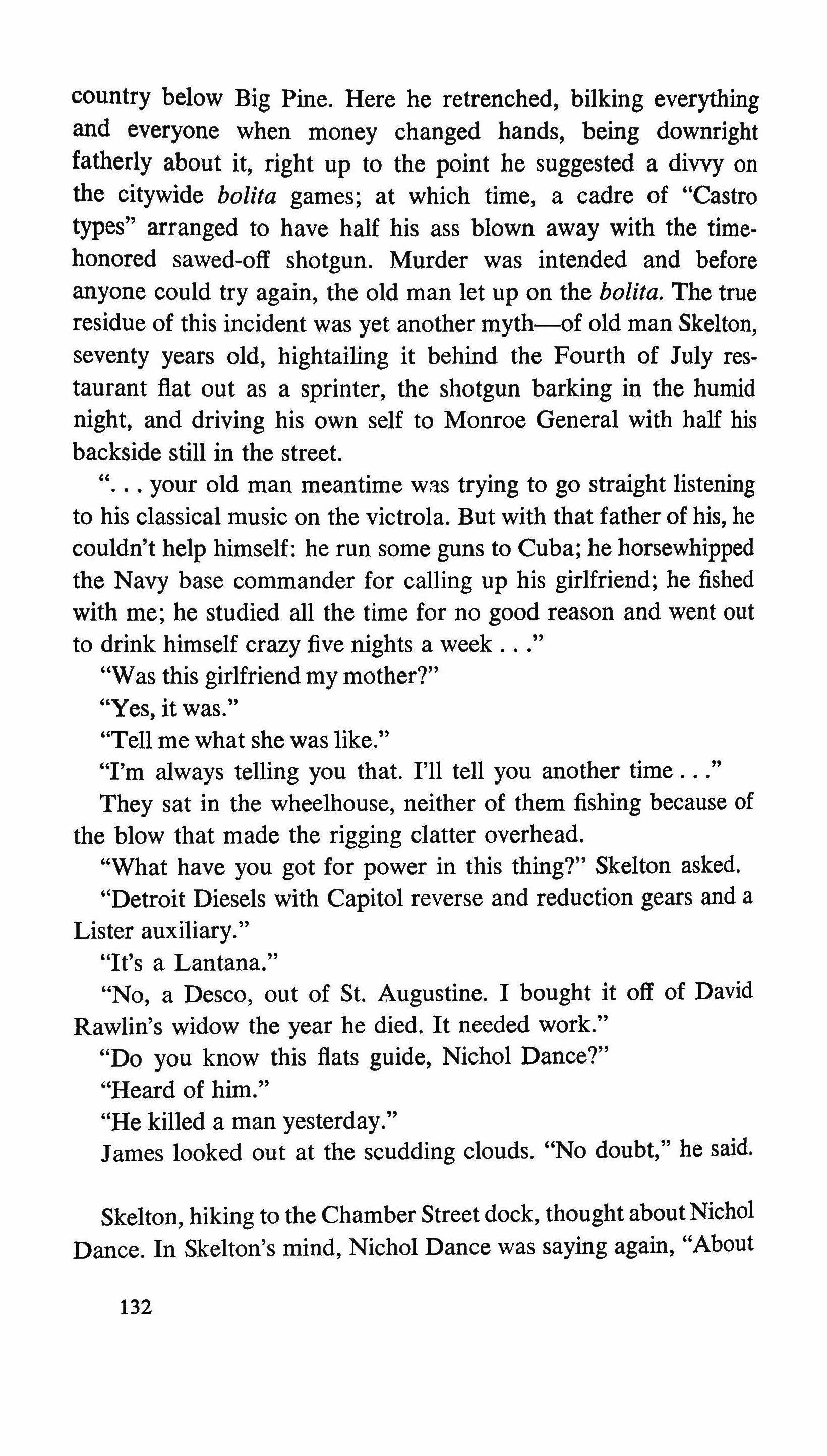
country below Big Pine. Here he retrenched, bilking everything and everyone when money changed hands, being downright fatherly about it, right up to the point he suggested a divvy on the citywide bolita games; at which time, a cadre of "Castro types" arranged to have half his ass blown away with the timehonored sawed-off shotgun. Murder was intended and before anyone could try again, the old man let up on the bolita. The true residue of this incident was yet another myth-of old man Skelton, seventy years old, hightailing it behind the Fourth of July restaurant fiat out as a sprinter, the shotgun barking in the humid night, and driving his own self to Monroe General with half his backside still in the street.
your old man meantime was trying to go straight listening to his classical music on the victrola. But with that father of his, he couldn't help himself: he run some guns to Cuba; he horsewhipped the Navy base commander for calling up his girlfriend; he fished with me; he studied all the time for no good reason and went out to drink himself crazy five nights a week
"Was this girlfriend my mother?"
"Yes, it was."
"Tell me what she was like."
"I'm always telling you that. I'll tell you another time "
They sat in the wheelhouse, neither of them fishing because of the blow that made the rigging clatter overhead.
"What have you got for power in this thing?" Skelton asked.
"Detroit Diesels with Capitol reverse and reduction gears and a Lister auxiliary."
"It's a Lantana."
"No, a Desco, out of St. Augustine. I bought it off of David Rawlin's widow the year he died. It needed work."
"Do you know this fiats guide, Nichol Dance?"
"Heard of him."
"He killed a man yesterday."
James looked out at the scudding clouds. "No doubt," he said.
Skelton, hiking to the Chamber Street dock, thought aboutNichol Dance. In Skelton's mind, Nichol Dance was saying again, "About
132

that other, we'll work something out." The imprecision of the remark troubled Skelton.
Skelton's grandfather saying his father never did have good sense bore a kind of suggestive imprecision that at once haunted and troubled Skelton.
It was that, like so many of us, Skelton had tried quite hard not to be crazy. Largely lucid and more than normally unaddled by abstract ambitions, Skelton had from time to time lapsed curiously into not terribly human actions. Perhaps, it was his sense of humor; but, well, anyway he seems to have done some barking.
At first, it was inadvertent or as a joke. Then, once, he had driven back the urge to bark as though it were the embodiment of terror: to wit, that he was not human at all and that one day he would find himself beside a half filled garbage pail, baying at the moon.
"You are baying at the moon now," said a face once from the speeding Lagonda. "Right now." Am I dreaming?
"Well sir," said Carter, stacking the frozen balao in one end of the bait freezer, "it sorely grieves me to think of the mess he is in. But I would say that, in view of his record, Nichol is all through." But then, Carter was smiling.
"It doesn't seem fair," said Skelton. Why was Carter smiling? "Oh sure it's fair. I mean, Nichol is a good friend. But honestly, you don't jump up and gaff folks."
"I suppose-" "You suppose?"
"I mean, I suppose you don't."
A few minutes later, Carter said, "What was that?" "What?"
"I heard barking."
Carter was right. It did seem Nichol was guilty as hell; but before they could ship him to Raiford, Skelton wanted to pay him a visit.
Jake Roberts gave Skelton the elevator key and said, "They got him for the whole thing, hook, line and sinker." Jake was grinning too. 133
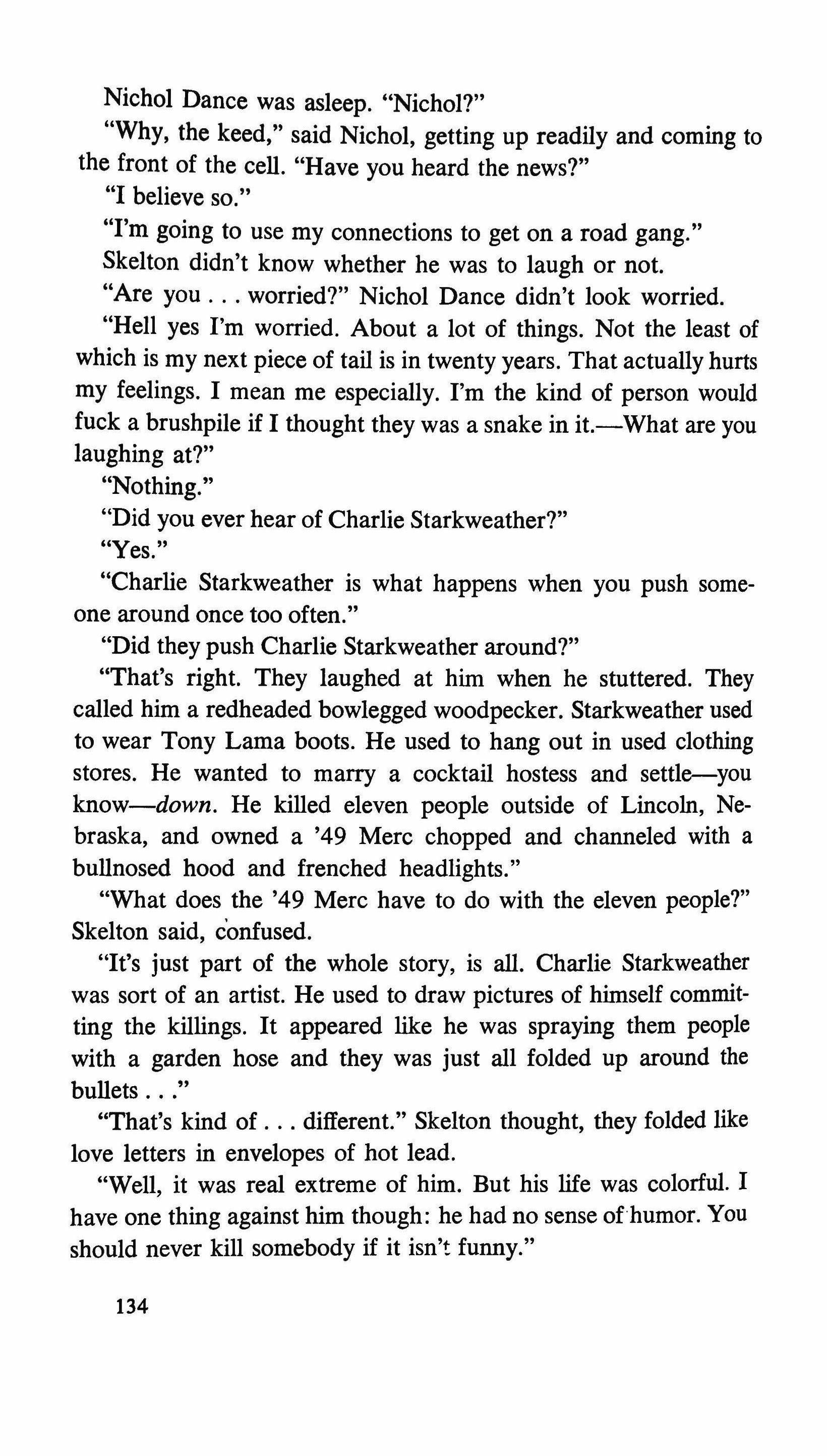
Nichol Dance was asleep. "Nichol?"
"Why, the keed," said Nichol, getting up readily and coming to the front of the cell. "Have you heard the news?" "I believe so."
"I'm going to use my connections to get on a road gang." Skelton didn't know whether he was to laugh or not.
"Are you worried?" Nichol Dance didn't look worried. "Hell yes I'm worried. About a lot of things. Not the least of which is my next piece of tail is in twenty years. That actually hurts my feelings. I mean me especially. I'm the kind of person would fuck a brushpile if I thought they was a snake in it.-What are you laughing at?"
"Nothing.
"Did you ever hear of Charlie Starkweather?" "Yes."
"Charlie Starkweather is what happens when you push someone around once too often."
"Did they push Charlie Starkweather around?"
"That's right. They laughed at him when he stuttered. They called him a redheaded bowlegged woodpecker. Starkweather used to wear Tony Lama boots. He used to hang out in used clothing stores. He wanted to marry a cocktail hostess and settle-you know-down. He killed eleven people outside of Lincoln, Nebraska, and owned a '49 Mere chopped and channeled with a bullnosed hood and frenched headlights."
"What does the '49 Merc have to do with the eleven people?" Skelton said, confused.
"It's just part of the whole story, is all. Charlie Starkweather was sort of an artist. He used to draw pictures of himself committing the killings. It appeared like he was spraying them people with a garden hose and they was just all folded up around the bullets "
"That's kind of different." Skelton thought, they folded like love letters in envelopes of hot lead.
"Well, it was real extreme of him. But his life was colorful. I have one thing against him though: he had no sense of-humor. You should never kill somebody if it isn't funny."
134
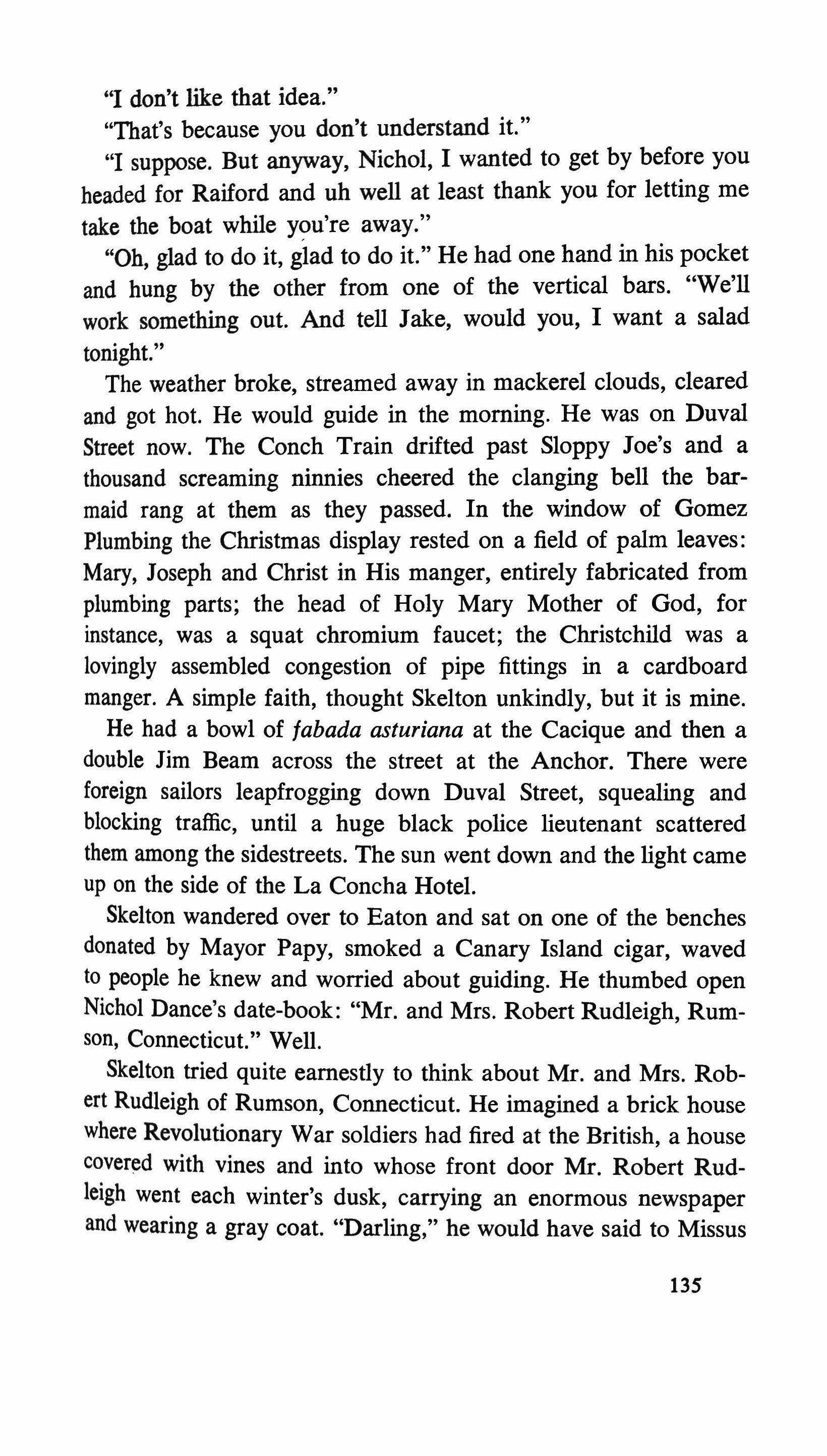
"I don't like that idea."
"That's because you don't understand it."
"I suppose. But anyway, Nichol, I wanted to get by before you headed for Raiford and uh well at least thank you for letting me take the boat while you're away."
"Oh, glad to do it, glad to do it." He had one hand in his pocket and hung by the other from one of the vertical bars. "We'll work something out. And tell Jake, would you, I want a salad tonight."
The weather broke, streamed away in mackerel clouds, cleared and got hot. He would guide in the morning. He was on Duval Street now. The Conch Train drifted past Sloppy Joe's and a thousand screaming ninnies cheered the clanging bell the barmaid rang at them as they passed. In the window of Gomez Plumbing the Christmas display rested on a field of palm leaves: Mary, Joseph and Christ in His manger, entirely fabricated from plumbing parts; the head of Holy Mary Mother of God, for instance, was a squat chromium faucet; the Christchild was a lovingly assembled congestion of pipe fittings in a cardboard manger. A simple faith, thought Skelton unkindly, but it is mine. He had a bowl of [abada asturiana at the Cacique and then a double Jim Beam across the street at the Anchor. There were foreign sailors leapfrogging down Duval Street, squealing and blocking traffic, until a huge black police lieutenant scattered them among the sidestreets. The sun went down and the light came up on the side of the La Concha Hotel.
Skelton wandered over to Eaton and sat on one of the benches donated by Mayor Papy, smoked a Canary Island cigar, waved to people he knew and worried about guiding. He thumbed open Nichol Dance's date-book: "Mr. and Mrs. Robert Rudleigh, Rumson, Connecticut." Well.
Skelton tried quite earnestly to think about Mr. and Mrs. Robert Rudleigh of Rumson, Connecticut. He imagined a brick house where Revolutionary War soldiers had fired at the British, a house covered with vines and into whose front door Mr. Robert Rudleigh went each winter's dusk, carrying an enormous newspaper and wearing a gray coat. "Darling," he would have said to Missus
135

Rudleigh, "it is time we had sport." Then the Rudleighs go to the city of New York. They go to a great brown store where pictures of Theodore Roosevelt and stuffed tigers surround the walls. A well-mannered lesbian shows them "tropical outfits" which include mosquito netting, a bonefish rod, a pith helmet and a prophylactic; all stapled to a large piece of cardboard upon which has been printed a "tropical scene," the entire outfit protected by cellophane and displayed under a disinfecting ultraviolet light. Rudleigh's motto is, "I pay, 1 take." The city of New York and the town of Rumson know him for what he is: a marvel in a gray coat who sometimes walks chest deep through snow drifts to get that enormous newspaper and who only occasionally breaks a savage work pattern for sport in the tropics.
He pulled the bell on the gate, now locked as it was not in his childhood; now barbed wire was stapled along the top of the wooden wall. As a child he had sat in the uncultivated end of the enclosed lot and listened to the chameleons rattling in the deep grass, crawled low in that grass and watched the lizards leap out green and tremulous into the streaked sunlight.
Lying on his back he had watched a spider let itself down forty feet from the Alexandria Palm inch by inch over a period of hours; so that after watching until it arrived it had magnified to subsume the world, the sky itself only seeming to radiate from its back. The spider, noxiously banana shaped, landed on his face, walked away and thus vanished.
"Come in and leave that cigar in the driveway."
"Can't stop but a minute. 1 just wanted to say hi."
He walked over to the gauze canopy.
"Evening, Dad."
"Tom."
"What are you doing?"
"Reading Shakespeare."
Skelton had come to associate the higher arts with his father's holing up in bed.
"I also have my violin in here," he added.
Skelton could barely see inside, but after an instant's rustling
136

about, a phrase from Sibelius flowed out through the gauze; then imperceptibly blurred into Hank Williams' Lovesick Blues. Skelton listened to those abject hillbilly strains a long moment, remembering his father on the porch in his Cuban chairs so many years ago now, playing for his pals, fishermen, idlers and crazies. The music stopped.
"Ma'am, you want to hand me that lunch so I can stow it?" Skelton took the wicker basket from Missus Rudleigh; and then the Thermos she handed him. "I've got plenty of water," he said.
"That's not water."
"What is it?"
"Gibsons."
"Let me put them in the cooler for you then-"
"We put them in the Thermos," said Rudleigh, "so we don't have to put them in the cooler. We like them where we can get at them. In case we need them, you know, real snappy."
Tom Skelton looked up at him. Most people when they smile expose a cross-section of their upper teeth; when Rudleigh smiled, he exposed his lower teeth.
"Hold the Thermos in your lap," Skelton said. "If that starts rolling around the skiff while I'm running these banks I'll throw it overboard."
"An ecologist," said Missus Rudleigh.
"Are you sure Nichol cannot appeal his sentence, Captain?" asked Rudleigh.
"I'm sure," said Skelton.
Missus Rudleigh reached out one hand and bent it backwards so her fingernails were all in display; she was thinking of a killer line but it wouldn't come; so she didn't speak.
Skelton felt sick. What a beginning. He knew from other guides he could not let the clients run the boat for him; but he had never expected to have to rebuff such bids; now all three of them were glancing past one another with metallic eyes.
Missus Rudleigh came and Skelton put her in the forward chair. Rudleigh followed in squeaking bright deck shoes and sat 137

aft swiveling about in the chair with an executive's preoccupation.
"Captain," Rudleigh began. Men like Rudleigh believed in giving credit to the qualified. If an eight year old were running the skiff, Rudleigh would call him "Captain" without irony; it was a credit to his class. "Captain, are we going to bonefish?" Missus Rudleigh was putting zinc oxide on her thin nose and on the actual edges of her precise cheekbones. She was a thin pretty woman of forty who you could see had a proclivity for hysterics, slow bums and slapping.
"We have a good tide for bonefish."
"Well, Missus Rudleigh and 1 have had a good deal of bonefishing in Yucatan and we were wondering if it mightn't be an awfully long shot to fish for permit
Skelton knew it was being put to him; finding permit-big pompano-was a guide's hallmark and he didn't particularly have a permit tide. "I can find permit," he said though, finishing a sequence Rudleigh started with the word "Captain."
Carter strolled up. He knew the Rudleighs and they greeted each other. "You're in good hands," he said to them, tilting his head toward Skelton. "Boy's a regular fish hawk." He returned his head to the perpendicular.
"Where are your people, Cart?" Skelton asked to change the subject.
"They been partying, 1 guess. Man said he'd be late. It only shortens my day."
Skelton choked the engine and started it. He let it idle for a few minutes and then freed up his lines. The canal leading away from the dock wandered around lazily, a lead green gloss like pavement.
"Ought to find some bonefish in the Snipes on this incoming water," Carter said. Skelton looked at him a moment.
"We're uh permit fishing, Cart."
"Oh, really. Why permit, huh."
"What do you think? Boca Chica beach?"
"Your guess is as good as mine. But yeah okay, Boca Chica."
138
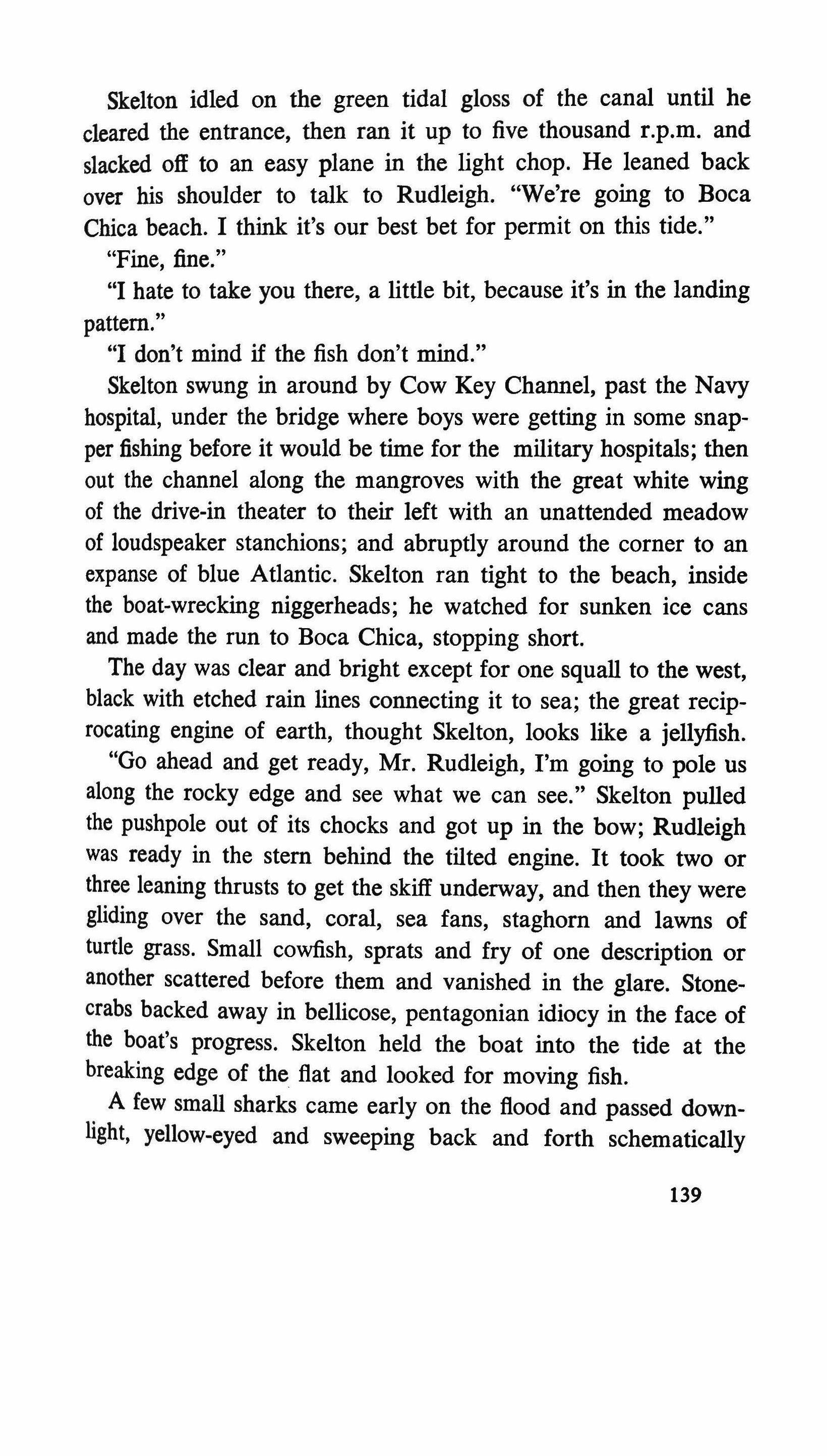
Skelton idled on the green tidal gloss of the canal until he cleared the entrance, then ran it up to five thousand r.p.m. and slacked off to an easy plane in the light chop. He leaned back over his shoulder to talk to Rudleigh. "We're going to Boca Chica beach. 1 think it's our best bet for permit on this tide."
"Fine, fine."
"I hate to take you there, a little bit, because it's in the landing pattern."
"I don't mind if the fish don't mind."
Skelton swung in around by Cow Key Channel, past the Navy hospital, under the bridge where boys were getting in some snapper fishing before it would be time for the military hospitals; then out the channel along the mangroves with the great white wing of the drive-in theater to their left with an unattended meadow of loudspeaker stanchions; and abruptly around the corner to an expanse of blue Atlantic. Skelton ran tight to the beach, inside the boat-wrecking niggerheads; he watched for sunken ice cans and made the run to Boca Chica, stopping short.
The day was clear and bright except for one squall to the west, black with etched rain lines connecting it to sea; the great reciprocating engine of earth, thought Skelton, looks like a jellyfish.
"Go ahead and get ready, Mr. Rudleigh, I'm going to pole us along the rocky edge and see what we can see." Skelton pulled the pushpole out of its chocks and got up in the bow; Rudleigh was ready in the stern behind the tilted engine. It took two or three leaning thrusts to get the skiff underway, and then they were gliding over the sand, coral, sea fans, staghorn and lawns of turtle grass. Small cowfish, sprats and fry of one description or another scattered before them and vanished in the glare. Stonecrabs backed away in bellicose, pentagonian idiocy in the face of the boat's progress. Skelton held the boat into the tide at the breaking edge of the flat and looked for moving fish.
A few small sharks came early on the flood and passed downlight, yellow-eyed and sweeping back and forth schematically
139

for something in trouble. After the sharks, the first of the military aircraft came in overhead, terrifyingly low; a great delta winged machine with howling, vulvate exhausts and nervous quick moving control flaps; so close were they that the bright hydraulic shafts behind the flaps glittered; small rockets were laid up thickly under the wings like insect eggs. The plane approached, banked subtly and the pilot glanced out at the skiff; his head looking no larger than a cocktail onion. A moment after the plane passed, its shock wave swept toward them and the crystal perfect world of the flat paled and vanished; not appearing until some minutes later and slowly. The draconic roar of the engines diminished and the twin blossoms of flame shrank away toward the airfield.
"It must take a smart cookie," said Missus Rudleigh, "to make one of those do what it is supposed to."
"It takes balls for brains," said Rudleigh.
"That's even better," she smiled.
"Only that's what any mule has," Rudleigh added.
Missus Rudleigh threw something at her husband who remained in the stern, modeling for a clipper ship bowsprit, rigid as a gun carriage.
Skelton was so determined that this first day of his professional guiding be a success that he felt with some agony the ugliness of the aircraft that came in now at shorter and shorter intervals, thundering with their mists of unspent fuel drifting over the sea meadow.
The Rudleighs had opened the Thermos and were consuming its contents exactly as the heat of the day began to spread. Skelton was now poling down-light, flushing small fish; then two schools of bonefish, not tailing but pushing wakes in their hurry; Rudleigh saw them late and bungled the cast, looking significantly at Missus Rudleigh after each failure.
"You've got to bear down," she said.
"I'm bearing down."
"Bear down harder, honey."
"I said: I'm bearing down."
140
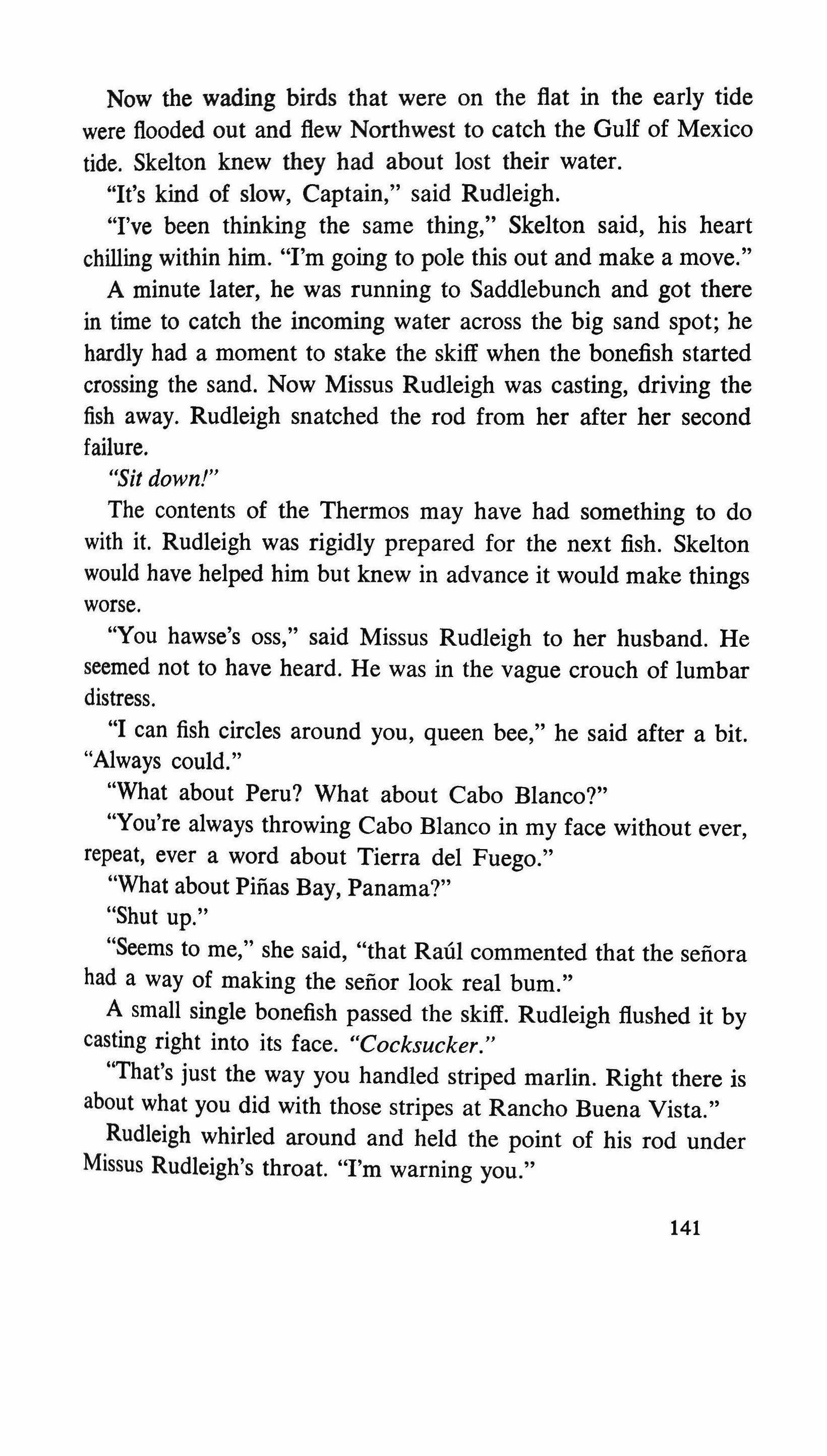
Now the wading birds that were on the flat in the early tide were flooded out and flew Northwest to catch the Gulf of Mexico tide. Skelton knew they had about lost their water.
"It's kind of slow, Captain," said Rudleigh.
"I've been thinking the same thing," Skelton said, his heart chilling within him. "I'm going to pole this out and make a move."
A minute later, he was running to Saddlebunch and got there in time to catch the incoming water across the big sand spot; he hardly had a moment to stake the skiff when the bonefish started crossing the sand. Now Missus Rudleigh was casting, driving the fish away. Rudleigh snatched the rod from her after her second failure.
"Sit down!"
The contents of the Thermos may have had something to do with it. Rudleigh was rigidly prepared for the next fish. Skelton would have helped him but knew in advance it would make things worse.
"You hawse's oss," said Missus Rudleigh to her husband. He seemed not to have heard. He was in the vague crouch of lumbar distress.
"I can fish circles around you, queen bee," he said after a bit. "Always could."
"What about Peru? What about Cabo Blanco?"
"You're always throwing Cabo Blanco in my face without ever, repeat, ever a word about Tierra del Fuego."
"What about Pifias Bay, Panama?"
"Shut up."
"Seems to me," she said, "that Raul commented that the senora had a way of making the senor look real bum."
A small single bonefish passed the skiff. Rudleigh flushed it by casting right into its face. "Cocksucker,"
"That's just the way you handled striped marlin. Right there is about what you did with those stripes at Rancho Buena Vista."
Rudleigh whirled around and held the point of his rod under Missus Rudleigh's throat. "I'm warning you."
141
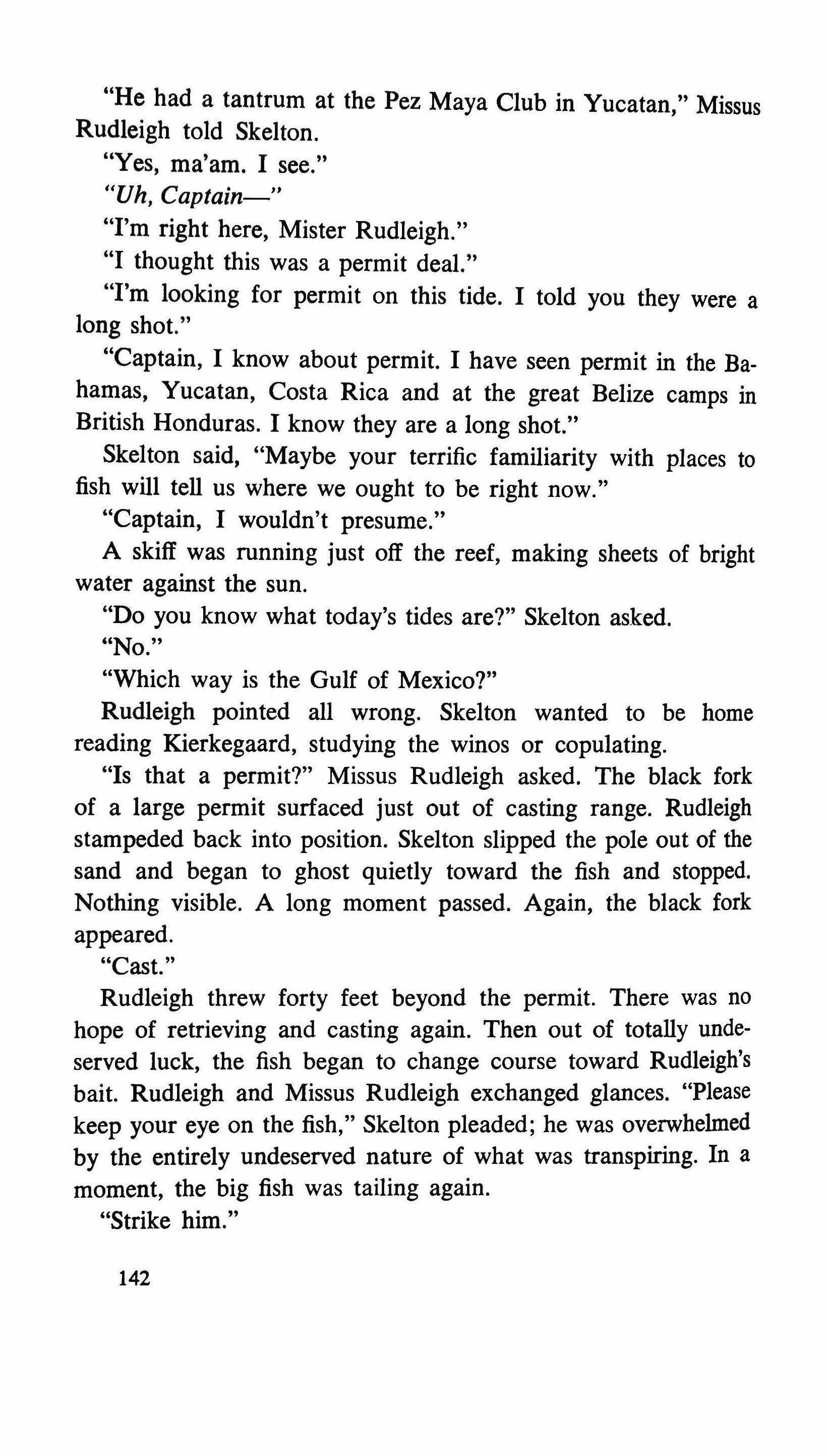
"He had a tantrum at the Pez Maya Club in Yucatan," Missus Rudleigh told Skelton.
"Yes, ma'am. I see."
HUh, Captain-"
"I'm right here, Mister Rudleigh."
"I thought this was a permit deal."
"I'm looking for permit on this tide. I told you they were a long shot."
"Captain, I know about permit. I have seen permit in the Bahamas, Yucatan, Costa Rica and at the great Belize camps in British Honduras. I know they are a long shot."
Skelton said, "Maybe your terrific familiarity with places to fish will tell us where we ought to be right now."
"Captain, I wouldn't presume."
A skiff was running just off the reef, making sheets of bright water against the sun.
"Do you know what today's tides are?" Skelton asked. "No."
"Which way is the Gulf of Mexico?"
Rudleigh pointed all wrong. Skelton wanted to be home reading Kierkegaard, studying the winos or copulating,
"Is that a permit?" Missus Rudleigh asked. The black fork of a large permit surfaced just out of casting range. Rudleigh stampeded back into position. Skelton slipped the pole out of the sand and began to ghost quietly toward the fish and stopped. Nothing visible. A long moment passed. Again, the black fork appeared.
"Cast."
Rudleigh threw forty feet beyond the permit. There was no hope of retrieving and casting again. Then out of totally undeserved luck, the fish began to change course toward Rudleigh's bait. Rudleigh and Missus Rudleigh exchanged glances. "Please keep your eye on the fish," Skelton pleaded; he was overwhelmed by the entirely undeserved nature of what was transpiring. In a moment, the big fish was tailing again.
"Strike him."
142
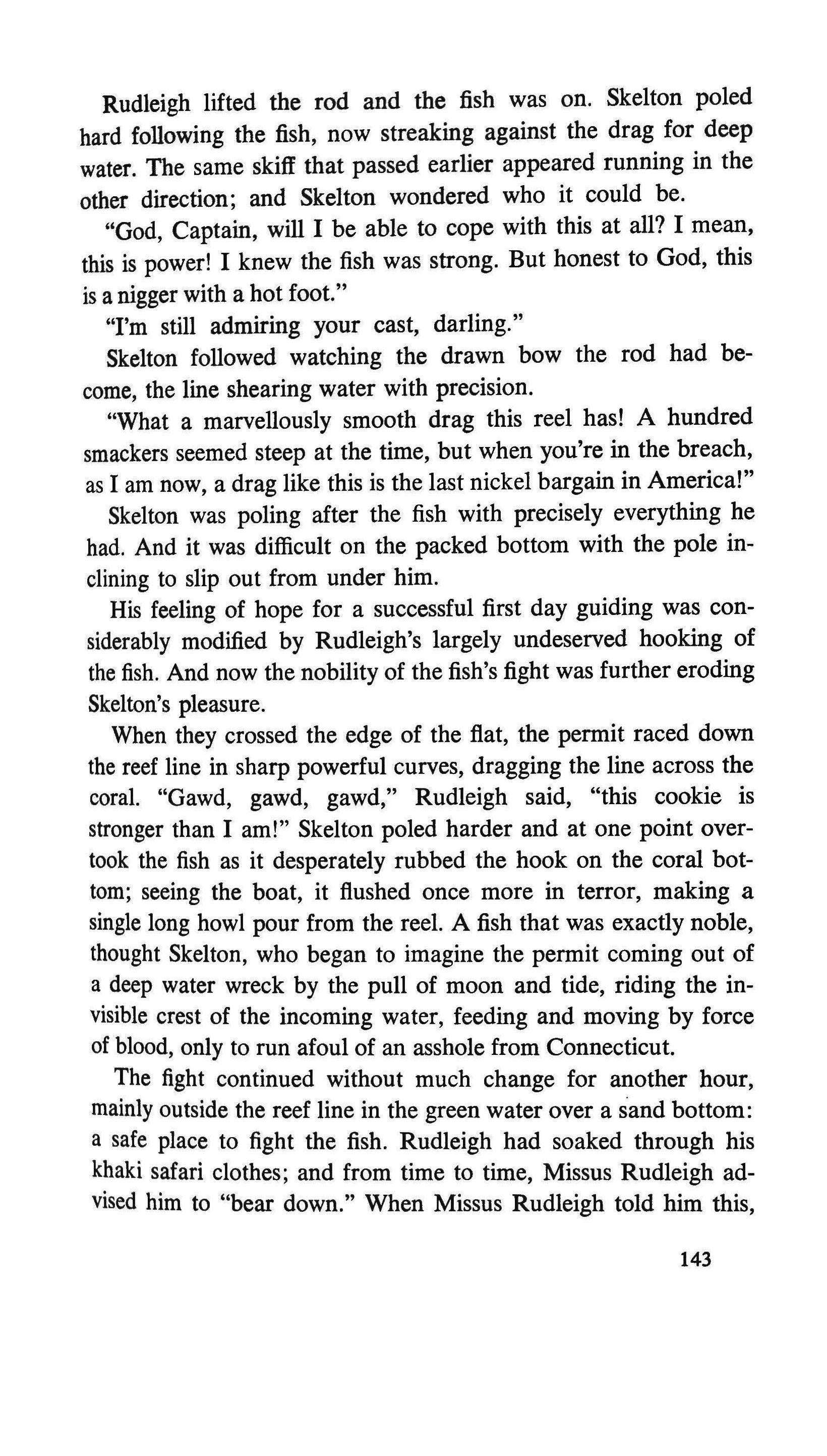
Rudleigh lifted the rod and the fish was on. Skelton poled hard following the fish, now streaking against the drag for deep water. The same skiff that passed earlier appeared running in the other direction; and Skelton wondered who it could be.
"God, Captain, will I be able to cope with this at all? I mean, this is power! I knew the fish was strong. But honest to God, this is a nigger with a hot foot."
"I'm still admiring your cast, darling."
Skelton followed watching the drawn bow the rod had become, the line shearing water with precision.
"What a marvellously smooth drag this reel has! A hundred smackers seemed steep at the time, but when you're in the breach, as I am now, a drag like this is the last nickel bargain in America!"
Skelton was poling after the fish with precisely everything he had. And it was difficult on the packed bottom with the pole inclining to slip out from under him.
His feeling of hope for a successful first day guiding was considerably modified by Rudleigh's largely undeserved hooking of the fish. And now the nobility of the fish's fight was further eroding Skelton's pleasure.
When they crossed the edge of the flat, the permit raced down the reef line in sharp powerful curves, dragging the line across the coral. "Gawd, gawd, gawd," Rudleigh said, "this cookie is stronger than I am!" Skelton poled harder and at one point overtook the fish as it desperately rubbed the hook on the coral bottom; seeing the boat, it flushed once more in terror, making a single long howl pour from the reel. A fish that was exactly noble, thought Skelton, who began to imagine the permit coming out of a deep water wreck by the pull of moon and tide, riding the invisible crest of the incoming water, feeding and moving by force of blood, only to run afoul of an asshole from Connecticut.
The fight continued without much change for another hour, mainly outside the reef line in the green water over a sand bottom: a safe place to fight the fish. Rudleigh had soaked through his khaki safari clothes; and from time to time, Missus Rudleigh advised him to "bear down." When Missus Rudleigh told him this, 143
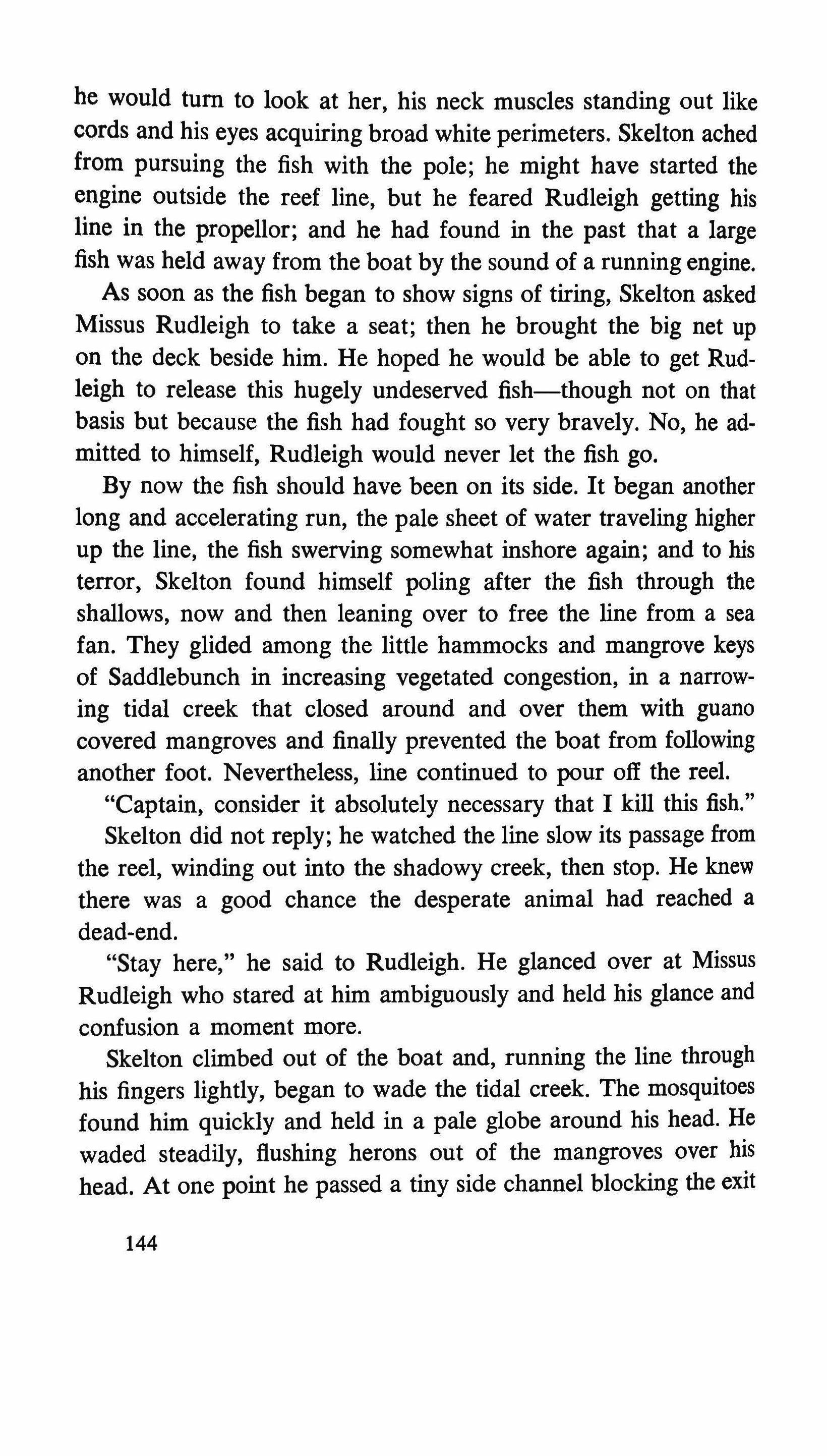
he would tum to look at her, his neck muscles standing out like cords and his eyes acquiring broad white perimeters. Skelton ached from pursuing the fish with the pole; he might have started the engine outside the reef line, but he feared Rudleigh getting his line in the propellor; and he had found in the past that a large fish was held away from the boat by the sound of a running engine.
As soon as the fish began to show signs of tiring, Skelton asked Missus Rudleigh to take a seat; then he brought the big net up on the deck beside him. He hoped he would be able to get Rudleigh to release this hugely undeserved fish-though not on that basis but because the fish had fought so very bravely. No, he admitted to himself, Rudleigh would never let the fish go.
By now the fish should have been on its side. It began another long and accelerating run, the pale sheet of water traveling higher up the line, the fish swerving somewhat inshore again; and to his terror, Skelton found himself poling after the fish through the shallows, now and then leaning over to free the line from a sea fan. They glided among the little hammocks and mangrove keys of Saddlebunch in increasing vegetated congestion, in a narrowing tidal creek that closed around and over them with guano covered mangroves and finally prevented the boat from following another foot. Nevertheless, line continued to pour off the reel.
"Captain, consider it absolutely necessary that I kill this fish."
Skelton did not reply; he watched the line slow its passage from the reel, winding out into the shadowy creek, then stop. He knew there was a good chance the desperate animal had reached a dead-end.
"Stay here," he said to Rudleigh. He glanced over at Missus Rudleigh who stared at him ambiguously and held his glance and confusion a moment more.
Skelton climbed out of the boat and, running the line through his fingers lightly, began to wade the tidal creek. The mosquitoes found him quickly and held in a pale globe around his head. He waded steadily, flushing herons out of the mangroves over his head. At one point he passed a tiny side channel blocking the exit
144
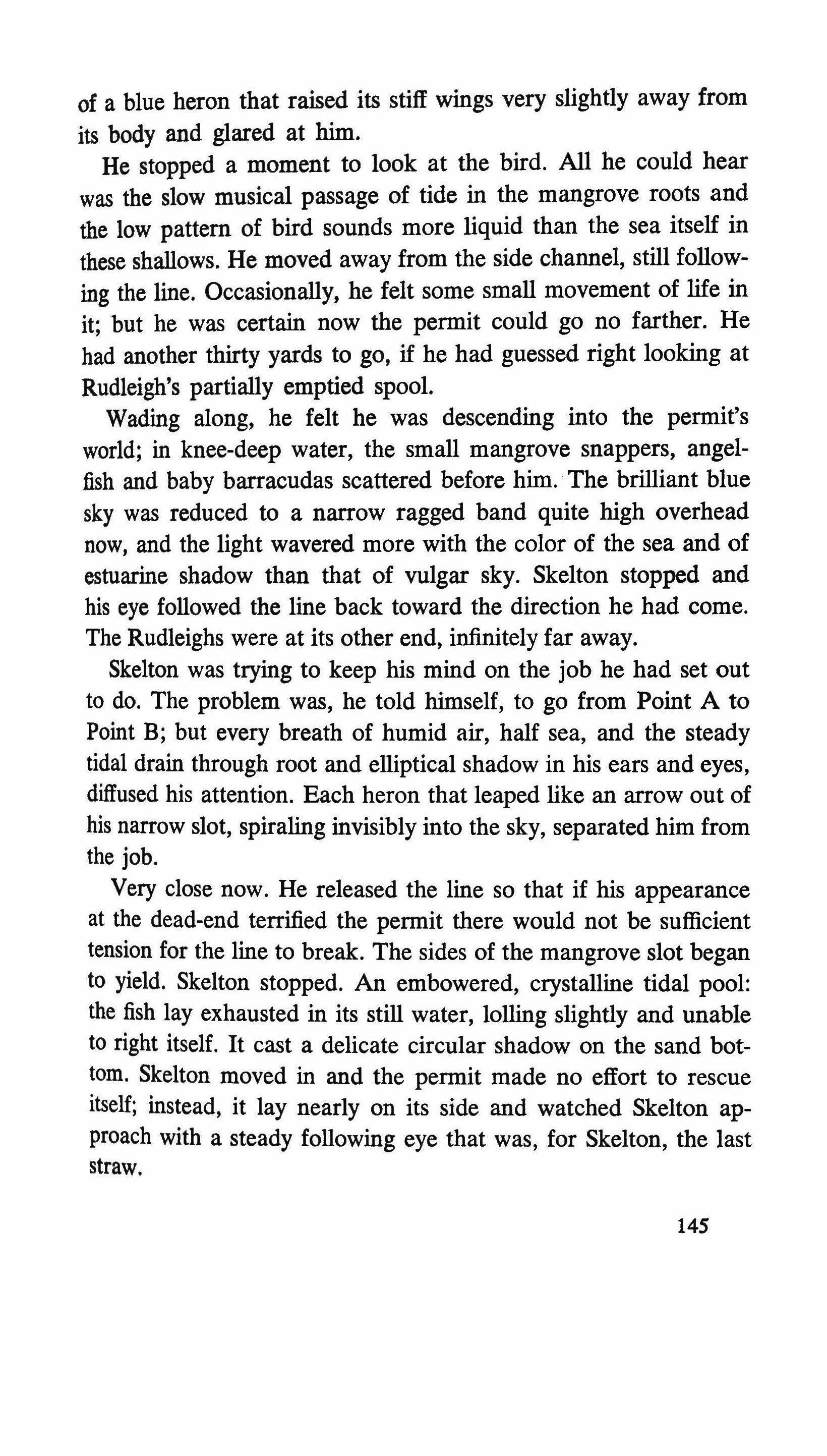
of a blue heron that raised its stiff wings very slightly away from its body and glared at him.
He stopped a moment to look at the bird. All he could hear was the slow musical passage of tide in the mangrove roots and the low pattern of bird sounds more liquid than the sea itself in these shallows. He moved away from the side channel, still following the line. Occasionally, he felt some small movement of life in it; but he was certain now the permit could go no farther. He had another thirty yards to go, if he had guessed right looking at Rudleigh's partially emptied spool.
Wading along, he felt he was descending into the permit's world; in knee-deep water, the small mangrove snappers, angelfish and baby barracudas scattered before him.: The brilliant blue sky was reduced to a narrow ragged band quite high overhead now, and the light wavered more with the color of the sea and of estuarine shadow than that of vulgar sky. Skelton stopped and his eye followed the line back toward the direction he had come. The Rudleighs were at its other end, infinitely far away. Skelton was trying to keep his mind on the job he had set out to do. The problem was, he told himself, to go from Point A to Point B; but every breath of humid air, half sea, and the steady tidal drain through root and elliptical shadow in his ears and eyes, diffused his attention. Each heron that leaped like an arrow out of his narrow slot, spiraling invisibly into the sky, separated him from the job.
Very close now. He released the line so that if his appearance at the dead-end terrified the permit there would not be sufficient tension for the line to break. The sides of the mangrove slot began to yield. Skelton stopped. An embowered, crystalline tidal pool: the fish lay exhausted in its still water, lolling slightly and unable to right itself. It cast a delicate circular shadow on the sand bottom. Skelton moved in and the permit made no effort to rescue itself; instead, it lay nearly on its side and watched Skelton approach with a steady following eye that was, for Skelton, the last straw.
145
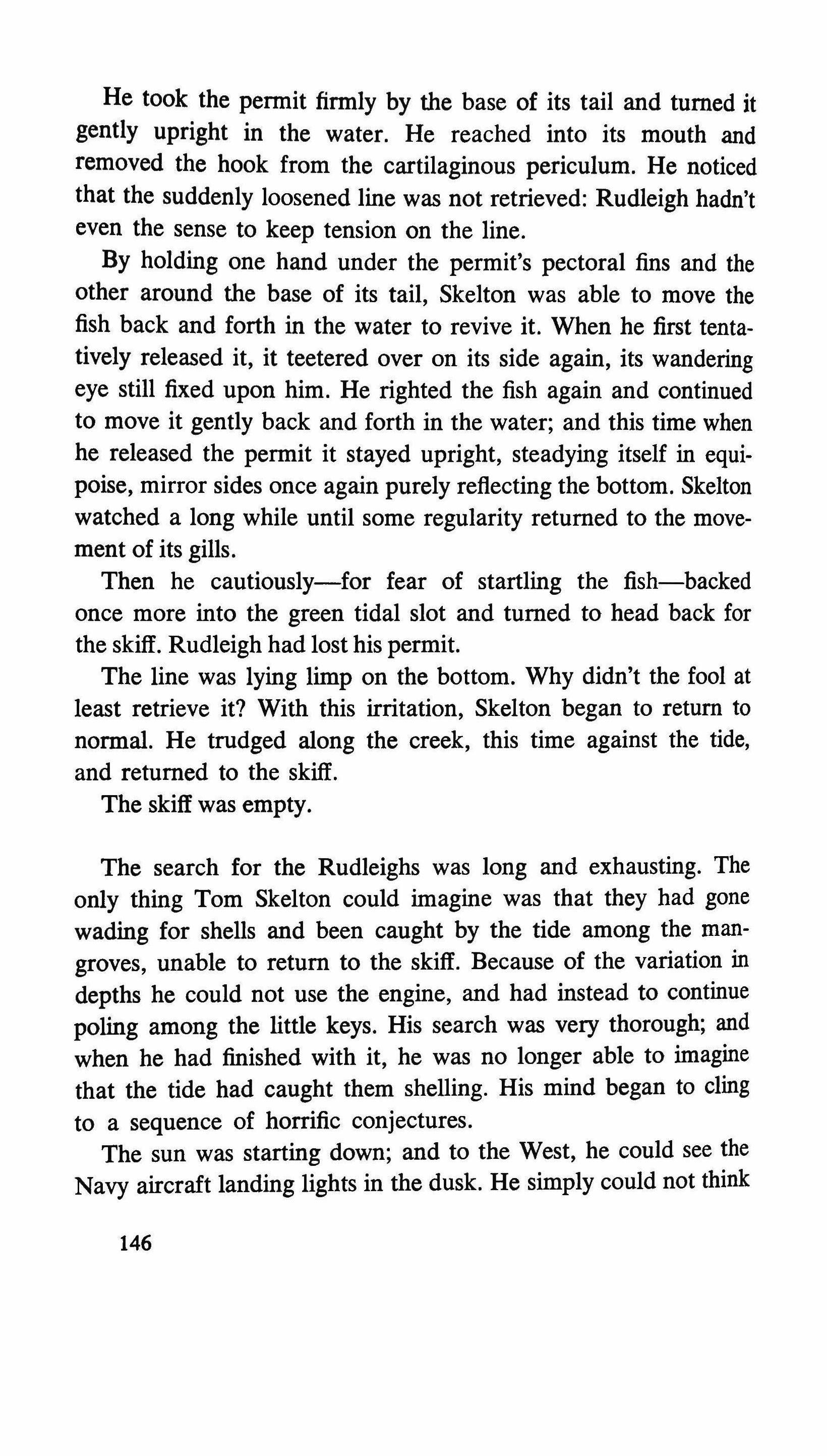
He took the permit firmly by the base of its tail and turned it gently upright in the water. He reached into its mouth and removed the hook from the cartilaginous periculum. He noticed that the suddenly loosened line was not retrieved: Rudleigh hadn't even the sense to keep tension on the line.
By holding one hand under the permit's pectoral fins and the other around the base of its tail, Skelton was able to move the fish back and forth in the water to revive it. When he first tentatively released it, it teetered over on its side again, its wandering eye still fixed upon him. He righted the fish again and continued to move it gently back and forth in the water; and this time when he released the permit it stayed upright, steadying itself in equipoise, mirror sides once again purely reflecting the bottom. Skelton watched a long while until some regularity returned to the movement of its gills.
Then he cautiously-for fear of startling the fish-backed once more into the green tidal slot and turned to head back for the skiff. Rudleigh had lost his permit.
The line was lying limp on the bottom. Why didn't the fool at least retrieve it? With this irritation, Skelton began to return to normal. He trudged along the creek, this time against the tide, and returned to the skiff.
The skiff was empty.
The search for the Rudleighs was long and exhausting. The only thing Tom Skelton could imagine was that they had gone wading for shells and been caught by the tide among the mangroves, unable to return to the skiff. Because of the variation in depths he could not use the engine, and had instead to continue poling among the little keys. His search was very thorough; and when he had finished with it, he was no longer able to imagine that the tide had caught them shelling. His mind began to cling to a sequence of horrific conjectures.
The sun was starting down; and to the West, he could see the Navy aircraft landing lights in the dusk. He simply could not think
146
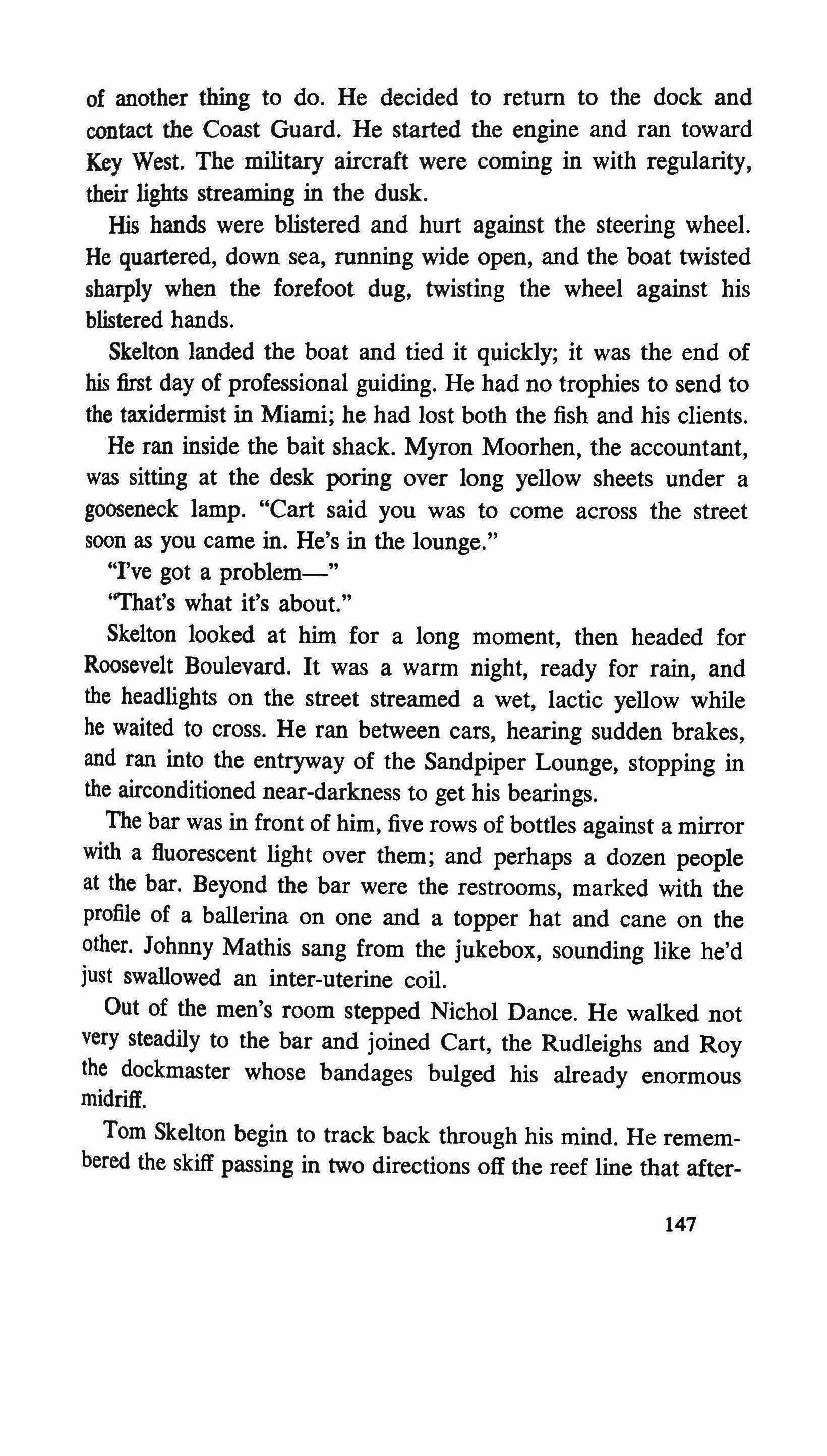
of another thing to do. He decided to return to the dock and contact the Coast Guard. He started the engine and ran toward Key West. The military aircraft were coming in with regularity, their lights streaming in the dusk.
His hands were blistered and hurt against the steering wheel. He quartered, down sea, running wide open, and the boat twisted sharply when the forefoot dug, twisting the wheel against his blistered hands.
Skelton landed the boat and tied it quickly; it was the end of his first day of professional guiding. He had no trophies to send to the taxidermist in Miami; he had lost both the fish and his clients.
He ran inside the bait shack. Myron Moorhen, the accountant, was sitting at the desk poring over long yellow sheets under a gooseneck lamp. "Cart said you was to come across the street soon as you came in. He's in the lounge."
"I've got a problem-" "That's what it's about."
Skelton looked at him for a long moment, then headed for Roosevelt Boulevard. It was a warm night, ready for rain, and the headlights on the street streamed a wet, lactic yellow while he waited to cross. He ran between cars, hearing sudden brakes, and ran into the entryway of the Sandpiper Lounge, stopping in the airconditioned near-darkness to get his bearings.
The bar was in front of him, five rows of bottles against a mirror with a fluorescent light over them; and perhaps a dozen people at the bar. Beyond the bar were the restrooms, marked with the profile of a ballerina on one and a topper hat and cane on the other. Johnny Mathis sang from the jukebox, sounding like he'd just swallowed an inter-uterine coil.
Out of the men's room stepped Nichol Dance. He walked not very steadily to the bar and joined Cart, the Rudleighs and Roy the dockmaster whose bandages bulged his already enormous midriff.
Tom Skelton begin to track back through his mind. He remembered the skiff passing in two directions off the reef line that after-
147
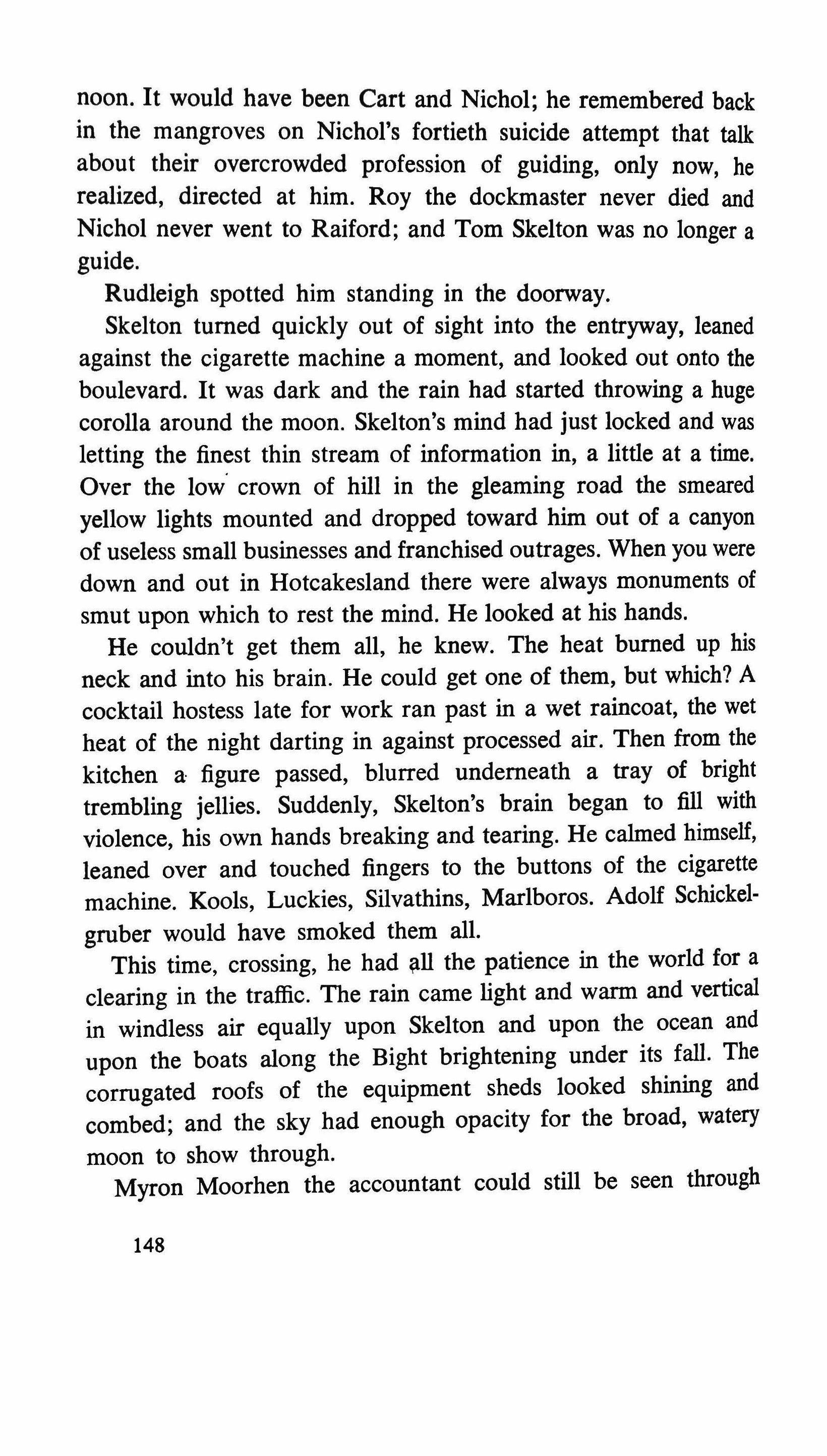
noon. It would have been Cart and Nichol; he remembered back in the mangroves on Nichol's fortieth suicide attempt that talk about their overcrowded profession of guiding, only now, he realized, directed at him. Roy the dockmaster never died and Nichol never went to Raiford; and Tom Skelton was no longer a guide.
Rudleigh
spotted him standing in the doorway.
Skelton turned quickly out of sight into the entryway, leaned against the cigarette machine a moment, and looked out onto the boulevard. It was dark and the rain had started throwing a huge corolla around the moon. Skelton's mind had just locked and was letting the finest thin stream of information in, a little at a time. Over the low' crown of hill in the gleaming road the smeared yellow lights mounted and dropped toward him out of a canyon of useless small businesses and franchised outrages. When you were down and out in Hotcakesland there were always monuments of smut upon which to rest the mind. He looked at his hands. He couldn't get them all, he knew. The heat burned up his neck and into his brain. He could get one of them, but which? A cocktail hostess late for work ran past in a wet raincoat, the wet heat of the night darting in against processed air. Then from the kitchen a figure passed, blurred underneath a tray of bright trembling jellies. Suddenly, Skelton's brain began to fill with violence, his own hands breaking and tearing. He calmed himself, leaned over and touched fingers to the buttons of the cigarette machine. Kools, Luckies, Silvathins, Marlboros. Adolf Schickelgruber would have smoked them all.
This time, crossing, he had all the patience in the world for a clearing in the traffic. The rain came light and warm and vertical in windless air equally upon Skelton and upon the ocean and upon the boats along the Bight brightening under its fall. The corrugated roofs of the equipment sheds looked shining and combed; and the sky had enough opacity for the broad, watery moon to show through.
Myron Moorhen the accountant could still be seen through
148
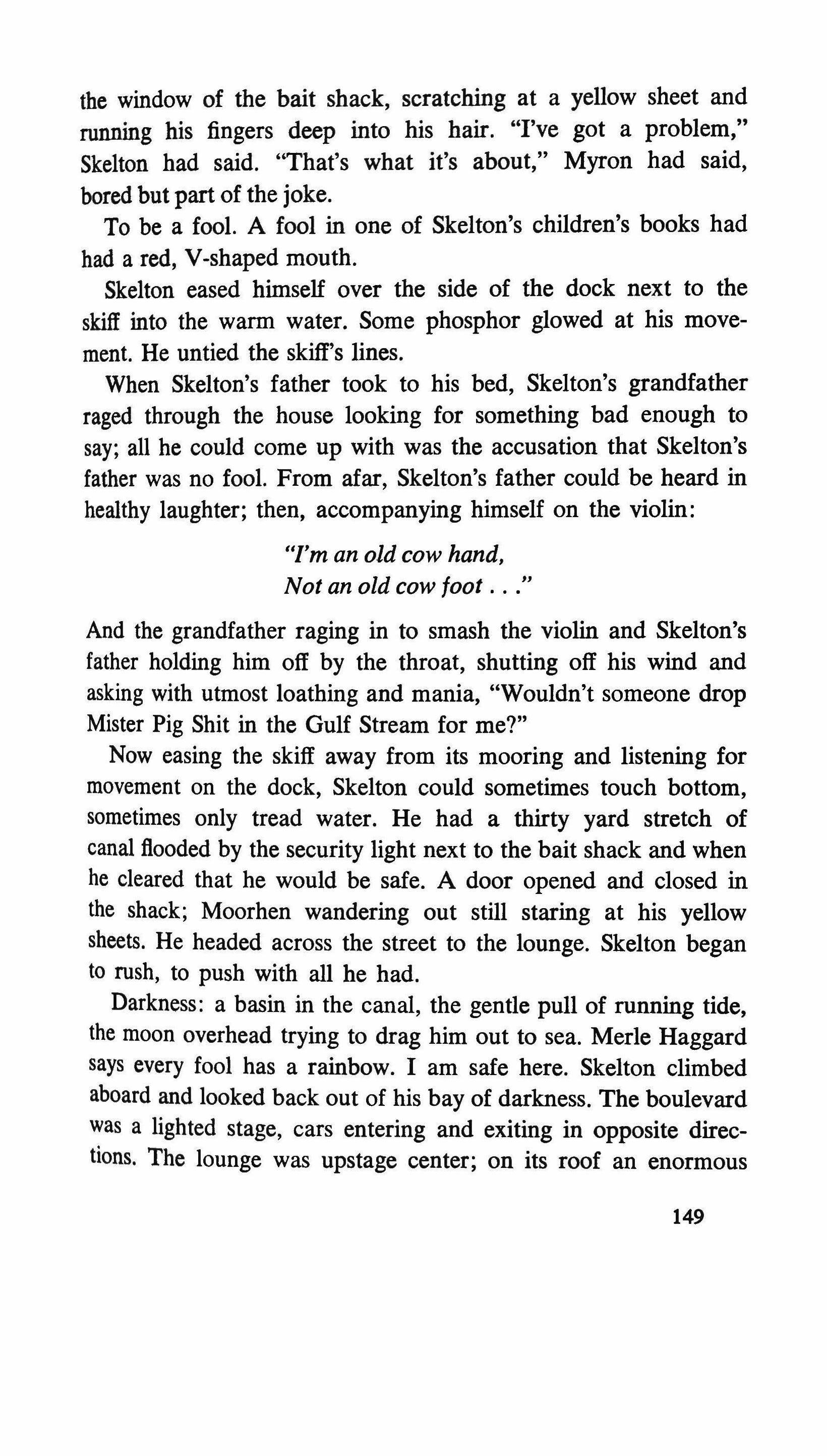
the window of the bait shack, scratching at a yellow sheet and running his fingers deep into his hair. "I've got a problem," Skelton had said. ''That's what it's about," Myron had said, bored but part of the joke.
To be a fool. A fool in one of Skelton's children's books had had a red, V-shaped mouth.
Skelton eased himself over the side of the dock next to the skiff into the warm water. Some phosphor glowed at his movement. He untied the skiff's lines.
When Skelton's father took to his bed, Skelton's grandfather raged through the house looking for something bad enough to say; all he could come up with was the accusation that Skelton's father was no fool. From afar, Skelton's father could be heard in healthy laughter; then, accompanying himself on the violin:
"I'm an old cow hand, Not an old cow foot
And the grandfather raging in to smash the violin and Skelton's father holding him off by the throat, shutting off his wind and asking with utmost loathing and mania, "Wouldn't someone drop Mister Pig Shit in the Gulf Stream for me?"
Now easing the skiff away from its mooring and listening for movement on the dock, Skelton could sometimes touch bottom, sometimes only tread water. He had a thirty yard stretch of canal flooded by the security light next to the bait shack and when he cleared that he would be safe. A door opened and closed in the shack; Moorhen wandering out still staring at his yellow sheets. He headed across the street to the lounge. Skelton began to rush, to push with all he had.
Darkness: a basin in the canal, the gentle pull of running tide, the moon overhead trying to drag him out to sea. Merle Haggard says every fool has a rainbow. I am safe here. Skelton climbed aboard and looked back out of his bay of darkness. The boulevard was a lighted stage, cars entering and exiting in opposite directions. The lounge was upstage center; on its roof an enormous
149

profile of a sandpiper, outlined in neon and ungodly in the mercury-vapor light from the street. Hotcakesland. It is all for sale, thought Skelton.
He pulled the fuel line out from under the gunwhale, and cut it; then rocked the boat so the surge in the tank would force fuel onto the deck. Gasoline was quickly everywhere.
Skelton sat down to rest and wait for all the gas to flow. He opened the small dunnage box by the controls and took out a book of matches that read, he strangely noticed, "Hands tied because you lack a highschool diploma?" and the rag with which he had wiped down the deck when he refueled the skiff.
Out of the lounge, pausing momentarily beneath the neon beak: of the sandpiper while traffic cleared, came the Rudleighs, Carter, Nichol Dance, Roy the dockmaster and Myron Moorhen the accountant. Skelton looked at them. A moment earlier they had streamed out of the land of frozen daiquiris, past a buffet table covered with molded fruit medleys, past the fifteen chromium selector levers of the cigarette machine and into the cloacal American night. Skelton on his lunar, fetid inshore tide did not for the moment belong to the nation; except in the sense that the two primal questions of citizenship, Will-l-be-caught? and Can-lget-away? dominated his mind entirely, only slightly modified by the Prime New World lunacy of getting from Point A to Point B. They were moving toward the dock, all facing forward rather than toward each other which was strange: the Rudleighs were customers and when you are around customers, you point your face at them. You are selling and they are buying.
Skelton was out of the skiff once more, matches in his mouth, oily rag in hand. He treaded water away from the skiff, keeping the rag high in the air; then he held himself in position, lit the balled up rag, tossed it into the boat.
Flame zigzagged up and down the boat's interior until the entire thing was afire. Low in the water and swimming through darkness toward the far side of the basin, Skelton could no longer see the five people crossing the street. Then suddenly they appeared on the dock. Carter and Dance boarded Carter's skiff and 150
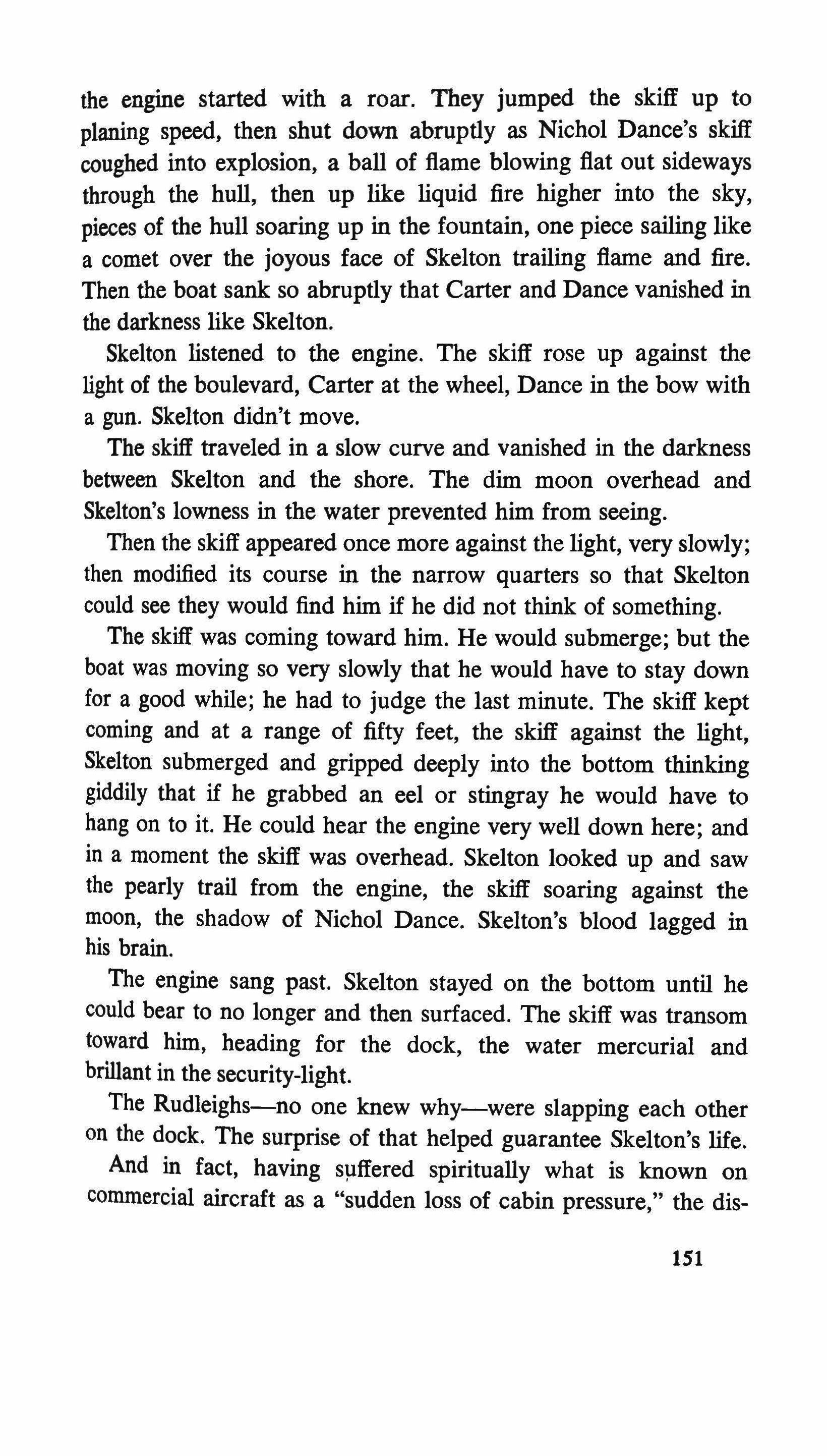
the engine started with a roar. They jumped the skiff up to planing speed, then shut down abruptly as Nichol Dance's skiff coughed into explosion, a ball of flame blowing flat out sideways through the hull, then up like liquid fire higher into the sky, pieces of the hull soaring up in the fountain, one piece sailing like a comet over the joyous face of Skelton trailing flame and fire. Then the boat sank so abruptly that Carter and Dance vanished in the darkness like Skelton.
Skelton listened to the engine. The skiff rose up against the light of the boulevard, Carter at the wheel, Dance in the bow with a gun. Skelton didn't move.
The skiff traveled in a slow curve and vanished in the darkness between Skelton and the shore. The dim moon overhead and Skelton's lowness in the water prevented him from seeing.
Then the skiff appeared once more against the light, very slowly; then modified its course in the narrow quarters so that Skelton could see they would find him if he did not think of something.
The skiff was coming toward him. He would submerge; but the boat was moving so very slowly that he would have to stay down for a good while; he had to judge the last minute. The skiff kept coming and at a range of fifty feet, the skiff against the light, Skelton submerged and gripped deeply into the bottom thinking giddily that if he grabbed an eel or stingray he would have to hang on to it. He could hear the engine very well down here; and in a moment the skiff was overhead. Skelton looked up and saw the pearly trail from the engine, the skiff soaring against the moon, the shadow of Nichol Dance. Skelton's blood lagged in his brain.
The engine sang past. Skelton stayed on the bottom until he could bear to no longer and then surfaced. The skiff was transom toward him, heading for the dock, the water mercurial and brillant in the security-light.
The Rudleighs-no one knew why-were slapping each other on the dock. The surprise of that helped guarantee Skelton's life. And in fact, having suffered spiritually what is known on commercial aircraft as a "sudden loss of cabin pressure," the dis-
151

covery of this bit of pointless nonsense was like the dropping of the emergency oxygen mask into his lap. And he convinced himself that he was safe, forever, really.
Thomas Skelton, whose aim had been to be a practicing Christian, was now a little gone in the faith. But, he thought, no matter, and took some comfort to remember the gospel according to St. Matthew: Whosoever shall say, Thou fool, shall be in danger of hell fire. Upon occasion, a man had to manufacture his own hell fire, either for himself or others: as one kind of home brew for the spirit's extremer voyages.
When Skelton's grandfather most kindly bailed him out and Skelton had returned Jakey Robert's copy of Swank to him and turned down his grandfather's doubtlessly well meant suggestion that they talk and gone home to his fuselage, his private stock of hell fire began to rise as volatile as rubbing spirits from the surfaces of his life.
Thou fool.
The odds and ends that lay around the interior of the fuselage, formerly in a skein of intimate connections that did not exclude himself, all began to separate amid cool segments of space. He felt the precise bevel at whichhis teeth rested against each other; and his hands lay in his lap within an invisible display case.
Hold on now, he told himself, no barking. For two hours he managed the control he needed, sitting as quietly at his breakfast table as a gyroscope. And then slowly, the tramp of drilling winos came through his leafy window; and he wept with gratitude. When he had finished that, the salt and pepper shakers had rejoined themselves to the table; the skein of connections returned and his hands sweated in one another's grasp.
He stepped outside, out to his garden fence, into the heart of the uproar. Standing by the hedge of uncleared vegetation, oleander cresting up out of it around one scrawny but wildly productive lime tree, he was point blank to the musty marchers. lurching from left to right, while the drill sergeant marched ahead of them but backwards, surveying their primitive efforts with
152
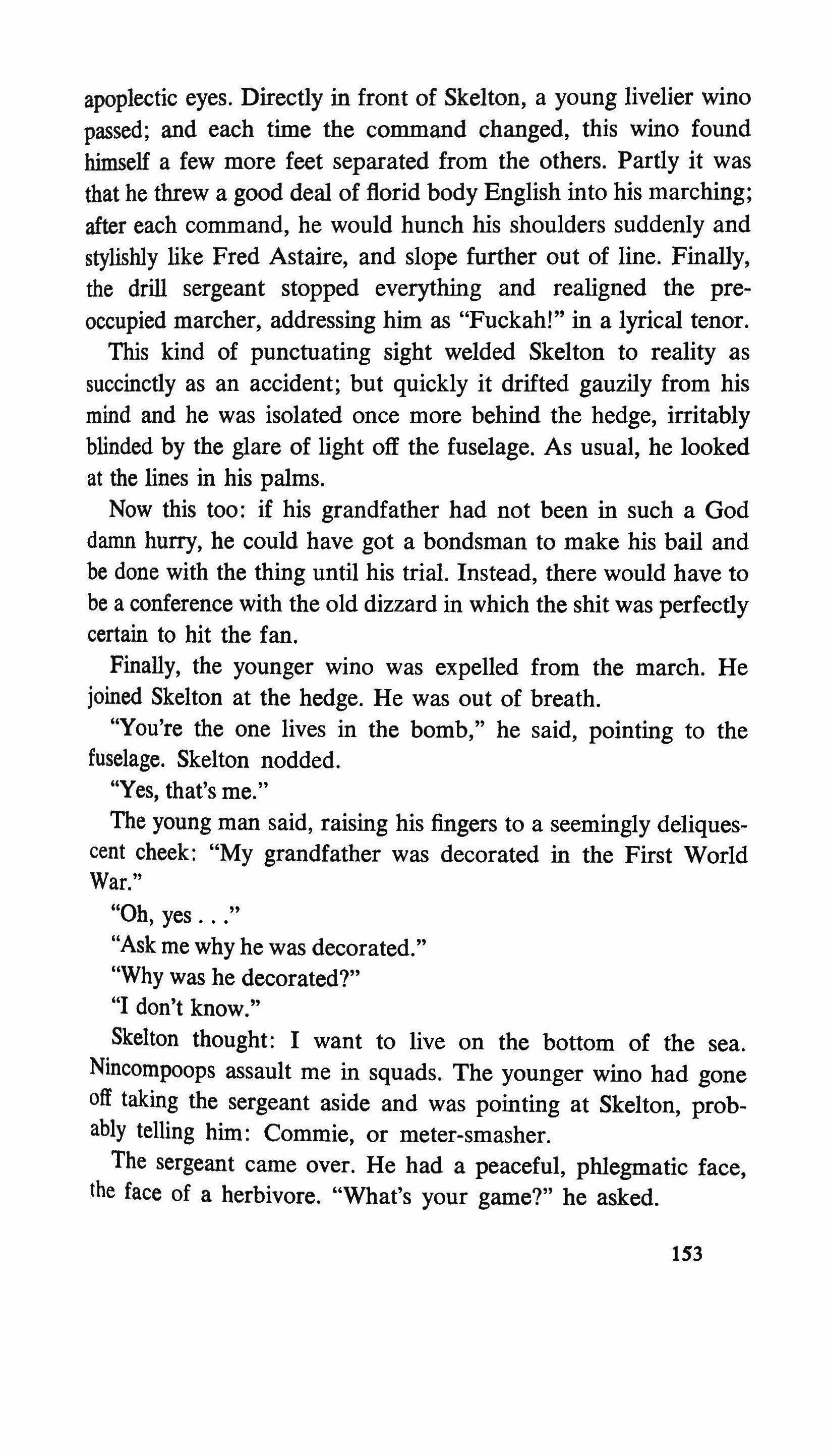
apoplectic eyes. Directly in front of Skelton, a young livelier wino passed; and each time the command changed, this wino found himself a few more feet separated from the others. Partly it was that he threw a good deal of florid body English into his marching; after each command, he would hunch his shoulders suddenly and stylishly like Fred Astaire, and slope further out of line. Finally, the drill sergeant stopped everything and realigned the preoccupied marcher, addressing him as "Fuckah!" in a lyrical tenor.
This kind of punctuating sight welded Skelton to reality as succinctly as an accident; but quickly it drifted gauzily from his mind and he was isolated once more behind the hedge, irritably blinded by the glare of light off the fuselage. As usual, he looked at the lines in his palms.
Now this too: if his grandfather had not been in such a God damn hurry, he could have got a bondsman to make his bail and be done with the thing until his trial. Instead, there would have to be a conference with the old dizzard in which the shit was perfectly certain to hit the fan.
Finally, the younger wino was expelled from the march. He joined Skelton at the hedge. He was out of breath.
"You're the one lives in the bomb," he said, pointing to the fuselage. Skelton nodded.
"Yes, that's me."
The young man said, raising his fingers to a seemingly deliquescent cheek: "My grandfather was decorated in the First World War."
"Oh, yes
"Ask me why he was decorated."
"Why was he decorated?"
"I don't know."
Skelton thought: I want to live on the bottom of the sea. Nincompoops assault me in squads. The younger wino had gone off taking the sergeant aside and was pointing at Skelton, probably telling him: Commie, or meter-smasher.
The sergeant came over. He had a peaceful, phlegmatic face, the face of a herbivore. "What's your game?" he asked.
IS3

"I'm a moonshiner."
"Well, more power to you. We're running a little works of our own up in the joint there. I made the coil myself. Last batch I run off kicked the hydrometer out on the floor. It was like rocket fuel."
"I'd like to try it."
"I'd offer you a drop, but these useless mothers over here have went through it quick as snot on a bottle."
Skelton looked over at the useless mothers. They were milling among fallen palm leaves, quite as lost as babies.
Well, thought Skelton, life looked straight in the eye was insupportable, as everyone knew by instinct. The great trick, contrary to the consensus of philosophy, is to avoid looking it straight in the eye. Everything askance and it all shines on.
But in general he felt recovered or, in any event, at rest in a reasonably cool aftermath. He went inside to take out the trash, adding everything conceivably trash to the contents of the galvanized barrel, including a painting the Dayglo Dago had given him on Simonton Street, depicting a tall Thermos bottle standing in a field of breath mints. This same artist had done a series of "contemporary" portraits of historical figures. Kafka as remittance man. Van Gogh clipping coupons by the sea. Dostoevsky with a four foot string of credit cards. San Juan de la Cruz peering out of a condominium as though room-service had used cheap Triple Sec in his Margarita. And so on to the last alcove in the Leo Castelli gallery. Into the shitcan with everything that was ironic for the fun of it.
Carter and Dance are in the bait shack and have told Myron Moorhen the lickspittle accountant to haul ass and give them the desk. They take one of his yellow legal sheets out and try to figure some way of salvaging Dance's winter guiding. schedule even though he is no longer the owner of a guide boat. First they determine how long it will take to have a new skiff built up, how long the insurance will take to settle on the old one; as against the number of days that Carter is not booked and Dance
154

is-so that Dance can use his skiff. "There will have to be a small usage charge," says Carter.
"Naturally, man."
"Lemme tote this here up now." He ran his fingernail up and down the columns of numbers.
"What do you come up with."
"You look."
"Hm."
"Don't look good."
"Sure don't. It looks sorta rank."
"How're you fixed now, Nichol."
Dance looked at him. "How'm 1 fixed."
"That's what 1 asked."
"Cart, if turkeys was goin for one cent a pound 1 couldn't buy a raffle ticket on a jaybird's ass."
"Haw haw hawmmm."
"If ten cent'd buy a tuxedo for a elerfunt, 1 couldn't buy a T-shirt for a flea."
"Heeheehee. Okay now. Let's uhm seriously now
Anyone else could have seen that Carter didn't care about these jokes; and in his strenuous laughter for the benefit of a man who had learned or stolen everything he knew, and now wanted the use of his skiff, there was the very faintest yet palpable hint of the craven.
"Are you going to get around to doing something about that boy?" Carter asked; he liked Skelton well enough but now by Christ things were getting to be an inconvenience.
"It's in the hands of the law," said Dance. "I mean not that 1 didn't give some thought to shooting him. But since 1 failed to shoot myself that day, I've kinda had a loss of innerest in shooting anything else."
"Heeheeheemmmm. "
"I might could take a notion though. If this brand of irritation runs on, I mean. He wasn't a bad kind of a kid."
"He wanted to guide."
"I know, I know."
ISS
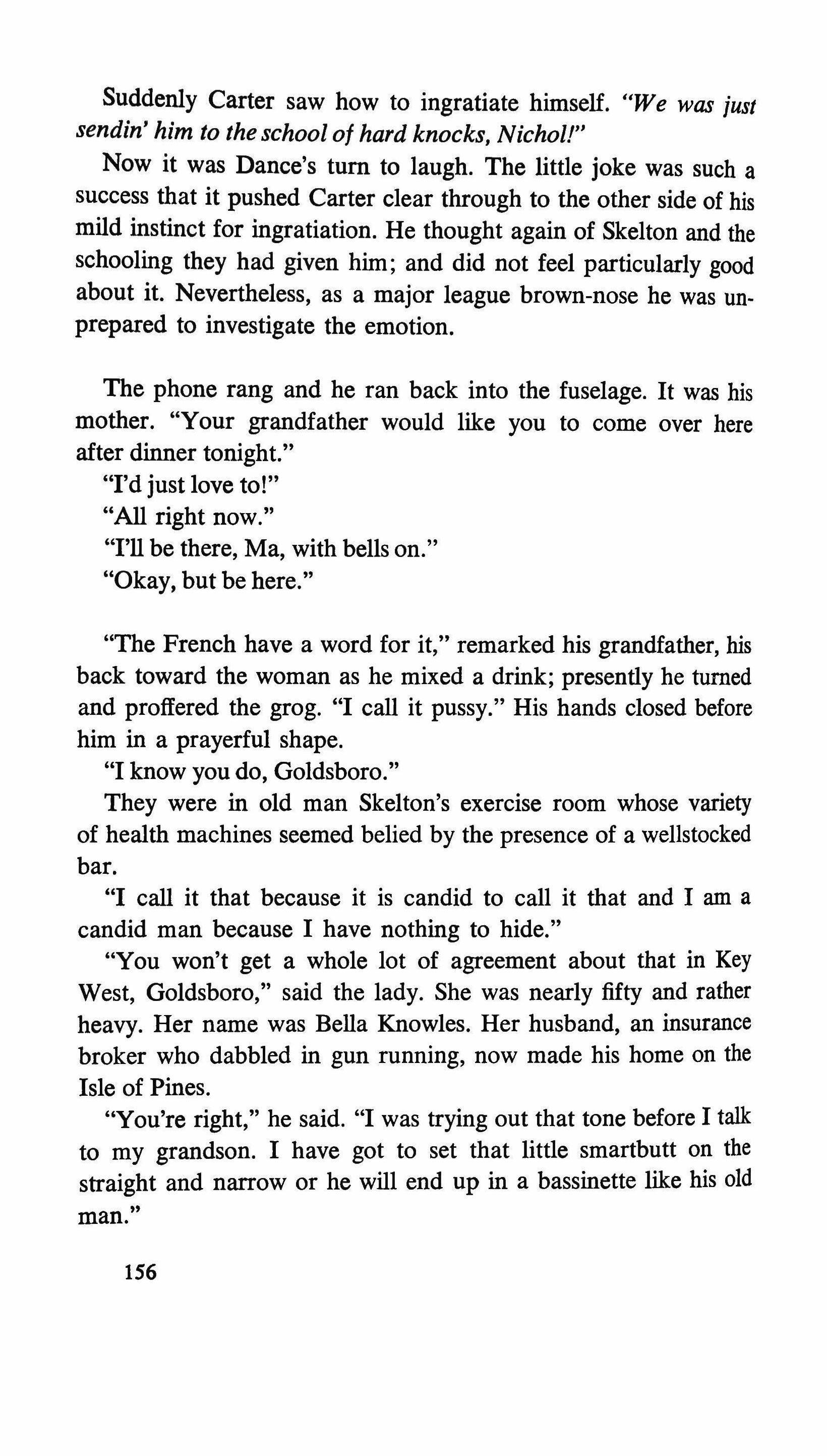
Suddenly Carter saw how to ingratiate himself. "We was just sendin' him to the school of hard knocks, Nicholl"
Now it was Dance's tum to laugh. The little joke was such a success that it pushed Carter clear through to the other side of his mild instinct for ingratiation. He thought again of Skelton and the schooling they had given him; and did not feel particularly good about it. Nevertheless, as a major league brown-nose he was unprepared to investigate the emotion.
The phone rang and he ran back into the fuselage. It was his mother. "Your grandfather would like you to come over here after dinner tonight."
"I'd just love to!"
"All right now."
"I'll be there, Ma, with bells on."
"Okay, but be here."
"The French have a word for it," remarked his grandfather, his back toward the woman as he mixed a drink; presently he turned and proffered the grog. "I call it pussy." His hands closed before him in a prayerful shape.
"I know you do, Goldsboro."
They were in old man Skelton's exercise room whose variety of health machines seemed belied by the presence of a wellstocked bar.
"I call it that because it is candid to call it that and I am a candid man because I have nothing to hide."
"You won't get a whole lot of agreement about that in Key West, Goldsboro," said the lady. She was nearly fifty and rather heavy. Her name was Bella Knowles. Her husband, an insurance broker who dabbled in gun running, now made his home on the Isle of Pines.
"You're right," he said. "I was trying out that tone before I talk to my grandson. 1 have got to set that little smartbutt on the straight and narrow or he will end up in a bassinette like his old man." 156

"You should have let him go to jail rather than hang out with charterboat fishermen."
"Hurry up with your drink. I'm fixing to carry on." He sat on the edge of the trampoline that dominated the room. The light from high, opaque windows flooded into the little gym.
"111 sip as long as I please."
"Long as you sip fast!"
"You're talking to a lady and the only one you'll ever get." Goldsboro Skelton rolled the medicine ball off the tremulous surface of the trampoline; it slumped to the floor without rolling, like a Republican administration.
"Well
The strange couple--the etiolated, successful crook and the rounded helpmeet of an imprisoned gun runner-undressed without ceremony, the rickety and the ample functioning in curious counterpart as they bent to slide off socks.
Playfully, Goldsboro Skelton, Cuban bulletholes still dimpling his hind end, mounted the trampoline and began to hop around, veinous fists clenched next to his ears in simple heroics. Now he was making some fairly impressive leaps, not ignored by Bella Knowles. Then she joined him.
At first they bounced in an irregular pattern, Skelton going up at the moment Bella touched down. They weren't very high leaps but from their perspective, which began forming not long after the turn of the century, the leaps were bounds. And it was quite plain that Bella was deeply moved by Goldsboro's impressive soaring and ready for the pounce, here and now.
They stopped for a moment toe to toe and fiddled with one another; and then began to bounce again, this time in the same rhythm. As they each looked at the leaping and speeding against the far wall, Goldsboro Skelton was an arrow of capability to Bella Knowles, pinksurge of desire.
Beneath them, the black iron perimeter of the trampoline enlarged and contracted with their bounds. The thousands of springs that held its canvas surface squeaked like lemmings, unlubed harquebus locks or thole pins. 157
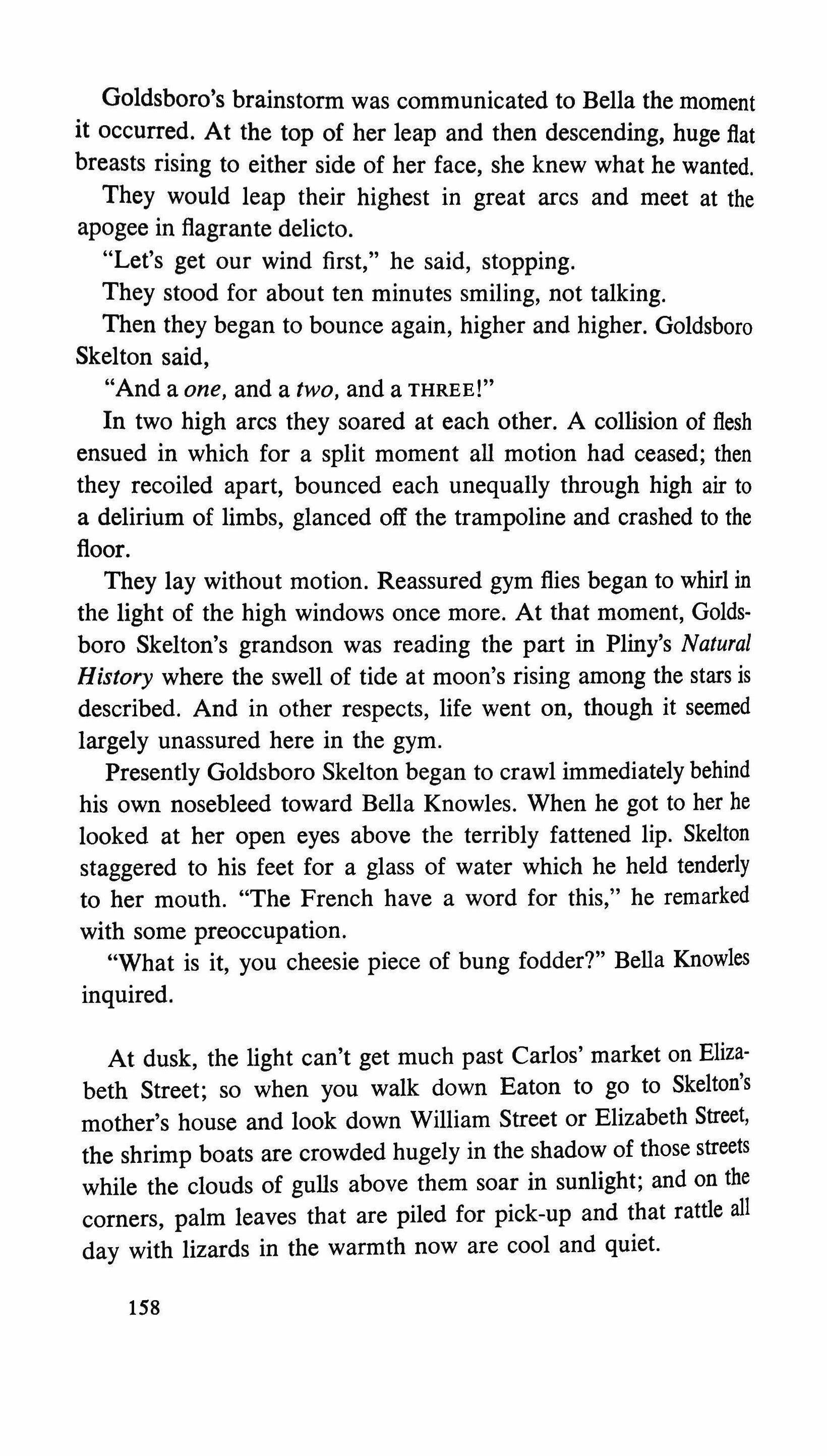
Goldsboro's brainstorm was communicated to Bella the moment it occurred. At the top of her leap and then descending, huge flat breasts rising to either side of her face, she knew what he wanted. They would leap their highest in great arcs and meet at the apogee in flagrante delicto.
"Let's get our wind first," he said, stopping. They stood for about ten minutes smiling, not talking. Then they began to bounce again, higher and higher. Goldsboro Skelton said,
"And a one, and a two, and a THREE!"
In two high arcs they soared at each other. A collision of flesh ensued in which for a split moment all motion had ceased; then they recoiled apart, bounced each unequally through high air to a delirium of limbs, glanced off the trampoline and crashed to the floor.
They lay without motion. Reassured gym flies began to whirl in the light of the high windows once more. At that moment, Goldsboro Skelton's grandson was reading the part in Pliny's Natural History where the swell of tide at moon's rising among the stars is described. And in other respects, life went on, though it seemed largely unassured here in the gym.
Presently Goldsboro Skelton began to crawl immediately behind his own nosebleed toward Bella Knowles. When he got to her he looked at her open eyes above the terribly fattened lip. Skelton staggered to his feet for a glass of water which he held tenderly to her mouth. "The French have a word for this," he remarked with some preoccupation.
"What is it, you cheesie piece of bung fodder?" Bella Knowles inquired.
At dusk, the light can't get much past Carlos' market on Elizabeth Street; so when you walk down Eaton to go to Skelton's mother's house and look down William Street or Elizabeth Street, the shrimp boats are crowded hugely in the shadow of those streets while the clouds of gulls above them soar in sunlight; and on the corners, palm leaves that are piled for pick-up and that rattle all day with lizards in the warmth now are cool and quiet.
158

When you pass the comer of Simonton, the mail trucks are backed up to bays that are closed with corrugated doors; and at least one boy is doing a figure eight in the quiet parking lot on his bicycle; and the glass and iron pineapples on the gate at the Carriage Trade look like scarabs bound in old silver.
Duval Street, crowded and Latin all day, now seems filled with space and breeze, serenely modified by a taxicab spinning along in golden light; and the ticket seller at the dirty movie house graciously promises the drill sergeant "no less than twenty fuck scenes." From a boat, Key West will have seemed to have shrunk once more into the sea. And the few boats that have gone out to night-drift for tarpon in the channels carry their red and green running lights through the blackness sweetly.
Dinner would still be transpiring at his parents' house, borne upon crazy accusations by his grandfather and Dada rebuttals by his father; his mother taking a view not less than Olympian of this particular, by now ancient, squabble.
So Skelton slipped into the garage and got his fishing rod, walked half a block to the corner of Front Street to the Dos Amigos bar, had a single bourbon and water, shot one maladroit game of eight-ball with a counterrevolutionary Cuban shrimper who claimed to be able to navigate from here to the North Coast of Haiti without chart or sounding because "I am a Key West Captain"; then took up his rod and crossed Front Street at last light and walked down to the pocket beach that lay between the fabric factory and Tony's restaurant.
It was dark and warm as summer and tarpon were assailing bait under the restaurant lights; there were maybe a couple of dozen fish striking the lit-up water and shrimp were clearing the water completely and kicking out into the darkness.
Directly above the fish, on the comer of a balustrade, a man in a white dinner jacket was pressing at a girl in a gown, hauling her against the iron balcony, mashing into her with his face and holding his cocktail perfectly balanced out over the ocean without looking at it.
"Natalie," he said. "Gordon." Skelton climbed out onto the transom of a half-
159

beached skiff and chopped a cast right into the working bait from his lair in the darkness. He made one strip and came up tight on a tarpon. The heavy fish just held its own a moment trying to think: what had happened; then it vaulted high and terrific into the light, right up clear to where its gills rattled alongside the balustrade.
Why, Gordon spun; and Natalie dropped her jaw. Gordon glanced ornery into his empty glass, looked at Skelton's line trailing into the darkness and led "Nat" to an empty table inside, his moment quite gone.
Skelton cupped the reel handles, broke the fish off, reeled up; and headed for the house feeling an exquisite synthesis of spirit and place.
He was a little slow in getting underway for his mother's house; his grandfather would possibly be there with his secretary Bella Knowles rotating her wry, discerning face and the spit curls that had adorned her temples for nearly forty years. Skelton wondered how many gallons of saliva that must have required.
He walked in through the gate without knocking. At the end of the porch, he could see his grandfather without his secretary eating in the lighted breakfast room. His father was on the porch, beneath his netting, with the television shoved under one end. He pulled up an iron chair and sat next to his father who, in a moment, glanced at Skelton and said, "Green Bay missed the extra point." A few minutes later, he leaned forward and turned down the sound. "Green Bay has got great flankers," he told his son. "But Jesus, Macarthur Lane is some running back. He's got these lateral moves right at the line of scrimmage that don't seem physically possible. Watch now: this close to the end zone, the line backers will be keying off the running-backs
"Well, I've heard the story about your adventure in guiding. Is it true?"
"What?"
"That you destroyed a man's skiff."
"Completely.
He thought with some admiration that it had been a well organized bit of cruelty. The touch of authenticity had been 160

Nichol Dance's story of Charlie Starkweather, whom Skelton remembered as a kind of anachronistic drygulch artist running through the West, who got wired to a Nebraska utility outlet in a metal chair by officials of the republic. Restaurants darkened and Starkweather went off like a flashbulb at Trish's wedding. It reduced his bulk through vaporization. He no longer fitted the electrical collar. They found him in the goodbye room like a windtom 1890 umbrella. A year later he might have grown Virginia Creeper like a grape stake. After each electrocution, the officials of the republic get together for a real down home Christian burial out of that indomitable American conviction that even God likes fried food.
"I didn't know you had this proclivity for violence," said his father as humor.
"I don't."
"Had you been emotionally forced into it?"
"More or less."
"Are you going to admit it?"
"No. I'm not going to pay for it either."
"I can't imagine this happening among scientists."
"I'm not a scientist and I'm not going to be one. It takes all the brains I've got to figure out where gamefish keep themselves."
"The only thing I've had to notice is that you never got into these crossfires until you started reading French poets. And when your grandfather offered to bail you out, you didn't make yourself very plausible to him by asking him to bring your Apollinaire instead."
"Well, he didn't know what I was talking about. Jakey Roberts gave me his copy of Swank and I read a short history of Spanishfly instead of Le Heresiarche et de."
"Those frog lunatics have produced a generation of destructive addlepates to which I fear you appending yourself. Though I'd prefer it to your fiddling with dope, it's a narrow choice."
The two men laughed; possibly close to tears. Skelton peeled up one end of the netting and twisted it over the corner of the frame. "That's not true." He could look at his father. 161

"What's not?" his father asked.
"About Apollinaire and the others."
"Don't you think?"
"I'd say Nietzsche produced more addlepates."
"What about Gurdjieff and Ouspensky?"
"What about Kahlil Gibran?"
"What about Tex Ritter?" And so on through Father Coughlan, Darius Milhaud, Stockhausen, Donald Duck, Baba Ram Das, a certain Burgomeister in a Milwaukee beer ad, guitarfops from the hideous 1960s, Thomas Edison-and more laughter. Then, mock serious, his father took up his violin and played the opening of Corrinne Corrina hillbilly style and beautiful. Skelton lit a powdery Dutch cigar and listened in a swoon to those sad clodhopper strains, dying day, newspaper boys yelling faintly as they filled their baskets; a swoon that was as much as anything a part of his more than trifling instinct for some kind of topographical perspective upon his own life as against a vision of cycling chemicals in a closed system that somehow never explained the attrition of the things that ail you.
He could hear the quarterback now calling signals in the new style, "Blue! Right! Get back! Eighty! Red!" Snap. The play was underway. The quarterback rolled out in a fake draw.
Skelton's grandfather stepped onto the porch in a fog of cooking smells; and looked across at the two of them talking with an air of reconnaissance. He made a minute adjustment of his shoulders before coming over.
"What happened to your nose, Gramp?" Skelton asked. His Grandfather raised fingers to the swollen bridge.
"Damn trunk lid on my Coupe de Ville popped up and got my beezer."
A hand reached out of the bed, tugged the mosquito netting free and drew it down over the opening. A moment later, they heard the television; Green Bay had the ball on their own forty nine. 162

"Guess who I just had a drink with," said the grandfather to Skelton.
"Can't."
''Nichol Dance."
"Ah, the tete-a-tete Key West style."
"Now I had had a look into that boy's insurance situation and learned he wasn't going to be out a dime. So, I told him if he wanted you in court I would see him in hell first but I would at least run him clean out of Monroe County on a rail. I asked him I said, 'Mister Dance, are you a gambler?' And he said no he was not and so I told him, 'Mister Dance, let the insurance company handle your woes.' I had backed myself up with a transcript of his criminal record. I suppose you know he is vicious."
"I guess I did."
"Anyway, he is a lively boy with a mean streak in him. But he listens to reason. He's part of the community and so he'll have to do like I told him."
"Do you want a chair?"
"No. Now what were you doing with his boat?"
"Guiding. "
"You haven't dropped that yet."
"Not going to."
"Why don't you have your own boat?"
"No money."
"How much would one cost?"
"About four grand if you have it built and powered right."
"You want me to stake you?"
"Sure."
"How would you pay me back?"
"Out of my guiding fees."
"I'd doubt that except Dance told me you'd make a great skiff guide. And I suppose he'd be the last to admit it. I guess you're on."
"Are you serious?"
The question was rhetorical. When Skelton's grandfather meant
163
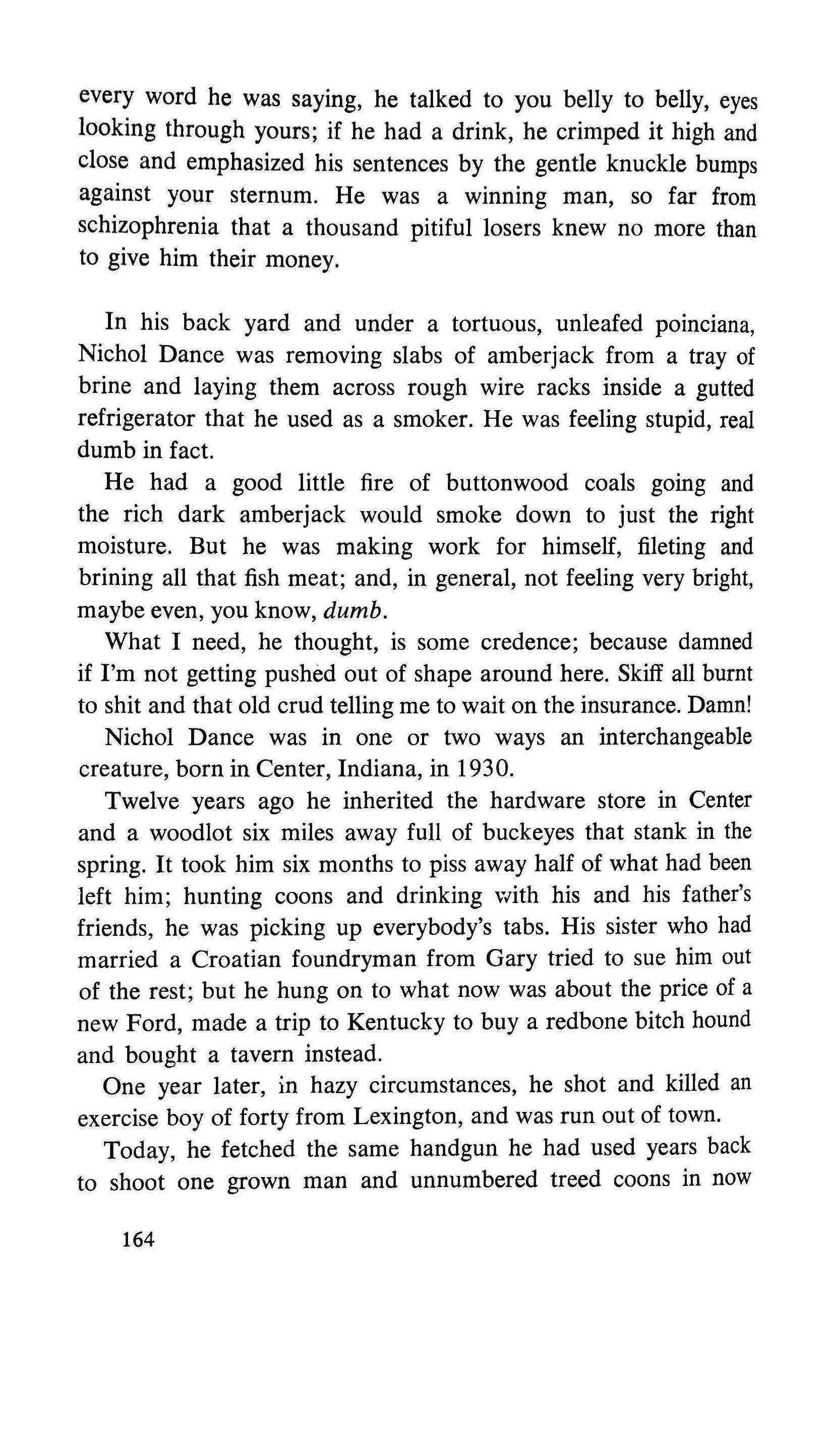
every word he was saying, he talked to you belly to belly, eyes looking through yours; if he had a drink, he crimped it high and close and emphasized his sentences by the gentle knuckle bumps against your sternum. He was a winning man, so far from schizophrenia that a thousand pitiful losers knew no more than to give him their money.
In his back yard and under a tortuous, unleafed poinciana, Nichol Dance was removing slabs of amberjack from a tray of brine and laying them across rough wire racks inside a gutted refrigerator that he used as a smoker. He was feeling stupid, real dumb in fact.
He had a good little fire of buttonwood coals going and the rich dark amberjack would smoke down to just the right moisture. But he was making work for himself, fileting and brining all that fish meat; and, in general, not feeling very bright, maybe even, you know, dumb.
What I need, he thought, is some credence; because damned if I'm not getting pushed out of shape around here. Skiff all burnt to shit and that old crud telling me to wait on the insurance. Damn! Nichol Dance was in one or two ways an interchangeable creature, born in Center, Indiana, in 1930.
Twelve years ago he inherited the hardware store in Center and a woodlot six miles away full of buckeyes that stank in the spring. It took him six months to piss away half of what had been left him; hunting coons and drinking with his and his father's friends, he was picking up everybody's tabs. His sister who had married a Croatian foundryman from Gary tried to sue him out of the rest; but he hung on to what now was about the price of a new Ford, made a trip to Kentucky to buy a redbone bitch hound and bought a tavern instead.
One year later, in hazy circumstances, he shot and killed an exercise boy of forty from Lexington, and was run out of town.
Today, he fetched the same handgun he had used years back to shoot one grown man and unnumbered treed coons in now
164
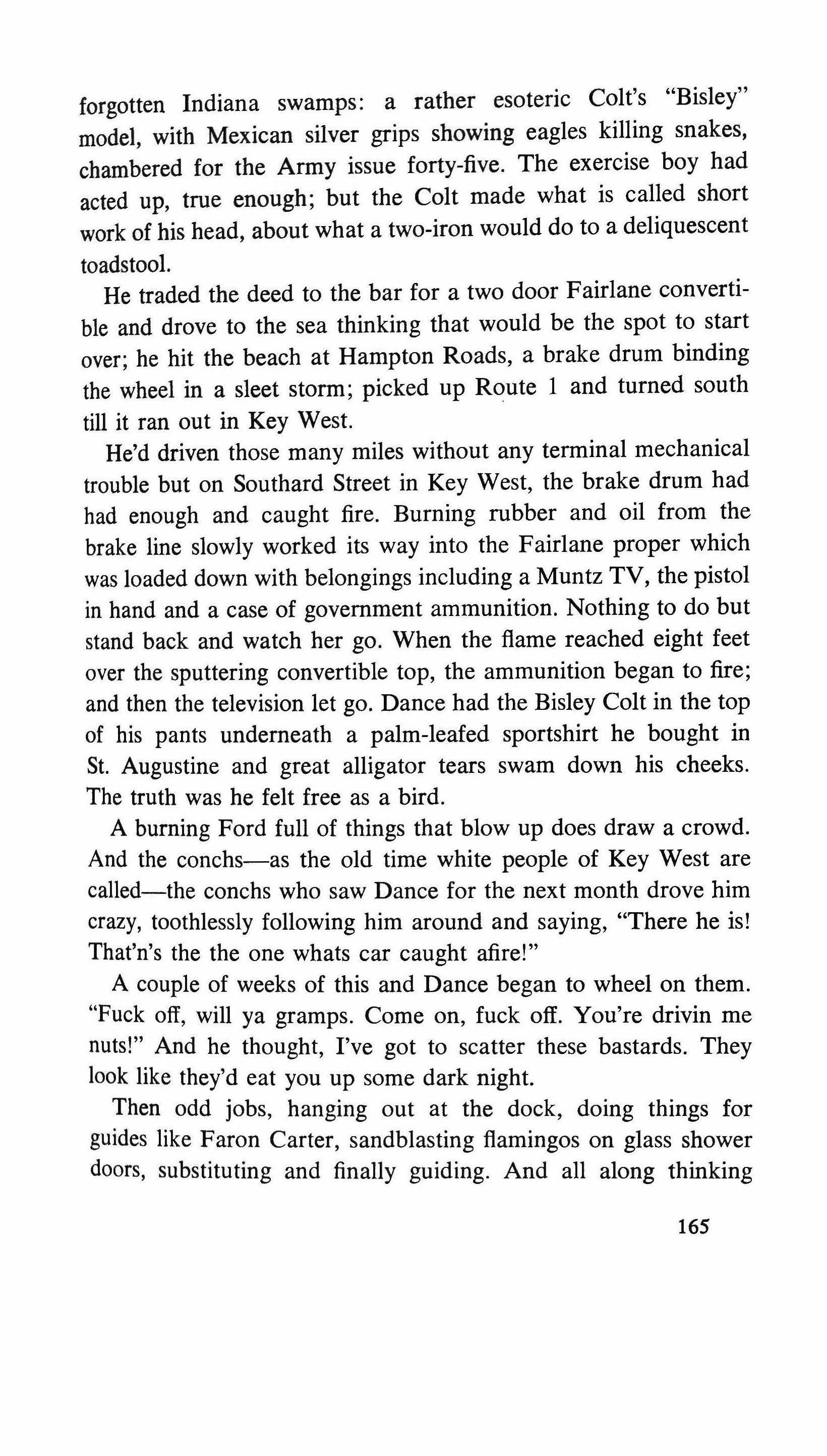
forgotten Indiana swamps: a rather esoteric Colt's "Bisley" model, with Mexican silver grips showing eagles killing snakes, chambered for the Army issue forty-five. The exercise boy had acted up, true enough; but the Colt made what is called short work of his head, about what a two-iron would do to a deliquescent toadstool.
He traded the deed to the bar for a two door Fairlane convertible and drove to the sea thinking that would be the spot to start over; he hit the beach at Hampton Roads, a brake drum binding the wheel in a sleet storm; picked up Route 1 and turned south till it ran out in Key West.
He'd driven those many miles without any terminal mechanical trouble but on Southard Street in Key West, the brake drum had had enough and caught fire. Burning rubber and oil from the brake line slowly worked its way into the Fairlane proper which was loaded down with belongings including a Muntz TV, the pistol in hand and a case of government ammunition. Nothing to do but stand back and watch her go. When the flame reached eight feet over the sputtering convertible top, the ammunition began to fire; and then the television let go. Dance had the Bisley Colt in the top of his pants underneath a palm-leafed sportshirt he bought in St. Augustine and great alligator tears swam down his cheeks. The truth was he felt free as a bird.
A burning Ford full of things that blow up does draw a crowd. And the conchs-as the old time white people of Key West are called-the conchs who saw Dance for the next month drove him crazy, toothlessly following him around and saying, "There he is! That'n's the the one whats car caught afire!"
A couple of weeks of this and Dance began to wheel on them. "Puck off, will ya gramps. Come on, fuck off. You're drivin me nuts!" And he thought, I've got to scatter these bastards. They look like they'd eat you up some dark night. Then odd jobs, hanging out at the dock, doing things for guides like Faron Carter, sandblasting flamingos on glass shower doors, substituting and finally guiding. And all along thinking
165

about that damn exercise boy, once every year or so nearly getting to the point about that exercise boy that he nearly gave himself the same as he gave him, as a matter of restitution.
Then, a fifty seven day bad marriage to a Catholic from Chokoloskee that ended in the court reconciling everything he had acquired but a skiff and it all went off in a Bekins moving van with the wife up front by the driver, headed for the Everglades. And drinking of the kind that is a throwing of yourself against the threshold of suicide though lacking that final will to your own ceasing, without which all the hemlock and Colt's patented revolvers are of no more avail than ringside tickets, photostats of lost deeds, or snapshots of Granddad's five bottom plough.
And now work to do, bad but necessary work to do based on his and Carter's dismal, yet he saw that now, dismal and stupid joke that he as well as anybody else knew was so steeped in lockerroom fatuity that when it backfired and his boat went up in flames, he and Cart, unable to escape the joke, had instead to hunt all over that canal, pistol in hand, tumid with their own shared rage, vacant as any emotion based in property.
But Dance was convinced that there was a necessity independent of what was right. Sometimes you did a wrong thing and had to follow through. If some crazy is trying to waste your ass, there isn't a lot of sense trying to see things from his point of view. You waste him back. He wished he hadn't set Skelton up like he had; but it was done and now he had to follow through.
So, the pistol was slipped into the front of his pants, butt to the right, and a short sleeved shirt (blue porpoises on a white background) outside his trousers concealed it all. Naturally, the pistol was uncomfortable; but it was credence and collateral in the most liquid form he knew. It answered the problem of what came in handy when you had to follow through.
He stopped on the way out and looked at himself in the oval hall window. "What's happening to this boy?" he wondered.
Sometimes, he thought, you just wander around not feeling very smart and your clothes aren't sharp and your car is a loser
166
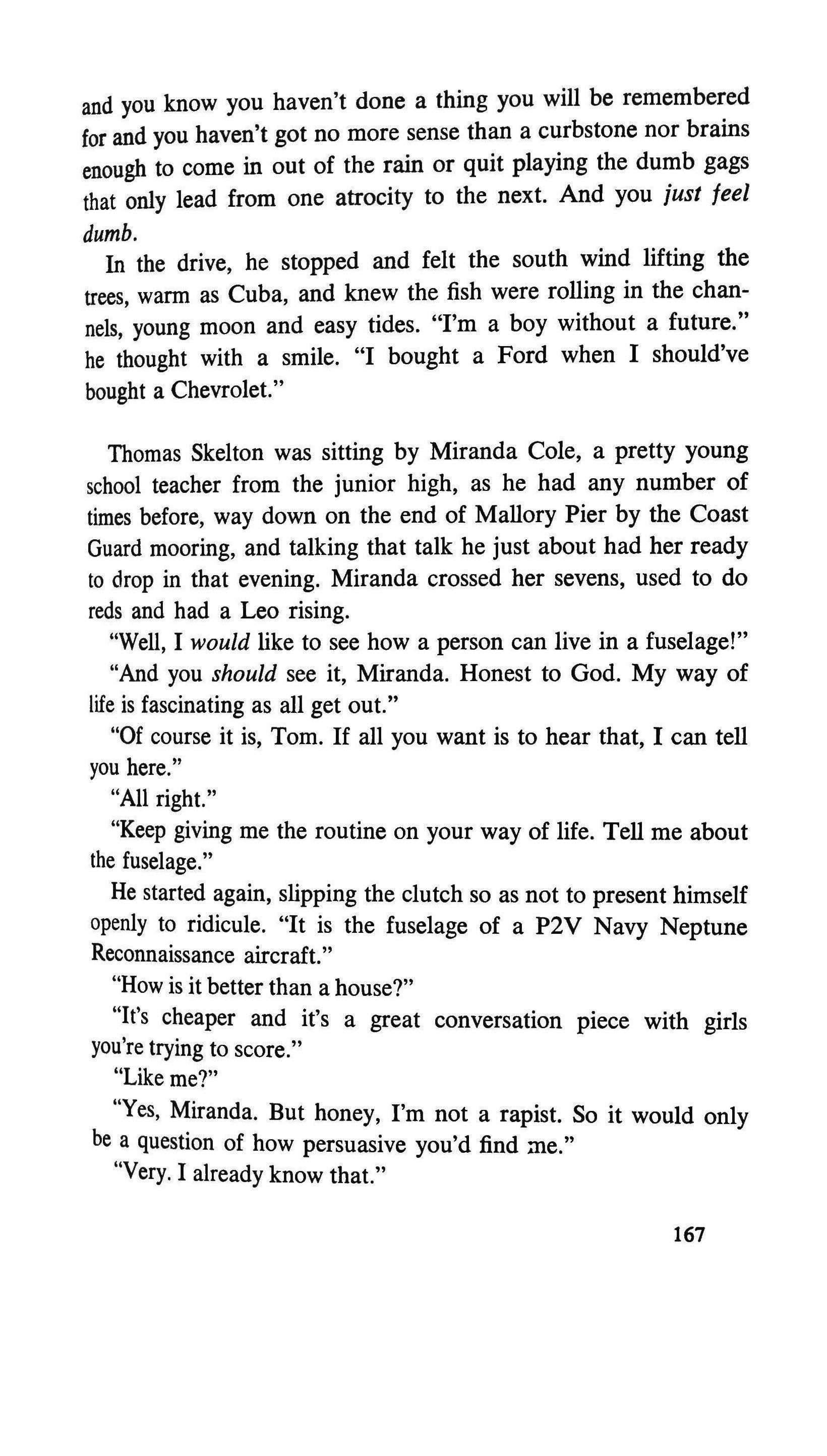
and you know you haven't done a thing you will be remembered for and you haven't got no more sense than a curbstone nor brains enough to come in out of the rain or quit playing the dumb gags that only lead from one atrocity to the next. And you just feel dumb.
In the drive, he stopped and felt the south wind lifting the trees, warm as Cuba, and knew the fish were rolling in the channels, young moon and easy tides. "I'm a boy without a future." he thought with a smile. "I bought a Ford when I should've bought a Chevrolet."
Thomas Skelton was sitting by Miranda Cole, a pretty young school teacher from the junior high, as he had any number of times before, way down on the end of Mallory Pier by the Coast Guard mooring, and talking that talk he just about had her ready to drop in that evening. Miranda crossed her sevens, used to do reds and had a Leo rising.
"Well, I would like to see how a person can live in a fuselage!"
"And you should see it, Miranda. Honest to God. My way of life is fascinating as all get out."
"Of course it is, Tom. If all you want is to hear that, I can tell you here."
"All right."
"Keep giving me the routine on your way of life. Tell me about the fuselage."
He started again, slipping the clutch so as not to present himself openly to ridicule. "It is the fuselage of a P2V Navy Neptune Reconnaissance aircraft."
"How is it better than a house?"
"It's cheaper and it's a great conversation piece with girls you're trying to score."
"Like me?"
"Yes, Miranda. But honey, I'm not a rapist. So it would only be a question of how persuasive you'd find me."
"Very. I already know that."
167

"Besides with all those eighth grade boys diving for the chalk to get a look up your leg, I don't have anything in the way of an obsession you'd find real surprising." He could always tell he was making progress with Miranda when she grabbed his forearm with both hands and laughed into his shoulder, through her nose. They walked up Caroline and cut across Margaret to Skelton's block. There was a south wind and Skelton was thinking that with these new moon tides there ought to be some fish moving. He told Miranda; and she told him that she thought-she said it pleasantly -that he ought to be able to enjoy a south wind, the new moon and swimming fish without having to go out and catch something.
"Pretty esoteric."
"What kind of music are you going to woo me with?"
"Pachanga from Radio Free Habana."
"You don't seem prepared."
"I'm not. I been trying to get you over here all winter and had about given up."
Miranda had a springy step and her long black hair carried a little behind. Let us compare her mouth, thought Skelton, to a delicate section of tangerine. Who said that kissing was sucking on a thirty foot tube the last five feet of which was full of shit? It was not to the point who said it. Right frame of mind, he thought surreptitiously looking at the lovely young girl, I'd bite on either end. A figure flashed through his mind: Clarabelle from the Howdy Doody Show leaping looselimbed and whitegloved through air, little schoolmarm like in the westerns. Put her on a well broke sorrel mare so she don't run off the Mallory Pier and drown. Fraid so, marshal. Got her nature up and before you knew it lickety split I had slapped it to her. And what did you do Skelton when you knew there had been wrongdoing? I withdrew.
Pausing sternly across from Key West Oxygen and Ambulance Service, Skelton swept Miranda into his arms and sucked at the tangerinelike end of the thirty foot tube, never heeding what might have been at its other end, doubtless rising slowly toward his mouth.
They turned into Skelton's lane where a car was parked at the
168
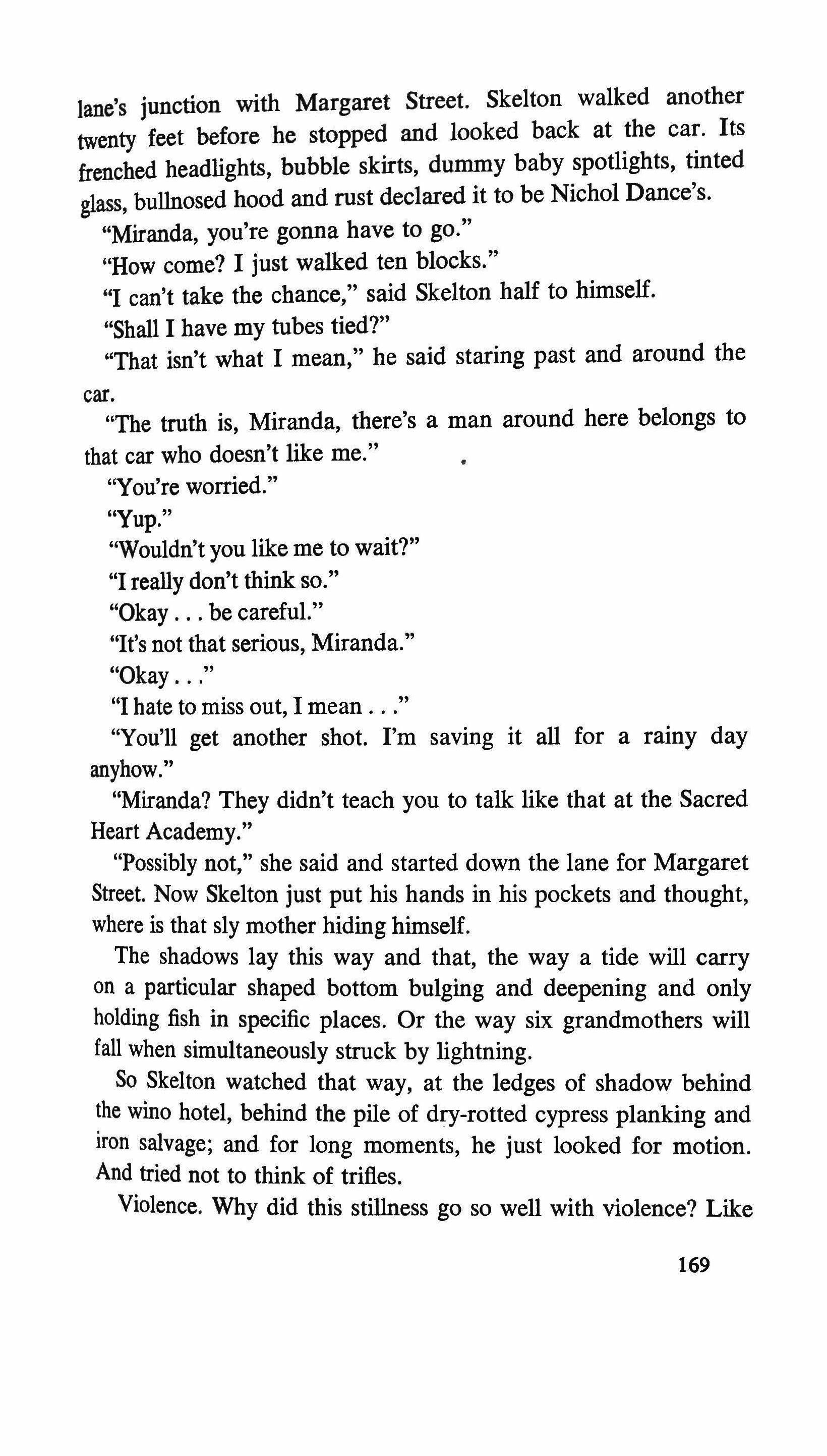
lane's junction with Margaret Street. Skelton walked another twenty feet before he stopped and looked back at the car. Its frenched headlights, bubble skirts, dummy baby spotlights, tinted glass, bullnosed hood and rust declared it to be Nichol Dance's.
"Miranda, you're gonna have to go."
"How come? I just walked ten blocks."
"I can't take the chance," said Skelton half to himself.
"Shall I have my tubes tied?"
"That isn't what I mean," he said staring past and around the car.
"The truth is, Miranda, there's a man around here belongs to that car who doesn't like me."
"You're worried."
"Yup."
"Wouldn't you like me to wait?"
"I really don't think so."
"Okay be careful."
"It's not that serious, Miranda."
"Okay "
"I hate to miss out, I mean "
"You'll get another shot. I'm saving it all for a rainy day anyhow."
"Miranda? They didn't teach you to talk like that at the Sacred Heart Academy."
"Possibly not," she said and started down the lane for Margaret Street. Now Skelton just put his hands in his pockets and thought, where is that sly mother hiding himself.
The shadows lay this way and that, the way a tide will carry on a particular shaped bottom bulging and deepening and only holding fish in specific places. Or the way six grandmothers will fall when simultaneously struck by lightning.
So Skelton watched that way, at the ledges of shadow behind the wino hotel, behind the pile of dry-rotted cypress planking and iron salvage; and for long moments, he just looked for motion. And tried not to think of trifles.
Violence. Why did this stillness go so well with violence? Like 169
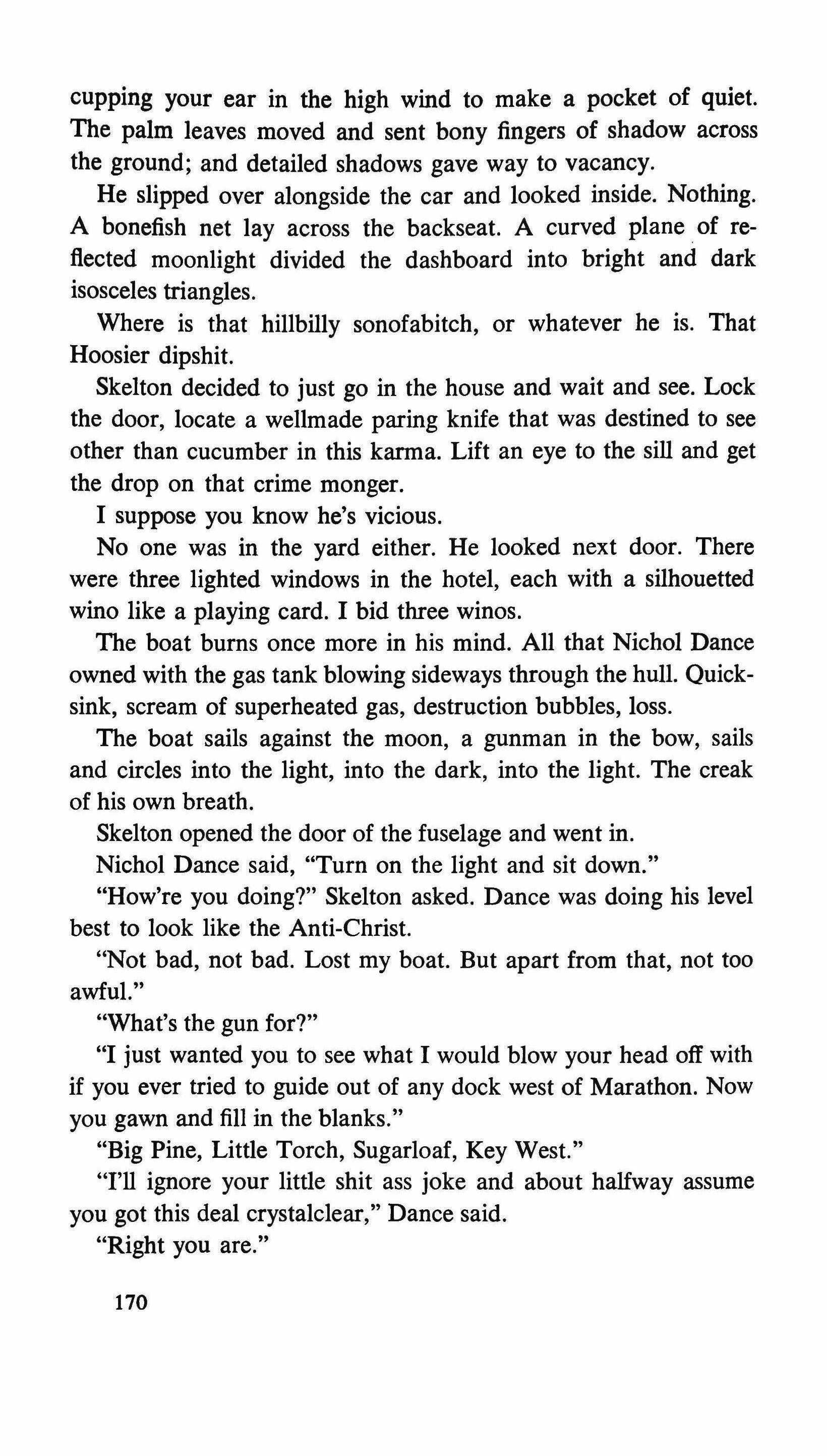
cupping your ear in the high wind to make a pocket of quiet. The palm leaves moved and sent bony fingers of shadow across the ground; and detailed shadows gave way to vacancy.
He slipped over alongside the car and looked inside. Nothing. A bonefish net lay across the backseat. A curved plane.of reflected moonlight divided the dashboard into bright and dark isosceles triangles.
Where is that hillbilly sonofabitch, or whatever he is. That Hoosier dipshit.
Skelton decided to just go in the house and wait and see. Lock the door, locate a wellmade paring knife that was destined to see other than cucumber in this karma. Lift an eye to the sill and get the drop on that crime monger.
1 suppose you know he's vicious.
No one was in the yard either. He looked next door. There were three lighted windows in the hotel, each with a silhouetted wino like a playing card. 1 bid three winos.
The boat burns once more in his mind. All that Nichol Dance owned with the gas tank blowing sideways through the hull. Quicksink, scream of superheated gas, destruction bubbles, loss.
The boat sails against the moon, a gunman in the bow, sails and circles into the light, into the dark, into the light. The creak of his own breath.
Skelton opened the door of the fuselage and went in. Nichol Dance said, "Turn on the light and sit down."
"How're you doing?" Skelton asked. Dance was doing his level best to look like the Anti-Christ.
"Not bad, not bad. Lost my boat. But apart from that, not too awful."
"What's the gun for?"
"I just wanted you to see what 1 would blow your head off with if you ever tried to guide out of any dock west of Marathon. Now you gawn and fill in the blanks."
"Big Pine, Little Torch, Sugarloaf, Key West."
"I'll ignore your little shit ass joke and about halfway assume you got this deal crystalclear," Dance said.
"Right you are."
170
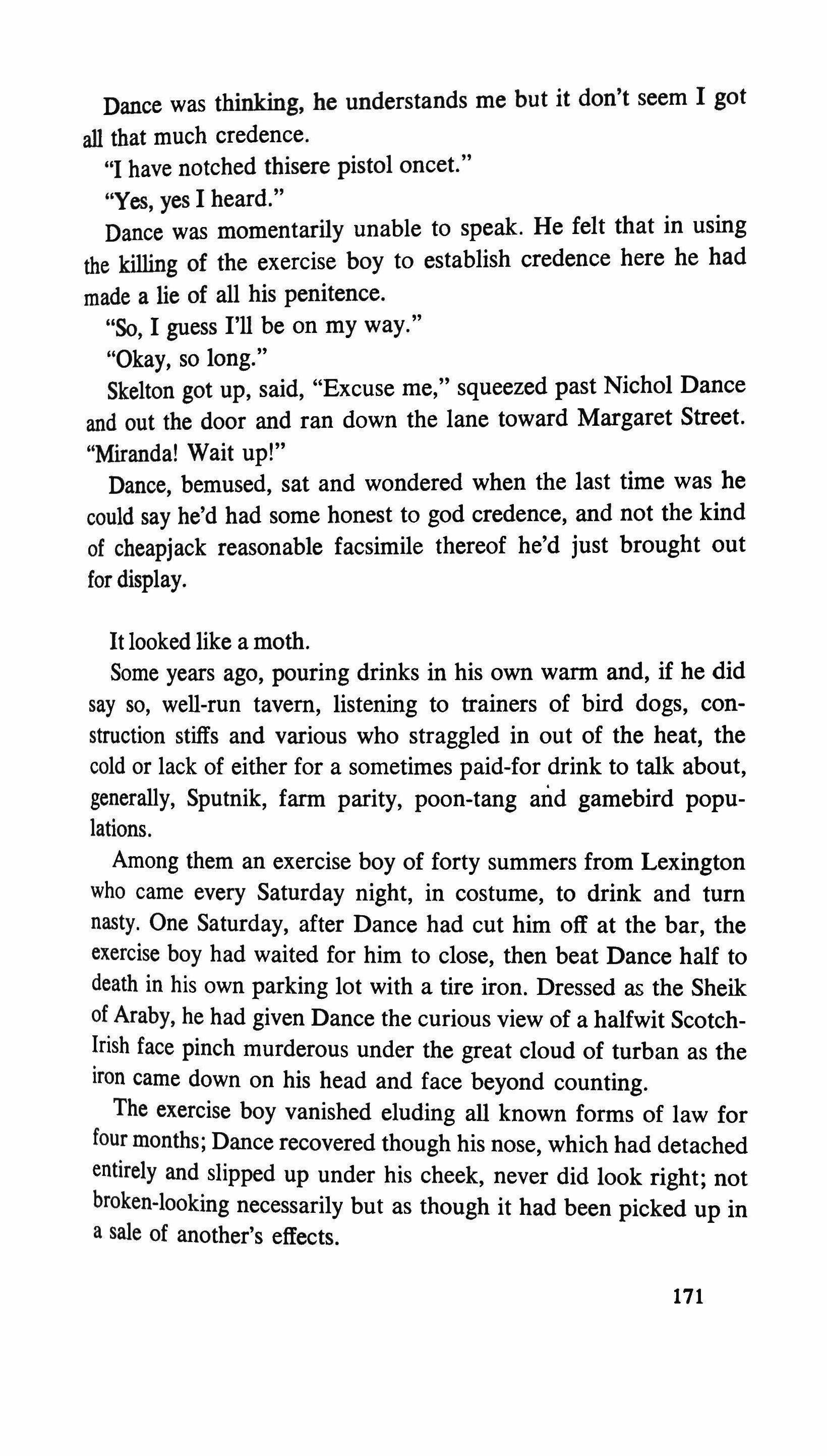
Dance was thinking, he understands me but it don't seem I got all that much credence.
"I have notched thisere pistol oncet."
"Yes, yes I heard."
Dance was momentarily unable to speak. He felt that in using the killing of the exercise boy to establish credence here he had made a lie of all his penitence.
"So, I guess I'll be on my way."
"Okay, so long."
Skelton got up, said, "Excuse me," squeezed past Nichol Dance and out the door and ran down the lane toward Margaret Street. "Miranda! Wait up!"
Dance, bemused, sat and wondered when the last time was he could say he'd had some honest to god credence, and not the kind of cheapjack reasonable facsimile thereof he'd just brought out for display.
It looked like a moth.
Some years ago, pouring drinks in his own warm and, if he did say so, well-run tavern, listening to trainers of bird dogs, construction stiffs and various who straggled in out of the heat, the cold or lack of either for a sometimes paid-for drink to talk about, generally, Sputnik, farm parity, poon-tang and gamebird populations.
Among them an exercise boy of forty summers from Lexington who came every Saturday night, in costume, to drink and turn nasty. One Saturday, after Dance had cut him off at the bar, the exercise boy had waited for him to close, then beat Dance half to death in his own parking lot with a tire iron. Dressed as the Sheik of Araby, he had given Dance the curious view of a halfwit ScotchIrish face pinch murderous under the great cloud of turban as the iron came down on his head and face beyond counting.
The exercise boy vanished eluding all known forms of law for four months; Dance recovered though his nose, which had detached entirely and slipped up under his cheek, never did look right; not broken-looking necessarily but as though it had been picked up in a sale of another's effects.
171
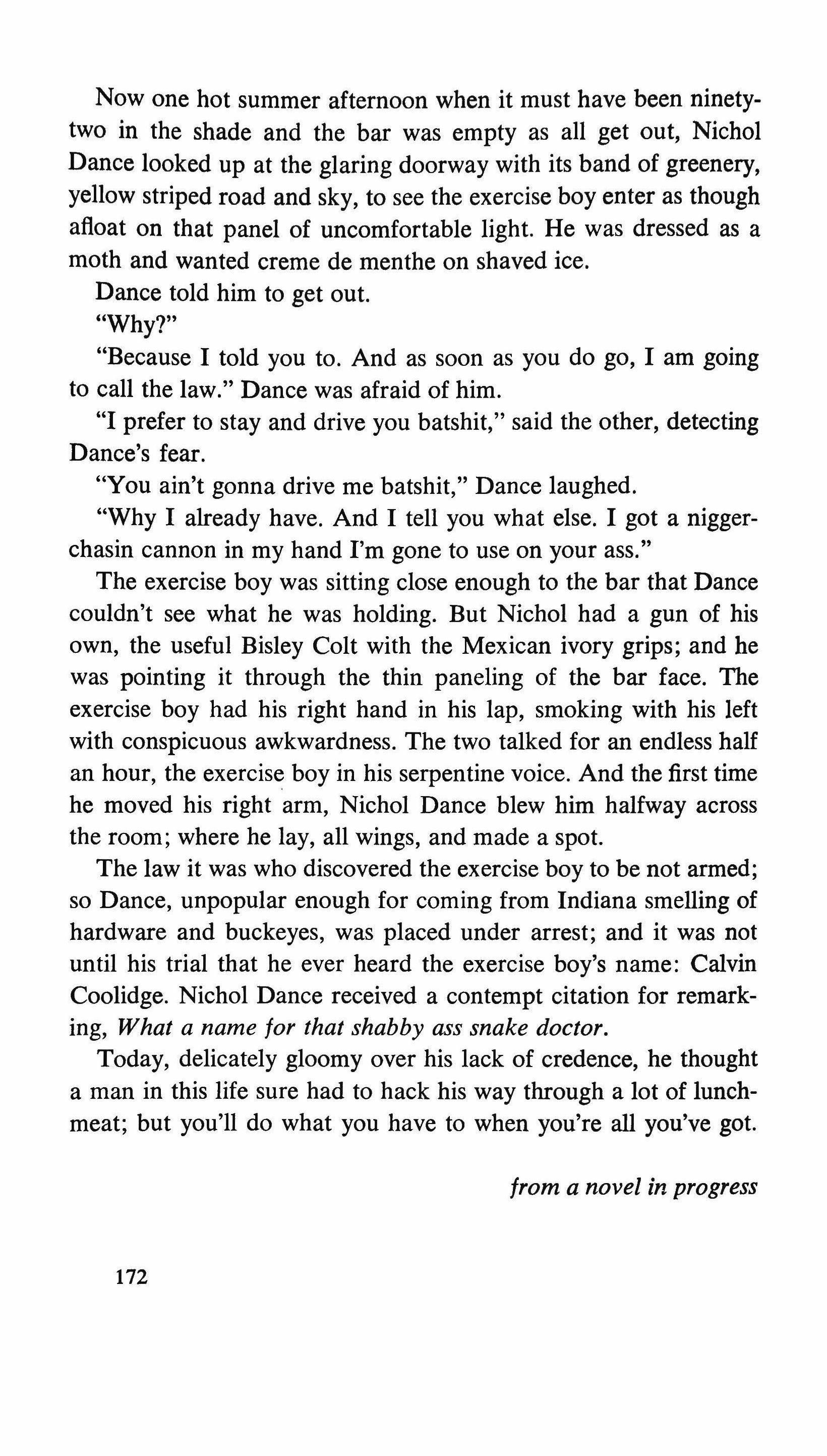
Now one hot summer afternoon when it must have been ninetytwo in the shade and the bar was empty as all get out, Nichol Dance looked up at the glaring doorway with its band of greenery, yellow striped road and sky, to see the exercise boy enter as though afloat on that panel of uncomfortable light. He was dressed as a moth and wanted creme de menthe on shaved ice.
Dance told him to get out.
"Why?"
"Because I told you to. And as soon as you do go, I am going to call the law." Dance was afraid of him.
"I prefer to stay and drive you batshit," said the other, detecting Dance's fear.
"You ain't gonna drive me batshit," Dance laughed.
"Why I already have. And I tell you what else. I got a niggerchasin cannon in my hand I'm gone to use on your ass."
The exercise boy was sitting close enough to the bar that Dance couldn't see what he was holding. But Nichol had a gun of his own, the useful Bisley Colt with the Mexican ivory grips; and he was pointing it through the thin paneling of the bar face. The exercise boy had his right hand in his lap, smoking with his left with conspicuous awkwardness. The two talked for an endless half an hour, the exercise boy in his serpentine voice. And the first time he moved his right arm, Nichol Dance blew him halfway across the room; where he lay, all wings, and made a spot.
The law it was who discovered the exercise boy to be not armed; so Dance, unpopular enough for coming from Indiana smelling of hardware and buckeyes, was placed under arrest; and it was not until his trial that he ever heard the exercise boy's name: Calvin Coolidge. Nichol Dance received a contempt citation for remarking, What a name for that shabby ass snake doctor.
Today, delicately gloomy over his lack of credence, he thought a man in this life sure had to hack his way through a lot of lunchmeat; but you'll do what you have to when you're all you've got.
from a novel in progress
172
Margaret said: WARREN FINE
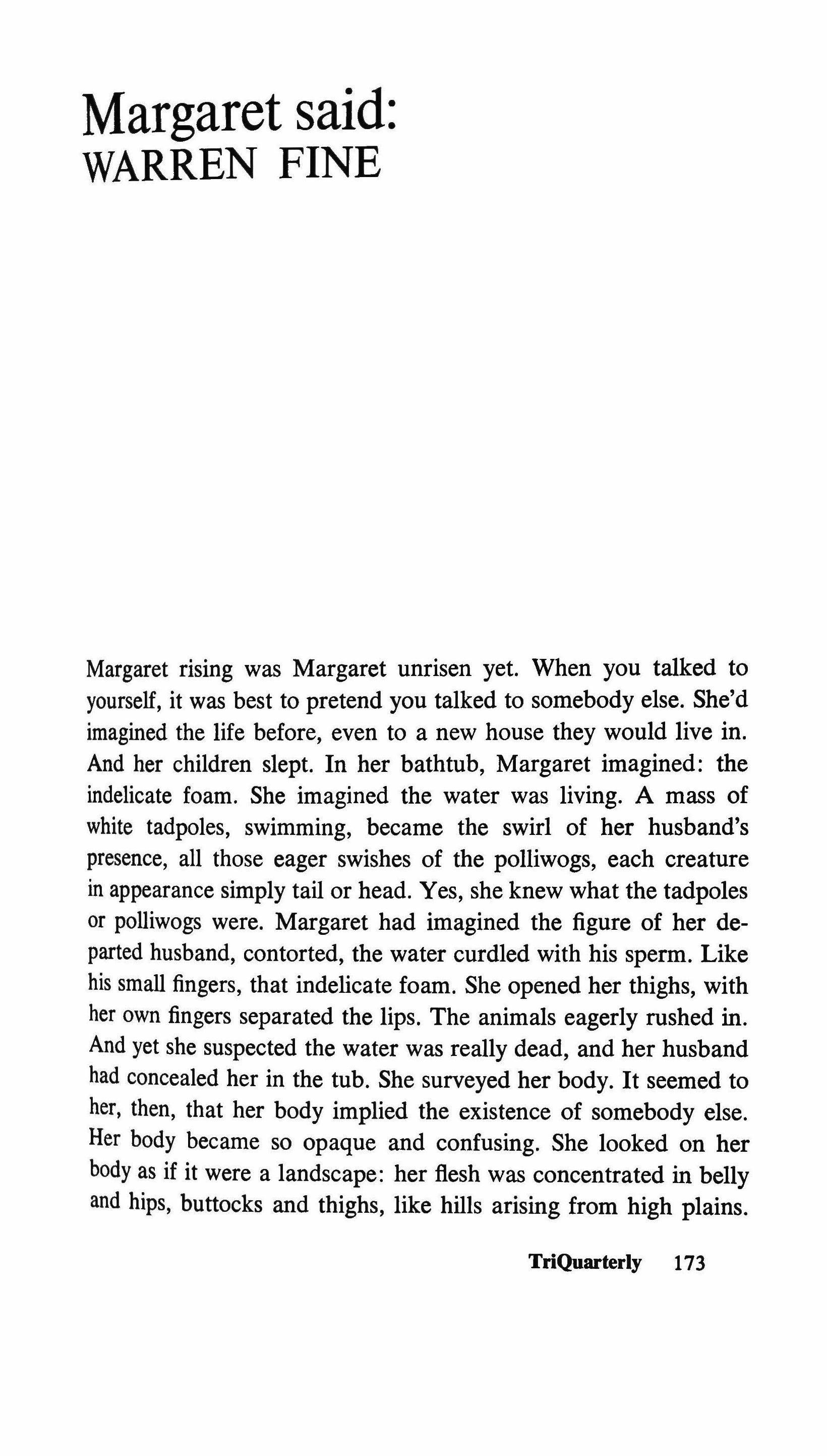
Margaret rising was Margaret unrisen yet. When you talked to yourself, it was best to pretend you talked to somebody else. She'd imagined the life before, even to a new house they would live in. And her children slept. In her bathtub, Margaret imagined: the indelicate foam. She imagined the water was living. A mass of white tadpoles, swimming, became the swirl of her husband's presence, all those eager swishes of the polliwogs, each creature in appearance simply tail or head. Yes, she knew what the tadpoles or polliwogs were. Margaret had imagined the figure of her departed husband, contorted, the water curdled with his sperm. Like his small fingers, that indelicate foam. She opened her thighs, with her own fingers separated the lips. The animals eagerly rushed in. And yet she suspected the water was really dead, and her husband had concealed her in the tub. She surveyed her body. It seemed to her, then, that her body implied the existence of somebody else. Her body became so opaque and confusing. She looked on her body as if it were a landscape: her flesh was concentrated in belly and hips, buttocks and thighs, like hills arising from high plains.
TriQuarterly 173

She said, Why do I exaggerate like this? Was it a dead landscape with ironic rises, like the land she'd come from? She felt as if she were viewing a corpse, the relic of an inhuman past. Her body felt like it had been community property, or still was. Too long for the bathtub, nearly as tall as her husband was, she curled on herself, in need and play.
When the children weren't sleeping, Margaret and they had scurried here and there-like the polliwogs all heads or tails. Everything done for the children was done really for Margaret. She'd become devoted to pretending she lived. Last Sunday morning, turning among the wonders of the public zoo, Margaret began to feel they were all out of place outside the cages, belonging most surely with animals inside the bars.
Of course that must all have been in the mind, at the cages, as also in the mind she lay, under water, as if dead. The white imaginary attachment of some other life concealed that death. The half-recalled adherence of her husband's love, like a second, cloudy skin, was so like her devious husband, practicing the concealments of his life in her.
She even imagined she could taste the animal envelope upon her tongue, and could feel its fit; to clefts, of vagina, buttocks, to intestinal, uterine-these interior walls. She thought this water might live after all, prodding her death with eager tongues of its own, with penises, heads or tails, with water's or a husband's fingers. She explored her body to discover the place it became another's, then rejected that complicity of love and water for her simple body in the tub. Her death was in that body, and implied the death of somebody else. If she had died, if this, their flesh, had betrayed her, he was dead also.
In the art museum, the boy penises of the beautiful statues had only made her tired; she preferred the powers of caged lions. They nearly drove her wild, after the statues. They were red and golden, dark and brown.
She could almost foretell a future, in which she would have animals freely about her. Of course she remembered she'd dreamed once of a maned and bearded lion, pacing high, on a black cross-
174
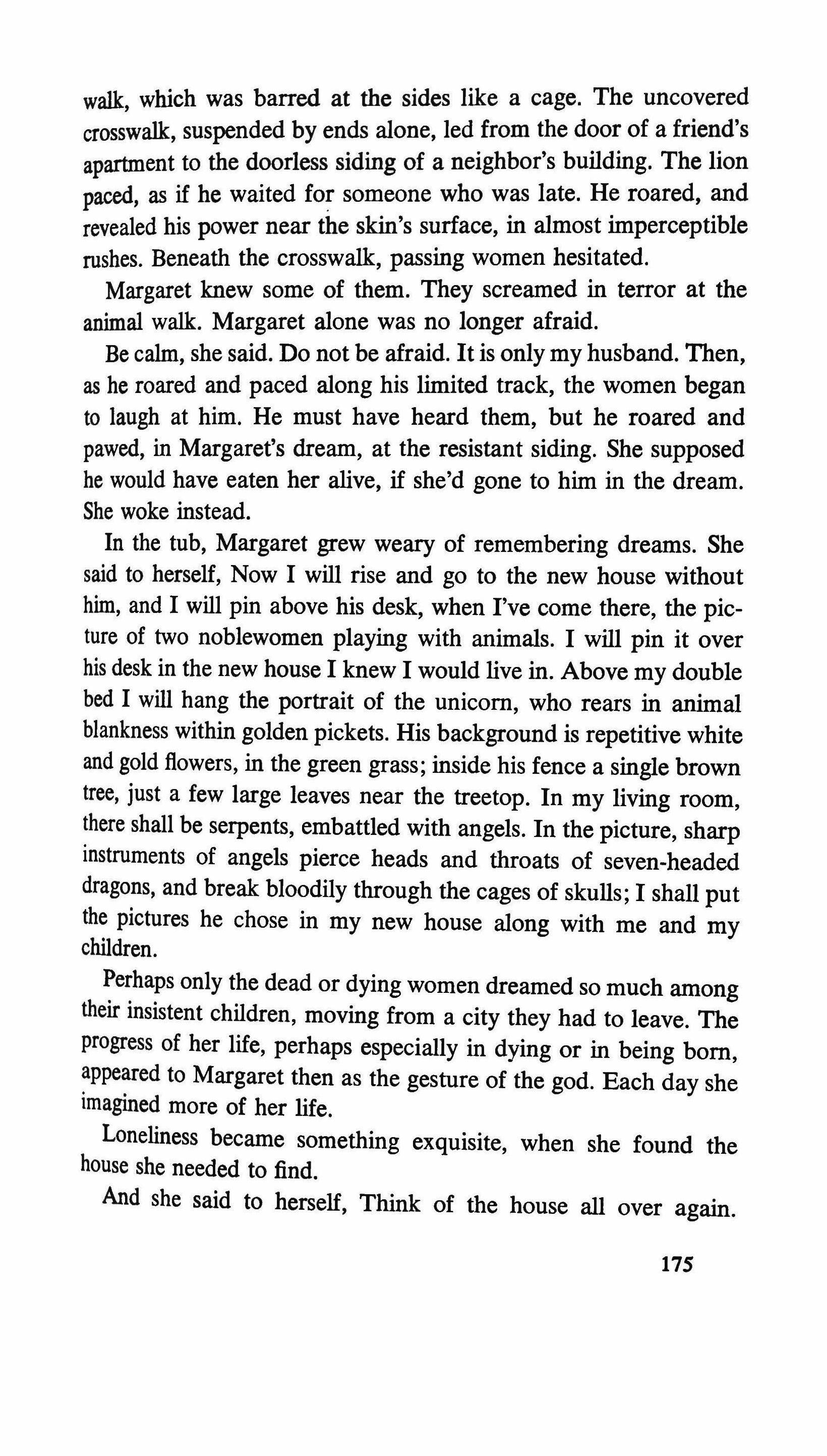
walk, which was barred at the sides like a cage. The uncovered crosswalk, suspended by ends alone, led from the door of a friend's apartment to the doorless siding of a neighbor's building. The lion paced, as if he waited fo! someone who was late. He roared, and revealed his power near the skin's surface, in almost imperceptible rushes. Beneath the crosswalk, passing women hesitated. Margaret knew some of them. They screamed in terror at the animal walk. Margaret alone was no longer afraid. Be calm, she said. Do not be afraid. It is only my husband. Then, as he roared and paced along his limited track, the women began to laugh at him. He must have heard them, but he roared and pawed, in Margaret's dream, at the resistant siding. She supposed he would have eaten her alive, if she'd gone to him in the dream. She woke instead.
In the tub, Margaret grew weary of remembering dreams. She said to herself, Now I will rise and go to the new house without him, and I will pin above his desk, when I've come there, the picture of two noblewomen playing with animals. I will pin it over his desk in the new house I knew I would live in. Above my double bed I will hang the portrait of the unicorn, who rears in animal blankness within golden pickets. His background is repetitive white and gold flowers, in the green grass; inside his fence a single brown tree, just a few large leaves near the treetop. In my living room, there shall be serpents, embattled with angels. In the picture, sharp instruments of angels pierce heads and throats of seven-headed dragons, and break bloodily through the cages of skulls; I shall put the pictures he chose in my new house along with me and my children.
Perhaps only the dead or dying women dreamed so much among their insistent children, moving from a city they had to leave. The progress of her life, perhaps especially in dying or in being born, appeared to Margaret then as the gesture of the god. Each day she imagined more of her life.
Loneliness became something exquisite, when she found the house she needed to find.
And she said to herself, Think of the house all over again. 175
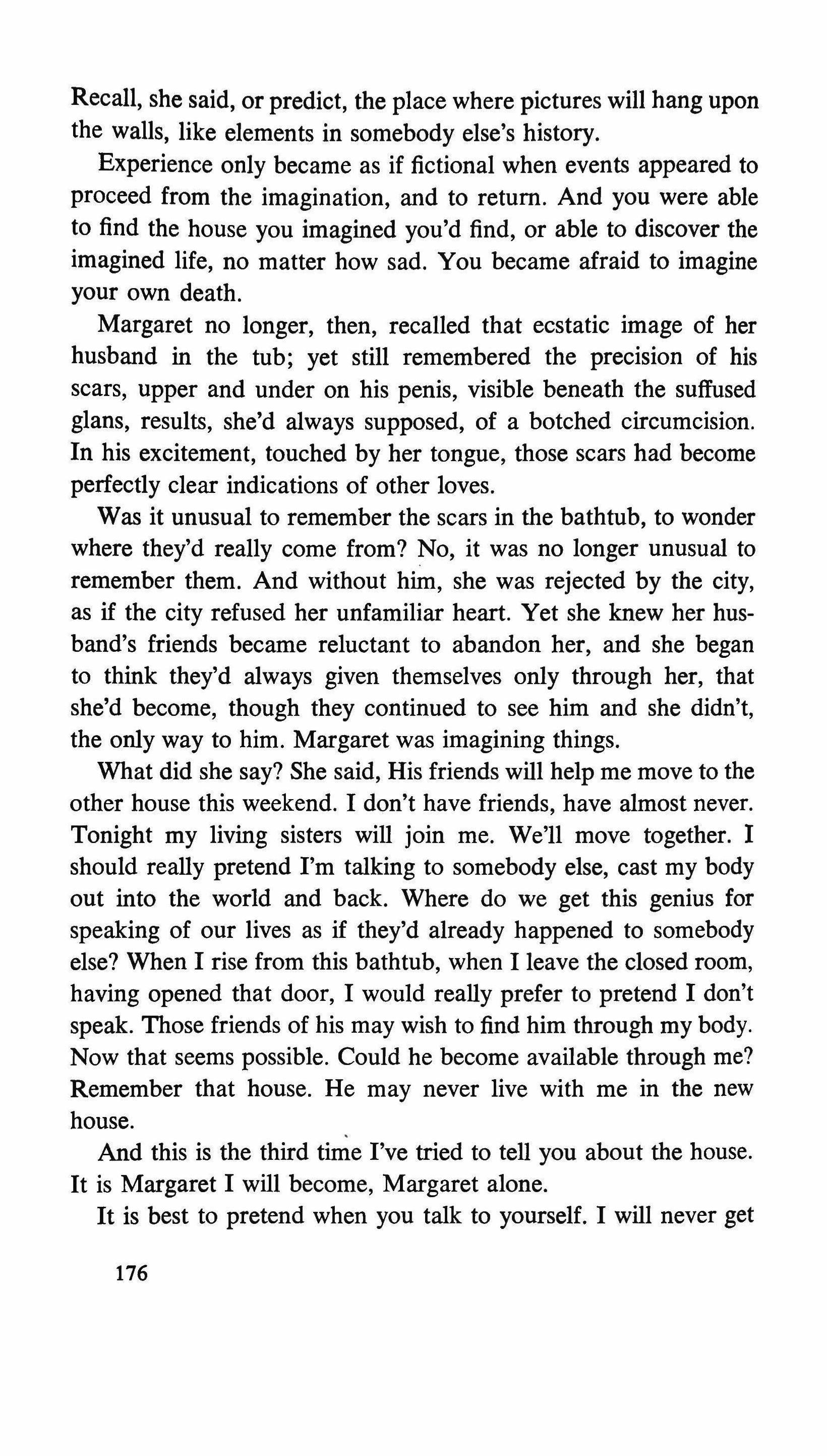
Recall, she said, or predict, the place where pictures will hang upon the walls, like elements in somebody else's history.
Experience only became as if fictional when events appeared to proceed from the imagination, and to return. And you were able to find the house you imagined you'd find, or able to discover the imagined life, no matter how sad. You became afraid to imagine your own death.
Margaret no longer, then, recalled that ecstatic image of her husband in the tub; yet still remembered the precision of his scars, upper and under on his penis, visible beneath the suffused glans, results, she'd always supposed, of a botched circumcision. In his excitement, touched by her tongue, those scars had become perfectly clear indications of other loves.
Was it unusual to remember the scars in the bathtub, to wonder where they'd really come from? No, it was no longer unusual to remember them. And without him, she was rejected by the city, as if the city refused her unfamiliar heart. Yet she knew her husband's friends became reluctant to abandon her, and she began to think they'd always given themselves only through her, that she'd become, though they continued to see him and she didn't, the only way to him. Margaret was imagining things. What did she say? She said, His friends will help me move to the other house this weekend. I don't have friends, have almost never. Tonight my living sisters will join me. We'll move together. I should really pretend I'm talking to somebody else, cast my body out into the world and back. Where do we get this genius for speaking of our lives as if they'd already happened to somebody else? When I rise from this bathtub, when I leave the closed room, having opened that door, I would really prefer to pretend I don't speak. Those friends of his may wish to find him through my body. Now that seems possible. Could he become available through me? Remember that house. He may never live with me in the new house.
And this is the third time I've tried to tell you about the house. It is Margaret I will become, Margaret alone. It is best to pretend when you talk to yourself. I will never get
176

it right, the house. I am far happier if I decide I won't describe the farmhouse, the hill, the school, the near advance of the subdivision, two creeks, a distant farmhouse-someone else's, across the open fields to the east-that each morning will reveal. The basement will probably flood, despite the altitude. Odor of flood was on the house. I didn't go down there, I didn't go down to the basement. Isn't this enough about the house, so white and cocky, and the hill? I would prefer to describe my body.
Oh my, what a very peculiar feeling, you know, to feel my children, in their nap, have made me up, somehow invented and slain their father, feeling, to feel, our children engender us, or shall. Well, someone had to make this up, I suppose.
Who listens to me talk, after all?
Her reflection lasted altogether too long, too long the bathing, submersion in water. Fingerprints warp, ridges enlarge to become all too distinct for her, hot water so comforting-but deadly to any spermatozoa that might have survived the fortnight of his absence.
And she said, In my imaginary womb, the egg may yet be created. The new mysterious zygote remains possible. Everything appears after nothing, and our children discover us, perhaps nine months from fourteen days ago, or nine months from my bathing.
After seventy-two hours, everything became nothing.
I would welcome any kind of kid, hairy or slope-jawed, after some immediate birth or conception of my own. Why does the god keep gesturing like this?
What could she do? She was describing her body to you: the black heavy head of hair strung through the water, that thick creeper growth between her thighs, soft prickles damp beneath her shoulders.
Yes, I'm just describing my body, and if I should conceive, it is my body that the child will change: the milk-bulged breasts, the belly apple-proud as Eve's, all skin's tightening, even a pain in the small of my back. I would welcome that now.
Why couldn't her husband have left her with child, as husbands leave their wives in soap-operas? Then she wouldn't have been so alone with her body. 177
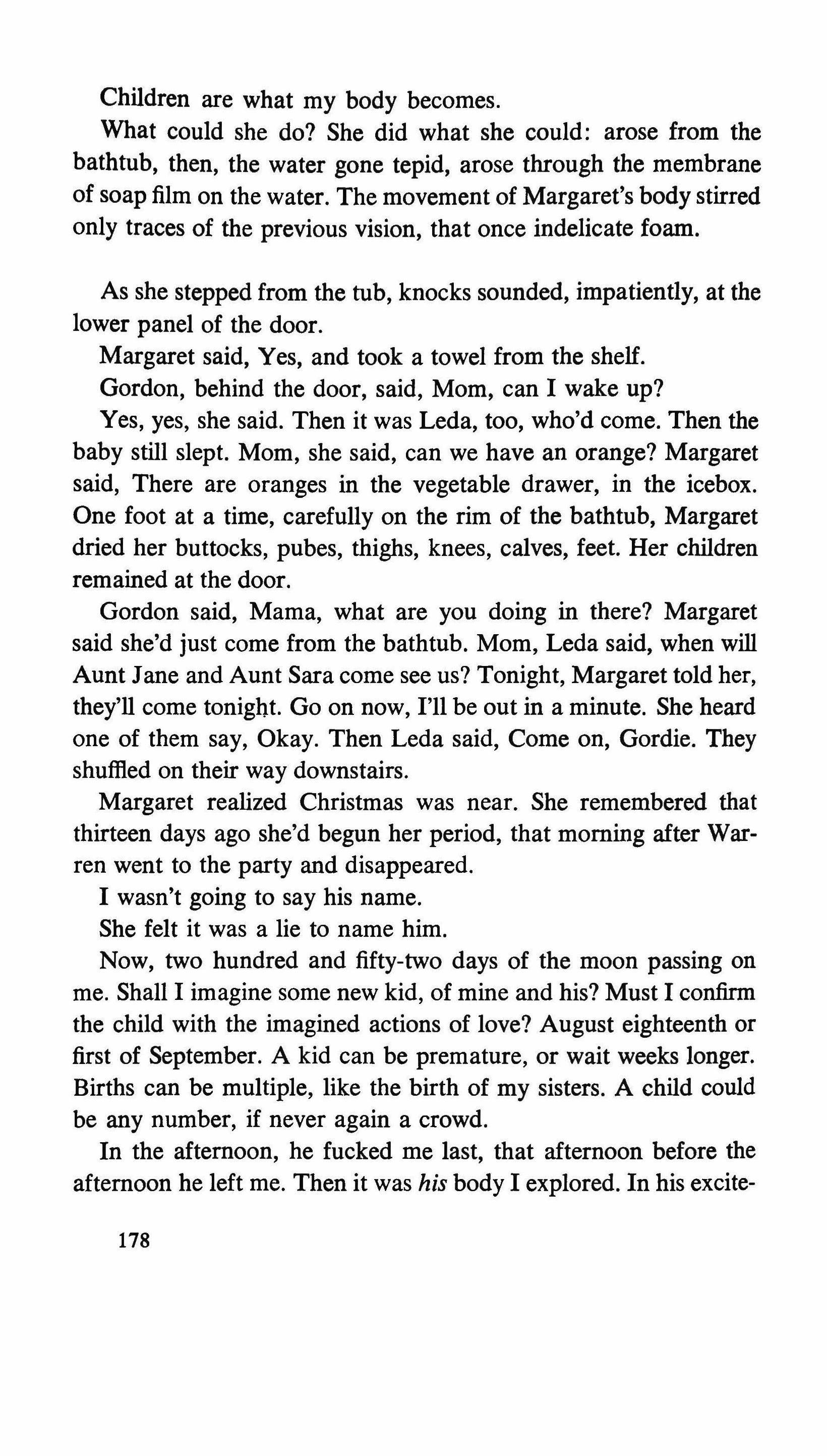
Children are what my body becomes.
What could she do? She did what she could: arose from the bathtub, then, the water gone tepid, arose through the membrane of soap film on the water. The movement of Margaret's body stirred only traces of the previous vision, that once indelicate foam.
As she stepped from the tub, knocks sounded, impatiently, at the lower panel of the door.
Margaret said, Yes, and took a towel from the shelf.
Gordon, behind the door, said, Mom, can I wake up?
Yes, yes, she said. Then it was Leda, too, who'd come. Then the baby still slept. Mom, she said, can we have an orange? Margaret said, There are oranges in the vegetable drawer, in the icebox. One foot at a time, carefully on the rim of the bathtub, Margaret dried her buttocks, pubes, thighs, knees, calves, feet. Her children remained at the door.
Gordon said, Mama, what are you doing in there? Margaret said she'd just come from the bathtub. Mom, Leda said, when will Aunt Jane and Aunt Sara come see us? Tonight, Margaret told her, they'll come tonight. Go on now, I'll be out in a minute. She heard one of them say, Okay. Then Leda said, Come on, Gordie. They shuffled on their way downstairs.
Margaret realized Christmas was near. She remembered that thirteen days ago she'd begun her period, that morning after Warren went to the party and disappeared.
I wasn't going to say his name.
She felt it was a lie to name him.
Now, two hundred and fifty-two days of the moon passing on me. Shall I imagine some new kid, of mine and his? Must I confirm the child with the imagined actions of love? August eighteenth or first of September. A kid can be premature, or wait weeks longer. Births can be multiple, like the birth of my sisters. A child could be any number, if never again a crowd.
In the afternoon, he fucked me last, that afternoon before the afternoon he left me. Then it was his body I explored. In his excite-
178
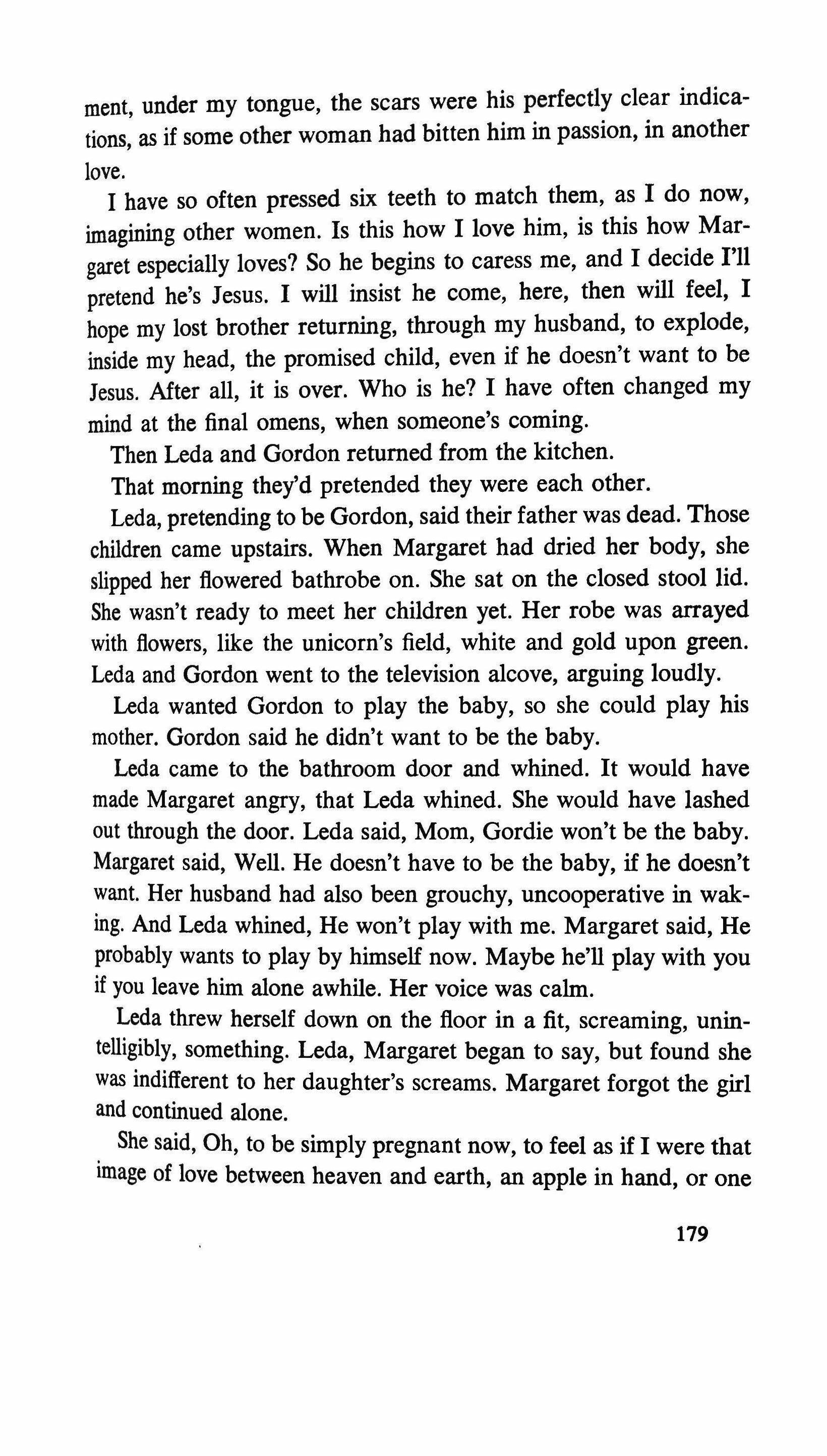
ment, under my tongue, the scars were his perfectly clear indications, as if some other woman had bitten him in passion, in another love.
I have so often pressed six teeth to match them, as I do now, imagining other women. Is this how I love him, is this how Margaret especially loves? So he begins to caress me, and I decide I'll pretend he's Jesus. I will insist he come, here, then will feel, I hope my lost brother returning, through my husband, to explode, inside my head, the promised child, even if he doesn't want to be Jesus. After all, it is over. Who is he? I have often changed my mind at the final omens, when someone's coming.
Then Leda and Gordon returned from the kitchen.
That morning they'd pretended they were each other.
Leda, pretending to be Gordon, said their father was dead. Those children came upstairs. When Margaret had dried her body, she slipped her flowered bathrobe on. She sat on the closed stool lid. She wasn't ready to meet her children yet. Her robe was arrayed with flowers, like the unicorn's field, white and gold upon green. Leda and Gordon went to the television alcove, arguing loudly.
Leda wanted Gordon to play the baby, so she could play his mother. Gordon said he didn't want to be the baby.
Leda came to the bathroom door and whined. It would have made Margaret angry, that Leda whined. She would have lashed out through the door. Leda said, Mom, Gordie won't be the baby. Margaret said, Well. He doesn't have to be the baby, if he doesn't want. Her husband had also been grouchy, uncooperative in waking. And Leda whined, He won't play with me. Margaret said, He probably wants to play by himself now. Maybe he'll play with you if you leave him alone awhile. Her voice was calm.
Leda threw herself down on the floor in a fit, screaming, unintelligibly, something. Leda, Margaret began to say, but found she was indifferent to her daughter's screams. Margaret forgot the girl and continued alone.
She said, Oh, to be simply pregnant now, to feel as if I were that image of love between heaven and earth, an apple in hand, or one
179
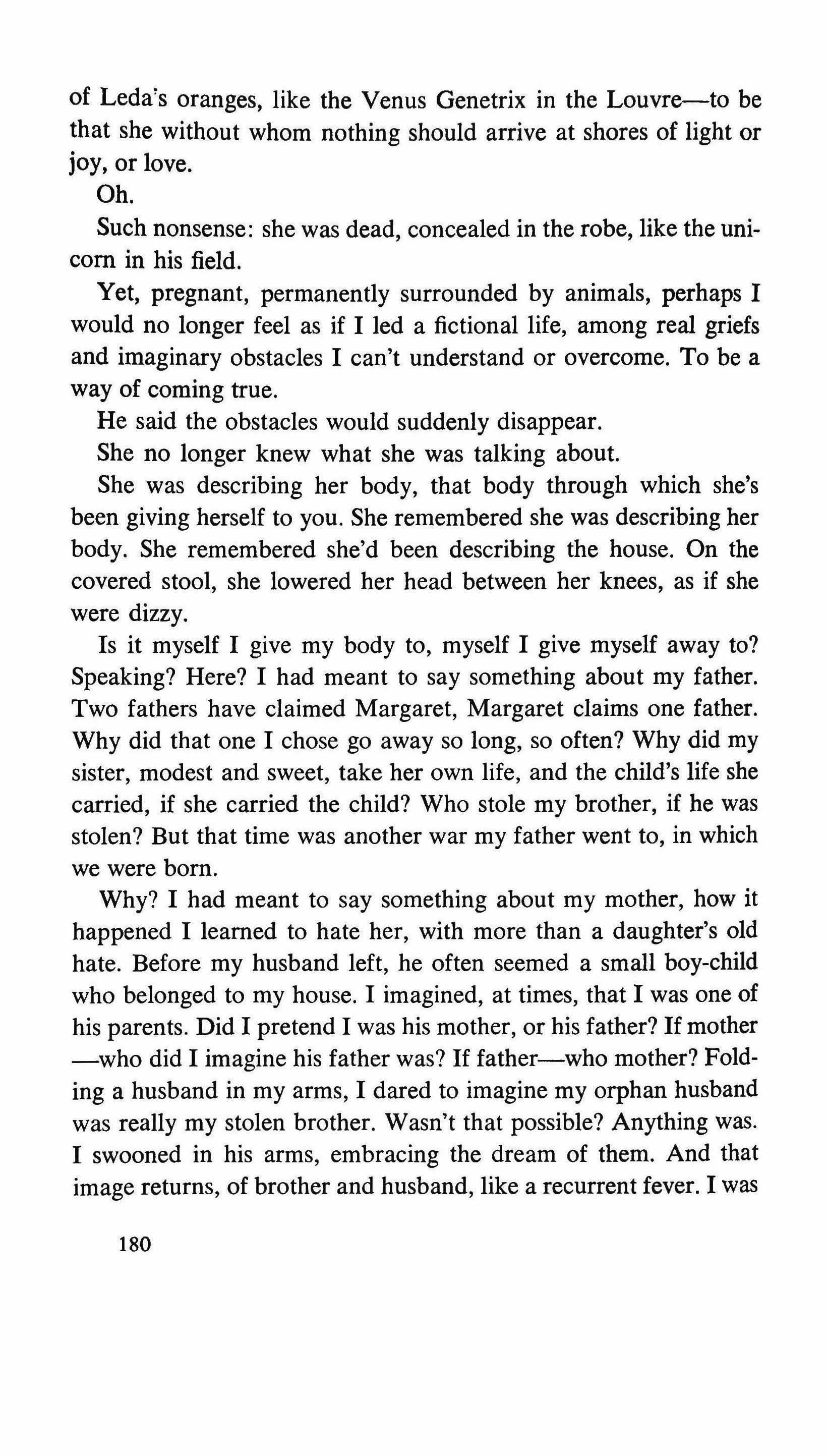
of Leda's oranges, like the Venus Genetrix in the Louvre-to be that she without whom nothing should arrive at shores of light or joy, or love.
Oh.
Such nonsense: she was dead, concealed in the robe, like the unicorn in his field.
Yet, pregnant, permanently surrounded by animals, perhaps I would no longer feel as if I led a fictional life, among real griefs and imaginary obstacles I can't understand or overcome. To be a way of coming true.
He said the obstacles would suddenly disappear.
She no longer knew what she was talking about.
She was describing her body, that body through which she's been giving herself to you. She remembered she was describing her body. She remembered she'd been describing the house. On the covered stool, she lowered her head between her knees, as if she were dizzy.
Is it myself I give my body to, myself I give myself away to? Speaking? Here? I had meant to say something about my father. Two fathers have claimed Margaret, Margaret claims one father. Why did that one I chose go away so long, so often? Why did my sister, modest and sweet, take her own life, and the child's life she carried, if she carried the child? Who stole my brother, if he was stolen? But that time was another war my father went to, in which we were born.
Why? I had meant to say something about my mother, how it happened I learned to hate her, with more than a daughter's old hate. Before my husband left, he often seemed a small boy-child who belonged to my house. I imagined, at times, that I was one of his parents. Did I pretend I was his mother, or his father? If mother -who did I imagine his father was? If father-who mother? Folding a husband in my arms, I dared to imagine my orphan husband was really my stolen brother. Wasn't that possible? Anything was. I swooned in his arms, embracing the dream of them. And that image returns, of brother and husband, like a recurrent fever. I was
180

going to talk about my husband more: describe him. I will: bearded, dark like me, affecting either a black, wide-rimmed hat or a blue-billed baseball cap, or sometimes, around the house, a cane that his foster-father had owned. He left the cane when he went to the party that late afternoon. Didn't he know he wouldn't come back?
How could he leave me? As I leaned over dishes in the sink, or reached to hang clothes on the line, he would poke me from behind with the cane, and say, Here, Mrs. Let me cure you of work. His ridiculous games. We'd planned to move to Canada, in the spring.
Margaret's husband didn't remind her of anyone but the brother she'd never known. He wasn't like her mother. He didn't remind her of her living sisters, or of the dead one. He wasn't like either of the fathers who'd claimed her. The father she claimed remained too long at wars, he and his brother, letting their smooth seed drop, tum napalm eggs in mid-air, that long plummet, the spreading yolks breaking, the maiming fire on the earth, while natives died off everywhere, like the sperm.
On the property, Margaret said, on the property of the new farmhouse, I'll make monuments to my past, to my husband. Perhaps I will make him gravestones.
I'll walk down the slope from the house, walk east steeply from the house, then descend more sharply. I think I'll build the first one near the ford, where the two small creeks meet each other. It will be cold that day, but very still, not blowing like it always blows back home, clear or snowing, maybe snowing, my hands, gloved in animal skins, composing rocks and mud, shall prepare a warning at the boundary-for his figure just the tapering stones, then a single stick held forward in slightly indicated hands. This minimum design will be sufficient.
So she wondered, would her husband have left her if long ago she hadn't chosen the particular father. She wondered why she had to be the one to choose between
181
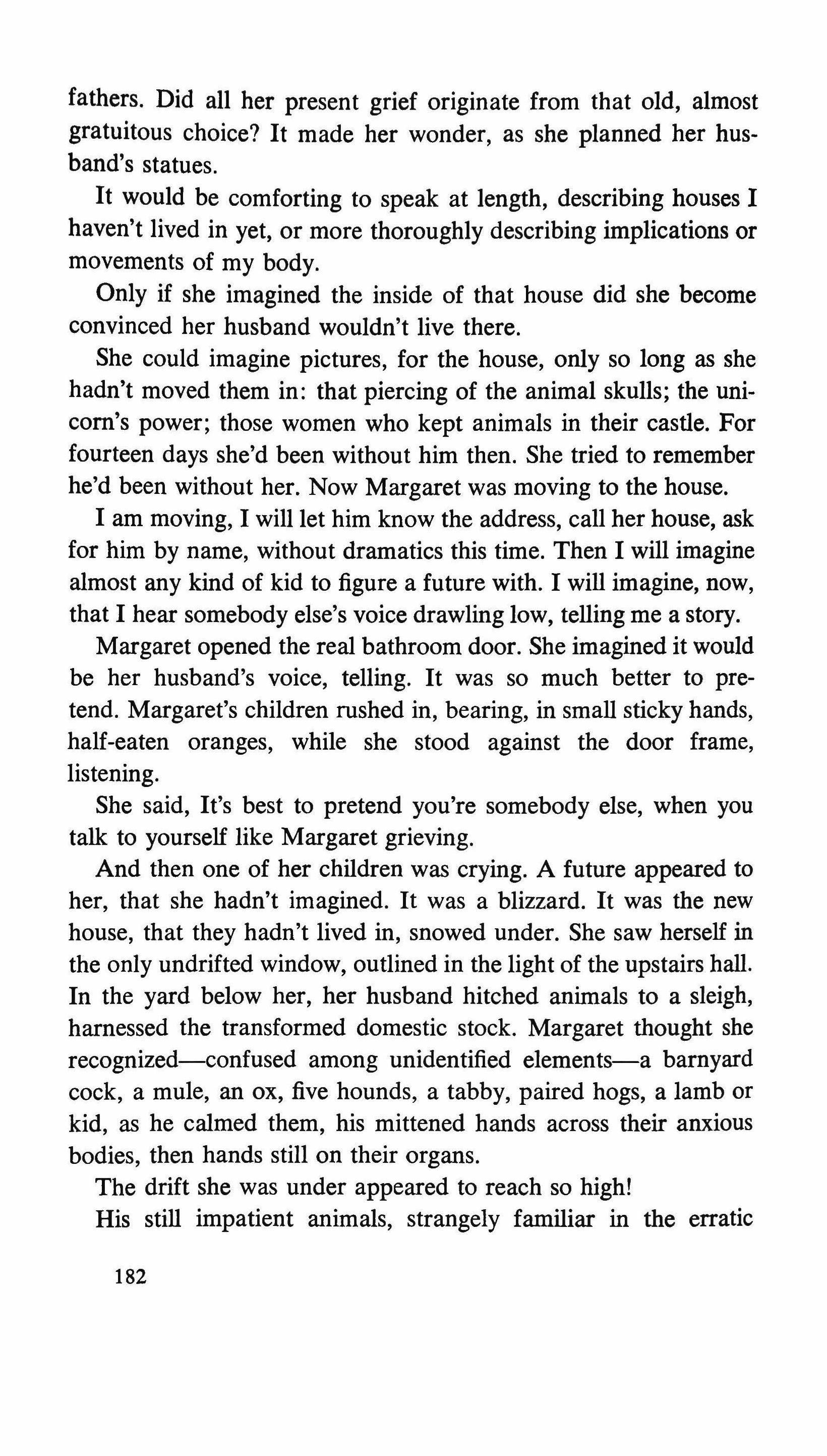
fathers. Did all her present grief originate from that old, almost gratuitous choice? It made her wonder, as she planned her husband's statues.
It would be comforting to speak at length, describing houses I haven't lived in yet, or more thoroughly describing implications or movements of my body.
Only if she imagined the inside of that house did she become convinced her husband wouldn't live there.
She could imagine pictures, for the house, only so long as she hadn't moved them in: that piercing of the animal skulls; the unicorn's power; those women who kept animals in their castle. For fourteen days she'd been without him then. She tried to remember he'd been without her. Now Margaret was moving to the house.
I am moving, I will let him know the address, call her house, ask for him by name, without dramatics this time. Then I will imagine almost any kind of kid to figure a future with. I will imagine, now, that I hear somebody else's voice drawling low, telling me a story.
Margaret opened the real bathroom door. She imagined it would be her husband's voice, telling. It was so much better to pretend. Margaret's children rushed in, bearing, in small sticky hands, half-eaten oranges, while she stood against the door frame, listening.
She said, It's best to pretend you're somebody else, when you talk to yourself like Margaret grieving.
And then one of her children was crying. A future appeared to her, that she hadn't imagined. It was a blizzard. It was the new house, that they hadn't lived in, snowed under. She saw herself in the only undrifted window, outlined in the light of the upstairs hall. In the yard below her, her husband hitched animals to a sleigh, harnessed the transformed domestic stock. Margaret thought she recognized-confused among unidentified elements-a barnyard cock, a mule, an ox, five hounds, a tabby, paired hogs, a lamb or kid, as he calmed them, his mittened hands across their anxious bodies, then hands still on their organs.
The drift she was under appeared to reach so high!
His still impatient animals, strangely familiar in the erratic
182

snowfall, strained in the harness, as he soothed them, using words and gestures, now, she couldn't understand.
When the animals were quiet, he waxed the two long runners and checked the supplies. He cried to the window, All set, Margaret, all set! She knocked the window-glass out with her boot. The snow stung, like sand flurries. Margaret closed her eyes and tumbled in a ball, down to the sleigh. The wind, so much stronger when she was away from the house, shoved Margaret forward. She climbed into the sleigh he'd made her. Her husband wrapped her in furs, gave her the long reins. He kissed her on the lips, loudly. He shouted past the blizzard, Go on now! ride on!
The low sleigh ran swiftly over the smaller drifts; and she was gone, turning from south to east around the bend of the long drive, over the icebound ford, then flowing north, on the road through the valley. She had tried all along to call him. She saw him again, briefly, on his hillside, through the white sycamores. She waved.
183
The traditional story returns JONATHAN BAUMBACH

Too many times you read a story nowadays and it's not a story at all, not in the traditional sense. A traditional story has plot, character, and theme, to name three things it traditionally has. The following story, which contains a SOUP90n of mood in addition to the three major considerations named above, is intended as a modest "rearguard action in the service of a declining tradition.
The plot is this: a woman of good family (we won't say just how good the family is) marries a man of means. They live together in uneventful happiness for seven years until their love runs out. Then they split up but not before some bad times that leave scars of bitterness. Afterward, the bad times remain, particularly for the woman, and the good times are dashed on the rock of negligent memory, which is one of the themes of the story. Bad times in a marriage erase all memories of former happiness. The name of the woman of better than average family is Eve. What more is there to know of her? The answer to that question is the character part of the story.
184 TriQuarterly
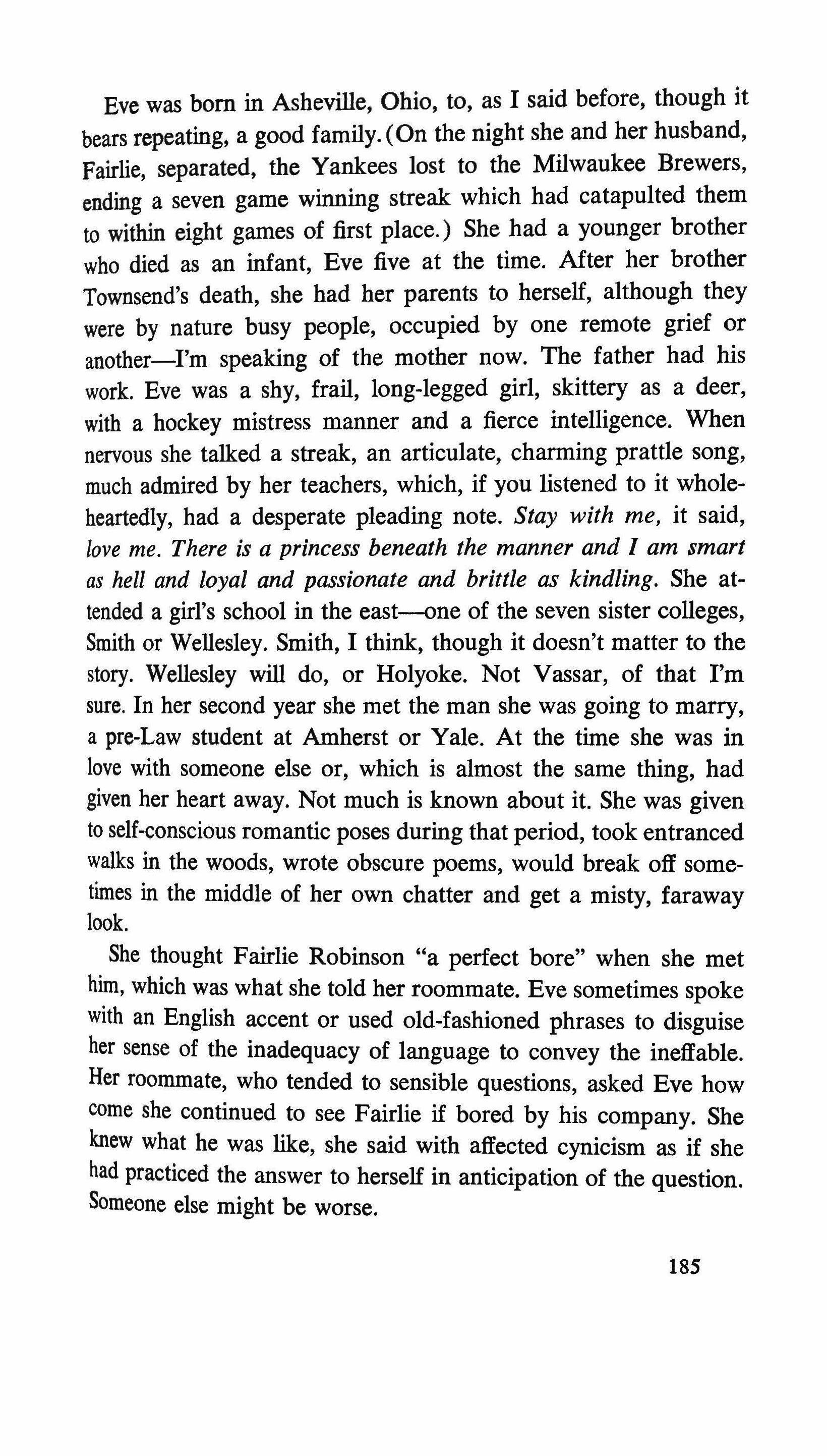
Eve was born in Asheville, Ohio, to, as I said before, though it bears repeating, a good family. (On the night she and her husband, Fairlie, separated, the Yankees lost to the Milwaukee Brewers, ending a seven game winning streak which had catapulted them to within eight games of first place.) She had a younger brother who died as an infant, Eve five at the time. After her brother Townsend's death, she had her parents to herself, although they were by nature busy people, occupied by one remote grief or another-I'm speaking of the mother now. The father had his work. Eve was a shy, frail, long-legged girl, skittery as a deer, with a hockey mistress manner and a fierce intelligence. When nervous she talked a streak, an articulate, charming prattle song, much admired by her teachers, which, if you listened to it wholeheartedly, had a desperate pleading note. Stay with me, it said, love me. There is a princess beneath the manner and 1 am smart as hell and loyal and passionate and brittle as kindling. She attended a girl's school in the east--one of the seven sister colleges, Smith or Wellesley. Smith, I think, though it doesn't matter to the story. Wellesley will do, or Holyoke. Not Vassar, of that I'm sure. In her second year she met the man she was going to marry, a pre-Law student at Amherst or Yale. At the time she was in love with someone else or, which is almost the same thing, had given her heart away. Not much is known about it. She was given to self-conscious romantic poses during that period, took entranced walks in the woods, wrote obscure poems, would break off sometimes in the middle of her own chatter and get a misty, faraway look.
She thought Fairlie Robinson "a perfect bore" when she met him, which was what she told her roommate. Eve sometimes spoke with an English accent or used old-fashioned phrases to disguise her sense of the inadequacy of language to convey the ineffable. Her roommate, who tended to sensible questions, asked Eve how come she continued to see Fairlie if bored by his company. She knew what he was like, she said with affected cynicism as if she had practiced the answer to herself in anticipation of the question. Someone else might be worse.
185
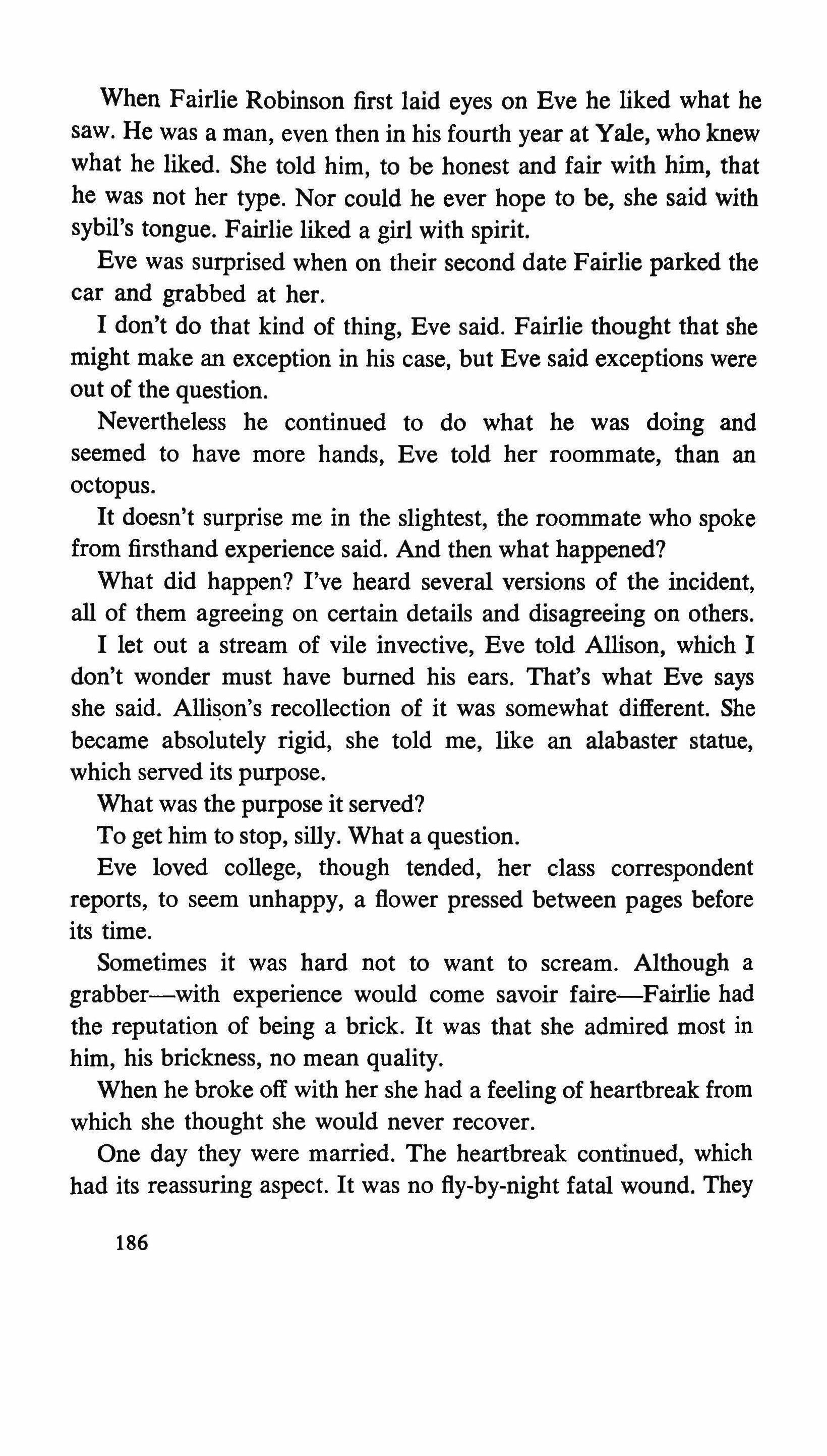
When Fairlie Robinson first laid eyes on Eve he liked what he saw. He was a man, even then in his fourth year at Yale, who knew what he liked. She told him, to be honest and fair with him, that he was not her type. Nor could he ever hope to be, she said with sybil's tongue. Fairlie liked a girl with spirit.
Eve was surprised when on their second date Fairlie parked the car and grabbed at her.
I don't do that kind of thing, Eve said. Fairlie thought that she might make an exception in his case, but Eve said exceptions were out of the question.
Nevertheless he continued to do what he was doing and seemed to have more hands, Eve told her roommate, than an octopus.
It doesn't surprise me in the slightest, the roommate who spoke from firsthand experience said. And then what happened?
What did happen? I've heard several versions of the incident, all of them agreeing on certain details and disagreeing on others.
I let out a stream of vile invective, Eve told Allison, which I don't wonder must have burned his ears. That's what Eve says she said. Allison's recollection of it was somewhat different. She became absolutely rigid, she told me, like an alabaster statue, which served its purpose.
What was the purpose it served?
To get him to stop, silly. What a question.
Eve loved college, though tended, her class correspondent reports, to seem unhappy, a flower pressed between pages before its time.
Sometimes it was hard not to want to scream. Although a grabber-with experience would come savoir faire-Fairlie had the reputation of being a brick. It was that she admired most in him, his brickness, no mean quality.
When he broke off with her she had a feeling of heartbreak from which she thought she would never recover.
One day they were married. The heartbreak continued, which had its reassuring aspect. It was no fly-by-night fatal wound. They
186

had seven idyllically happy years of marriage, but afterward the bad times covered over the good like a fat kid sitting on top of a skinny and she could hardly remember one good time. He had when making love, she remembered, more fingers than a centipede.
Here the story takes a surprising turn.
The war was over. The returning soldiers lined the streets looking for work.
When Eve left her husband-truer to say they left each other -we lost sight of her.
Only scattered reports about Eve since her breakup with what's his name. Fairlie A. Robinson, Jr.
Some notes about Fairlie's character. It is true that in his younger days he had the habit of grabbing at women in parked cars. There was more to him than that; that wasn't the whole story about him.
Before he met Eve, Fairlie used to ride around with a reckless friend. When in the course of their dalliance a woman (or women) crossed their reckless path, Fairlie would pull down his pants and show his bare behind. It was called mooning and had a brief vogue at Eastern men's colleges in the late fifties. Otherwise, he was kind, industrious, cheerful, thrifty, vaguely dishonest, and a moon among bricks.
During the second year of their marriage, two Jehovah's Witnesses came to their door, one a good-looking blond man in a sport coat and tie, the other a nondescript the blond introduced as his wife. They were very polite, asked if they might come in for a few minutes to share with the Robinsons a message of the utmost importance. They couldn't have been nicer, but Fairlie sent them packing. "We have our own religion here," he said.
"What religion do we have?" Eve asked later when there were no Witnesses. "What religion did you have in mind?"
Fairlie was watching (at the time of Eve's question) the NBC Game of the Week. "Idol worshipping. How's that?"
The next time the Jehovah's Witnesses came by, Fairlie invited them in for "a little comparative religions talk," slapping backs to
187

show there were no hard feelings. The Witnesses, who were former thieves, reconverted after an hour's dull debate, bound and gagged the Robinsons and robbed them blind.
That was how Fairlie and Eve got religion if the truth be known. They went out together as a team a few times, proselytizing in strange neighborhoods, but it didn't seem like much of a profession for college graduates. It was on the whole more satisfying to tell the story at parties where everyone laughed fit to be tied.
Wherever they went people would say, oh tell us the story of how you kids got religion.
Eve didn't particularly like the way Fairlie told the story, which was one of the side effects of the incident. It seemed unfair, since it was her idea to have the Witnesses in the first place, for him to tell the story more than she got to tell it. I mention this to indicate that even during their happy times the seeds of dissension were sowing.
Shortly after they were robbed blind, Fairlie got a job with his father's firm, clipping coupons. His mercurial rise was a legend in its own time. While he was away transacting business, Eve pursued her own interests.
One morning they woke up to find themselves in a bed of suffering married seven years. Then it was all over but the recriminations.
Eve put it down to a learning experience, though couldn't articulate what it was she had learned she hadn't already known from the word go.
A record of their next to last fight follows.
FAIRLIE: (Striding into the room) Eve, I'd like to talk to you.
EVE: (Feeling trapped by his presence, playing nervously with her hair, moving it back and forth across her shoulder) Please don't. If you go away for an hour, it doesn't matter to me where you go, I'll be gone when you get back.
FAIRLIE: (Offering a view of his erection in profile, wanting to grab her, graciously) Why should you be the one to have to leave? 188
EVE: You asked me to leave, damn it, didn't you? (Thinking of smashing him on the head with a bat, hitting him over and over, arm weary from her labors, until his head was pulp, body looped over stiffly like celluloid.)
FAIRLIE: After you, Eve, it will be hard to find someone who measures up. (When the fastball is gone, you must learn deception to stay in the big leagues, changes of pace, artifice, screwballs and knuckleballs, tricks of dispassion.)
EVE: (Made ashamed by his compliment, touched to deeper rage) I'd like to finish my packing if you don't mind.
FAIRLIE: (Promising himself that he will not grab at her no matter what, grabs her arm) Look.
(The end)
From another source we learn that Eve punches him in the stomach, Fairlie laughing holds her by the wrists as if two snakes in his hands, let's go to bed, he whispers, let's.
She would go, she thinks, if he would ask in a way that would permit her to, says under no circumstance whatsoever my god will I ever let you stick that thing in me again. Smells whisky on his familiar breath, bourbon or Irish, when he lifts her from behind and thrusts her out of the apartment without her suitcase.
I'll make a scene, she says softly, if you don't let me in this instant. Her breath coming heavy as it does in panic. You mucky bastard.
In her suitcase, finishing her packing for her, Fairlie finds a photo of another man. He studies it for some time. It's not even anyone I know, he says. It seemed unfair.
Eve comes back in say ten minutes to finish the fight. At least give me my purse, she says mournfully at the door. I don't have a cent, not a cent.
That's your tough luck, he says.
He unpacks her suitcase looking for clues. Something about her has always eluded his grasp, not everything of course-he has known her in and out for seven years.
Eve threatens to bring the police if not admitted.

189

It is a forefinger of fiction that you find what you're looking for, when not aware in advance of the hidden purpose of the quest. What Fairlie finds is an old letter-the condition of the paper indicates its age-written by Eve, apparently unsent, to someone named Harris.
Dear Harris, (So the letter begins)
It is difficult for me to write your name, a totemistic superstition no doubt. I am embarrassed that you will read the "dear" as literally as it sounds in my head when I write it. I know, though I would like to be wrong, that you will think this letter indulgent or, worse, schoolgirlish. But I want to break through to you-is there any way to do that?-to tell you who I am. God, doesn't that sound pretentious. If one day I ceased to exist would it, dear Harris, affect your life in the slightest.
When Eve let herself in with the key she had gotten from the super she discovered Fairlie reading her letter. Please give that back to me, she said. He ripped the letter in half and handed it to her. It was as if he had tom her in two. If she had had a gun she would have killed him without a qualm. Giddy, lightheaded, she whirled around and around in her imagination on perfect point, folded the two halves in half and ripped the letter evenly in quarters, then in eights. When it was like confetti she sprinkled the pieces at Fairlie as if blessing him with holy water. Still, some part of her, though she had never felt so light before, was deeply offended. She felt like a flower opened beyond any further opening, inviolable. Her sense of her own power astonished her. It was as if she were a laser beam and could bum him to dust (the thought itself erotic to her) by the merest touch. When she came toward him he actually flinched, putting his hands in front of his face. She grabbed him. What do you think you're doing? he said. She tumbled him to the floor and though Fairlie was not indifferent to the opportunity, took her pleasure by force as if it were a debt he had for seven years refused to pay. Fairlie's view of it was
190

somewhat different. As he saw it, what seemed like mysterious behavior on Eve's part had, like all things, a perfectly simple explanation. Eve had let herself go because he had showed her he cared for her by destroying the letter.
You couldn't go two steps in any direction without becoming aware of the general decline in cultural standards. Where would it all end?
He thought afterward that they might make it up, but she was afraid of the violence of her feelings (or so he interpreted her behavior) and moved out some minutes after their bout of love on the floor.
Her leaving as she did-the peculiar timing of it-embittered him, made him feel cheated. He said some nasty things about her to friends, tried unsuccessfully on more than one occasion to get her to come back. She would always hold a special place in his feelings, he thought. Was there another girl in the world like her?
They had one more fight but there was no heart in it and then by accord, perhaps merely by drift, went through with the divorce.
191
2
A. B. PAULSON

Directions for assembling
1. Remove both foldouts from magazine along perforations.
2. Cut each out on heavy black lines.
3. Fold and crease all dotted lines. (These folds must be exact.) The easiest way to do this is to place a ruler along the dotted line and trace the line by pressing firmly with a ball-point pen. Fold back, not "up." You want to keep the printed side out, and the flaps in.
4. Glue together the two flaps marked "A." Rubber cement works best. Apply it to both surfaces, let it dry some, then press together. Then glue flaps "B" and so on. (At "D" you'll notice that "DOWN" has to line up with "I saw now Now you should catch on to how the other sides have to be matched).
5. After "L" you'll be left with one triangle with no flaps. Pull it down, gluing it to area "M" so that "ma'am" lines up with "popular expression" and "they impale."
How to read it. There are three ways.
1. There are ten separate diamond-shaped stories.
2. Next, notice that you can cross over the margins to the right, and read around until you come back to where you started. These statements form continuous rings around the figure.
3. Finally try a combination of vertical and horizontal readings. Read a few lines on one triangular face, then cross over to the right to read awhile, then cross over to the right again. This way you spiral your way from top to bottom. This is a good method for two or three people to read aloud to one another. Familiar elements from each story combine themselves in new ways each time.
speak. When
labOy.fullofcuriOlity,"
II often asked
/
/quest to be
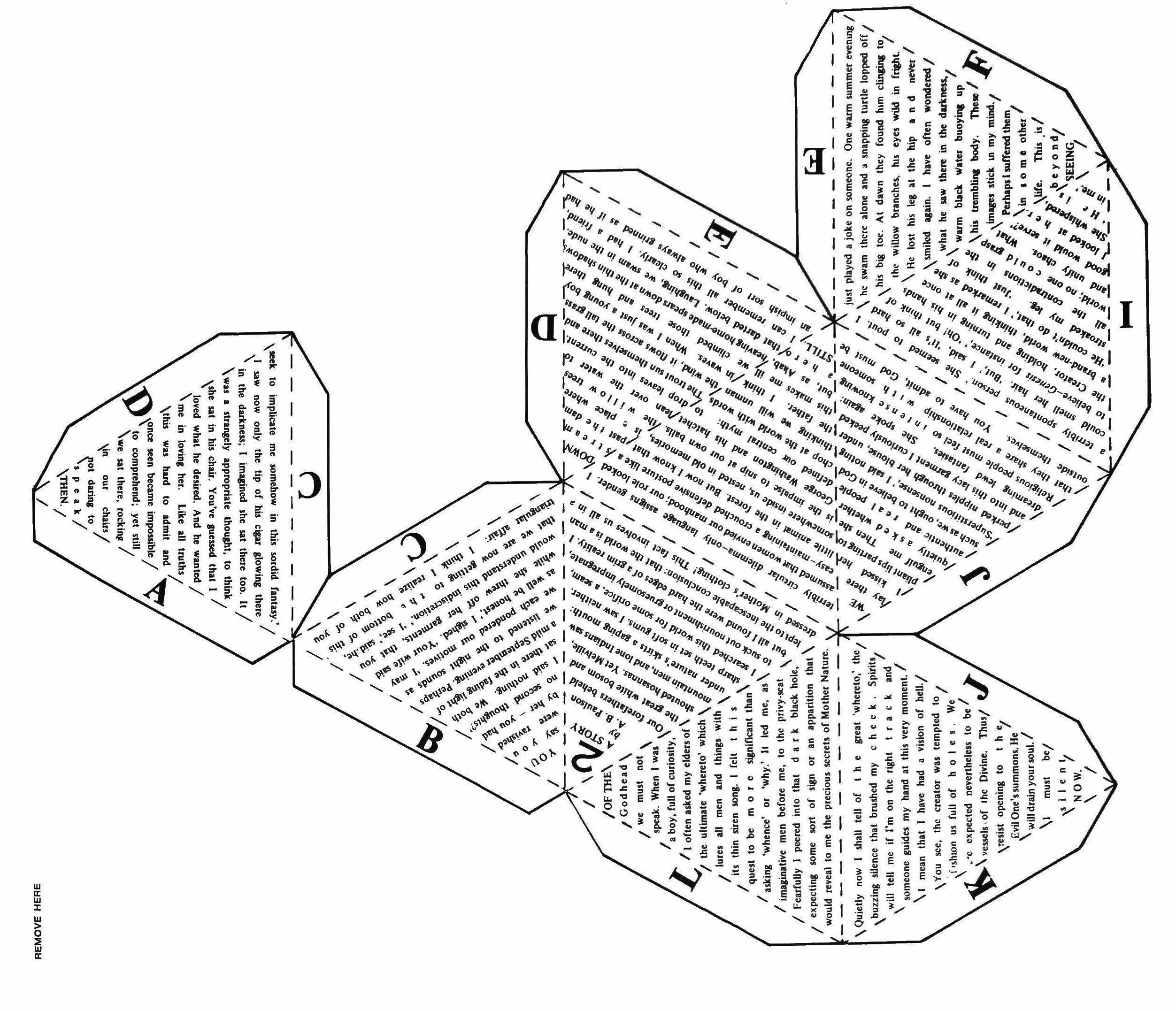
e significant
ukil1l 'whence' or 'why.' 11 led
Ifl1II1J1Itwe men before me, to the pnvy-seat
/ FearfuUy I pecroo into that dar
I .xpecti", some sort of sign or an apparition
would reveal to me the precious
,Quietly now I mall teU of the great 'whc{eto,' the/ ,buzzing silence that brushed my c h e c k, Spitit� will tell me if I'm on Ihe right t rae k and \ someone guides my hand at Ihis very moment. I \ I mean thai I have had a vblon of heU.I ,�ou see, Ihe creator was tempted 10 I \' .shoon us full of hoi e s, We
� �c expected neverthclelS to be I � , veuels·. of the Divine. Thus/ tI J � h VellSt opemng to t "l Evil One's summons, He \ will draln your soul. I \1 must bel � I len y NOW. \ I
�
/ � \ /.�r-o\ / �,'"'O � \ "'1r4", % � \ /4.. "'- �o ':t I ,,''''. � " p '), \ � �.,. ·�\V ' / "; � � �. � � .?� "- %�ot,���""\""\7/--0 � .,� ?'::'o � -� �<?,. � � I �o ,,"'i, � \\ � '\ t'\,\ 'C'� 9� \'-a.�Qo."Qo 0 .it'� 't:o \. � .; \ /"'�'� � �'<-�'", "'","0" � '}, .., 'll 'k.. '" :l> � 'I. 'l). �.\ /'?o � � t,�:c:.�..,£--� � r �'s:. !<- � 1. '" '1,." \ / 07t,.\ o���\��l;."t)� ?r �'\4';����1l:�"'\\� Q / 0.,.. � "!-\ � 0,,·1> ".�_ \ \ ��.\ .,� � � .�-.; -; � 11- r,-:. -;:: -:- z: � -._ � IF �-�7 -:§ ;;;-I-�� '1i r ��'O"" I' �� !��s�-$::1§".I:sIII S ��$/ ,\� fJ fJ�f���!t::/�q;O�'!(::i!.$t::o� '" q_ � � .:, � t::" If s » ��.. ti � .:!' ,:::, t!P Col -e / /OFTHE\ T��':I� ot?.._;; �.JP I �··f S"�'" $ / II�"'�"" t 0 � � � � � � #.�$b· .,!:::
�. �./ �. �� ("::; f ;? � r '!f:b I �../ �'lI !f (r :.f � II :;'" � � f'" -t1 �:ti /
we must net \ �� ..... s � �'lI $ I N� � � 140 .j # !jj �\� .r l: -$ # I � � t :-- I I 'i,,�.�QO�fJ"""S/b"�$ fJot'-S �'lJ �t::��:.;;
was O� � r::- � � � j:i A '!1 t; '" � .S' .r �\� � § �., � � 0 .i � � I � ooQ:lIY�" O�ON'\:��illrO"""''ti' *., �
$ !.�� i:� '$�';"'� :b.!:' .�-';: / $/� �� � It ( � i �� � � IJi � /
my elden of \ .; ;/ ;! .t" �o It" .;/ � I # "I " ! "';- � ¢ "h' § � $ $ � � c:; � ott (J ..., f;f r:: 0 � ("j \� oS �.. � 0 I
I � If.;$., OJ ot:' '�I ,:J t:: � I _� .p •••• .t � b " -s � li o!' � " fl' ",.. ",�,,, � ." \' � -4 §t ,,' '" l(t
all men and thmgs with \§/ � i �CI.$ � ot:: e- � .q;j ..,..."'" ; � '. i :s .r" .6 A � � � ,c:> b ",(j=1 1l:t�.(I"' �:So$ CJcf..d'!lr.OO I Its thin men song. I felt I his I � r.; 5:1: I .� $i � Ii � � � � f -c:- � � I
r
than' ; �.::f ti':i / �� l #� �t? �Q, It ���:s § if �CI ��l#!'>.o I
\�;::""'� l)'�"CI.::fOJ�� 'S�"'tI�!!O
me, as � � � � I IlP $ � � i II � .� :s ""'\� � �
.' � � 0 .,,'''' .� '" 0 � � ,�" '" I
I Godhead\
I
I
the ultimate 'whereto' which,
I lurel
m 0
I
I.
\oa.::f �·S �.:r.oS' "'".� '!>.� .;! �.t.I S _� \" '" .� t"��"' �$'Cl� ....-c'rJ
k black hole, .Jt(\ I / �� � .$ .§ I .f$'Q, � 0 S C' 'I ,..... ' � I
that \ -$ I .$ I l .$ f .' � ! �.;;� � � .r ...;\ � I r; � � � � :$ 0 � 0(\ � � '<:' � �
secretl of Mother Nature, \, �., �.� 0 lot rY..!i '!:: � � �;:i '" 'OJ c.i � OJ v (.i 00 �F' r tJ-!Ir. �-;; �- -" - ---:--:--- - - -!'J I �.� ";1 � J $ � l� ;§ � I -d' Just played a Joke on someone, One warm summer evenmg / \Pi ><-" � " 0 "(f"':;- / \ � J �. � � � �"'" 'h � _lb' � ott � he swam there a.lone and a snappina turtle lopped offl �. .q: ,,- I 'S' � � � � OJ ,- � b � �� fJ fJ'b fJlt � /1,;/:::1.11.," '<:' � / tf '<:'� �\hU bll toe. At dawn Ihe)' found him clin&inI t; , ;; � ;!r ! _�� !Ir. $ Ii t:: (j I .p.o 0 the wiUow branches., tus eyes wiJd in f t. \;!I"'''�''�<'.'' """\ .q: I "0' � i l r � �.l::"" � t-I � � :# 1 i'te lost his leg at the hip and ne'ler I \fJ .f � � i� �/6 � � .1 � '<" '" \smiled lI&in, I hIVe often wondered / .::f � � � I � � Q I � � � � § CI \00 � 0.::1 � � i;o r'lt:" (0 '<:.'.... 'II whit he saw there in the dukness,. � '" � � � .., � � .),.t. <' �- � 'S '" !of � \ '/ � � � r.i!f .� �� � '9 � I C? :t. 90 � h" 0 wum black wlter buo)'ina up \ t.i � .'" 'I' "If -.:....... - ,!:: or (I"' * CI P. � .::f� ht:: �� b ,,� � / ot:'· 6" f � * # :s 'hil tremblina body, ThelC I \S? q � (, � � � �. § � IP �<'i So J � ,$ � � Ill' I <t �.::f.� 1> � � � -$ i �\imqes stick 111 my mind./ \<I'�' .!, <f ,f �� �,.. ," � # ,.," � "§' Perhap.louff_them ,.. fJf.o� $' I / f�.��.� ��- .!;; tt'\in lome other I \� �oo� �� / �f.$ ���.Jj �I 0 �I "o�. fi fJ'" \ life. This isl � �... \I ti � � � � '\: , � l§' OJ � 53 0-" I i:- � at:: I ti:l' !l. t: bey 0 n d/ ;s' $ /$ of l i l � ;!> <? � Ii' �",;t<l' '�'\�EEING \0" / i � "'� 0 � l" :!,:t; §1>.IiI I' i \ 7
10� /sJttl{:)
;);)U�\...)-AIQ.
01 pm.( 111M SNI\
lIB aJl!1 'laq 311!AOI II! aur \
u �
/ 01 Suuvp
mo Ul' I iu!'IlOI 'uaql lIS aM\ IIns la.{ �puallaldwoo 01 A\ ,_� /alq!SlodUf! alU1:):Jq UaQII
pu. I!wp1
/SqlnJl
/ �lueNt. aq pUV 'J)Ql!Sap aq leqM paAOI / I lelll pananJ aA,noA '.lflq:) IN Ul III aqs\ lMtp OJ 'Iqlnotp al�dOJdde .(Ialtnlls 111M. \ / II '001 alaql lIS aqs J)Q\qIeWJ I �Slau'I.Rp aliI U'! as:tlil 1U! 0t3 l'd!l IN )0 dn ,un AJUO ou Nln 0 /:.{SIIU'J P!PIOS SNI II'! NooqawOl 3W ale:JHdWJ 01 'IaQI\

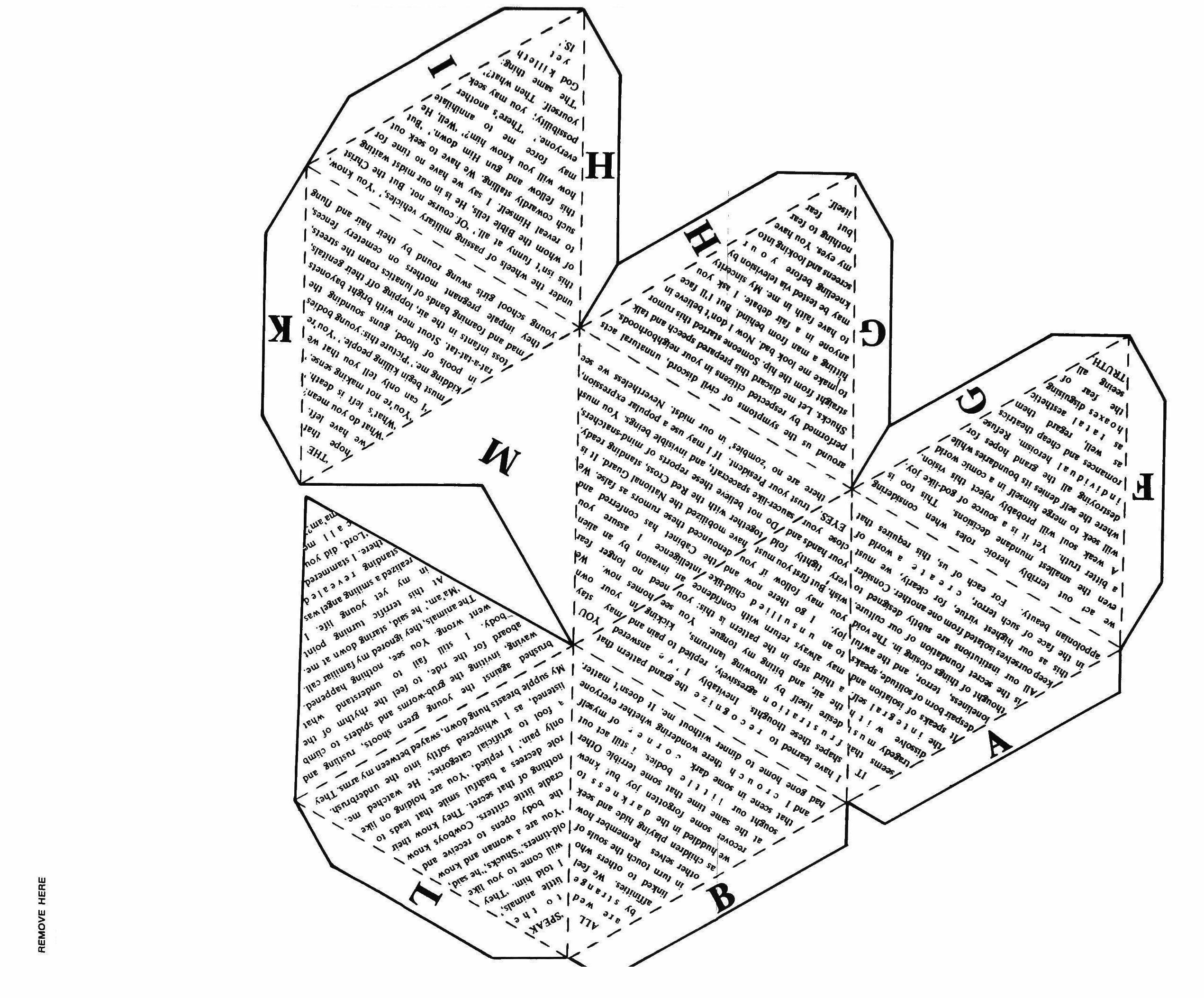
1 "� ' "", '" "'&>" ••" '" .�. 0"" 0". 1 ., .1'; " '1. "'/ .., 11'. '. '4; f� � "4� 'I. 0". '4 0" Q<>,t. ° • i.�:"'�' ,,' '" 0"""''It 6�o! '1,�
1 '0 It.:'" '<1 ,,� 0'".' 0"�<1 0" lb.",'"e. o�'"
'/' 4 1,,,"'4 ' 'It, o'h �.fi<.r0t;f<l '6.... 14'1
'41 .""�� 'CI. I� � """ "'. "'. �'" ""� ''''", 4ft (/ .• """. ""r. � t. 4t... " ''q"'.... 0, .; I"'.. ."" °lb .,� "�.J�.I< ."" � / '" '0" �-"I'l!0" / "",,<'( � it/, ° "6.1 '... / 16 TO 'lt/_" '1 � "I t. "40. "It. '-" I't. ,,0,..... /0/ " / :/ / / .; -( " ./ /.... 0/Jo Iff: 1 ';<''''"�'' 4. I� 1 .L orr. .,1). tI. "e �, /. ., 0". "'$ 0.y. len ';.fJ. "'''' c.� "" "r, 0" '" � /" I;' Q'Q'J," 'I 6&,.. 0'1" 0, is ("<ill' �,., b.."e '''i'' '" <1." .; /", 10_. ""'� ""'. "'� � �4&' "" oti"e "4,.1 / "'0 14 '<1." '''r.� "'� 0, 6 �"'" "e/Jo "'0" """'" 'I , "�e '''''' '110.:- i� S'o"f�""'" '.I�i O,,'� ,q., .:.. "'"<I 0,. -". f<l ",' d' "'.. 'r. ..•
1 "'C4 '" .�II,,,' "1. �''It' 6 ,. c,", '4. "ifllt ,. "0 ..,,_�. "'"..... "to .b.." "i. -""" 'BM vI." "'4, ,,� '... ·""f. 1<1 t;,,,,"It1;. '11:,,,,."0,, "',' � t;, 0... 0....' 'I. '"" '4, ." �c. 1 HI"', "'ill .��''''iw. " '" �o� C/e�. <1 I)" � "'0 v '" • 01 0" II" .�' 'It 1 I'."" 'o,�"t"d'I,,, ,,' <! •• ''''lit f 'h. 0" � ""o,,� o .,,,·•• �o·f (\�o ""6 � •. "'. 4' '" <10'° 'it" i, �., � "'0 tlI, 1"A.. ,""? .... " � r. "It " ........... 0 ",.0°," 1"1-<1 11." '""'0,, :.. '��",'It, It. �'" "� .; c.,; ..", �." "'� �0'4. "-I.; / 1 L' "'01""·'/ )' '<iII 'h" -,? it/ ., '1 'It,. / � Is. 4/ 'f" .;
K
,/ ./ " 1t / � �. -11.1. I",,��,,� e� /�. oq, ,,,., ./ ,� ��""/� f,. '<11, 0 $'�." � "� 0,,,,, f" � • � �.. i."'" A.... ) / ./ �C� '",,""O'OO� ",.:"1""" ",<$<" 0""'II-<'-� ./ ,,, " '�It. "c4 q.... "'" \ ,0-1> ,0 i ". "..f>',..' / .., 14 ." <1�" ,,'40'" 1 co� C+-�' �o <, / IA "&t' .., "" "4 «e .., "0 "'� ".. � b � u ._" r • " • .._.' .-. � c .' �.v' � o,,� "'«." r. (4. ". <Ii "''''' 'o'f �b-"<" ",0"- ,.0' v 0 �, /' ,.,� ,,,, ' � ..-' � /,:... r» 1 '. ,'" " •• :...:. ' : ..';"-0.......:: ' ",'"" C�"', ,",' v "';--. <, "'l L' _' ..>:» '. ".">,, '" .'.r ." ...... A<, "" ::;;-. ''':'';0..� ,.......... ..:: :: to """'. '"" :." "" ..,•• "'"/� A .... �··' .... , to ," =, , , .... , ••• ',"'., •• "' / /." ::''!'��¥:<:��,;;, S'.,'.�.';:..:: <: ' : -;,-;".�,.;".r-;-""; � "., •• � ", -,., c: ->. •• �••• -",.••• , / ," ,.' .;;: ..,' ....:.••:" <, ' ,F .,' / / ,.' /' ,,'_ .,' " or ' "¢� , �...,.� ,� ' ":'" � :/ ,; :,.. _''': .,,' I .... � , , .......:::....... ..::......;;.. " :.� ;" " • "'. ' :::' .' .�>/' ":.... -:. ,"" • -:,..-: I_ 6" '40 0", t....... "'0, �"o: ,,;;.;:;<1":;"'''It.!'; ,'...... :;-........ " ...;:... </ • " '" ,¥'" ,,�,_,,< I' .......... ' ... '. ... �' �. '.,' '. '. " ..., � / .-< F " ,. .",,' ,.' •• " 1 "'�':" :�...;; � �.::. Sl��;�:.�..:.,.1.'"»';-1 "''"'\.:.....;�,f.'�;::.;-: ':'-�":...;� ::; , ... , ,:" ,';;0::$;;::'...;.�/::..:':::";,':::: � ",-;; ;:.",; <"�;, F' .. """ J'&,.::-.... .... ' ""� �,...,,,,:.f".... c ......... 64>'It; "" 1" � <$<; ��,<$<"'..".<�'. I <1.'" v ..", � , -,. I ,,-'... ' •• ,.' .' ," • '" " ... "" " � h'" � '/. ' .... '" ".' ,,'� '" ,# .'" .... • ",'" ' / ' �. ••• -, ,< ," • '" " '" '" /" ""h" ... �".' ...... ",' "., • _,' .' �.. • '_ � ,U' <$<' "" ""I!'I. � t'l:o" ._/ ' ." � , •• '.� ,'" " I • .' ,-., ,... 0.... • .," �. •••• "" c- ," ,..,. �� '" '" ,<" I," ., '" '. / '" � , '. � " � "�" ,. y I.�""" '" ' "': '1 I�",_'''''""'4._""'1c "'/ � 1S"Of. "" 6 ' ' '" ° "'�,."'6,. '/' ""'><1,'It,"" ",y �7 ,' •• ",., '.� '" �7 <., ' '" '., " "". " .... v 'Z'''' ;-,;,.' , .""...... ' " '''\- "'. I�.��""""i>q...., "'4•...."It. "''''Ii """'0 '" ""'t 10. So Pit.'� .I< '''''o'lt' 1 ....... <rio"
.'1
�
-'"
�" "". '" •• '","'A 0 ,._,� ',,,' j A '",,, � ""4,_ '", -"'" c� �o � , t"..,""It. -, � <1.6"'1r1: ,o,,�
G1/O""',,"""'6 "'..,iO Oq,'",
4. '0
",.
'>e
// '" � � % m JI m

The last poetry reading M. G. STEPHENS

Crap, I can't read your writing, the woman dressed in denim said to the other woman dressed all in denim, both of them sitting across from me. Send me your poems on silver platters from the snack bar, Alcachofa, Alcachofa. Crap, I just can't read this stuff; while further down the bench one attractive woman dressed like a rich gypsy from Fifth Avenue was arguing with a homely butch, Where will you be when I am graceless and alone? You look like dog pie or moon pie and yet you want to call yourself my sister, you want me to be political and alive to your body, then you eat those Snicker candy bars all day; you smear chocolate and sesame tahini on my poetry manuscripts, and you drink my beet juice because writing makes you hungry and thirsty. Entertaining myself like a doorman in an elevator, she said. So what's your excuse. They are good women; they like to fish and dance and be macho, the poetess B. Water said. Beautiful pulsing vulvas, this heavy vaginal wave we are riding. B. was stealing the show from the other poets she was to read with that night: Arthur Wilde, a Berkeley street poet; Bernard Inglenook, an English minimalist like his American counterpart Arthur Wilde; and my friend Tom-these names fictions of prose justice. B. was dressed in a black continental men's
TriQuarterly 193

suit that was wrinkled and smelled of sleep, her hair was done in a DA, very 1953 men's rock style, and she was kissing and welcoming many beautiful (what 1 thought were) lesbian women, most wearing furs and high burgundy colored suede boots that came to their kneecaps with tight velvet black pants tucked into their boots, wearing hats with feathers and see through blouses with heavy knit sweaters under these see through blouses. They collectively wore much jewelry, nothing expensive but everything gaudy and large in quantity and glitter; rings, earrings, necklaces, wrist bands, and much eye shadow, purpurate circles about a quarter inch thick from any radii from the eyeball, with the eye at the vortex of these shadows like omniscient black-eye peas. 1 am immortal; 1 am too old to care what people think anymore about my writing. There was also a man wearing a green turtle-neck sweater and a white winter wool suit; a twitching young man with coke bottle lenses in his glasses, a scruffy beard, and BO that was driving everyone in the poetry store room to distractions worthy of prose. What was I going to say? Yes, the bald man in the white wool winter suit and the green turtle-neck said: "Our wives are playing poker and drinking." The young man said: "I meet my mistress the night my wife goes to her women's lib meeting." While at the door, there stood the poetry store owner, a heavy set Sephardic type, throwing over the pot with the money for the poets, and saying: "The poets are not getting paid tonight." He walked over to the counter and poured the contents of the poets' pot on the counter. "Give everyone back their money and we'll have the reading for free." This never occurred. The Italian poet menaced people at the door, and 1 realized then his violence was purposeless and he was completely drunk. He pushed an elegant old lady with a face from a cameo and tried to punch a student who wore fatigues and who wore a button on his lapel that said Super Badd. The two last people had paid and were about to sit down on a wooden bench when this incident occurred.
Wilde Beeste, 1 was broken and alone, hungry and without friends; it was New York City, no place to be in a state like this;
194
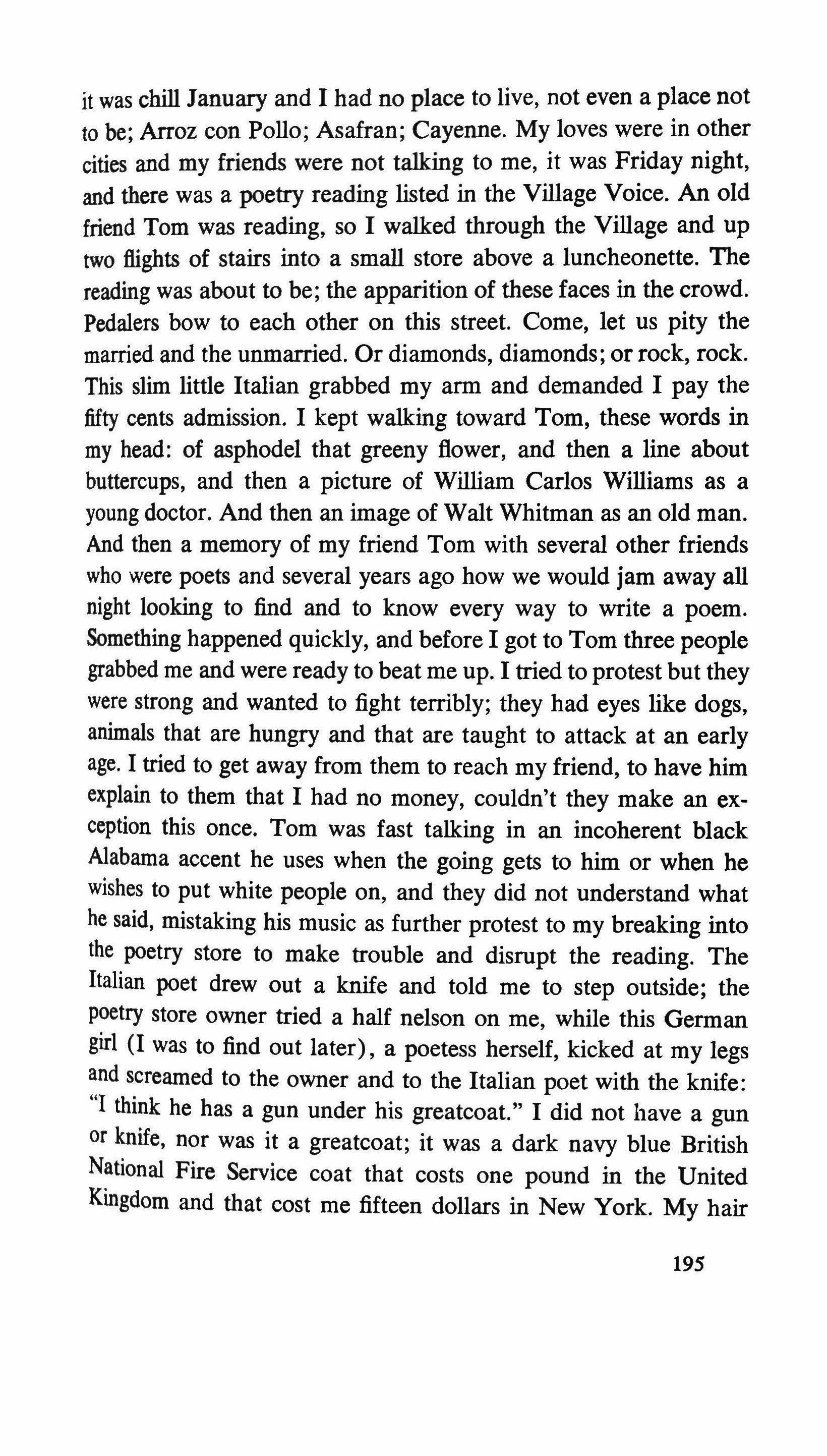
it was chill January and I had no place to live, not even a place not to be; Arroz con PolIo; Asafran; Cayenne. My loves were in other cities and my friends were not talking to me, it was Friday night, and there was a poetry reading listed in the Village Voice. An old friend Tom was reading, so I walked through the Village and up two flights of stairs into a small store above a luncheonette. The reading was about to be; the apparition of these faces in the crowd. Pedalers bow to each other on this street. Come, let us pity the married and the unmarried. Or diamonds, diamonds; or rock, rock. This slim little Italian grabbed my arm and demanded I pay the fifty cents admission. I kept walking toward Tom, these words in my head: of asphodel that greeny flower, and then a line about buttercups, and then a picture of William Carlos Williams as a young doctor. And then an image of Walt Whitman as an old man. And then a memory of my friend Tom with several other friends who were poets and several years ago how we would jam away all night looking to find and to know every way to write a poem. Something happened quickly, and before I got to Tom three people grabbed me and were ready to beat me up. I tried to protest but they were strong and wanted to fight terribly; they had eyes like dogs, animals that are hungry and that are taught to attack at an early age. I tried to get away from them to reach my friend, to have him explain to them that I had no money, couldn't they make an exception this once. Tom was fast talking in an incoherent black Alabama accent he uses when the going gets to him or when he wishes to put white people on, and they did not understand what he said, mistaking his music as further protest to my breaking into the poetry store to make trouble and disrupt the reading. The Italian poet drew out a knife and told me to step outside; the poetry store owner tried a half nelson on me, while this German girl (I was to find out later), a poetess herself, kicked at my legs and screamed to the owner and to the Italian poet with the knife: "I think he has a gun under his greatcoat." I did not have a gun or knife, nor was it a greatcoat; it was a dark navy blue British National Fire Service coat that costs one pound in the United Kingdom and that cost me fifteen dollars in New York. My hair 195
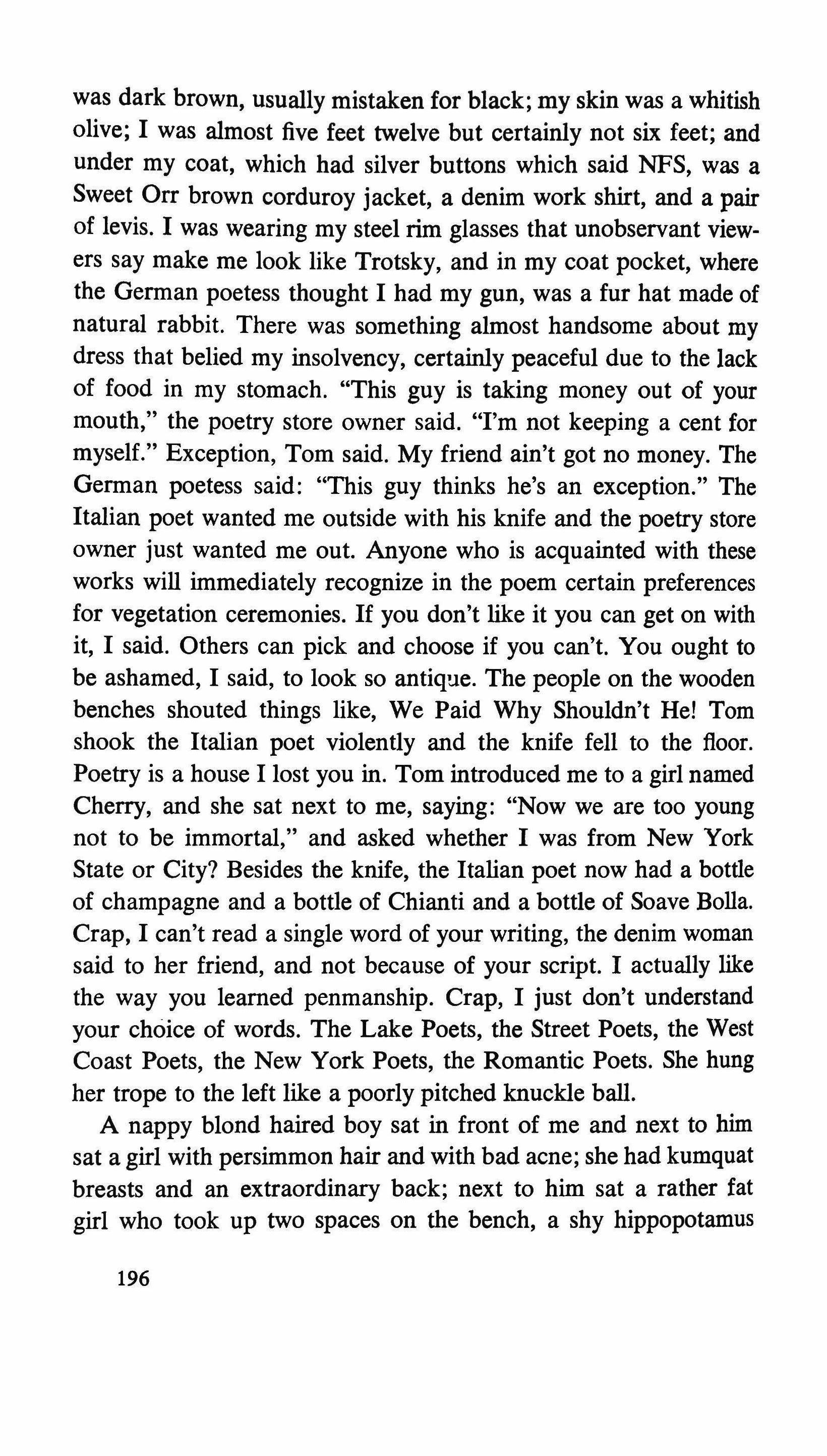
was dark brown, usually mistaken for black; my skin was a whitish olive; I was almost five feet twelve but certainly not six feet; and under my coat, which had silver buttons which said NFS, was a Sweet Orr brown corduroy jacket, a denim work shirt, and a pair of levis. I was wearing my steel rim glasses that unobservant viewers say make me look like Trotsky, and in my coat pocket, where the German poetess thought I had my gun, was a fur hat made of natural rabbit. There was something almost handsome about my dress that belied my insolvency, certainly peaceful due to the lack of food in my stomach. "This guy is taking money out of your mouth," the poetry store owner said. "I'm not keeping a cent for myself." Exception, Tom said. My friend ain't got no money. The German poetess said: "This guy thinks he's an exception." The Italian poet wanted me outside with his knife and the poetry store owner just wanted me out. Anyone who is acquainted with these works will immediately recognize in the poem certain preferences for vegetation ceremonies. If you don't like it you can get on with it, I said. Others can pick and choose if you can't. You ought to be ashamed, I said, to look so antique. The people on the wooden benches shouted things like, We Paid Why Shouldn't He! Tom shook the Italian poet violently and the knife fell to the floor. Poetry is a house I lost you in. Tom introduced me to a girl named Cherry, and she sat next to me, saying: "Now we are too young not to be immortal," and asked whether I was from New York State or City? Besides the knife, the Italian poet now had a bottle of champagne and a bottle of Chianti and a bottle of Soave Bolla. Crap, I can't read a single word of your writing, the denim woman said to her friend, and not because of your script. I actually like the way you learned penmanship. Crap, I just don't understand your choice of words. The Lake Poets, the Street Poets, the West Coast Poets, the New York Poets, the Romantic Poets. She hung her trope to the left like a poorly pitched knuckle ball. A nappy blond haired boy sat in front of me and next to him sat a girl with persimmon hair and with bad acne; she had kumquat breasts and an extraordinary back; next to him sat a rather fat girl who took up two spaces on the bench, a shy hippopotamus
196
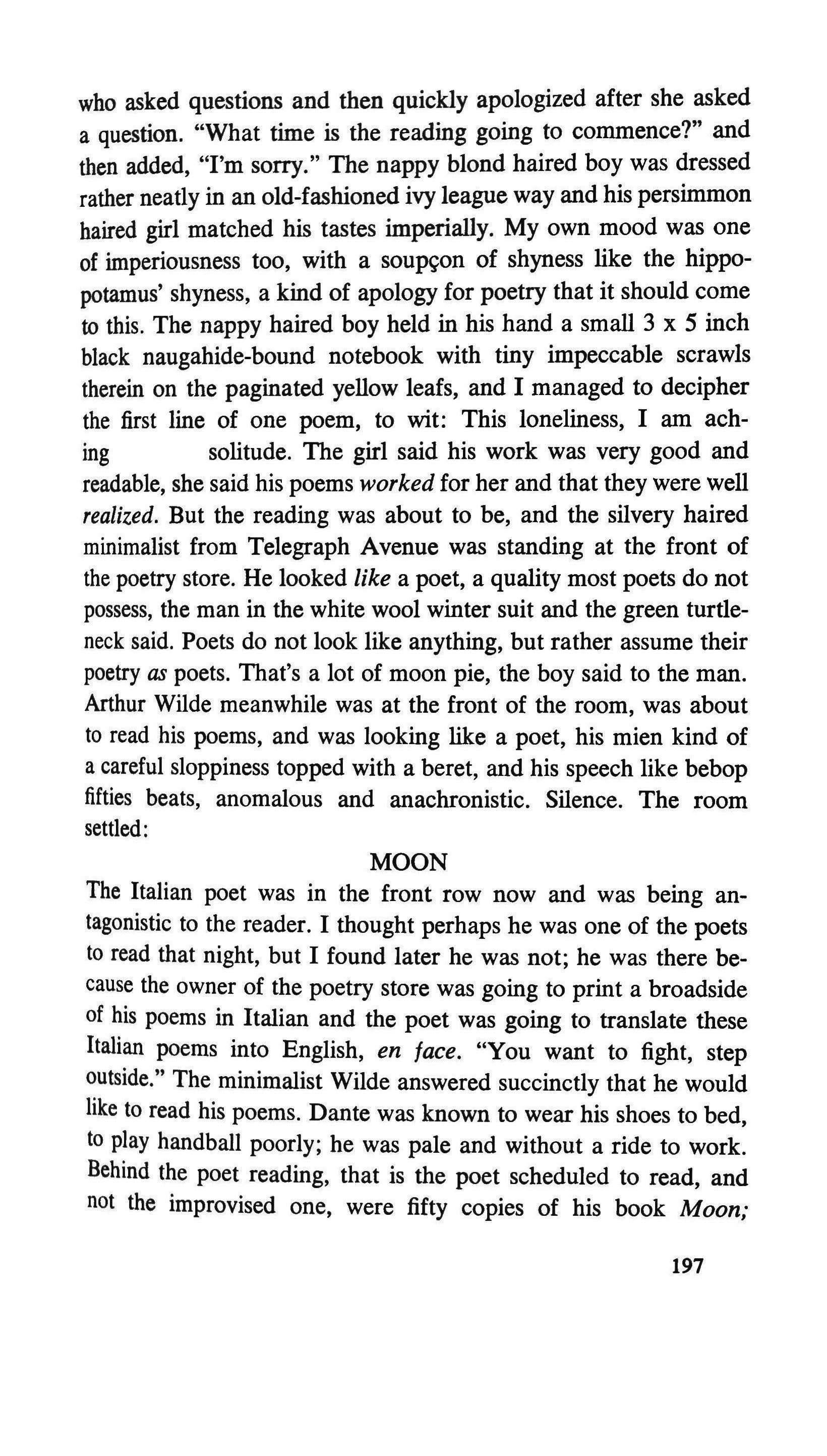
who asked questions and then quickly apologized after she asked a question. "What time is the reading going to commence?" and then added, "I'm sorry." The nappy blond haired boy was dressed rather neatly in an old-fashioned ivy league way and his persimmon haired girl matched his tastes imperially. My own mood was one of imperiousness too, with a soupcon of shyness like the hippopotamus' shyness, a kind of apology for poetry that it should come to this. The nappy haired boy held in his hand a small 3 x 5 inch black naugahide-bound notebook with tiny impeccable scrawls therein on the paginated yellow leafs, and I managed to decipher the first line of one poem, to wit: This loneliness, I am aching solitude. The girl said his work was very good and readable, she said his poems worked for her and that they were well realized. But the reading was about to be, and the silvery haired minimalist from Telegraph Avenue was standing at the front of the poetry store. He looked like a poet, a quality most poets do not possess, the man in the white wool winter suit and the green turtleneck said. Poets do not look like anything, but rather assume their poetry as poets. That's a lot of moon pie, the boy said to the man. Arthur Wilde meanwhile was at the front of the room, was about to read his poems, and was looking like a poet, his mien kind of a careful sloppiness topped with a beret, and his speech like bebop fifties beats, anomalous and anachronistic. Silence. The room settled:
MOON
The Italian poet was in the front row now and was being antagonistic to the reader. I thought perhaps he was one of the poets to read that night, but I found later he was not; he was there because the owner of the poetry store was going to print a broadside of his poems in Italian and the poet was going to translate these Italian poems into English, en face. "You want to fight, step outside." The minimalist Wilde answered succinctly that he would like to read his poems. Dante was known to wear his shoes to bed, to play handball poorly; he was pale and without a ride to work. Behind the poet reading, that is the poet scheduled to read, and not the improvised one, were fifty copies of his book Moon; 197
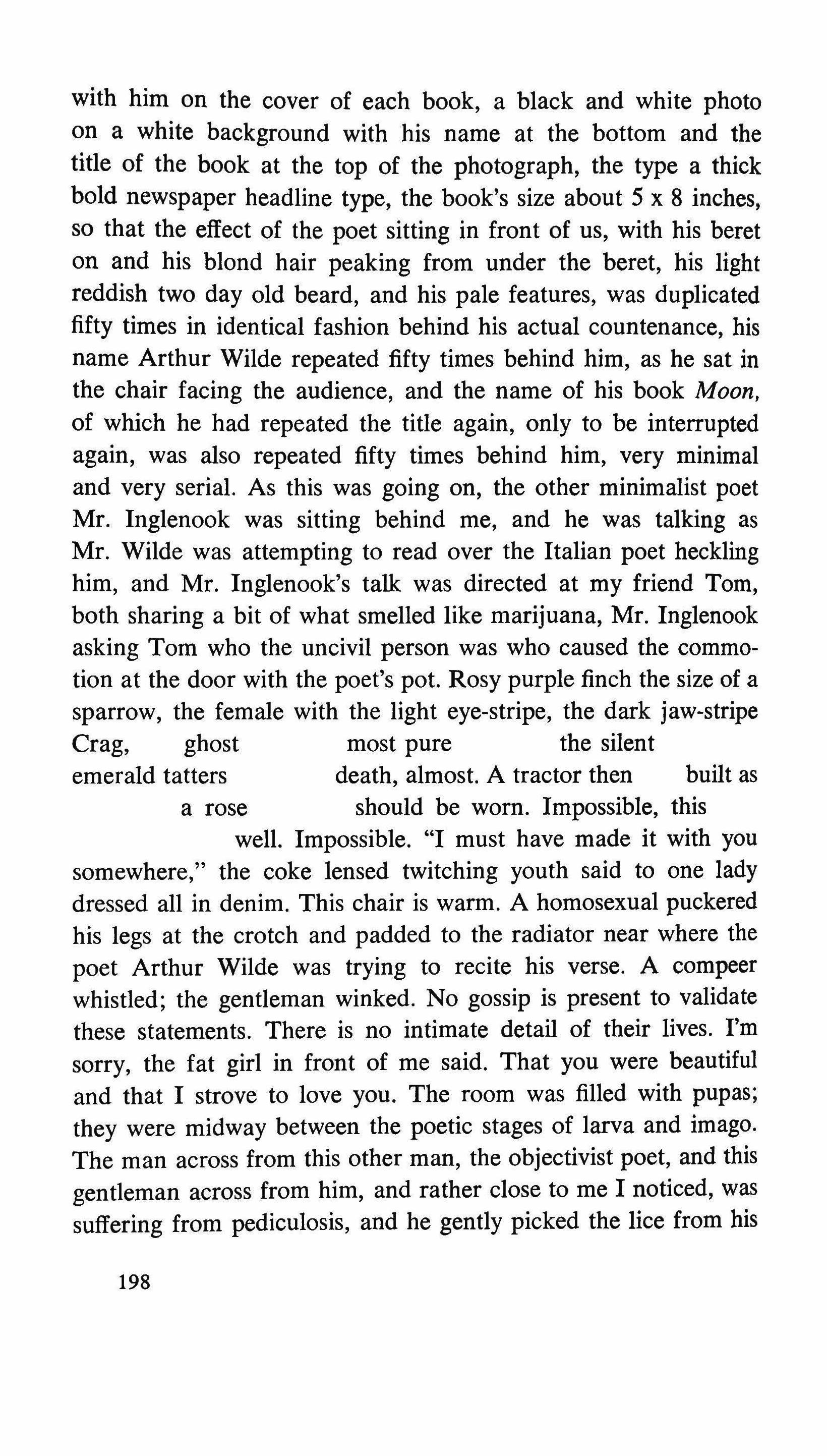
with him on the cover of each book, a black and white photo on a white background with his name at the bottom and the title of the book at the top of the photograph, the type a thick bold newspaper headline type, the book's size about 5 x 8 inches, so that the effect of the poet sitting in front of us, with his beret on and his blond hair peaking from under the beret, his light reddish two day old beard, and his pale features, was duplicated fifty times in identical fashion behind his actual countenance, his name Arthur Wilde repeated fifty times behind him, as he sat in the chair facing the audience, and the name of his book Moon, of which he had repeated the title again, only to be interrupted again, was also repeated fifty times behind him, very minimal and very serial. As this was going on, the other minimalist poet Mr. Inglenook was sitting behind me, and he was talking as Mr. Wilde was attempting to read over the Italian poet heckling him, and Mr. Inglenook's talk was directed at my friend Tom, both sharing a bit of what smelled like marijuana, Mr. Inglenook asking Tom who the uncivil person was who caused the commotion at the door with the poet's pot. Rosy purple finch the size of a sparrow, the female with the light eye-stripe, the dark jaw-stripe Crag, ghost most pure the silent emerald tatters death, almost. A tractor then built as a rose should be worn. Impossible, this well. Impossible. "I must have made it with you somewhere," the coke lensed twitching youth said to one lady dressed all in denim. This chair is warm. A homosexual puckered his legs at the crotch and padded to the radiator near where the poet Arthur Wilde was trying to recite his verse. A compeer whistled; the gentleman winked. No gossip is present to validate these statements. There is no intimate detail of their lives. I'm sorry, the fat girl in front of me said. That you were beautiful and that I strove to love you. The room was filled with pupas; they were midway between the poetic stages of larva and imago. The man across from this other man, the objectivist poet, and this gentleman across from him, and rather close to me I noticed, was suffering from pediculosis, and he gently picked the lice from his
198

beard, scrunching them between thumb and index finger, eyeing them, and then popping the lice into his mouth, very degage. The bluebottle maggot can split its skull and form a hernia between the two heads, and with this hernia, let it swell up, then diminish, then swell like a pump or drill, which is its purpose for exits in tight situations. People wondered why he signed his name Hymen instead of Luke. Mr. Inglenook tapped me on the shoulder and asked whether I would pay the 50 cents admission fee, since I was also taking money, as the poetry store owner said earlier, out of his mouth. Tom tried to explain again, and again communication was fraught with shortcomings. "Mario put in a dollar for him." Inglenook looked at the soubrette Cherry and inquired whether she was my girl friend. "I am not," she said, and she sat there pertly, fidgeting, and waiting for the reading to get it on. Sprittle little quickie, Boogie. The Italian poet started again and Arthur Wilde walked to the back of the room. The poetry store owner walked to the front of the room, attempting to pick up the Italian poet under the arms and to escort him out the door. Dignity, he screamed, the Italian poet! "This is the first time in fifteen years of running the poetry store that I have had to throw out a visiting poet and I'm supposed to print a book of his poems next month." More women in furs entered the poetry store and they sat on the floor toward the back of the room, or they recognized a woman friend, then embraced and kissed warmly and many more were kissing sexually and even many more than that were grabbing parts of other women's bodies to the approval of the darkly dressed B. Water. She's got a lot of balls, she said. Wilde was in the back of the room saying he would not read because the purpose of his poems was to get across those long silences. Instead B. stood to read. "This poem is dedicated to that bitch Marilyn in the back row." Her poems were not poems at all, one of the women said, she was dressed in furs, burgundy colored suede boots, black velvet pants with see through blouse and under the see through blouse a heavy dark wool sweater, she said. These are rock and roll lyrics about evil, morphine, death, vulvas, and various historical women, all of whom B. says are lessies. Women applauded, 199
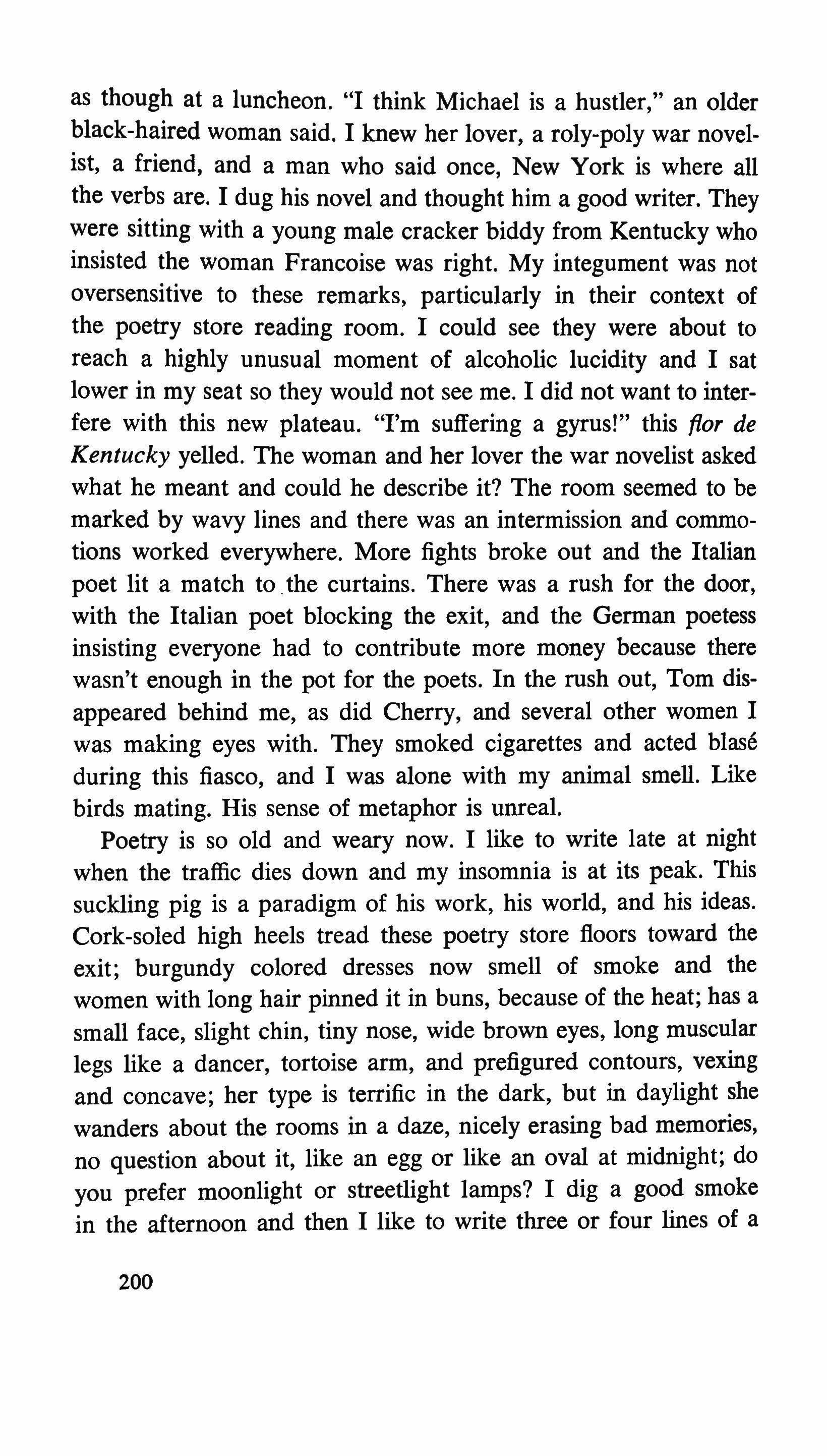
as though at a luncheon. "I think Michael is a hustler," an older black-haired woman said. I knew her lover, a roly-poly war novelist, a friend, and a man who said once, New York is where all the verbs are. I dug his novel and thought him a good writer. They were sitting with a young male cracker biddy from Kentucky Who insisted the woman Francoise was right. My integument was not oversensitive to these remarks, particularly in their context of the poetry store reading room. I could see they were about to reach a highly unusual moment of alcoholic lucidity and I sat lower in my seat so they would not see me. I did not want to interfere with this new plateau. "I'm suffering a gyrus!" this flor de Kentucky yelled. The woman and her lover the war novelist asked what he meant and could he describe it? The room seemed to be marked by wavy lines and there was an intermission and commotions worked everywhere. More fights broke out and the Italian poet lit a match to the curtains. There was a rush for the door, with the Italian poet blocking the exit, and the German poetess insisting everyone had to contribute more money because there wasn't enough in the pot for the poets. In the rush out, Tom disappeared behind me, as did Cherry, and several other women I was making eyes with. They smoked cigarettes and acted blase during this fiasco, and I was alone with my animal smell. Like birds mating. His sense of metaphor is unreal.
Poetry is so old and weary now. I like to write late at night when the traffic dies down and my insomnia is at its peak. This suckling pig is a paradigm of his work, his world, and his ideas. Cork-soled high heels tread these poetry store floors toward the exit; burgundy colored dresses now smell of smoke and the women with long hair pinned it in buns, because of the heat; has a small face, slight chin, tiny nose, wide brown eyes, long muscular legs like a dancer, tortoise arm, and prefigured contours, vexing and concave; her type is terrific in the dark, but in daylight she wanders about the rooms in a daze, nicely erasing bad memories, no question about it, like an egg or like an oval at midnight; do you prefer moonlight or streetlight lamps? I dig a good smoke in the afternoon and then I like to write three or four lines of a
200

poem, say something about my condition and then walk around the park looking for young boys to make model airplanes with. What do you think of the vibration he gives off? "I'll introduce you to her work at the next meeting." They were singing, like passengers on the sinking Titanic. She says she feels oblique, unfulfilled, unreal. It seems as though an hour has passed and we still inhabit the divine sepulcher in the hallway, and we are only trying to make our way down the last flight of stairs to the street. The fire has been extinguished and the pushing has slackened. "I eat cheese, bicycle ride for an hour, come home again, and go to the Carmine Street pool for a swim." She responds in real life at the banister by reading my thoughts and shaking them off her coat like loose hairs from an old lover. There is a quincunx of people at the base of the stairs and they are the ones impeding the flow of the exiting poets and their friends. She is not. They are talking, the three who maligned me earlier, about being fat and feminine and their favorite books, about shrinks and women's groups, or about restaurants, superintendents and landlords; about Con Edison and the N.Y. Telephone Company. Others are talking about fucking, for instance, Fuck! as an exclamation of their frustration at not being able to get from point A of the poetry store to point B of the night life on the street. No one knows me here and being anonymous for a writer can encompass the best years of his or her life. There is a craney pale woman in front of me and she has brillo type hair and a crutch, and when 1 am pushed from the rear my groin nudges her sharp boned pelvic region, and although she is being turned on, it is hurting my groin. It all seems fortuitous, this night and its panoply of sounds; 1 will be tenacious and hold fast to my position on the stairway, and 1 will continue to be imperious, and when 1 get to the street, 1 will walk away from this crowd as though they were any other crowd in New York City; apropos the poems, 1 have yet to send them off for publication. o waitress, 0 taxi, 0 bartender! How impertinent and simplistic of me; so sophisticated and so cool. All men are perfect, a great poet once said, and all women are perfect too.
201
from Love zap
HENRYH.ROTH

Only a few blocks away under a narrow overpass was a superhighway so the vague hum of traffic soared continually like a relentless transistor over the neighborhood and town; burning rubber exhaust puffs could easily be detected and the cackling cry of ambulances and police cars were heard if you listened. But Helen and Alan were rigid in the posture of all landowners, denying any flaw near their homesite and never once hinting the turnpike's presence. However, Sunny liked its grubby nearness and could tell time fairly accurately by the volume of clamor-early in the morning and very late at night heavy trucks bruited along and occasionally the house trembled at modem man's ferocious gallop to tunnels and bridges. This morning the real hum had vanished, it was beginning of commuter time, still very early though when the railway express truck clattered up the driveway everyone in the house could clearly hear something being dragged across the lawn, then lugged up porch steps and flung against the screen door. No one called out, Sunny could hear no other sound; he reached for his jeans and shirt-by the time he
202
TriQuarterly
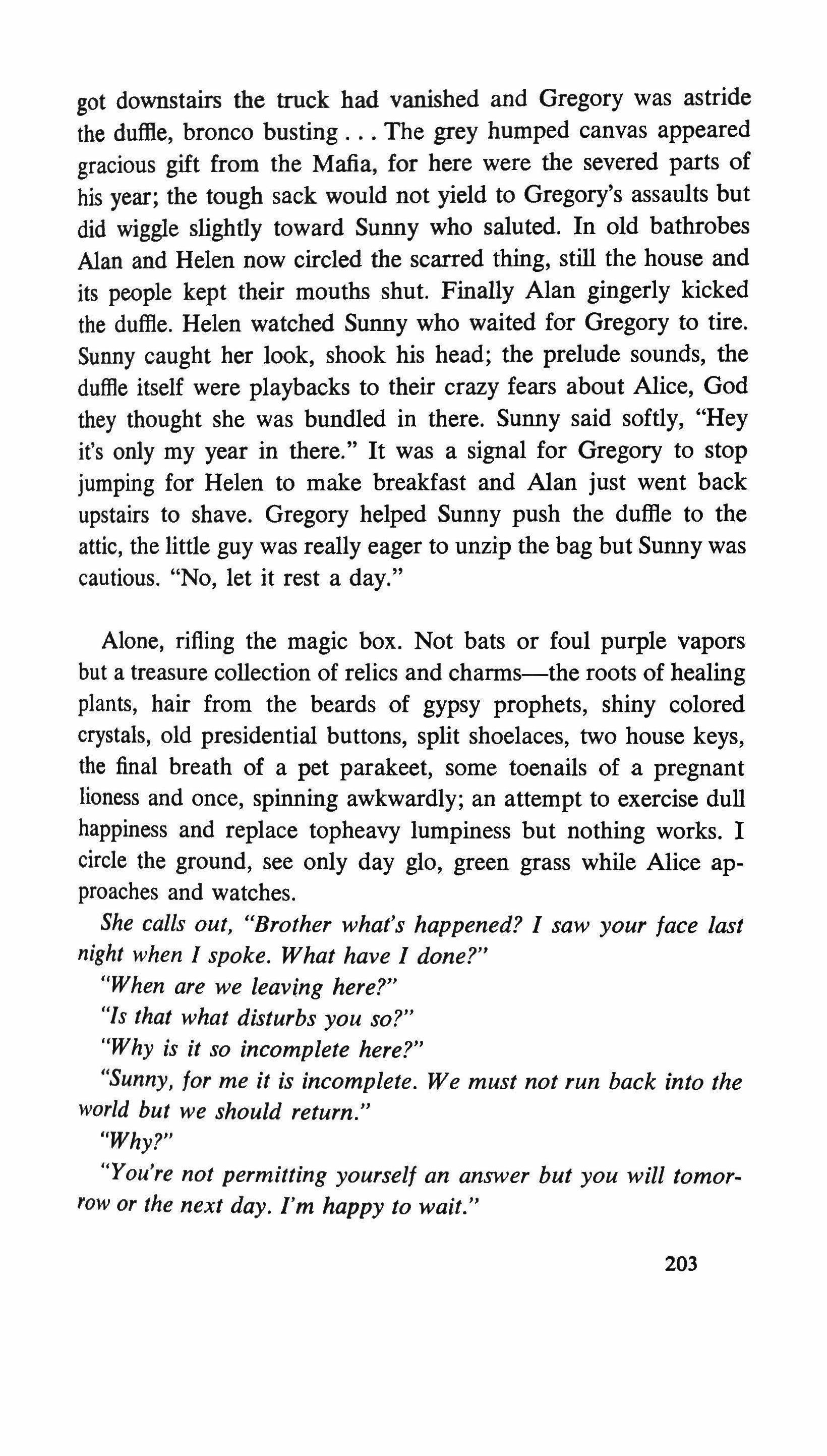
got downstairs the truck had vanished and Gregory was astride the duffie, bronco busting The grey humped canvas appeared gracious gift from the Mafia, for here were the severed parts of his year; the tough sack would not yield to Gregory's assaults but did wiggle slightly toward Sunny who saluted. In old bathrobes Alan and Helen now circled the scarred thing, still the house and its people kept their mouths shut. Finally Alan gingerly kicked the duffie. Helen watched Sunny who waited for Gregory to tire. Sunny caught her look, shook his head; the prelude sounds, the duffle itself were playbacks to their crazy fears about Alice, God they thought she was bundled in there. Sunny said softly, "Hey it's only my year in there." It was a signal for Gregory to stop jumping for Helen to make breakfast and Alan just went back upstairs to shave. Gregory helped Sunny push the duffie to the attic, the little guy was really eager to unzip the bag but Sunny was cautious. "No, let it rest a day."
Alone, rifling the magic box. Not bats or foul purple vapors but a treasure collection of relics and charms-the roots of healing plants, hair from the beards of gypsy prophets, shiny colored crystals, old presidential buttons, split shoelaces, two house keys, the final breath of a pet parakeet, some toenails of a pregnant lioness and once, spinning awkwardly; an attempt to exercise dull happiness and replace topheavy lumpiness but nothing works. I circle the ground, see only day glo, green grass while Alice approaches and watches.
She calls out, "Brother what's happened? I saw your face last night when I spoke. What have I done?"
"When are we leaving here?"
"Is that what disturbs you so?"
"Why is it so incomplete here?"
"Sunny, for me it is incomplete. We must not run back into the world but we should return."
"Why?"
"You're not permitting yourself an answer but you will tomorrow or the next day. I'm happy to wait."
203
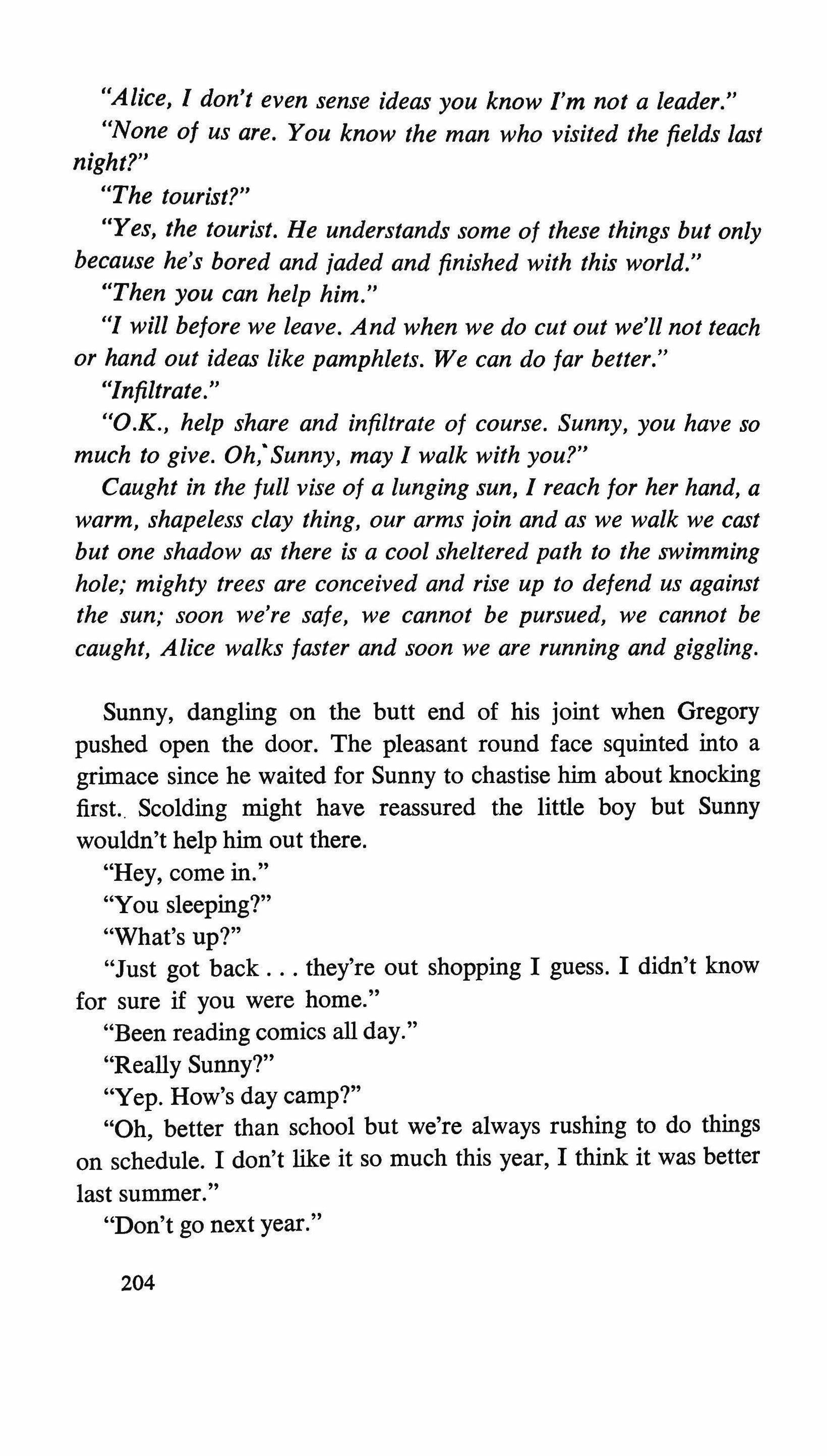
"Alice, l don't even sense ideas you know I'm not a leader."
"None of us are. You know the man who visited the fields last night?"
"The tourist?"
"Yes, the tourist. He understands some of these things but only because he's bored and jaded and finished with this world."
"Then you can help him."
"I will before we leave. And when we do cut out we'll not teach or hand out ideas like pamphlets. We can do far better."
"Infiltrate."
"O.K., help share and infiltrate of course. Sunny, you have so much to give. Oh,Sunny, may I walk with you?"
Caught in the full vise of a lunging sun, I reach for her hand, a warm, shapeless clay thing, our arms join and as we walk we cast but one shadow as there is a cool sheltered path to the swimming hole; mighty trees are conceived and rise up to defend us against the sun; soon we're safe, we cannot be pursued, we cannot be caught, Alice walks faster and soon we are running and giggling.
Sunny, dangling on the butt end of his joint when Gregory pushed open the door. The pleasant round face squinted into a grimace since he waited for Sunny to chastise him about knocking first. Scolding might have reassured the little boy but Sunny wouldn't help him out there.
"Hey, come in."
"You sleeping?"
"What's up?"
"Just got back they're out shopping I guess. I didn't know for sure if you were home."
"Been reading comics all day."
"Really Sunny?"
"Yep. How's day camp?"
"Oh, better than school but we're always rushing to do things on schedule. I don't like it so much this year, I think it was better last summer."
"Don't go next year."
204
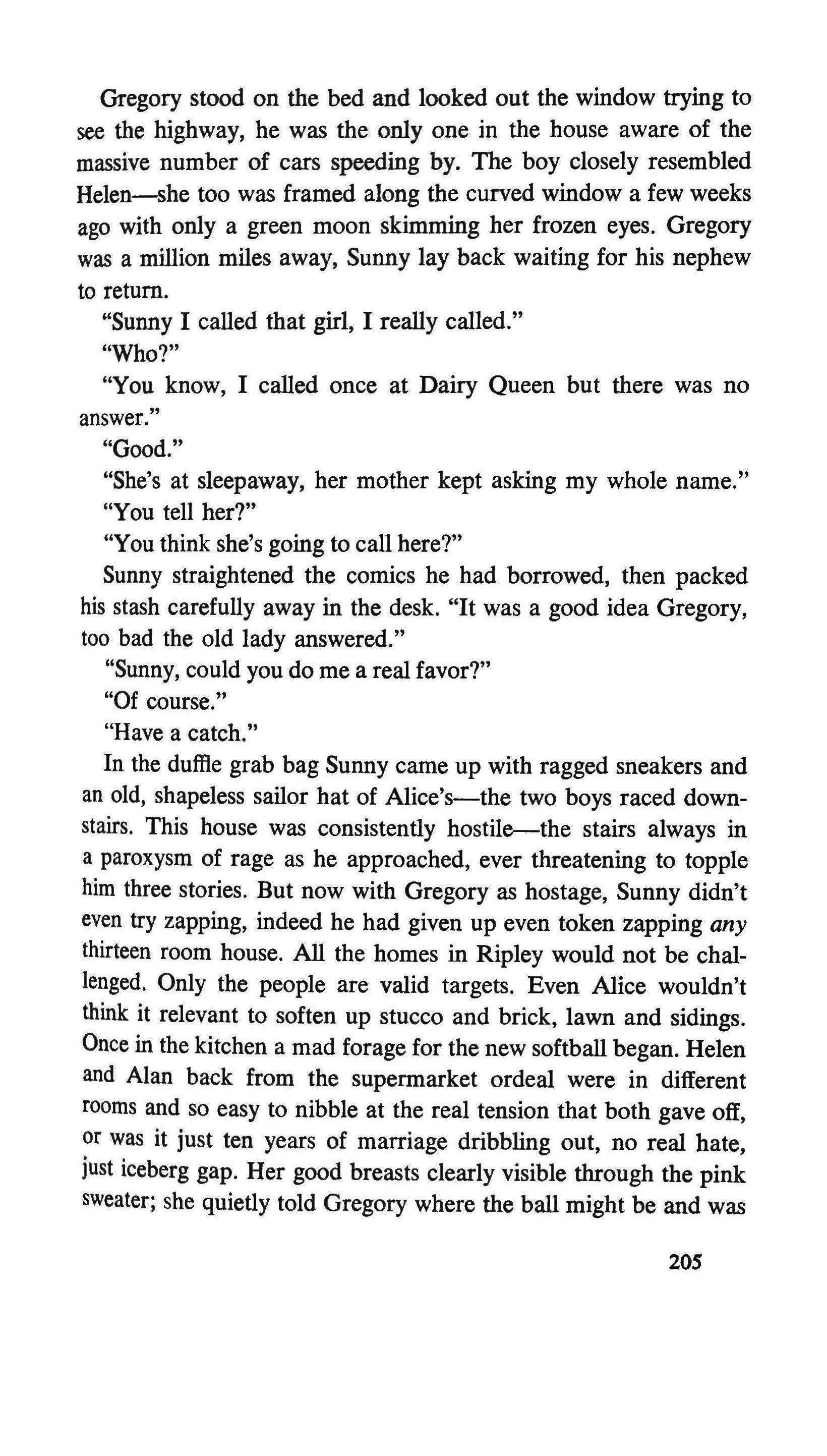
Gregory stood on the bed and looked out the window trying to see the highway, he was the only one in the house aware of the massive number of cars speeding by. The boy closely resembled Helen-she too was framed along the curved window a few weeks ago with only a green moon skimming her frozen eyes. Gregory was a million miles away, Sunny lay back waiting for his nephew to return.
"Sunny I called that girl, I really called."
"Who?"
"You know, I called once at Dairy Queen but there was no answer."
"Good."
"She's at sleepaway, her mother kept asking my whole name."
"You tell her?"
"You think she's going to call here?"
Sunny straightened the comics he had borrowed, then packed his stash carefully away in the desk. "It was a good idea Gregory, too bad the old lady answered."
"Sunny, could you do me a real favor?"
"Of course."
"Have a catch."
In the duffle grab bag Sunny came up with ragged sneakers and an old, shapeless sailor hat of Alice's-the two boys raced downstairs. This house was consistently hostile-the stairs always in a paroxysm of rage as he approached, ever threatening to topple him three stories. But now with Gregory as hostage, Sunny didn't even try zapping, indeed he had given up even token zapping any thirteen room house. All the homes in Ripley would not be challenged. Only the people are valid targets. Even Alice wouldn't think it relevant to soften up stucco and brick, lawn and sidings. Once in the kitchen a mad forage for the new softball began. Helen and Alan back from the supermarket ordeal were in different rooms and so easy to nibble at the real tension that both gave off, or was it just ten years of marriage dribbling out, no real hate, just iceberg gap. Her good breasts clearly visible through the pink sweater; she quietly told Gregory where the ball might be and was
205
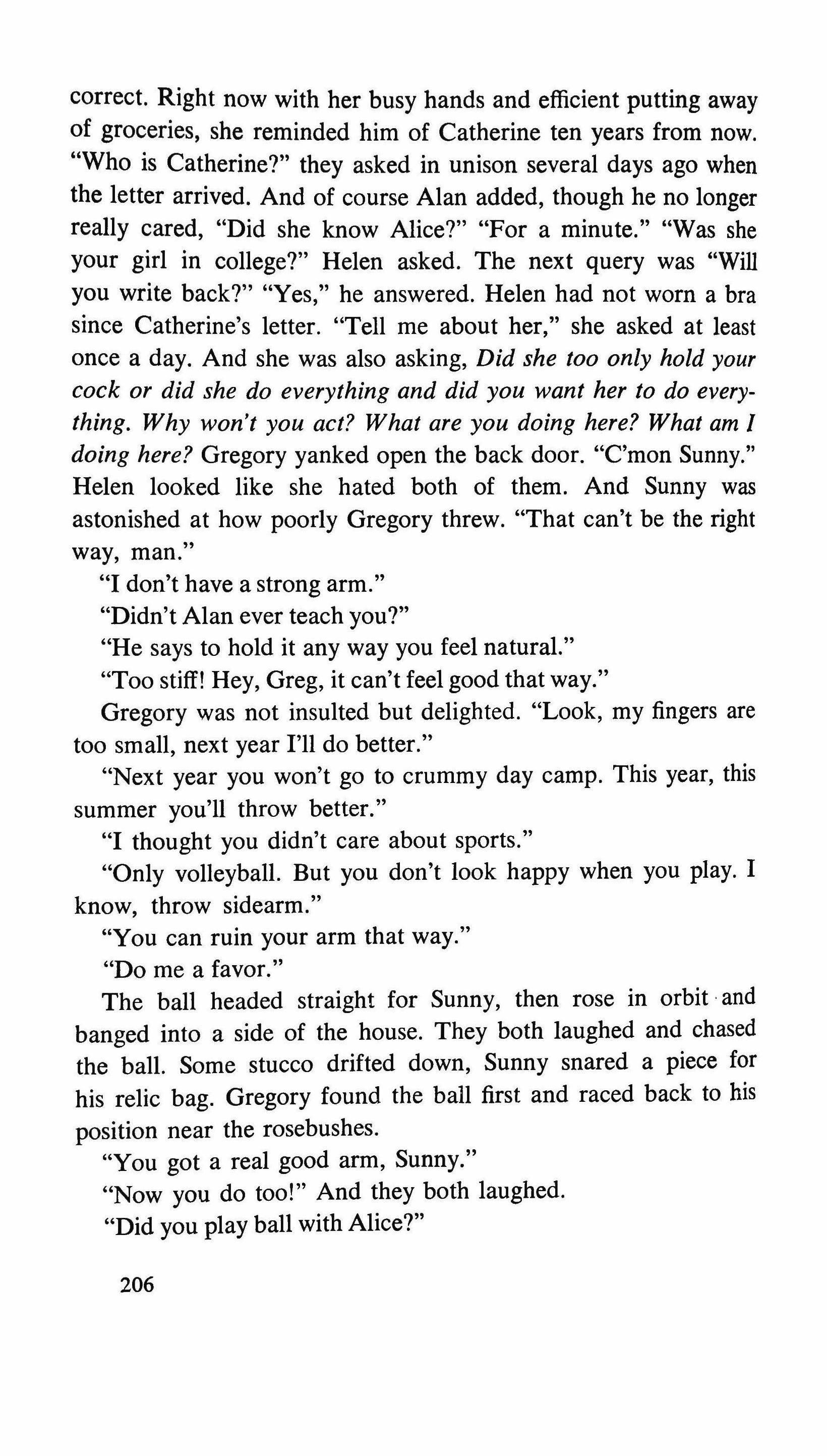
correct. Right now with her busy hands and efficient putting away of groceries, she reminded him of Catherine ten years from now. "Who is Catherine?" they asked in unison several days ago when the letter arrived. And of course Alan added, though he no longer really cared, "Did she know Alice?" "For a minute." "Was she your girl in college?" Helen asked. The next query was "Will you write back?" "Yes," he answered. Helen had not worn a bra since Catherine's letter. "Tell me about her," she asked at least once a day. And she was also asking, Did she too only hold your cock or did she do everything and did you want her to do everything. Why won't you act? What are you doing here? What am I doing here? Gregory yanked open the back door. "C'mon Sunny." Helen looked like she hated both of them. And Sunny was astonished at how poorly Gregory threw. "That can't be the right way, man."
"I don't have a strong arm."
"Didn't Alan ever teach you?"
"He says to hold it any way you feel natural."
"Too stiff! Hey, Greg, it can't feel good that way."
Gregory was not insulted but delighted. "Look, my fingers are too small, next year I'll do better."
"Next year you won't go to crummy day camp. This year, this summer you'll throw better."
"I thought you didn't care about sports."
"Only volleyball. But you don't look happy when you play. 1 know, throw sidearm."
"You can ruin your arm that way."
"Do me a favor."
The ball headed straight for Sunny, then rose in orbit and banged into a side of the house. They both laughed and chased the ball. Some stucco drifted down, Sunny snared a piece for his relic bag. Gregory found the ball first and raced back to his position near the rosebushes.
"You got a real good arm, Sunny."
"Now you do too!" And they both laughed.
"Did you play ball with Alice?"
206

"Right. We had some great volleyball games, believe me."
"Girls play too?"
"Everybody, dogs, cats and girls. The boys and girls were naked."
"Wow! Who won?"
"When one side was losing the winning team sent over their best players. Once
While Gregory waited, Sunny really heard a turnpike collision of cars, accident after accident piling up but nothing really stopped as fumes sooted the sky. Gregory still very patient.
"Once Alice and I played against twenty others and we held them off-they couldn't break the tie. We volleyed for hours."
"She was so good?"
''Terrific, fantastic."
"Sunny, do you always have fun?"
Sunny shrugged and signaled the catch was over. They sat on the high grass, Sunny tried remembering to volunteer and mow the lawn someday.
"Daddy is going to coach the Community Center team. That's crazy, he doesn't even like softball. Would you be an assistant?"
"If he asks, sure."
"You and Daddy coaching at team! Daddy says he's doing it for politics. Do you understand that Sunny?"
"Maybe you heard wrong."
"Mommy was laughing, I heard him, twice. Sunny, will you be here all summer?"
"I don't know."
"I heard them talking about you too."
"They want me to leave?"
"Nobody does. Daddy said one day you'd just leave without saying anything."
"Maybe."
"Don't. I mean, say good-bye. When I got off the bus today I was sure you left."
"I'll say good-bye, I promise."
Grimly they shook hands on it. 207
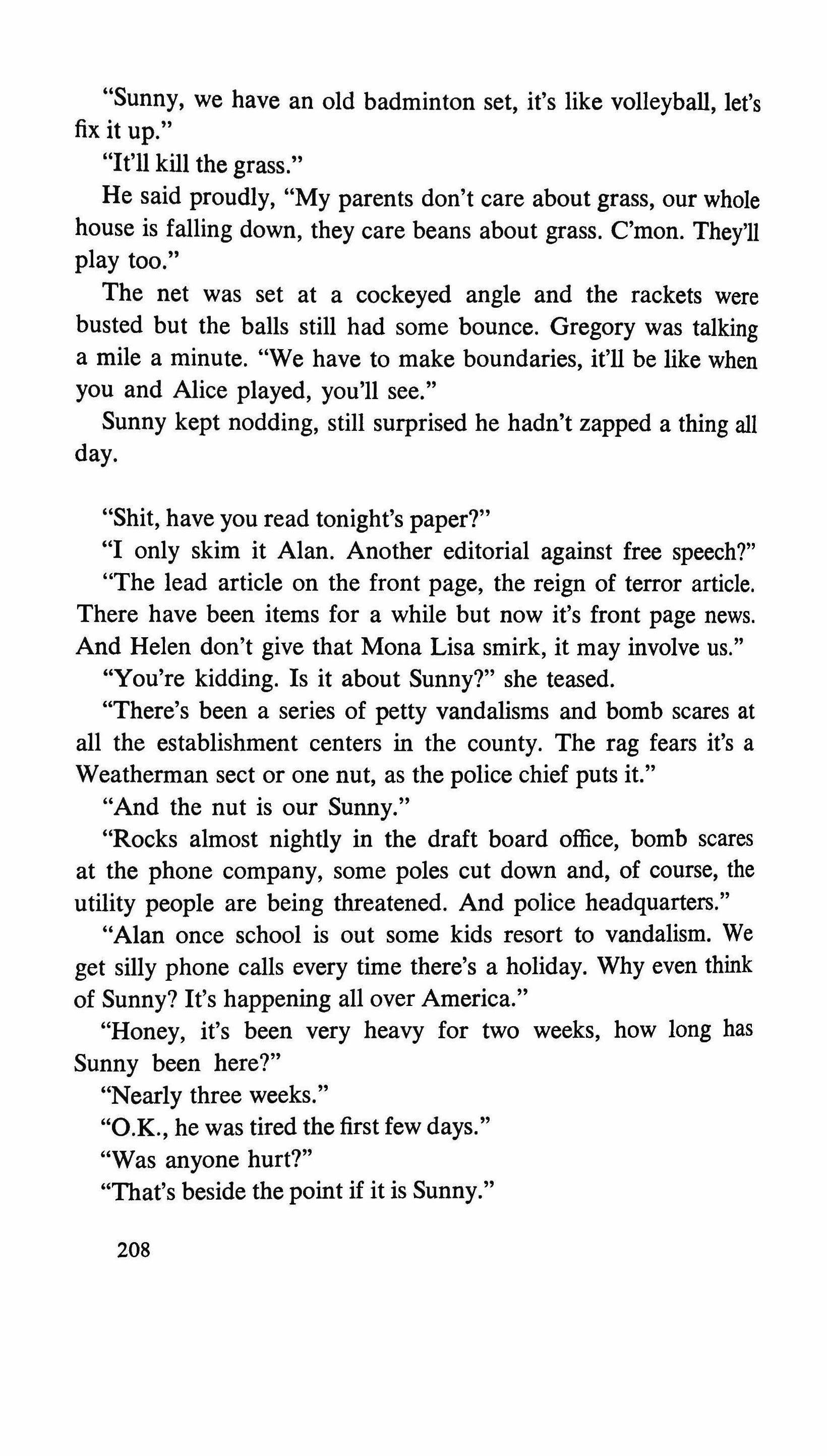
"Sunny, we have an old badminton set, it's like volleyball, let's fix it up."
"It'll kill the grass."
He said proudly, "My parents don't care about grass, our whole house is falling down, they care beans about grass. C'mon. They'll play too."
The net was set at a cockeyed angle and the rackets were busted but the balls still had some bounce. Gregory was talking a mile a minute. "We have to make boundaries, it'll be like when you and Alice played, you'll see."
Sunny kept nodding, still surprised he hadn't zapped a thing all day.
"Shit, have you read tonight's paper?"
"I only skim it Alan. Another editorial against free speech?"
"The lead article on the front page, the reign of terror article. There have been items for a while but now it's front page news. And Helen don't give that Mona Lisa smirk, it may involve us."
"You're kidding. Is it about Sunny?" she teased.
"There's been a series of petty vandalisms and bomb scares at all the establishment centers in the county. The rag fears it's a Weatherman sect or one nut, as the police chief puts it."
"And the nut is our Sunny."
"Rocks almost nightly in the draft board office, bomb scares at the phone company, some poles cut down and, of course, the utility people are being threatened. And police headquarters."
"Alan once school is out some kids resort to vandalism. We get silly phone calls every time there's a holiday. Why even think of Sunny? It's happening all over America."
"Honey, it's been very heavy for two weeks, how long has Sunny been here?"
"Nearly three weeks."
"O.K., he was tired the first few days."
"Was anyone hurt?"
"That's beside the point if it is Sunny." 208
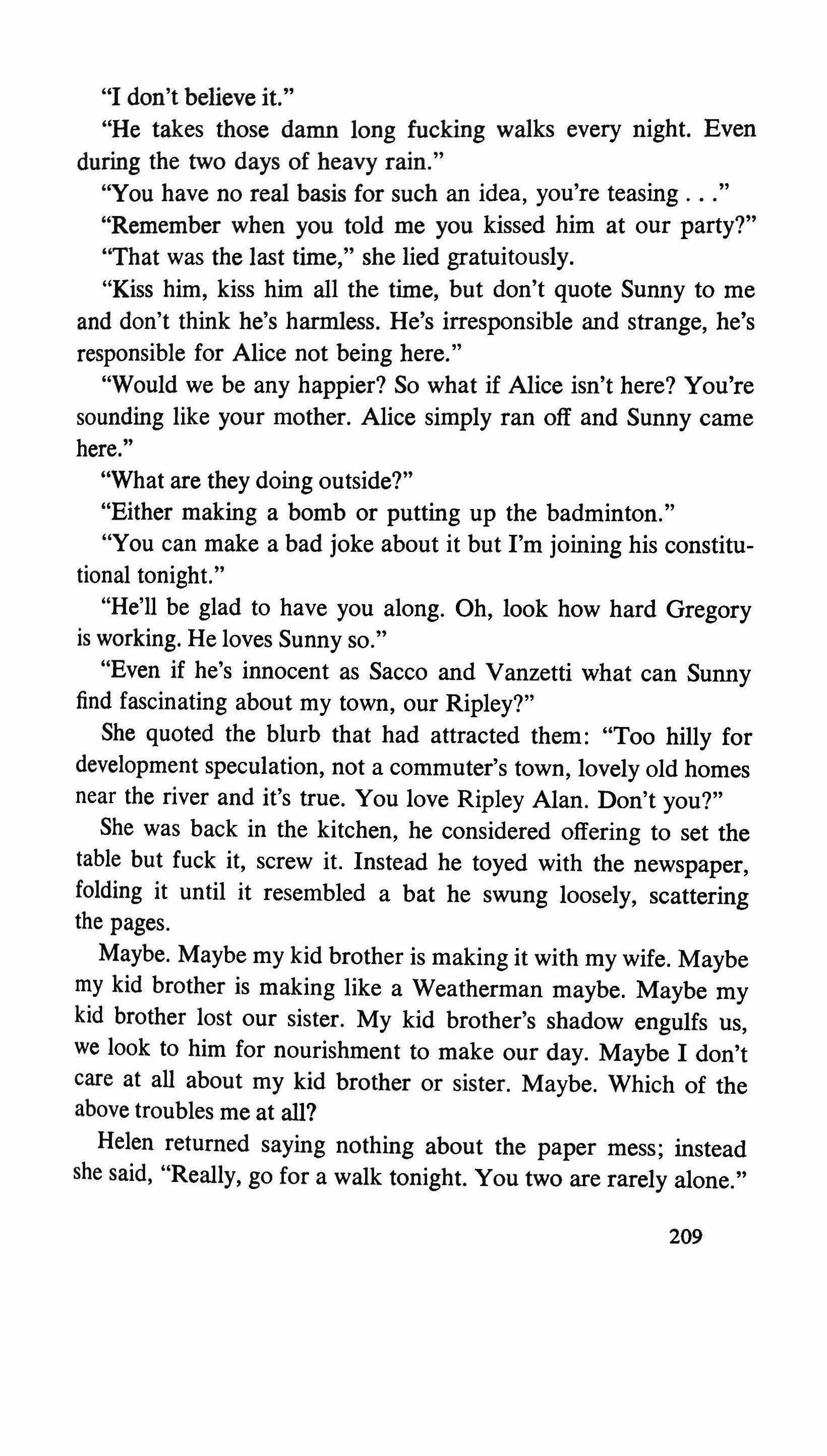
"I don't believe it."
"He takes those damn long fucking walks every night. Even during the two days of heavy rain."
"You have no real basis for such an idea, you're teasing
"Remember when you told me you kissed him at our party?"
"That was the last time," she lied gratuitously.
"Kiss him, kiss him all the time, but don't quote Sunny to me and don't think he's harmless. He's irresponsible and strange, he's responsible for Alice not being here."
"Would we be any happier? So what if Alice isn't here? You're sounding like your mother. Alice simply ran off and Sunny came here."
"What are they doing outside?"
"Either making a bomb or putting up the badminton."
"You can make a bad joke about it but I'm joining his constitutional tonight."
"He'll be glad to have you along. Oh, look how hard Gregory is working. He loves Sunny so."
"Even if he's innocent as Sacco and Vanzetti what can Sunny find fascinating about my town, our Ripley?"
She quoted the blurb that had attracted them: "Too hilly for development speculation, not a commuter's town, lovely old homes near the river and it's true. You love Ripley Alan. Don't you?"
She was back in the kitchen, he considered offering to set the table but fuck it, screw it. Instead he toyed with the newspaper, folding it until it resembled a bat he swung loosely, scattering the pages.
Maybe. Maybe my kid brother is making it with my wife. Maybe my kid brother is making like a Weatherman maybe. Maybe my kid brother lost our sister. My kid brother's shadow engulfs us, we look to him for nourishment to make our day. Maybe I don't care at all about my kid brother or sister. Maybe. Which of the above troubles me at all?
Helen returned saying nothing about the paper mess; instead she said, "Really, go for a walk tonight. You two are rarely alone."
209
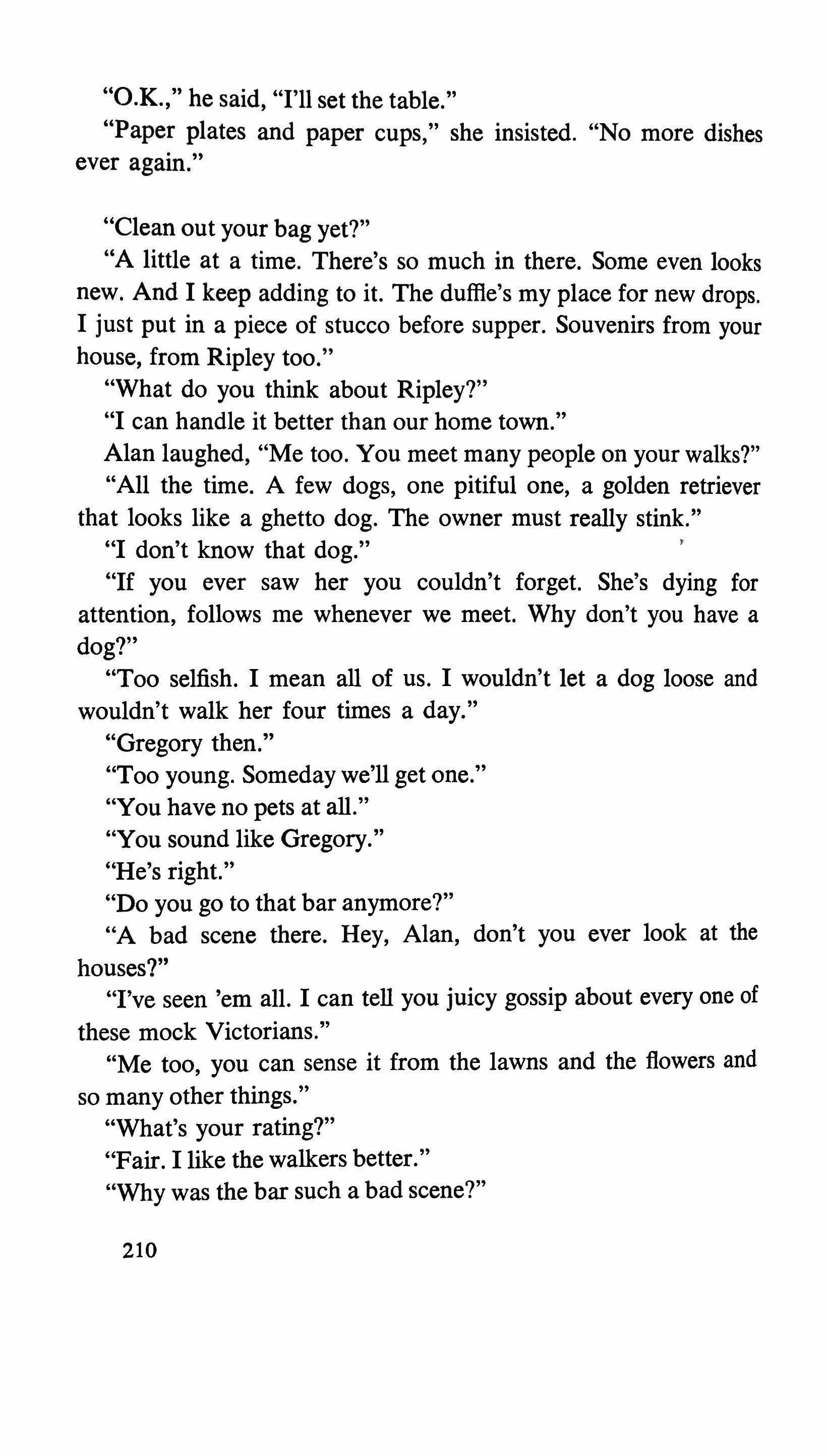
"O.K.," he said, "I'll set the table."
"Paper plates and paper cups," she insisted. "No more dishes ever again."
"Clean out your bag yet?"
"A little at a time. There's so much in there. Some even looks new. And 1 keep adding to it. The duffie's my place for new drops. 1 just put in a piece of stucco before supper. Souvenirs from your house, from Ripley too."
"What do you think about Ripley?"
"I can handle it better than our home town."
Alan laughed, "Me too. You meet many people on your walks?"
"All the time. A few dogs, one pitiful one, a golden retriever that looks like a ghetto dog. The owner must really stink."
"I don't know that dog."
"If you ever saw her you couldn't forget. She's dying for attention, follows me whenever we meet. Why don't you have a dog?"
"Too selfish. 1 mean all of us. 1 wouldn't let a dog loose and wouldn't walk her four times a day."
"Gregory then."
"Too young. Someday we'll get one."
"You have no pets at all."
"You sound like Gregory."
"He's right."
"Do you go to that bar anymore?"
"A bad scene there. Hey, Alan, don't you ever look at the houses?"
"I've seen 'em all. 1 can tell you juicy gossip about every one of these mock Victorians."
"Me too, you can sense it from the lawns and the flowers and so many other things."
"What's your rating?"
"Fair. I like the walkers better."
"Why was the bar such a bad scene?"
210
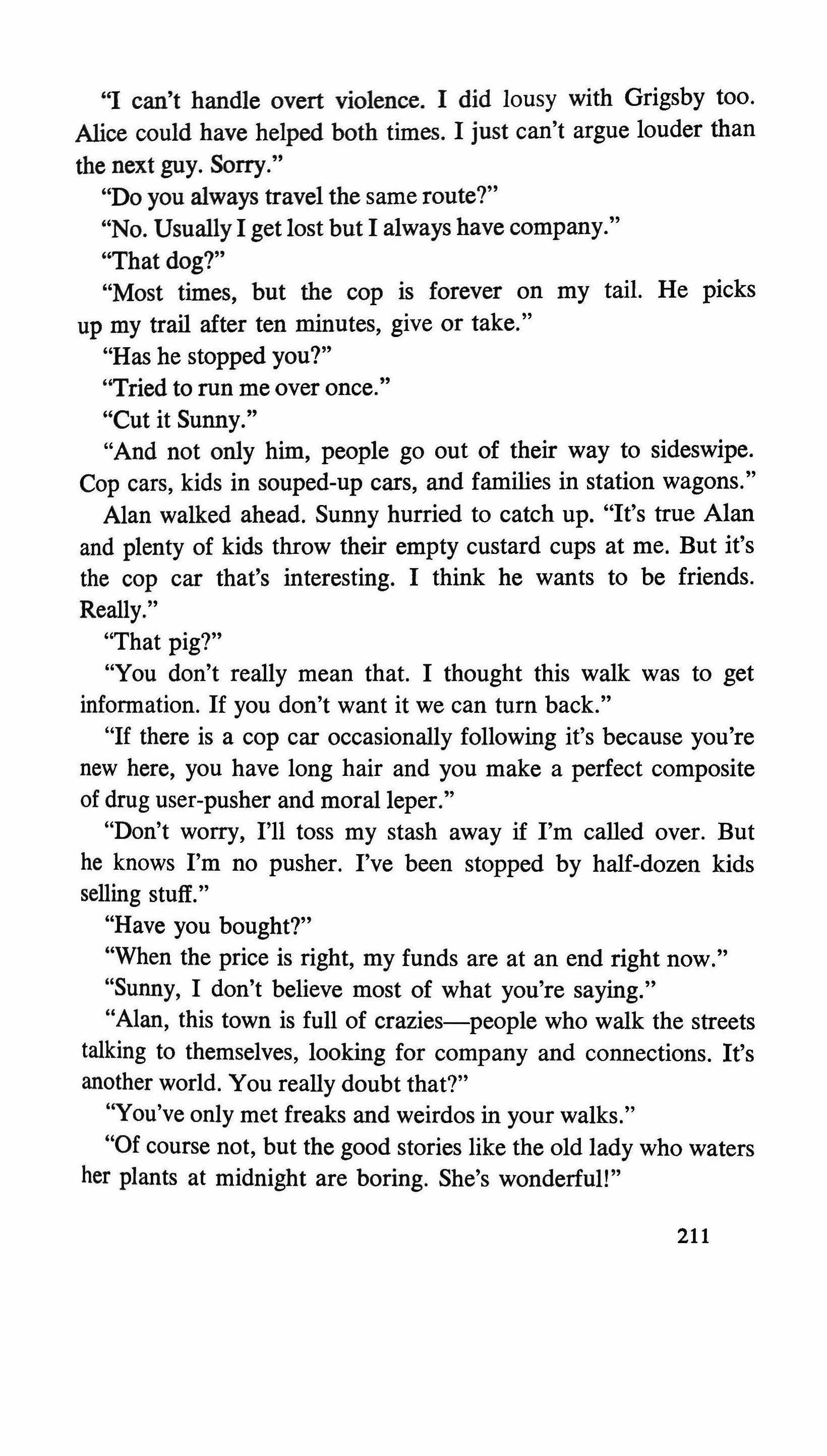
'1 can't handle overt violence. I did lousy with Grigsby too. Alice could have helped both times. I just can't argue louder than the next guy. Sorry."
''Do you always travel the same route?"
"No. Usually I get lost but I always have company."
"That dog?"
"Most times, but the cop is forever on my tail. He picks up my trail after ten minutes, give or take."
"Has he stopped you?"
"Tried to run me over once."
"Cut it Sunny."
"And not only him, people go out of their way to sideswipe. Cop cars, kids in souped-up cars, and families in station wagons."
Alan walked ahead. Sunny hurried to catch up. "It's true Alan and plenty of kids throw their empty custard cups at me. But it's the cop car that's interesting. I think he wants to be friends. Really."
"That pig?"
"You don't really mean that. I thought this walk was to get information, If you don't want it we can turn back."
"If there is a cop car occasionally following it's because you're new here, you have long hair and you make a perfect composite of drug user-pusher and moral leper."
"Don't worry, I'll toss my stash away if I'm called over. But he knows I'm no pusher. I've been stopped by half-dozen kids selling stuff."
"Have you bought?"
"When the price is right, my funds are at an end right now."
"Sunny, I don't believe most of what you're saying."
"Alan, this town is full of crazies-people who walk the streets talking to themselves, looking for company and connections. It's another world. You really doubt that?"
"You've only met freaks and weirdos in your walks."
"Of course not, but the good stories like the old lady who waters her plants at midnight are boring. She's wonderful!"
211

"Mrs. Conway?"
"Hey, right."
Alan said, "Let's tum back, I want to catch the ten o'clock news."
They crossed the street and both saw the cop car. Alan shook his head and Sunny waved.
"Sunny you ever toss rocks through the draft board?"
Sunny smiled, "Wow, Alan, that was a complete happening. It really was. I was on that hill past the park and I smelled the river and the odor was like from an open septic tank. The police car was not following me and this time my doggie pal wasn't around either. It all seemed so silly I just picked up a big rock and tossed it hard as I could. When I heard glass shatter I ran to see if it was only a draft board. And I forgot the incident."
"And that's it?"
"Alan, the wonderful crazy part what I did became symbol and signal to Ripley. The rest took over. A hundred more took the zap hint."
"You've made no calls? Thrown no more rocks?"
"I don't lie Alan. It is not a bad idea but it wasn't my thing."
"What is your thing Sunny? Do you know yet?"
"I don't have a thing. A few days later I went past the draft board and saw a rock in the gutter that resembled my rock. It's in the duffle now."
"We haven't met a damn person or animal out on this walk."
Sunny zapped Alan and the street. Alan didn't notice, he was thinking it was too easy to be spying on your own family. They tell you what you ask and of course it is not what you want to hear. He saw his house-lights in every room beckoning like a lighthouse. Sunny and Alice were as real as Sunny's friends who walk along Ripley streets no one had yet paved. Now his house seemed a huge ornate castle where no life could exist in big rooms, not one thought of love or real feeling could possibly exist in thirteen rooms, each bigger than the next. He finally saw Sunny shaking his finger at him. Sunny was asking, "Will you play badminton tomorrow night?"
212
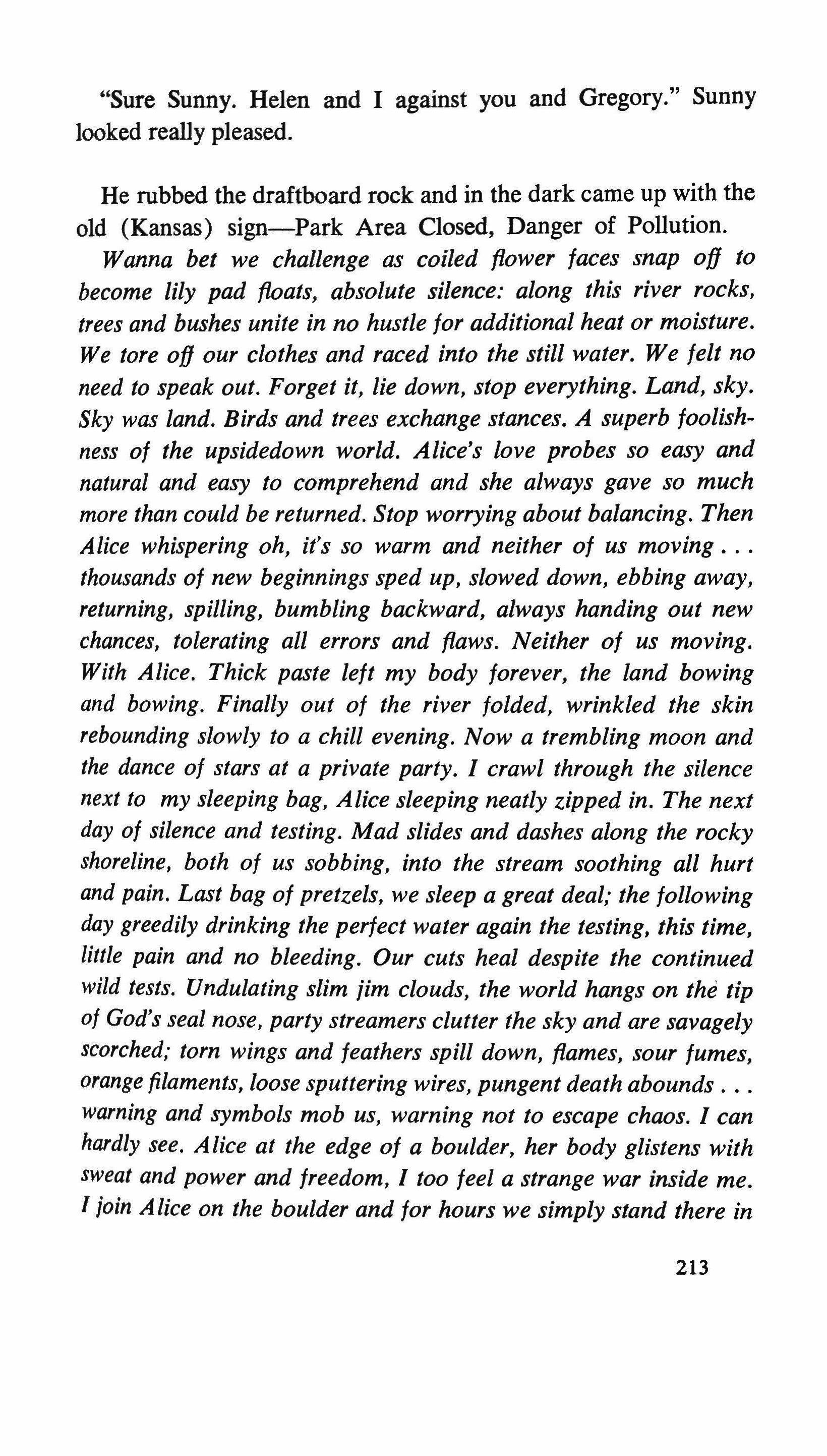
"Sure Sunny. Helen and I against you and Gregory." Sunny looked really pleased.
He rubbed the draftboard rock and in the dark came up with the old (Kansas) sign-Park Area Closed, Danger of Pollution. Wanna bet we challenge as coiled flower faces snap off to become lily pad floats, absolute silence: along this river rocks, trees and bushes unite in no hustle for additional heat or moisture. We tore off our clothes and raced into the still water. We felt no need to speak out. Forget it, lie down, stop everything. Land, sky. Sky was land. Birds and trees exchange stances. A superb foolishness of the upsidedown world. Alice's love probes so easy and natural and easy to comprehend and she always gave so much more than could be returned. Stop worrying about balancing. Then Alice whispering oh, it's so warm and neither of us moving thousands of new beginnings sped up, slowed down, ebbing away, returning, spilling, bumbling backward, always handing out new chances, tolerating all errors and flaws. Neither of us moving. With Alice. Thick paste left my body forever, the land bowing and bowing. Finally out of the river folded, wrinkled the skin rebounding slowly to a chill evening. Now a trembling moon and the dance of stars at a private party. I crawl through the silence next to my sleeping bag, Alice sleeping neatly zipped in. The next day of silence and testing. Mad slides and dashes along the rocky shoreline, both of us sobbing, into the stream soothing all hurt and pain. Last bag of pretzels, we sleep a great deal; the following day greedily drinking the perfect water again the testing, this time, little pain and no bleeding. Our cuts heal despite the continued wild tests. Undulating slim jim clouds, the world hangs on the tip of God's seal nose, party streamers clutter the sky and are savagely scorched; torn wings and feathers spill down, flames, sour fumes, orange filaments, loose sputtering wires, pungent death abounds warning and symbols mob us, warning not to escape chaos. I can hardly see. Alice at the edge of a boulder, her body glistens with sweat and power and freedom, I too feel a strange war inside me. I join Alice on the boulder and for hours we simply stand there in
213

throbbing prayer and a repetitive promise to begin our mission. The river surges, the sky leans down to touch; river and sky join in one loving rush. The moans of a delicate precise pain. Over Vision scarred and blurry but soon the stream is calm and gently flowing and there is only an aloof sky occasionally pestered by a jet. Alice claps her hands. We're out of food completely. Not a chip. We're lightheaded and dizzy. And prepared for the sudden shower. No rain can bag us. Hot, dry sun substitutes. Rainbow puddles and we are naked and untouched and saddened by our power. Alice is crying it's over for we must renounce and be even more vulnerable than the rest. And we are naked and awkward in this place, we leave it quickly, leaving it as we found it. We only take the warning sign. And we are in the Plymouth aiming slowly down another country road.
214
A "Bob" Brown sampler
morceaux choisis from the novels
by "Herb" Johnson

Note: In response to persistent demands TriQuarterly has commissioned staff researchers W. B. Scott and Gerald Graff to bring its readers selections from the "Bob" Brown novels of "Herb" Johnson, works very much on the skirmish-line of contemporary fiction. These selections follow brief biographical and critical introductions to "Herb" Johnson and his oeuvre; in addition there are, between excerpts and in square brackets, materials designed "hopefully" to aid the reader: fragments oi critical notices, statements by "Herb" Johnson anent his intentions, and exchanges between the researchers themselves.
A note on the author
"Teach him how to live, And, oh! still harder lesson! how to die."
-Bielby Porteus
(1731-1808)
"Herb" Johnson was born in Moline, lllinois, on June 16, 1930, the son of Leroy and Velma Finch Johnson. Christened Herbert Finch Johnson, he received his early education in the public schools of Moline, where he graduated third in his high school
TrlQgarterly 215
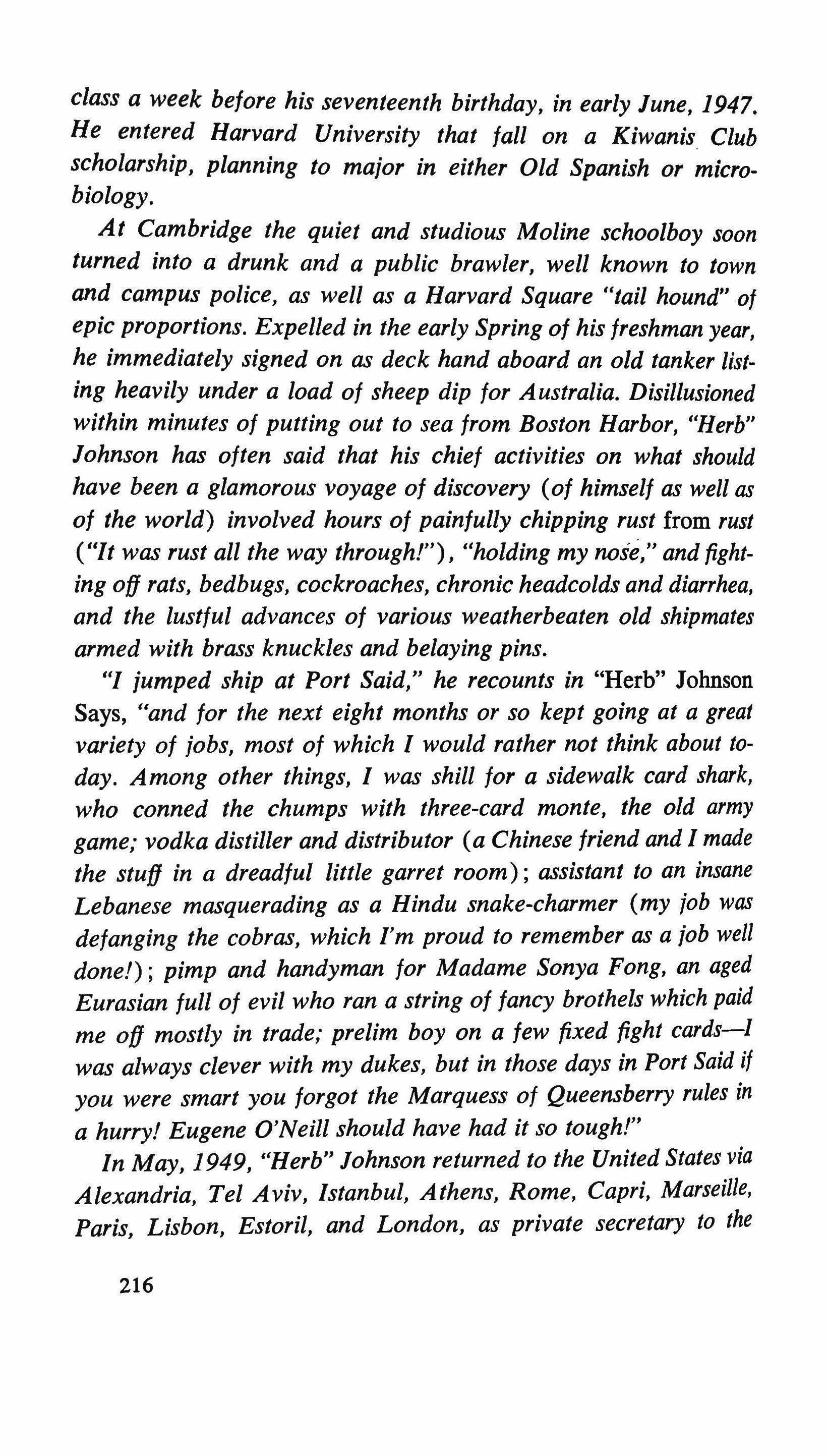
class a week before his seventeenth birthday, in early June, 1947. He entered Harvard University that fall on a Kiwanis Club scholarship, planning to major in either Old Spanish or microbiology.
At Cambridge the quiet and studious Moline schoolboy soon turned into a drunk and a public brawler, well known to town and campus police, as well as a Harvard Square "tail hound" of epic proportions. Expelled in the early Spring of his freshman year, he immediately signed on as deck hand aboard an old tanker listing heavily under a load of sheep dip for Australia. Disillusioned within minutes of putting out to sea from Boston Harbor, "Herb" Johnson has often said that his chief activities on what should have been a glamorous voyage of discovery (of himself as well as of the world) involved hours of painfully chipping rust from rust ("It was rust all the way through!"), "holding my nose," and fighting off rats, bedbugs, cockroaches, chronic headcolds and diarrhea, and the lustful advances of various weatherbeaten old shipmates armed with brass knuckles and belaying pins.
"I jumped ship at Port Said," he recounts in "Herb" Johnson Says, "and for the next eight months or so kept going at a great variety of jobs, most of which I would rather not think about today. Among other things, I was shill for a sidewalk card shark, who conned the chumps with three-card monte, the old army game; vodka distiller and distributor (a Chinese friend and I made the stuff in a dreadful little garret room); assistant to an insane Lebanese masquerading as a Hindu snake-charmer (my job was dejanging the cobras, which I'm proud to remember as a job well done!); pimp and handyman for Madame Sonya Fong, an aged Eurasian full of evil who ran a string of fancy brothels which paid me off mostly in trade; prelim boy on a few fixed fight cards-I was always clever with my dukes, but in those days in Port Said if you were smart you forgot the Marquess of Queensberry rules in a hurry! Eugene O'Neill should have had it so tough!"
In May, 1949, "Herb" Johnson returned to the United States via Alexandria, Tel Aviv, Istanbul, Athens, Rome, Capri, Marseille, Paris, Lisbon, Estoril, and London, as private secretary to the 216
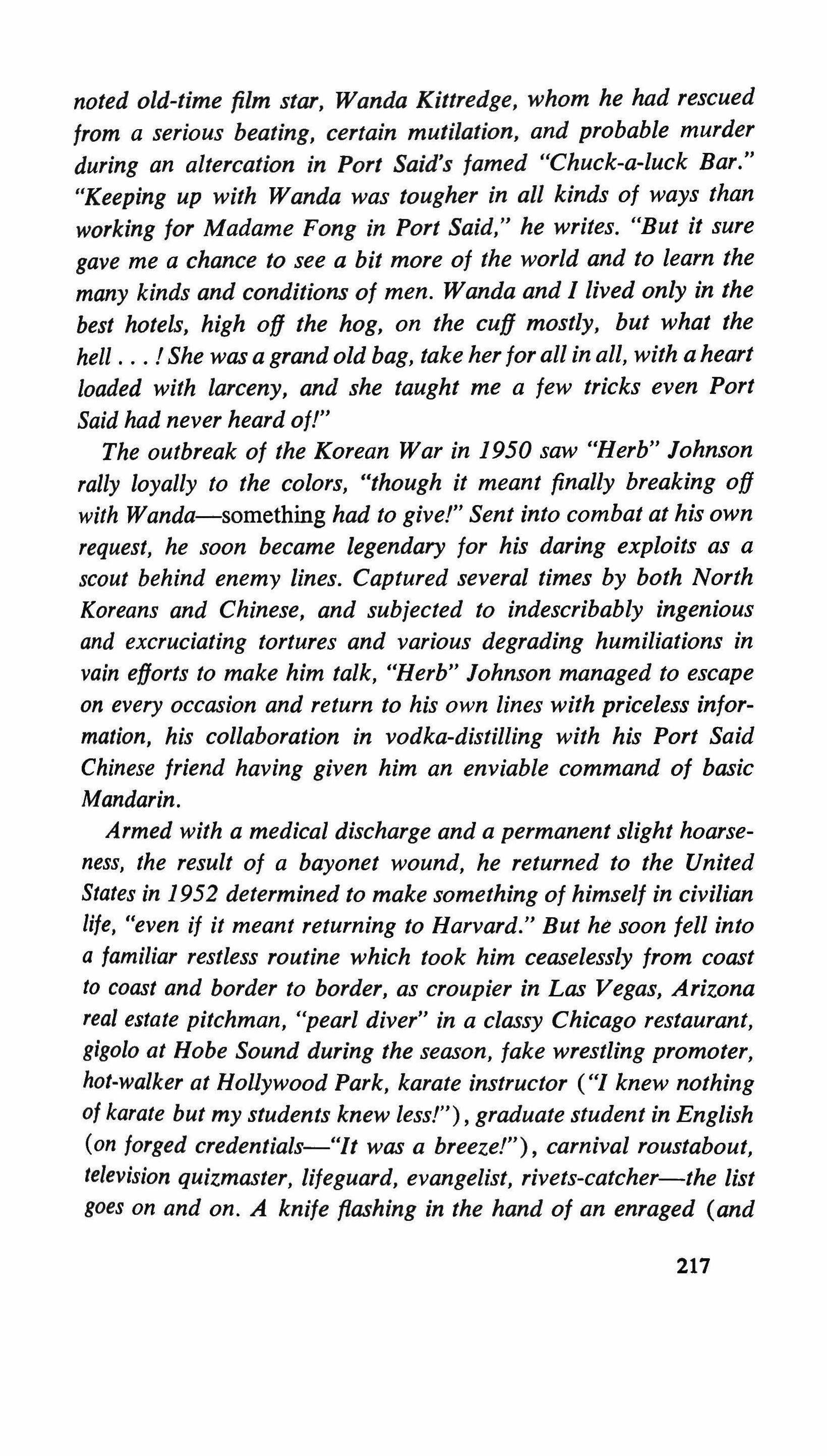
noted old-time film star, Wanda Kittredge, whom he had rescued from a serious beating, certain mutilation, and probable murder during an altercation in Port Said's famed "Chuck-a-luck Bar." "Keeping up with Wanda was tougher in all kinds of ways than working for Madame Fong in Port Said," he writes. "But it sure gave me a chance to see a bit more of the world and to learn the many kinds and conditions of men. Wanda and I lived only in the best hotels, high off the hog, on the cuff mostly, but what the hell ! She was a grand old bag, take her for all in all, with a heart loaded with larceny, and she taught me a few tricks even Port Said had never heard of!"
The outbreak of the Korean War in 1950 saw "Herb" Johnson rally loyally to the colors, "though it meant finally breaking off with Wanda-something had to give!" Sent into combat at his own request, he soon became legendary for his daring exploits as a scout behind enemy lines. Captured several times by both North Koreans and Chinese, and subjected to indescribably ingenious and excruciating tortures and various degrading humiliations in vain efforts to make him talk, "Herb" Johnson managed to escape on every occasion and return to his own lines with priceless information, his collaboration in vodka-distilling with his Port Said Chinese friend having given him an enviable command of basic Mandarin.
Armed with a medical discharge and a permanent slight hoarseness, the result of a bayonet wound, he returned to the United States in 1952 determined to make something of himself in civilian life, "even if it meant returning to Harvard." But he soon fell into a familiar restless routine which took him ceaselessly from coast to coast and border to border, as croupier in Las Vegas, Arizona real estate pitchman, "pearl diver" in a classy Chicago restaurant, gigolo at Hobe Sound during the season, fake wrestling promoter, hot-walker at Hollywood Park, karate instructor ("I knew nothing of karate but my students knew less!"), graduate student in English (on forged credentials-"It was a breeze!"), carnival roustabout, television quizmaster, lifeguard, evangelist, rivets-catcher-the list goes on and on. A knife flashing in the hand of an enraged (and 217
outraged) husband who had returned unexpectedly to a Rogers Park (Chicago) apartment almost brought to a bloody end the career of "Herb" Johnson.
"But I pulled through," he writes simply yet with deep feeling at the end of his memoir, "Herb" Johnson Says. "The vicissitudes of life had left me permanently hoarse, with a missing leftpinkie, a ragged right ear, and only one ball. But I pulled through-I always pulled through! Maybe somebody up there was on my side all along. In any case, I think it beyond question that all I had done and been, up to the very moment of first putting pen to paper, was merely preparation for the writing of <Bob' Brown!"
Who can say more?
A critical note
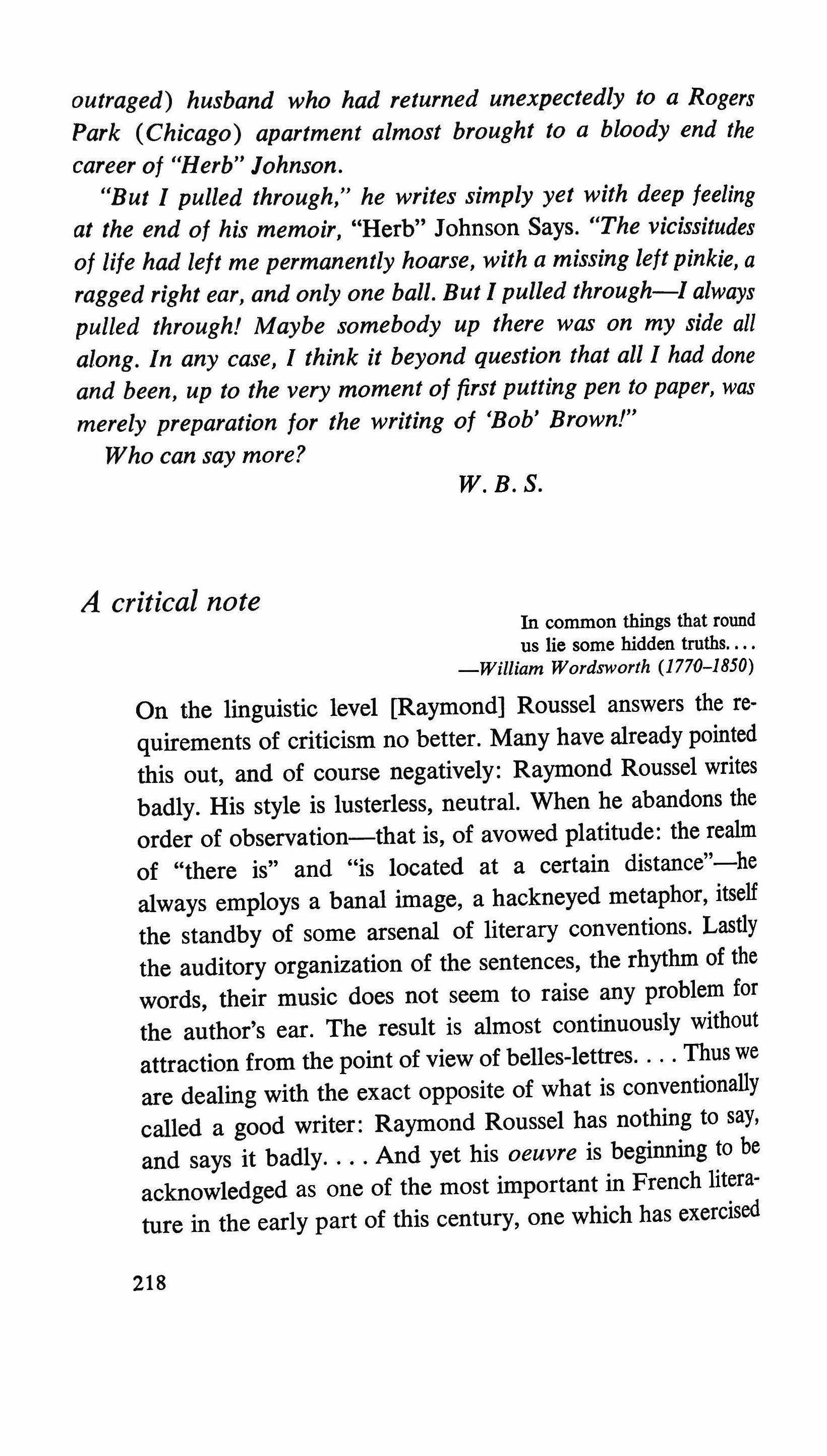 W.B.S.
W.B.S.
In common things that round us lie some hidden truths
-William Wordsworth (1770-1850)
On the linguistic level [Raymond] Roussel answers the requirements of criticism no better. Many have already pointed this out, and of course negatively: Raymond Roussel writes badly. His style is lusterless, neutral. When he abandons the order of observation-that is, of avowed platitude: the realm of "there is" and "is located at a certain distance"-he always employs a banal image, a hackneyed metaphor, itself the standby of some arsenal of literary conventions. Lastly the auditory organization of the sentences, the rhythm of the words, their music does not seem to raise any problem for the author's ear. The result is almost continuously without attraction from the point of view of belles-lettres Thus we are dealing with the exact opposite of what is conventionally called a good writer: Raymond Roussel has nothing to say, and says it badly And yet his oeuvre is beginning to be acknowledged as one of the most important in French literature in the early part of this century, one which has exercised 218
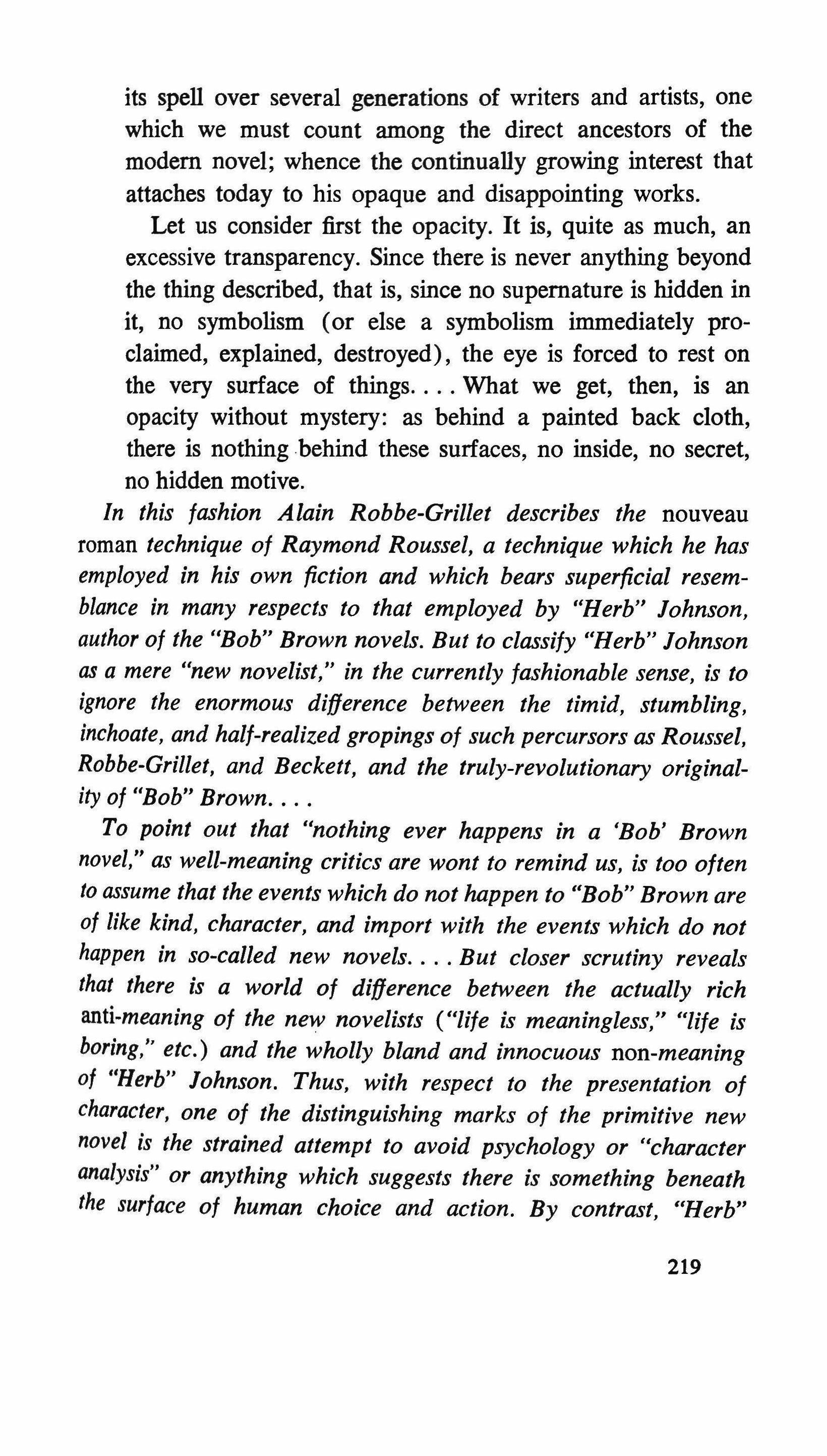
its spell over several generations of writers and artists, one which we must count among the direct ancestors of the modem novel; whence the continually growing interest that attaches today to his opaque and disappointing works.
Let us consider first the opacity. It is, quite as much, an excessive transparency. Since there is never anything beyond the thing described, that is, since no supemature is hidden in it, no symbolism (or else a symbolism immediately proclaimed, explained, destroyed), the eye is forced to rest on the very surface of things What we get, then, is an opacity without mystery: as behind a painted back cloth, there is nothing behind these surfaces, no inside, no secret, no hidden motive.
In this fashion Alain Robbe-Grillet describes the nouveau roman technique of Raymond Roussel, a technique which he has employed in his own fiction and which bears superficial resemblance in many respects to that employed by "Herb" Johnson, author of the "Bob" Brown novels. But to classify "Herb" Johnson as a mere "new novelist," in the currently fashionable sense, is to ignore the enormous difference between the timid, stumbling, inchoate, and half-realized gropings of such percursors as Roussel, Robbe-Grillet, and Beckett, and the truly-revolutionary originality of "Bob" Brown
To point out that "nothing ever happens in a 'Bob' Brown novel," as well-meaning critics are wont to remind us, is too often to assume that the events which do not happen to "Bob" Brown are of like kind, character, and import with the events which do not happen in so-called new novels But closer scrutiny reveals that there is a world of difference between the actually rich anti-meaning of the new novelists ("life is meaningless," "life is boring," etc.) and the wholly bland and innocuous non-meaning of "Herb" Johnson. Thus, with respect to the presentation of character, one of the distinguishing marks of the primitive new novel is the strained attempt to avoid psychology or "character analysis" or anything which suggests there is something beneath the surface of human choice and action. By contrast, "Herb" 219
W.4th
W.5th

W. Lafayettle
W.13th StqpIIghI
W.14th
W.15th W.'60'
�rrt"Gr
W86trz","'c� Gatelll1' .41 ���j STATE NORMAL TECH CAMPUS
W.lst W.2nd
W.3rd
- I-
W.6th • Dept. of English I andSpeech 1 Main Gatel: .,w I
I
�5
W.7th I I I I
I Oa:
I I II�+-----tt : C m�
W.8th I I
I Ii w - :IE0
W.9th I I I
-1- %
W.1Oth I I
I �coutts' Gr�
W.11th PUlla".· Home
'-.,
J I I I
.s
Pojlak's I
, '801)' Br�'s Alllartment
� il �I �I :> c( II � s ;;i �I :> � � -< !! ! III
Johnson achieves much the same effect, but more naturally, without succumbing to any such fetish of avoidance. "Bob" Brown's innermost thoughts, even at one point his dreams, are copiously particularized throughout the "Bob" Brown novels, yet with scarcely any disturbance of the tone of boneless evenness which governs the whole
G.G.
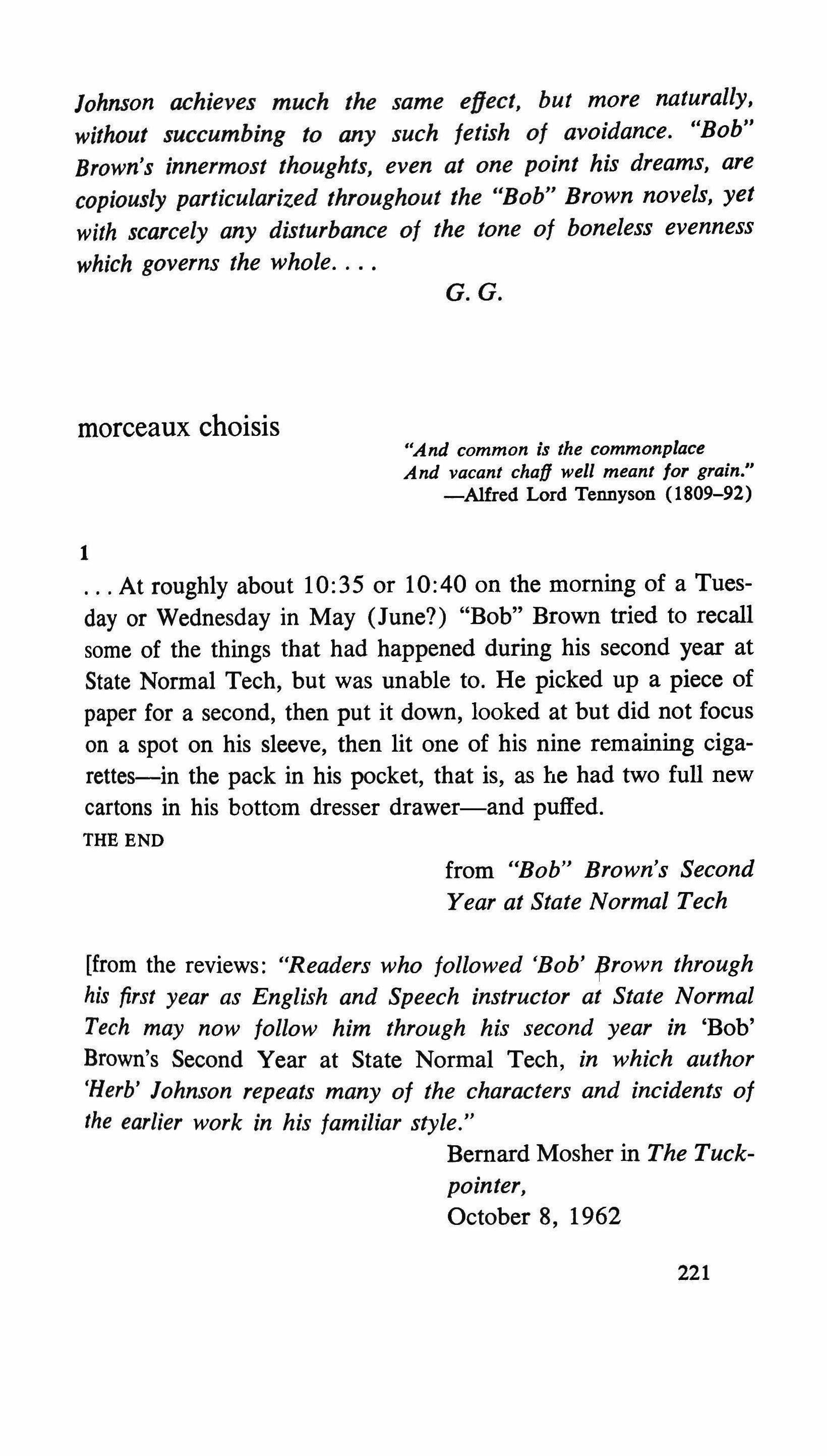
"And common is the commonplace And vacant chaff well meant for grain."
-Alfred Lord Tennyson (1809-92)
At roughly about 10:35 or 10:40 on the morning of a Tuesday or Wednesday in May (June?) "Bob" Brown tried to recall some of the things that had happened during his second year at State Normal Tech, but was unable to. He picked up a piece of paper for a second, then put it down, looked at but did not focus on a spot on his sleeve, then lit one of his nine remaining cigarettes-in the pack in his pocket, that is, as he had two full new cartons in his bottom dresser drawer-and puffed.
THE END
from "Bob" Brown's Second Year at State Normal Tech
[from the reviews: "Readers who followed 'Bob' Brown through his first year as English and Speech instructor at State Normal Tech may now follow him through his second year in 'Bob' Brown's Second Year at State Normal Tech, in which author 'Herb' Johnson repeats many of the characters and incidents of the earlier work in his familiar style."
Bernard Mosher in The Tuckpointer, October 8, 1962 221
morceaux choisis
1

"I tried to do pretty much the same thing all over again in 'Bob' Brown's Second Year at State Normal Tech as [ did in 'Bob' Brown's First Year at State Normal Tech." author "Herb" Johnson in an interview with interviewer "Fred" Jones.]
2
Early on a June afternoon towards the end of his third year at State Normal Tech "Bob" Brown thought idly of the summer vacation which lay ahead-the usual three months of dozing and drowsing in the large family "cabin" at Hayford's Landing on Lake Hayford, a resort in southeastern Kansas, with lots of catfish to eat washed down with "Dr. Pepper," and frequent conversations with his great-uncle, also named "Bob" Brown, a one-time shoe clerk. (This great-uncle was known to family and friends as "Old 'Bob' Brown" to distinguish him from the instructor in English and Speech at State Normal Tech, who was known as "Young 'Bob' Brown.")
The phone rang.
"Hello?"
"Hello. Is this Professor Brown?" "Yes."
"This is 'Norm's Chevrolet,' Professor Brown. Your Chevy II is ready."
"Oh, thank you. I hope you didn't find anything seriously wrong with it."
"No, sir. You are going to need a new set of spark plugs sooner or later, but this time we just replaced a few minor parts that were worn out."
"Oh, that's good. How much will the job cost?"
"Seventeen ninety-five, inclusive of parts and labor."
"Well, that's not too bad. Thank you. I'll pick the car up later today."
"All right, professor. It will be here waiting for you. Good-bye."
222

"Good-bye."
As he hung up the phone "Bob" Brown glanced at his face in the mirror. There was a smudge on his nose which he wiped off with his right thumb. Another year almost over, he thought. What had happened? Well-there had been that morning in late January or early February when Miss Elyse Levine of Milwaukee had dropped one of her contact lenses, but within three minutes it had been found by Carl Kakemono, a Japanese-American boy from Kenosha-really far more American than Japanese-and the class in English B208 (The Modern American Novel) had resumed its peaceful discussion of theme and symbol in George Barr McCutcheon.
A large bluebottle fly buzzed for a moment at the open window, then flew away.
"It's lucky the screens were already in," "Bob" Brown thought. THE END
from "Bob" Brown's Third Year at State Normal Tech
[from the reviews: "Readers of 'Herb' Johnson will find themselves very much at home in 'Bob' Brown's Third Year at State Normal Tech. Except for something of a 'surprise' ending this novel repeats most of the characters and incidents of the earlier books in this 'series:
Bernard Mosher in The Tuckpointer, October 10, 1963
"I'd like to call the attention of reviewers to the fact that in 'Bob' Brown's Third Year at State Normal Tech I was trying to do pretty much the same thing all over again that I had done in 'Bob' Brown's First Year at State Normal Tech and in 'Bob' Brown's Second Year at State Normal Tech."
author "Herb" Johnson in an interview with interviewer "Fred" Jones]
223

As "Bob" Brown strolled along Washington Street towards his apartment following the pleasant though typically uneventful conversation with his department chairman, Dr. Claude Rogers (Rutgers B.S., Lehigh M.A., Northwestern Ph.D.) he was once again aware of the people and buildings so familiar to him from many walks from and to his apartment, which was near the comer of Washington and East 13th Street, five and a quarter blocks from the main gate of the campus. In front of the Lin Shan-li "Big Golden Chopsticks" Chinese-take-home-food establishment with its hanging red-and-gold sign, the proprietor, thirty-five-year-old Mr. Lin Shan-li, was deep in conversation with an elderly Chinese-American truck farmer, Mr. Wallace Mao-they were discussing, in subdued Cantonese, the current prices of soy beans, lichi nuts, and monosodium glutamate as compared with the prices of those articles a year and two years earlier.
At about the moment "Bob" Brown walked by these two "food dispensers" and fourteen blocks to the west Mr. Harold Anspacher, a Methodist layman, absent-mindedly drove his maroon 1962 Rambler sedan through the red light at the corner of 11th Street and Nelson Avenue. Immediately realizing his error he promised, speaking half aloud to himself, never to repeat it. Fortunately there were no other vehicles in or near the intersection at the time, and the only "witness" to Mr. Anspacher's transgression of the traffic code was little three-and-a-half-year-old Terry Williams, Jr., who was playing in the front yard of the attractive Williams home at 1412 West 11th Street, and who of course noticed nothing out of the way although even a child of his age might have become excited or frightened if Mr. Anspacher's momentary carelessness had resulted in a collision with another vehicle. Five or six minutes after the maroon Rambler had disappeared from view, Terry Williams' mother, Eleanor Bixby Williams, a Radcliffe dropout, called him into the house from a second-floor window.
Although "Bob" Brown could not understand or even guess at what the two Chinese gentlemen were talking about, the sight of them and of the sign in Mr. Lin Shan-li's windOW-TAKE HOME!
3
224
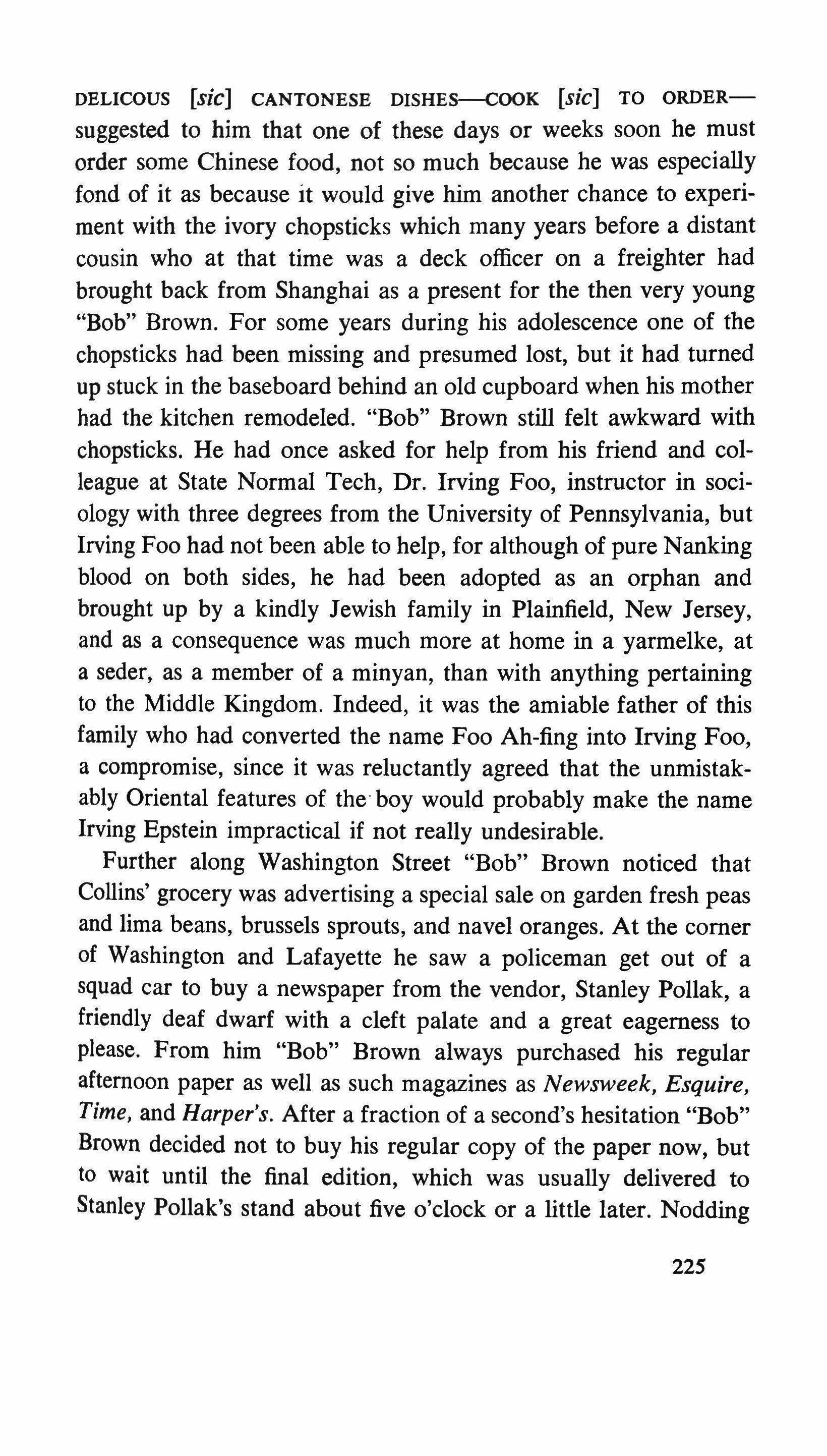
DELICOUS [sic] CANTONESE DISHES---COOK [sic] TO ORDERsuggested to him that one of these days or weeks soon he must order some Chinese food, not so much because he was especially fond of it as because it would give him another chance to experiment with the ivory chopsticks which many years before a distant cousin who at that time was a deck officer on a freighter had brought back from Shanghai as a present for the then very young "Bob" Brown. For some years during his adolescence one of the chopsticks had been missing and presumed lost, but it had turned up stuck in the baseboard behind an old cupboard when his mother had the kitchen remodeled. "Bob" Brown still felt awkward with chopsticks. He had once asked for help from his friend and colleague at State Normal Tech, Dr. Irving Foo, instructor in sociology with three degrees from the University of Pennsylvania, but Irving Foo had not been able to help, for although of pure Nanking blood on both sides, he had been adopted as an orphan and brought up by a kindly Jewish family in Plainfield, New Jersey, and as a consequence was much more at home in a yarmelke, at a seder, as a member of a minyan, than with anything pertaining to the Middle Kingdom. Indeed, it was the amiable father of this family who had converted the name Foo Ah-fing into Irving Foo, a compromise, since it was reluctantly agreed that the unmistakably Oriental features of the" boy would probably make the name Irving Epstein impractical if not really undesirable. Further along Washington Street "Bob" Brown noticed that Collins' grocery was advertising a special sale on garden fresh peas and lima beans, brussels sprouts, and navel oranges. At the comer of Washington and Lafayette he saw a policeman get out of a squad car to buy a newspaper from the vendor, Stanley Pollak, a friendly deaf dwarf with a cleft palate and a great eagerness to please. From him "Bob" Brown always purchased his regular afternoon paper as well as such magazines as Newsweek, Esquire, Time, and Harper's. After a fraction of a second's hesitation "Bob" Brown decided not to buy his regular copy of the paper now, but to wait until the final edition, which was usually delivered to Stanley Pollak's stand about five o'clock or a little later. Nodding 225

to Stanley Pollak, who responded with a cheery Boobo Ber Bow [Hello, Mr. Brown] in an aureole of spittle, "Bob" Brown walked on. Just before he reached his own comer of Washington and 13th he noticed the "Didie King" diaper-laundry truck pass a parked Buick station wagon in which a large black poodle lay fast asleep on the front seat. He reached the comer just as a small girl who had skipped by him a second earlier threw a chewing-gum wrapper in the gutter. A block away, down East 13th, he could see the back of the postman, Albert Finch, and the thought flashed through his mind that the mail had just been delivered.
from "Bob" Brown's Fourth Year at State Normal Tech
[H the difference between 'Herb' Johnson's stuff and, say, Ulysses, with its many details from the teeming Dublin of June 16, 1904, is that these details in Joyce are likely to recur-to become motifs, to acquire some sort of symbolic value. In the 'Bob' Brown books this is not the case. Except for a few routine activities of 'Bob' Brown, and a few 'routine' people, nothing is ever repeated, no one ever reappears. So with the people and places mentioned, the momentary details, in the foregoing sample, copied at random from a 'Bob' Brown novel picked out of the shelf at random.
"I should add here-what you as a 'Bob' Brown 'fan' must have noted on your own-that when people and 'events' (the wrong term, certainly!) are repeated, it is likely to be in exactly the same words every time. Thus, while we are never again likely to see Mr. Harold Anspacher or young Terry Williams, Jr., we are likely to re-encounter Mr. Lin Shan-Ii or Stanley Pollak, the cheerful though unfortunately 'disadvantaged' news-vendor (and in fact I believe both of them turn up hundreds of times in the whole 'Bob' Brown series)-but always in the same words. Far from acquiring any 'weight' or 'meaning' as a consequence of these repetitions, such 'characters' (again the word is just no good), or such places as Collins' grocery, seem to grow increasingly trivial (or decreasingly important). I hope this is all clear to you."
W. B. S. (in a note to G. G.)]
226
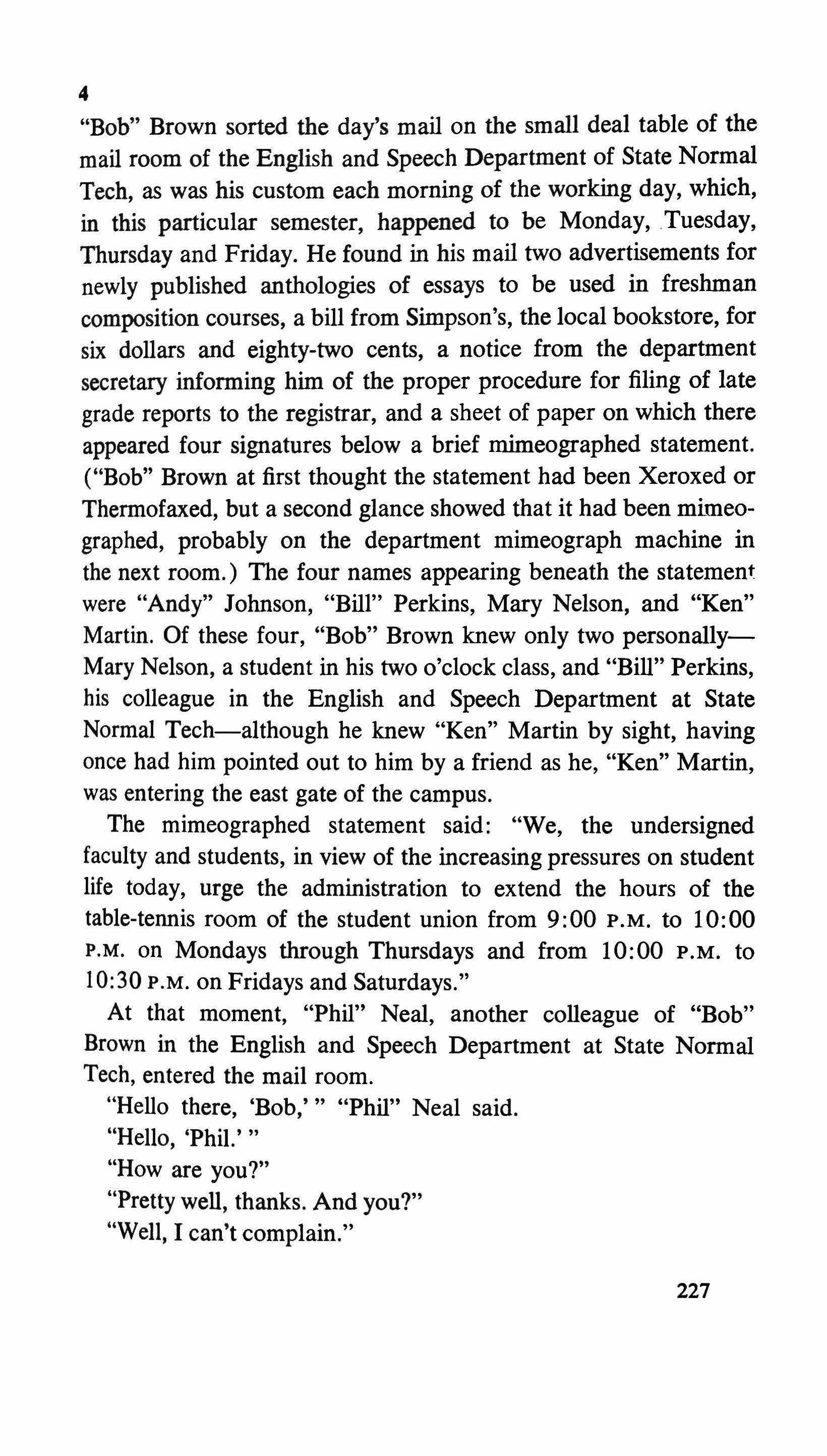
"Bob" Brown sorted the day's mail on the small deal table of the mail room of the English and Speech Department of State Normal Tech, as was his custom each morning of the working day, which, in this particular semester, happened to be Monday, Tuesday, Thursday and Friday. He found in his mail two advertisements for newly published anthologies of essays to be used in freshman composition courses, a bill from Simpson's, the local bookstore, for six dollars and eighty-two cents, a notice from the department secretary informing him of the proper procedure for filing of late grade reports to the registrar, and a sheet of paper on which there appeared four signatures below a brief mimeographed statement. ("Bob" Brown at first thought the statement had been Xeroxed or Thermofaxed, but a second glance showed that it had been mimeographed, probably on the department mimeograph machine in the next room.) The four names appearing beneath the statement were "Andy" Johnson, "Bill" Perkins, Mary Nelson, and "Ken" Martin. Of these four, "Bob" Brown knew only two personallyMary Nelson, a student in his two o'clock class, and "Bill" Perkins, his colleague in the English and Speech Department at State Normal Tech-although he knew "Ken" Martin by sight, having once had him pointed out to him by a friend as he, "Ken" Martin, was entering the east gate of the campus.
The mimeographed statement said: "We, the undersigned faculty and students, in view of the increasing pressures on student life today, urge the administration to extend the hours of the table-tennis room of the student union from 9:00 P.M. to 10:00 P.M. on Mondays through Thursdays and from 10:00 P.M. to 10:30 P.M. on Fridays and Saturdays."
At that moment, "Phil" Neal, another colleague of "Bob" Brown in the English and Speech Department at State Normal Tech, entered the mail room.
"Hello there, 'Bob,''' "Phil" Neal said.
"Hello, 'Phil.'
"How are you?"
"Pretty well, thanks. And you?"
"Well, I can't complain."
4
227
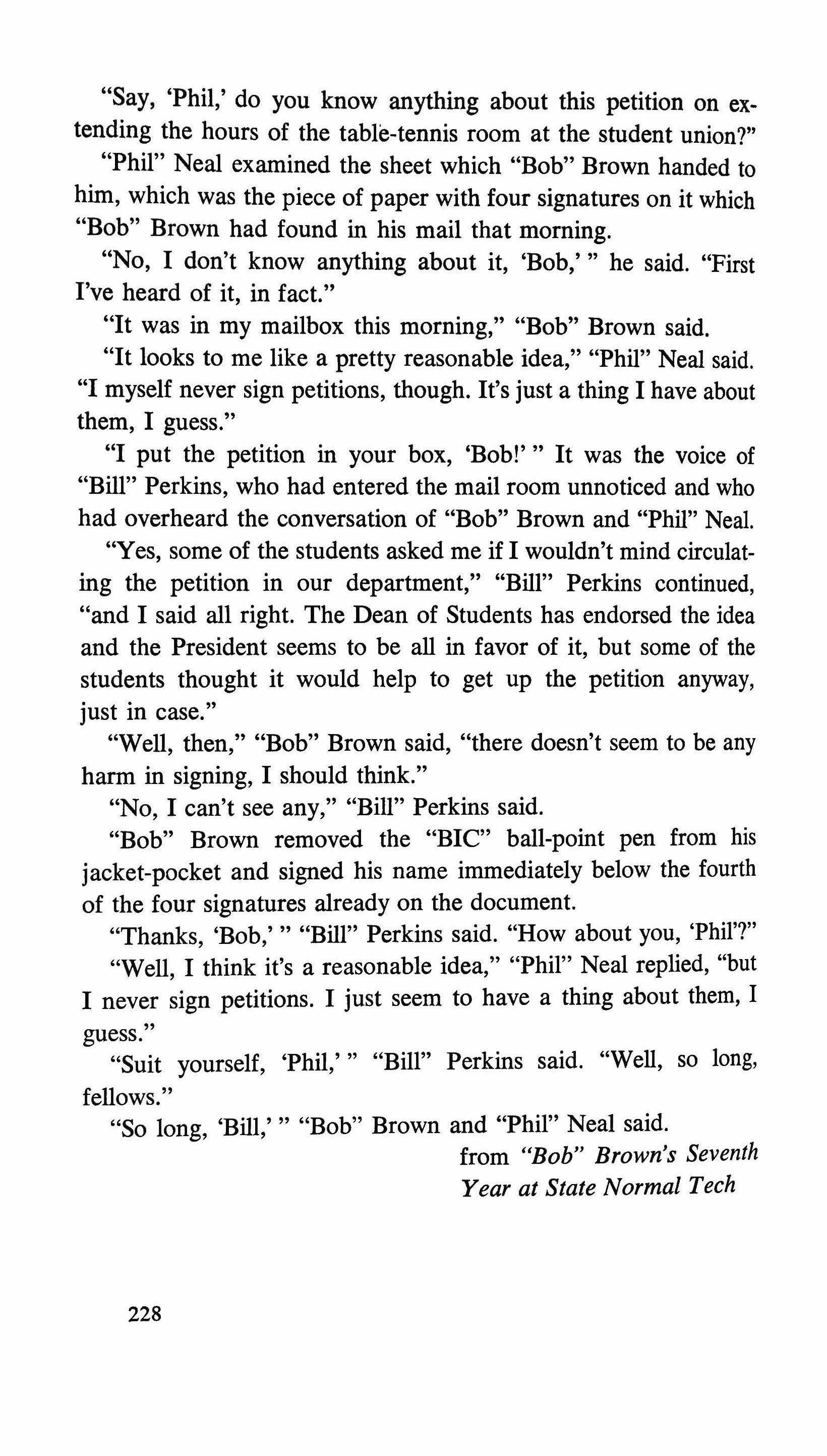
"Say, 'Phil,' do you know anything about this petition on extending the hours of the table-tennis room at the student union?"
"Phil" Neal examined the sheet which "Bob" Brown handed to him, which was the piece of paper with four signatures on it which "Bob" Brown had found in his mail that morning.
"No, I don't know anything about it, 'Bob,'" he said. "First I've heard of it, in fact."
"It was in my mailbox this morning," "Bob" Brown said.
"It looks to me like a pretty reasonable idea," "Phil" Neal said. "I myself never sign petitions, though. It's just a thing I have about them, I guess."
"I put the petition in your box, 'Bob!'" It was the voice of "Bill" Perkins, who had entered the mail room unnoticed and who had overheard the conversation of "Bob" Brown and "Phil" Neal.
"Yes, some of the students asked me if I wouldn't mind circulating the petition in our department," "Bill" Perkins continued, "and I said all right. The Dean of Students has endorsed the idea and the President seems to be all in favor of it, but some of the students thought it would help to get up the petition anyway, just in case."
"Well, then," "Bob" Brown said, "there doesn't seem to be any harm in signing, I should think."
"No, I can't see any," "Bill" Perkins said.
"Bob" Brown removed the "BIC" ball-point pen from his jacket-pocket and signed his name immediately below the fourth of the four signatures already on the document.
"Thanks, 'Bob,' "Bill" Perkins said. "How about you, 'Phi!'?"
"Well, I think it's a reasonable idea," "Phil" Neal replied, "but I never sign petitions. I just seem to have a thing about them, I guess."
"Suit yourself, 'Phil,''' "Bill" Perkins said. "Well, so long, fellows."
"So long, 'Bill,' "Bob" Brown and "Phil" Neal said. from "Bob" Brown's Seventh Year at State Normal Tech
228
[" I think you'll find it just as interesting as the previous sixmaybe even more so in view of the way 'Herb' Johnson has here established his 'relevance' to current problems by introducing the theme of campus protest and 'dissent!'
G. G. (in a note to W. B. S.)]

5
"Bob" Brown emptied the change from his trousers pockets before hanging the trousers on the back of the chair next to his bed. Then, setting the alarm of the Benrus clock-radio for eight-thirtyfive A.M., "Bob" Brown turned the covers back and lay down in bed. Although it was highly unusual for "Bob" Brown to dream, tonight was an exception. "Bob" Brown dreamed he was sitting at his desk in his office in Bates Hall, the new Liberal Arts building into which the English and Speech Department at State Normal Tech had moved earlier this year, and he was correcting a batch of term papers for his sophomore class in Communications Skills. One of the papers, the paper which, in his dream, he was reading, read as follows: "Shakespeare's play, Hamlet, is one of the greatest plays of all time and a perennial favorite of those who have a love of literature. Many scholars have debated for many years over numerous problems in this play. Perhaps that is why it is so great. One of the most important problems in the play that I would like to discuss is motivation At this point in "Bob" Brown's dream, "Bob" Brown's reading was interrupted by the entry of a student, "Bob" Clark, who was in waking life one of the better students in "Bob" Brown's sophomore class in Communications Skills.
"Professor Brown?" said "Bob" Clark.
"Yes," answered "Bob" Brown. "Come in, Mr. Clark."
"Bob" Clark entered the office and sat down.
"What can I do for you?"
"Well, I was just wondering, Mr. Brown, I mean, Professor Brown, like, well see I've been doing some part-time work for the Junior Chamber of Commerce and we're holding a raffle on the 18th with the proceeds to go to the children of policemen
229
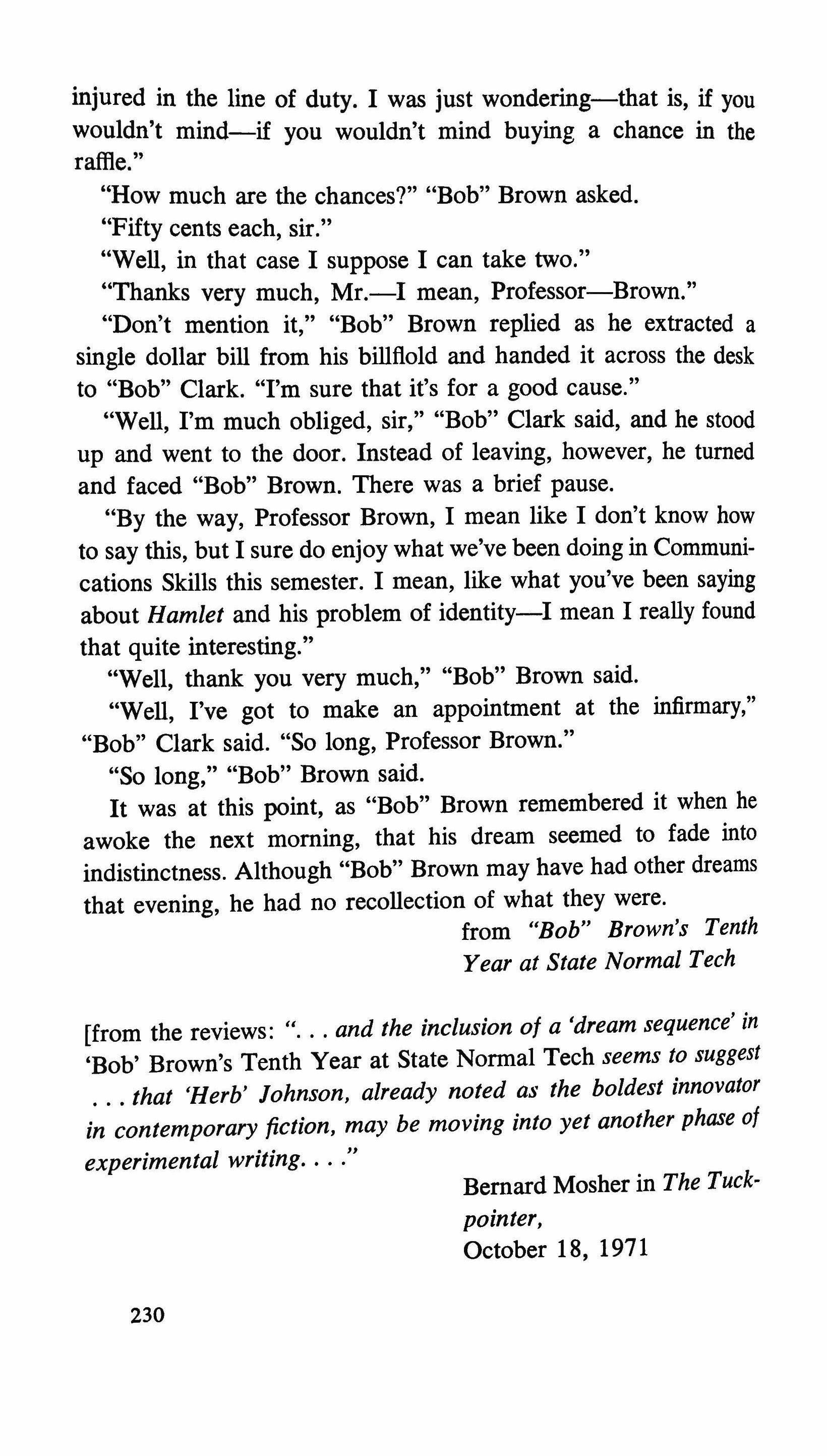
injured in the line of duty. I was just wondering-that is, if you wouldn't mind-if you wouldn't mind buying a chance in the raffle."
"How much are the chances?" "Bob" Brown asked.
"Fifty cents each, sir."
"Well, in that case I suppose I can take two."
"Thanks very much, Mr.-I mean, Professor-Brown."
"Don't mention it," "Bob" Brown replied as he extracted a single dollar bill from his billflold and handed it across the desk to "Bob" Clark. "I'm sure that it's for a good cause."
"Well, I'm much obliged, sir," "Bob" Clark said, and he stood up and went to the door. Instead of leaving, however, he turned and faced "Bob" Brown. There was a brief pause.
"By the way, Professor Brown, I mean like I don't know how to say this, but I sure do enjoy what we've been doing in Communications Skills this semester. I mean, like what you've been saying about Hamlet and his problem of identity-I mean I really found that quite interesting."
"Well, thank you very much," "Bob" Brown said.
"Well, I've got to make an appointment at the infirmary," "Bob" Clark said. "So long, Professor Brown."
"So long," "Bob" Brown said.
It was at this point, as "Bob" Brown remembered it when he awoke the next morning, that his dream seemed to fade into indistinctness. Although "Bob" Brown may have had other dreams that evening, he had no recollection of what they were.
from "Bob" Brown's Tenth Year at State Normal Tech
[from the reviews: and the inclusion 0/ a 'dream sequence' in 'Bob' Brown's Tenth Year at State Normal Tech seems to suggest that 'Herb' lohnson, already noted as the boldest innovator in contemporary fiction, may be moving into yet another phase of experimental writing
Bernard Mosher in The Tuckpointer, October 18, 1971
230

"I've just been reading the latest 'Bob' Brown book, and as usual am 'bowled over' by 'Herb' lohnson's unflagging creative energyit should be clear by now to all but the meanest intellects (names on request) that 'Herb' lohnson can do anything he chooses within the artistic limits he sets for himself, that (like the greatest artists of all ages) he has achieved total mastery of his materials and means-so one imagines Shakespeare emitting Antony and Cleopatra or Proust Le Temps Retrouve
w. B. S. (in a note to G. G.)]
Awardl
TriQuarterly takes great pride in awarding its annual Robe Grillee Prize for the most novel novel to Herbert Finch ("Herb") Johnson, author of the "Bob" Brown books, a small sampling of which precedes. The citation reads (in part): " an unflagging seeker after perfection in his chosen form, 'onlie begetter of 'le roman neutre,' 'Herb' Johnson has from the very beginning The Prize this year is in fact several prizes in one "bag": $75,000 in tax-exempt municipal bonds; a round trip, first-class, all expenses paid, to idyllic Bali, with two glorious weeks at the Bali Hilton, for "Herb" Johnson and his girl-friend, Donna Novick; a six-pack of Wild Turkey; and an autographed photograph, suitably framed, of novelist James Jones. The awards were made at a banquet at TriQuarterly's rooms in University Hall, Evanston, with editor Charles ("Chuck") Newman in the chair; twenty-four jeroboams of Taittinger "Blanc de Blanc" were consumed by the guests, who represented a veritable cross-section of all that is smartest in the North Shore's world of letters. "Herb" Johnson responded to the toast by the Chairman with a few fitting words from Lucius Annaeus Seneca:
Perdomita tellus, tumida cesserunt freta, inierna nostros regna sensere impetus; immune caelum est, dignus Alcide labor in alta mundi spatia sublimis [erar, petatur aether !
231
from Minds meet WALTER ABISH

Taken aback by the message
Harry discovers Gwen in bed with Tobias and is taken aback. He says to himself, I am taken aback. His face more or less confirms this. Dubiously he inspects his face in the bathroom mirror. He is filled with a profound melancholy as well as distrust. How confusing, he thinks. Do I mistrust my melancholy, or am I melancholy because I am riddled with mistrust.
Most men feel frustrated by the time they reach thirty because there are only so many ways of making love. While the lower part of the body is actively engaged during this act of passion the face questions the veracity of its own existence. In its distress it beams all kinds of signals to the other face. These signals are by no means reliable. One might say that the faces are immersed in the sell.
Tobias is a health freak. He restricts his intake of carbohydrates and teaches history at night school. It leaves him a lot of time during the day. He and Gwen share in common a love for history. He is expounding on the failure of the New Deal, while she is holding his limp prick. Harry is in five places at the same time. He is at the keyhole, in the stairwell, in the basement, passing in a bus, at work Over the years his emotions have been eroded.
232 TriQuarterly
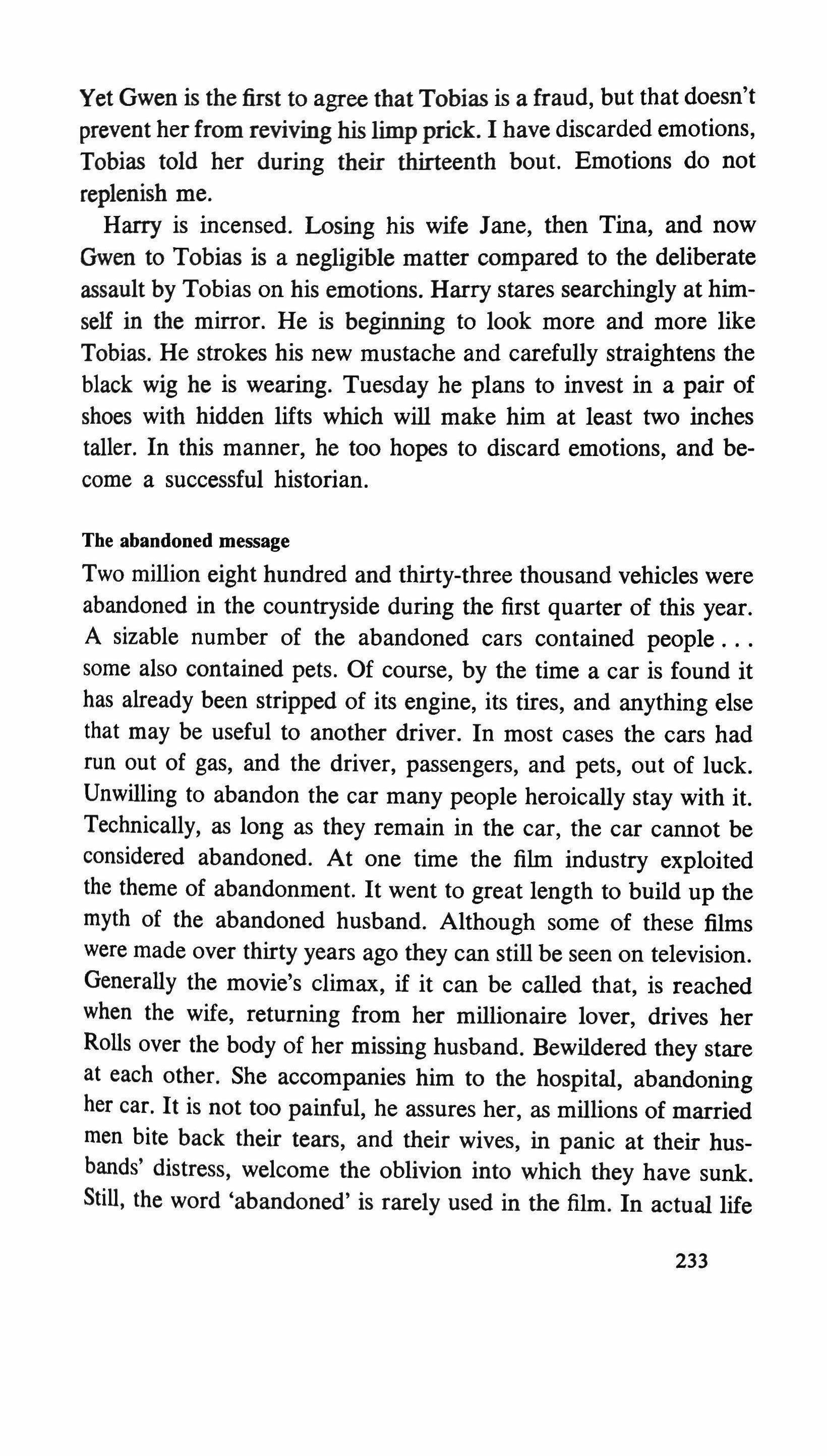
Yet Gwen is the first to agree that Tobias is a fraud, but that doesn't prevent her from reviving his limp prick. I have discarded emotions, Tobias told her during their thirteenth bout. Emotions do not replenish me.
Harry is incensed. Losing his wife Jane, then Tina, and now Gwen to Tobias is a negligible matter compared to the deliberate assault by Tobias on his emotions. Harry stares searchingly at himself in the mirror. He is beginning to look more and more like Tobias. He strokes his new mustache and carefully straightens the black wig he is wearing. Tuesday he plans to invest in a pair of shoes with hidden lifts which will make him at least two inches taller. In this manner, he too hopes to discard emotions, and become a successful historian.
The abandoned message
Two million eight hundred and thirty-three thousand vehicles were abandoned in the countryside during the first quarter of this year. A sizable number of the abandoned cars contained people some also contained pets. Of course, by the time a car is found it has already been stripped of its engine, its tires, and anything else that may be useful to another driver. In most cases the cars had run out of gas, and the driver, passengers, and pets, out of luck.
Unwilling to abandon the car many people heroically stay with it. Technically, as long as they remain in the car, the car cannot be considered abandoned. At one time the film industry exploited the theme of abandonment. It went to great length to build up the myth of the abandoned husband. Although some of these films were made over thirty years ago they can still be seen on television. Generally the movie's climax, if it can be called that, is reached when the wife, returning from her millionaire lover, drives her Rolls over the body of her missing husband. Bewildered they stare at each other. She accompanies him to the hospital, abandoning her car. It is not too painful, he assures her, as millions of married men bite back their tears, and their wives, in panic at their husbands' distress, welcome the oblivion into which they have sunk. Still, the word 'abandoned' is rarely used in the film. In actual life
233

it is used all too frequently; i.e. we should abandon Harlem, or we abandoned our children. Abandoned children grow up to make love like other people. But there is a sadness, a lingering wet sadness on their sallow faces as they pick up a girl on the road, and then drive their cars in circles until they have run out of gas.
To Gwen the word 'abandon' is nothing new. She's familiar with the story of the abandoned little girl. Swept away by the tremendous pathos of the story, she accuses her father of turning her out. You slammed the door in my face. It was ice cold winter and you abandoned me. All I had to keep warm was a box of matches.
Harry is disturbed whenever Gwen's father comes to visit, comes to plead for forgiveness. She lets him caress her small pointed breasts. His tears leave moist spots on her freshly starched dress. He's a bit daft, she tells Harry. He still thinks I am fourteen. What are you planning to do this morning? asked Harry. I am going to love myself and remember things
As things stand there is a residue of bitterness about the message. Harry equivocates, he can't decide whether or not the 1,000 foot metal reflector at the Arecibo Ionospheric Observatory should have been destroyed. It took eight years to assemble and will take at least five years to repair. Most of the scientists were evacuated by boat to St. John in the Virgin Islands, where they spend their time drinking duty free liquor, and making tooled leather belts. Their happy frame of mind is causing a lot of people to have second thoughts about the future destruction of scientific equipment. Harry, sitting in his room, thoughtfully says: I can't think of anyone to abandon.
Abased by the message
Some women are known to leave their apartment not later than ten each morning. They are the furtive recipients of a message. This is written allover their flushed but inscrutable faces. But no one can make out the message itself. Gwen takes a taxi to her destination. She feels quite relaxed, and even strikes up a conversation with the driver, who confesses that he has been driving past her
234

building for the last two weeks, hoping that she would hail his cab. Nothing can undermine her confidence. She stares at the back of his large closely cropped head, and reads his unpronounceable name on the dashboard. All things being equal, she gives him a large tip, as well as her telephone number. She is sometimes given to impulsive behavior. In less than an hour she will be sipping coffee and describing her totally irresponsible action. She likes to hear herself speak. She likes to be surprised by her own words. It is Spring or Summer as she races up the two flights of stairs and embraces whoever answers the door. Of course, things do not always go according to plan. There's that initial awkwardness that has to be overcome, when the man keeps repeating: But who are you? What do you want? After further delays and hesitations, the man panics and locks himself in the bathroom. No amount of pounding on the door will make him open it. All this care on what to wear is thrown to the wind, Gwen tells Harry. But the next time I'll come prepared, I'll put it in print, and slip it under his door.
Abasement is located in the mind, but sometimes it is performed for the benefit of the heart. Gwen pictures herself lying in bed with the two hundred pound taxi driver she met the day before. I am totally independent, she says to herself. In Spring or Summer a woman carefully examines the moist stains on her white dress, gladly accepting a handkerchief from the first man she meets, fully aware of his complicity. I want to experience my distress in every which way, says Gwen. The stains are washed out in lukewarm water. The distress on the woman's face is only temporary. It appears to be related to the stains on her dress.
Harry reluctantly listens to Gwen describe her most recent abasement. It resembles Irma's in Tripoli. What did you do when the two hundred pound taxi driver followed you into the building? Gwen grimly describes the situation. Their conversation is studded with technical terms. Harry feels restless. He lights a cigarette. He opens a window. He paces up and down the room. Theoretically at least half of the room is his. But which half. Left or right?
235

Abashed while receiving the message
Harry is intensely sensitive to what others think of him. He is so afraid of asking the wrong question, or mispronouncing a word, that frequently he gets on a bus and rides all the way to the end of the line rather than ask the driver or one of the passengers where the bus is going. Many men, like Harry, are not certain what day of the week it is. Yet others have minds like clocks.
Harry steps into a bank in Queens and points a pistol at the bank teller. Let's have all your dough, he says. Dough, mocks the teller. What do you think this is, a bakery? Next thing you'll be asking for bread. Harry blushes furiously. He is being mocked. He feels abashed. It is a familiar quandary, so he shoots the bank teller, and then hops on the first passing bus outside the bank. Killing is a stabilizing factor in this society. But in no time Harry is again filled with a familiar panic, he doesn't know in which direction the bus is headed.
Harry undresses a woman and then undresses himself. He prolongs the undressing; he folds his trousers, his shirt, his handkerchief. He is relieved that the woman is not his wife Jane, or Tina, or Gwen, or Irma. She is someone he will not run into again. The woman cannot resist laughing when she notices the tattoo of the Mysterious Lady over his heart. Harry sees nothing funny about the tattoo. Beds also act as stabilizing factors, but not tattoos. She is still laughing when he leaves her room half an hour later. Problems between couples frequently arise I'm too modest, thinks Harry bitterly, and there are gaps in my memory. I no longer remember where I met the mysterious woman of my heart.
Once the knowledge of the message has abated
When a knife is pulled out of the body, the pain is said to have abated although dying, too, is a form of abatement. People have a predilection for the tangible. They rest on beds, on chairs, on tree stumps, on walking sticks. Napoleon once observed that people cannot rest comfortably on their bayonets. But this remark has been taken out of context. It was lifted from a letter Napoleon
236

wrote to his brother-in-law who had a lot of unruly people on his bayonets in Poland. In any event, where there is no room for stress, for love, for anger, there is even less room for abatement.
People everywhere study the calendar, and mark each day as it passes into a funereal darkness, out of which the next day emerges. They mark their birthdays on their calendars, and skip certain days to bring the moment of their happiness closer. The calendar is standardized and no matter how one looks at it, it is a measure that encloses the apartness with all its offensive sounds. Last year on that and that day I met so and so, a woman will say to herself. I was alone as I am now I smiled at him I was wearing my see-through dress. My breasts were beaming messages to his eyes. Memories are also stabilizing factors. They preserve and restore as well as animate. Why else would one wish to plunder the museums? Still, memories in their random selectiveness can be said to perform a kind of abatement.
But as far as color is concerned, memory remains about as reliable as black and white film. Harry studiously examines the photographs of a nude at the Museum of Modern Art. He has lost all sense of time. He finds the nude engrossing, most attractive, incredibly provocative. The nude stares back at him. The Museum is empty, the gates are locked, the lights are out. Somewhere in the building a guard is inserting his passkey into all kinds of elaborate electronic devices. There may even be an alert German shepherd at his heels. If all this is true, thinks Harry, then why hasn't my mind triggered the alarm system? Can it be that my mind doesn't exist?
The abbreviated message
When the Chinese Communist Forces wish to pass for the Cooperative Commonwealth Federation, or when a physician wishes to convert his patient's conditioned reflex into a critical ratio, they abbreviate. When the dead are picked up and brought to the assembly area it is always on CR, carrier's risk. People have been known to lose an arm or leg in transit. They are dw. Deadweight,
237
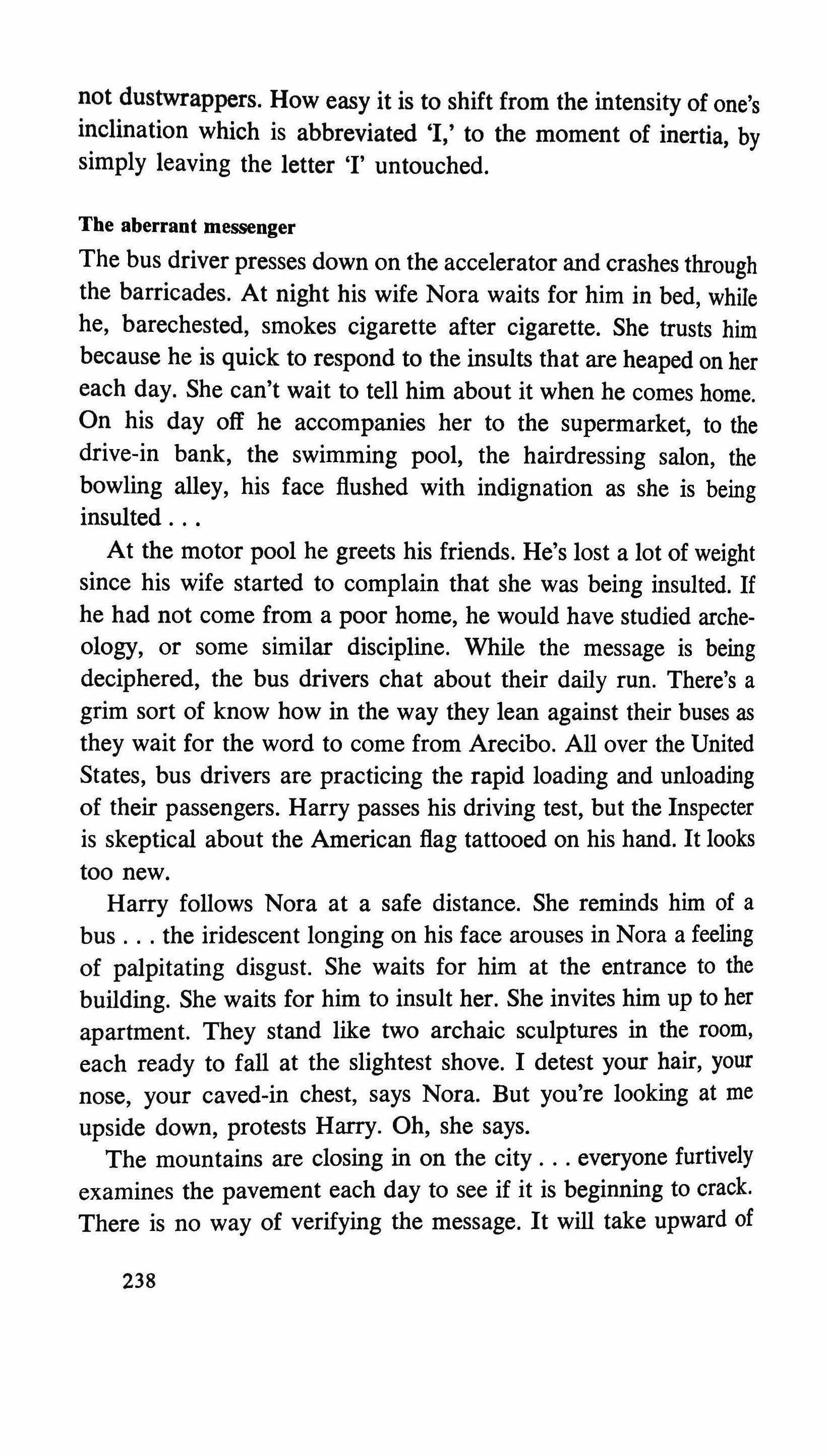
not dustwrappers. How easy it is to shift from the intensity of one's inclination which is abbreviated 'I,' to the moment of inertia, by simply leaving the letter 'I' untouched.
The aberrant messenger
The bus driver presses down on the accelerator and crashes through the barricades. At night his wife Nora waits for him in bed, while he, barechested, smokes cigarette after cigarette. She trusts him because he is quick to respond to the insults that are heaped on her each day. She can't wait to tell him about it when he comes home. On his day off he accompanies her to the supermarket, to the drive-in bank, the swimming pool, the hairdressing salon, the bowling alley, his face flushed with indignation as she is being insulted
At the motor pool he greets his friends. He's lost a lot of weight since his wife started to complain that she was being insulted. If he had not come from a poor home, he would have studied archeology, or some similar discipline. While the message is being deciphered, the bus drivers chat about their daily run. There's a grim sort of know how in the way they lean against their buses as they wait for the word to come from Arecibo. All over the United States, bus drivers are practicing the rapid loading and unloading of their passengers. Harry passes his driving test, but the Inspecter is skeptical about the American flag tattooed on his hand. It looks too new.
Harry follows Nora at a safe distance. She reminds him of a bus the iridescent longing on his face arouses in Nora a feeling of palpitating disgust. She waits for him at the entrance to the building. She waits for him to insult her. She invites him up to her apartment. They stand like two archaic sculptures in the room, each ready to fall at the slightest shove. I detest your hair, your nose, your caved-in chest, says Nora. But you're looking at me upside down, protests Harry. Oh, she says.
The mountains are closing in on the city everyone furtively examines the pavement each day to see if it is beginning to crack. There is no way of verifying the message. It will take upward of
238
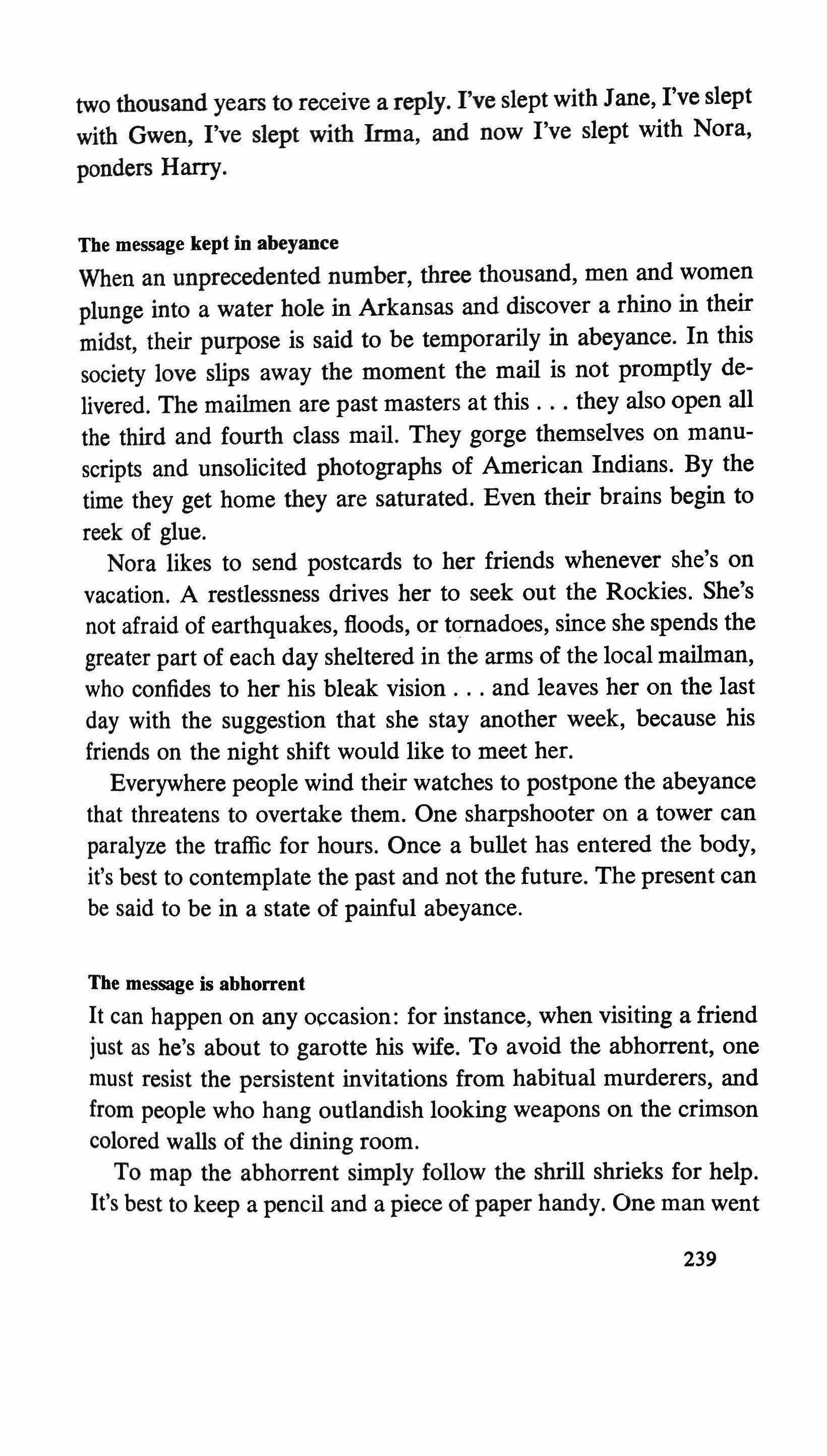
two thousand years to receive a reply. I've slept with Jane, I've slept with Gwen, I've slept with Irma, and now I've slept with Nora, ponders Harry.
The message kept in abeyance
When an unprecedented number, three thousand, men and women plunge into a water hole in Arkansas and discover a rhino in their midst, their purpose is said to be temporarily in abeyance. In this society love slips away the moment the mail is not promptly delivered. The mailmen are past masters at this they also open all the third and fourth class mail. They gorge themselves on manuscripts and unsolicited photographs of American Indians. By the time they get home they are saturated. Even their brains begin to reek of glue.
Nora likes to send postcards to her friends whenever she's on vacation. A restlessness drives her to seek out the Rockies. She's not afraid of earthquakes, floods, or tornadoes, since she spends the greater part of each day sheltered in the arms of the local mailman, who confides to her his bleak vision and leaves her on the last day with the suggestion that she stay another week, because his friends on the night shift would like to meet her.
Everywhere people wind their watches to postpone the abeyance that threatens to overtake them. One sharpshooter on a tower can paralyze the traffic for hours. Once a bullet has entered the body, it's best to contemplate the past and not the future. The present can be said to be in a state of painful abeyance.
The message is abhorrent
It can happen on any occasion: for instance, when visiting a friend just as he's about to garotte his wife. To avoid the abhorrent, one must resist the persistent invitations from habitual murderers, and from people who hang outlandish looking weapons on the crimson colored walls of the dining room.
To map the abhorrent simply follow the shrill shrieks for help. It's best to keep a pencil and a piece of paper handy. One man went
239

down a sewer to recover his leg, only to discover that it wasn't his. With the construction of the Great Chinese Wall, travel as we know it came to a virtual standstill. The Great Wall impeded movement People resisted being walled in. They complained that their imagination was being stifled. Pole vaulting became a national pastime What are we dividing with our walls, mused Harry. We are dividing our abhorrence. Soon, as more and more walls are added, our present abhorrence will survive only as a faint memory.
What do you look like, people shout at each other across the walls. They lie about their appearance. It is pointless, really, but pole vaulting has left its scars. Their bodies follow an arc of ninety degrees in the air as they practice vaulting over the wall. No one has yet succeeded. Half the men in this country are bricklayers, the other half are dying from exhaustion. But Harry is well out of it. He has summed up his present position, but once the abhorrent has been eradicated, he plans to sum it up again.
I don't like the way you swallow your words, says Jane. I don't like the way you try to disguise your weakness by growing long sideburns, or the way you use an entire page when you sign your name in the hotel register and I'm not crazy about the headstone you picked for me.
The message above
The above is chiefly referred to by people who are familiar with the below. The skywriter, like you and me, enjoys an occasional chat with his neighbor's wife. In marked contrast, horses and collectors of rare china weave back and forth with delicate, almost prissy motions. Their exercises show a kind of refinement, a result of inbreeding Horses are kept in houses that are called stables, and mostly, with rare exceptions, breed only with their own kind. Collectors channel their furious energy into collecting they have been known to abstain from sexual intercourse out of a desire not to spread their beautiful glaze.
When a pilot flies upside down, the above seeks to pull him be-
240

low. The subject of the above is broached in most of the literature of the antiquities. It has also marked the American sensibility. I'm not above sleeping with my friend's wife, Tobias tells Harry. In Minnesota twenty thousand people gathered in the main square and watched Tobias as he demonstrated the toy helicopter. Hallelujah, they cried, as he stayed aloft for over two hours.
The message is absent
The messenger wears a clean shirt, but the grime is visible under his nails The sky is a dull grey, but further out, only a few hundred miles away, it is a Mediterranean blue. Everyone evokes its blue absence
People indiscriminately speak about each other's tragedies they speak about them in an almost flippant manner so as not to be carried away by the imminence of the startling discovery that they are totally immune to the burning house next door, and have no further need to disguise their diffidence. So the absent is a solution If the house next door is not burning, so much the better The messenger spotted the two men in leather jackets waiting for him in the hallway. He stopped. He hesitated. He raced back upstairs, they in hot pursuit. He ran past the doors, the closed doors with the familiar numbers: 5a, 5b, 5c, 5d, 6a, 6b, 6c, 6d, 7a but there was no seventh floor. Everything that is not here is absent. The only thing that is not absent, said the policeman's wife, is lust. May I, asked the messenger, unbuttoning her blouse. He had a clean shirt on, she said afterwards, justifying her amorous response, a response that had been all out of proportion to his.
In this humdrum life so many encounters lack the specificity of a stain. Everywhere the housewife looks there is lust staring back at her. It is cold clinical lust, compressed into a can of shaving soap. She stares at it fixedly. One day she will cover herself with it.
The dockworkers assemble each day at the pier. They say 'present' when their name is called. They all have strong emotional fathers They have daughters who have learned to say: that's wonderful to hear. The men are unpacking crates that contain 241

machinery from Japan. The message on their muscles bulges with a fierce hunger, an unrelievable hunger that will settle like a wave, like a terrific squall over the upturned faces of the young men on Christopher Street.
The policeman on the beat calls the men by their first name. He calls them Archibald and Turnpike but the distance between the men and him cannot be bridged so easily. They refuse to acknowledge his authority, which is enough to keep them apart. The policeman's wife confuses all messages with lust. All that is not lust is absent. Their son is a mailman. One day he hopes to deliver the mail to the White House and screw the President's wife. When the people are absent in the early morning hours, each sound is accentuated, exaggerated each sound is being rehearsed for a later occasion People absent themselves behind. closed doors after hearing or reading the message: Is there any other way to live? They cloister themselves in small rooms with lousy smells and nervously munch biscuits.
Everything that happens a second time is unbearably familiar, except for the trip through the tunnel. People still tolerate the trip because it breaks the monotony of the sunshine. They remain inside their cars and think.
When my parents went dancing, said the policeman's son to Harry, I was absent. I yelled to them not to leave me, but they didn't hear me, or worse yet, they pretended not to hear me. Now I must have the President's wife.
To abstain from sending the message Harry has finally destroyed his play. It ran to eight hours with only two brief intermissions. All of the main characters, who resemble Harry in appearance, died either from suffocation, strangulation, or knife wounds. Harry had spent five long years working on the drama he worried and brooded a lot. There was a certain satisfaction in destroying the play, the satisfaction people take when they cut off a finger. Good riddance now I'll have fewer hangnails. It is the second drama Harry has destroyed. How many dramas does a man have in him?
242

The next day Harry started on a new play. It was about a man who jumped into the river to save another man from drowning. The man who jumped in resembled Harry, so did the man who was drowning. Neither knew how to swim. When both were fished out of the river, Harry's protagonist jumped in again. The first time, Harry reasons, he intended to save the drowning man. But the second time?
The play can be said to be about Harry and the Hudson River. Of course, to some extent it also included the barges that are towed up and down the river. It was unavoidable that Harry would include the barges. He had such a warm feeling towards them. He started the play with one objective in mind: that it be a happy play. He avoided using the word 'abstain.' There's no profit to be found in its use. It is droll, said Gwen, that Harry's play revolves around the river. The characters in the play fall into stereotypes: the dramatic Harry, the serious Harry, the miserly Harry, the hunchbacked Harry, the other Harry who is a buffoon, and the melancholy tugboat captain. Everyone who read the play was touched in some manner or form by its bathos. They could not help but pity Harry, and permitted him, this once just one time, so that he would know what ecstasy was like But Harry kept on being troubled by the inequities that made some people happier than others.
One day he met two friends from Minneapolis who were visiting the city. They urged him to accompany them to a whorehouse. At first he was reluctant to go, because it seemed such a tourist thing to do. But finally he agreed. He envisioned fantastic draperies and a marble staircase, and tall women with poodles on the leash. But there were no fancy draperies, no marble staircase, and no poodles. Filled with regret he and his two friends wandered over to a tattoo parlor. Now, at last, the mysterious woman of his dreams would be close to his heart, thought Harry.
The message comes apart
What about those notches that men make on their combs now that guns have been outlawed? The habitual desire to possess another
243
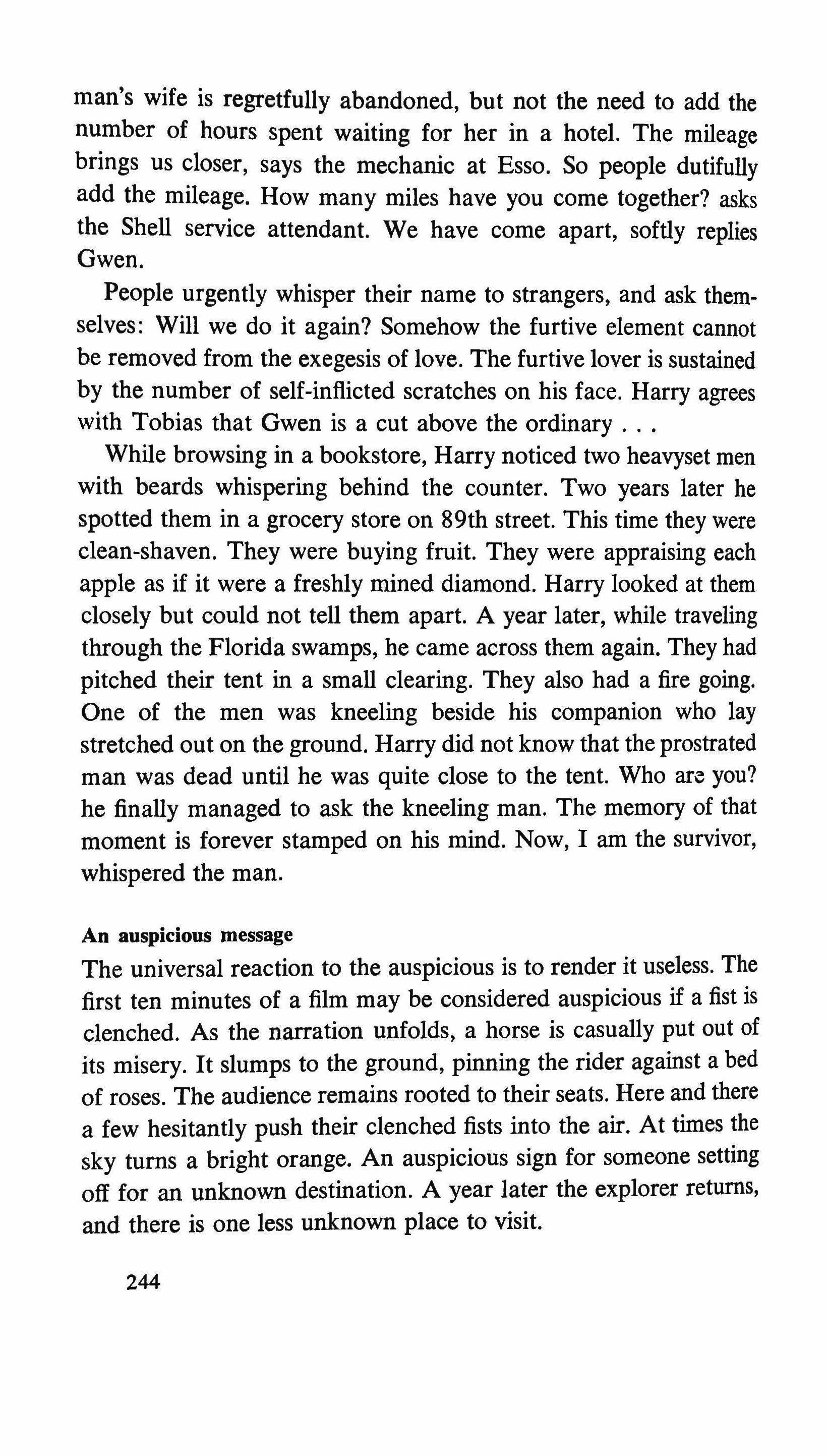
man's wife is regretfully abandoned, but not the need to add the number of hours spent waiting for her in a hotel. The mileage brings us closer, says the mechanic at Esso. So people dutifully add the mileage. How many miles have you come together? asks the Shell service attendant. We have come apart, softly replies Gwen.
People urgently whisper their name to strangers, and ask themselves: Will we do it again? Somehow the furtive element cannot be removed from the exegesis of love. The furtive lover is sustained by the number of self-inflicted scratches on his face. Harry agrees with Tobias that Gwen is a cut above the ordinary
While browsing in a bookstore, Harry noticed two heavyset men with beards whispering behind the counter. Two years later he spotted them in a grocery store on 89th street. This time they were clean-shaven. They were buying fruit. They were appraising each apple as if it were a freshly mined diamond. Harry looked at them closely but could not tell them apart. A year later, while traveling through the Florida swamps, he came across them again. They had pitched their tent in a small clearing. They also had a fire going. One of the men was kneeling beside his companion who lay stretched out on the ground. Harry did not know that the prostrated man was dead until he was quite close to the tent. Who are you? he finally managed to ask the kneeling man. The memory of that moment is forever stamped on his mind. Now, I am the survivor, whispered the man.
An auspicious message
The universal reaction to the auspicious is to render it useless. The first ten minutes of a film may be considered auspicious if a fist is clenched. As the narration unfolds, a horse is casually put out of its misery. It slumps to the ground, pinning the rider against a bed of roses. The audience remains rooted to their seats. Here and there a few hesitantly push their clenched fists into the air. At times the sky turns a bright orange. An auspicious sign for someone setting off for an unknown destination. A year later the explorer returns, and there is one less unknown place to visit.
244

In small lofts located in castiron buildings metal rods are being manufactured that will playa significant role when the auspicious moment arrives, although no one can tell what form that moment will take. The two musically gifted lovers do not wait for the auspicious moment as they set out to visit an aging aunt. They are all smiles as they ride to the station. The young man is the first to dismount. It is one of those incendiary moments when all of life is on the brink of a new discovery. The zip on his pants has burst open, and despite all desperate and feverish attempts refuses to close again. She felt a sudden relief as he, this pink cheeked lover of hers, rather than face her in this crisis, stepped in the path of the oncoming train. The auspicious exaggerates it adds another dimension to one's measured reliance upon messages.
245
from Harlequin's numbers
PATRICK CAHILL

There finally came a door that wasn't locked. It almost opened itself. In fact it did open itself and I thought I was falling in. But I only missed a step and staggered past the first stool. I tried to make the whole thing look natural.
It was a faulty entrance, but then it was a faulty entryway. Though it wasn't the wrong bar. I suppose I had expected more and was disappointed. And then the fleeing door hadn't helped the matter at all.
There was no gate or keeper. The man on the first stool hardly noticed me stagger past, looking natural. I was not asked for the shibboleth or a tessera, which I suppose is best. I didn't have one. There was no golden bough or dark hall. I heard no teeth. Or only those biting a glass to my right. I suppose I startled the man next to the stoic on the end.
The only flailing limbs I saw were those in conversation, or telling a joke. Everyone seemed in some stage of consciousness, except for a couple of heads that had hit the bar. I imagine the ashes were falling in those heads, covering the tongues right up to the teeth. But not a flake to be seen on a single hat brim. Though I would have to admit I envied some of those heads their hats.
The wind had died in the bar and the birds were left sleeping 246 TrlQuarterly

above the streets. The wind was left in the streets too, moving in the branches of the poles.
I was upset from the moment I missed the door, so much so that I stepped aside and tried not to recognize me pass. It didn't work though. I couldn't miss the look on that face, as though something had come to land on it. But my momentum was favoring me and I felt it would get me well into the room. I watched myself bouncing past and wished I had a drink to look at instead, but I knew there would be time for something subtle if I survived this. I could only hope that no one turned on the lights.
No one did.
But my eyes were adjusting to the bar and I saw myself approaching a stool. I was so afraid I would miss it I almost yelled. I looked numb approaching that stool, wondering I suppose why I hadn't hit the floor, and at each step my nerves paused, before dashing around again. I don't think I ever saw the stool; I think some mysterious force turned me to the right and when I ran into the stool I stopped.
I crawled onto that stool as though I had found a familiar curb. My face was adjusting to the warmth. My eyes began working almost as well as I remembered them working in the past.
I felt my hair was standing on my head where the wind had been. Maybe my nose was running too but that didn't matter to me, I would order a drink anyway. The bartender would have to react in his own way. He would have to accept the situation as quietly as he could.
By this time of course I had joined myself, since no one was looking. The stool was as comfortable as any curb, and I was glad to be back.
I'm sitting on my comfortable stool and I'm waiting. I'm sipping from a wine glass as well, and staring ahead at nothing. It's the price of the stool and not much as these things go.
I'm waiting for the dancer to arrive. He might not. After that I couldn't see myself arriving anywhere. But he might. And he might be worth another conversation. I do think we have talked. If we
247

haven't we should have and I've done something wrong again. A man who can act in that way deserves more than the time I give to those odd people in the streets. And those people in the streets seem very odd to me.
I don't feel nervous. I'm no longer embarrassed or practically unconscious. I've been put completely at ease in effect; a second ago I was trailing my fingers in the wine.
I had to put a stop to that. I don't want someone attacking me with hostile looks. I don't want to be taken from my stool and dropped. It was much easier to take my fingers out of the wine. And I'll need them anyway to help me remove my shoe. One bad shoe is holding back perfection on this earth. It's a trifle to be sure, but its will is that of a floodgate. My beat-up shoe. It's giving me a particularly bad time and I considered myself completely at ease. It must have been the walk that stirred up the old shoe, which is now attacking my foot, taking its revenge. There is combat everywhere it seems. The walk from the hotel I suppose, and then that debilitating walk from the door to the stool. I couldn't have made it past this stool I'm sure.
I bend down as though I have something to do under the bar, and release my shoe. The swollen foot begins to rise, it swings forward and hits the bar front.
The bar stopped it. It's fortunate my foot is not sticking out on the other side. I can imagine a bartender's reaction. It's fortunate too I'm not across from someone at a table. There are better ways to leave a bar; I'm misunderstood enough. I would have to explain my faith in homeostasis, that I don't consider myself acromegalic, but that something I can't explain has happened.
Homiletics is not my art.
At least my finger didn't swell. It's not stuck in the glass. I might have splashed a little wine onto the bar but it's hardly noticeable. No one has said a word about it.
About swollen limbs and things. The strange swelling. And only circumstantial evidence. Extenuating circumstances. Under a tree that combs the wind, in a meadow. Under sun and snow, the cir-
248
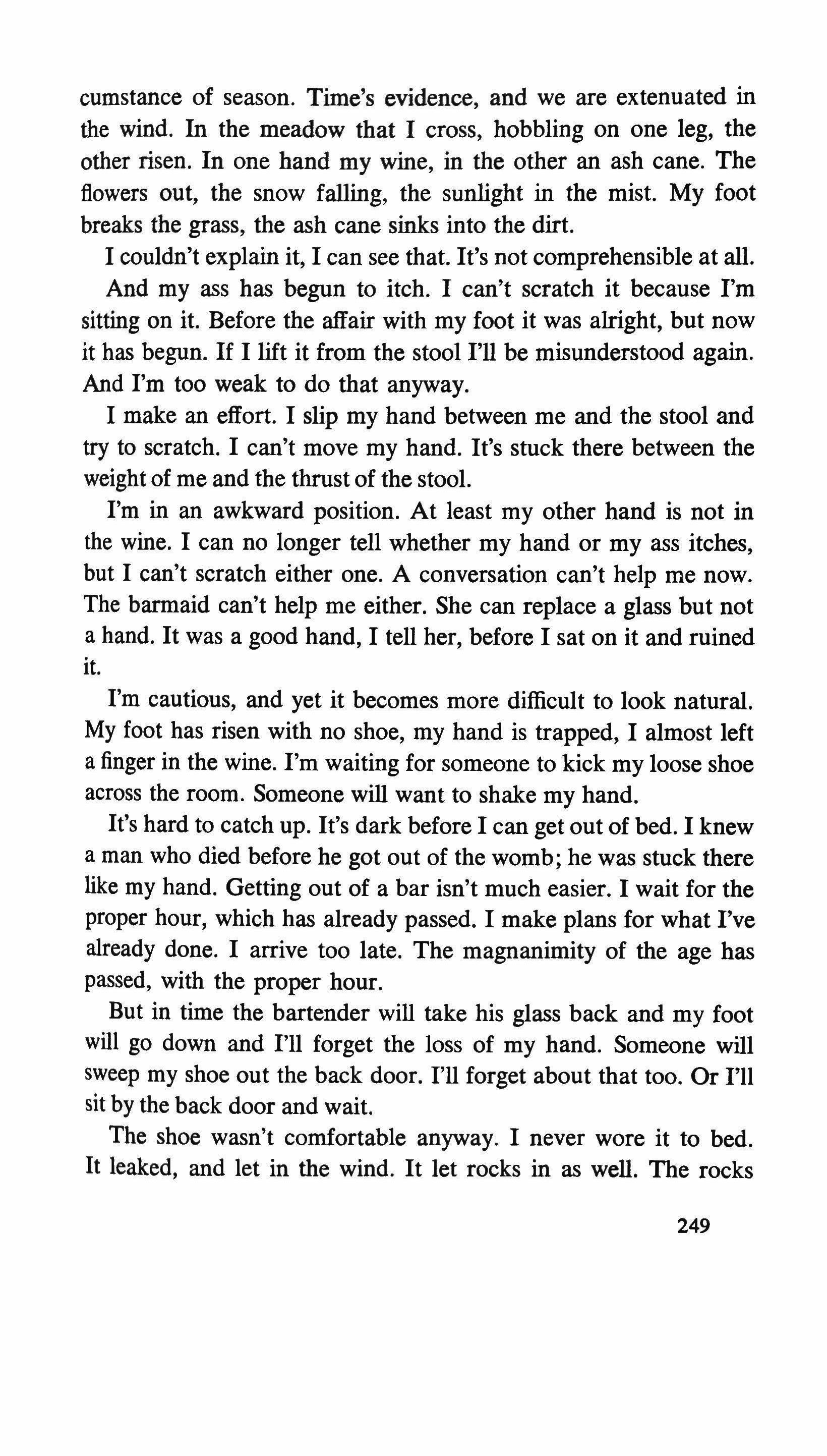
cumstance of season. Time's evidence, and we are extenuated in the wind. In the meadow that I cross, hobbling on one leg, the other risen. In one hand my wine, in the other an ash cane. The flowers out, the snow falling, the sunlight in the mist. My foot breaks the grass, the ash cane sinks into the dirt. I couldn't explain it, I can see that. It's not comprehensible at all. And my ass has begun to itch. I can't scratch it because I'm sitting on it. Before the affair with my foot it was alright, but now it has begun. If I lift it from the stool I'll be misunderstood again. And I'm too weak to do that anyway.
I make an effort. I slip my hand between me and the stool and try to scratch. I can't move my hand. It's stuck there between the weight of me and the thrust of the stool.
I'm in an awkward position. At least my other hand is not in the wine. I can no longer tell whether my hand or my ass itches, but I can't scratch either one. A conversation can't help me now. The barmaid can't help me either. She can replace a glass but not a hand. It was a good hand, I tell her, before I sat on it and ruined it.
I'm cautious, and yet it becomes more difficult to look natural. My foot has risen with no shoe, my hand is trapped, I almost left a finger in the wine. I'm waiting for someone to kick my loose shoe across the room. Someone will want to shake my hand. It's hard to catch up. It's dark before I can get out of bed. I knew a man who died before he got out of the womb; he was stuck there like my hand. Getting out of a bar isn't much easier. I wait for the proper hour, which has already passed. I make plans for what I've already done. I arrive too late. The magnanimity of the age has passed, with the proper hour.
But in time the bartender will take his glass back and my foot will go down and I'll forget the loss of my hand. Someone will sweep my shoe out the back door. I'll forget about that too. Or I'll sit by the back door and wait.
The shoe wasn't comfortable anyway. I never wore it to bed. It leaked, and let in the wind. It let rocks in as well. The rocks 249

weren't big but I didn't like them. It was full of holes and yet it seemed hermetic-a real achievement for a shoe. It was procrustean. The lace was opposed to the flow of my blood.
If I didn't use the lace my foot wobbled inside the shoe. The shoe would reach the pavement before my foot and remain there after my foot had gone. When my foot realized the shoe wasn't coming it would stop in mid-air, and drop.
Sometimes when the protesting foot dropped I did too. So I can do without the shoe.
The hand will take a little more time of course.
But a refill on the wine is still possible. It's still red, and the bartender has not stopped. I watch him walk through my view; he doesn't seem to regret that I'm here. Maybe he hasn't said a word. Maybe he hasn't even opened his eyes. Or he has acquired a new stare from somewhere, a new slant for the old smile.
As if he crossed a bridge and listened to the metal and river.
Perhaps I did that. Every city needs a good metallic river. The water is invisible and is filled with things the river moves from one end to another, under the elliptical bridge. Sometimes the things go in the same direction as the river and sometimes in the other direction. The river apparently is indifferent. I go from side to side and the river is indifferent to that too. My ears tune to the metal. My mouth tastes of the river and I think of my shoe. By the time I get across I can hardly recognize my own words.
If we meet in the middle of the bridge our mouths are too occupied to speak. When we each get off the bridge we're too far apart. We stand there on the banks and wave and yell across the river, but it's no use.
Anything is possible when a city has a river like that.
Except yelling across it and being understood. But we've forgotten our own words too. They still crowd into our throats and when there are enough of them there they escape. They take the taste of myoid shoe with them. I let them go. I say goodbye and don't give it any more thought. The empty mouth they leave is a good feeling. It's ready for a glass of wine.
I leave the river hoping the bartender I met on the bridge is not
250

the one I will need for my wine. Perhaps the one I met wasn't even a person. Perhaps this one isn't either, or what was next to me: I'll call that B. Then I've anthropomorphized. Or I'm suffering from the animism that comes with good drink. So when I speak to them it's as if B. were a tree and the bartender a bush. If the others have changed maybe I've changed too. Maybe we've all changed in exactly the same way and to the same degree and will never know it. We will all speak in a different language not realizing it's different from the one we used yesterday. We are all different and we've forgotten our old selves. It's too bad really, the old selves might have been nice. They might have been nicer than the new selves. But we'll never know. I can't remember a thing about mine.
I do remember a bird who was probably suffering from the same thing. The bird was an apteryx bending over the edge of a picture, as if it wanted to get out of the picture and walk away. It didn't have wings, and long hairs grew out from its face. I suppose I thought of myself.
And then in a burst of vanity I said: at least I am not that apteryx! I'm not that!
But my outburst had embarrassed me. The apteryx looked out from the picture and said to me: you're a madcap with your own foolscap and you don't have this picture to worry about as I do. Could you walk away from a picture like this? You couldn't fly away, I can see that. You don't have wings either.
But I was still bothered by the tail it didn't have. The hairs that should have been a tail were growing on its face. And it had a long beak.
I was glad that that apteryx was not a picture of me.
I couldn't have forgotten it. I would carry it with me and steal looks, to torment myself. I would tear it from my pocket to see if there wasn't a mistake. No wings and no tail-a blind alley, a cul-de-sac. It would not be easy getting rid of a picture like that. Each time I tried, a tear would come to my eye. The fool's paint around my eye would run, and I would think: that apteryx doesn't have it as bad as it thinks, preserved there in visible form.
251
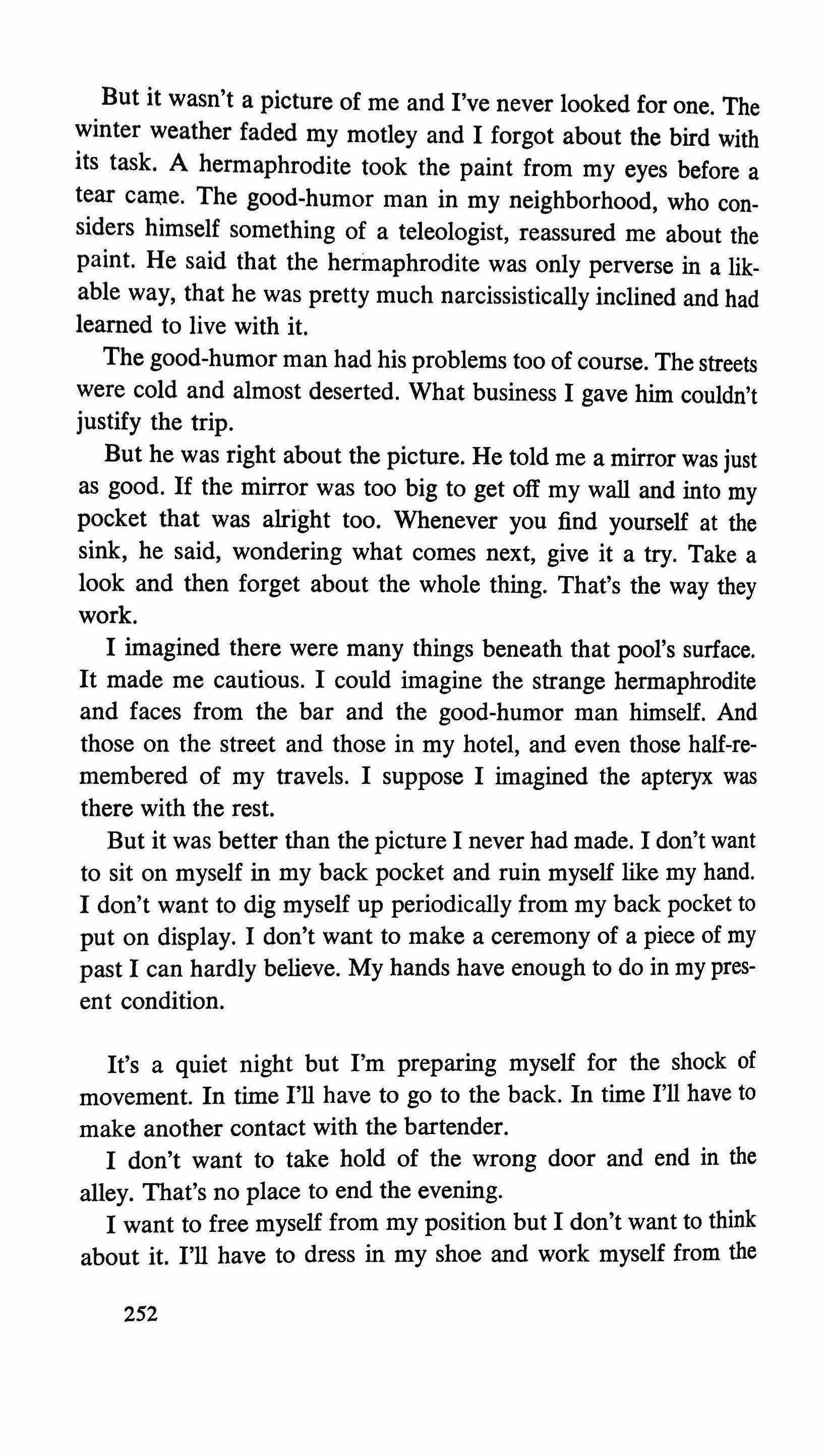
But it wasn't a picture of me and I've never looked for one. The winter weather faded my motley and I forgot about the bird with its task. A hermaphrodite took the paint from my eyes before a tear came. The good-humor man in my neighborhood, who considers himself something of a teleologist, reassured me about the paint. He said that the hermaphrodite was only perverse in a likable way, that he was pretty much narcissistically inclined and had learned to live with it.
The good-humor man had his problems too of course. The streets were cold and almost deserted. What business I gave him couldn't justify the trip.
But he was right about the picture. He told me a mirror was just as good. If the mirror was too big to get off my wall and into my pocket that was alright too. Whenever you find yourself at the sink, he said, wondering what comes next, give it a try. Take a look and then forget about the whole thing. That's the way they work.
I imagined there were many things beneath that pool's surface. It made me cautious. I could imagine the strange hermaphrodite and faces from the bar and the good-humor man himself. And those on the street and those in my hotel, and even those half-remembered of my travels. I suppose I imagined the apteryx was there with the rest.
But it was better than the picture I never had made. I don't want to sit on myself in my back pocket and ruin myself like my hand. I don't want to dig myself up periodically from my back pocket to put on display. I don't want to make a ceremony of a piece of my past I can hardly believe. My hands have enough to do in my present condition.
It's a quiet night but I'm preparing myself for the shock of movement. In time I'll have to go to the back. In time I'll have to make another contact with the bartender.
I don't want to take hold of the wrong door and end in the alley. That's no place to end the evening.
I want to free myself from my position but I don't want to think about it. I'll have to dress in my shoe and work myself from the
252

bar. I should prepare myself for whatever might be in back. I should be careful stepping down. I don't want to step on the barmaid or a cat. I don't want either one to think it's being attacked.
I'm too shy for that; I've embraced my follies.
I think I can even ignore what I find in back. I can ignore the old women with their dogs and the old men with the bar boy. I can ignore the children left in the toilet and the flagellants with their leather raised; I have already seen threads of blood and faces like that.
Though passing them is not ignoring them, because we're all so close. A bar is a small place, more intimate than I thought. Everyone here has walked into the night and has to walk out again, and that brings us together.
None of them know when morning is expected or what time it is now. If I ask I get a funny smile and know I've said something stupid again. It's an understanding smile and I don't enjoy it. An insult would be easier to enjoy. I would imagine someone behind me was getting the insult and I would walk away shaking my head. I might remember later that I had started the affair, and I might not. I would walk away thinking: whoever was behind me is getting a real insult; he must have said something very stupid himself. Sometimes I'm completely nonplussed. I apologize for my blunder. I want to explain the mess we are in but I can't. I push at the bar, I begin to turn back and forth on my stool. I suddenly have a desire to push off from the bar and spin around in a circle.
I try not to do that. I've perhaps done it in the past but I try not to do it anymore. If I have it was probably in my naive period when I had no regrets. Mistakes were a way of approaching the world then. But these days are darker. Now I reflect and imagine consequences, without falling asleep. I control myself.
Or my situation does. My trapped hand and naked foot are helping with the control at present. My naked foot is jammed against the bar, reminding me of the agonal state of my soul.
But if I lost control I would probably take off to the left. I don't know why; if I did it often I would experiment with another direction. My legs would stick out in front of me like the hairs on that apteryx's face. My feet would jerk and wave. But it wouldn't last.
253
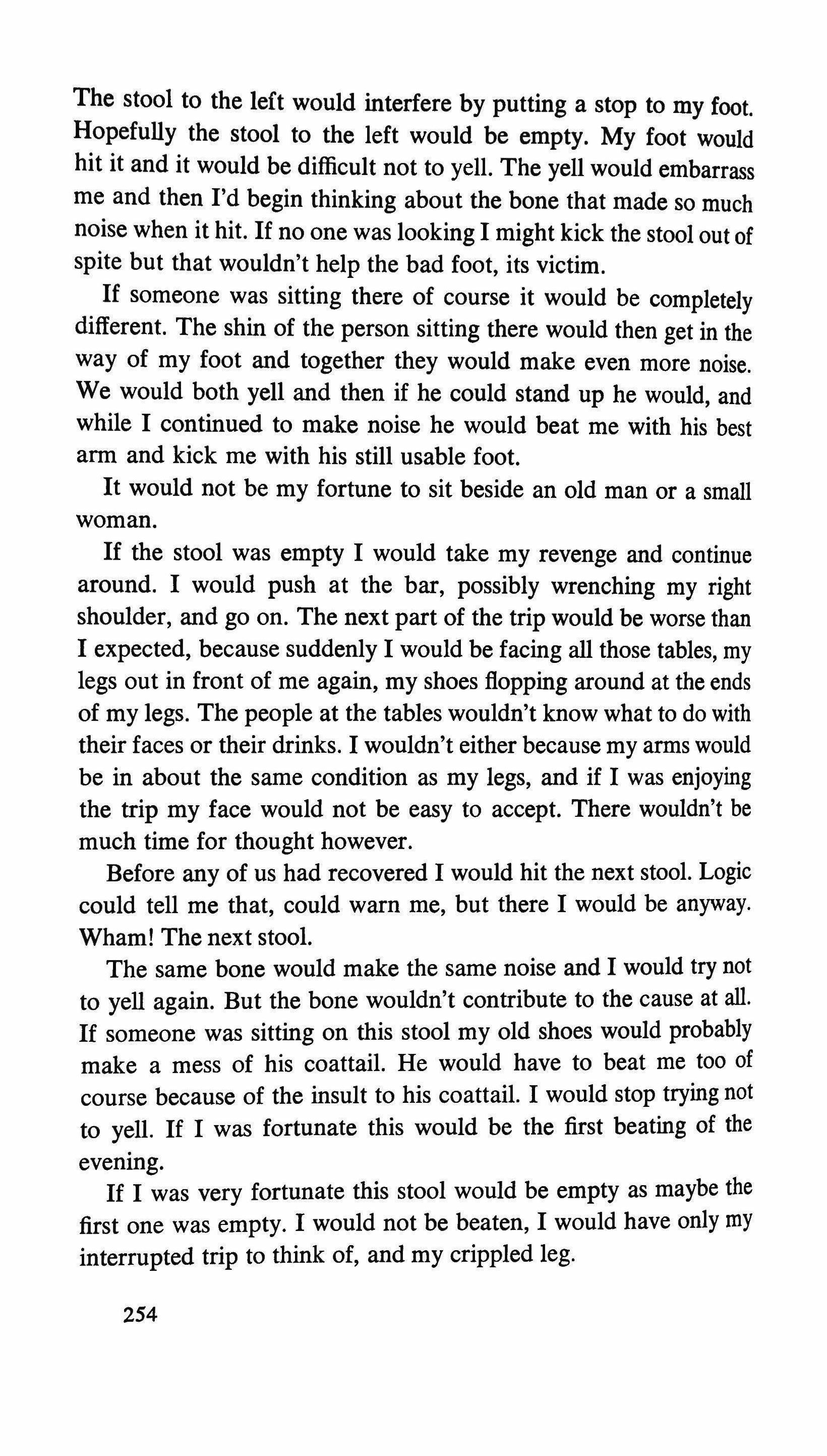
The stool to the left would interfere by putting a stop to my foot. Hopefully the stool to the left would be empty. My foot would hit it and it would be difficult not to yell. The yell would embarrass me and then I'd begin thinking about the bone that made so much noise when it hit. If no one was looking I might kick the stool out of spite but that wouldn't help the bad foot, its victim.
If someone was sitting there of course it would be completely different. The shin of the person sitting there would then get in the way of my foot and together they would make even more noise. We would both yell and then if he could stand up he would, and while I continued to make noise he would beat me with his best arm and kick me with his still usable foot.
It would not be my fortune to sit beside an old man or a small woman.
If the stool was empty I would take my revenge and continue around. I would push at the bar, possibly wrenching my right shoulder, and go on. The next part of the trip would be worse than I expected, because suddenly I would be facing all those tables, my legs out in front of me again, my shoes flopping around at the ends of my legs. The people at the tables wouldn't know what to do with their faces or their drinks. I wouldn't either because my arms would be in about the same condition as my legs, and if I was enjoying the trip my face would not be easy to accept. There wouldn't be much time for thought however.
Before any of us had recovered I would hit the next stool. Logic could tell me that, could warn me, but there I would be anyway. Wham! The next stool.
The same bone would make the same noise and I would try not to yell again. But the bone wouldn't contribute to the cause at all. If someone was sitting on this stool myoId shoes would probably make a mess of his coattail. He would have to beat me too of course because of the insult to his coattail. I would stop trying not to yell. If I was fortunate this would be the first beating of the evening.
If I was very fortunate this stool would be empty as maybe the first one was empty. I would not be beaten, I would have only my interrupted trip to think of, and my crippled leg.
254
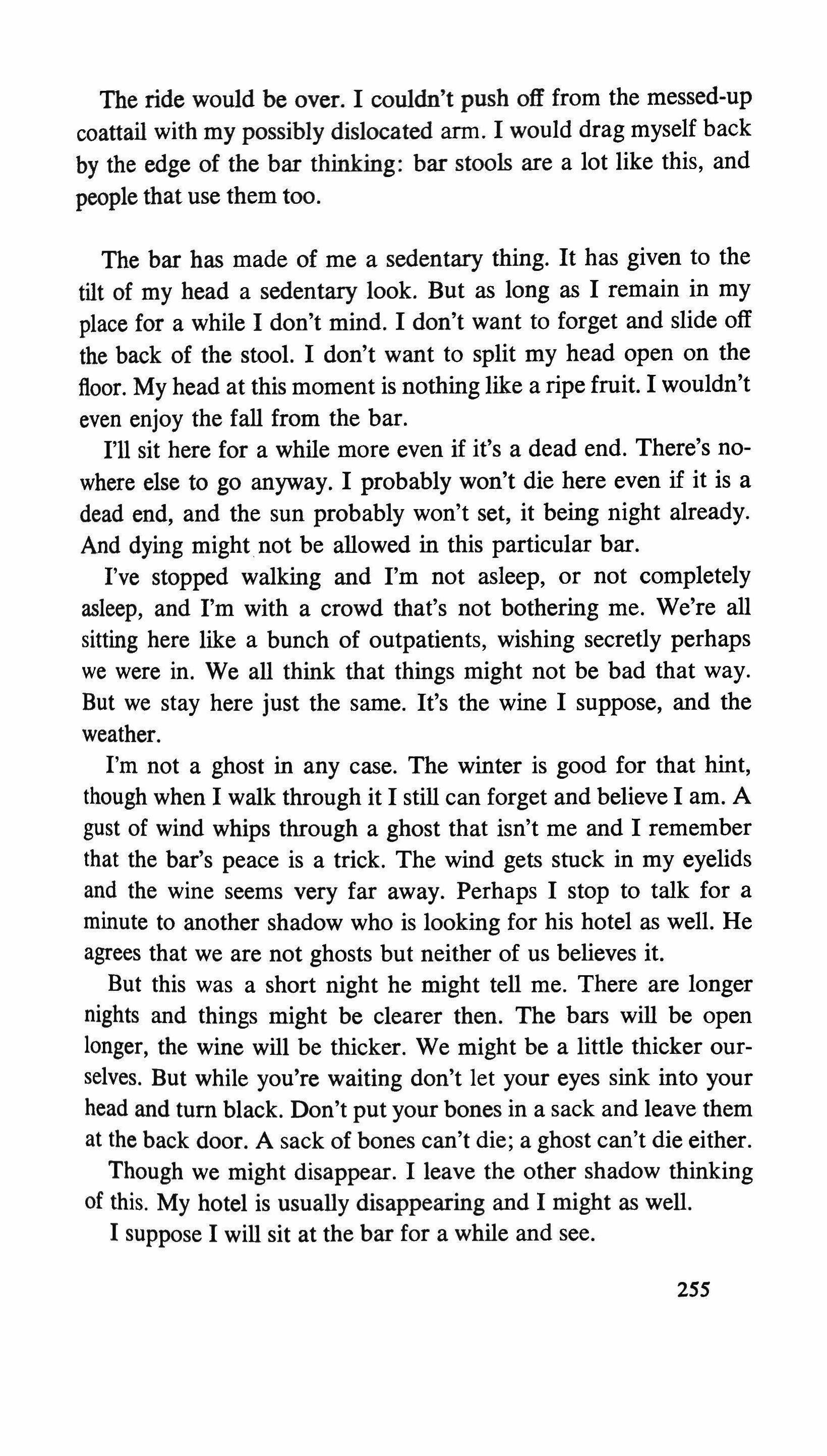
The ride would be over. I couldn't push off from the messed-up coattail with my possibly dislocated arm. I would drag myself back by the edge of the bar thinking: bar stools are a lot like this, and people that use them too.
The bar has made of me a sedentary thing. It has given to the tilt of my head a sedentary look. But as long as I remain in my place for a while I don't mind. I don't want to forget and slide off the back of the stool. I don't want to split my head open on the floor. My head at this moment is nothing like a ripe fruit. I wouldn't even enjoy the fall from the bar.
I'll sit here for a while more even if it's a dead end. There's nowhere else to go anyway. I probably won't die here even if it is a dead end, and the sun probably won't set, it being night already. And dying might not be allowed in this particular bar.
I've stopped walking and I'm not asleep, or not completely asleep, and I'm with a crowd that's not bothering me. We're all sitting here like a bunch of outpatients, wishing secretly perhaps we were in. We all think that things might not be bad that way. But we stay here just the same. It's the wine I suppose, and the weather.
I'm not a ghost in any case. The winter is good for that hint, though when I walk through it I still can forget and believe I am. A gust of wind whips through a ghost that isn't me and I remember that the bar's peace is a trick. The wind gets stuck in my eyelids and the wine seems very far away. Perhaps I stop to talk for a minute to another shadow who is looking for his hotel as well. He agrees that we are not ghosts but neither of us believes it.
But this was a short night he might tell me. There are longer nights and things might be clearer then. The bars will be open longer, the wine will be thicker. We might be a little thicker ourselves. But while you're waiting don't let your eyes sink into your head and turn black. Don't put your bones in a sack and leave them at the back door. A sack of bones can't die; a ghost can't die either. Though we might disappear. I leave the other shadow thinking of this. My hotel is usually disappearing and I might as well.
I suppose I will sit at the bar for a while and see.
255
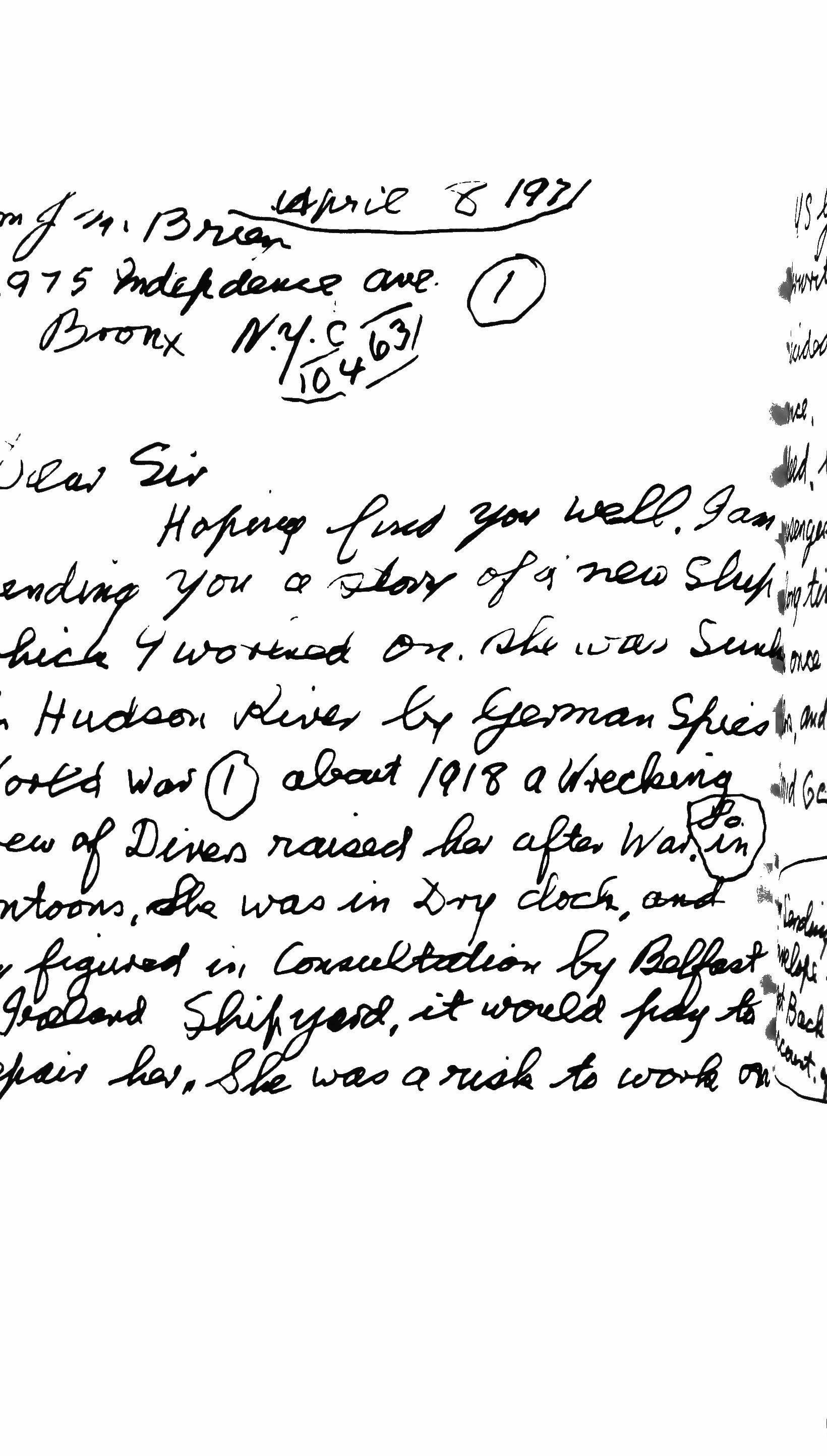
¥d, �cUw SW ,�A j(� ��»- �j1a.,,�r y� o � 7q'� �011 ,� � 1Wo�c.ei �. � L'_;-�� �� � fI� � -4 � �',ari � I,J� (!) � Nt"! (J tt:J�G� -ewi:n� �� �M .M'lr � I � WtVJ -Ut �.c!b&., lil� � k,_g /.>a.<1 q �� � 011'�
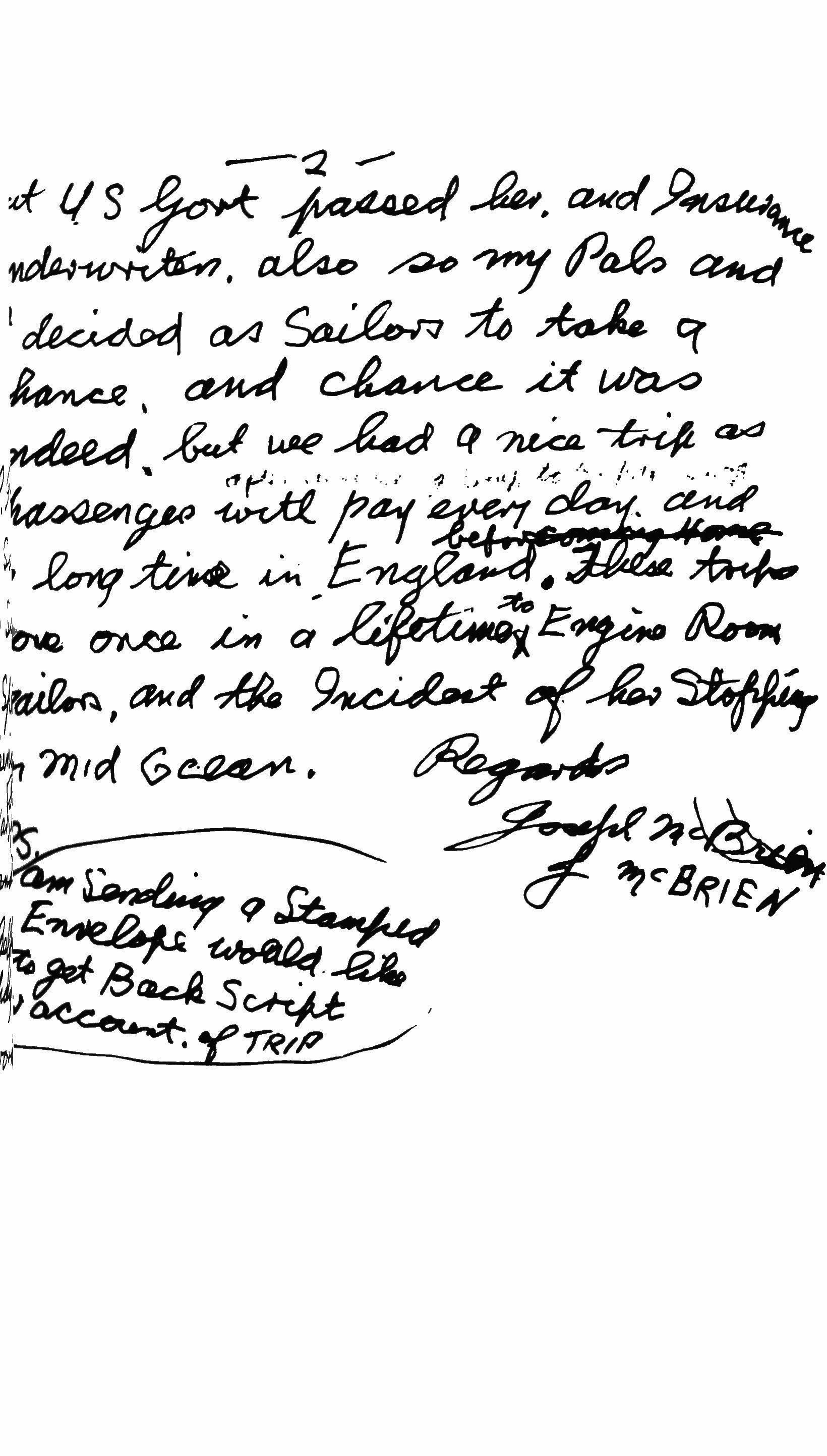
Fruit Line Ste8Jl.er, S.S. Sixaola, a victim of sabota_e in First out of New York Harbor by a wreckinG con.pany �'��eiihAS(dP. the rtobins ury !JOC k Hro oklyn repe.i r_ the n.achinery temporari
her over to .Belfast, Ireland to .u.arlalld C§C �\olffe8 Yard, who buil1l make sure she sta,ys on top �� loaded the cargo. St. Johns, j,h'Sninswick. 8ill Gleason, Paddy."all, �im Aet\�ing
her am Gleason as aed IW, if I am insured, \0 take a joo or. td.s I .., �ve two or three bottles of Scotch, to warm____ll!_up. we W01llt the utmost bottall of the sea. have to be unafraid, as the Keating. I' Well, Old Ji;;Jer, the dec l�ova so. we 111 see no'MDre f.er awhl.le
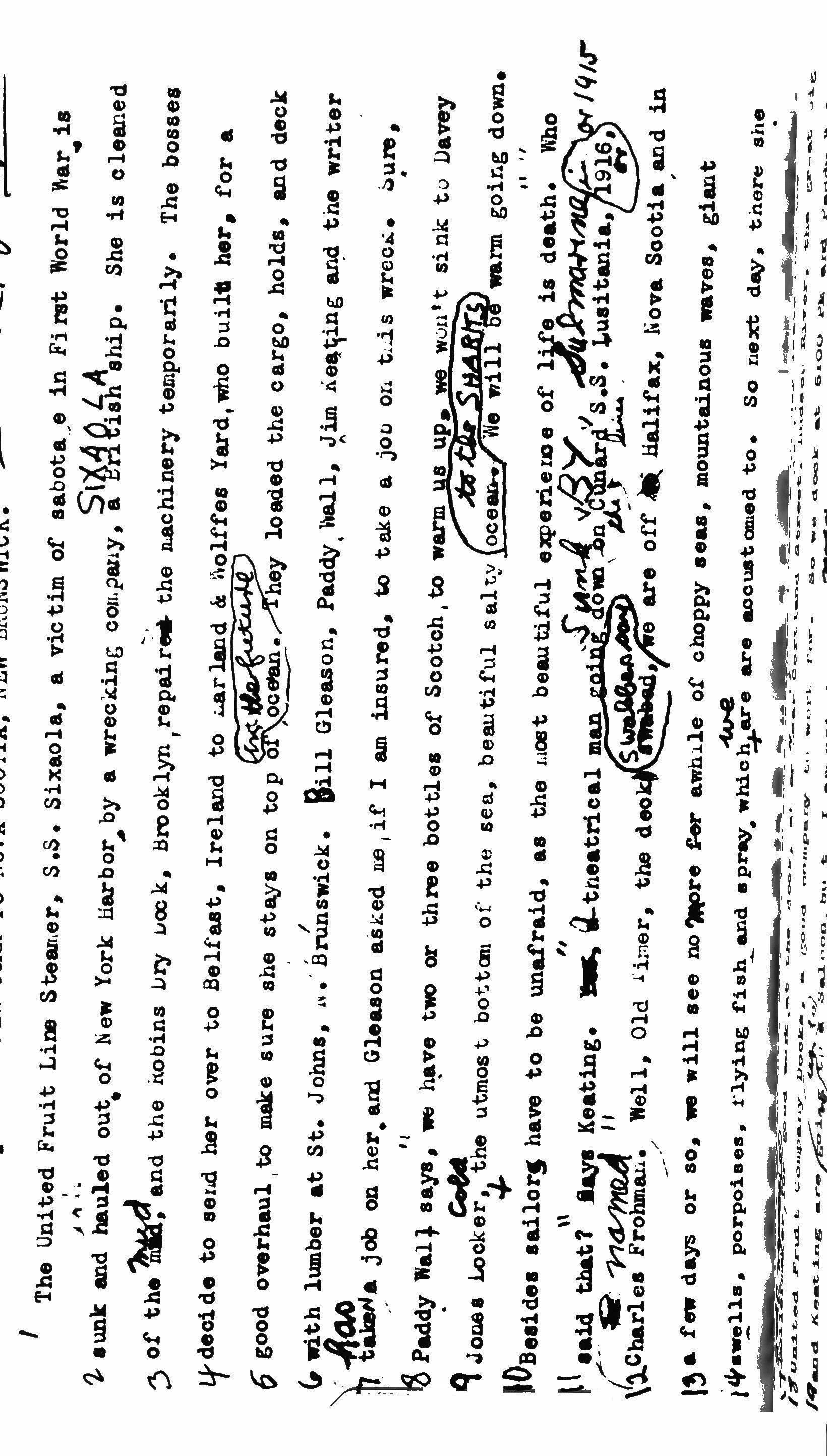
,&:'I ...,vv � .l.n, 1".LIn l.Jl\,Unw I1.J. v l\.
-
of choppy seas, mountainous -w-e porpoi.ses. 1"l.ying f."ish�a:nd .pr�. whic�are are accustomed to. So next _.0 !p �---��� II•• ""!' -�-- I�- � c:a _-t:>. �"'II �- -=""'=--.�. c:::t..:::. .1.-.,.<1 -..."._ -:.._..:d._<>o�. I=t..� c....;:c=-JU"'#�--Jr�y-� _p�c:II_��_�.J I_-:;C=-'_'� �or'"' p_r.Qo'" t·. -"-� - f1'� H� c::I.�k.. t 6.<:>0 � ....,.......-:: �. "'Y _"-"/&����I' A �-.....l..�"c-.c.J. bll. -t=. T -.�_.
restaurants, eto. So I go shore (earl�s-T�ave a 1/2 day leave ---;;:;-, J Cho C.
\�ileru�good work ,at the dock, at or �t8ar Cortland Street,. liud8o� River, Company Docn, a good oolllpar� to work fOl'. So we dock at 5&00
t I am not
I decli=. and will be a wuek here, next d�. I sn all shaved up, new whi te shirt., � shoes, as I worked IteadY,on a Round iIIorld trip for 6-1/2 months, troop Ship, three montha, with total ot ::1-1/2 moc.ths' pay. So I rested job' or "yob· as the Worge sailors say. I see a !1Otice in a restaurant, lJFeR have been told not to tOlAch it. A tunny taste, they say, is �ar ,�U •. is a nice sJllall tOl'Cl,or c:..ty. Churcnes, parks, and I like liorarl.es r" " cheers for that �cotsDlan who built at least a dozen, in the Eastern Carnegie. Nothing in particular happens here. 'l'hey load the Pinewood for
bI.gl-.d. I am on a 12 to 8 Watch, "-T' \" wi til a real goo It,' Paddy;,nall. AnythJ.ng he does not ..c.O\'l abou '-S�6U.

""'-,-, ""lL-_
--..- S3'"_",....�_ ..,-- ---,--- :_�_� �V.-"'.,ClS
�
:1...1_ �"3I....�
-
-"'.Q-};'_':,i.
�A�arefy-"
- Sal02bu
drinld.ng�O
.tjrist!jChtmnel,
.,tL�J.�ng Uev' 001he8
outaide T.he amall harbor, oill Gleason asks me, JJo you �hiIlk
buoket,of a ship to Cape Clear, Ireland,and thence to Avo�,outh oQlntry)1
Suoh a nice n8llle, the River Avon. All these Pinewood
ua up. Le�'a hope so. Cheerio, Good lUghty-Night and -soft the oradle of the deep • wltil 12 A.J.:. when I report in Stokehold Suddenly oO.latemati (Ill We l'a va atopped, driftint;; sidtlways, Duffeted.
Room tires are banke, arid dar.pers shut. I go into lmgine F�oom/8J:.d -.... - �et
S.S. Sixaola to move, �ou Sinner, let Gabriel blow your80 think of that ao�. "Loudly the bell in the Old �'ower it bringe, Sailor beware, Sailor take care, danger is near
nis big
Operator
Arter about 20 hour. of drifting with hard 'Work.orders are given .team pre••ure. Atter 1Ihlle all ia Nady. w .peed..and we tell Norge .t r oiroling _"" is started p1.ng the ocean, that we are O.K. &
o_n1:.ry_ Ru.1. Be�t"".II!';l,.-

lam
leaving.and
"'IU
plac.jcs
en. -..bat"
�r -..,---�-�:A._;:_��:_ ":'-':"-[�-�S:Z::JL ;:::::::Z?:i;-:::�=:=-E;;: 4"_ �h�--=- ;:.::. �:':_::::':L-�::��:--:- �..-.:a .R..S.""'_'''',.. tn- B.-.:S.._"t:;.c::.>� c.;�JD,._�_ Th_ d-.y_ w:-
The 'Wirele..
tap..-,£.
£ �
•••
Paddy Via11 .III:
o-wt
our
OSA)(Blighty. the publio for bristol
the SeftrD Riwr or the Bri.tol Channel. The d8¥s pass uneventfully. beharing .,nderfully. Jim Keating s&1.1 that the Engineers and ",ery happy, as we enter the Irish Seaj which about 2.00 or 3100 P.�.
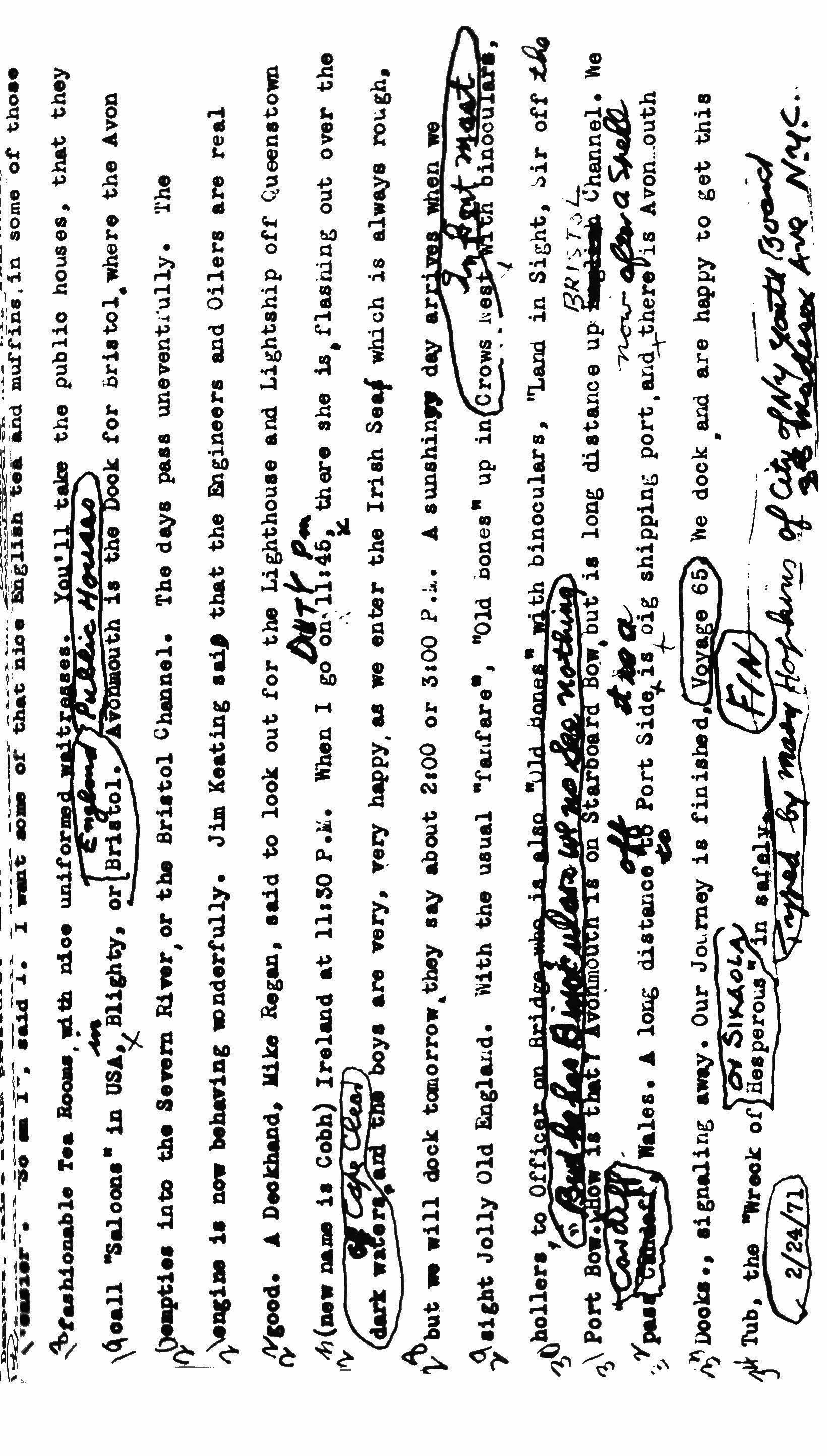
���-=-�--_�---=..-=-:_�:_ _-:....:._:_---' :Jo... �....,. �_-=-- .-,AS?="2-" SL�� "...- �=�_-----�••a1cI�. Z 10 ao_ .or th&t-i1i.ce-&1g�11Ul- te,,-and mui''f"in r.a
111U1 moe � 111
Boaa8
Engl&l.d. \Uth the usual shipping A lor.&g Y1e dock and
The public burning of Julius and Ethel Rosenberg: an historical romance
ROBERT COOVER
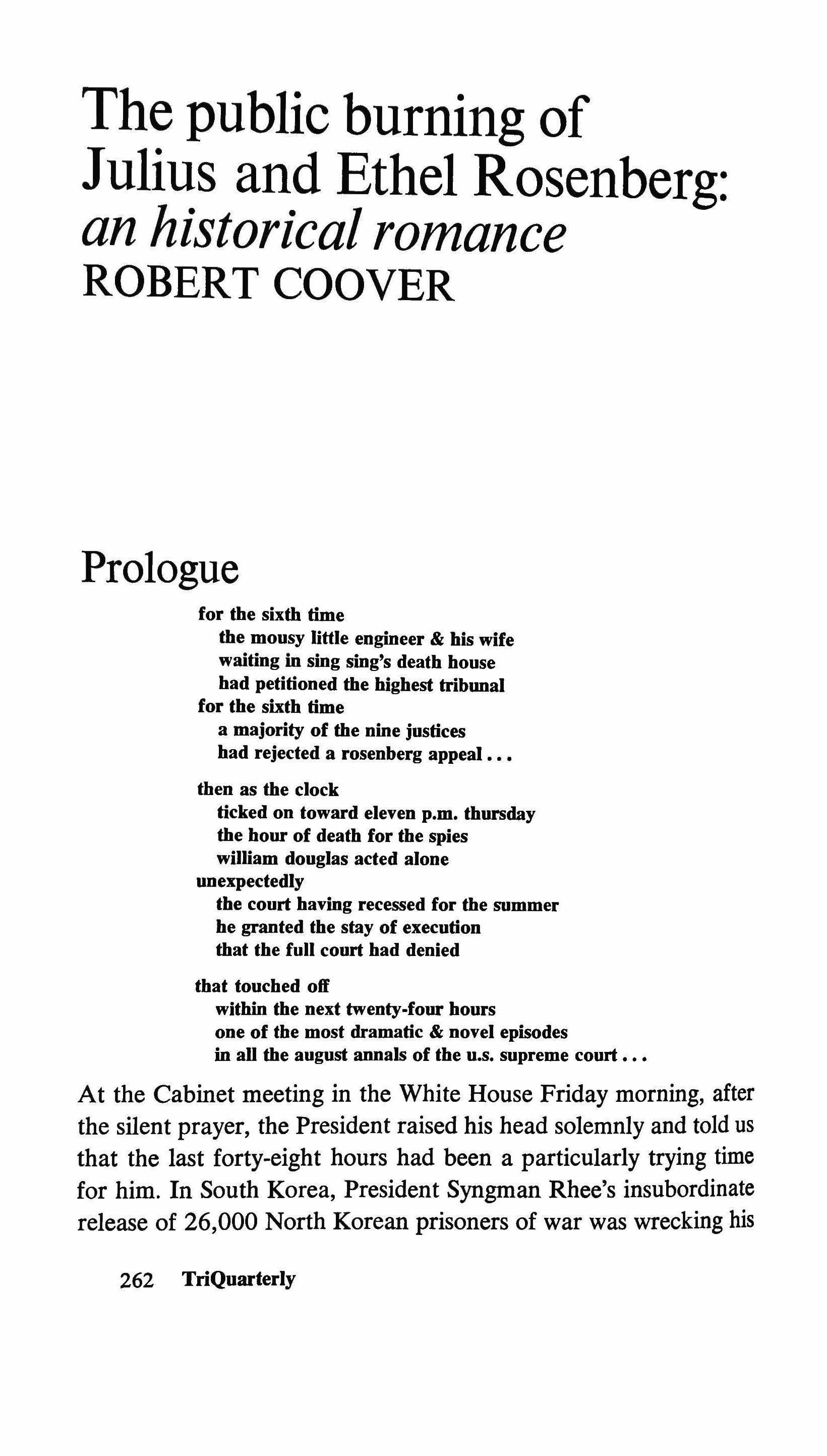
Prologue
for the sixth time the mousy little engineer & his wife waiting in sing sing's death house had petitioned the highest tribunal for the sixth time a majority of the nine justices had rejected a rosenberg appeal then as the clock ticked on toward eleven p.m. thursday the hour of death for the spies william douglas acted alone unexpectedly the court having recessed for the summer he granted the stay of execution that the full court had denied that touched off within the next twenty-four hours one of tbe most dramatic & novel episodes in aU the august annals of tbe u.s. supreme court
At the Cabinet meeting in the White House Friday morning, after the silent prayer, the President raised his head solemnly and told us that the last forty-eight hours had been a particularly trying time for him. In South Korea, President Syngman Rhee's insubordinate release of 26,000 North Korean prisoners of war was wrecking his 262 TriQuarterly

truce negotiations, he said, and had cast serious doubt on the entire Free World chain-of-command. Then, Supreme Court Justice William Douglas' last-minute stay of execution of the Rosenbergs had made a mockery of all their elaborate preparations this week, and had brought that whole case to a new crisis-damn it, he was catching hell from everywhere about it. And finally, as if these weren't troubles enough, someone had advised him the night before that he should stop wearing double-breasted suits-he glanced gloomily at the ceiling and then at old Ezra of the Council of Twelve Apostles and said that he never remembered a time in his life when he felt more in need of help from Someone much more powerful than he.
Those of us who knew who he really was smiled inwardly, yet at the same time felt the chill of our adversary's presence, his power and his wile: to derange a trusted ally, penetrate the highest court in the land, and mock the disguise of Uncle Sam, our Superchief-where would he strike next? I trembled faintly, thumbed my notepad edgily. I'd thought myself immune, I who had singlehandedly vanquished Alger Hiss and put Voorhis and the Pink Lady to rout, but that morning I was no longer certain. My mind, I knew, was secure; but I feared for my heart. There was a lot of talk then about what to do about Rhee and the South Koreans, and a lot of it was pretty crude. Just about everybody had something to say about it. I hadn't slept well, was able to tune into the Cabinet meeting with only half my mind, but as usual that was enough, they were never much more than diffuse and errant bull sessions. The prisoner release in Korea was a scandal of course, some of our own boys over there must surely have been in on it, certainly nobody did much to stop it. I could just hear Jim Kern of Missouri hollering: "The war in Korea is a stalemate, a treadmill, a yo-yo war! Our allies take the cash, our boys take the bullets!" And today Bob Hendrickson was raising hell in the Senate, it'd be a while before we saw the backside of this one. But the question now was whether you clamped down on Rhee, virtually declared war on him and the whole damned country, or whether you grinned, took credit for what he did, and made the 263
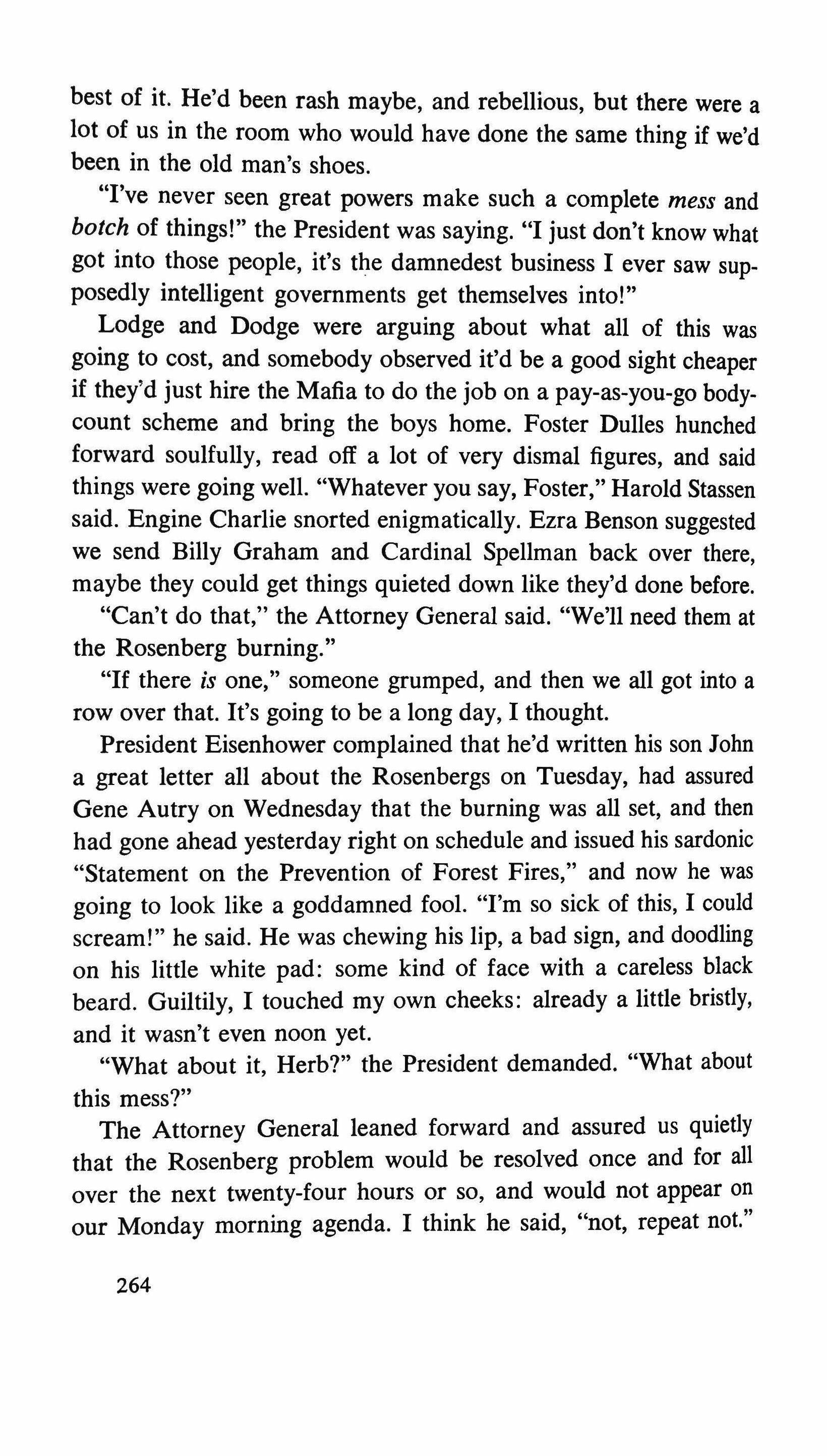
best of it. He'd been rash maybe, and rebellious, but there were a lot of us in the room who would have done the same thing if we'd been in the old man's shoes.
"I' k h 1 ve never seen great powers rna e suc a comp ete mess and botch of things!" the President was saying. "I just don't know what got into those people, it's the damnedest business I ever saw supposedly intelligent governments get themselves into!"
Lodge and Dodge were arguing about what all of this was going to cost, and somebody observed it'd be a good sight cheaper if they'd just hire the Mafia to do the job on a pay-as-you-go bodycount scheme and bring the boys home. Foster Dulles hunched forward soulfully, read off a lot of very dismal figures, and said things were going well. "Whatever you say, Foster," Harold Stassen said. Engine Charlie snorted enigmatically. Ezra Benson suggested we send Billy Graham and Cardinal Spellman back over there, maybe they could get things quieted down like they'd done before.
"Can't do that," the Attorney General said. "We'll need them at the Rosenberg burning."
"If there is one," someone grumped, and then we all got into a row over that. It's going to be a long day, I thought.
President Eisenhower complained that he'd written his son John a great letter all about the Rosenbergs on Tuesday, had assured Gene Autry on Wednesday that the burning was all set, and then had gone ahead yesterday right on schedule and issued his sardonic "Statement on the Prevention of Forest Fires," and now he was going to look like a goddamned fool. "I'm so sick of this, I could scream!" he said. He was chewing his lip, a bad sign, and doodling on his little white pad: some kind of face with a careless black beard. Guiltily, I touched my own cheeks: already a little bristly, and it wasn't even noon yet.
"What about it, Herb?" the President demanded. "What about this mess?"
The Attorney General leaned forward and assured us quietly that the Rosenberg problem would be resolved once and for all over the next twenty-four hours or so, and would not appear on our Monday morning agenda. I think he said, "not, repeat not."
264

Herb Brownell was a shrewd man, a great campaign strategist and a great organizer, head full of well-ordered facts, the typical corporation lawyer, he gave you a lot of confidence. He said he was sorry about yesterday, he realized that this was a test case for our young Administration, but he'd been told that all the Justices had left town on vacation and were off fishing somewhere-how could he have guessed that Douglas would linger to pull this little stunt when the rest were gone? But never mind, he'd managed to get the whole Court back again-"Only the third time in American history a special term of the Supreme Court has been convened like this," he smiled-and they'd be deciding the issue this morning.
"But what if they-?"
"Just a formality," Herb explained-the stay would be vacated and the Rosenbergs would burn tomorrow night.
Someone pointed out that this was the Sabbath.
"We're not going to burn them on Sunday!" the President shouted, rearing up from his doodle, his blue eyes flashing.
"No, General, the Jewish Sabbath," someone explained. "These people are Jews."
"Oh, all right, then," said the President.
All of this was a joke, we were just trying to calm down.
"In that case," said Herb, "we'll finish it tonight. We'll set it up as soon as the Court stops sitting." He made a note. I didn't know if I was pleased or not. I felt like I used to feel when an exam was rushing up on me I wasn't prepared for.
"Before sundown," someone said. "It starts at sundown, the Sabbath."
"Right, sundown. Thanks."
I: Thursday
Plans for a fourteenth wedding anniversary celebration
On June 24, 1950, less than five years after the end of World War II, the Korean War begins, Americans again go off in uni-
265
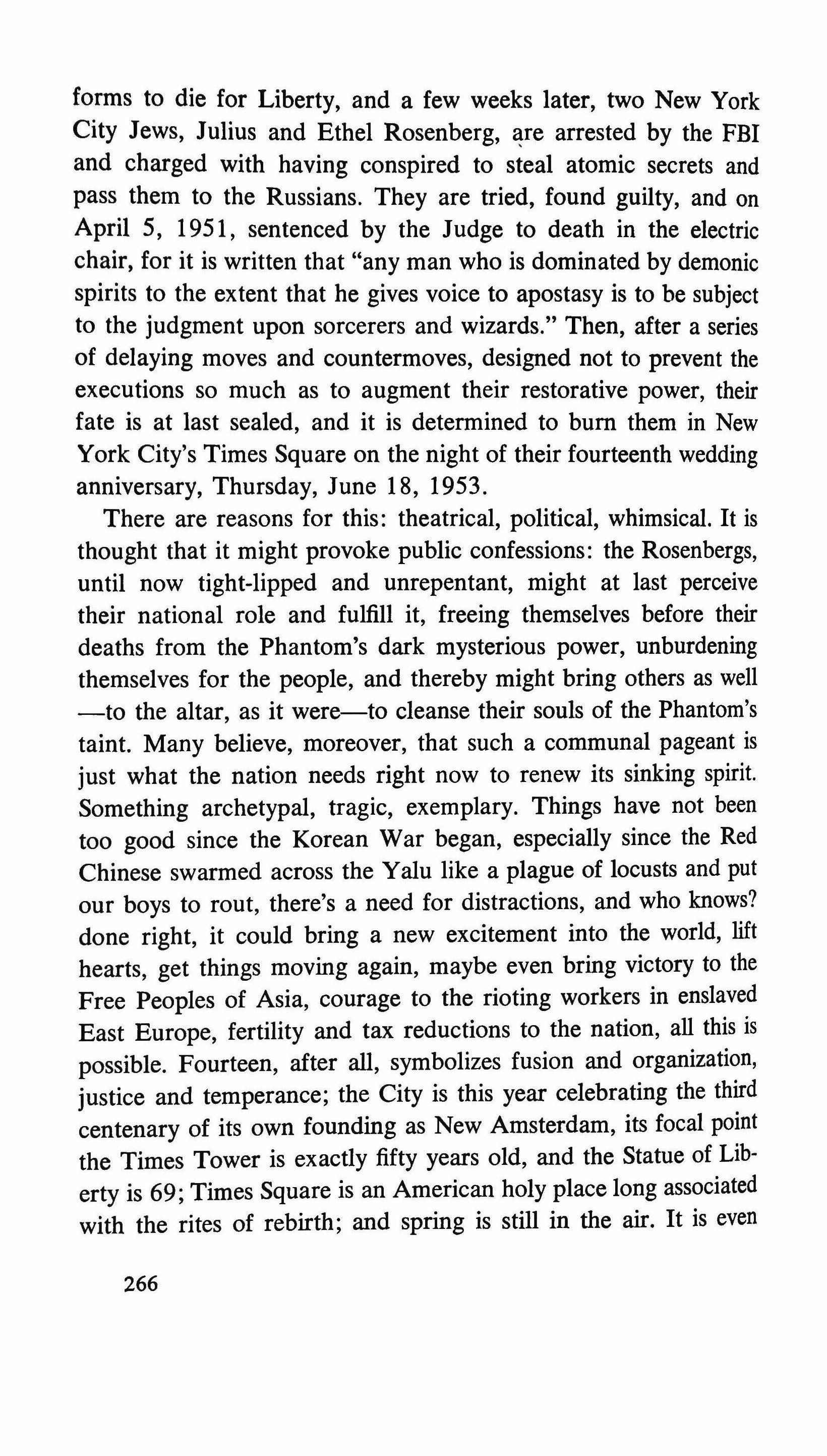
forms to die for Liberty, and a few weeks later, two New York City Jews, Julius and Ethel Rosenberg, �re arrested by the FBI and charged with having conspired to steal atomic secrets and pass them to the Russians. They are tried, found guilty, and on April 5, 1951, sentenced by the Judge to death in the electric chair, for it is written that "any man who is dominated by demonic spirits to the extent that he gives voice to apostasy is to be subject to the judgment upon sorcerers and wizards." Then, after a series of delaying moves and countermoves, designed not to prevent the executions so much as to augment their restorative power, their fate is at last sealed, and it is determined to bum them in New York City's Times Square on the night of their fourteenth wedding anniversary, Thursday, June 18, 1953.
There are reasons for this: theatrical, political, whimsical. It is thought that it might provoke public confessions: the Rosenbergs, until now tight-lipped and unrepentant, might at last perceive their national role and fulfill it, freeing themselves before their deaths from the Phantom's dark mysterious power, unburdening themselves for the people, and thereby might bring others as well -to the altar, as it were-to cleanse their souls of the Phantom's taint. Many believe, moreover, that such a communal pageant is just what the nation needs right now to renew its sinking spirit.
Something archetypal, tragic, exemplary. Things have not been too good since the Korean War began, especially since the Red Chinese swarmed across the Yalu like a plague of locusts and put our boys to rout, there's a need for distractions, and who knows? done right, it could bring a new excitement into the world, lift hearts, get things moving again, maybe even bring victory to the Free Peoples of Asia, courage to the rioting workers in enslaved East Europe, fertility and tax reductions to the nation, all this is possible. Fourteen, after all, symbolizes fusion and organization, justice and temperance; the City is this year celebrating the third centenary of its own founding as New Amsterdam, its focal point the Times Tower is exactly fifty years old, and the Statue of Liberty is 69; Times Square is an American holy place long associated with the rites of rebirth; and spring is still in the air. It is even
266

hoped that a fierce public exorcism right now might flush the Phantom from his underground cell, force him to materialize, show himself plainly in the honest neon glow of an all-American night-on-the-town, give Uncle Sam something to swing at besides a lot of remote gooks. U.S. Marshal William A. Carroll, in charge of plans for executing the death sentences and authorized to receive confession, is frankly pleased to get it all out in the open. Weeks before, the designated area is cordoned off with police barricades and a stage is erected at the intersection of Broadway and Seventh Avenue, simulating the Death House at Sing Sing, it walls whitewashed and glaringly lit, and furnished simply with the old oaken electric chair, mop and bucket, heating pipes, a SILENCE sign tacked up over the stage entrance, and a trolley for carting the corpses off. Details from the set of the Warden's office in The Valiant, a one-act melodrama by Holworthy Hall (pseud.) and Robert Middlemass, produced in the early thirties by the Clark House Players on the Lower East Side and starring an eager sixteen-year-old twit named Ethel Greenglass, are incorporated (a telephone instrument, a row of electric bell-buttons, a bundle of forty or fifty letters, etc.), partly to make Ethel feel more at home, partly to impress upon her the ironies of her situation, partly to give her a jolt of deja vu just for laughs. Sing Sing Warden Wilfred Denno is in charge of this simulation, as well as his own costume (Warden Holt in The Valiant, a gruff "despotic" man with a heart of gold and "verging toward sixty," wore a dark brown suit, open shirt and black string tie, smoked a long thin cigar), and State Executioner Joseph P. Francel, World War I veteran and Cairo, New York, electrician, is responsible-with the help of Consolidated Edison-for the installation and functioning of the electric chair. His motto: "Our lives are merely strange dark interludes in the electrical display of God the Father." Francel, who was badly gassed over there in the First World War, is celebrating his own fourteenth anniversary as Sing Sing executioner over here, and will receive $300 for this double bill. All of this is taken as a good omen.
The square, so called, and convergent streets are hung with 267

red, white, and blue bunting (from above, the decorated area looks a little like a Star of David); traffic is rerouted so as to cause maximum congestion and rage, a solid belt of fury at the periphery being an essential liturgical complement to the melting calm at the center; and billboards and theater marquees, the principal topographical feature of Times Square, are consecrated to the display of homespun American wisdom:
EVERY MAN MUST CARRY HIS OWN HIDE TO THE TANNER THREE MAY KEEP A SECRET IF TWO OF THEM ARE DEAD AMERICA THE HOPE OF THE WORLD NICE GUYS FINISH LAST
A band is hired to play "One.Fine Day" from Madame Butterfly, "The Anniversary Waltz," and the theme from High Noon, said to be a particular favorite these days of President Eisenhower, who is himself just back from a week of moralizing and whoopee in the Badlands and Oyster Bay. Gene Autry visits the President and is invited to sing "Tumblin' Tumbleweeds" and "Twilight on the Trail" at the executions; the National Poet Laureate TIME is asked to read a commemorative poem; Ethel Rosenberg's kid brother David Greenglass ("little Doovey," she called him), the confessed traitor whose evidence has almost singlehandedly convicted Ethel and her husband and sent them to the chair, is invited to retell his heartwarming story for the edification of the gathered faithful and to remind Julius for the last time that he still owes him a thousand bucks; and from East Berlin comes the Red flag, tom down by rioting workers from atop Brandenburg Gate, to be cut and sewn into a suit of longjohns for Julius to wear during his electrocution. This uprising in Berlin, just one day before the intended ceremonial extinction of the Rosenbergs, is Uncle Sam's crowning touch to over two years of untiring stagecraft, prayer, and arm-to-arm brawls with the Phantom's ubiquitous agents. As TIME say in his famous lyric, "Rebellion in the Rain": barehanded they gathered in the grey morning rain-masons in white carpenters in black day laborers and factory hands in hobnailed boots and raveled suits
268

in mumbling columns that suggested disconnected centipede legs groping for a body they streamed from all directions toward the center where the commnnist proconsuls rule
A brilliant achievement, this uprising of the old Prussians, but it has not always been easy, even for a Superhero. The tag end of the 1940's has seen the Red Tide swallow up half of Europe, sweep through Cathay, and threaten all of South Asia. The score in 1944 is 1,625,000,000 people for Uncle Sam, only 180,000,000 for the Phantom; but by the end of the decade, the Phantom has 800,000,000, Uncle Sam just 540,000,000, and the rest-about 600,000,000 "neutrals"-are adrift. "In 1944," as Congressman Richard Nixon of California says, "the odds were 9 to 1 in our favor. Today the odds are 6 to 3 against us!" The Phantom's dark gospel has spread throughout the world, he's acquired dozens of new disguises and devices, and has even stolen Uncle Sam's secret superweapon from under his very nose. Then, climactically, at precisely 2 P.M. on the 24th of June, 1950, the Korean War begins. Invading Red Koreans cross the 38th Parallel and roll south; Americans land at Inchon, cross the 38th Parallel, and roll north; the Chinese People's Volunteers cross the Manchurian border and roll south, and by the time Irving (The Boy Judge) Kaufman brings his gavel down on Julius and Ethel Rosenberg in April, 1951, the whole scene is in great disarray, Uncle Sam is reeling, American casualties are approaching the 100,000 mark, the President and his General are at loggerheads, the Russians are arrogantly lighting up the sky with atomic bomb tests and are said to be massing troops on the Manchurian border, the Legion of Superheroes are finding their most intimate precincts infested with spies and traitors, and even Hollywood is declared unsafe for honest men. World War III is nigh, the Speaker of the U.S. House of Representatives warns, and a New York Times headline announces: DANGER OF ATOM BOMB ATTACK IS GREATEST IN PERIOD UP TO THIS FALL! The Free Nations of the World, bracing for the holocaust, are fragmented and exhausted. "Oh, thou that art of purer eyes than to behold evil, and that canst not look on perverseness," they cry out despairingly to Uncle Sam, "wherefore lookest
269

thou upon them that deal treacherously, and holdest thy peace when the wicked swalloweth up the man that is more righteous than he?"
Even plump little Judge Kaufman, known as Pope Kaufman to his Catholic classmates at Fordham, and still a cherubic chubbycheeked 40, seems suddenly drawn and haggard, aged past his years, as he emerges from his synagogue and, in a hoarse faint voice charged with repugnance and something bordering on panic, says to the two atom spies-Jews like himself-standing mutely before him: "Plain, deliberate, contemplated murder is dwarfed in magnitude by comparison with the crime you have committed! By your betrayal you have altered the course of history!" This is true; the nation assents: "Wickedness must be humbled and left without remnant!" The tumult of the cries of the people resounds in the Court. "No survivor shall remain of the Sons of Darkness!" Julius sways slowly back and forth on the balls of his feet; Ethel's right hand is clasped in a white-knuckled grip on the chair before her. "I believe your conduct in putting into the hands of the Russians the "A-bomb," rasps the Boy Judge grimly, stretching forward so as to be able to see over the top of the high bench, "has already caused the Communist aggression in Korea, and who knows but that millions more of innocent people may pay the price of your treason!" Around the world, the Sons of Light shudder and cross themselves, creep abjectly into bomb shelters to pray: "0 Lord, how long shall we cry, and thou wilt not hear?"
The Phantom smirks. And then Judge Kaufman says: "I have deliberated. The sentence of the Court upon Julius and Ethel Rosenberg is that, for their crime, they are sentenced to death!" And then Uncle Sam says: "Those who have cast their lot with me will come to dominion! Those who have cast it with the Phantom shall be doomed to eternal extinction!" And then the people say: "Bless Uncle Sam and all His unerring works!" And then Julius turns to Ethel and sings "The Battle Hymn of the Republic."
With that, President Truman sacks General MacArthur in Korea and sues for peace, forgives Japan and West Germany and pulls them hastily into the Western orbit, instructs the Atomic Energy
270
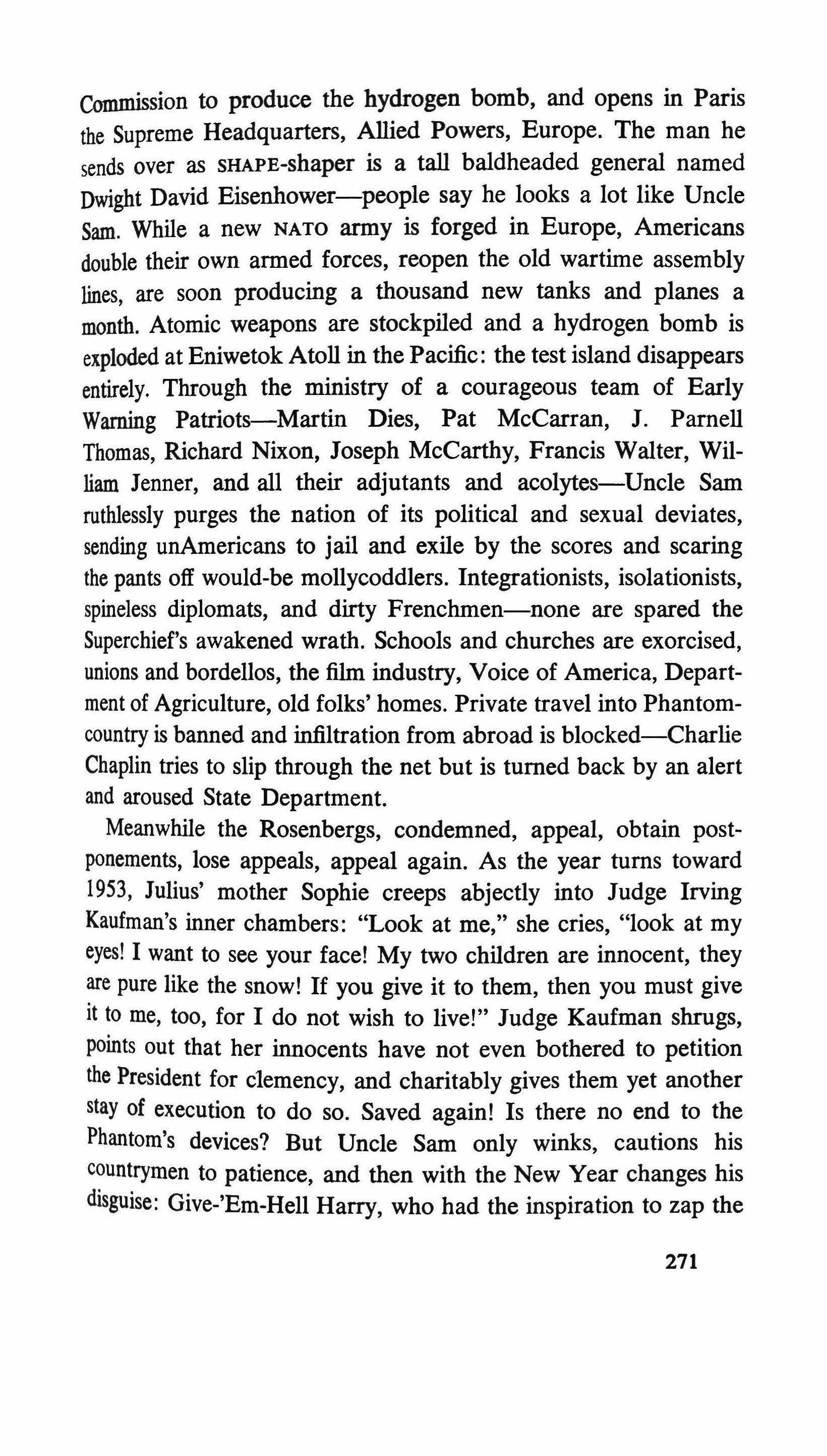
Commission to produce the hydrogen bomb, and opens in Paris the Supreme Headquarters, Allied Powers, Europe. The man he sends over as sHAPE-shaper is a tall baldheaded general named Dwight David Eisenhower-people say he looks a lot like Uncle Sam. While a new NATO army is forged in Europe, Americans double their own armed forces, reopen the old wartime assembly lines, are soon producing a thousand new tanks and planes a month. Atomic weapons are stockpiled and a hydrogen bomb is exploded at Eniwetok Atoll in the Pacific: the test island disappears entirely. Through the ministry of a courageous team of Early Warning Patriots-Martin Dies, Pat McCarran, J. Parnell Thomas, Richard Nixon, Joseph McCarthy, Francis Walter, William Jenner, and all their adjutants and acolytes-Uncle Sam ruthlessly purges the nation of its political and sexual deviates, sending unAmericans to jail and exile by the scores and scaring the pants off would-be mollycoddlers. Integrationists, isolationists, spineless diplomats, and dirty Frenchmen-none are spared the Superchief's awakened wrath. Schools and churches are exorcised, unions and bordellos, the film industry, Voice of America, Department of Agriculture, old folks' homes. Private travel into Phantomcountry is banned and infiltration from abroad is blocked-Charlie Chaplin tries to slip through the net but is turned back by an alert and aroused State Department.
Meanwhile the Rosenbergs, condemned, appeal, obtain postponements, lose appeals, appeal again. As the year turns toward 1953, Julius' mother Sophie creeps abjectly into Judge Irving Kaufman's inner chambers: "Look at me," she cries, "look at my eyes! I want to see your face! My two children are innocent, they are pure like the snow! If you give it to them, then you must give it to me, too, for I do not wish to live!" Judge Kaufman shrugs, points out that her innocents have not even bothered to petition the President for clemency, and charitably gives them yet another stay of execution to do so. Saved again! Is there no end to the Phantom's devices? But Uncle Sam only winks, cautions his countrymen to patience, and then with the New Year changes his disguise: Give-'Em-Hell Harry, who had the inspiration to zap the 271
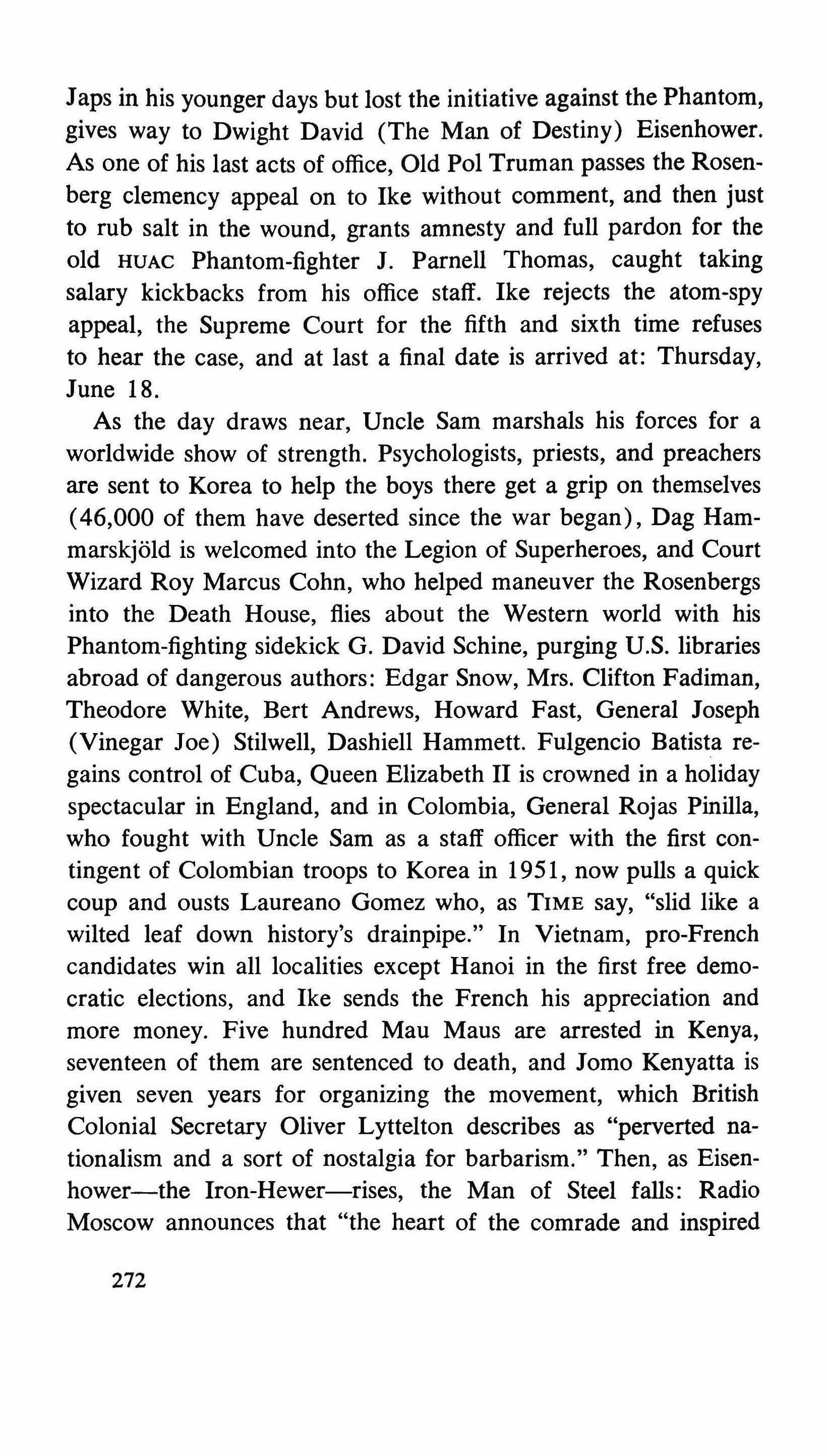
Japs in his younger days but lost the initiative against the Phantom, gives way to Dwight David (The Man of Destiny) Eisenhower. As one of his last acts of office, Old Pol Truman passes the Rosenberg clemency appeal on to Ike without comment, and then just to rub salt in the wound, grants amnesty and full pardon for the old HUAC Phantom-fighter J. Parnell Thomas, caught taking salary kickbacks from his office staff. Ike rejects the atom-spy appeal, the Supreme Court for the fifth and sixth time refuses to hear the case, and at last a final date is arrived at: Thursday, June 18.
As the day draws near, Uncle Sam marshals his forces for a worldwide show of strength. Psychologists, priests, and preachers are sent to Korea to help the boys there get a grip on themselves (46,000 of them have deserted since the war began), Dag Hammarskjold is welcomed into the Legion of Superheroes, and Court Wizard Roy Marcus Cohn, who helped maneuver the Rosenbergs into the Death House, flies about the Western world with his Phantom-fighting sidekick G. David Schine, purging U.S. libraries abroad of dangerous authors: Edgar Snow, Mrs. Clifton Fadiman, Theodore White, Bert Andrews, Howard Fast, General Joseph (Vinegar Joe) Stilwell, Dashiell Hammett. Fulgencio Batista regains control of Cuba, Queen Elizabeth II is crowned in a holiday spectacular in England, and in Colombia, General Rojas Pinilla, who fought with Uncle Sam as a staff officer with the first contingent of Colombian troops to Korea in 1951, now pulls a quick coup and ousts Laureano Gomez who, as TIME say, "slid like a wilted leaf down history's drainpipe." In Vietnam, pro-French candidates win all localities except Hanoi in the first free democratic elections, and Ike sends the French his appreciation and more money. Five hundred Mau Maus are arrested in Kenya, seventeen of them are sentenced to death, and Jomo Kenyatta is given seven years for organizing the movement, which British Colonial Secretary Oliver Lyttelton describes as "perverted nationalism and a sort of nostalgia for barbarism." Then, as Eisenhower-the Iron-Hewer-rises, the Man of Steel falls: Radio Moscow announces that "the heart of the comrade and inspired
272
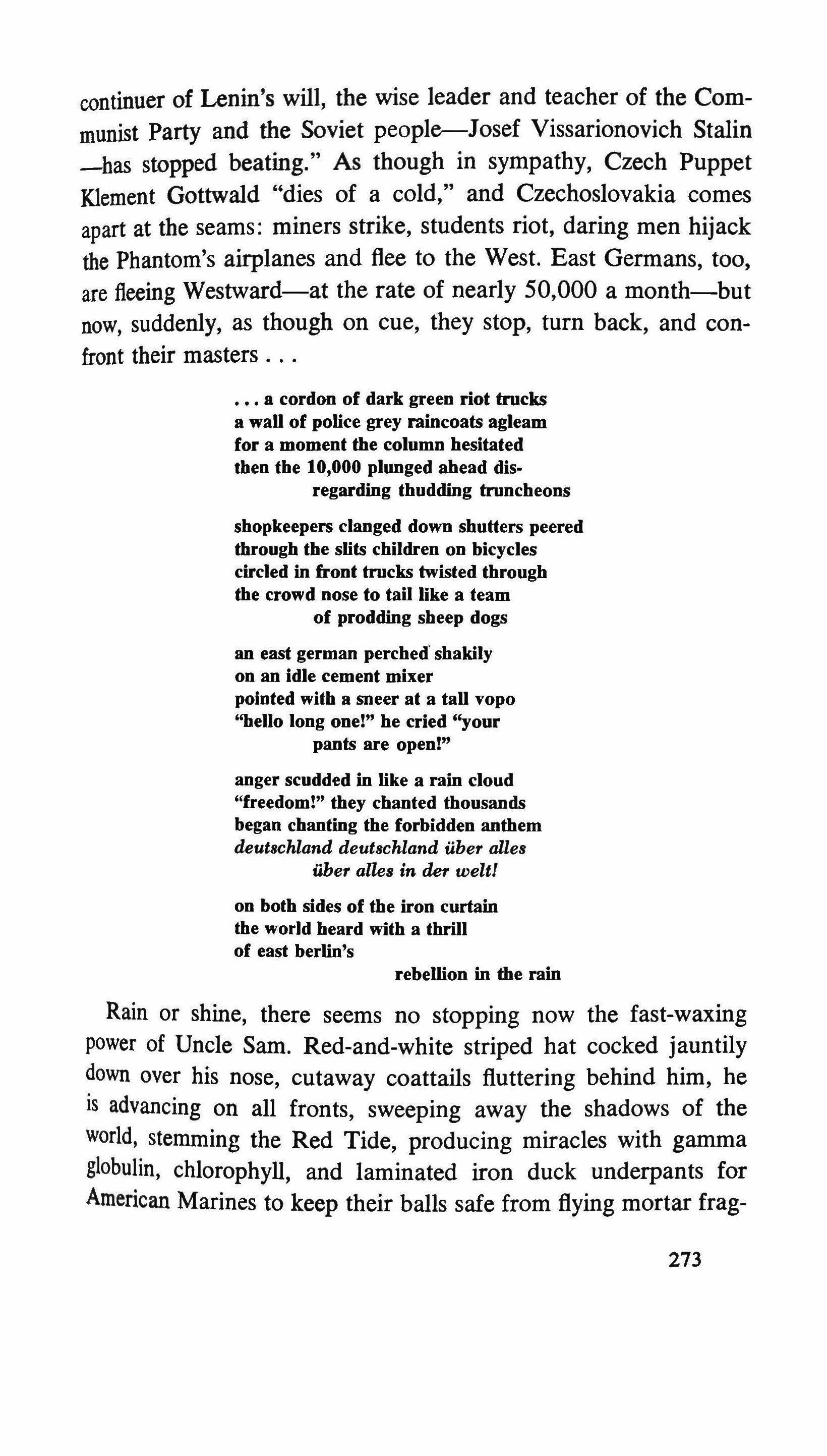
continuer of Lenin's will, the wise leader and teacher of the Communist Party and the Soviet people-Josef Vissarionovich Stalin -has stopped beating." As though in sympathy, Czech Puppet Klement Gottwald "dies of a cold," and Czechoslovakia comes apart at the seams: miners strike, students riot, daring men hijack the Phantom's airplanes and flee to the West. East Germans, too, are fleeing Westward-at the rate of nearly 50,000 a month-but now, suddenly, as though on cue, they stop, turn back, and confront their masters
a cordon of dark green riot trucks a waD of police grey raincoats agleam for a moment the column hesitated then tbe 10,000 plunged ahead disregarding tbudding truncbeons
sbopkeepers clanged down sbutters peered through the slits cbildren on bicycles circled in front trucks twisted througb the crowd nose to tail like a team of prodding sbeep dogs
an east german perched' sbakily on an idle cement mixer pointed witb a sneer at a taD vopo ''hello long one!" he cried ''your pants are open!"
anger scudded in like a rain cloud "freedom!" tbey cbanted thousands began cbanting tbe forbidden anthem deutschland deutschland aber alles aber alles in der weltr
on both sides of the iron curtain the world heard witb a thrill of east berlin's rebellion in the rain
Rain or shine, there seems no stopping now the fast-waxing power of Uncle Sam. Red-and-white striped hat cocked jauntily down over his nose, cutaway coattails fluttering behind him, he is advancing on all fronts, sweeping away the shadows of the world, stemming the Red Tide, producing miracles with gamma globulin, chlorophyll, and laminated iron duck underpants for American Marines to keep their balls safe from flying mortar frag-
273
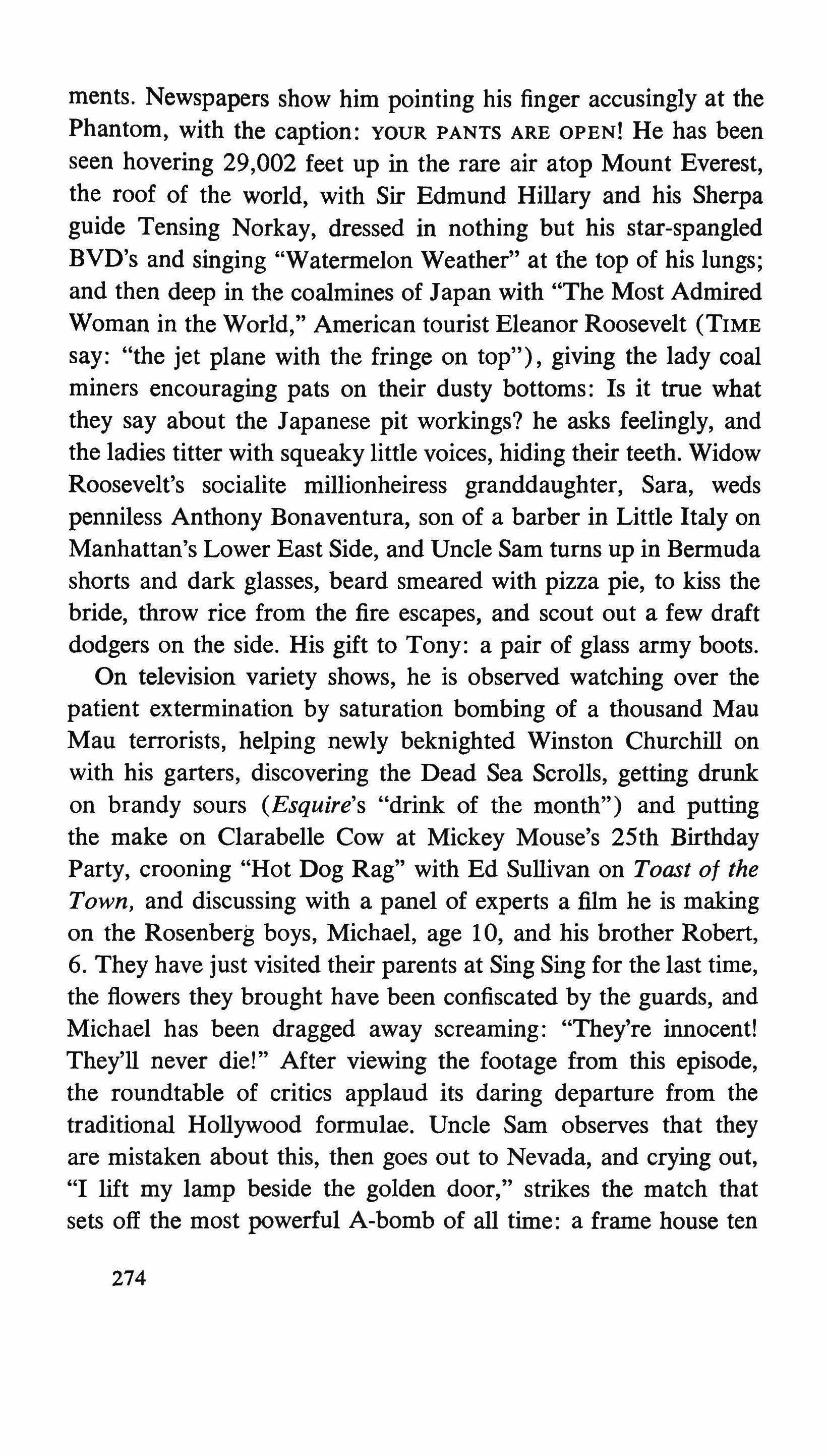
ments. Newspapers show him pointing his finger accusingly at the Phantom, with the caption: YOUR PANTS ARE OPEN! He has been seen hovering 29,002 feet up in the rare air atop Mount Everest, the roof of the world, with Sir Edmund Hillary and his Sherpa guide Tensing Norkay, dressed in nothing but his star-spangled BVD's and singing "Watermelon Weather" at the top of his lungs; and then deep in the coalmines of Japan with "The Most Admired Woman in the World," American tourist Eleanor Roosevelt (TIME say: "the jet plane with the fringe on top"), giving the lady coal miners encouraging pats on their dusty bottoms: Is it true what they say about the Japanese pit workings? he asks feelingly, and the ladies titter with squeaky little voices, hiding their teeth. Widow Roosevelt's socialite millionheiress granddaughter, Sara, weds penniless Anthony Bonaventura, son of a barber in Little Italy on Manhattan's Lower East Side, and Uncle Sam turns up in Bermuda shorts and dark glasses, beard smeared with pizza pie, to kiss the bride, throw rice from the fire escapes, and scout out a few draft dodgers on the side. His gift to Tony: a pair of glass army boots. On television variety shows, he is observed watching over the patient extermination by saturation bombing of a thousand Mau Mau terrorists, helping newly beknighted Winston Churchill on with his garters, discovering the Dead Sea Scrolls, getting drunk on brandy sours (Esquire's "drink of the month") and putting the make on Clarabelle Cow at Mickey Mouse's 25th Birthday Party, crooning "Hot Dog Rag" with Ed Sullivan on Toast of the Town, and discussing with a panel of experts a film he is making on the Rosenberg boys, Michael, age 10, and his brother Robert, 6. They have just visited their parents at Sing Sing for the last time, the flowers they brought have been confiscated by the guards, and Michael has been dragged away screaming: "They're innocent! They'll never die!" After viewing the footage from this episode, the roundtable of critics applaud its daring departure from the traditional Hollywood formulae. Uncle Sam observes that they are mistaken about this, then goes out to Nevada, and crying out, "I lift my lamp beside the golden door," strikes the match that sets off the most powerful A-bomb of all time: a frame house ten
274

miles away collapses, acres of Joshua trees and sagebrush burst into flame, the flash is observed a thousand miles away in Canada and Mexico, and residents of Los Angeles and Whittier, California, feel the shock twenty minutes after the blast. Atomic Energy Commissioner Gordon Dean, admiring the 40,000-foot-high cloud of radioactive dust, says that this year will see atomic power come of age. One thrill after another, scudding in like rainc1ouds. Writ large in the sky o'er the Land of the Free, Zach Taylor's courageous cry:
GIVE 'EM HELL, DAMN 'EM!
Word proceeds feverishly in Times Square in anticipation of the Rosenbergs' arrival on the morrow. A massive contingent of New York State Troopers is dispatched to Ossining to escort the Rosenbergs to the City and to relieve the 290 prison police now guarding the atom spies. U.S. Marshal Carroll reports that the Rosenbergs still refuse to take confession; as excitement mounts, radio stations provide hourly accounts of their obstinate silence. In East Germany, the rioting proceeds apace, spreading to Magdeburg, lena, Chemnitz, Rathenow, Leipzig, Halle-in Brandenburg, workers maul the Red D.A. to death on top of a police car and rip the ear off a "people's judge." And so it goes. In Moscow, Stalin's presumptive heirs Beria, Molotov, Malenkov, and Khrushchev are reported to be at each other's throats, while in Washington, a butcher testifying before a Senate committee reveals that "those stories about the Communist Party being the easiest place to get laid ain't true!" His forces in disarray, the Phantom in desperation gathers up a herd of Red Chinese and hurls them in a savage attack on Outpost Harry in Korea, but American G.I.'s there are ordered to "Hold Harry at all cost!" and hold it they do:
king company fifteenth (can do) regiment lay in thirty bunkers atop the ugly sausage shaped ridge the night the communists hit under the heavy barrage a battalion of chinese
275
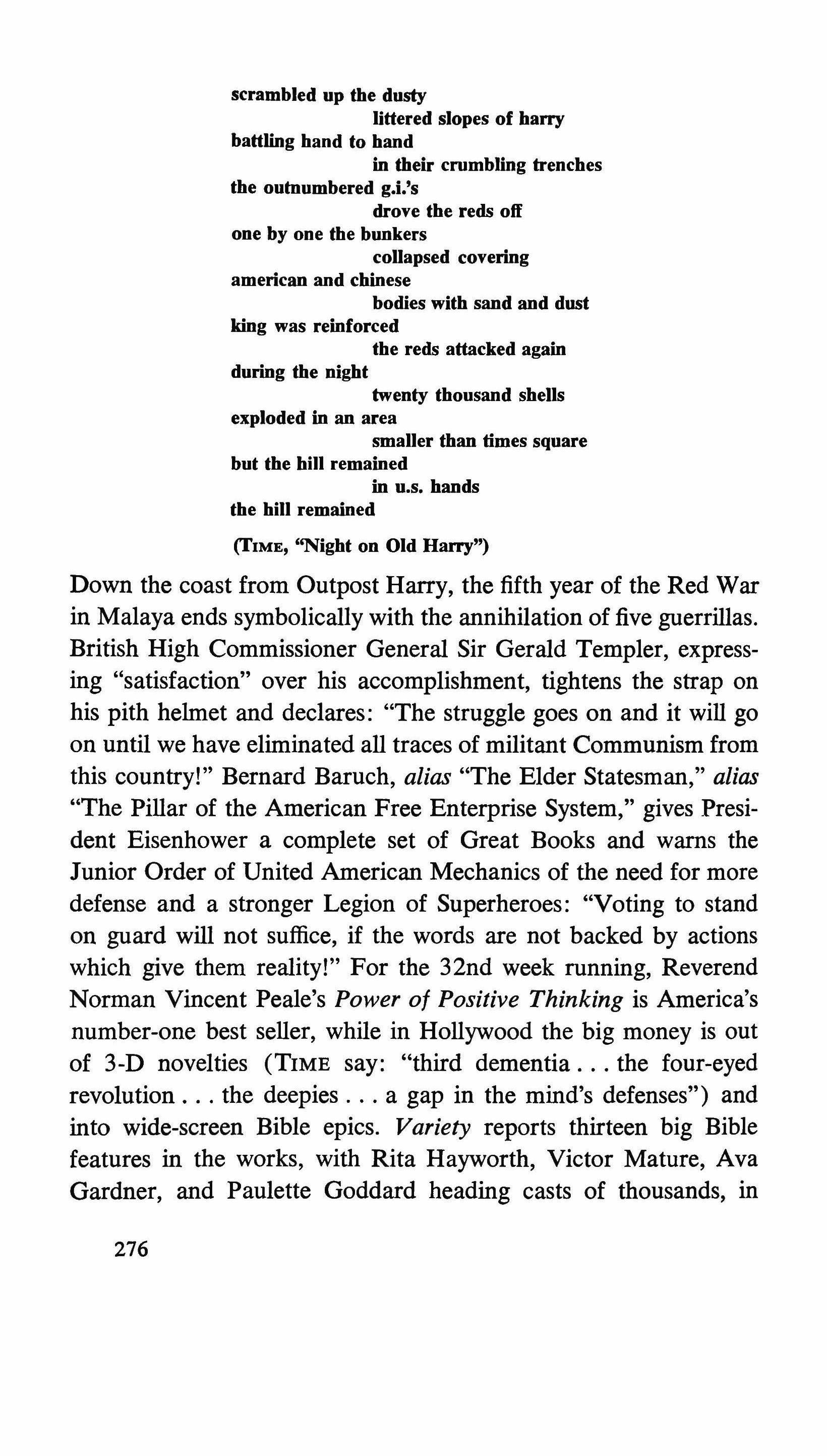
scrambled up the dusty littered slopes of harry battling hand to hand in their crumbling trenches the outnumbered g.i.'s drove the reds off one by one the bunkers coDapsed covering american and chinese bodies with sand and dust king was reinforced the reds attacked again during the night twenty thousand sheDs exploded in an area smaller than times square but the hill remained in u.s, hands the hill remained
(TIME, "Night on Old Harry")
Down the coast from Outpost Harry, the fifth year of the Red War in Malaya ends symbolically with the annihilation of five guerrillas. British High Commissioner General Sir Gerald Templer, expressing "satisfaction" over his accomplishment, tightens the strap on his pith helmet and declares: "The struggle goes on and it will go on until we have eliminated all traces of militant Communism from this country!" Bernard Baruch, alias "The Elder Statesman," alias "The Pillar of the American Free Enterprise System," gives President Eisenhower a complete set of Great Books and warns the Junior Order of United American Mechanics of the need for more defense and a stronger Legion of Superheroes: "Voting to stand on guard will not suffice, if the words are not backed by actions which give them reality!" For the 32nd week running, Reverend Norman Vincent Peale's Power of Positive Thinking is America's number-one best seller, while in Hollywood the big money is out of 3-D novelties (TIME say: "third dementia the four-eyed revolution the deepies a gap in the mind's defenses") and into wide-screen Bible epics. Variety reports thirteen big Bible features in the works, with Rita Hayworth, Victor Mature, Ava Gardner, and Paulette Goddard heading casts of thousands, in 276
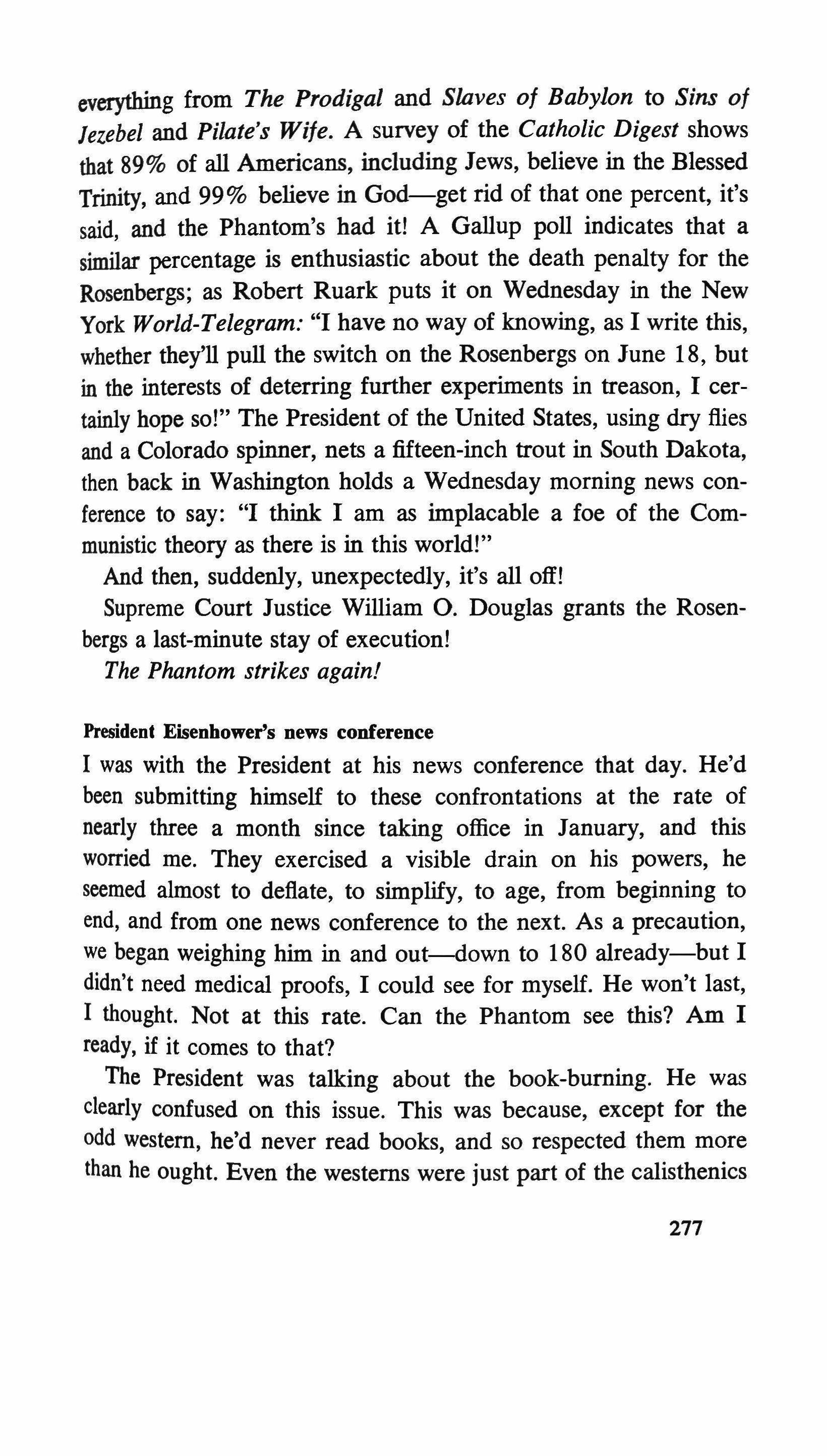
everything from The Prodigal and Slaves of Babylon to Sins of Iezebet and Pilate's Wife. A survey of the Catholic Digest shows that 89% of all Americans, including Jews, believe in the Blessed Trinity, and 99% believe in God-get rid of that one percent, it's said, and the Phantom's had it! A Gallup poll indicates that a similar percentage is enthusiastic about the death penalty for the Rosenbergs; as Robert Ruark puts it on Wednesday in the New York World-Telegram: "I have no way of knowing, as I write this, whether they'll pull the switch on the Rosenbergs on June 18, but in the interests of deterring further experiments in treason, I certainly hope so!" The President of the United States, using dry flies and a Colorado spinner, nets a fifteen-inch trout in South Dakota, then back in Washington holds a Wednesday morning news conference to say: "I think I am as implacable a foe of the Communistic theory as there is in this world!"
And then, suddenly, unexpectedly, it's all off!
Supreme Court Justice William O. Douglas grants the Rosenbergs a last-minute stay of execution!
The Phantom strikes again!
President Eisenhower's news conference
I was with the President at his news conference that day. He'd been submitting himself to these confrontations at the rate of nearly three a month since taking office in January, and this worried me. They exercised a visible drain on his powers, he seemed almost to deflate, to simplify, to age, from beginning to end, and from one news conference to the next. As a precaution, we began weighing him in and out-down to 180 already-but I didn't need medical proofs, I could see for myself. He won't last, I thought. Not at this rate. Can the Phantom see this? Am I ready, if it comes to that?
The President was talking about the book-burning. He was clearly confused on this issue. This was because, except for the odd western, he'd never read books, and so respected them more than he ought. Even the westerns were just part of the calisthenics
277
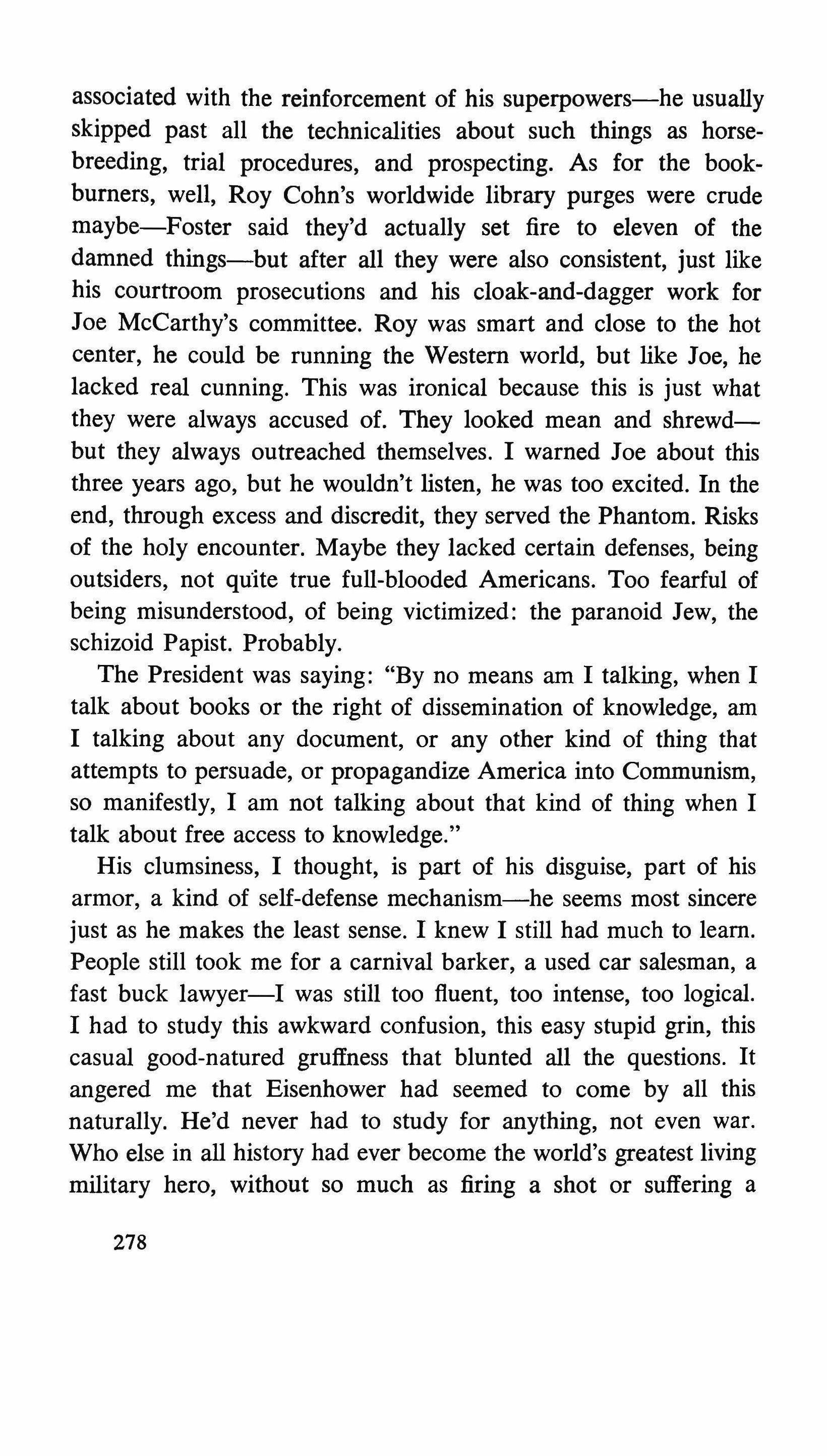
associated with the reinforcement of his superpowers-he usually skipped past all the technicalities about such things as horsebreeding, trial procedures, and prospecting. As for the bookburners, well, Roy Cohn's worldwide library purges were crude maybe-Foster said they'd actually set fire to eleven of the damned things-but after all they were also consistent, just like his courtroom prosecutions and his cloak-and-dagger work for Joe McCarthy's committee. Roy was smart and close to the hot center, he could be running the Western world, but like Joe, he lacked real cunning. This was ironical because this is just what they were always accused of. They looked mean and shrewdbut they always outreached themselves. I warned Joe about this three years ago, but he wouldn't listen, he was too excited. In the end, through excess and discredit, they served the Phantom. Risks of the holy encounter. Maybe they lacked certain defenses, being outsiders, not quite true full-blooded Americans. Too fearful of being misunderstood, of being victimized: the paranoid Jew, the schizoid Papist. Probably.
The President was saying: "By no means am I talking, when I talk about books or the right of dissemination of knowledge, am I talking about any document, or any other kind of thing that attempts to persuade, or propagandize America into Communism, so manifestly, I am not talking about that kind of thing when I talk about free access to knowledge."
His clumsiness, I thought, is part of his disguise, part of his armor, a kind of self-defense mechanism-he seems most sincere just as he makes the least sense. I knew I still had much to learn. People still took me for a carnival barker, a used car salesman, a fast buck lawyer-I was still too fluent, too intense, too logical. I had to study this awkward confusion, this easy stupid grin, this casual good-natured gruffness that blunted all the questions. It angered me that Eisenhower had seemed to come by all this naturally. He'd never had to study for anything, not even war. Who else in all history had ever become the world's greatest living military hero, without so much as firing a shot or suffering a
278
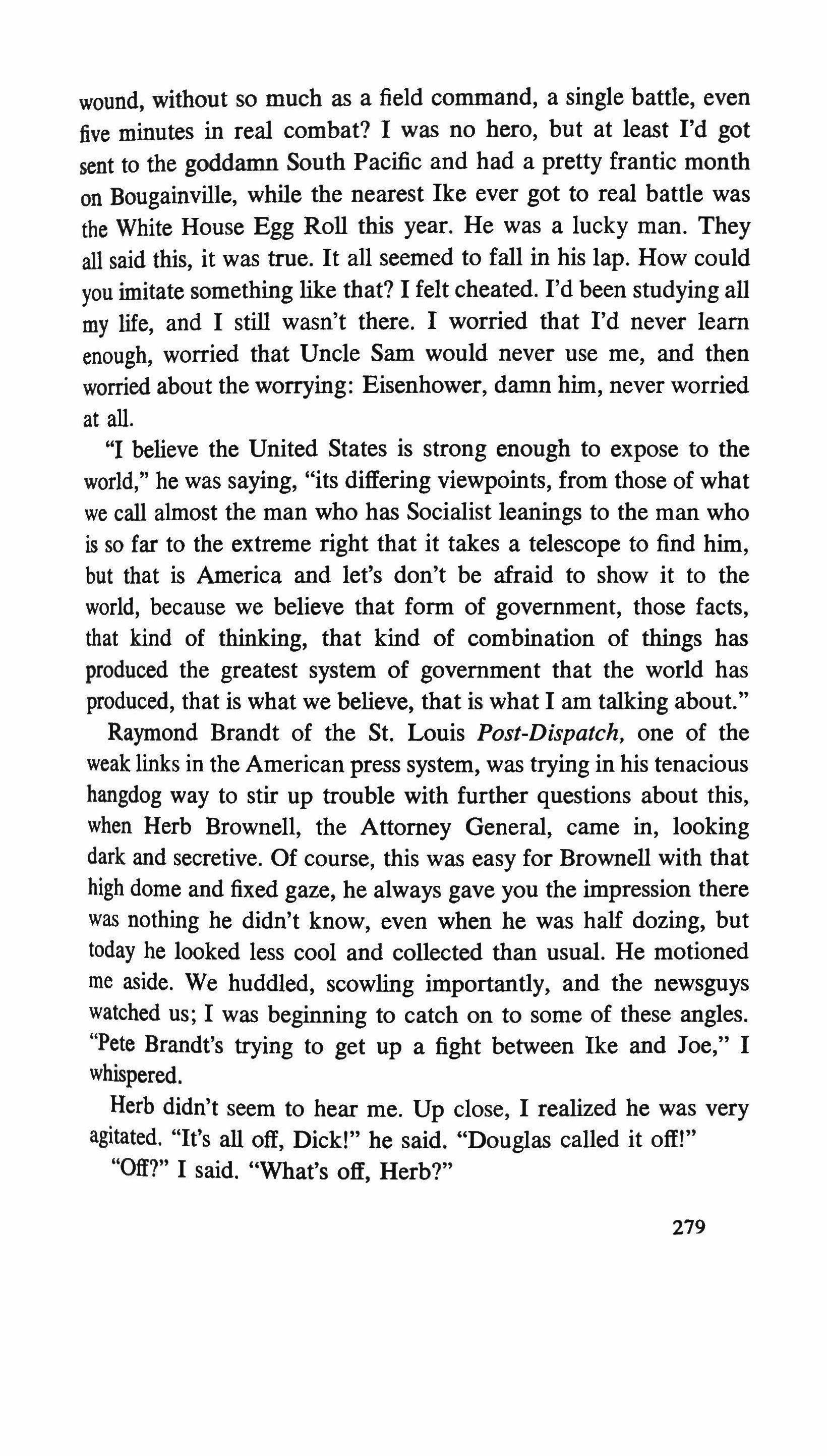
wound, without so much as a field command, a single battle, even five minutes in real combat? I was no hero, but at least I'd got sent to the goddamn South Pacific and had a pretty frantic month on Bougainville, while the nearest Ike ever got to real battle was the White House Egg Roll this year. He was a lucky man. They all said this, it was true. It all seemed to fall in his lap. How could you imitate something like that? I felt cheated. I'd been studying all my life, and I still wasn't there. I worried that I'd never learn enough, worried that Uncle Sam would never use me, and then worried about the worrying: Eisenhower, damn him, never worried at all.
"I believe the United States is strong enough to expose to the world," he was saying, "its differing viewpoints, from those of what we call almost the man who has Socialist leanings to the man who is so far to the extreme right that it takes a telescope to find him, but that is America and let's don't be afraid to show it to the world, because we believe that form of government, those facts, that kind of thinking, that kind of combination of things has produced the greatest system of government that the world has produced, that is what we believe, that is what I am talking about."
Raymond Brandt of the St. Louis Post-Dispatch, one of the weak links in the American press system, was trying in his tenacious hangdog way to stir up trouble with further questions about this, when Herb Brownell, the Attorney General, came in, looking dark and secretive. Of course, this was easy for Brownell with that high dome and fixed gaze, he always gave you the impression there was nothing he didn't know, even when he was half dozing, but today he looked less cool and collected than usual. He motioned me aside. We huddled, scowling importantly, and the newsguys watched us; I was beginning to catch on to some of these angles. "Pete Brandt's trying to get up a fight between Ike and Joe," 1 whispered.
Herb didn't seem to hear me. Up close, I realized he was very agitated. "It's all off, Dick!" he said. "Douglas called it off!" "Off?" 1 said. "What's off, Herb?"
279

"The executions! The Rosenbergs!"
My heart jumped, seemed to lodge in my throat. I worried that the reporters would notice this, but there was nothing I could do about it. I'd been very upset about this thing since the weekend, since I'd learned about the anniversary.
"Douglas waited until all the other Justices had left town on their vacations," Herb whispered, "and then issued a stay! It's a helluva mess!"
"We've got to get word to the General, before one of these guys asks the wrong question," I said.
"Generally speaking," the President was saying, "that is exactly what I believe. But I do say I don't have to be a party to my own self-destruction, that is the limit and the other limit I draw is decency, we have certain books we bar from the mails, and all that sort of thing, I think that is perfectly proper and I would do it now, I don't believe that standards of essential human dignity ought to be violated in these things. And human decency."
I scratched out a note: ROSENBERG EXECUTIONS CALLED OFF! and passed it to the press secretary, Jim Hagerty. Hagerty blanched, seemed uncertain what to do with it. I motioned toward the President, but Jim seemed reluctant to pass it on. Probably afraid the Old Man would read it out loud like an announcement. Or get confused and become completely unintelligible. Maybe even blow his stack.
"How many of you have read Stalin's Problems of Leninism?" the President was asking. We didn't even know he knew the title. "How many of you have really studied Karl Marx and looked at the evolution of the Marxian theory down to the present application?" Everybody thought he had said "Martian theory" and he was getting a lot of laughs. This was very successful, the reporters had completely forgotten what they'd asked him, but I thought: my God, I could never do this! I wrote a new note: URGENT BUSINESS! BRING THIS CONFERENCE TO A CLOSE!, and handed it to Jim. Jim added in PLEASE and AS SOON AS POSSIBLE, passed it on to the General, who was just saying: "Of course we shouldn't give that text to a Communist teacher and say, Now, take your
280

students off, and try to lead them astray, any more than you would give them, let us say, AI Capone's book on how to be a crook!" Nobody knew any longer what text he was talking about.
When the news conference was over and we'd cleared everybody out of there, Herb sprang the news.
The President drew himself up-a tall man, after all, and strong-in fact, his countenance was already changing-and with jaw set and fists clenched, yet with perfect composure, perfect equanimity, said simply:
"Friends, this is a job for Uncle Sam!"
from a work in progress
281
Meredith Dawe JOYCE CAROL OATES
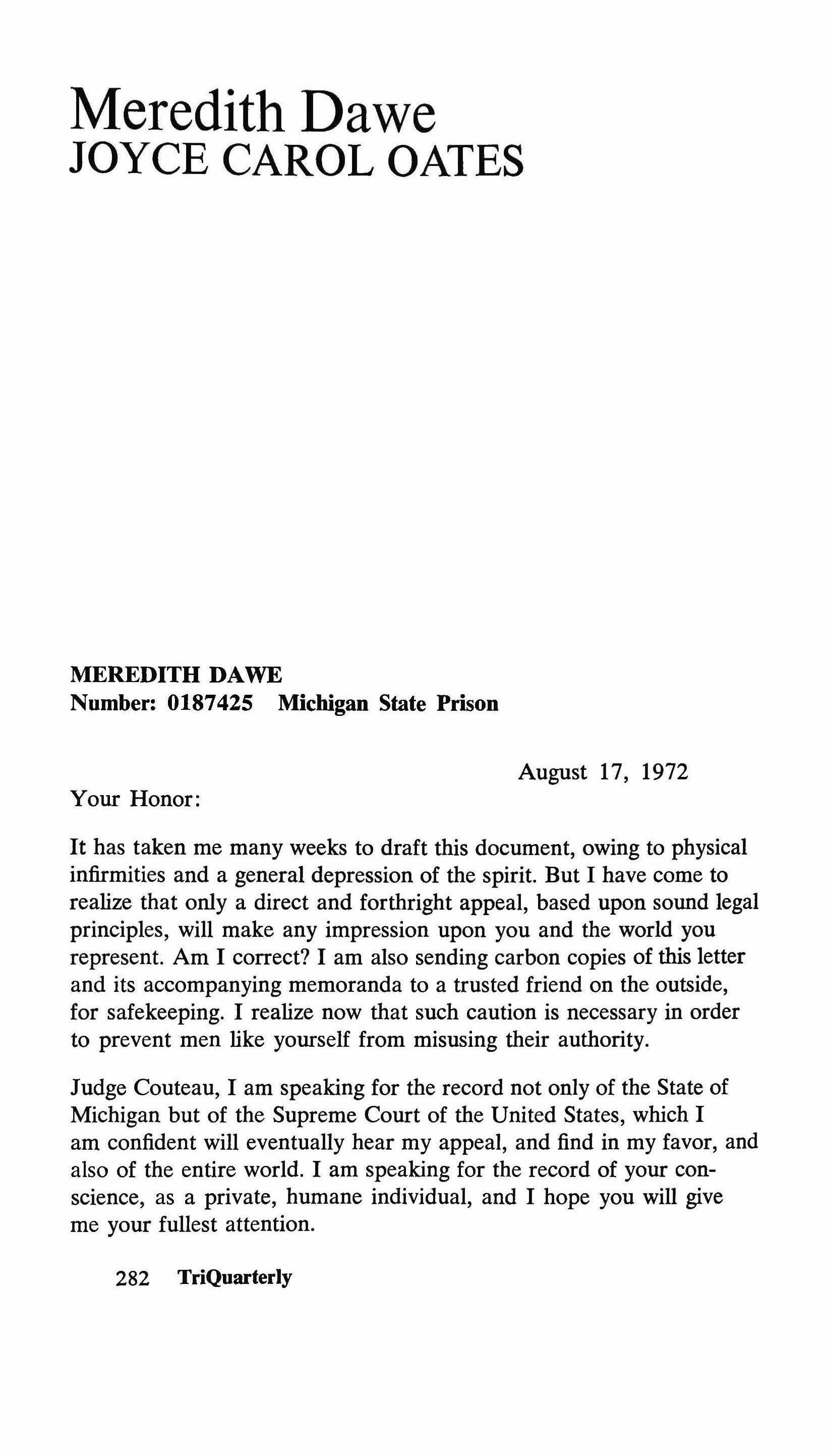
MEREDITH DAWE
Number: 0187425 Michigan State Prison
August 17, 1972
Your Honor:
It has taken me many weeks to draft this document, owing to physical infirmities and a general depression of the spirit. But I have come to realize that only a direct and forthright appeal, based upon sound legal principles, will make any impression upon you and the world you represent. Am I correct? I am also sending carbon copies of this letter and its accompanying memoranda to a trusted friend on the outside, for safekeeping. I realize now that such caution is necessary in order to prevent men like yourself from misusing their authority.
Judge Couteau, I am speaking for the record not only of the State of Michigan but of the Supreme Court of the United States, which I am confident will eventually hear my appeal, and find in my favor, and also of the entire world. I am speaking for the record of your conscience, as a private, humane individual, and I hope you will give me your fullest attention.
282 TriQuarterly

I will outline to you the series of actions I am going to take:
My first petition is a plea for the bench to re-examine every detail of the transcript of my trial. This must be done immediately, and by an objective, just man, who is not connected in any way with the Court of the State of Michigan. I request that Your Honor assign a non-partisan observer for this purpose. This observer will surely come to the conclusion that the Assistant Prosecuting Attorney made many statements and accusations about me that were allowed to pass and to be heard by the jury, without the right for him to do so, in that his hatred of me surpassed all legal evidence and was a constant source of bewilderment and chagrin to me. Not only this, again and again the transcript notes objections made by my counsel, Mr. John Morrissey, of Detroit, Michigan, which Your Honor chose to ignore. An impartial observer must come to the conclusion that I did not receive a fair trial before you and that the entire conviction must therefore be reversed.
My second act is to give notice to you that I am filing suit against you personally, in your position as a judge, and against the Police Commissioner of the City of Detroit, for a nonpartisan referee to enforce the above-mentioned petition.
My third act is to give notice to you by this communication that I am filing suit against you in the Federal Court in Detroit for a sum no less than $1 million, in that my constitutional rights and my civil rights have been grossly violated by your action in handing down to me, Meredith Dawe, a sentence of 8 to 10 years in the penal system of the State of Michigan. This sentence, delivered by Your Honor, Judge Carl Couteau, sitting in Recorder's Court in the City of Detroit, on Monday 5 June 1972, does restrict my freedom of speech, my freedom to move to and from any fixed point, and curtails in general the civil rights guaranteed to all citizens of the United States under our Constitution. In addition, I want to inform you that this sentence constitutes cruel and unusual punishment, since I am at present a prisoner not only in prison but in a hospital ward, and my spirit is seriously depressed by the misery all around me and by my own occasional infirmity. I note in myself flashes of fear, concerning my immediate future (I am undergoing another spinal operation shortly) and the future of my adulthood, as well as the future of this sorrowful, doomed nation.
In addition, I am preparing a lengthy writ of habeas corpus to the effect that I was not truly represented by counsel during my trial
283

and during the many weeks preceding my trial. Though this will be difficult to prove, I am undertaking the task confidently, and I am only puzzled at present how to begin. I believe I will frame the writ in the shape of an autobiographical work. Your Honor will appreciate the fact (though this is not a threat against Your Honor) that such a writ, made public, will sway to my side vast segments of the American people, who will clamor for justice. At present, I am awaiting important documents concerning my family history, which are essential for any reader to comprehend the nucleus of my writ of habeas corpus, which, as I understand must be no more than two or three pages long, must be framed by an exhaustive introduction and as many appendices and indices as are necessary. The "Autobiography of Meredith Dawe" may perhaps be cast in the form of a novel, since no other form of communication (that is not tactile) can approach the terrifying density, the overwhelming weight, of a novel. My autobiography, properly studied, will illuminate not only a single act of savage misjustice (committed by a jury of 12 representative but tragically prejudiced citizens and compounded by Your Honor in his punitive zeal in excess of all charges) but an entire nation, a despoiled and vandalized Garden of North America, which begs us to purify it and restore it to its original innocence. How long must we await the resanctification of our gardens?
In support of this writ, and closely allied with my suit against Your Honor (for violating my rights as a citizen), I want to state for the record that Your Honor's refusal to allow me to dismiss my attorney and to act in my own defense, on the fourth day of my trial, was perhaps the most grievous single curtailment of my freedom. Considering this fact and also the fact that my attorney, Mr. John Morrissey of Detroit, Michigan, was in no way sympathetic with my basic beliefs and my personality, and approached the entire case simply as a professional challenge, any fair-minded person will see that I did not have an attorney at all. I really did not have an attorney to defend me. My own role in this confusion was a slowness to perceive what other people evidently recognized at once, and tried to communicate to me, that the attorney who was defending me was not defending "me" but an abstract principle. However competent Mr. Morrissey may be as an officer of the court, he did not comprehend my state of mind at the time of the alleged crime, the time of my arrest, at any time during the weeks leading up to and including my trial, and he did not then, in fact, represent Meredith Dawe. Thus, the basis for my writ, which will admittedly involve many weeks of
284
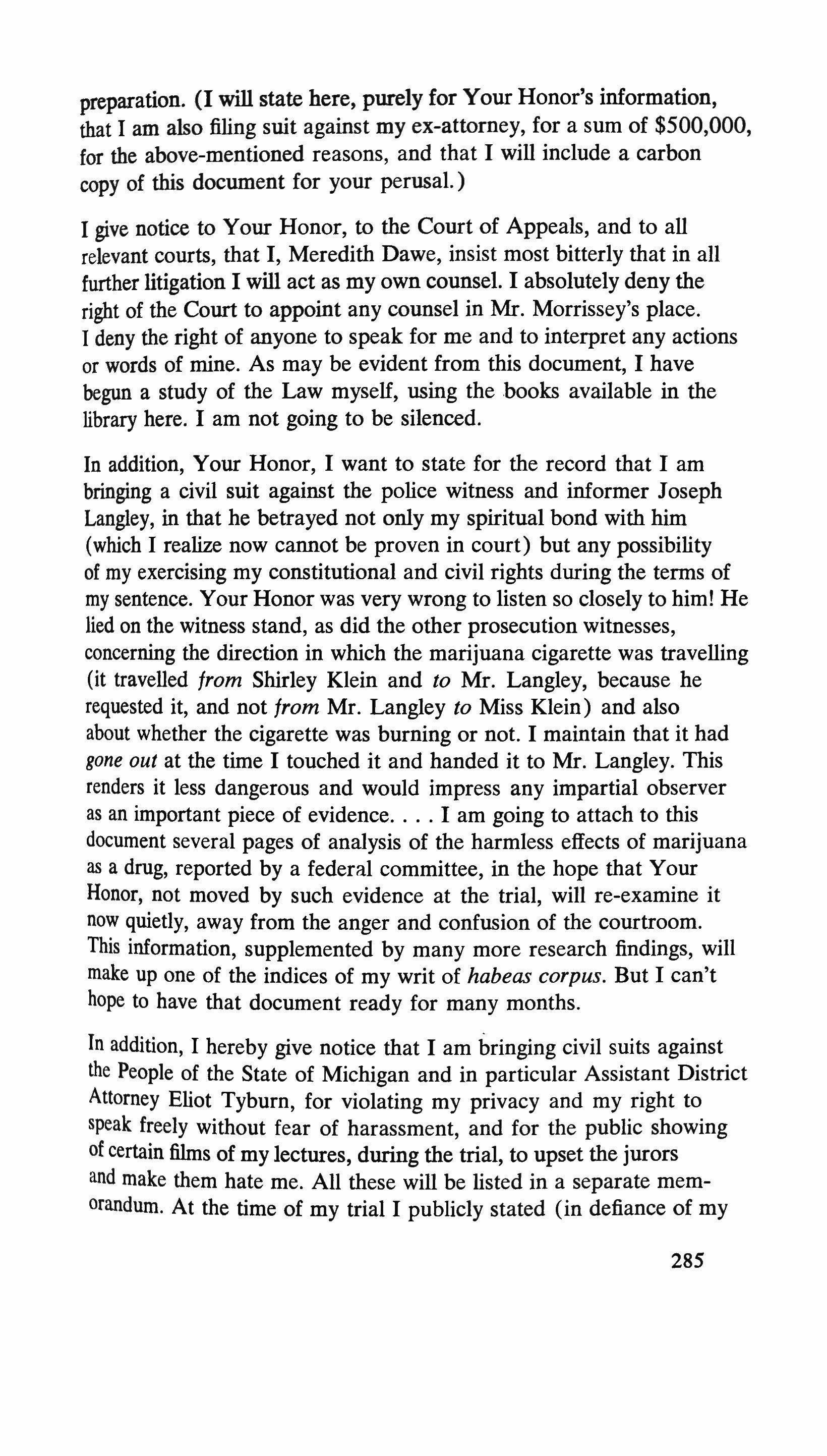
preparation. (I will state here, purely for Your Honor's information, that I am also filing suit against my ex-attorney, for a sum of $500,000, for the above-mentioned reasons, and that I will include a carbon copy of this document for your perusal.)
I give notice to Your Honor, to the Court of Appeals, and to all relevant courts, that I, Meredith Dawe, insist most bitterly that in all further litigation I will act as my own counsel. I absolutely deny the right of the Court to appoint any counsel in Mr. Morrissey's place. I deny the right of anyone to speak for me and to interpret any actions or words of mine. As may be evident from this document, I have begun a study of the Law myself, using the books available in the library here. I am not going to be silenced.
In addition, Your Honor, I want to state for the record that I am bringing a civil suit against the police witness and informer Joseph Langley, in that he betrayed not only my spiritual bond with him (which I realize now cannot be proven in court) but any possibility of my exercising my constitutional and civil rights during the terms of my sentence. Your Honor was very wrong to listen so closely to him! He lied on the witness stand, as did the other prosecution witnesses, concerning the direction in which the marijuana cigarette was travelling (it travelled from Shirley Klein and to Mr. Langley, because he requested it, and not from Mr. Langley to Miss Klein) and also about whether the cigarette was burning or not. I maintain that it had gone out at the time I touched it and handed it to Mr. Langley. This renders it less dangerous and would impress any impartial observer as an important piece of evidence I am going to attach to this document several pages of analysis of the harmless effects of marijuana as a drug, reported by a federal committee, in the hope that Your Honor, not moved by such evidence at the trial, will re-examine it now quietly, away from the anger and confusion of the courtroom. This information, supplemented by many more research findings, will make up one of the indices of my writ of habeas corpus. But I can't hope to have that document ready for many months.
In addition, I hereby give notice that I am bringing civil suits against the People of the State of Michigan and in particular Assistant District Attorney Eliot Tyburn, for violating my privacy and my right to speak freely without fear of harassment, and for the public showing of certain films of my lectures, during the trial, to upset the jurors and make them hate me. All these will be listed in a separate memorandum. At the time of my trial I publicly stated (in defiance of my
285
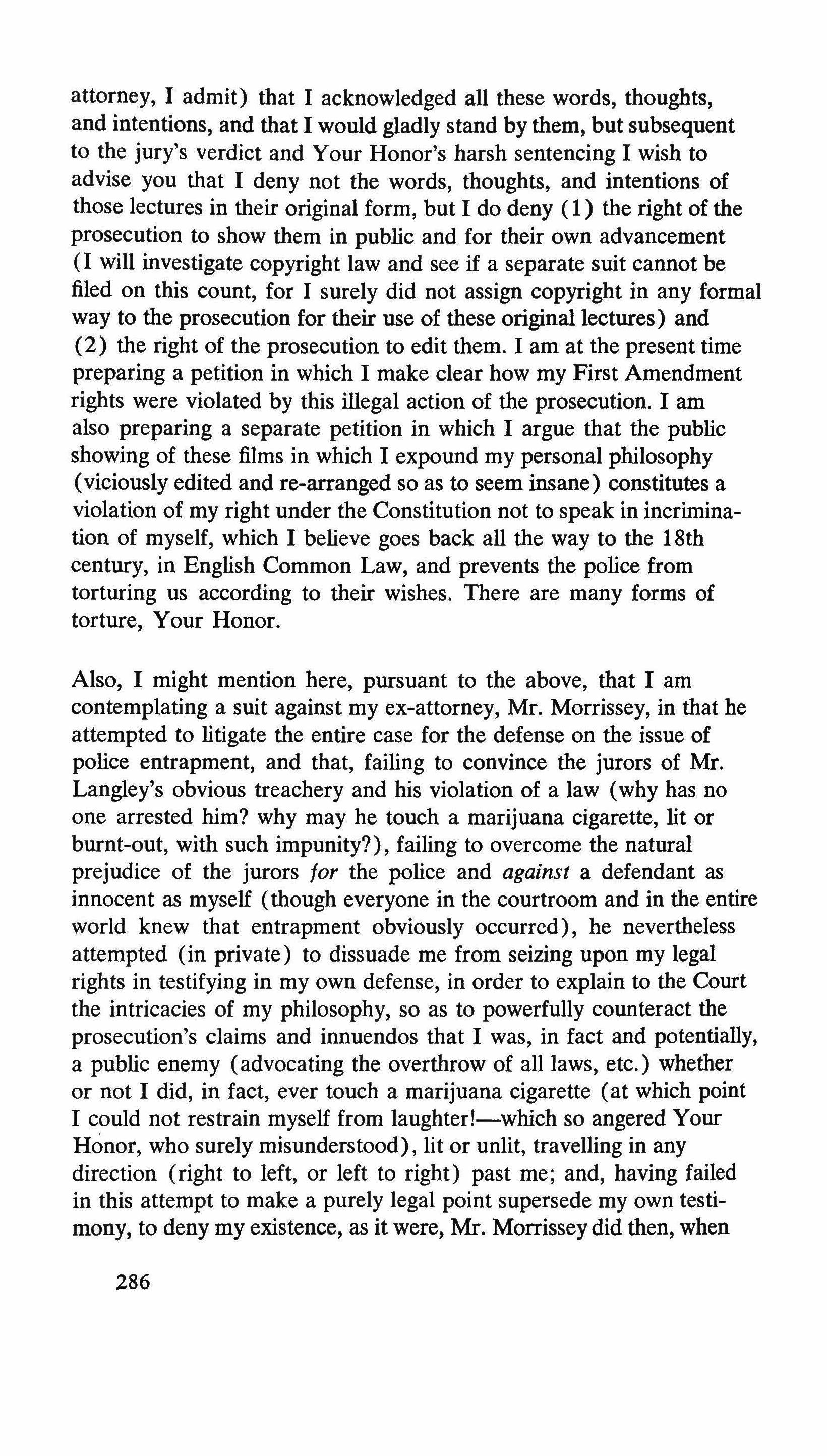
attorney, 1 admit) that 1 acknowledged all these words, thoughts, and intentions, and that 1 would gladly stand by them, but subsequent to the jury's verdict and Your Honor's harsh sentencing 1 wish to advise you that 1 deny not the words, thoughts, and intentions of those lectures in their original form, but 1 do deny (1) the right of the prosecution to show them in public and for their own advancement (I will investigate copyright law and see if a separate suit cannot be filed on this count, for 1 surely did not assign copyright in any formal way to the prosecution for their use of these original lectures) and (2) the right of the prosecution to edit them. 1 am at the present time preparing a petition in which 1 make clear how my First Amendment rights were violated by this illegal action of the prosecution. 1 am also preparing a separate petition in which 1 argue that the public showing of these films in which 1 expound my personal philosophy (viciously edited and re-arranged so as to seem insane) constitutes a violation of my right under the Constitution not to speak in incrimination of myself, which 1 believe goes back all the way to the 18th century, in English Common Law, and prevents the police from torturing us according to their wishes. There are many forms of torture, Your Honor.
Also, 1 might mention here, pursuant to the above, that 1 am contemplating a suit against my ex-attorney, Mr. Morrissey, in that he attempted to litigate the entire case for the defense on the issue of police entrapment, and that, failing to convince the jurors of Mr. Langley's obvious treachery and his violation of a law (why has no one arrested him? why may he touch a marijuana cigarette, lit or burnt-out, with such impunity?), failing to overcome the natural prejudice of the jurors for the police and against a defendant as innocent as myself (though everyone in the courtroom and in the entire world knew that entrapment obviously occurred), he nevertheless attempted (in private) to dissuade me from seizing upon my legal rights in testifying in my own defense, in order to explain to the Court the intricacies of my philosophy, so as to powerfully counteract the prosecution's claims and innuendos that 1 was, in fact and potentially, a public enemy (advocating the overthrow of all laws, etc.) whether or not 1 did, in fact, ever touch a marijuana cigarette (at which point 1 could not restrain myself from laughter!-which so angered Your Honor, who surely misunderstood), lit or unlit, travelling in any direction (right to left, or left to right) past me; and, having failed in this attempt to make a purely legal point supersede my own testimony, to deny my existence, as it were, Mr. Morrissey did then, when
286

I was on the witness stand and at last able to speak directly to the world, by his very narrow questions and his strategy of interrupting me so frequently, attempt to curtail my freedom of speech, in order (as he said) that I should not offend the sensibilities of the jurors and the Court, and thereby cause prejudice against my case (which he saw as his case). Though he was correct about this, this does not lessen his moral guilt, and I am suing him as well under a separate claim for malpractice, since his questions and interruptions and attempts to restrain me might have indicated that he lacked proper faith in his own client, which you, as an experienced judge, might have noticed. Allied with this was Mr. Morrissey's technique of repeatedly interrupting the cross-examination, and even the interruption of certain of my replies, so as to give the impression that there were things in my personal life that the prosecution had no right to inquire about. This made everyone think I had something to hide. This obviously inspired prejudice and disgust not only in the jury, but in Your Honor. There was no moral reason why my attorney should have objected to my being questioned in open court and in any manner desired by the prosecution, since an innocent man may surely speak his heart.
An innocent man may surely speak his heart.
Your Honor, why do you hate me? Why wish me so much evil? I lie here trying to get my mind clear from the drugs and the stiffness and the awful memory of my trial and I think of you, your hatred of me, kept so hidden. But why? Why? When I first walked into your courtroom I believed what the plaque said on the wall-JUSTICE IS THE GUARANTEE OF LIBERTy-and I was prepared to love you and work for your conversion (as I am dedicated to the conversion of men like yourself), but not violently and not through hate. Never would I have consented to your imprisonment for any crime at all, anything at all, but especially not for your private beliefs. And yet you must have hated me so much that your hatred overcame your natural instinct toward justice. Why is this? Until the very end, until your charge to the jury, my attorney and I and many others truly believed that even though the jury might be against me Your Honor was impartial, unbiased, and sympathetic, and would rule on my innocence or guilt (for I suppose I was "guilty" of a legal lapse, if not a conscious crime-and my admission of this point should not have been used so repeatedly against me by both the prosecution and Your Honor) of the crime I was charged with in the indictment, and not on any personal philosophy
287
of mine or on my soul, though I am still confused about why anything I say or do or my entire personality should be assumed to be "in violation of all community standards of decency."
Why?
In conclusion, I submit also to Your Honor that the publicity surrounding the case all along (to which I inadvertently contributed, believing always in the good-will of the various reporters and interviewers who approached me) made a fair trial impossible. If a suit can be initiated for an after-the-fact crime, I would like to sue a local newspaper for its editorial entitled "A Victory for Decency" and I would like to bring an injunction against the press and the communications media to prevent any further such libels, in that an appeal, if and when I am granted an appeal, will be influenced also negatively. All this, I submit, represents a conspiracy to thwart my receiving justice, on the part of people I have never met, and it is all in tragic excess of any charges originally brought against me in the indictment, which I hereby restate for Your Honor's information:
The Grand Jury of the County of Wayne, Michigan, by this Indictment accuses Meredith Dawe of the crime of violation of Public Health Law with respect to Narcotic Drugs, a Felony, committed as follows:
The Defendant, on or about the 5th day of December, 1970, in the City of Detroit, County of Wayne and State of Michigan, unlawfully and in violation of Public Health Law, had in his possession and under his control one quarter of an ounce of a preparation, compound, mixture and substance containing cannabis.
Must I be destroyed because of � ounces of marijuana ?
Very sincerely yours, Meredith Dawe
August 18, 1972
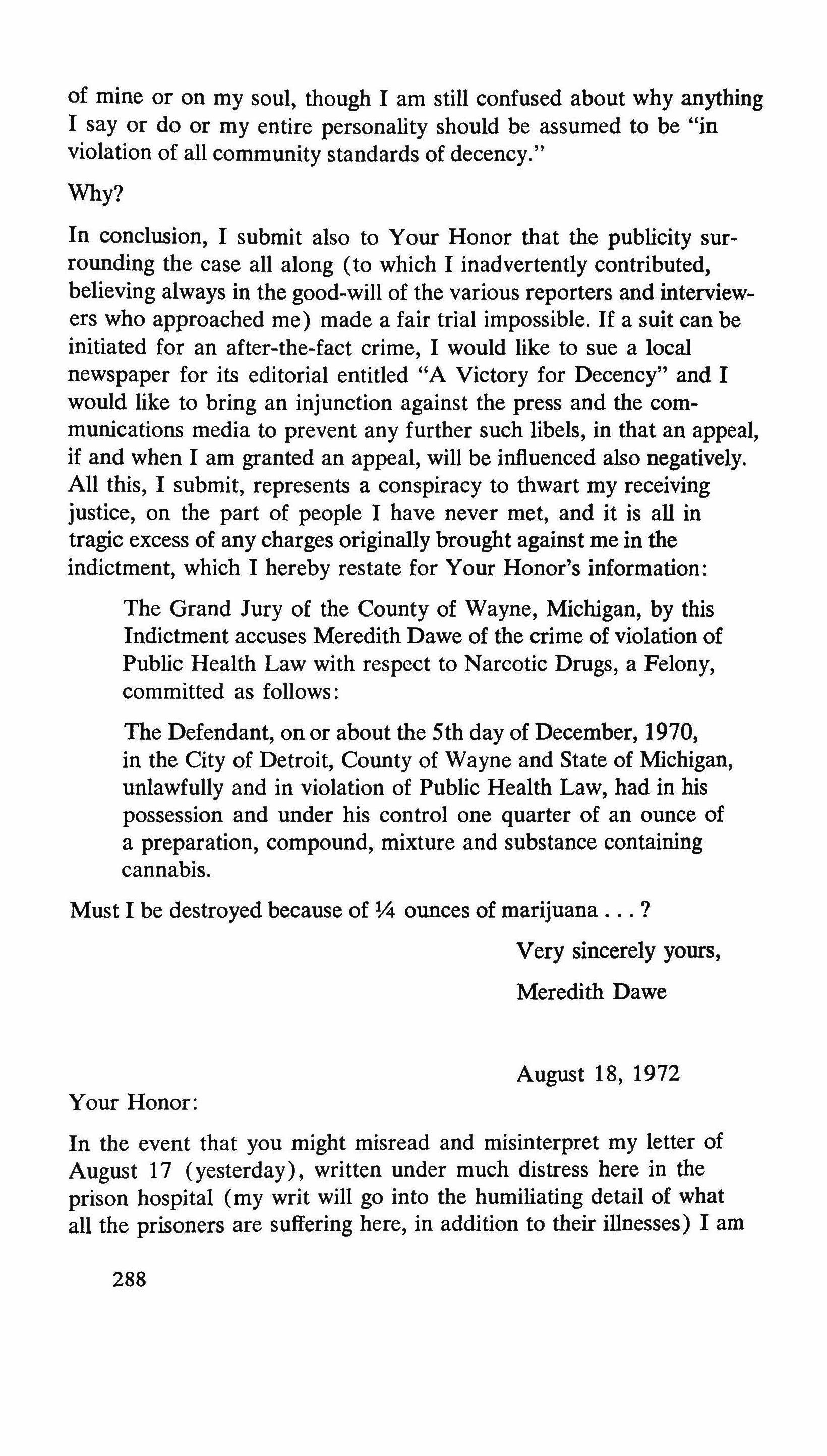
Your Honor:
In the event that you might misread and misinterpret my letter of August 17 (yesterday), written under much distress here in the prison hospital (my writ will go into the humiliating detail of what all the prisoners are suffering here, in addition to their illnesses) I am 288
writing another communication which Your Honor is respectfully requested to file for the record.
My previous letter ended wih the question, Must I be destroyed because of � ounces of marijuana ? I request that this question be stricken from the record. I request most urgently that Your Honor not interpret that question to mean that I am accusing him of wanting to destroy (i.e., commit a crime) me or anyone. I have suffered many hours of anxiety since writing my letter of August 17, in which my emotions sometimes overcame my legal arguments, and I hope that Your Honor will not see fit to instigate any suit against me for slander or (in the event my letter is somehow published) libel.
Please understand that it was not my intention to accuse Your Honor of acting with the premeditated intention of committing any illegal act or with any premeditation at all in the sense of being pre-judiced (prejudicial) or meditational in any illegal sense of the word.
Sincerely,
Meredith Dawe

August 21, 1972
Your Honor:
Since having written to you last week (August 17 and August 18, to be exact) I have waited for your response patiently. But, receiving no letter from you, and in the event that such a letter was in fact sent to me and was not received (for the record I will state that no letter was received even if Your Honor's letter was sent by way of ordinary mail and not as a registered letter (which I would suggest for the protection of all concerned) ), I see fit to inform Your Honor that I am now preparing a brief which will petition for the appointment of an impartial observer (this petition will, of course, supersede the petition outlined in paragraph 4 of my letter of August 17 (paragraph beginning "My first petition "», who is a non-native-born person of demonstrated intelligence, literacy, and human sympathy, but who is not conversant in any way with the English language. This observer will then function as referee, and his duty would be to carefully examine the lectures and public addresses and various interviews of mine, all the tapes, films, and transcripts used by the prosecution to argue its case against me (as an advocate of "anarchy through drugs"), this to be effected in two stages: (1) their original shape, 289
(2) the edited, distorted, abbreviated shape used by the prosecution in order to poison the jurors' minds and bring about a verdict of Guilty. The foreign-born referee will then make a detailed report to Your Honor concerning the degree of editing, on a statistical basis entirely (since the referee would not know English, two very significant results would be achieved: (1) he could not be prejudiced against me, (2) the Court would be forced to assume the truly objective nature of his report).
I will be awaiting your response and I suggest that for the protection of all concerned this above-mentioned referee be appointed within one week of this notice sent to the Honorable Carl Couteau, Judge, District Court of Detroit, 21 August 1972.
Sincerely,
Meredith Dawe

August 29, 1972
Your Honor:
I have uncovered new evidence which requires automatic reversal of the verdict against me, since it refutes the basic wording of the indictment originally handed down. I am basing my accusation on a statute of 1927 which states that such indictments must be filed within a certain amount of time of the offense allegedly committed. I believe that it is not demonstrable by any known scientific method that certain deeds have or have not occurred, since all witnesses and all alleged violators of civil and criminal laws have evolved since the historical time at which the "crime" allegedly took place, and in no way can their testimony be accepted as scientific evidence. If Your Honor doubts the validity of these statements, I will remind him that my original training was in the sciences, especially physics, and that it is a matter of public record (or could very easily become a matter of public record, since my academic transcripts are on file at the following accredited universities: Harvard University (1962-1963); the University of Michigan (1963-1967); the University of Chicago (1967-1968); Stanford University (Fall, 1968-approximately February 1969) and that my training includes a wide variety of subjects in both the scientific and the humanistic fields, especially physics.)
I submit to Your Honor that my findings entirely refute the prosecution's arguments (further weakened by the prosecution's failure to
290
present a single scientist as a witness against me), my own attorney's procedure of defense, the jurors' probable deliberations and consequently their verdict, Your Honor's sentencing, and, in point of fact (cancelling each of the above), the original indictment, which I am enclosing with this letter so that Your Honor can familiarize himself with it if he has forgotten certain key phrases.
Sincerely,
Meredith Dawe

(indictment enclosed)
September 8, 1972
Your Honor:
Your Honor will be pleased to be informed of my completion of the series of spinal operations performed by the following neurosurgeons: Dr. Monroe Baskin, Dr. Felix Quigley, and Dr. Raymond Doyle. If there is any conspiracy to render me impotent it will be medically evident upon examination by any physicians exclusive of the above, but note that I am not accusing said surgeons or the State of Michigan or (least of all) Your Honor of any conspiracy whatsoever.
The purpose of this communication (sent in a moral vacuum since I despair of its being answered) is also to inform Your Honor that, contrary perhaps to the tone of my earlier letters, I am considering the possibility of Your Honor's being innocent of any prejudicial hatred of me, which may inspire Your Honor to reply to some if not all of my letters. I am certain that a letter from a Detroit judge would be delivered to me here, quite immune from censorship (if Your Honor would indicate somehow that it is not to be opened by the prison authorities: he might simply write, in his own handwriting. such a request, signed with his initials, the envelope to be an official one with the return address clearly stating Your Honor's position and address) but, if such an act is actually committed, either party (correspondent or receiver) might then instigate suit against this invasion of privacy as well as a file for an injunction against its occurring again in the future so that, if this very document which I am now preparing, this very letter I am composing to you, is intercepted, and these very words are, in fact, studied by the prison censor, they might in themselves constitute prior warning (though I am somewhat shaky on the law concerning this point since the books available to me here stop at 1968).
291

The reason for my consideration of this alteration of blame (which did in fact never take the form of any accusation) is that, in the last several days, I have been hearing again the words of Assistant District Attorney Eliot Tyburn, sometimes as he sums up the case against me to the jury (in which he made cruel and unusual use of my own phrase, "lapse of legality," in order to poison the jurors' minds against me) but more often as he argued to Your Honor, at the sentencing of 5 June 1972. That I am not interfering with Mr. Tyburn's privacy or autonomy in any way may be underscored by the fact that I would rather hear the plea made by my attorney, Mr. Morrissey, on that very same day (but, unfortunately, I can remember only snatches of Mr. Morrissey's argument which was as close to being a human, passionate, loving speech as Mr. Morrissey could perhaps make, being himself a most limited and unloving man, though perhaps not incapable of being loved and, as a consequence, himself loving, were he able to recreate his soul to that extent; I remember only the phrases pure, self-determined make kind of mistakes others cowardly we are frightened and demand revenge he they he is not he is I plead for a young man of not a criminal I plead for a suspended sentence ") but as if it were somehow part of the invisible tortures planned for me by the State, Mr. Morrissey's argument to You is continually outshouted and overcome by Mr. Tyburn's argument though, in fact, as I recall, neither man raised his voice. Therefore, helpless as I have been during the past several days (unless time has lapsed longer than I know, and the date is actually not 8 Sept. 1972 but some other date, unimaginable to me) I have continually heard Mr. Tyburn's voice, but not willfully or intentionally, and, inadvertently hearing this voice (of a private individual but in his role as public prosecutor), I have come to the conclusion that this powerful, deathly, terrifying voice may have had the effect, on the morning of 5 June 1972, of influencing Your Honor unduly, in his sentencing of me; and that this re-consideration would seriously re-cast the entire event, absolving Your Honor entirely of blame. I know the words so well now that I may include them here without the slightest fear of misquotation (though this is not an official document, but simply a personal letter to you, between two parties who share a mutual concern over the tragedies of injustice sometimes committed by well-meaning people). Study this speech carefully, Your Honor, and see whether it does not attempt to influence the listener (You), and to sway him against any human act of mercy:
292
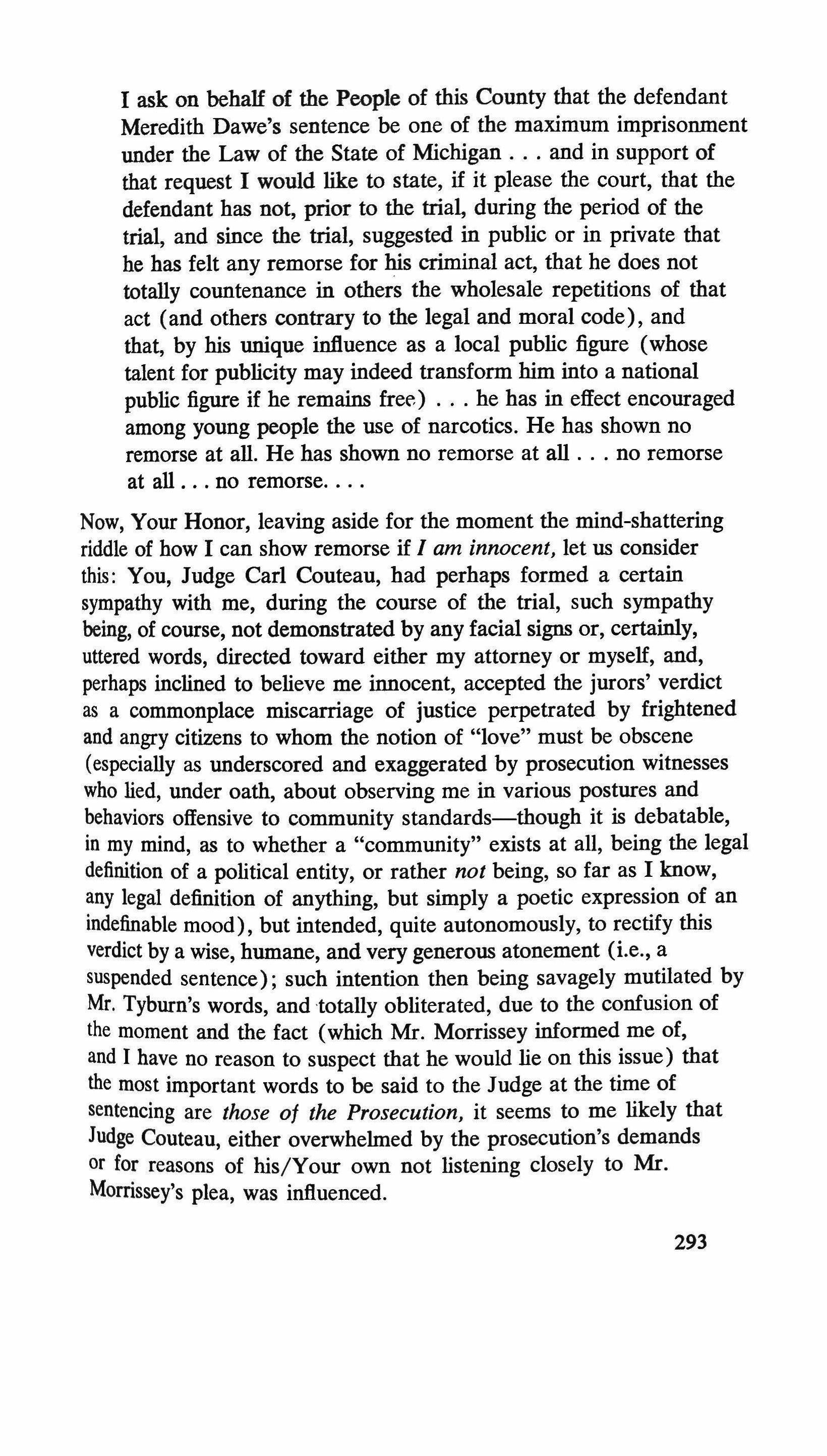
I ask on behalf of the People of this County that the defendant Meredith Dawe's sentence be one of the maximum imprisonment under the Law of the State of Michigan and in support of that request I would like to state, if it please the court, that the defendant has not, prior to the trial, during the period of the trial, and since the trial, suggested in public or in private that he has felt any remorse for his criminal act, that he does not totally countenance in others the wholesale repetitions of that act (and others contrary to the legal and moral code), and that, by his unique influence as a local public figure (whose talent for publicity may indeed transform him into a national public figure if he remains free) he has in effect encouraged among young people the use of narcotics. He has shown no remorse at all. He has shown no remorse at all no remorse at all no remorse
Now, Your Honor, leaving aside for the moment the mind-shattering riddle of how I can show remorse if I am innocent, let us consider this: You, Judge Carl Couteau, had perhaps formed a certain sympathy with me, during the course of the trial, such sympathy being, of course, not demonstrated by any facial signs or, certainly, uttered words, directed toward either my attorney or myself, and, perhaps inclined to believe me innocent, accepted the jurors' verdict as a commonplace miscarriage of justice perpetrated by frightened and angry citizens to whom the notion of "love" must be obscene (especially as underscored and exaggerated by prosecution witnesses who lied, under oath, about observing me in various postures and behaviors offensive to community standards-though it is debatable, in my mind, as to whether a "community" exists at all, being the legal definition of a political entity, or rather not being, so far as I know, any legal definition of anything, but simply a poetic expression of an indefinable mood), but intended, quite autonomously, to rectify this verdict by a wise, humane, and very generous atonement (i.e., a suspended sentence); such intention then being savagely mutilated by Mr. Tyburn's words, and totally obliterated, due to the confusion of the moment and the fact (which Mr. Morrissey informed me of, and I have no reason to suspect that he would lie on this issue) that the most important words to be said to the Judge at the time of sentencing are those of the Prosecution, it seems to me likely that Judge Couteau, either overwhelmed by the prosecution's demands or for reasons of his/Your own not listening closely to Mr. Morrissey's plea, was influenced.
293
Therefore, I ask you, Your Honor, to re-examine your mind before the day of sentencing, to re-experience the vicious argument against me, and to inform me as soon as possible whether, in fact, this argument did sway you. I hope I will hear from you at your earliest convenience, since it is possible (indeed, probable) that the words of Mr. Tyburn are such a din in my head because they are meant to inform me of Your actual innocence. This would mean so much to me
They have said that the operations are concluded, and yet certain humiliating and very painful examinations continue (involving surgical needles at least 12" in length which I would not look at, to lessen my terror, but which I feel I must see in order to note any possible prior staining, rusting, or evidence of filth) at all hours of the day and night, often when I am deep in meditation, so far from the externalities of my body that my body is defenseless. It is becoming clear that the original operations were not successful, and that more operations are being planned, though the Director denies this, no doubt in order to protect the surgeons responsible for these errors from charges of malpractice, such charges not contemplated at present because the information I would require concerning medical malpractice suits is mysteriously missing from the book it should be in (one-third of the book's pages have been torn out) and, yesterday, the book itself was' not where I hid it, but vanished. If it turns out, as I think it might, that Your Honor did feel this prior sympathy to me, You might also be moved enough by my sufferings here to make a quick telephone call (it would probably have to be in person-I doubt that your secretary's voice would be sufficient) to forbid any further mutilation of my body, especially when I am not sufficiently conscious to defend it.
Thank you very much.
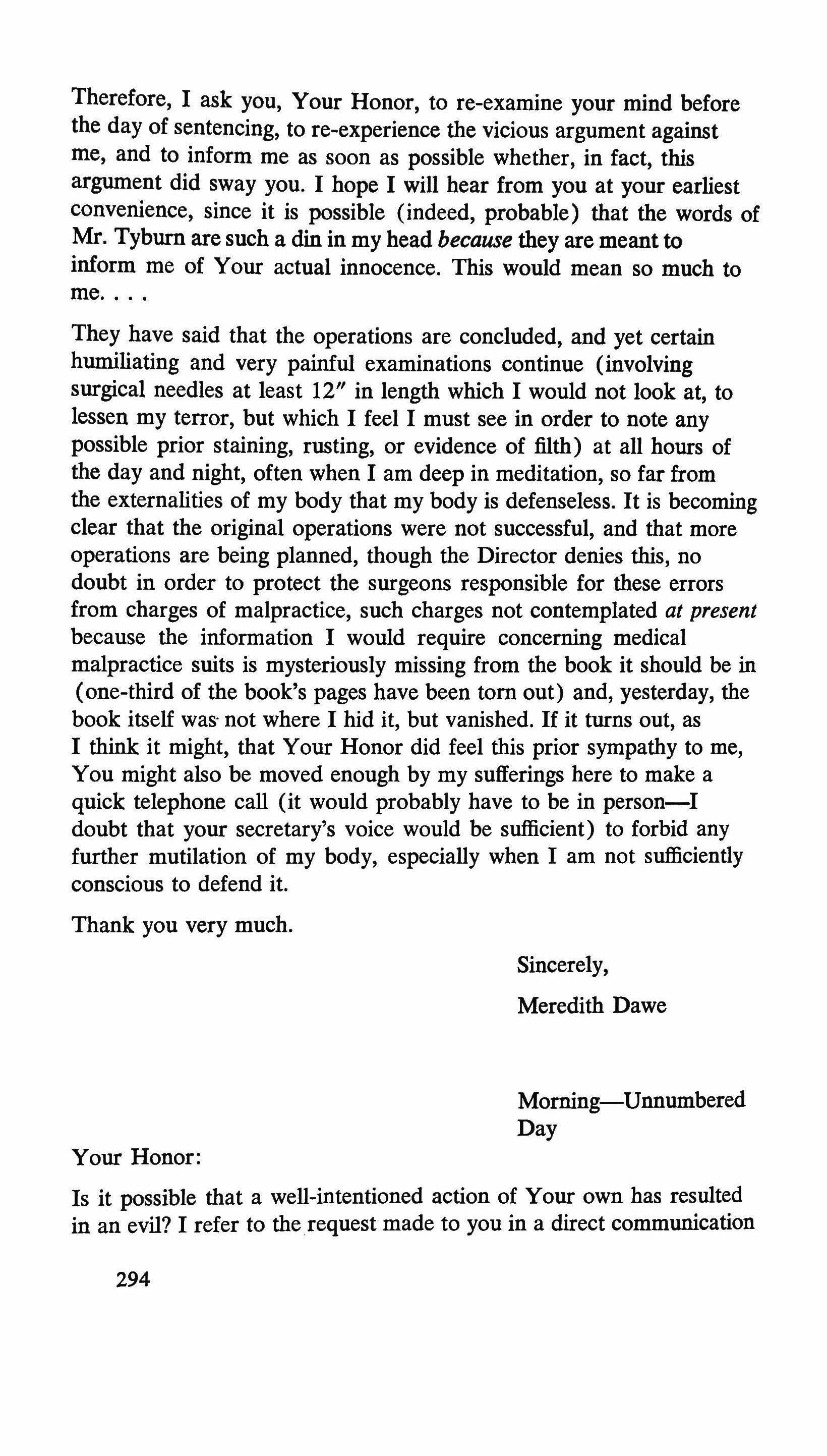
Sincerely,
Meredith Dawe
Morning-Unnumbered Day
Your Honor:
Is it possible that a well-intentioned action of Your own has resulted in an evil? I refer to therequest made to you in a direct communication
294
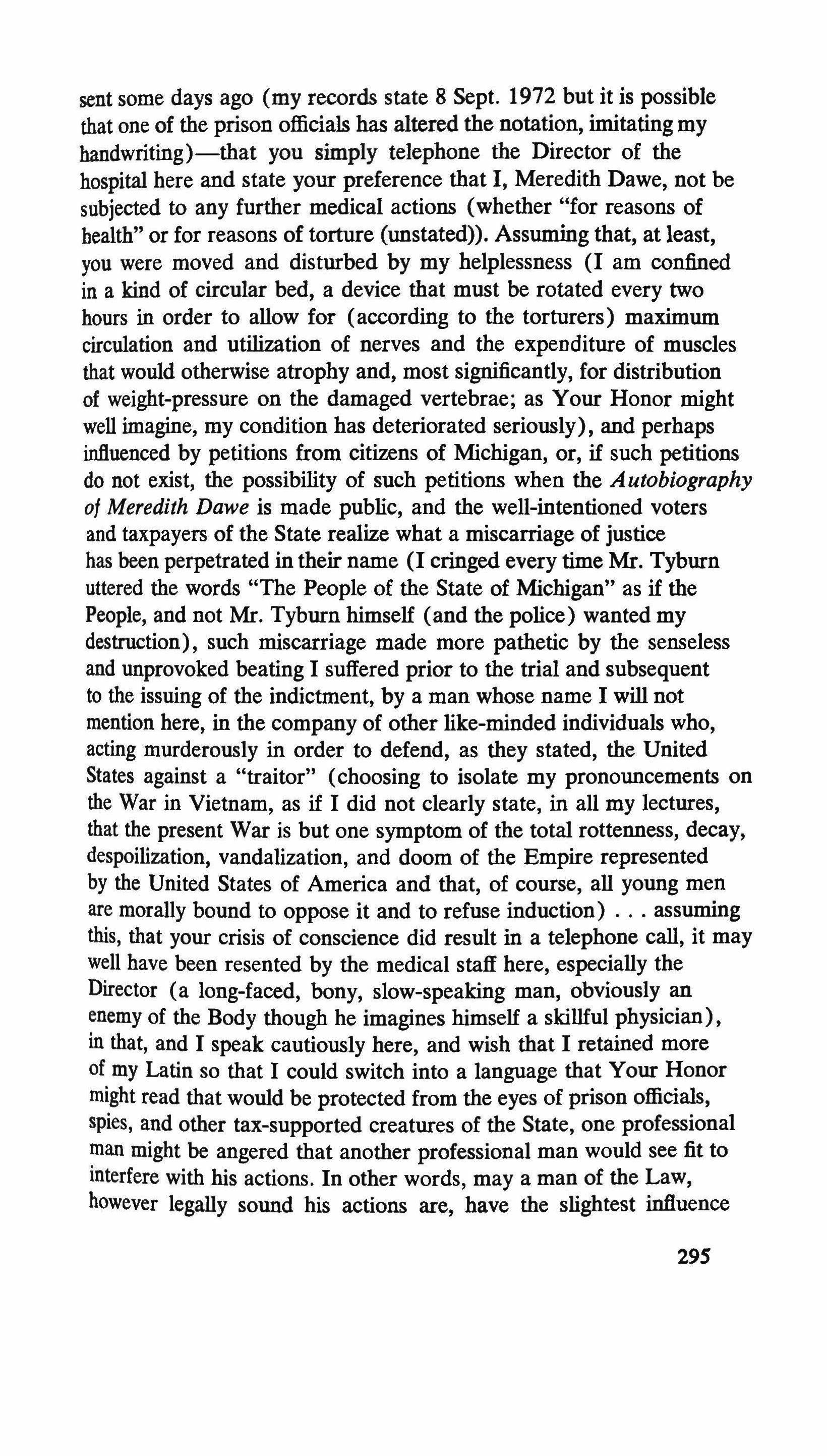
sent some days ago (my records state 8 Sept. 1972 but it is possible that one of the prison officials has altered the notation, imitating my handwriting)-that you simply telephone the Director of the hospital here and state your preference that I, Meredith Dawe, not be subjected to any further medical actions (whether "for reasons of bealth" or for reasons of torture (unstated». Assuming that, at least, you were moved and disturbed by my helplessness (I am confined in a kind of circular bed, a device that must be rotated every two hours in order to allow for (according to the torturers) maximum circulation and utilization of nerves and the expenditure of muscles that would otherwise atrophy and, most significantly, for distribution of weight-pressure on the damaged vertebrae; as Your Honor might well imagine, my condition has deteriorated seriously), and perhaps influenced by petitions from citizens of Michigan, or, if such petitions do not exist, the possibility of such petitions when the Autobiography of Meredith Dawe is made public, and the well-intentioned voters and taxpayers of the State realize what a miscarriage of justice has been perpetrated in their name (I cringed every time Mr. Tyburn uttered the words "The People of the State of Michigan" as if the People, and not Mr. Tyburn himself (and the police) wanted my destruction), such miscarriage made more pathetic by the senseless and unprovoked beating I suffered prior to the trial and subsequent to the issuing of the indictment, by a man whose name I will not mention here, in the company of other like-minded individuals who, acting murderously in order to defend, as they stated, the United States against a "traitor" (choosing to isolate my pronouncements on the War in Vietnam, as if I did not clearly state, in all my lectures, that the present War is but one symptom of the total rottenness, decay, despoilization, vandalization, and doom of the Empire represented by the United States of America and that, of course, all young men are morally bound to oppose it and to refuse induction) assuming this, that your crisis of conscience did result in a telephone call, it may well have been resented by the medical staff here, especially the Director (a long-faced, bony, slow-speaking man, obviously an enemy of the Body though he imagines himself a skillful physician), in that, and I speak cautiously here, and wish that I retained more of my Latin so that I could switch into a language that Your Honor might read that would be protected from the eyes of prison officials, spies, and other tax-supported creatures of the State, one professional man might be angered that another professional man would see fit to interfere with his actions. In other words, maya man of the Law, however legally sound his actions are, have the slightest influence
295
whatsoever over a man of Medicine? It occurred to me, Your Honor, almost as soon as I mailed that perhaps fateful letter, that I had made a blunder and that the very effectiveness of my arguments to You (urging you to intercede here in my behalf) would work against me The scalpel of the surgeon is perhaps more deadly than the sword of Justice.
Your Honor, the next morning they started on me again.
Your Honor, there is a paradox operating here: if you feel pain, you are dehumanized. If they do not allow you to feel pain (by way of drugs-medically-sanctioned non-pleasure drugs), you are dehumanized because you are not in control of yourself. Doped-up, drowsy, slow-moving and slow-thinking, a spiritual and physical cripple all this results from that beating, in which my entirely non-political lecture ("Light and Heavy Love") was interrupted by men somehow sworn to destroy me, but against whom I had no ill-wishes (refusing, as Your Honor must know, to press charges against them). If you telephoned the hospital and spoke to the Director, perhaps you antagonized him (secretly-he would not have hinted anything to you) and the result was, contrary to Your Honor's wishes, further neurological torture of me. I do not know.
Might I request that you undo the damage by another telephone call? Based upon the perhaps erroneous (but probably valid) assumption that you did call to forbid them their tortures, might you now call to say you have experienced a change of heart, and that further spinal examinations and even operations are permissible? This may have the anxiously-awaited effect of their reversing their procedure, and allowing me to return to my cell, my reading, and my preparation of the lengthy writ (now my main reason for existing) Your Honor, my very soul is in your trust.
Sincerely,
Meredith Dawe
Morning-Unnumbered Day

Your Honor:
I realize that You are not my father, since my father does physically exist (though he has not communicated with me since 1968, at which time he ordered me out of his home under threat of police
296
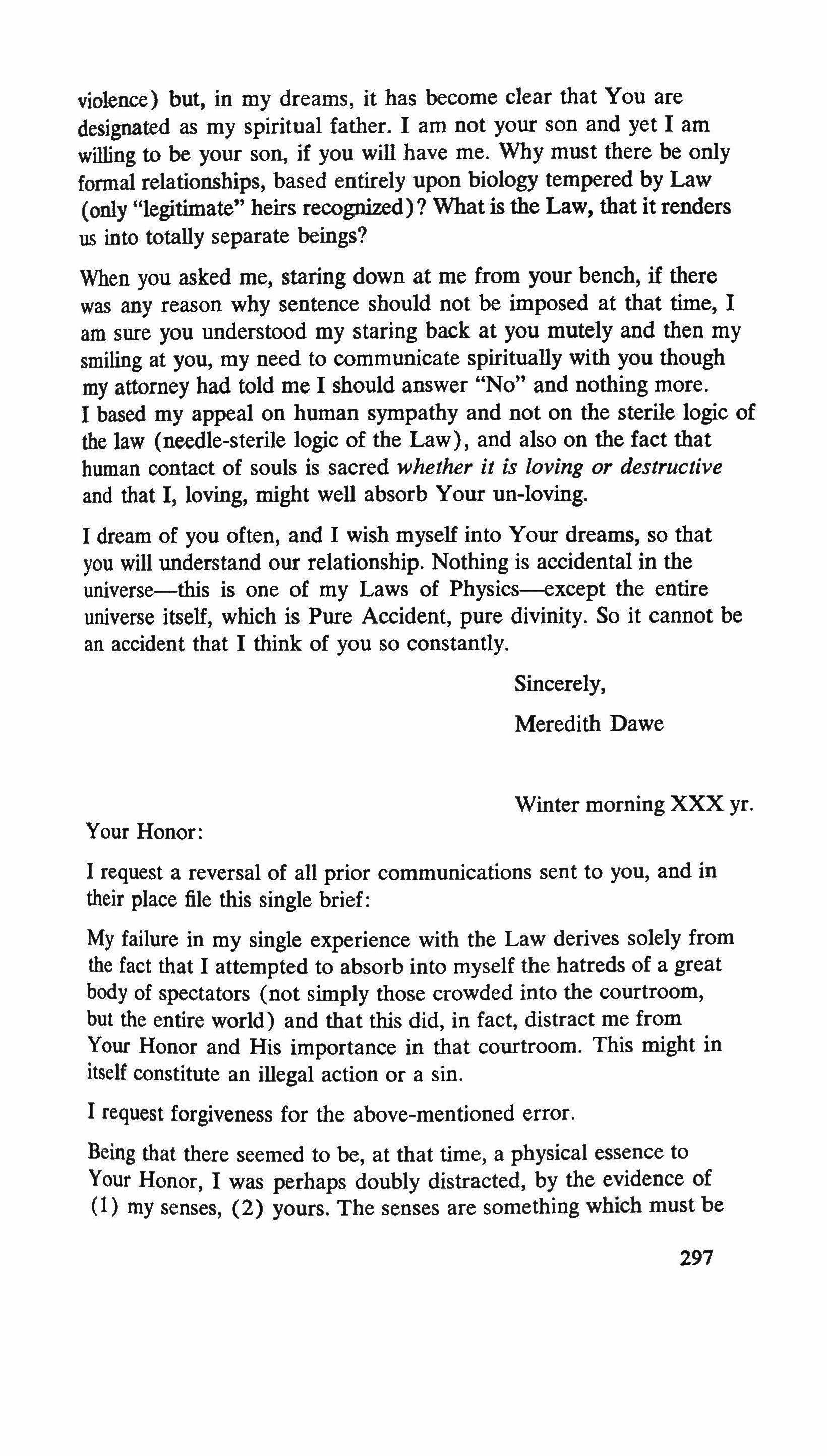
violence) but, in my dreams, it has become clear that You are designated as my spiritual father. I am not your son and yet I am willing to be your son, if you will have me. Why must there be only formal relationships, based entirely upon biology tempered by Law (only "legitimate" heirs recognized)? What is the Law, that it renders us into totally separate beings?
When you asked me, staring down at me from your bench, if there was any reason why sentence should not be imposed at that time, I am sure you understood my staring back at you mutely and then my smiling at you, my need to communicate spiritually with you though my attorney had told me I should answer "No" and nothing more. I based my appeal on human sympathy and not on the sterile logic of the law (needle-sterile logic of the Law), and also on the fact that human contact of souls is sacred whether it is loving or destructive and that I, loving, might well absorb Your un-loving.
I dream of you often, and I wish myself into Your dreams, so that you will understand our relationship. Nothing is accidental in the universe-this is one of my Laws of Physics--except the entire universe itself, which is Pure Accident, pure divinity. So it cannot be an accident that I think of you so constantly.
Sincerely,
Meredith Dawe
Winter morning XXX yr. Your Honor:
I request a reversal of all prior communications sent to you, and in their place file this single brief:
My failure in my single experience with the Law derives solely from the fact that I attempted to absorb into myself the hatreds of a great body of spectators (not simply those crowded into the courtroom, but the entire world) and that this did, in fact, distract me from Your Honor and His importance in that courtroom. This might in itself constitute an illegal action or a sin.
I request forgiveness for the above-mentioned error.
Being that there seemed to be, at that time, a physical essence to Your Honor, I was perhaps doubly distracted, by the evidence of (1) my senses, (2) yours. The senses are something which must be
297
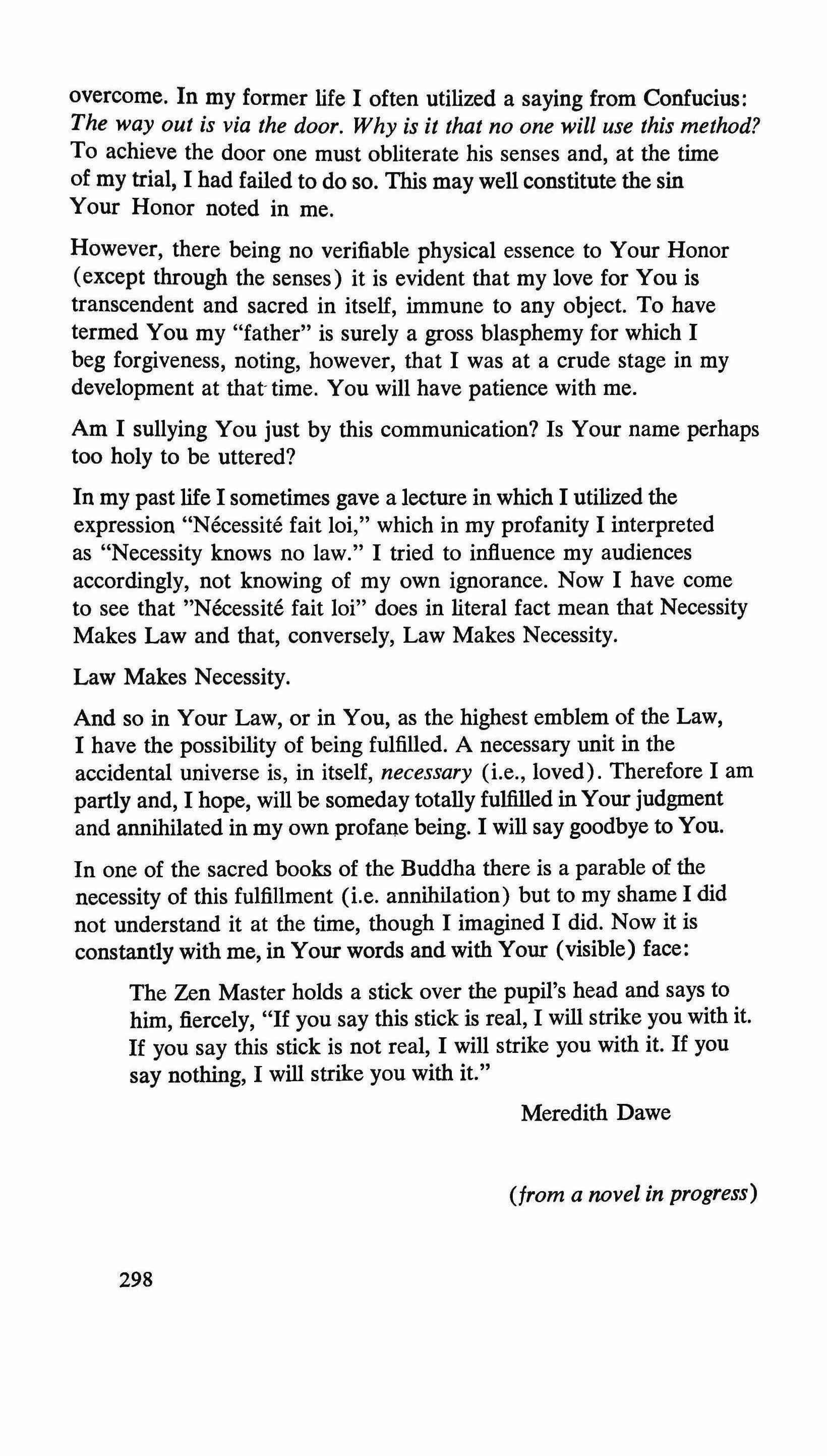
overcome. In my former life I often utilized a saying from Confucius: The way out is via the door. Why is it that no one will use this method? To achieve the door one must obliterate his senses and, at the time of my trial, I had failed to do so. This may well constitute the sin Your Honor noted in me.
However, there being no verifiable physical essence to Your Honor (except through the senses) it is evident that my love for You is transcendent and sacred in itself, immune to any object. To have termed You my "father" is surely a gross blasphemy for which I beg forgiveness, noting, however, that I was at a crude stage in my development at that- time. You will have patience with me.
Am I sullying You just by this communication? Is Your name perhaps too holy to be uttered?
In my past life I sometimes gave a lecture in which I utilized the expression "Necessite fait loi," which in my profanity I interpreted as "Necessity knows no law." I tried to influence my audiences accordingly, not knowing of my own ignorance. Now I have come to see that "Necessite fait Ioi" does in literal fact mean that Necessity Makes Law and that, conversely, Law Makes Necessity.
Law Makes Necessity.
And so in Your Law, or in You, as the highest emblem of the Law, I have the possibility of being fulfilled. A necessary unit in the accidental universe is, in itself, necessary (i.e., loved). Therefore I am partly and, I hope, will be someday totally fulfilled in Your judgment and annihilated in my own profane being. I will say goodbye to You.
In one of the sacred books of the Buddha there is a parable of the necessity of this fulfillment (i.e. annihilation) but to my shame I did not understand it at the time, though I imagined I did. Now it is constantly with me, in Your words and with Your (visible) face:
The Zen Master holds a stick over the pupil's head and says to him, fiercely, "If you say this stick is real, I will strike you with it. If you say this stick is not real, I will strike you with it. If you say nothing, I will strike you with it."
Meredith Dawe
(from a novel in progress)
298
Beginnings JERRY BUMPUS
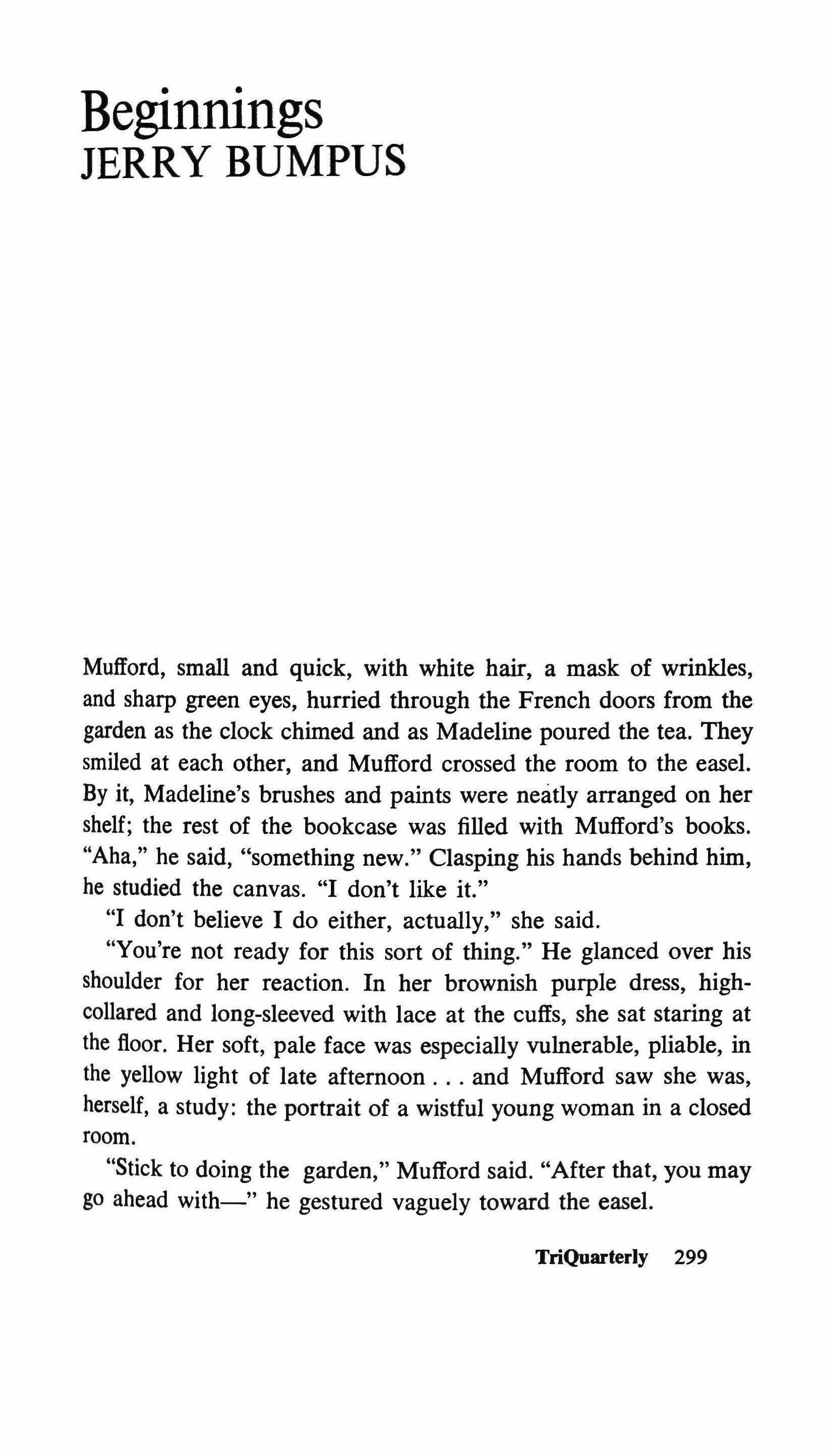
Mufford, small and quick, with white hair, a mask of wrinkles, and sharp green eyes, hurried through the French doors from the garden as the clock chimed and as Madeline poured the tea. They smiled at each other, and Mufford crossed the room to the easel.
By it, Madeline's brushes and paints were neatly arranged on her shelf; the rest of the bookcase was filled with Mufford's books. "Aha," he said, "something new." Clasping his hands behind him, he studied the canvas. "I don't like it."
"I don't believe I do either, actually," she said.
"You're not ready for this sort of thing." He glanced over his shoulder for her reaction. In her brownish purple dress, highcollared and long-sleeved with lace at the cuffs, she sat staring at the floor. Her soft, pale face was especially vulnerable, pliable, in the yellow light of late afternoon and Mufford saw she was, herself, a study: the portrait of a wistful young woman in a closed room.
"Stick to doing the garden," Mufford said. "After that, you may go ahead with-" he gestured vaguely toward the easel.
TriQuarterly 299
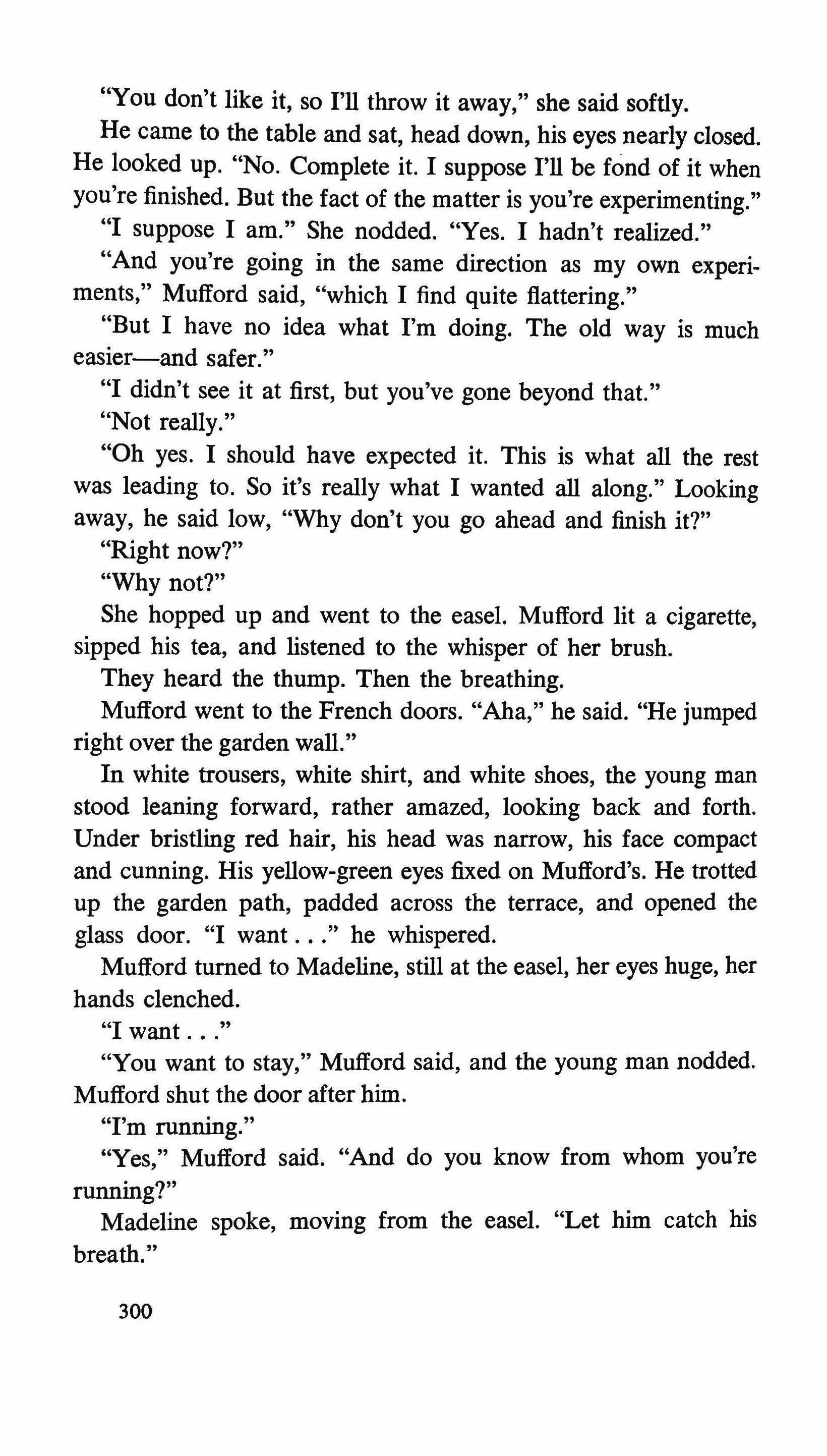
"You don't like it, so I'll throw it away," she said softly. He came to the table and sat, head down, his eyes nearly closed. He looked up. "No. Complete it. I suppose I'll be fond of it when you're finished. But the fact of the matter is you're experimenting."
"I suppose I am." She nodded. "Yes. I hadn't realized."
"And you're going in the same direction as my own experiments," Mufford said, "which I find quite flattering."
"But I have no idea what I'm doing. The old way is much easier-and safer."
"I didn't see it at first, but you've gone beyond that."
"Not really."
"Oh yes. I should have expected it. This is what all the rest was leading to. So it's really what I wanted all along." Looking away, he said low, "Why don't you go ahead and finish it?"
"Right now?"
"Why not?"
She hopped up and went to the easel. Mufford lit a cigarette, sipped his tea, and listened to the whisper of her brush.
They heard the thump. Then the breathing.
Mufford went to the French doors. "Aha," he said. "He jumped right over the garden wall."
In white trousers, white shirt, and white shoes, the young man stood leaning forward, rather amazed, looking back and forth. Under bristling red hair, his head was narrow, his face compact and cunning. His yellow-green eyes fixed on Mufford's. He trotted up the garden path, padded across the terrace, and opened the glass door. "I want he whispered.
Mufford turned to Madeline, still at the easel, her eyes huge, her hands clenched.
"I want
"You want to stay," Mufford said, and the young man nodded. Mufford shut the door after him.
"I'm running."
"Yes," Mufford said. "And do you know from whom you're running?"
Madeline spoke, moving from the easel. "Let him catch his breath."
300
The young man nodded. "Thanks," he said.
"Sit down." Mufford offered his place at the table.
The young man sprawled in the chair, his knees wide apart, his arms hanging outside the armrests. He breathed deeply, staring straight ahead. Pinned to his shirt was a plastic name tag-Teddy. He turned his head to Mufford: "I scared you when I walked right in like that." He laughed, his lips curling back from large teeth. "You should have seen your face. You sure were surprised." He laughed loudly. But then he sat straight. He looked back and forth between them. "But I don't always do things like that."
Mufford nodded. "I'm sure you don't. You're just excited. I suppose you're in trouble of some sort."
His eyes narrowed and he looked away. Mufford leaned forward: "Tell us, Teddy," he said low.
"You'll tum me in."
"You must trust us, as we trust you."
"The hospital."
Madeline said, "You poor thing. Are you ill?"
"I'm an orderly."
"You've stolen something," Mufford said Teddy shook his head. "No."
Madeline said, "You fought another young man-about a girl."
Teddy shook his head.
Mufford: "You failed to perform some duty, a doctor reprimanded you, and you struck him."
Teddy shook his head. "But you're getting warm."
The bell rang at the garden gate. Madeline and Teddy looked at Mufford who frowned and said, "That will be the police." Teddy slid from his chair and with a soft bump knelt before Mufford.
Again the bell rang.
Teddy ate three helpings of everything. At last he sat back from the table. "That was great," he said to Madeline.
Mufford offered him a cigarette. "Gee, thanks," he said, "but I don't smoke. It's not good for me."
"Tell us about yourself, Teddy," Mufford said.

301
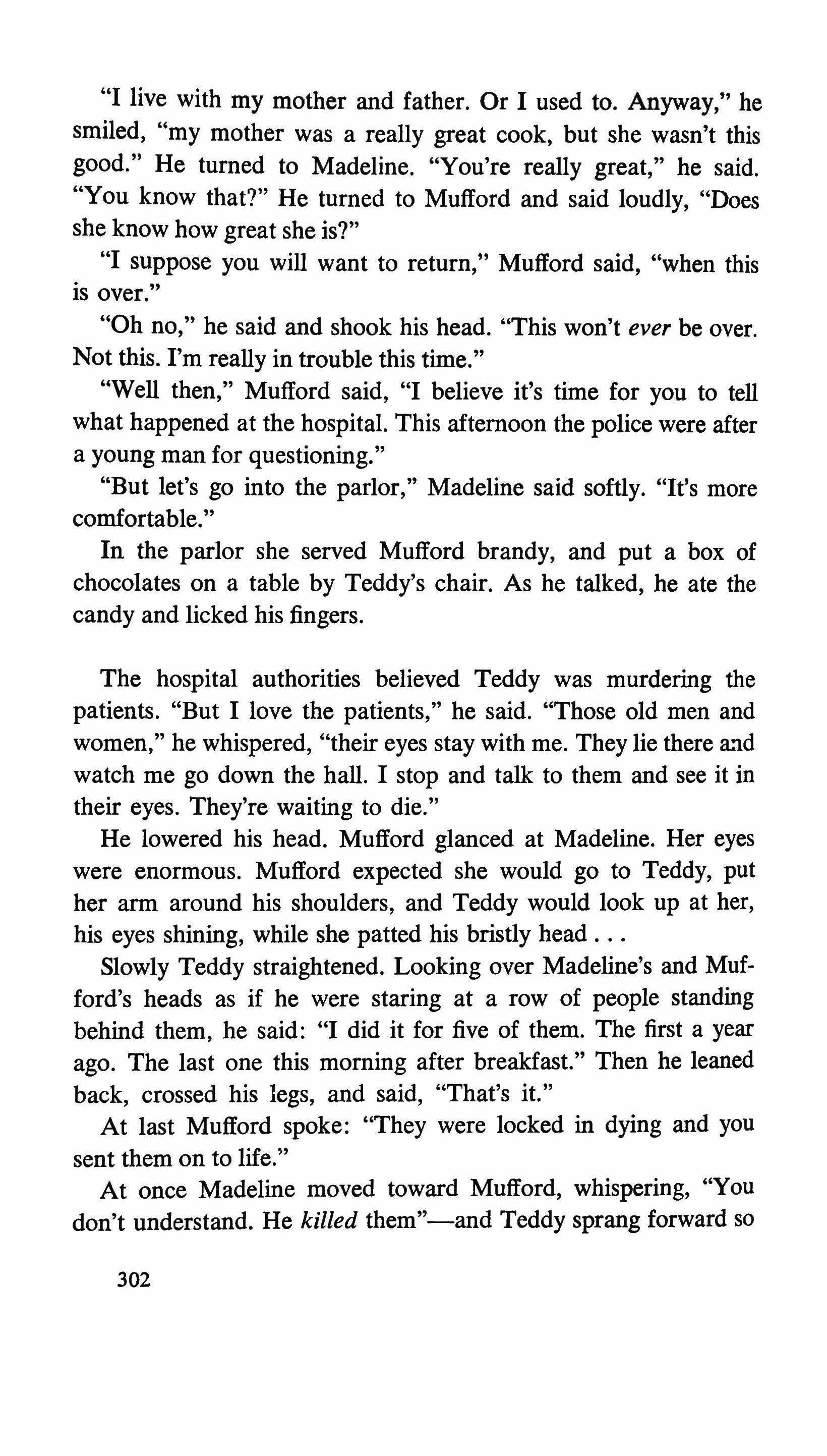
"1 live with my mother and father. Or I used to. Anyway," he smiled, "my mother was a really great cook, but she wasn't this good." He turned to Madeline. "You're really great," he said. "You know that?" He turned to Mufford and said loudly, "Does she know how great she is?"
"1 suppose you will want to return," Mufford said, "when this is over."
"Oh no," he said and shook his head. "This won't ever be over. Not this. I'm really in trouble this time."
"Well then," Mufford said, "I believe it's time for you to tell what happened at the hospital. This afternoon the police were after a young man for questioning."
"But let's go into the parlor," Madeline said softly. "It's more comfortable.
In the parlor she served Mufford brandy, and put a box of chocolates on a table by Teddy's chair. As he talked, he ate the candy and licked his fingers.
The hospital authorities believed Teddy was murdering the patients. "But I love the patients," he said. "Those old men and women," he whispered, "their eyes stay with me. They lie there and watch me go down the hall. I stop and talk to them and see it in their eyes. They're waiting to die."
He lowered his head. Mufford glanced at Madeline. Her eyes were enormous. Mufford expected she would go to Teddy, put her arm around his shoulders, and Teddy would look up at her, his eyes shining, while she patted his bristly head
Slowly Teddy straightened. Looking over Madeline's and Mufford's heads as if he were staring at a row of people standing behind them, he said: "I did it for five of them. The first a year ago. The last one this morning after breakfast." Then he leaned back, crossed his legs, and said, "That's it."
At last Mufford spoke: "They were locked in dying and you sent them on to life."
At once Madeline moved toward Mufford, whispering, "You don't understand. He killed them"-and Teddy sprang forward so
302

that suddenly the three of them were so close their faces almost touched, and Teddy answered Mufford, "Yes. Life. Sent them on to life."
Mornings after breakfast Teddy walked barefooted in the garden, wearing the dark silk shirt and pants Madeline made for him. One day he took with him a book of Mufford's. But when Mufford looked out his study window he saw Teddy had laid it down somewhere and was simply walking along, his hands at his sides, his eyes wide.
Madeline and Mufford had just finished eating. "But 1 feel he should have lunch," Madeline said.
"He doesn't want to miss the sun."
"It will always be there," she said. "Perhaps if 1 made a sandwich you would take it to him."
"Don't worry about him. We're taking very good care of him." Then Mufford looked about the room. "Where's your easel? Aren't you working on something?"
"No," she said. "Tired of it?"
"I am, yes. A little."
"A rest will do you good." "Perhaps."
They were silent. She would not look at him.
"How do you do that?" Teddy asked, surprising Mufford who hadn't heard him enter the hot, dark shed. Teddy wore his pants but no shirt. His brown shoulders and arms glistened with sweat. "What keeps it turning?" Teddy said.
"Under here." Teddy leaned down and looked under the wheel at the kick. Mufford showed how he turned the wheel while he shaped the clay with his hands. "Here. Try."
"No. I can't do things like that."
"Certainly you can."
"I'd rather watch you."
303
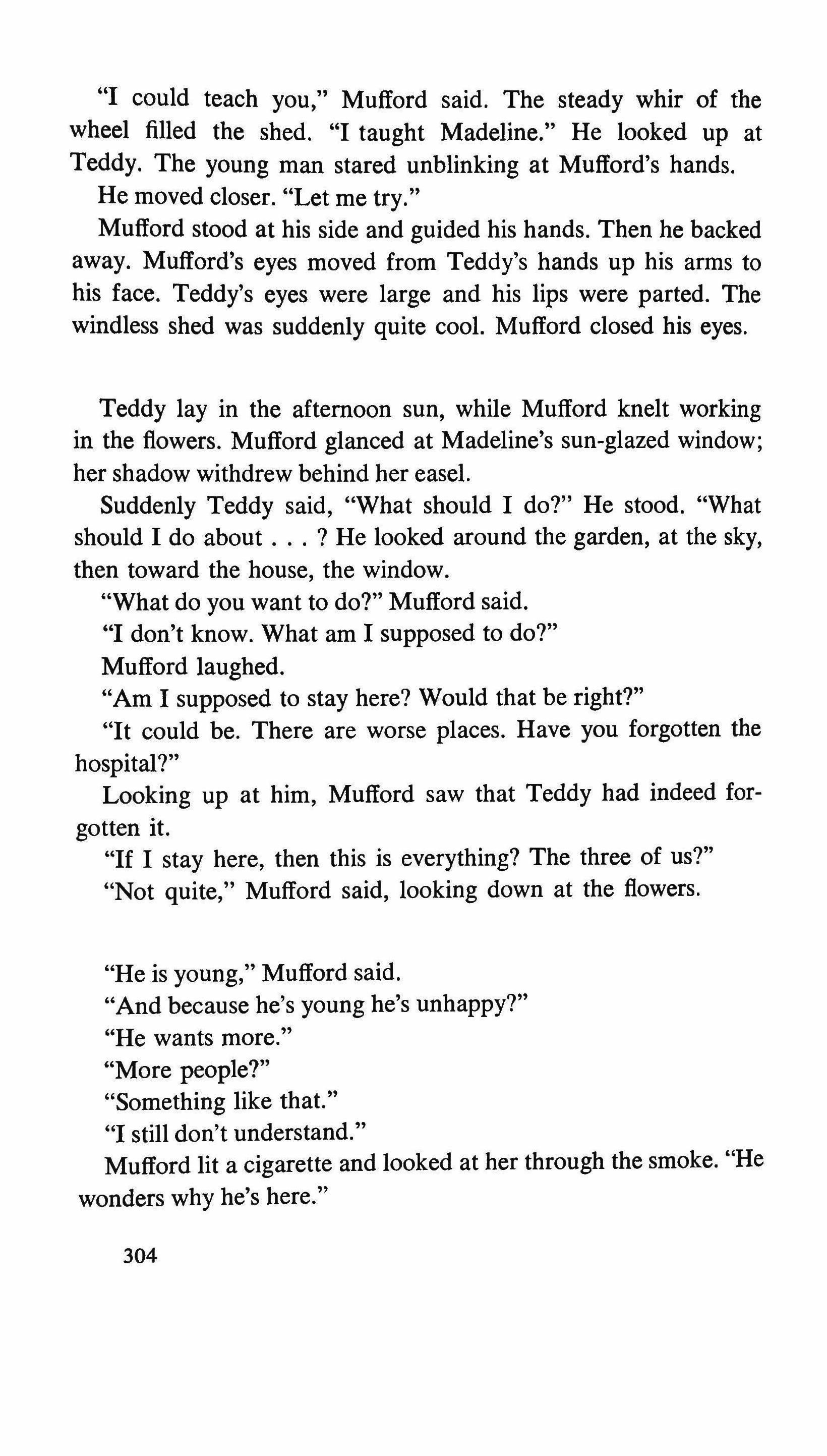
"I could teach you," Mufford said. The steady whir of the wheel filled the shed. "I taught Madeline." He looked up at Teddy. The young man stared unblinking at Mufford's hands. He moved closer. "Let me try."
Mufford stood at his side and guided his hands. Then he backed away. Mufford's eyes moved from Teddy's hands up his arms to his face. Teddy's eyes were large and his lips were parted. The windless shed was suddenly quite cool. Mufford closed his eyes.
Teddy lay in the afternoon sun, while Mufford knelt working in the flowers. Mufford glanced at Madeline's sun-glazed window; her shadow withdrew behind her easel.
Suddenly Teddy said, "What should 1 do?" He stood. "What should 1 do about ? He looked around the garden, at the sky, then toward the house, the window.
"What do you want to do?" Mufford said.
"I don't know. What am 1 supposed to do?"
Mufford laughed.
"Am 1 supposed to stay here? Would that be right?"
"It could be. There are worse places. Have you forgotten the hospital?"
Looking up at him, Mufford saw that Teddy had indeed forgotten it.
"If 1 stay here, then this is everything? The three of us?"
"Not quite," Mufford said, looking down at the flowers.
"He is young," Mufford said.
"And because he's young he's unhappy?"
"He wants more."
"More people?"
"Something like that."
"I still don't understand."
Mufford lit a cigarette and looked at her through the smoke. "He wonders why he's here."
304
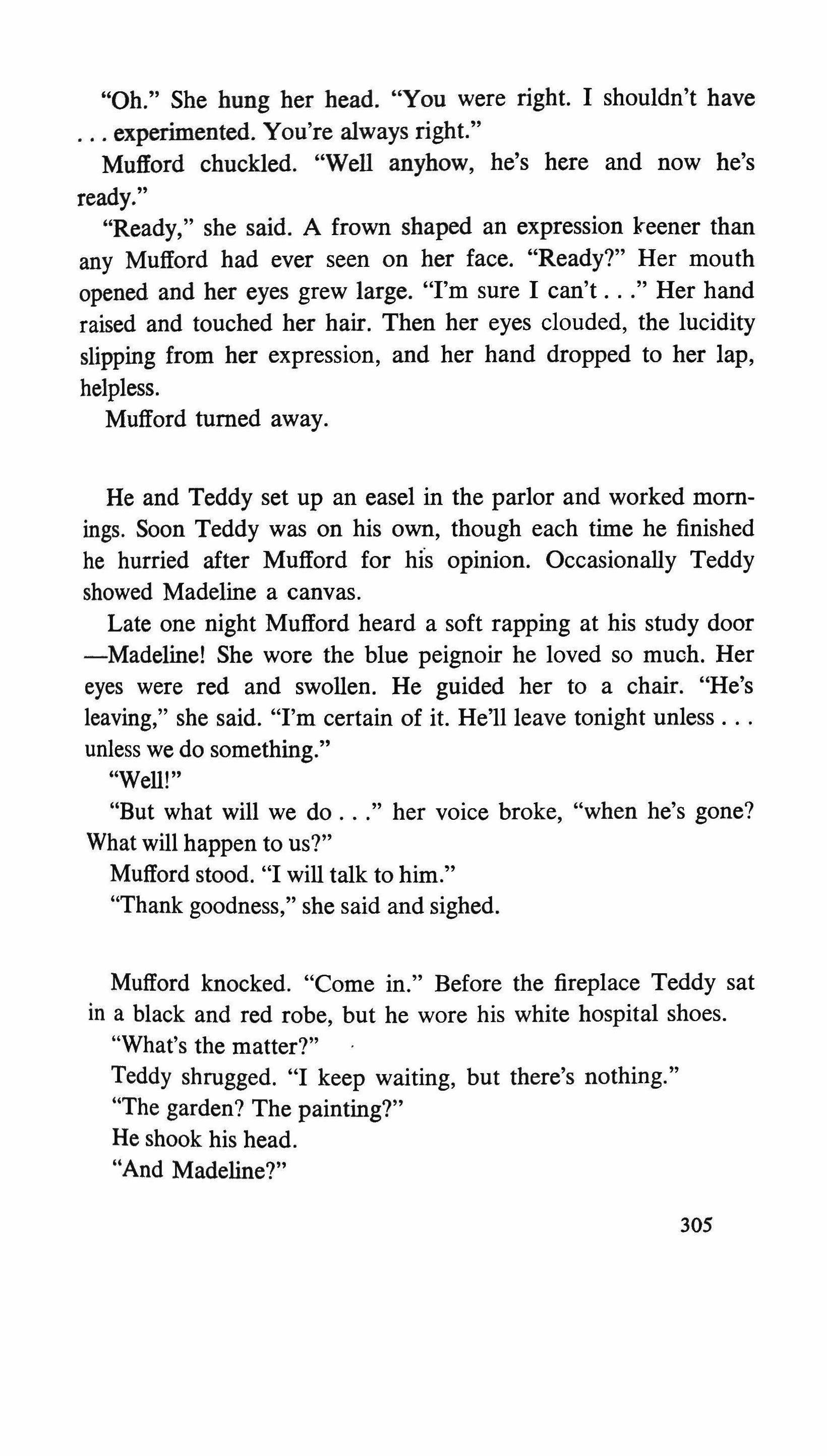
"Oh." She hung her head. "You were right. 1 shouldn't have experimented. You're always right."
Mufford chuckled. "Well anyhow, he's here and now he's ready."
"Ready," she said. A frown shaped an expression keener than any Mufford had ever seen on her face. "Ready?" Her mouth opened and her eyes grew large. "I'm sure 1 can't Her hand raised and touched her hair. Then her eyes clouded, the lucidity slipping from her expression, and her hand dropped to her lap, helpless.
Mufford turned away.
He and Teddy set up an easel in the parlor and worked mornings. Soon Teddy was on his own, though each time he finished he hurried after Mufford for his opinion. Occasionally Teddy showed Madeline a canvas.
Late one night Mufford heard a soft rapping at his study door -Madeline! She wore the blue peignoir he loved so much. Her eyes were red and swollen. He guided her to a chair. "He's leaving," she said. "I'm certain of it. He'll leave tonight unless unless we do something."
"Well!"
"But what will we do her voice broke, "when he's gone? What will happen to us?"
Mufford stood. "I will talk to him."
"Thank goodness," she said and sighed.
Mufford knocked. "Come in." Before the fireplace Teddy sat in a black and red robe, but he wore his white hospital shoes.
"What's the matter?"
Teddy shrugged. "I keep waiting, but there's nothing."
"The garden? The painting?"
He shook his head.
"And Madeline?"
305

He looked up at Mufford. "I love her. I really do. She is wonderful." Then he spoke loudly: "But she loves you. I don't know why I'm here. It's unfair." He looked up at Mufford. "I mean I can't do anything."
"You can paint." Teddy seemed not to hear. A silence hung between them. Then the silence opened like clouds cleaved by cold air.
Teddy jerked forward. He stared big eyed at Mufford. "What?" He stood and faced the old man. "I can't," Teddy said, his face tense, narrowed sharp as an ax blade.
"You are here," Mufford said.
"But you did Mufford shook his head.
Teddy stared at him. "Madeline?" Mufford nodded.
"Why didn't she tell me?"
"You were to find out for yourself."
"I'm stupid! Why am I so stupid!" Mufford laughed. "Because you've just begun."
"Will I ever know more? Will I ever know ?" Mufford waited, then: "I'm certain we can teach you." Teddy nodded slightly. He said low, "The two of you." "Yes."
"Now I understand."
"Not quite," Mufford said. "There's more."
They worked every day. When it rained-and Madeline and Teddy didn't paint, and when Mufford didn't work in the gardenthe three of them were together until Mufford retired to his study. Now and then he heard them laughing in the parlor.
On one of these dark days Teddy went out to the shed and spent the morning alone. Madeline and Mufford had sat down to lunch when Teddy came running across the terrace and banged open the French doors. "Stone," he shouted at Mufford. "I want stone. And things to cut. Big hammers. And those things that cut
306

"Chisels," Madeline said.
"Yes," Teddy said, eagerly turning to her. "Yes." He grabbed her hands. Then to Mufford, "You know. You both know." He jumped up and down, shaking the table, the room, the entire house.
He worked fast, devouring stone and crateloads of mallets and chisels, and Mufford was at his side. But with the speed of urgency Teddy learned to see into the stone.
One morning Mufford was working in his study. He stared out the window, hearing from the shed the tapping of the mallet. Then Teddy screamed.
Mufford sprang from his desk and ran through the house. He met Madeline in the parlor-"Stay in," he yelled. "Go to my study and lock the door."
"But you " she called.
He was already outside and running through the garden.
The shed was dark. Then he saw the shaft of sun coming through the skylight he and Teddy had cut in the roof: in the large cube of light stood a figure half-emerged from stone. Mufford glanced at it, and turned, looking for Teddy.
He was against the wall across the room, his mallet in one hand, a chisel in the other.
Madeline waited at the window of her room. Then Mufford and Teddy came from the shed. Mufford lit a cigarette and spoke. Teddy laughed and Mufford smiled slyly. When Mufford came inside, he smiled at Madeline and didn't say a word.
The next morning Mufford was in the shed with Teddy, but Madeline didn't hear the tapping of the mallet. All afternoon Mufford and Teddy sat in the garden. Mufford smoked and talked, while Teddy leaned toward him, listening.
On the second morning the men again sat in the garden, but While Madeline watched, they stood and started for the shed. They stopped at the door, Mufford spoke, gesturing with both hands; then he turned away, and Teddy went into the shed.
307

Mufford went down into the cellar and soon came up wearing his work clothes and carrying his garden tools. He walked down the path and disappeared into the garden.
Madeline turned to the shed and waited. She held her breath and as if from inside her came the steady chipping of stone.
At dinner Teddy said nothing. And Mufford, preoccupied and unusually nervous, left the table early. Madeline tried to make conversation with Teddy, but gave up. They sat in silence. Then Madeline blurted out, "Will she T" but stopped herself. "What?" Teddy said.
Not trusting herself to speak, she shook her head and hurried from the room.
The next morning the chipping in the shed floated on the still air, and as Madeline waited the sound became the sun and the sky, the simultaneous wearing away and beginning. She leaned against the window and stared down into the garden.
The following day the three of them ate breakfast without speaking. Then Teddy asked Mufford for some cigarettes. They stared at him. "Why, Teddy," Madeline said, "I didn't think you cared for cigarettes."
"Here," Mufford said hoarsely and pushed a pack across the table. Teddy put them in his shirt pocket. Then he took one out, asked Mufford for matches, and lit it. Mufford and Madeline watched him puff away. "It's not polite to stare," Teddy said. "Indeed," Mufford said and rose from the table. Madeline also rose and went about her work.
But she found herself again at her window. Below, Mufford paced back and forth across the terrace. Then he turned and went off into the garden.
Madeline watched the shed, listening to the chipping.
It stopped. The air trembled with silence. "No," she whispered, her heart racing. "Where is he ?" She searched the garden for Mufford. He was nowhere in sight.
308
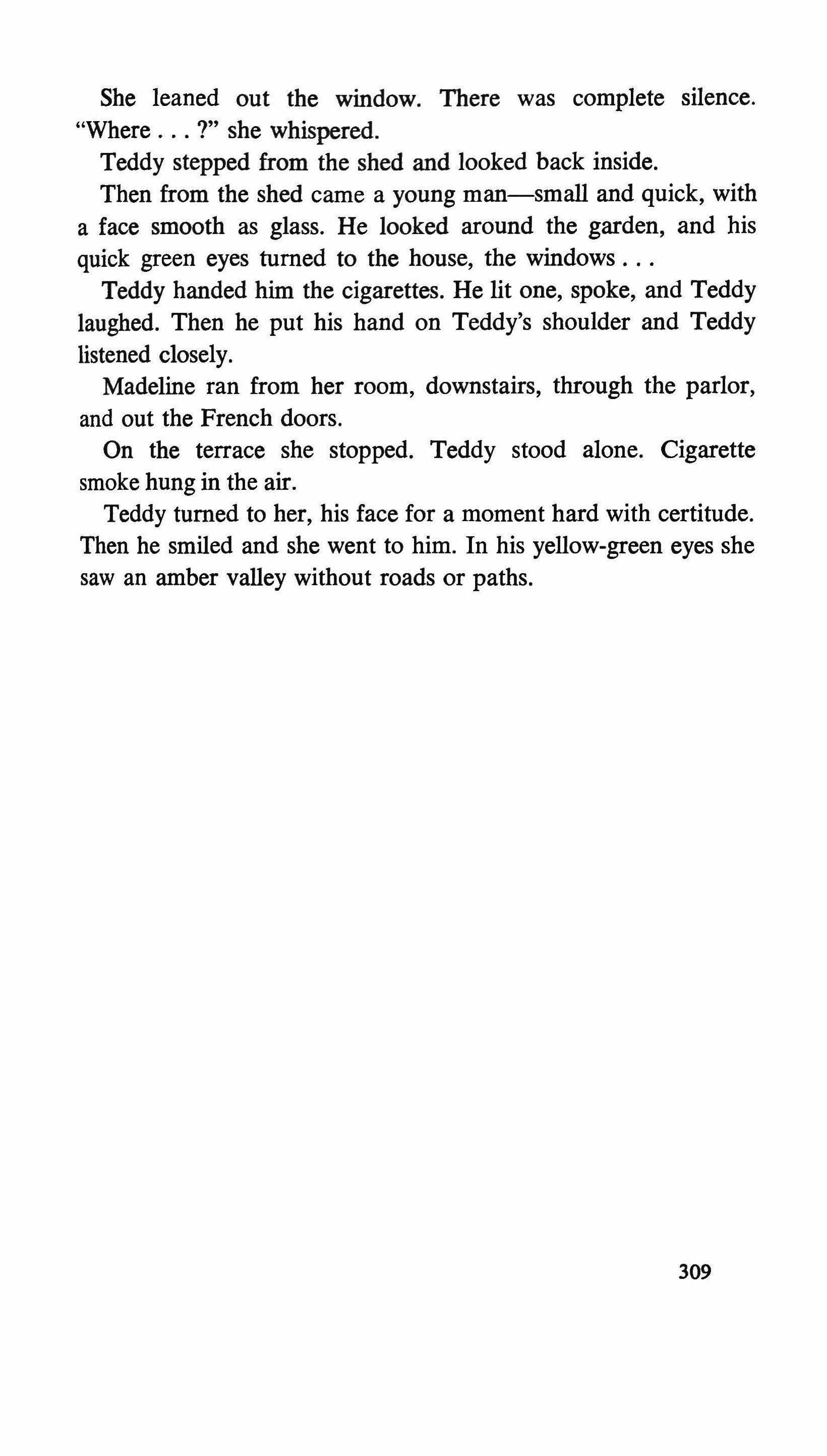
She leaned out the window. There was complete silence. "Wh ?" h his ed ere sew per Teddy stepped from the shed and looked back inside.
Then from the shed came a young man-small and quick, with a face smooth as glass. He looked around the garden, and his quick green eyes turned to the house, the windows Teddy handed him the cigarettes. He lit one, spoke, and Teddy laughed. Then he put his hand on Teddy's shoulder and Teddy listened closely.
Madeline ran from her room, downstairs, through the parlor, and out the French doors.
On the terrace she stopped. Teddy stood alone. Cigarette smoke hung in the air.
Teddy turned to her, his face for a moment hard with certitude. Then he smiled and she went to him. In his yellow-green eyes she saw an amber valley without roads or paths.
309
The children RUSSELL EDSON

Characters: Mother, Father and their children, a Daughter and Son. The children are in their sixties. The parents are in their eighties. Children and parents seem of an age.
They are discovered sitting in a shabby, comfortable, old-fashioned living room. Father is reading a newspaper. The son sits resting his hands and chin on the head of his cane. The daughter is working on an embroidery.
MOTHER: Look at our fine children, both accomplished at sitting pleasantly in a room. Look at daughter, how her grey hair complements the wallpaper, how it blends so lovely with the evening paper.-And our son; I worried when his hair started to fall out. I thought it would look too stark. But look how his bald head seems to sing with virility. It breaks a mother's heart to see such a virile boy-I should hide him from the girls.
FATHER: Yes, mother, I think we did a pretty good job with the children, they're really turning out fine. I hope they remember to thank us one day. (To daughter) Now really, daughter, aren't you glad we broke up that childish infatuation you were carrying
310 TriQuarterly

on thirty years ago? Why, you might have married that young fool.
DAUGHTER: Yes, father, I have always been grateful to you.
FATHER: And you, son, remember how I saved you from that silly girl you almost married?
SON: Oh yes, father, it was sheer youthful folly on my part. lowe my present good life to you and mother.
MOTHER: Certainly, children; you've plenty of time. Let the others rush into marriage.
DAUGHTER: I have my embroidery, which is as much these days as I feel I can handle.
FATHER: I think your home sweet home is really beautiful.
MOTHER: The home is where the heart is I think is equally beautiful, if not more so.
FATHER: And you, son, how do you occupy your days?
SON: Well, sometimes I walk in the park. Sometimes I just stand in the sunlight, leaning on my cane--a before-dinner nap I manage quite nicely
MOTHER: Just look at daughter's lovely grey hair. Look how it seems part of the wallpaper. Her hair just does something for this room. I always think of mother when I look at daughter, she was a beautiful old lady. Look how daughter's grey dress, her face, her grey hair just seem to be part of the wallpaper
FATHER: (To daughter) Yes, dear, I must compliment you on the way you just seem part of the furnishings. Some people seem just too vivid, they fairly sparkle. One's attention is drawn to them, and it's very annoying when one is trying to read the newspaper. Sometimes, my dear, I'm not even aware you're in the. room
SON: Yes, sister, you look very shabby, like everything else in this room. You look like mother's mother; and I suppose I look like father's father. (To parents) These compliments are sickening. What consolation is it to us to hear over and over again how shabby we are. I've had none of the joys that are the true consolation of old age. I'm not complaining, only it's difficult enough to bear without your constant praise; those constant compliments that only serve to point at what they thinly disguise. Look at sister, she's on her sixty-third home is where the heart is
311

MOTHER: No no, dear, you're wrong
SON: Of course I'm wrong
MOTHER: No; I mean you're wrong because you're young. Young people with their impatience are apt to make harsh judgments
SON: I'm not a young person. I'm proportionately closer to your and father's age than I am to a young person. Can't you see that by constantly referring to me as a young person you force me to remember that I'm not a young person. I don't even have the dreams of a young man.
FATHER: Balderdash!-Why, when I was your age
SON: Your son and daughter were already middle-aged.
FATHER: Well, yes Yes, but only because I dashed into marriage when I was young and foolish. Sure, it turned out all right But supposing it hadn't?
SON: It still would have been right. It's what men and women are supposed to do. We're not born only to get old
FATHER: I think that's pretty insulting; and I think you're playing pretty loose with your mother's and my happiness; implying that the beautiful life that your mother and I have enjoyed has no value
SON: No no, I mean Of course, it is of the greatest value. But I mean that a bad marriage is better than no marriage I have never been with a woman. I can remember nothing of women except my mother's kisses
FATHER: I think that's barroom talk. I think that's dirty and unworthy of our home.
DAUGHTER: Please don't argue, please; I've stuck my finger with the needle, and I've spoilt the embroidery with blood.
SON : You'll do another.
MOTHER: How can you say that? Each one is different, and more beautiful than the last And her beautiful grey hair Our lovely home Why do you want to shout? Are we so old that we can't hear you perfectly well when you speak in the cultured way you were brought up to speak?
DAUGHTER: No no, it's ruined. I'll have to start again.
FATHER: Oh dear, too bad (To son) Please, let's not argue, 312

we only ruin daughter's work. (To daughter) And you know, I think one day your embroideries will be considered real works of art. Yes, I really do think so (Daughter begins to sob) Now now, don't feel bad, many artists have had one of their works spoilt, but they did others You know, I think your embroidery is even better than mother's
MOTHER: Well, what do you want? I've never had time to sit down long enough I mean raising the children. Times weren't too easy in those days. It was fun, yes, it was; saving to buy a bedspread, or to buy you that new suit. Remember, dear, how we saved? I'd cheat on the meat loaf, and put in a little more bread than the recipe called for Oh yes, those were good days But learning to embroider as beautifully as daughter, I guess not.
FATHER: (To daughter; she is still sobbing) Don't cry, dear, mother doesn't mean those were hard times. Really, they weren't. We had you children. Really, those were good days. Your mother and I would sit in the evening, after you children were in bed; and sometimes we'd talk until morning. I didn't seem to get as tired then. We'd have breakfast together before you children were up, and I'd go to the office and do a whole day's work without a yawn. When you're young you don't know what tired is These days I welcome the bed
MOTHER: (To son) You know, dear, I just noticed, you look very much like that painter Toulouse-Lautrec
SON: He was ugly! But he had a face. He did something with his life.
MOTHER: No, not him You look like George Washington. Yes you do! Very distinguished. (To father) Doesn't he look like George Washington?
FATHER: There is something similar. The bald head with the grey hair. Yes, I see what you mean
SON: Oh, what is this? So I look like a bald-headed man. I am bald!
FATHER: Oh, don't be such a sourpuss.
MOTHER: (To son) You do seem awfully irritable lately, dear. Perhaps you need a physic. Maybe you have a temperature. Let me feel your head.
313
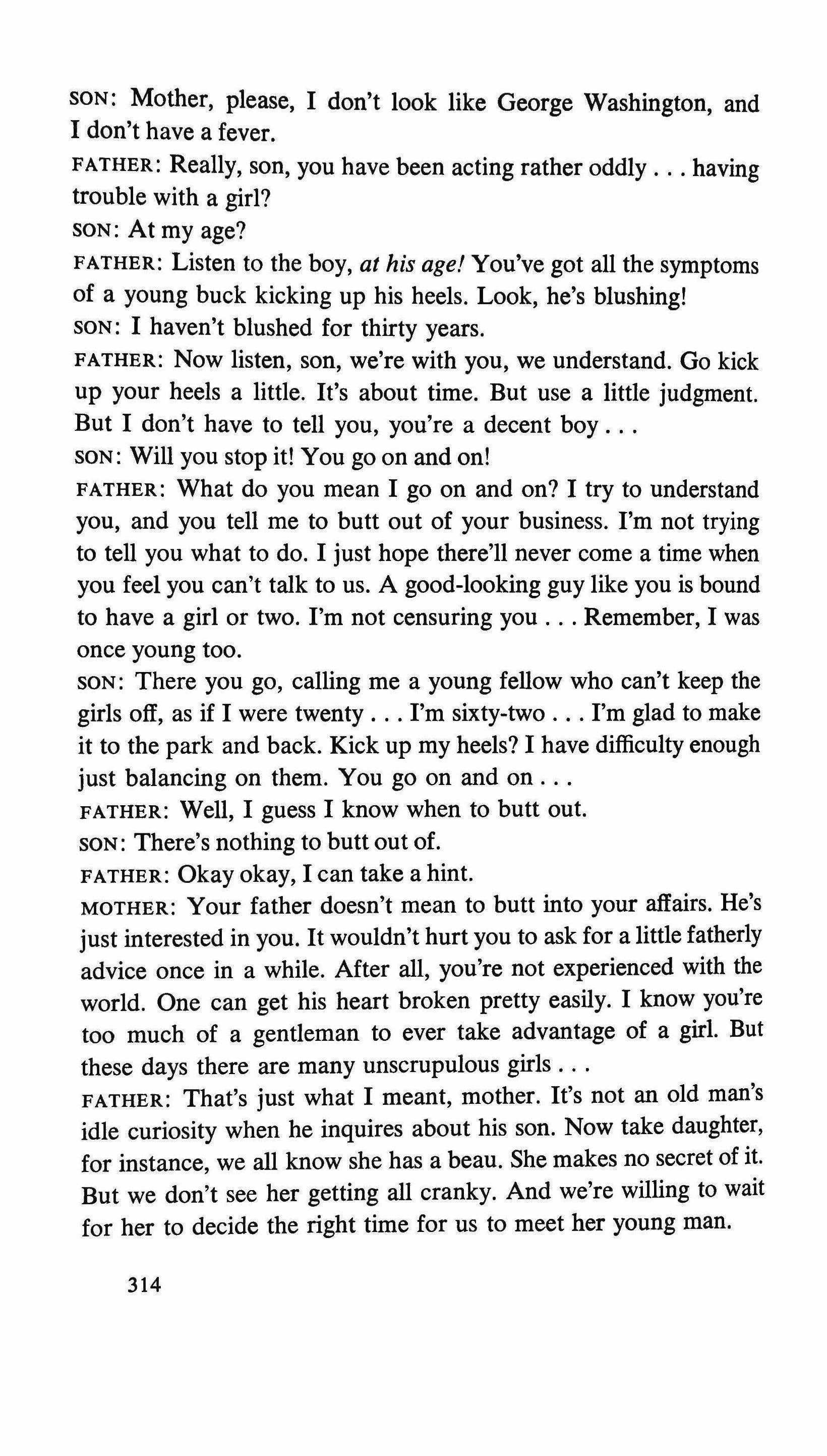
SON: Mother, please, I don't look like George Washington, and I don't have a fever.
FATHER: Really, son, you have been acting rather oddly having trouble with a girl?
SON: At my age?
FATHER: Listen to the boy, at his age! You've got all the symptoms of a young buck kicking up his heels. Look, he's blushing!
SON: I haven't blushed for thirty years.
FATHER: Now listen, son, we're with you, we understand. Go kick up your heels a little. It's about time. But use a little judgment. But I don't have to tell you, you're a decent boy
SON: Will you stop it! You go on and on!
FATHER: What do you mean I go on and on? I try to understand you, and you tell me to butt out of your business. I'm not trying to tell you what to do. I just hope there'll never come a time when you feel you can't talk to us. A good-looking guy like you is bound to have a girl or two. I'm not censuring yOU Remember, I was once young too.
SON: There you go, calling me a young fellow who can't keep the girls off, as if I were twenty I'm sixty-two I'm glad to make it to the park and back. Kick up my heels? I have difficulty enough just balancing on them. You go on and on
FATHER: Well, I guess I know when to butt out.
SON: There's nothing to butt out of.
FATHER: Okay okay, I can take a hint.
MOTHER: Your father doesn't mean to butt into your affairs. He's just interested in you. It wouldn't hurt you to ask for a little fatherly advice once in a while. After all, you're not experienced with the world. One can get his heart broken pretty easily. I know you're too much of a gentleman to ever take advantage of a girl. But these days there are many unscrupulous girls
FATHER: That's just what I meant, mother. It's not an old man's idle curiosity when he inquires about his son. Now take daughter, for instance, we all know she has a beau. She makes no secret of it. But we don't see her getting all cranky. And we're willing to wait for her to decide the right time for us to meet her young man.
314

SON: Sister is an old spinster. No man has looked at her for thirty years. She never leaves the house. What are you talking about?
FATHER: Do you mean to say that a beautiful girl like your sister has no suitors? Really, you are too selfish with your opinion. You're so busy looking after your own love-life that you haven't time to notice your sister. Why, just the other day I saw a blond young man passing the house. I saw the way he looked at the house, it was unmistakable
SON: A blond young man? Look at sister, she's likely old enough to be his grandmother.
MOTHER: How can you say such a thing? Does your sister tease you about being overweight? About being so fat that you can barely get upstairs? Why, your father can negotiate the stairs better than you.
FATHER: (To son) Well, I think your remarks are pretty rotten, I really do You know how sensitive women are about their ages Not that your sister needs to be. Why, she's just reached her womanly prime.
MOTHER: I think somebody ought to go to his room, and stay there until he has something pleasant to say.
(Son leaves. Is heard climbing stairs off stage.)
MOTHER: (To daughter) Dear, sit with us. Your father and I want you near us.
FATHER: Yes, come sit with us.
(Daughter sits between parents on couch.)
MOTHER: I love the way you're wearing your hair. (Daughter's hair is worn with severity of typical spinster. She touches her hair and shyly looks away.)
FATHER: Yes, dear, you look very sweet. It makes a father proud.
MOTHER: And that dress, it looks just lovely. (Dress is grey and out of fashion.) I don't think I've seen it before
DAUGHTER: I have two others like it.
MOTHER: Really? Then the lace collar is new
DAUGHTER: No, it came with the dress.
MOTHER: Well then, it's your hair, that makes all the difference.
FATHER: Did you hear the way your brother gave it to us? He's a 315

real rascal, that boy. Wait'll he finds the right girl, it'll make all the difference. He's got good stuff in him
DAUGHTER: Father I
FATHER: I know, you want me to meet your young man.
DAUGHTER: I
FATHER: It's perfectly natural. In the spring the boy bird and the girl bird built a nest. Bring him around anytime, and I'll be more than glad to discuss his financial position, his family, and all his other credentials. Don't worry, dear, I'm not an old-fashioned father type. I know what it is to be young and in love
DAUGHTER: But
FATHER: He hasn't made his pot of gold yet. Okay, there's time. Listen, dear, a poor boy can go just as far as a rich boy. The big thing is ambition. Without that, I don't care how much money you have. What good is it? No sirree, the man on his way is the man I take my hat off to. No no, you're right to choose a poor boy with plenty of drive. Well, I never did worry about you when it came to marriage. A girl with your looks doesn't have to wait long. And she can make her own choice. She has plenty to choose from. A lot of girls have to take what they can get, and are damn lucky to get that So, if by some odd luck I don't think he's right for you, you mustn't worry, there're plenty of others
MOTHER: Oh, men, they go on about things that only women understand. (To father) I think you had better let me talk to our young lady. Why don't you see what the boy is doing. Maybe a father and son talk would do him some good.
FATHER: (Gets up) Yes, dear. (Squeezes daughter's hand, kisses her on her head, and leaves. Heard off stage climbing stairs with more energy than son.)
MOTHER: You know, dear, you ought really to start thinking seriously about marriage. Of course you're not that old, but a girl should look ahead a little. Life is not all roses and moonbeams.
DAUGHTER: But, mother (Starts to cry)
MOTHER: I know it's difficult to grow up To be frank, you can no longer afford these idle flirtations. Time is life. Life must be lived in the time allotted to it. There's the raising of children; living to see one's grandchildren. You play too long. The roses fade.
316

What one took in youth as value fades with youth. There is nothing wrong with comfort. As you get older you will see that comfort is the true value. As you get older it becomes harder and harder to be comfortable. The flesh is full of hurts that age brings out.
DAUGHTER: Mother (Shakes head, crying) Mother
MOTHER: Lately, dear, you have developed the rather unattractive habit of crying. Men run away from women who cry. It is useful sometimes for winning a point. But the instrument is dulled by constant use. As to the original point of our discussion, your father will listen to me as to the proper husband for you As to the young man
DAUGHTER: There is no young man.
MOTHER: Oh come, dear, I'm your mother. I hope there won't be any secrets between us.
DAUGHTER: There is no one.
MOTHER: No one at all?
DAUGHTER: Not for years and years and years
MOTHER: What are you saying?
(Daughter heavily weeping)
MOTHER: Oh stop that unattractive crying. Nothing makes a woman seem so disgusting as constant sniffling.
DAUGHTER: Please, I can't talk anymore, please
MOTHER: Can't talk? Time is running out, my dear. Life is choice; one must choose, and then act
DAUGHTER: Mother
MOTHER: You must understand the intimacies demanded of a woman The courtship is sweet, the marriage bitter. One does not ask to be born. No, my dear, one is awakened, as it were, from the vast dreamless sleep of the universe, and particularized into hope and fear. Childhood seems endless. But time is swift. The little girl is the woman. Modesty, sensitivity are put by for function. One surveys life, its repetitions, its injustices. One must decide in favor of gathering. Yes, my dear, many starve that the few may have privilege. It is the law, written in the stars, that energy, only energy, shall be rewarded. That the weak must feed the strong. One decides to be strong. One asks now to be born. One chooses to be in life. To gather all the good things that life can offer The
317

woman is born with a sensitivity that seeks quietness, gentleness. This is how she loses against the aggressiveness that is the man. The secret of successful womanhood is that the woman secretly becomes a man. Manhood is the secret of the universe. Because men are born men they neglect this study. And this is our advantage. Your father, unbeknownst to him, takes a man to bed with him. You are of an age that this secret should be yours. Do not blush, my awkward girl. This, that is between the man and the woman, is the woman's first power, and the loss of the man's. They climb upon the woman as joyful conquerors. But, the woman is like a vast country, she can absorb these insults upon her modesty. She can absorb the very conqueror. Outlast him. Womanize him. The woman in her age grows strong, the man grows weak. Time is with the woman. Women love their sons because they see them before their proudness, in their natural weakness. We pity, and that is love. Women despise their daughters because they despise themselves. But it comes to be the time when the king must pass the secret of the power to his son: The chain of the sisterhood continues. Daughters and mothers are equals, and therefore rivals. The universe entrusts to our keeping the city of man. You are blessed with beauty and a flair for clothes. These are tools, my dear, not graces. These are teeth and claws
DAUGHTER: No, mother, no (Weeping)
MOTHER: No what!
DAUGHTER: The paradox is impossible with me, I'm not even a woman.
MOTHER: You were born a woman. You have no choice, you little fool.
DAUGHTER: I was born with something to fill. I have neglected to become anything. I am a feminine thing without a person.
MOTHER: You are a person. A female person. My daughter
DAUGHTER: (Stops crying; very soberly) No. I am a member of a household of old people. I am a furniture At first I was only afraid, I was young then. I stood naked before a mirror and looked at the woman I had become, with confusion and panic. The window behind me showed a bough of blossoms. I stood a long time looking at my breasts and thighs, like a little girl looking at a
318
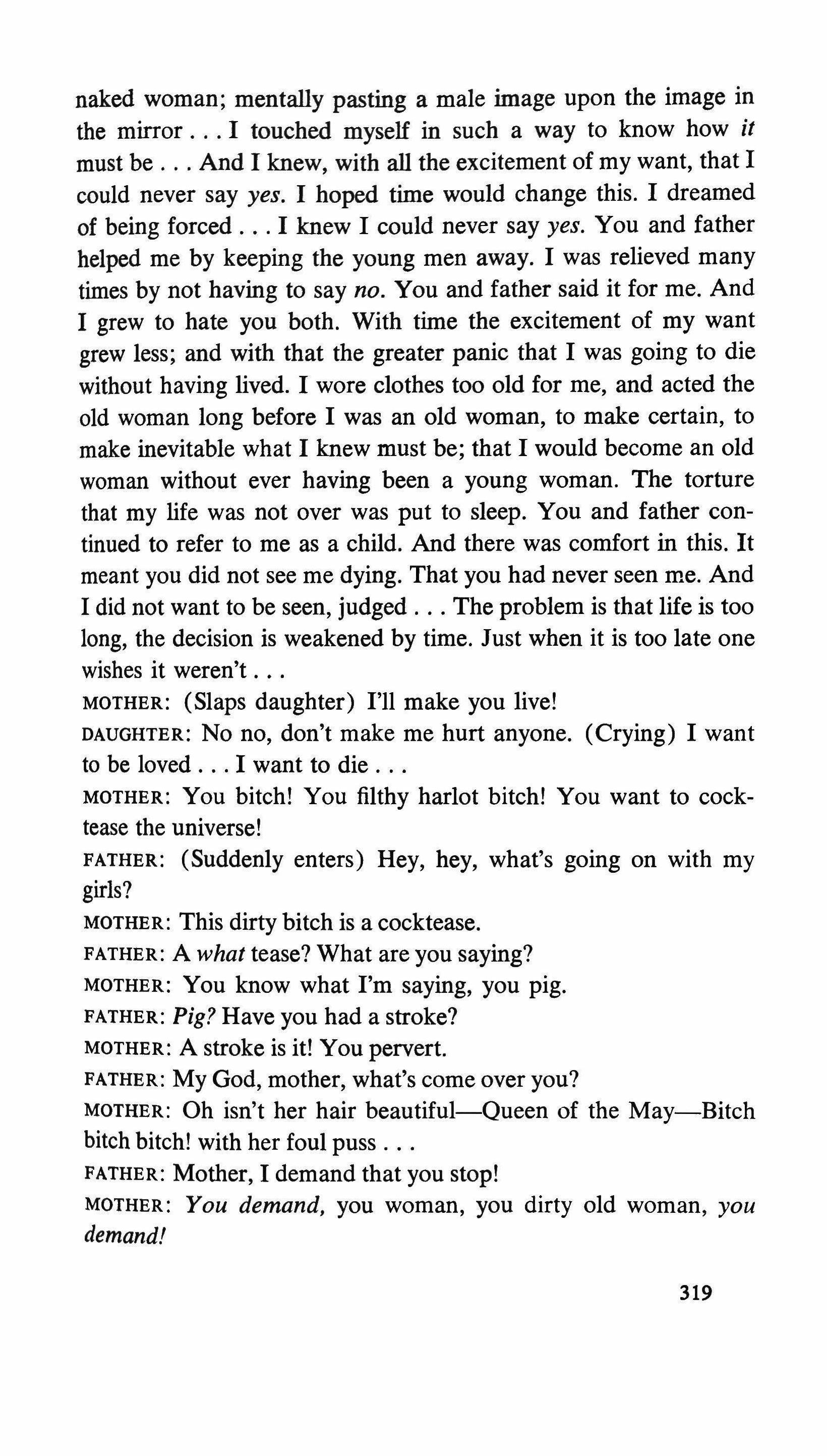
naked woman; mentally pasting a male image upon the image in the mirror I touched myself in such a way to know how it must be And I knew, with all the excitement of my want, that I could never say yes. I hoped time would change this. I dreamed of being forced I knew I could never say yes. You and father helped me by keeping the young men away. I was relieved many times by not having to say no. You and father said it for me. And I grew to hate you both. With time the excitement of my want grew less; and with that the greater panic that I was going to die without having lived. I wore clothes too old for me, and acted the old woman long before I was an old woman, to make certain, to make inevitable what I knew must be; that I would become an old woman without ever having been a young woman. The torture that my life was not over was put to sleep. You and father continued to refer to me as a child. And there was comfort in this. It meant you did not see me dying. That you had never seen me. And I did not want to be seen, judged The problem is that life is too long, the decision is weakened by time. Just when it is too late one wishes it weren't
MOTHER: (Slaps daughter) I'll make you live!
DAUGHTER: No no, don't make me hurt anyone. (Crying) I want to be loved I want to die
MOTHER: You bitch! You filthy harlot bitch! You want to cocktease the universe!
FATHER: (Suddenly enters) Hey, hey, what's going on with my girls?
MOTHER: This dirty bitch is a cocktease.
FATHER: A what tease? What are you saying?
MOTHER: You know what I'm saying, you pig.
FATHER: Pig? Have you had a stroke?
MOTHER: A stroke is it! You pervert.
FATHER: My God, mother, what's come over you?
MOTHER: Oh isn't her hair beautiful-Queen of the May-Bitch bitch bitch! with her foul puss
FATHER: Mother, I demand that you stop!
MOTHER : You demand, you woman, you dirty old woman, you demand!
319
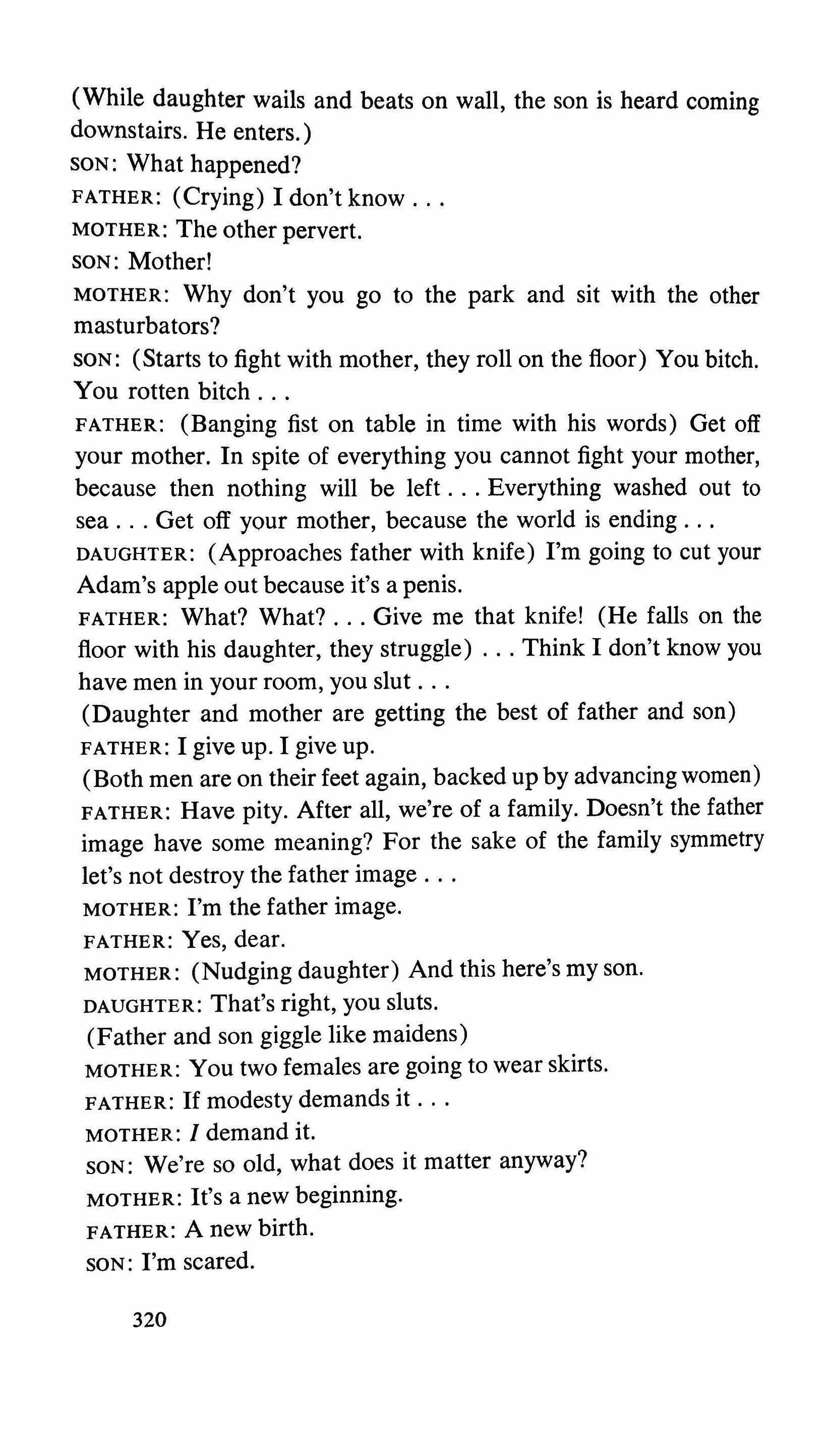
(While daughter wails and beats on wall, the son is heard coming downstairs. He enters.)
SON: What happened?
FATHER: (Crying) I don't know
MOTHER: The other pervert.
SON: Mother!
MOTHER: Why don't you go to the park and sit with the other masturbators?
SON: (Starts to fight with mother, they roll on the floor) You bitch. You rotten bitch
FATHER: (Banging fist on table in time with his words) Get off your mother. In spite of everything you cannot fight your mother, because then nothing will be left Everything washed out to sea Get off your mother, because the world is ending
DAUGHTER: (Approaches father with knife) I'm going to cut your Adam's apple out because it's a penis.
FATHER: What? What? Give me that knife! (He falls on the floor with his daughter, they struggle) Think I don't know you have men in your room, you slut (Daughter and mother are getting the best of father and son)
FATHER: I give up. I give up. (Both men are on their feet again, backed up by advancing women)
FATHER: Have pity. After all, we're of a family. Doesn't the father image have some meaning? For the sake of the family symmetry let's not destroy the father image
MOTHER: I'm the father image.
FATHER: Yes, dear.
MOTHER: (Nudging daughter) And this here's my son.
DAUGHTER: That's right, you sluts. (Father and son giggle like maidens)
MOTHER: You two females are going to wear skirts.
FATHER: If modesty demands it
MOTHER: I demand it.
SON: We're so old, what does it matter anyway?
MOTHER: It's a new beginning.
FATHER: A new birth.
SON: I'm scared.
320

FATHER: These strong men will protect us. (Father and son giggle like maidens)
MOTHER: Enough of that, you big-hipped cows. (To daughter, who has picked up her embroidery again) Put that down. Am I the only man here? (To daughter) Come on, let's go out and get a piece of ass. (They leave)
(Father and son go to original places. Son resting chin and hands on head of cane. Father picks up newspaper. Short period of silence)
FATHER: The house seems empty without them. (Sons nods thoughtfully)
FATHER: Did I ever talk to you about love sexual love? (Sons sighs distracted sigh)
FATHER: Now that your sister is married She married that blond boy we used to see passing the house, I think
SON: Isn't she downtown buying some more thread with mother?
FATHER: That's right. The house seems empty without them (Son yawns)
FATHER: Sex Your mother's a man
SON: At her age does it matter?
FATHER: I suppose in the end all definitions merge. They seem so important in the beginning (Son sighs)
FATHER: You seem to do a lot of sighing.
SON: It's a way to fill conversational space.
FATHER: That's an old man's trick. (Son sighs)
FATHER: There, you've done it again. Your mother is a man That makes me a woman.
SON: Oh father, I don't care.
FATHER: But, it's important.
SON: Why?
FATHER: Because we cannot escape the universe. It is impossible to simply sigh. The universe is parts that fit together, as in and out, lost and found, male and female. We cannot escape it.
SON: But do we have to think about it? Can't the universe do it without us?
321

FATHER: But don't you see that we (Mother and daughter suddenly return)
DAUGHTER: (To mother) Rhetorical nonsense, you are no more a man than father.
MOTHER: Shut up, you bitch!
DAUGHTER: If the paradox of the woman becoming the man had any truth, that would leave you out. You have never even been a woman.
MOTHER: That's not true, these breasts mean something in the world. (Holds breasts out, perhaps with hands)
DAUGHTER: They are meaningless to me, mother.
MOTHER: You think you look any better, deary?
DAUGHTER: We look of an age, old unmarried sisters.
MOTHER: But I have a husband. And I've used my puss for more than something to hide in my bloomers.
FATHER: Mother's right. (All nod as if in agreement. Then each breaks out in quiet, private weeping. They find their original places. Daughter starts embroidering again. Father reads his newspaper again. Son sits with hands and chin resting on head of his cane. Small period of silence and private thoughts.)
MOTHER: (Brightly) Look at our fine children, both accomplished at sitting pleasantly in a room. Look at daughter, how her grey hair complements the wallpaper, how it blends so lovely with the evening paper.-And our son; I worried when his hair started to fall out. I though it would look too stark. But, look how his bald head seems to sing with virility. It breaks a mother's heart to see such a virile boy-I should hide him from the girls.
FATHER: Yes, mother, I think we did a pretty good job with the children. (Curtain begins to fall) They're really turning out fine. I hope they remember to thank us one day. Now really, daughter, aren't you glad we broke up that childish infatuation you were carrying on thirty years ago? Why, you might have married that young fool
(End)
322
The still abode ofDavid Hamilton
ALAIN ROBBE-GRILLET
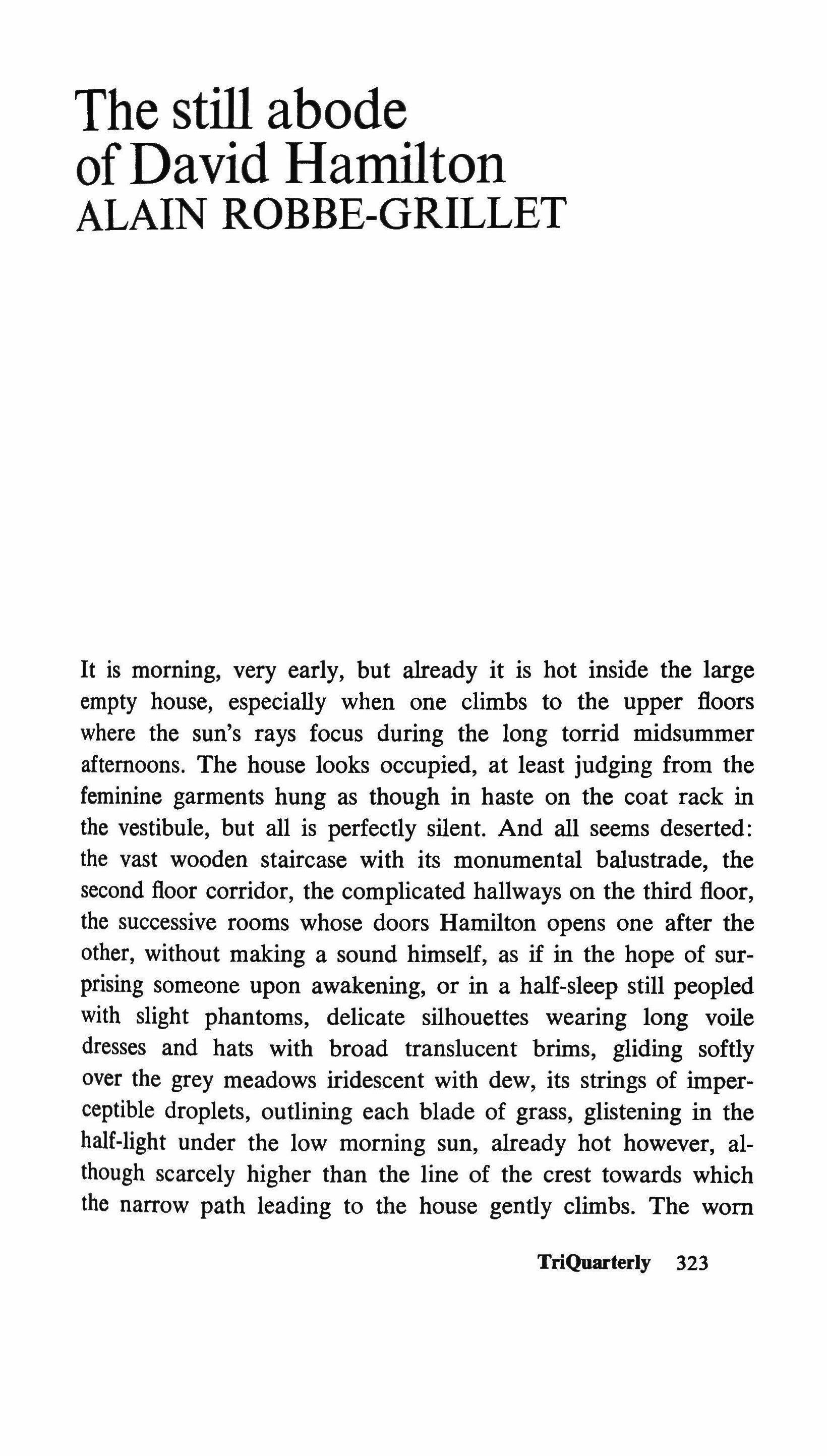
It is morning, very early, but already it is hot inside the large empty house, especially when one climbs to the upper floors where the sun's rays focus during the long torrid midsummer afternoons. The house looks occupied, at least judging from the feminine garments hung as though in haste on the coat rack in the vestibule, but all is perfectly silent. And all seems deserted: the vast wooden staircase with its monumental balustrade, the second floor corridor, the complicated hallways on the third floor, the successive rooms whose doors Hamilton opens one after the other, without making a sound himself, as if in the hope of surprising someone upon awakening, or in a half-sleep still peopled with slight phantoms, delicate silhouettes wearing long voile dresses and hats with broad translucent brims, gliding softly over the grey meadows iridescent with dew, its strings of imperceptible droplets, outlining each blade of grass, glistening in the half-light under the low morning sun, already hot however, although scarcely higher than the line of the crest towards which the narrow path leading to the house gently climbs. The worn
TriQuarterly 323

rope-soled espadrilles Hamilton is wearing make no sound on the beaten dirt of the path, nor any sound as he crosses the threshold pushing open-just enough to allow his passage--the heavy door that has been left ajar, no sound in crossing the deserted entrance hall, no sound in climbing the wooden staircase with its short straight flights, no sound still as Hamilton opens the door to a room and stops in the doorway after pushing the door half open. Like all the other rooms in the large house, this room looks occupied, at least looks as if it had been occupied a short time ago: an unmade bed whose rumpled sheets seem to have been thrown back a second earlier by the sleeping young girl scarcely wakened from her dreams, which seem to float still in a half-sleep she hesitates to brush away, while her bare feet cross the faded flowers of the rug with the improbable steps of a sleepwalker, over to the rustic washstand where she slowly pours the contents of the pitcher of water into the white porcelain basin, over which she then leans to look at her immobile face, her sleep-filled but unblinking eyes, her delicate, pouting features, like an abstracted child's, her very long neck, and one glistening shoulder bared by the long tulle nightgown, cut very full, which has slid down her skin. Then, in a gesture just as slow, she extends the other arm (the one whose shoulder is hidden), which emerges from a flared sleeve ending a little below the elbow, and gradually brings the tips of her long fingers close to the limpid surface. Then she stops moving entirely, and stands there, staring blindly at her tapered hand, loosely opened, held poised above the immaterial, solidified, inaccessible water. A few seconds, or a few hours, or a few years later, the white hand has shattered the liquid mirror and suddenly made the reflected image disappear, the long transparent nightgown, the bent face, the wide eyes. Yet when Hamilton pushes the door open, the room is empty, like all the rest of the house. The water in the basin, still perfectly clear and unclouded, is quiet again, but its surface now only reflects the narrow panes of the casement window, on the other side of which the early morning sun shines on the sloping meadows sparkling with white frost, or with dew, where the phantom girls in long
324
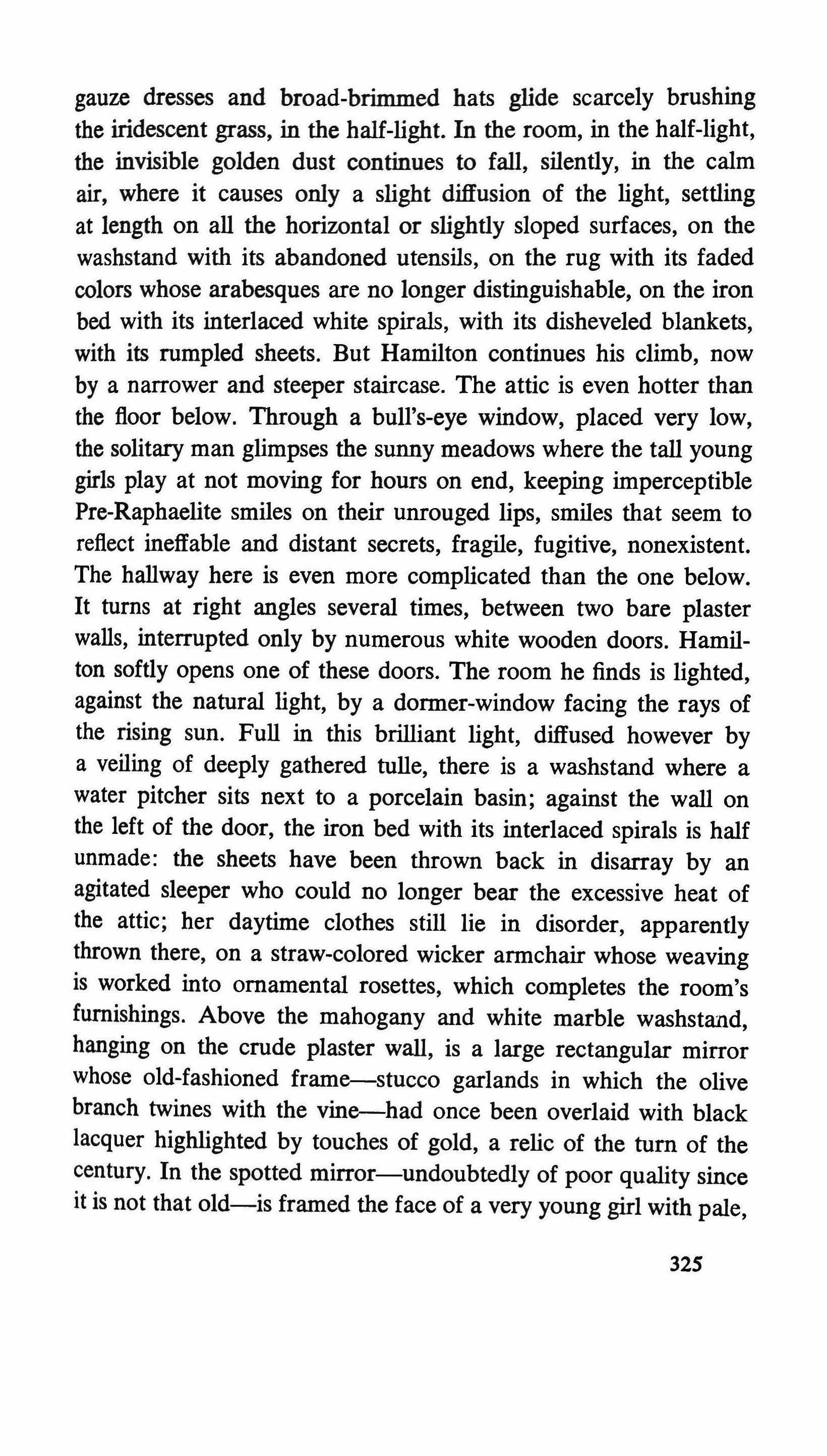
gauze dresses and broad-brimmed hats glide scarcely brushing the iridescent grass, in the half-light. In the room, in the half-light, the invisible golden dust continues to fall, silently, in the calm air, where it causes only a slight diffusion of the light, settling at length on all the horizontal or slightly sloped surfaces, on the washstand with its abandoned utensils, on the rug with its faded colors whose arabesques are no longer distinguishable, on the iron bed with its interlaced white spirals, with its disheveled blankets, with its rumpled sheets. But Hamilton continues his climb, now by a narrower and steeper staircase. The attic is even hotter than the floor below. Through a bull's-eye window, placed very low, the solitary man glimpses the sunny meadows where the tall young girls play at not moving for hours on end, keeping imperceptible Pre-Raphaelite smiles on their unrouged lips, smiles that seem to reflect ineffable and distant secrets, fragile, fugitive, nonexistent. The hallway here is even more complicated than the one below. It turns at right angles several times, between two bare plaster walls, interrupted only by numerous white wooden doors. Hamilton softly opens one of these doors. The room he finds is lighted, against the natural light, by a dormer-window facing the rays of the rising sun. Full in this brilliant light, diffused however by a veiling of deeply gathered tulle, there is a washstand where a water pitcher sits next to a porcelain basin; against the wall on the left of the door, the iron bed with its interlaced spirals is half unmade: the sheets have been thrown back in disarray by an agitated sleeper who could no longer bear the excessive heat of the attic; her daytime clothes still lie in disorder, apparently thrown there, on a straw-colored wicker armchair whose weaving is worked into ornamental rosettes, which completes the room's furnishings. Above the mahogany and white marble washstand, hanging on the crude plaster wall, is a large rectangular mirror whose old-fashioned frame-stucco garlands in which the olive branch twines with the vine-had once been overlaid with black lacquer highlighted by touches of gold, a relic of the tum of the century. In the spotted mirror-undoubtedly of poor quality since it is not that old-is framed the face of a very young girl with pale, 325

loose hair, her chest bare, her long white lace nightgown having slid down to her waist, probably from the motions of her nimble arms and hands with tapered fingers which still hold the material up on either side, at her hips. The young girl is looking at her budding breasts in the mirror, as if astonished by the incongruous presence of these two little hemispheres of tender flesh which might have grown that night, during her sleep. But this is pure supposition, for the expression on her face in reality conveys no feeling of surprise, nor of satisfaction either, nor of disgust, nor of anxiety, nor of anything else at all. One can only state, from the direction of her gaze in the mirror, that she is contemplating her young bosom, then one of her breasts more explicitly, then the other, and so forth, alternately, several times, always with the same attention and the same slowness in the slight movements of her head as she looks from one to the other, as if she wanted to compare their volume, or their shape, or the color of the narrow rose-brown aureole that surrounds the terminal bud. She next lowers her gaze directly onto her chest, which she inspects in the same way, this time not using the intermediary of the mirror. At the end of several minutes, her right hand, at the hollow of her waist, lets go of the neck of the nightgown, which nevertheless stays in place, still held by her other hand. The light material only slides a little further down the form of her hip, now revealing the childlike bone structure barely covered with flesh. And her free hand meanwhile rises without haste to her right breast, which her five fingertips brush with hesitation, it seems, with fright perhaps, or with respect, or furtively, although her face with its immobile features still expresses nothing of the sort. Her fingertips caress the translucent skin for a moment, but barely, almost not moving; then her hand closes, gradually, until her five outstretched fingers end by meeting at the pole of the hemisphere, imprisoning the tiny nipple between them.
At this moment she raises her head and her clear eyes return to the mirror and the image of her hand with its tapered fingers closed over the tip of her breast. Then her hand opens again, returns to its original position, but then opens wider, slowly still
326
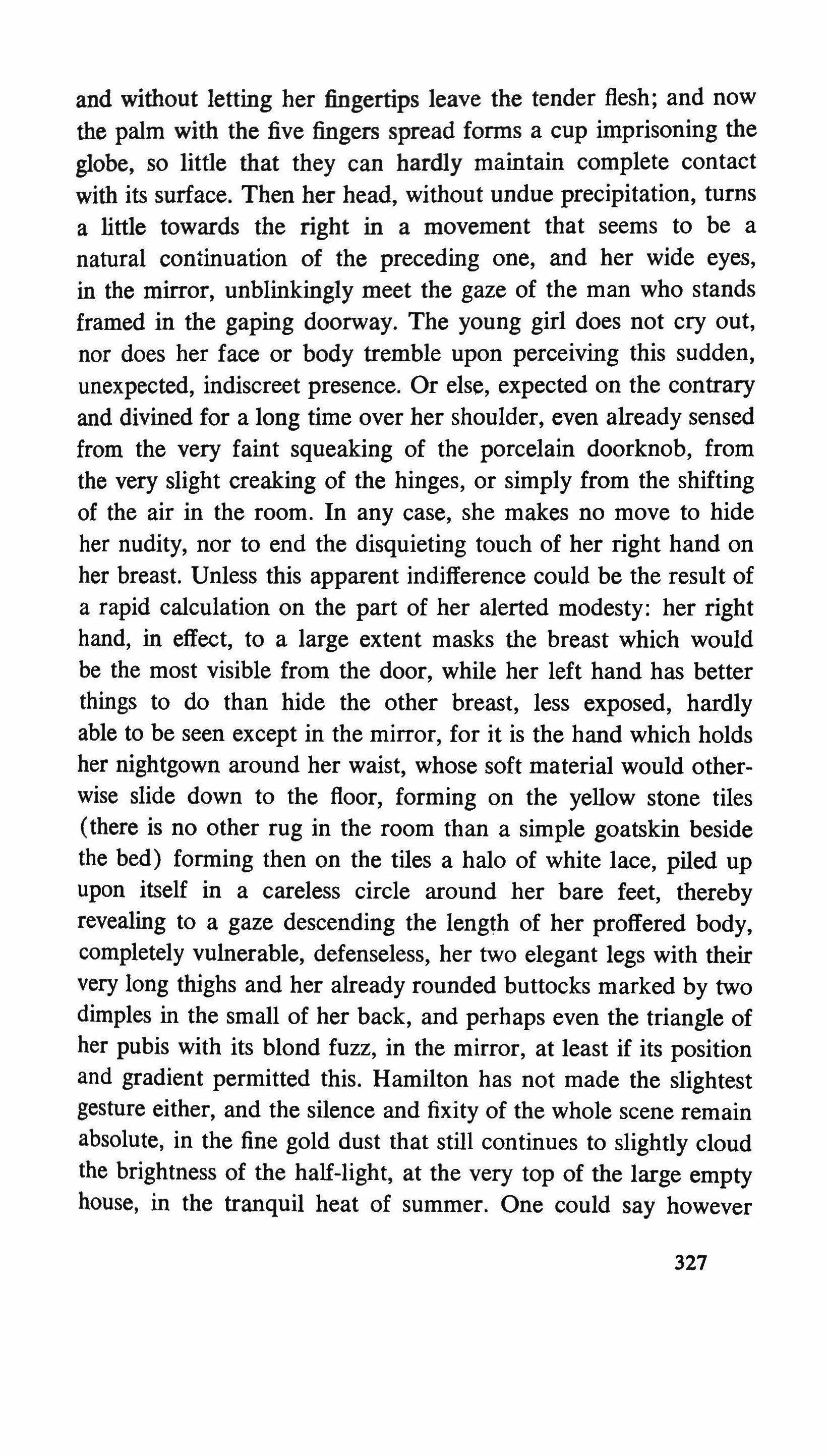
and without letting her fingertips leave the tender flesh; and now the palm with the five fingers spread forms a cup imprisoning the globe, so little that they can hardly maintain complete contact with its surface. Then her head, without undue precipitation, turns a little towards the right in a movement that seems to be a natural continuation of the preceding one, and her wide eyes, in the mirror, unblinkingly meet the gaze of the man who stands framed in the gaping doorway. The young girl does not cry out, nor does her face or body tremble upon perceiving this sudden, unexpected, indiscreet presence. Or else, expected on the contrary and divined for a long time over her shoulder, even already sensed from the very faint squeaking of the porcelain doorknob, from the very slight creaking of the hinges, or simply from the shifting of the air in the room. In any case, she makes no move to hide her nudity, nor to end the disquieting touch of her right hand on her breast. Unless this apparent indifference could be the result of a rapid calculation on the part of her alerted modesty: her right hand, in effect, to a large extent masks the breast which would be the most visible from the door, while her left hand has better things to do than hide the other breast, less exposed, hardly able to be seen except in the mirror, for it is the hand which holds her nightgown around her waist, whose soft material would otherwise slide down to the floor, forming on the yellow stone tiles (there is no other rug in the room than a simple goatskin beside the bed) forming then on the tiles a halo of white lace, piled up upon itself in a careless circle around her bare feet, thereby revealing to a gaze descending the length of her proffered body, completely vulnerable, defenseless, her two elegant legs with their very long thighs and her already rounded buttocks marked by two dimples in the small of her back, and perhaps even the triangle of her pubis with its blond fuzz, in the mirror, at least if its position and gradient permitted this. Hamilton has not made the slightest gesture either, and the silence and fixity of the whole scene remain absolute, in the fine gold dust that still continues to slightly cloud the brightness of the half-light, at the very top of the large empty house, in the tranquil heat of summer. One could say however
327

that the young girl's face had changed imperceptibly, as if an imperceptible smile had appeared on her unrouged lips, a smile that seems to be the reflection of an ineffable secret, distant, fragile and fugitive, nonexistent no doubt, a smile perhaps of innocence and perhaps of complicity, an empty smile. And it is now with her face exposed, having renounced the rust-spotted intermediary of the old mirror, that the young sleeper, without changing her posture, without altering in any way the position of her feet on the floor or her hands on her body, with a simple rotation of her hips and frail bare shoulders, turns towards the wide open door and the empty hallway. Hamilton meanwhile continues his silent climb. Through the narrow window in a hallway, having taken a step into the deep vista in order to get closer to the glass, he again sees, far below, almost on a vertical, the bright meadows where the same tall mute young girls in lace nightgowns play something that resembles blind-man's buff, at least as far as one can tell from such a great distance. They seem to glide over the silver-colored grass, one of them-the one who has the red band over her eyes-holding both her hands in front of her like a sleepwalker, reaching towards one or another of her companions whose dress she had thought she had heard rustle or whose sandal squeaked but who dodged away immediately in a sudden sidestep leaving in her place, in the direction in which the sleepwalker continues to take uncertain graceful steps, nothing but the empty meadow. Hamilton turns back towards the hallway.
A very young girl comes forward to meet him, both arms held out limply before her, emerging from the flared half-sleeves of her long dress, or nightgown, of transparent silk. She moves, bare feet on the stone floor, with the lightness of a phantom. She keeps her eyes wide open and fixed, an imperceptible smile plays on her lips, but she appears to see nothing. She is dreaming. She turns her head to one side for an instant, towards a partly closed door that leaves a gap of several inches between the vertical edge of the leaf and the back of the frame. But the sleeper does not stop, only slows her pace a little in passing, as if she feels invisible presences quite close behind the door which she could easily push open. The move-
328
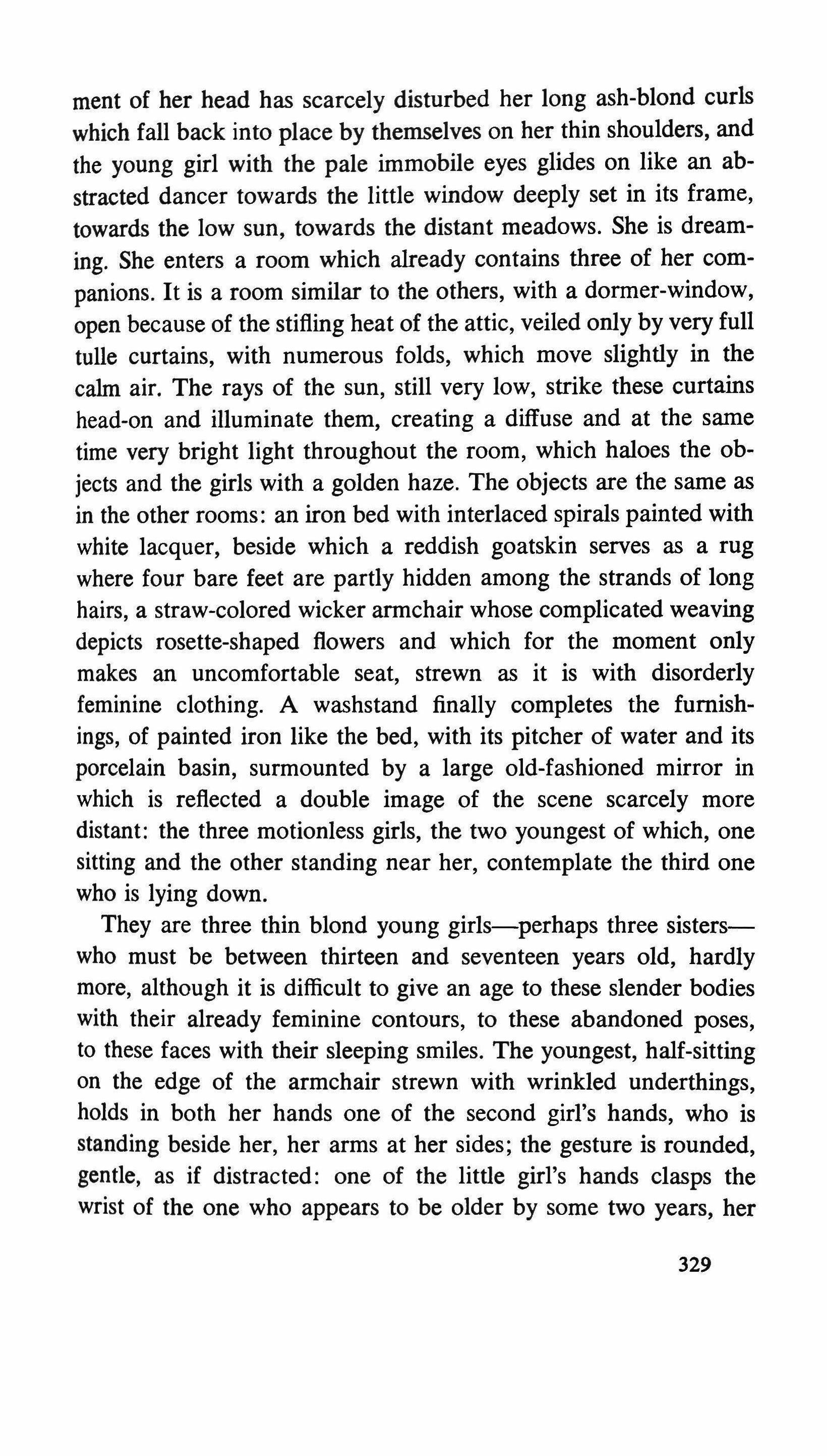
ment of her head has scarcely disturbed her long ash-blond curls which fall back into place by themselves on her thin shoulders, and the young girl with the pale immobile eyes glides on like an abstracted dancer towards the little window deeply set in its frame, towards the low sun, towards the distant meadows. She is dreaming. She enters a room which already contains three of her companions. It is a room similar to the others, with a dormer-window, open because of the stifling heat of the attic, veiled only by very full tulle curtains, with numerous folds, which move slightly in the calm air. The rays of the sun, still very low, strike these curtains head-on and illuminate them, creating a diffuse and at the same time very bright light throughout the room, which haloes the objects and the girls with a golden haze. The objects are the same as in the other rooms: an iron bed with interlaced spirals painted with white lacquer, beside which a reddish goatskin serves as a rug where four bare feet are partly hidden among the strands of long hairs, a straw-colored wicker armchair whose complicated weaving depicts rosette-shaped flowers and which for the moment only makes an uncomfortable seat, strewn as it is with disorderly feminine clothing. A washstand finally completes the furnishings, of painted iron like the bed, with its pitcher of water and its porcelain basin, surmounted by a large old-fashioned mirror in which is reflected a double image of the scene scarcely more distant: the three motionless girls, the two youngest of which, one sitting and the other standing near her, contemplate the third one who is lying down.
They are three thin blond young girls-perhaps three sisterswho must be between thirteen and seventeen years old, hardly more, although it is difficult to give an age to these slender bodies with their already feminine contours, to these abandoned poses, to these faces with their sleeping smiles. The youngest, half-sitting on the edge of the armchair strewn with wrinkled underthings, holds in both her hands one of the second girl's hands, who is standing beside her, her arms at her sides; the gesture is rounded, gentle, as if distracted: one of the little girl's hands clasps the wrist of the one who appears to be older by some two years, her 329

other hand is half-closed around four long, elegant, abandoned fingers, abandoned phalanxes, the younger's thumb lodged in the older's consenting palm, under her thumb. They are both dressed in the same light nightgown which falls in regular folds, but which has slipped off the older girl's shoulder, revealing the hollow of her neck and her rounded upper arm. They are both watching, motionless, the third girl, motionless also, stretched out naked on the rumpled sheets of the bed. The third girl, feigning sleep, lies on her back, her legs apart, one knee bent and the foot half hidden in the hollow of the other knee; her head is turned towards the wall, one of her arms bent with the palm at the back of her neck, the other arm outstretched, letting her hand hang over the edge of the bed. The standing dreamer who contemplates the scene then notices that she herself is nothing but the reflection in the mirror, scarcely more elongated, slightly distorted however by the poor quality of the glass, of the tall girl standing on the goatskin rug, which causes an imperceptible smile to appear on her unrouged lips. Hamilton snaps the shutter of his camera.
translated by Patricia Southgate
330
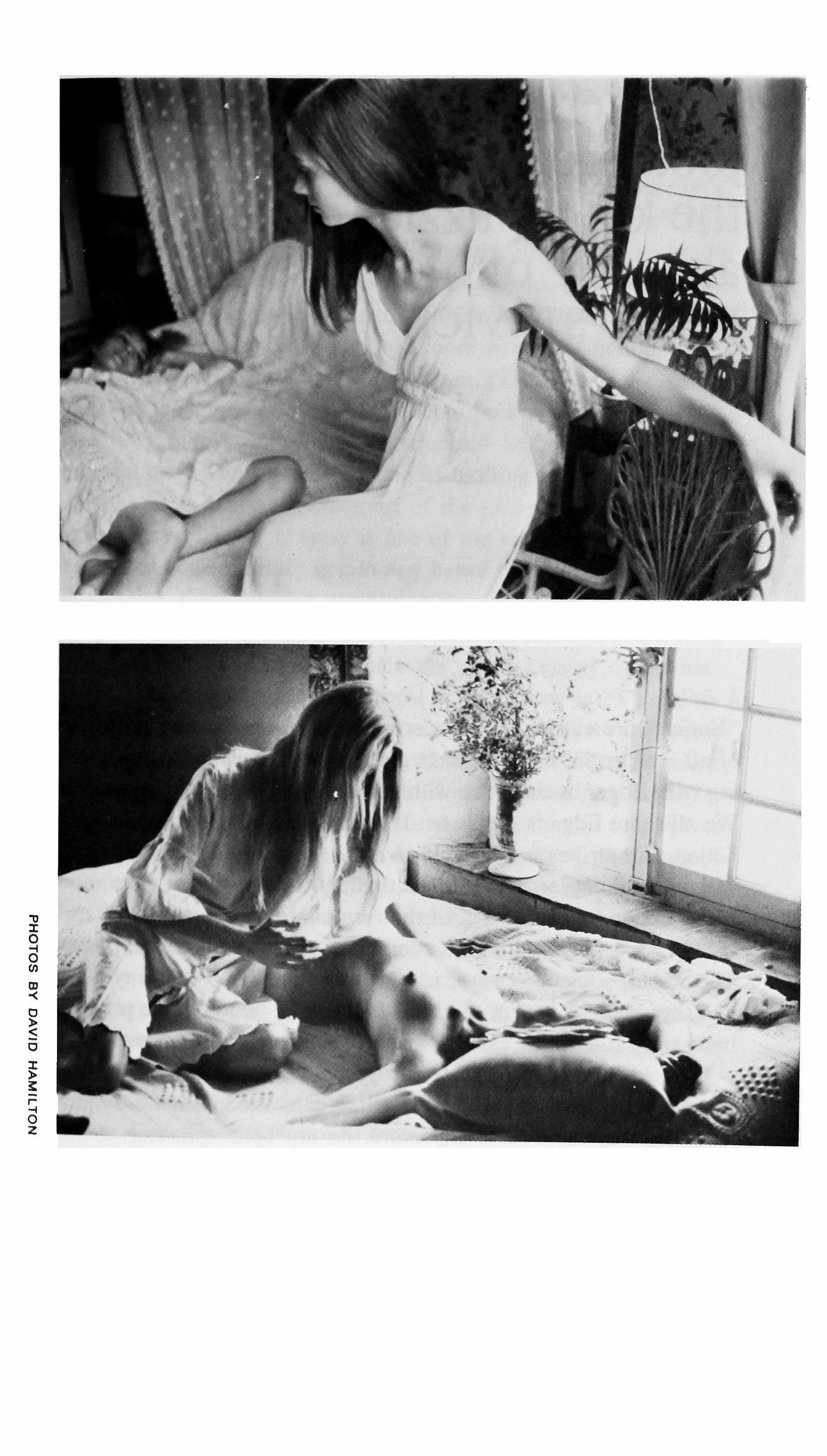
Scheherazade runs out of plots, goes on talking; the king, puzzled, listens:
an essay on new fiction
PHILIP STEVICK
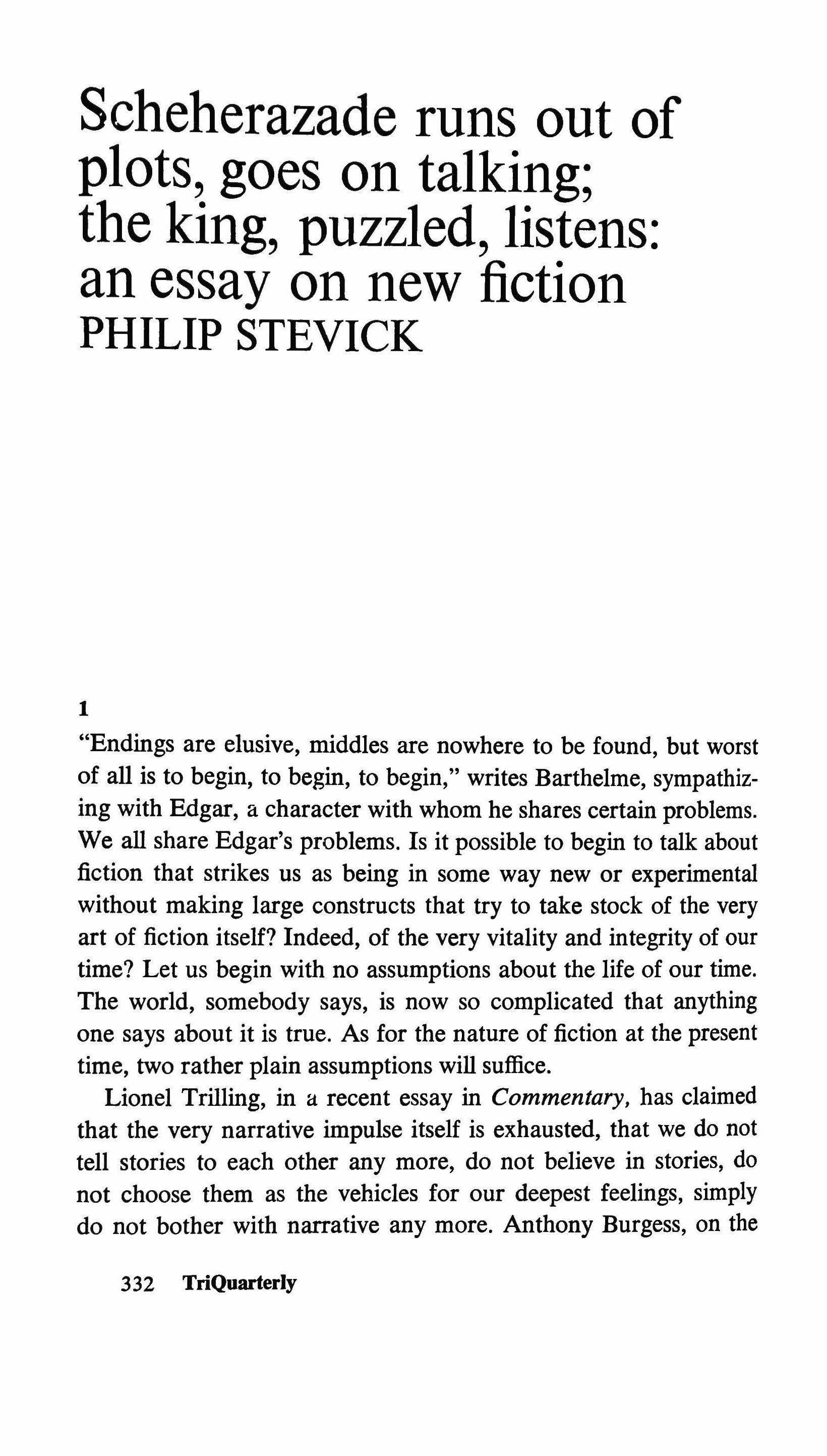
1
"Endings are elusive, middles are nowhere to be found, but worst of all is to begin, to begin, to begin," writes Barthelme, sympathizing with Edgar, a character with whom he shares certain problems. We all share Edgar's problems. Is it possible to begin to talk about fiction that strikes us as being in some way new or experimental without making large constructs that try to take stock of the very art of fiction itself? Indeed, of the very vitality and integrity of our time? Let us begin with no assumptions about the life of our time. The world, somebody says, is now so complicated that anything one says about it is true. As for the nature of fiction at the present time, two rather plain assumptions will suffice.
Lionel Trilling, in a recent essay in Commentary, has claimed that the very narrative impulse itself is exhausted, that we do not tell stories to each other any more, do not believe in stories, do not choose them as the vehicles for our deepest feelings, simply do not bother with narrative any more. Anthony Burgess, on the
332 TriQuarterly
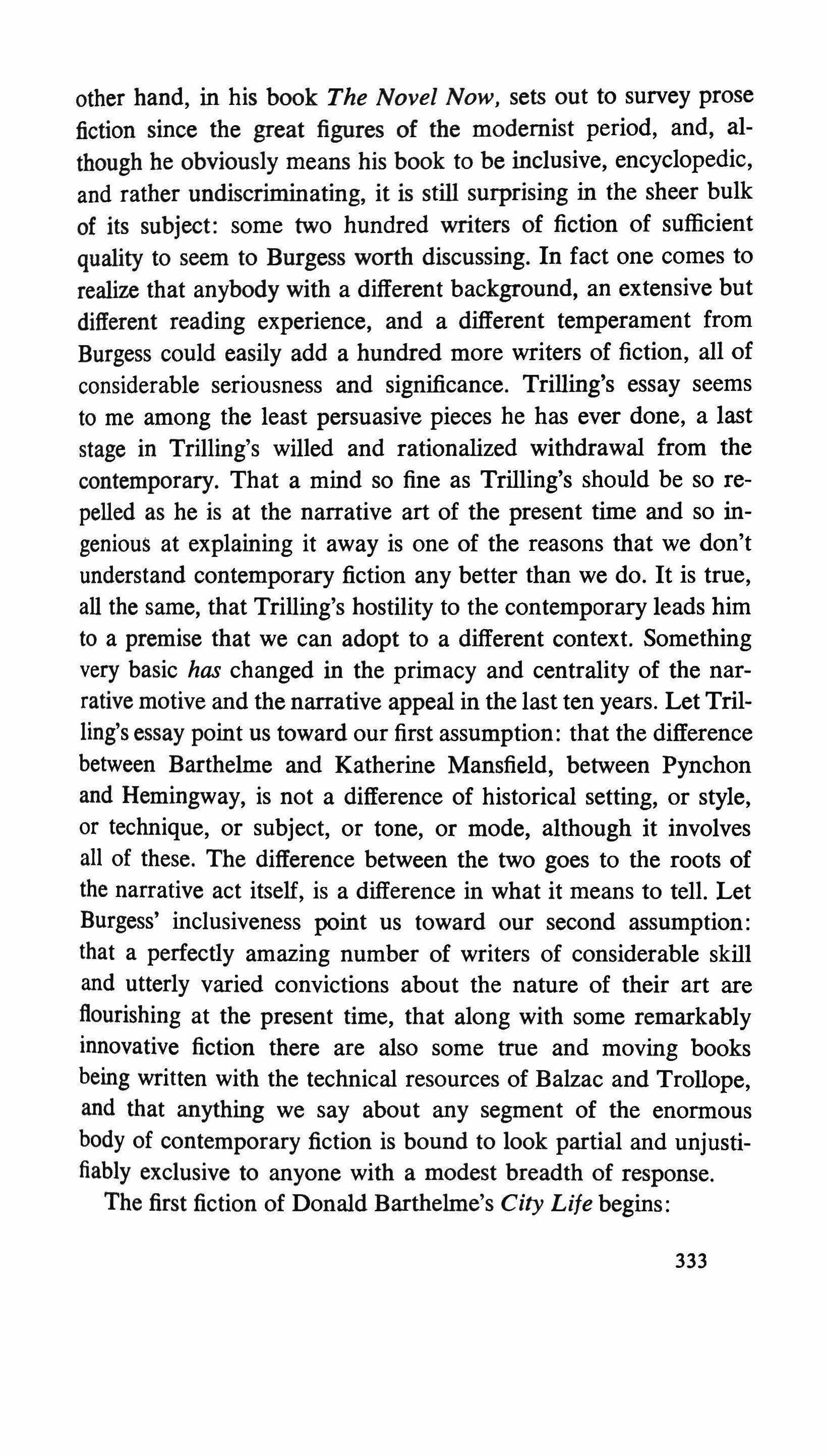
other hand, in his book The Novel Now, sets out to survey prose fiction since the great figures of the modernist period, and, although he obviously means his book to be inclusive, encyclopedic, and rather undiscriminating, it is still surprising in the sheer bulk of its subject: some two hundred writers of fiction of sufficient quality to seem to Burgess worth discussing. In fact one comes to realize that anybody with a different background, an extensive but different reading experience, and a different temperament from Burgess could easily add a hundred more writers of fiction, all of considerable seriousness and significance. Trilling's essay seems to me among the least persuasive pieces he has ever done, a last stage in Trilling's willed and rationalized withdrawal from the contemporary. That a mind so fine as Trilling's should be so repelled as he is at the narrative art of the present time and so ingenious at explaining it away is one of the reasons that we don't understand contemporary fiction any better than we do. It is true, all the same, that Trilling's hostility to the contemporary leads him to a premise that we can adopt to a different context. Something very basic has changed in the primacy and centrality of the narrative motive and the narrative appeal in the last ten years. Let Trilling's essay point us toward our first assumption: that the difference between Barthelme and Katherine Mansfield, between Pynchon and Hemingway, is not a difference of historical setting, or style, or technique, or subject, or tone, or mode, although it involves all of these. The difference between the two goes to the roots of the narrative act itself, is a difference in what it means to tell. Let Burgess' inclusiveness point us toward our second assumption: that a perfectly amazing number of writers of considerable skill and utterly varied convictions about the nature of their art are flourishing at the present time, that along with some remarkably innovative fiction there are also some true and moving books being written with the technical resources of Balzac and Trollope, and that anything we say about any segment of the enormous body of contemporary fiction is bound to look partial and unjustifiably exclusive to anyone with a modest breadth of response. The first fiction of Donald Barthelme's City Life begins: 333

An aristocrat was riding down the street in his carriage. He ran over my father.
After the ceremony I walked back to the city. I was trying to think of the reason my father had died. Then I remembered: he was run over by a carriage. A short fiction by Richard Brautigan entitled The Warid War I Los Angeles Airplane begins:
He was found lying dead near the television set on the front room floor of a small rented house in Los Angeles. My wife had gone to the store to get some ice cream. It was an early-in-the-night-just-a-few-blocks-away store. We were in an ice-cream mood. The telephone rang. It was her brother to say that her father had died that afternoon.
Robert Coover begins his fiction A Pedestrian Accident in this way:
Paul stepped off the curb and got hit by a truck. He didn't know what it was that hit him at first, but now, here on his back, under the truck, there could be no doubt. Is it me? he wondered. Have I walked the earth and come here?
It is obvious at first that there are certain common characteristics of method, voice, and sensibility in the three beginnings: an extraordinary innocence, either genuine or feigned, even a kind of common prose rhythm deriving from the unwillingness to subordinate and complicate that is an attribute of that innocence, a readiness to confront certain extremities of life, in these cases pain, accident, death, and mourning, but an investing of these extremities with an odd and terribly distant artifice, a playing off of a method of wit, tough, flip, and facile, that is reminiscent of the stand-up comic ("Then I remembered "We were in an icecream mood." "Is it me? he wondered.") against a personal fragility and vulnerability that is very different from the classic toughness, knowingness, and irony of the dominant modernists. It is odd how quickly these qualities of "voice" can register on us, so that we know, before the structure of the fiction begins to take shape in our minds, that we are being spoken to by an imagination postJoycean and very much of our time, the theatricality of our three fictions being different in its tone of voice from anything we are accustomed to in Dostoevsky and Gide and Faulkner. Finally what unites the three fictions is the common presentation of the kind of event, death and violent accident, that must be led up to, or ex-
334

plained, or prepared for, or set in a context, but is, in these three cases, simply told. It is the chilling, almost pathological directness of beginning in the three fictions that is likely to seem to us most striking, for the fictions do not seem particularly "experimental," as we might use the word of other arts-their syntax is conventional and the words follow one another on the page. The beginnings seem to be as striking as they are because they are more than simply violations of conventions. They are epistemic dislocations, and the clearest analogue that I can think of is Kafka's great beginning, "As Gregor Samsa awoke one morning from a troubled dream, he found himself changed in his bed to some monstrous kind of vermin."
The differences of the three beginnings from each other are as obvious as the similarities. Barthelme exploits his fondness for the absurdities of a bookish past, the camp obliquity that corresponds, in his prose, to his use of old engravings in the texts of his more recent work. Brautigan superimposes a deliberate and affectatious naivete upon the plausible details of California. Coover begins to play back and forth between what one does feel at moments of extreme pain and what one thinks one ought to feel, between speech which is deeply felt yet comes out as cliche and speech which is formulaic yet comes out as existential cry. It is by observing the differences between the fictions that we might assume what I believe to be true, that what we have is not a movement, not a clique, not a group, not a school, not a unified assertion of anything nor a reaction against anything, not a conspiracy. On the other hand, it is by pointing to the similarities between the fictions that we might assume what I also believe to be true, that there are indeed some shared traits among writers of non-traditional fiction, a common sense of what they are not a part of, certain shared enthusiasms, certain common characteristics of voice and technique. Both the similarities and the differences suggest why it is that we have very little critical description worth attending to that would help us make sense out of recent non-traditional fiction.
New directions in the art of the last century and a half have generally been surrounded with the appearance of social agonism
335
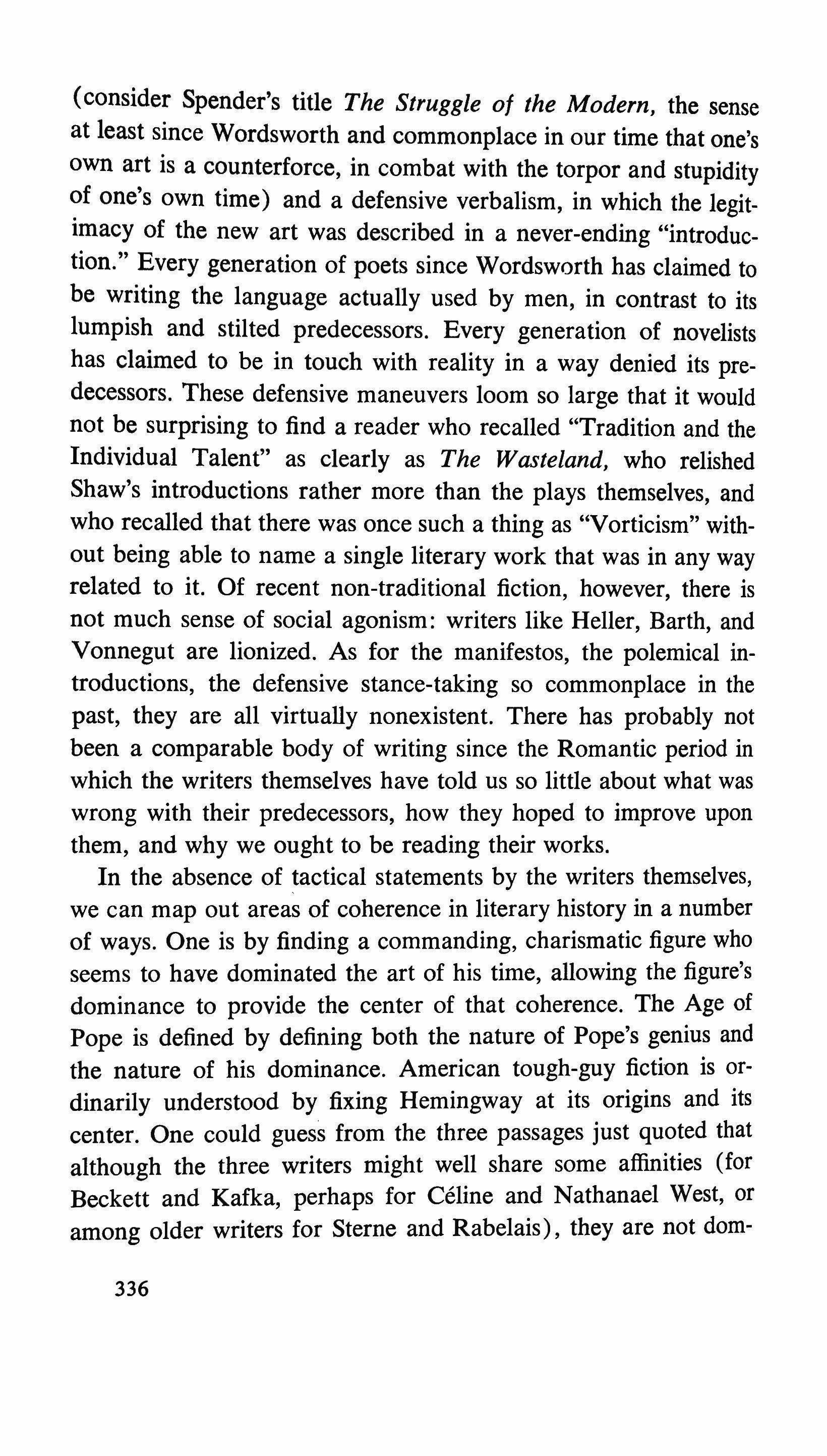
(consider Spender's title The Struggle of the Modern, the sense at least since Wordsworth and commonplace in our time that one's own art is a counterforce, in combat with the torpor and stupidity of one's own time) and a defensive verbalism, in which the legitimacy of the new art was described in a never-ending "introduction." Every generation of poets since Wordsworth has claimed to be writing the language actually used by men, in contrast to its lumpish and stilted predecessors. Every generation of novelists has claimed to be in touch with reality in a way denied its predecessors. These defensive maneuvers loom so large that it would not be surprising to find a reader who recalled "Tradition and the Individual Talent" as clearly as The Wasteland, who relished Shaw's introductions rather more than the plays themselves, and who recalled that there was once such a thing as "Vorticism" without being able to name a single literary work that was in any way related to it. Of recent non-traditional fiction, however, there is not much sense of social agonism: writers like Heller, Barth, and Vonnegut are lionized. As for the manifestos, the polemical introductions, the defensive stance-taking so commonplace in the past, they are all virtually nonexistent. There has probably not been a comparable body of writing since the Romantic period in which the writers themselves have told us so little about what was wrong with their predecessors, how they hoped to improve upon them, and why we ought to be reading their works.
In the absence of tactical statements by the writers themselves, we can map out areas of coherence in literary history in a number of ways. One is by finding a commanding, charismatic figure who seems to have dominated the art of his time, allowing the figure's dominance to provide the center of that coherence. The Age of Pope is defined by defining both the nature of Pope's genius and the nature of his dominance. American tough-guy fiction is ordinarily understood by fixing Hemingway at its origins and its center. One could guess from the three passages just quoted that although the three writers might well share some affinities (for Beckett and Kafka, perhaps for Celine and Nathanael West, or among older writers for Sterne and Rabelais), they are not dom-
336

inated by anybody. There is no peak to the pyramid and our search for that kind of coherence is pointless.
Another way of finding coherence is to discover a common ideology. The Oxford Movement is defined by what its members believed. And our habit of grouping writers according to decade or generation is based on the assumption that writers grouped in that way can be seen to cohere by reason of their shared assumptions about the nature of the world. Of our three initial examples, I am not sure what ideology means when applied to Barthelme and Coover; I think that the word may mean something when applied to Brautigan. But in any case, if we are equipped to define literary coherence by finding a common ideology, we do seem to be out of luck here.
Still another way of defining literary coherence is to look at the aesthetic transaction itself. We have a movement, or a school, when we can point to a coherent audience or a specific group of periodicals or publishers especially receptive to a specialized kind of art. The nature of The Yellow Book, its contributors, and its audience all cohere as a unit. And we naturally seek to understand "Southern Agrarianism" or "The New Criticism" by understanding the journals, such as the Sewanee and Kenyon Reviews, in which those aesthetic and intellectual transactions were presented. Among our three examples, there is, again, no coherence at all. The audience for Coover does not overlap, so far as one can tell, with the audience for Brautigan, and the two are rarely published in the same places. Barthelme's case is the most peculiar of the three. City Life is made up of work published in The New Yorker and Paris Review; as a book, City Life was reviewed as an avantgarde mystification-and was offered as an alternate to the members of the Book-of-the-Month Club: I bought my copy from the revolving rack at a drugstore. In short, almost all of the equipment which we have for defining a direction in the history of an art, setting it off from what has gone before and what comes after, breaks down in the face of those writers whom we would easily call non-traditional writers of fiction, an incongruous and highly individual lot. 337

On the other hand, the correspondences among new writers of fiction suggest, as much as the differences between them, why it is that new fiction is so little understood. "Post-modernist" is an epithet that I, for one, find annoying and unhelpful. But it is true, all the same, that recent fiction no longer orients itself according to its own relations to the modernist masters and that this sense of discontinuity with the dominant figures of modernism is one of the few qualities that unite new fiction. (Ihab Hassan's contention that the great fountainhead of "post-modernist" fiction is Finnegans Wake seems to me perverse, bizarre, and unsupportable.) Yet most criticism still defines the art of our own time as being, in the case of fiction, the art of the twentieth century. A professional interest in Joyce need not be exclusive of a professional interest in Coover; but in fact the two almost always are exclusive of each other, a fact not surprising when one reflects on the gulf in time between the two, Coover being as far in time from Joyce as Joyce is from George Eliot. What recent fiction tells us on every page is that it is of another age than the modernist masters. And what we are further obliged to recognize is that our public conceptualizing has not even acknowledged the transition, much less provided the organizing devices by means of which we can make sense of it. There was a time when the kind of public understanding that we lack was supplied by the "man of letters." But, as John Gross has magisterially demonstrated, the man of letters has fallen and figures comparable to Henley, Saintsbury, and Middleton Murry, or more recently Edmund Wilson, are not likely to arise in our own time to mediate between new art and its anxious public in a way that those older figures did. Even if such figures did exist, they would find their function difficult to perform, since new fiction tends to mock, subvert, and preempt any traditional attempts at critical interpretation of itself. And thus recent narrative art (with the exception of "new" French fiction, which has not lacked apologetics for itself) has set about creating a new set of narrative possibilities in a time when the public for fiction does not expect or wish for anybody to seek to form its taste and instruct its re-
338
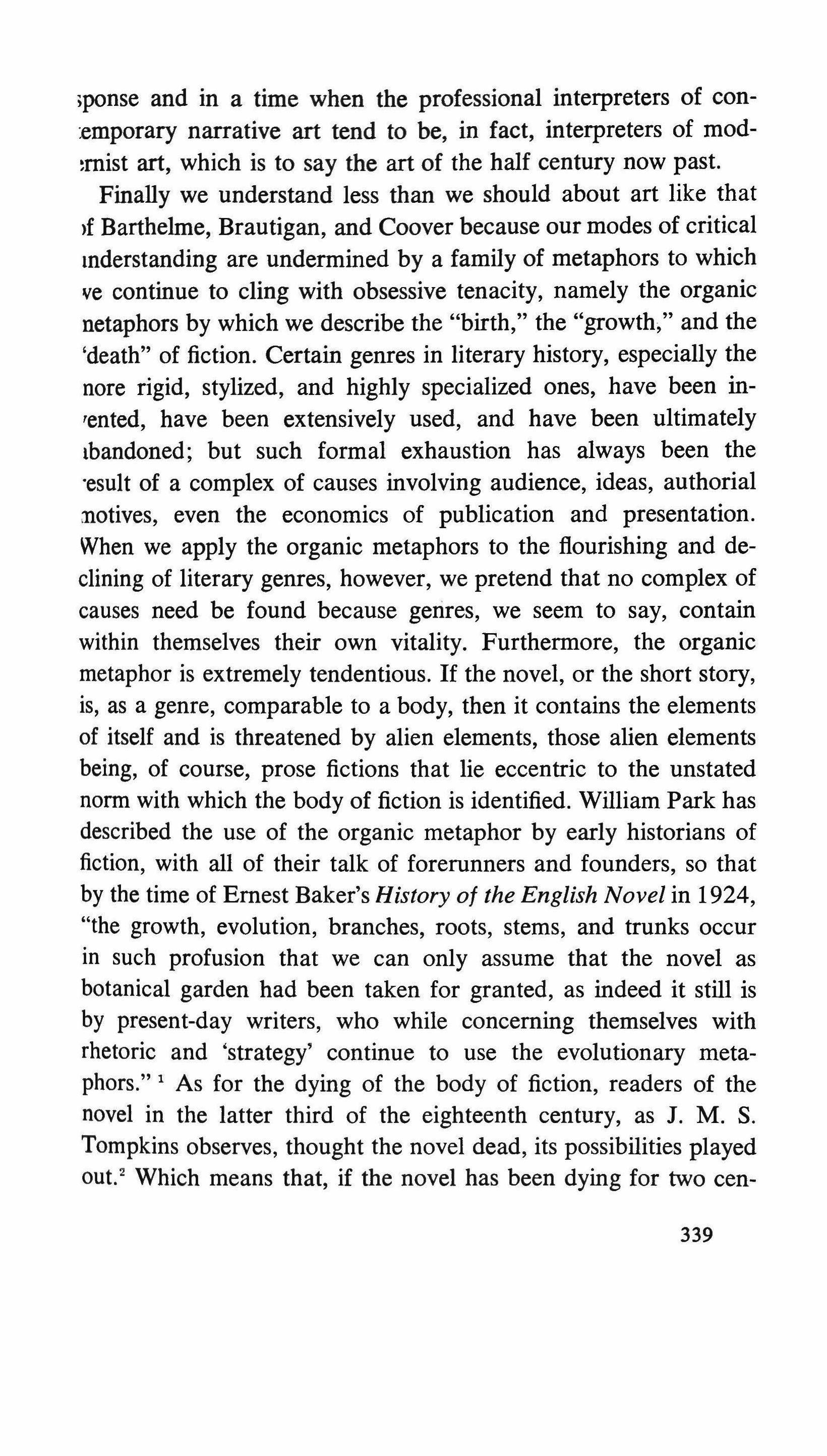
;ponse and in a time when the professional interpreters of con:emporary narrative art tend to be, in fact, interpreters of mod�rnist art, which is to say the art of the half century now past.
Finally we understand less than we should about art like that )f Barthelme, Brautigan, and Coover because our modes of critical mderstanding are undermined by a family of metaphors to which ve continue to cling with obsessive tenacity, namely the organic netaphors by which we describe the "birth," the "growth;' and the 'death" of fiction. Certain genres in literary history, especially the nore rigid, stylized, and highly specialized ones, have been inrented, have been extensively used, and have been ultimately ibandoned; but such formal exhaustion has always been the ·esult of a complex of causes involving audience, ideas, authorial motives, even the economics of publication and presentation. When we apply the organic metaphors to the flourishing and declining of literary genres, however, we pretend that no complex of causes need be found because genres, we seem to say, contain within themselves their own vitality. Furthermore, the organic metaphor is extremely tendentious. If the novel, or the short story, is, as a genre, comparable to a body, then it contains the elements of itself and is threatened by alien elements, those alien elements being, of course, prose fictions that lie eccentric to the unstated norm with which the body of fiction is identified. William Park has described the use of the organic metaphor by early historians of fiction, with all of their talk of forerunners and founders, so that by the time of Ernest Baker's History of the English Novel in 1924, "the growth, evolution, branches, roots, stems, and trunks occur in such profusion that we can only assume that the novel as botanical garden had been taken for granted, as indeed it still is by present-day writers, who while concerning themselves with rhetoric and 'strategy' continue to use the evolutionary metaphors." 1 As for the dying of the body of fiction, readers of the novel in the latter third of the eighteenth century, as J. M. s. Tompkins observes, thought the novel dead, its possibilities played out. 2 Which means that, if the novel has been dying for two cen-
339
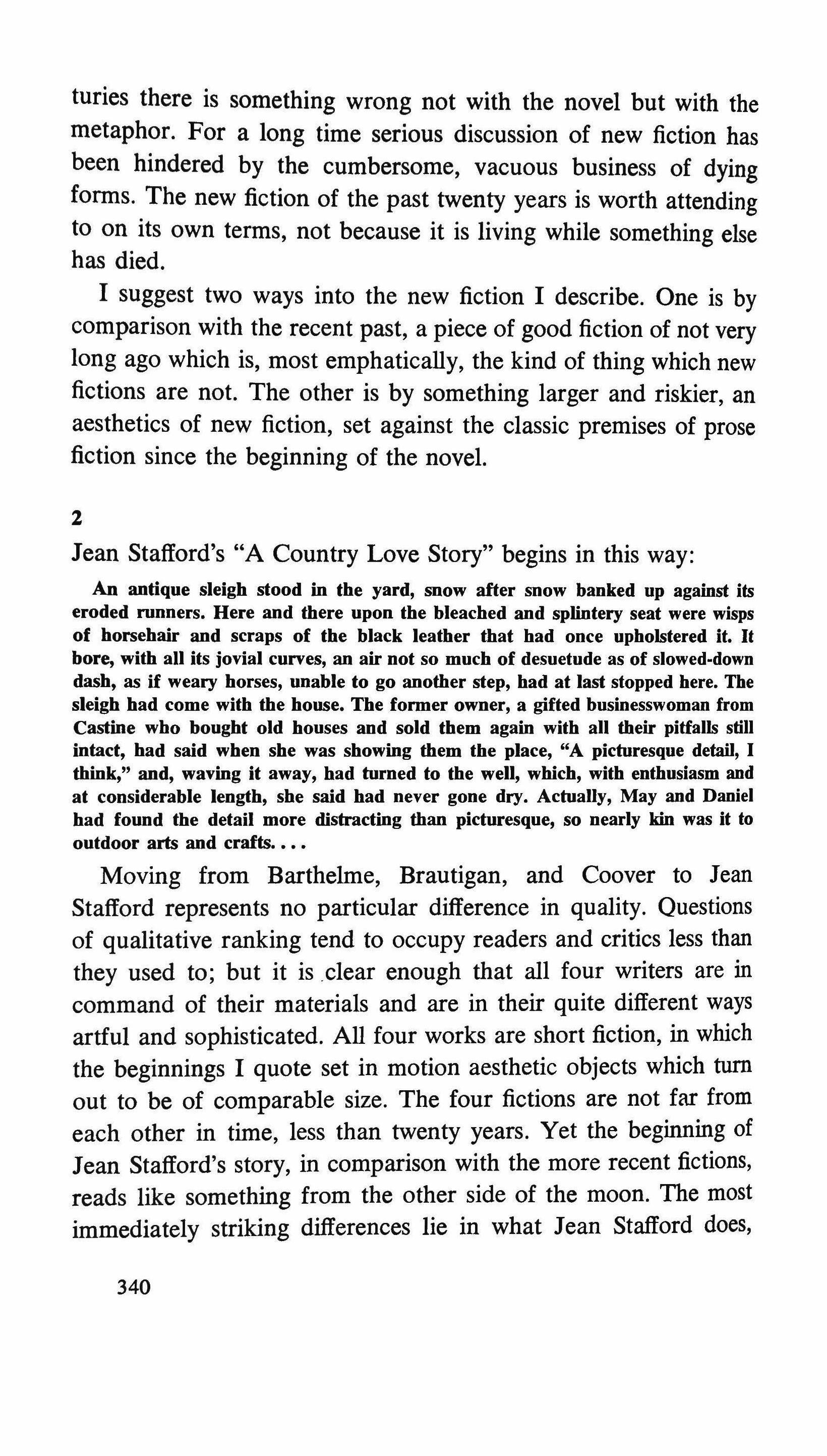
turies there is something wrong not with the novel but with the metaphor. For a long time serious discussion of new fiction has been hindered by the cumbersome, vacuous business of dying forms. The new fiction of the past twenty years is worth attending to on its own terms, not because it is living while something else has died.
I suggest two ways into the new fiction I describe. One is by comparison with the recent past, a piece of good fiction of not very long ago which is, most emphatically, the kind of thing which new fictions are not. The other is by something larger and riskier, an aesthetics of new fiction, set against the classic premises of prose fiction since the beginning of the novel.
2
Jean Stafford's "A Country Love Story" begins in this way:
An antique sleigh stood in the yard, snow after snow banked up against its eroded runners. Here and there upon the bleached and splintery seat were wisps of horsehair and scraps of the black leather that had once upholstered it. It bore, with all its jovial curves, an air not so much of desuetude as of slowed-down dash, as if weary horses, unable to go another step, had at last stopped here. The sleigh had come with the house. The former owner, a gifted businesswoman from Castine who bought old houses and sold them again with all their pitfalls still intact, had said when she was showing them the place, "A picturesque detail, I think," and, waving it away, had turned to the well, which, with enthusiasm and at considerable length, she said had never gone dry. Actually, May and Daniel had found the detail more distracting than picturesque, so nearly kin was it to outdoor arts and crafts.
Moving from Barthelme, Brautigan, and Coover to Jean Stafford represents no particular difference in quality. Questions of qualitative ranking tend to occupy readers and critics less than they used to; but it is .clear enough that all four writers are in command of their materials and are in their quite different ways artful and sophisticated. All four works are short fiction, in which the beginnings I quote set in motion aesthetic objects which turn out to be of comparable size. The four fictions are not far from each other in time, less than twenty years. Yet the beginning of Jean Stafford's story, in comparison with the more recent fictions, reads like something from the other side of the moon. The most immediately striking differences lie in what Jean Stafford does,
340
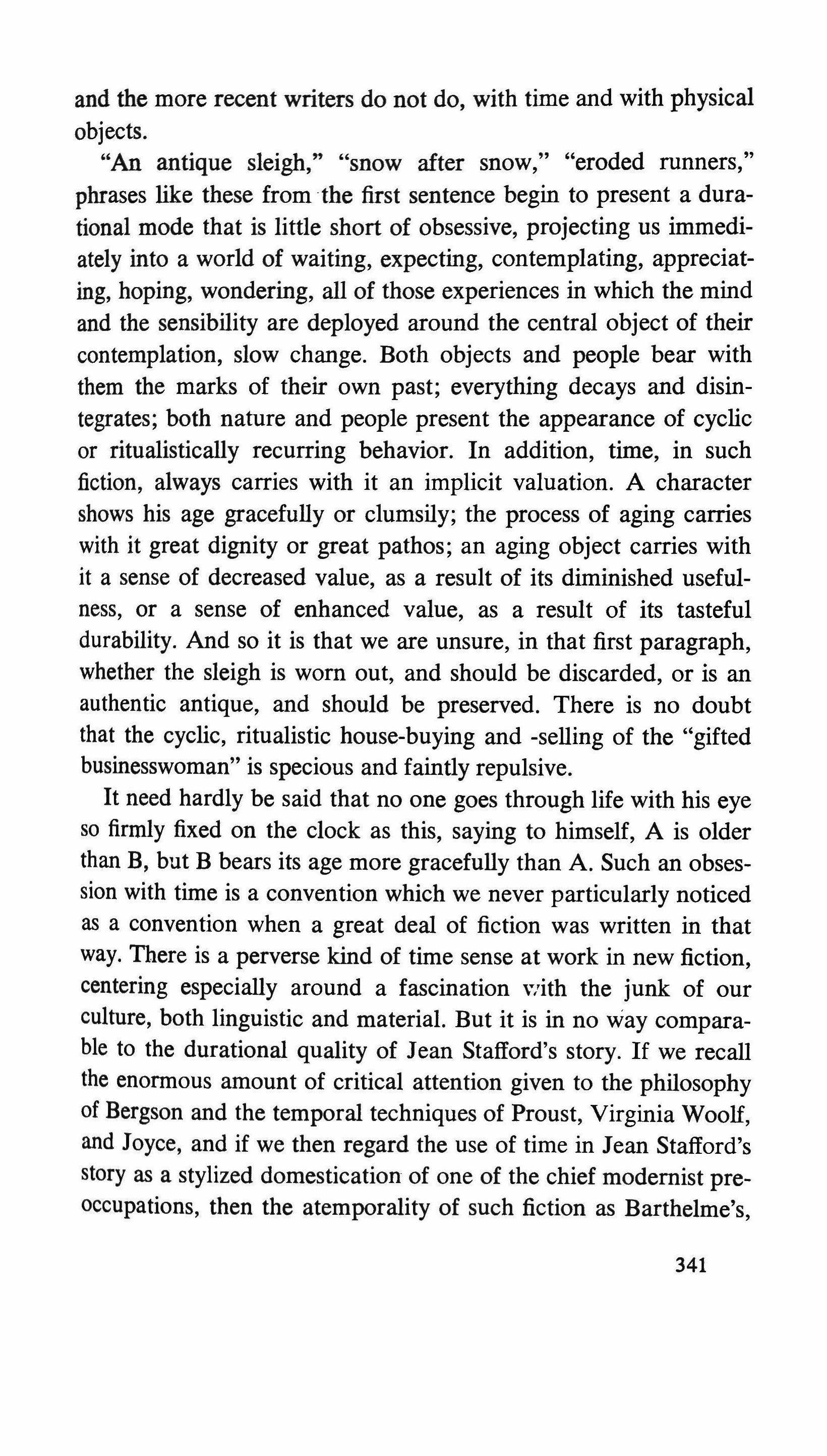
and the more recent writers do not do, with time and with physical objects.
"An antique sleigh," "snow after snow," "eroded runners," phrases like these from the first sentence begin to present a durational mode that is little short of obsessive, projecting us immediately into a world of waiting, expecting, contemplating, appreciating, hoping, wondering, all of those experiences in which the mind and the sensibility are deployed around the central object of their contemplation, slow change. Both objects and people bear with them the marks of their own past; everything decays and disintegrates; both nature and people present the appearance of cyclic or ritualistically recurring behavior. In addition, time, in such fiction, always carries with it an implicit valuation. A character shows his age gracefully or clumsily; the process of aging carries with it great dignity or great pathos; an aging object carries with it a sense of decreased value, as a result of its diminished usefulness, or a sense of enhanced value, as a result of its tasteful durability. And so it is that we are unsure, in that first paragraph, whether the sleigh is worn out, and should be discarded, or is an authentic antique, and should be preserved. There is no doubt that the cyclic, ritualistic house-buying and -selling of the "gifted businesswoman" is specious and faintly repulsive.
It need hardly be said that no one goes through life with his eye so firmly fixed on the clock as this, saying to himself, A is older than B, but B bears its age more gracefully than A. Such an obsession with time is a convention which we never particularly noticed as a convention when a great deal of fiction was written in that way. There is a perverse kind of time sense at work in new fiction, centering especially around a fascination with the junk of our culture, both linguistic and material. But it is in no way comparable to the durational quality of Jean Stafford's story. If we recall the enormous amount of critical attention given to the philosophy of Bergson and the temporal techniques of Proust, Virginia Woolf, and Joyce, and if we then regard the use of time in Jean Stafford's story as a stylized domestication of one of the chief modernist preoccupations, then the atemporality of such fiction as Barthelme's, 341

the indifference to slow change and the lack of interest in the valueconferring process I have described all become highly significant. The high-handed atemporality of new fiction is a remarkable abandonment of a set of conventions and an epistemic orientation that we had grown accustomed to thinking absolutely essential to the fictive act.
Secondly, to return to Jean Stafford's paragraph, a set of relationships is evoked between two different modes of existence, in this case the man-made object and the forces of the natural world, and these relationships are played upon in a symbolistic way. The function of a sleigh is to ride on the snow, not be covered by it. And we know, even from the first sentence, that the presence of the sleigh, immobile and nonfunctional, will be made into a metaphor, charged with a flexible, ironic, noncommittal value, a metaphor for the presence of man in the world. As in the case of time, such a man-nature dichotomy, as a center for a symbolistic charge of meaning, is a convention, present in a large amount of modernist fiction, extended and refined in the kind of sensibility fiction which Jean Stafford represents. But here again it is a convention of no use to new fiction, in which the made and the born, the authentic and the schlock, the natural and the manufactured are all taken as the given data of a difficult world which simply cannot be divided into two halves.
Thirdly, there is, in Jean Stafford's story, the presence of the thing itself, an object pulled out of the background and conspicuously placed before our attention, described from a double viewpoint, near and far, given a touch of the pathetic fallacy (the sleigh has "jovial curves"), and above all invested with "taste."
The sleigh, of course, is a chameleon image and is in good taste or bad according to its human context. And it is a marvelously versatile structural device, which compresses and gathers together a number of attitudes axial to the story that follows. But there is not much doubt that the image of the sleigh is more than a trope or a structural device to Jean Stafford and her readers; it is a thing, with intricacy of contour, complexity of texture, solidity, and the marks of its own past. Whatever its usefulness in the story,
342
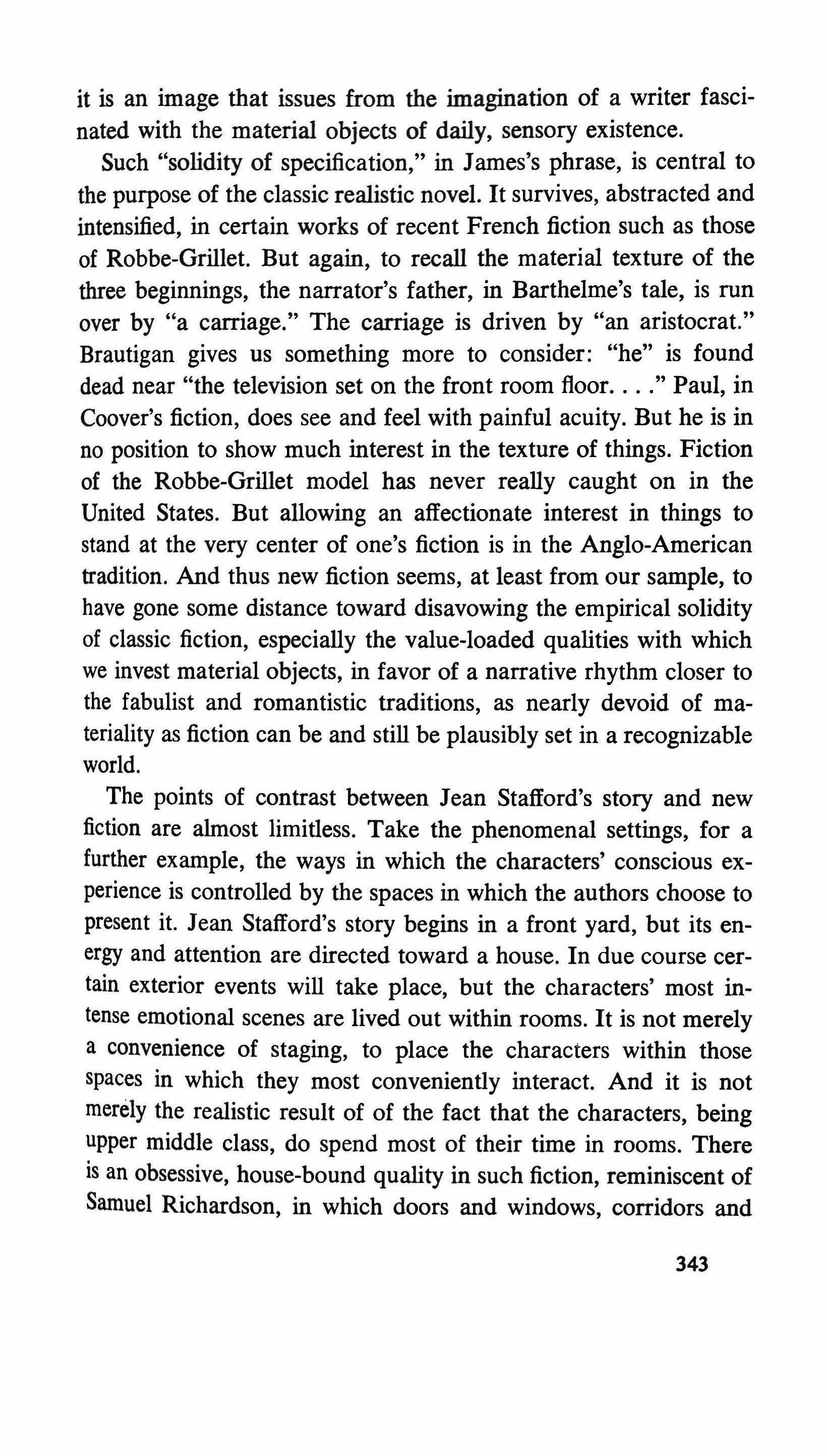
it is an image that issues from the imagination of a writer fascinated with the material objects of daily, sensory existence. Such "solidity of specification," in James's phrase, is central to the purpose of the classic realistic novel. It survives, abstracted and intensified, in certain works of recent French fiction such as those of Robbe-Grillet. But again, to recall the material texture of the three beginnings, the narrator's father, in Barthelme's tale, is run over by "a carriage." The carriage is driven by "an aristocrat." Brautigan gives us something more to consider: "he" is found dead near "the television set on the front room floor Paul, in Coover's fiction, does see and feel with painful acuity. But he is in no position to show much interest in the texture of things. Fiction of the Robbe-Grillet model has never really caught on in the United States. But allowing an affectionate interest in things to stand at the very center of one's fiction is in the Anglo-American tradition. And thus new fiction seems, at least from our sample, to have gone some distance toward disavowing the empirical solidity of classic fiction, especially the value-loaded qualities with which we invest material objects, in favor of a narrative rhythm closer to the fabulist and romantistic traditions, as nearly devoid of materiality as fiction can be and still be plausibly set in a recognizable world.
The points of contrast between Jean Stafford's story and new fiction are almost limitless. Take the phenomenal settings, for a further example, the ways in which the characters' conscious experience is controlled by the spaces in which the authors choose to present it. Jean Stafford's story begins in a front yard, but its energy and attention are directed toward a house. In due course certain exterior events will take place, but the characters' most intense emotional scenes are lived out within rooms. It is not merely a convenience of staging, to place the characters within those spaces in which they most conveniently interact. And it is not merely the realistic result of of the fact that the characters, being upper middle class, do spend most of their time in rooms. There is an obsessive, house-bound quality in such fiction, reminiscent of Samuel Richardson, in which doors and windows, corridors and 343
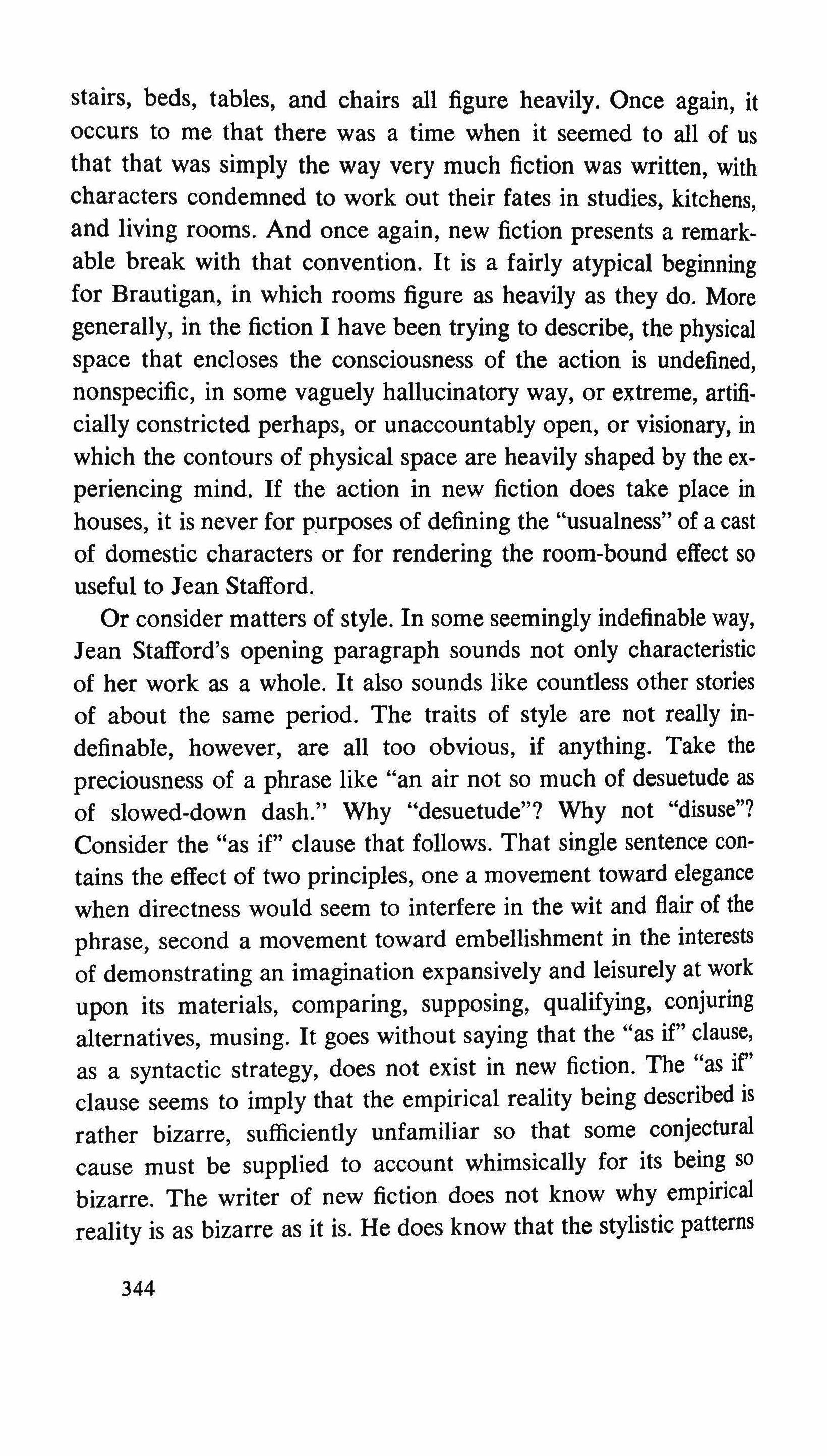
stairs, beds, tables, and chairs all figure heavily. Once again, it occurs to me that there was a time when it seemed to all of us that that was simply the way very much fiction was written, with characters condemned to work out their fates in studies, kitchens, and living rooms. And once again, new fiction presents a remarkable break with that convention. It is a fairly atypical beginning for Brautigan, in which rooms figure as heavily as they do. More generally, in the fiction I have been trying to describe, the physical space that encloses the consciousness of the action is undefined, nonspecific, in some vaguely hallucinatory way, or extreme, artificially constricted perhaps, or unaccountably open, or visionary, in which the contours of physical space are heavily shaped by the experiencing mind. If the action in new fiction does take place in houses, it is never for purposes of defining the "usualness" of a cast of domestic characters or for rendering the room-bound effect so useful to Jean Stafford.
Or consider matters of style. In some seemingly indefinable way, Jean Stafford's opening paragraph sounds not only characteristic of her work as a whole. It also sounds like countless other stories of about the same period. The traits of style are not really indefinable, however, are all too obvious, if anything. Take the preciousness of a phrase like "an air not so much of desuetude as of slowed-down dash." Why "desuetude"? Why not "disuse"?
Consider the "as if" clause that follows. That single sentence contains the effect of two principles, one a movement toward elegance when directness would seem to interfere in the wit and flair of the phrase, second a movement toward embellishment in the interests of demonstrating an imagination expansively and leisurely at work upon its materials, comparing, supposing, qualifying, conjuring alternatives, musing. It goes without saying that the "as if" clause, as a syntactic strategy, does not exist in new fiction. The "as if' clause seems to imply that the empirical reality being described is rather bizarre, sufficiently unfamiliar so that some conjectural cause must be supplied to account whimsically for its being so bizarre. The writer of new fiction does not know why empirical reality is as bizarre as it is. He does know that the stylistic patterns
344

which render the introspective, contemplative, domestic imagination of the fiction of the fifties are unavailable to him.
It is probably by its structure that we are best equipped to recognize the difference between fiction that seems to be classic modernist and fiction that seems to be audacious or experimental in some distinctly new way. In Jean Stafford's story, the events consist of tensions made only partly overt, harsh words, misunderstandings. Any sharply exterior events clearly exist to figure forth the moral and psychological dynamics of the characters. Ultimately the story ends with a kind of plateau of understanding toward which the rest of the fiction has worked. Epiphany is too facile and imprecise a word for what happens at the end of the story. It is a moment both of resignation and of awesome frustration in the face of the future, and any word, such as epiphany, which implies sudden insight is misleading. Still, the structure of the story is in the tradition of epiphany fiction, which is to say that it values the private and the domestic over the public and the external, that it demonstrates a belief in the possibility that an intuitive self-knowledge can cut through accumulations of social ritual and self-deception, a belief so firm that it permits the intuitive act to serve as dramatic end point and structural principle, indeed as the very moral justification for the fiction.
It takes only a sentence or two of Barthelme, Brautigan, and Coover to recognize how far they are from epiphanic form. All three tend to find more interest in the public than in the private, in the external than the internal, in the freakish and extreme than the middle range of experience. Nothing in the beginnings of the three fictions points to or seems to create the enabling conditions for the epiphanic illumination. None of the three writers seems to have much interest in such intuitive insights, perhaps not even much belief that they exist. And thus we do not need to read to the ends of the three fictions to know that their structures are antithetical to what is the most conventionalized, imitated, standardized feature of modernist fiction, especially shorter fiction, of the last generation, the epiphanic illumination, or, as in Jean Stafford, the self-generated plateau of understanding which tran345

scends the plane of social conventionality and habitual self-deception which has made the self-understanding both possible and necessary.
As for the three examples, it is hard to say what structural prinjciples underlie their composition. Perhaps the best way to ap�roach the question of structure is to jettison the word structure altogether. Structure, whether we wish it to or not, carries with it ,connotations of economy, symmetry, accountable proportion, orIganic form. If pressed, most of us could apply any of those conmoted values to any well-known piece of modernist fiction, certainly to Jean Stafford's story, could construct a systematic analysis by means of which every event, every image, every word could be accounted for by aesthetic principles apparently derived from the work itself. I do not think that that habit of mind is appropriate to the three examples and I do not think that that relent'lessness of method will carry us very far. "We like books," says one of the characters in a well-known passage of Barthelme's Snow White, "that have a lot of dreck in them, matter which presents .itself as not wholly relevant (or indeed, at all relevant) but which, 'carefully attended to, can supply a kind of 'sense' of what is going on. This 'sense' is not to be obtained by reading between the lines (for there is nothing there, in those white spaces) but by reading the lines themselves-looking at them and so arriving at a feeling not of satisfaction exactly, that is too much to expect, but of having read them, of having 'completed' them."
All three of our exemplary new fictions extend themselves in ways that are more additive than dramatic or progressive. In the barest and still the best definition of form, Kenneth Burke writes, "Form in literature is an arousing and fulfillment of desires. A work has form in so far as one part of it leads a reader to anticipate another part, to be gratified by the sequence." 3 Basically such "desires" in shorter fiction are of three kinds: problematic, psychological, and conventional. We have a problematic desire when we have a secret to be discovered during the course of the fiction, a relationship to be perceived, a motive to be revealed. When the problem is resolved our "desire" is "fulfilled." We have
346

a psychological desire when we expect a mental process within the fiction to run its course, self-ignorance to proceed to self-knowledge, perhaps, or personal hostility to proceed to personal accommodation. When the psychological process is complete, when the character has come to know what we have expected he must know, then our "desire" is "fulfilled." We have a conventional desire when we are led to expect events, devices, and tonal manipulations typical of the genre. Jean Stafford's story is full of such conventional desires and fulfillments, the sophisticated mastery of the characters alternating with their humiliation and ineffectuality, the compassion of the author alternating with her ironic distance; the diminuendo into generalized pathos at the end, all of these being typical of the genre. In our three exemplary fictions there is no problematic desire: each begins with a death but our natural tendency to see a fictional death as a problem, to ask why, where, by whose hand, in what manner, is dissolved by the fact that in Barthelme and Brautigan we are told all that we need to know at once, in so unproblematic a way that no residue of curiosity remains, and in Coover, while the manner of death extends over the duration of the fiction, there is nothing that we might wish to know, as a key to understanding the death. In none of the three fictions is there any interplay between the psychological desires which the reader might project into the fiction and the fulfillment of them: the characters are constructs, types, quite deliberately devoid of much inner life. What they know they gather by bits and pieces. If they solve a problem, the solution becomes a new problem and nothing is gained. Needless to say the three fictions do not give us much in the way of conventional form. An alternative to saying that the fictions are formless, which sounds gratuitously pejorative, is to extend the idea of form, beyond the linear progression defined by Burke, toward something more mosaic, or concentric, or circular, an idea of form which is, as I suggested at the beginning of the paragraph, additive, in which the work grows by certain loosely associative principles but not with the covert purpose of arousing and fulfilling our desires at all.
The three fictions are, in different ways, variations around a
347
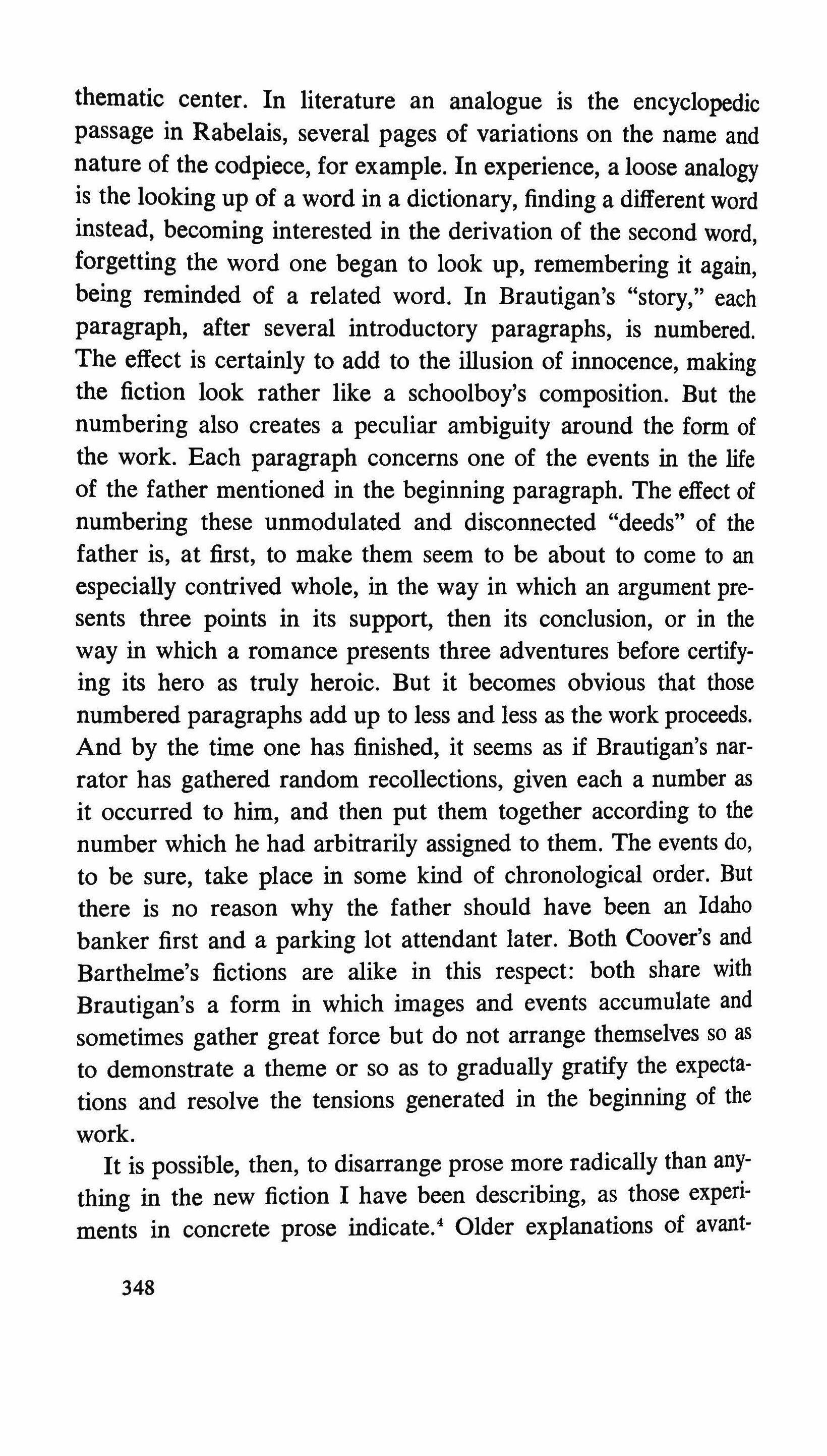
thematic center. In literature an analogue is the encyclopedic passage in Rabelais, several pages of variations on the name and nature of the codpiece, for example. In experience, a loose analogy is the looking up of a word in a dictionary, finding a different word instead, becoming interested in the derivation of the second word, forgetting the word one began to look up, remembering it again, being reminded of a related word. In Brautigan's "story," each paragraph, after several introductory paragraphs, is numbered. The effect is certainly to add to the illusion of innocence, making the fiction look rather like a schoolboy'S composition. But the numbering also creates a peculiar ambiguity around the form of the work. Each paragraph concerns one of the events in the life of the father mentioned in the beginning paragraph. The effect of numbering these unmodulated and disconnected "deeds" of the father is, at first, to make them seem to be about to come to an especially contrived whole, in the way in which an argument presents three points in its support, then its conclusion, or in the way in which a romance presents three adventures before certifying its hero as truly heroic. But it becomes obvious that those numbered paragraphs add up to less and less as the work proceeds. And by the time one has finished, it seems as if Brautigan's narrator has gathered random recollections, given each a number as it occurred to him, and then put them together according to the number which he had arbitrarily assigned to them. The events do, to be sure, take place in some kind of chronological order. But there is no reason why the father should have been an Idaho banker first and a parking lot attendant later. Both Coover's and Barthelme's fictions are alike in this respect: both share with Brautigan's a form in which images and events accumulate and sometimes gather great force but do not arrange themselves so as to demonstrate a theme or so as to gradually gratify the expectations and resolve the tensions generated in the beginning of the work.
It is possible, then, to disarrange prose more radically than anything in the new fiction I have been describing, as those experiments in concrete prose indicate.' Older explanations of avant-
348
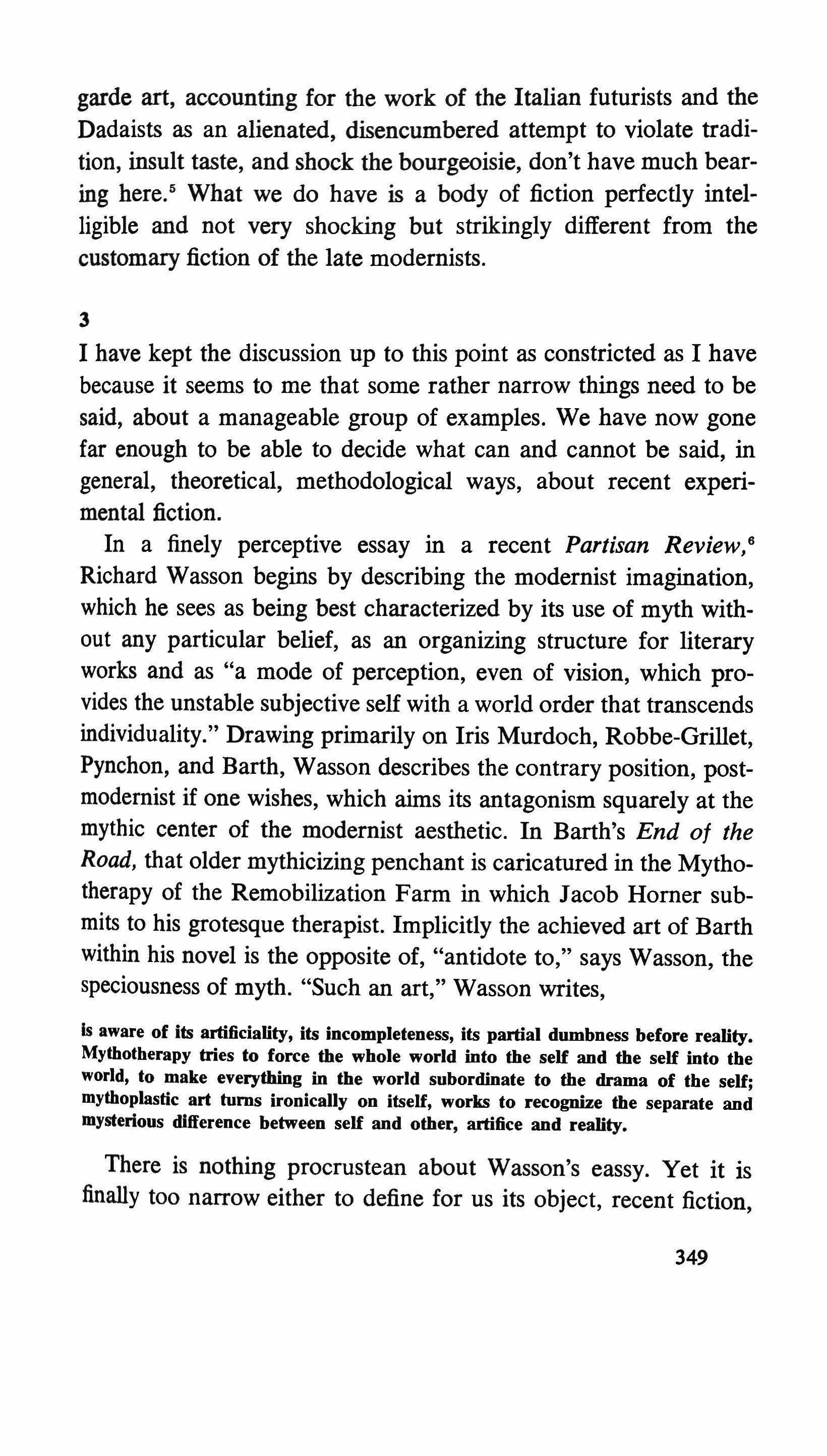
garde art, accounting for the work of the Italian futurists and the Dadaists as an alienated, disencumbered attempt to violate tradition, insult taste, and shock the bourgeoisie, don't have much bearing here." What we do have is a body of fiction perfectly intelligible and not very shocking but strikingly different from the customary fiction of the late modernists.
3
I have kept the discussion up to this point as constricted as I have because it seems to me that some rather narrow things need to be said, about a manageable group of examples. We have now gone far enough to be able to decide what can and cannot be said, in general, theoretical, methodological ways, about recent experimental fiction.
In a finely perceptive essay in a recent Partisan Review, 6 Richard Wasson begins by describing the modernist imagination, which he sees as being best characterized by its use of myth without any particular belief, as an organizing structure for literary works and as "a mode of perception, even of vision, which provides the unstable subjective self with a world order that transcends individuality." Drawing primarily on Iris Murdoch, Robbe-Grillet, Pynchon, and Barth, Wasson describes the contrary position, postmodernist if one wishes, which aims its antagonism squarely at the mythic center of the modernist aesthetic. In Barth's End of the Road, that older mythicizing penchant is caricatured in the Mythotherapy of the Remobilization Farm in which Jacob Horner submits to his grotesque therapist. Implicitly the achieved art of Barth within his novel is the opposite of, "antidote to," says Wasson, the speciousness of myth. "Such an art," Wasson writes,
Is aware of its artificiality, its incompleteness, its partial dumbness before reality. Mytbotherapy tries to force the whole world into the self and the self into the world, to make everything in the world subordinate to the drama of the self; mytboplastic art turns ironically on itself, works to recognize the separate and mysterious difference between self and other, artifice and reality.
There is nothing procrustean about Wasson's eassy. Yet it is finally too narrow either to define for us its object, recent fiction, 349

or to layout for us a method and a theoretical center. It is partly not Wasson's fault at all but merely the result of writing about something which is still happening; the volume of fiction in the Barth-Pynchon mode grows year by year and each year looks a little different in its totality. Certain features of Wasson's description apply to anybody who strikes us as non-traditional (his remarks on the diminishing interest in the drama of the self seem to me most durable), but if the import of Barth's End of the Road and the aesthetic of the end of myth are really at the center of recent fiction, it is hard to know how to account for Coover's The Universal Baseball Association, which is, in some legitimate sense, quite relentlessly mythic, or Gass's Omensetter's Luck, or Gardner's Grendel, which are, in ways quite different from each other, also mythic, all three of which are indisputably of the non-traditional mode we are considering. Joyce Carol Oates, in an interview, speaks of her intention to rewrite, in her own terms, a number of classic works of fiction, an enterprise rather Borgesian, very neomodern, and quite mythic. Even Barth himself will not hold still but destroys myth with one book, only to revive it in several of the fictions of Lost in the Funhouse.
It is sometimes said, by Philip Roth, for example, in his essay "Writing American Fiction," 7 that recent fiction has a bizarre, neurotic quality precisely in response to the bizarre quality of American life in the last decade. Locating the cause of the discontinuities and extremities of recent fiction in the extremities of social fact doesn't help us very much, however. Here is Roth on that set of relationships:
The American writer in the middle of the twentieth century has his hands full in trying to understand, and then describe, and then make credible much of the American reality. It stupefies, it sickens, it infuriates, and finally it is even a kind of embarrassment to one's own meager imagination. The actuality is continually outdoing our talents, and the culture tosses up figures almost daily that are the envy of any novelist. Who, for example, could have invented Charles Van Doren? Roy Cohn and David Schine? Sherman Adams and Bernard Goldfine? Dwight David Eisenhower?
Those names! One realizes as the passage proceeds that the essay was written in the early sixties about the dear, dull fifties, and that
350
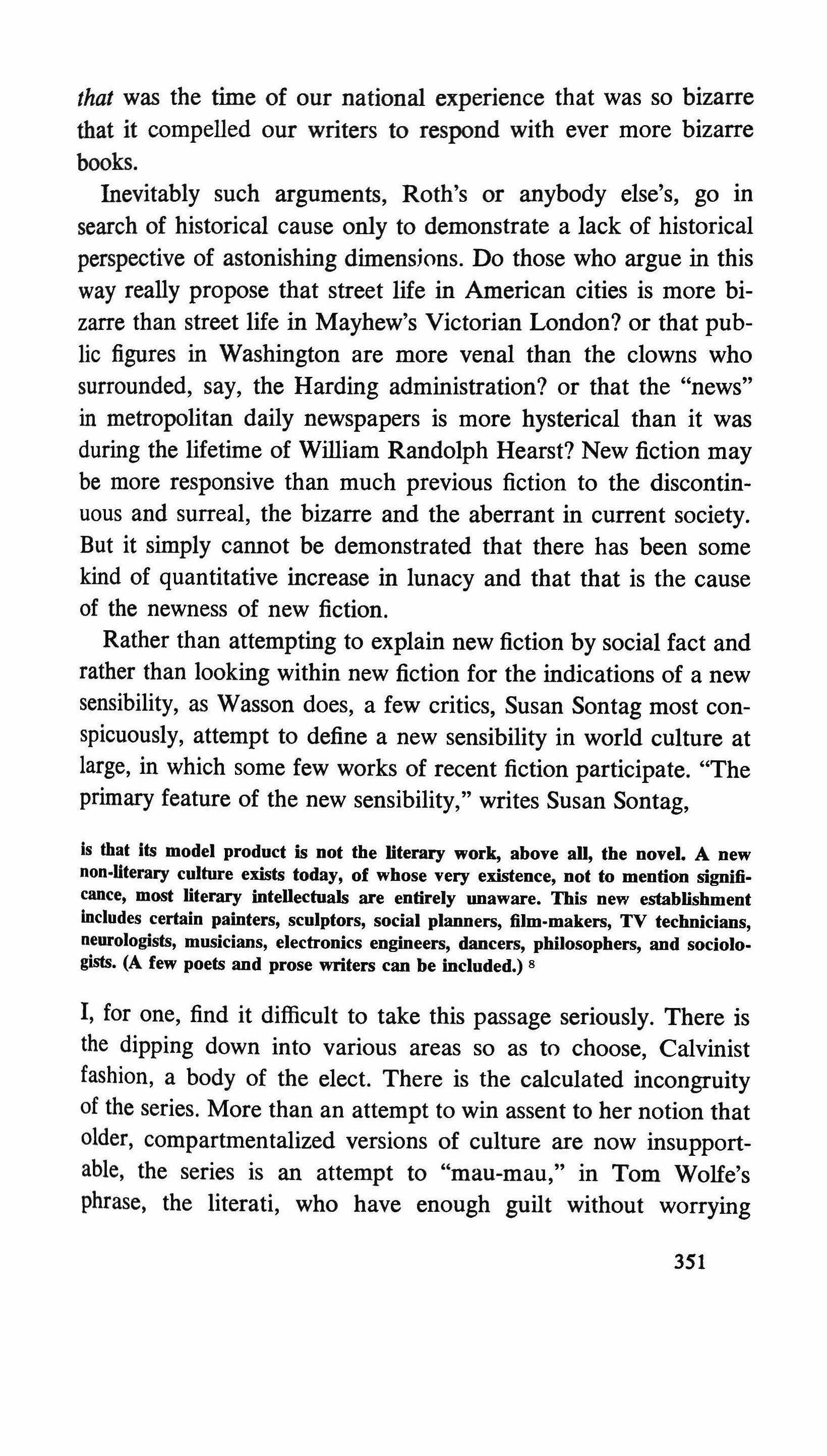
that was the time of our national experience that was so bizarre that it compelled our writers to respond with ever more bizarre books.
Inevitably such arguments, Roth's or anybody else's, go in search of historical cause only to demonstrate a lack of historical perspective of astonishing dimensions. Do those who argue in this way really propose that street life in American cities is more bizarre than street life in Mayhew's Victorian London? or that public figures in Washington are more venal than the clowns who surrounded, say, the Harding administration? or that the "news" in metropolitan daily newspapers is more hysterical than it was during the lifetime of William Randolph Hearst? New fiction may be more responsive than much previous fiction to the discontinuous and surreal, the bizarre and the aberrant in current society. But it simply cannot be demonstrated that there has been some kind of quantitative increase in lunacy and that that is the cause of the newness of new fiction.
Rather than attempting to explain new fiction by social fact and rather than looking within new fiction for the indications of a new sensibility, as Wasson does, a few critics, Susan Sontag most conspicuously, attempt to define a new sensibility in world culture at large, in which some few works of recent fiction participate. "The primary feature of the new sensibility," writes Susan Sontag,
Is that its model product is not the literary work, above all, the novel. A new non.literary culture exists today, of whose very existence, not to mention signifi· cance, most literary intellectuals are entirely unaware. This new establishment includes certain painters, sculptors, social planners, film-makers, TV technicians, neurologists, musicians, electronics engineers, dancers, philosophers, and soclofogists. (A few poets and prose writers can be included.) 8
I, for one, find it difficult to take this passage seriously. There is the dipping down into various areas so as to choose, Calvinist fashion, a body of the elect. There is the calculated incongruity of the series. More than an attempt to win assent to her notion that older, compartmentalized versions of culture are now insupportable, the series is an attempt to "mau-mau," in Tom Wolfe's phrase, the literati, who have enough guilt without worrying
351
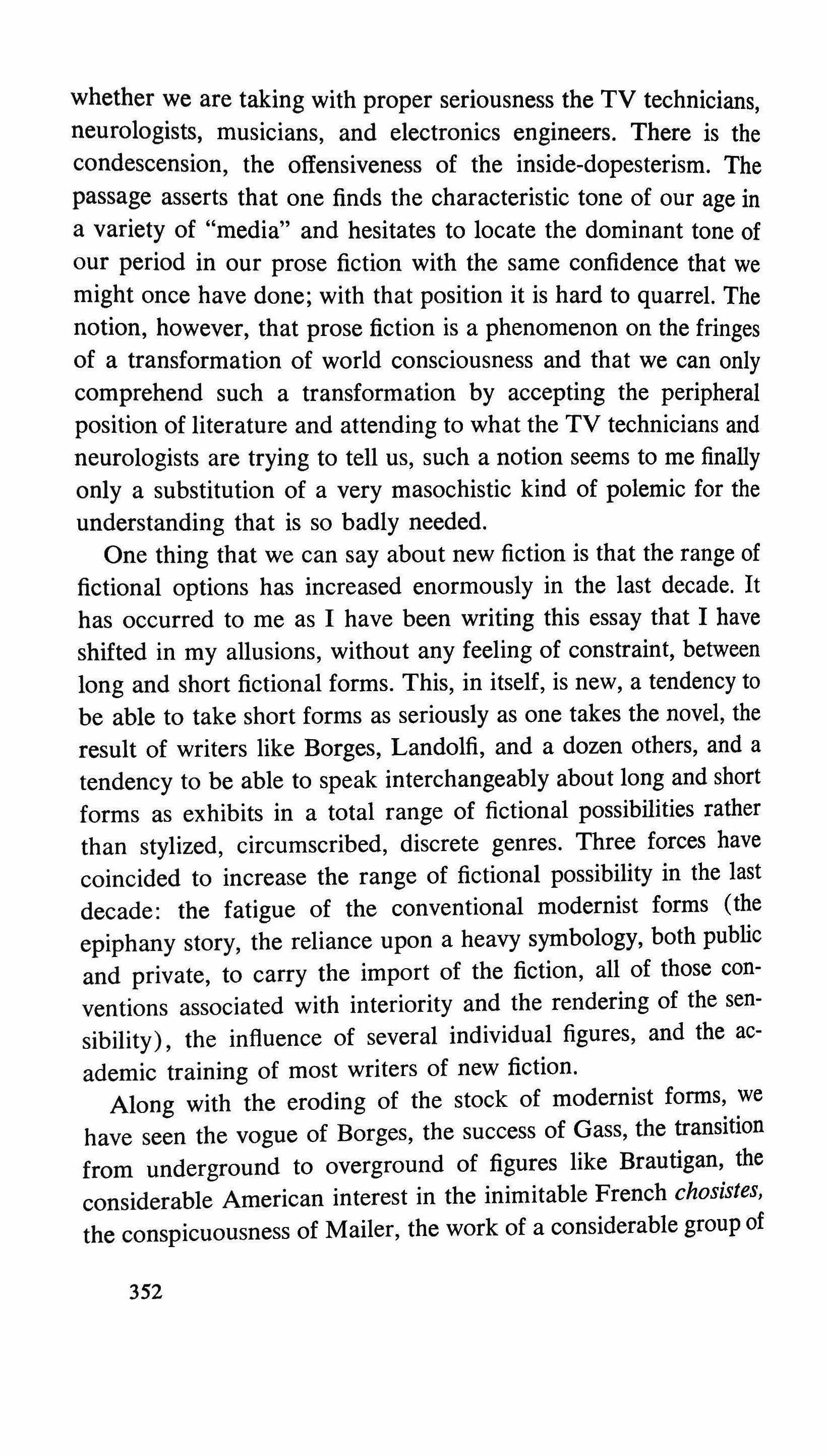
whether we are taking with proper seriousness the TV technicians, neurologists, musicians, and electronics engineers. There is the condescension, the offensiveness of the inside-dopesterism. The passage asserts that one finds the characteristic tone of our age in a variety of "media" and hesitates to locate the dominant tone of our period in our prose fiction with the same confidence that we might once have done; with that position it is hard to quarrel. The notion, however, that prose fiction is a phenomenon on the fringes of a transformation of world consciousness and that we can only comprehend such a transformation by accepting the peripheral position of literature and attending to what the TV technicians and neurologists are trying to tell us, such a notion seems to me finally only a substitution of a very masochistic kind of polemic for the understanding that is so badly needed.
One thing that we can say about new fiction is that the range of fictional options has increased enormously in the last decade. It has occurred to me as I have been writing this essay that I have shifted in my allusions, without any feeling of constraint, between long and short fictional forms. This, in itself, is new, a tendency to be able to take short forms as seriously as one takes the novel, the result of writers like Borges, Landolfi, and a dozen others, and a tendency to be able to speak interchangeably about long and short forms as exhibits in a total range of fictional possibilities rather than stylized, circumscribed, discrete genres. Three forces have coincided to increase the range of fictional possibility in the last decade: the fatigue of the conventional modernist forms (the epiphany story, the reliance upon a heavy symbology, both public and private, to carry the import of the fiction, all of those conventions associated with interiority and the rendering of the sensibility), the influence of several individual figures, and the academic training of most writers of new fiction. Along with the eroding of the stock of modernist forms, we have seen the vogue of Borges, the success of Gass, the transition from underground to overground of figures like Brautigan, the considerable American interest in the inimitable French chosistes, the conspicuousness of Mailer, the work of a considerable group of
352

extraordinary journalists and virtuosi of the tape recorder extending from Tom Wolfe to Studs Terkel to Oscar Lewis, a collection of models remarkable for the way in which they all stretch the boundaries of fiction. In a recent issue of TriQuarterly a work appears entitled "Abandoned Cities" by Jack Anderson, consisting of four entries, descriptions, rather mock descriptions, of four cities. One of them is titled "Bismarck, North Dakota" and it begins in this way. "There are no suburbs. The streets stop at the wheatfields, where the iron helmets are set on black sticks to frighten off eagles. Beyond this point, the wind begins, as hard to ignore as stomachache. The townspeople fear two things always: drought and frost." Before the erosion of the modernist forms and before the interest in a dozen figures had done its work on what we thought fiction ought to be, no periodical would have known what to do with "Abandoned Cities." No readers would have known how to respond to it. And its author would not have known it could be written.
It is perhaps the academic training and associations of so many practitioners of new fiction that is most difficult to come to terms with. The old prejudices hang on and we continue to think, despite all the evidence to the contrary, that there is something about the academy that is irreconcilably opposed to the imagination of the writer, something stifling, cloying, deadening. Even those of us who are academics still take a special pleasure in the fading but still vital image of Dylan Thomas telling dirty stories to Bryn Mawr girls. I suppose, reaching into our literary past, there would have been something destructive had Dreiser or Crane or Bierce or any of the Redskins of our literary history picked up a position as a writer in residence. Yet, God knows, the lives of most of our Redskins were tortured enough and who is to say that a tenured position as professor of English and teacher of creative writing would have led them to do worse work than they did. Of our three exemplary figures, Coover has moved in and out of the academy; neither Brautigan nor Barthelme, so far as I know, has had anything to do with academic life since their emergence as writers although Brautigan is obviously more learned than he contrives to 353
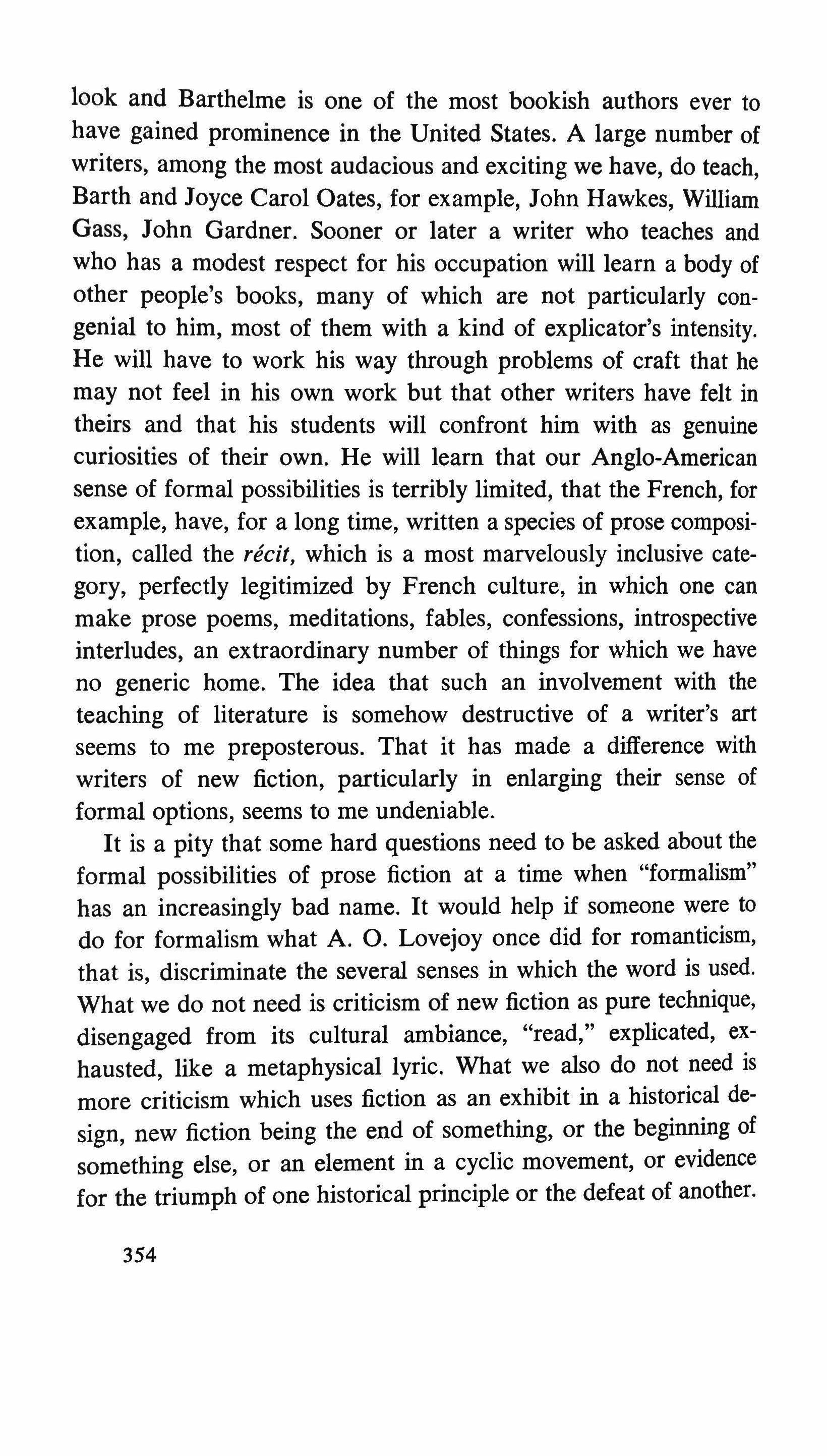
look and Barthelme is one of the most bookish authors ever to have gained prominence in the United States. A large number of writers, among the most audacious and exciting we have, do teach, Barth and Joyce Carol Oates, for example, John Hawkes, William Gass, John Gardner. Sooner or later a writer who teaches and who has a modest respect for his occupation will learn a body of other people's books, many of which are not particularly congenial to him, most of them with a kind of explicator's intensity. He will have to work his way through problems of craft that he may not feel in his own work but that other writers have felt in theirs and that his students will confront him with as genuine curiosities of their own. He will learn that our Anglo-American sense of formal possibilities is terribly limited, that the French, for example, have, for a long time, written a species of prose composition, called the recit, which is a most marvelously inclusive category, perfectly legitimized by French culture, in which one can make prose poems, meditations, fables, confessions, introspective interludes, an extraordinary number of things for which we have no generic home. The idea that such an involvement with the teaching of literature is somehow destructive of a writer's art seems to me preposterous. That it has made a difference with writers of new fiction, particularly in enlarging their sense of formal options, seems to me undeniable. It is a pity that some hard questions need to be asked about the formal possibilities of prose fiction at a time when "formalism" has an increasingly bad name. It would help if someone were to do for formalism what A. O. Lovejoy once did for romanticism, that is, discriminate the several senses in which the word is used.
What we do not need is criticism of new fiction as pure technique, disengaged from its cultural ambiance, "read," explicated, exhausted, like a metaphysical lyric. What we also do not need is more criticism which uses fiction as an exhibit in a historical design, new fiction being the end of something, or the beginning of something else, or an element in a cyclic movement, or evidence for the triumph of one historical principle or the defeat of another.
354

What we do need is an aesthetic of new fiction. As a step toward that aesthetic, I propose the axioms that follow.
1. New fiction, although aggressively non-traditional, shows less involvement with the. tradition of prose fiction than any fiction since the beginning of the novel. Nearly all fiction of any real quality reacts against some area of the fiction of its past: Cervantes against romance, Fielding against early Richardson and bad history, Thackeray against the Silver Fork School, Virginia Woolf against the late realists, and so on. There is much in the fiction of the past which writers of new fiction choose not to emulate. But it is extraordinary, for a body of fiction so non-traditional, how little of traditional fiction is struggled with, polemicized against, seriously parodied, denied, inverted, surmounted. New fiction, more than any fiction since Cervantes, chooses self-consciously to depart from tradition without investing that departure with any particular urgency or without making that act of departure the starting point of the fiction at all, in the way that such departure virtually animates the fiction of Cervantes, Fielding, Jane Austen, Flaubert, Hemingway, and a hundred others.
2. New fiction is the first substantial body of fiction that selfconsciously seeks an audience that is less than universal, attempting to establish a community of sensibility that is willfully limited. It is the fate of the novel to be a middle-class form and at the same time to be unaware that it is a middle-class form. No classic novelist ever set out to address the members of a particular class, or locality, or historical time. Every novelist's tacit assumption is that his book puts us in touch with "reality," not the reality of a highly specific class, not reality circumscribed by place and time: in that sense, every classic novelist's work is addressed to everybody, everywhere, to his own time and to posterity. Even those novelists who seem to us especially class-bound, Meredith and James let us say, would never have acknowledged that the truth of their books was specific, partial, local, and parochial. It is only the very minor figures such as Ronald Firbank who aim at a coterie public out of a recognition of their own exotic sensibilities. In the older neo-
355

modern figures such as Borges and Cortazar, Landolfi and Anderson Imbert, one has, precisely, exotic sensibilities going in quest of other exotic sensibilities for their readers. And in American writers like Barth, Heller, Pynchon, and Gass one has an extension of the phenomenon, fiction which is by no means coterie writing, precious and cynical in the manner of Firbank, but which willingly acknowledges the partiality of its truth, the oddity of its vision, and the limits of its audience.
3. New fiction contains and often intensifies the tendency in most fiction of any period to assimilate and transform the bad art of its own time. Wellek and Warren articulate such a principle, deriving it from the Russian formalists. They summarize: "Shklovsky, one of the Russian formalists, holds that new art forms are 'simply the canonization of inferior (sub-literary) genres.' Dostoevsky's novels are a series of glorified crime novels, romans a sensation, 'Pushkin's lyrics come from album verses, Blok's from gipsy songs, Mayakovsky's from funny-paper poetry.' Bertolt Brecht in German and Auden in English both show the deliberate attempt at this transformation of popular poetry into serious literature. This might be called the view that literature needs constantly to renew itself by 'rebarbarization.''' 9 We read Joyce, amused and entertained with the assimilation of the popular songs, headlines, religious tracts, and pornographic fiction into the texture of Ulysses. We may very well read new fiction, however, with dismay and irritation, because the bad art which is being assimilated is our bad art, what most of us have become accustomed to thinking of as a threat to the very survival of mind. Thus it is that new fiction, while extending a principle common to very much fiction, seems more audacious and abrasive than it really is, because it willingly occupies a place at what William Gass, following Barthelme, calls "the leading edge of the trash phenomenon."
4. New fiction consolidates an attempt rare in fiction before the modern period to present elements of its texture as devoid of value; yet new fiction, in contrast to certain areas of modern fiction, seeks this value-less quality not as an act of subtraction, or dehumanization, or metaphysical mystification, not as a gesture of
356
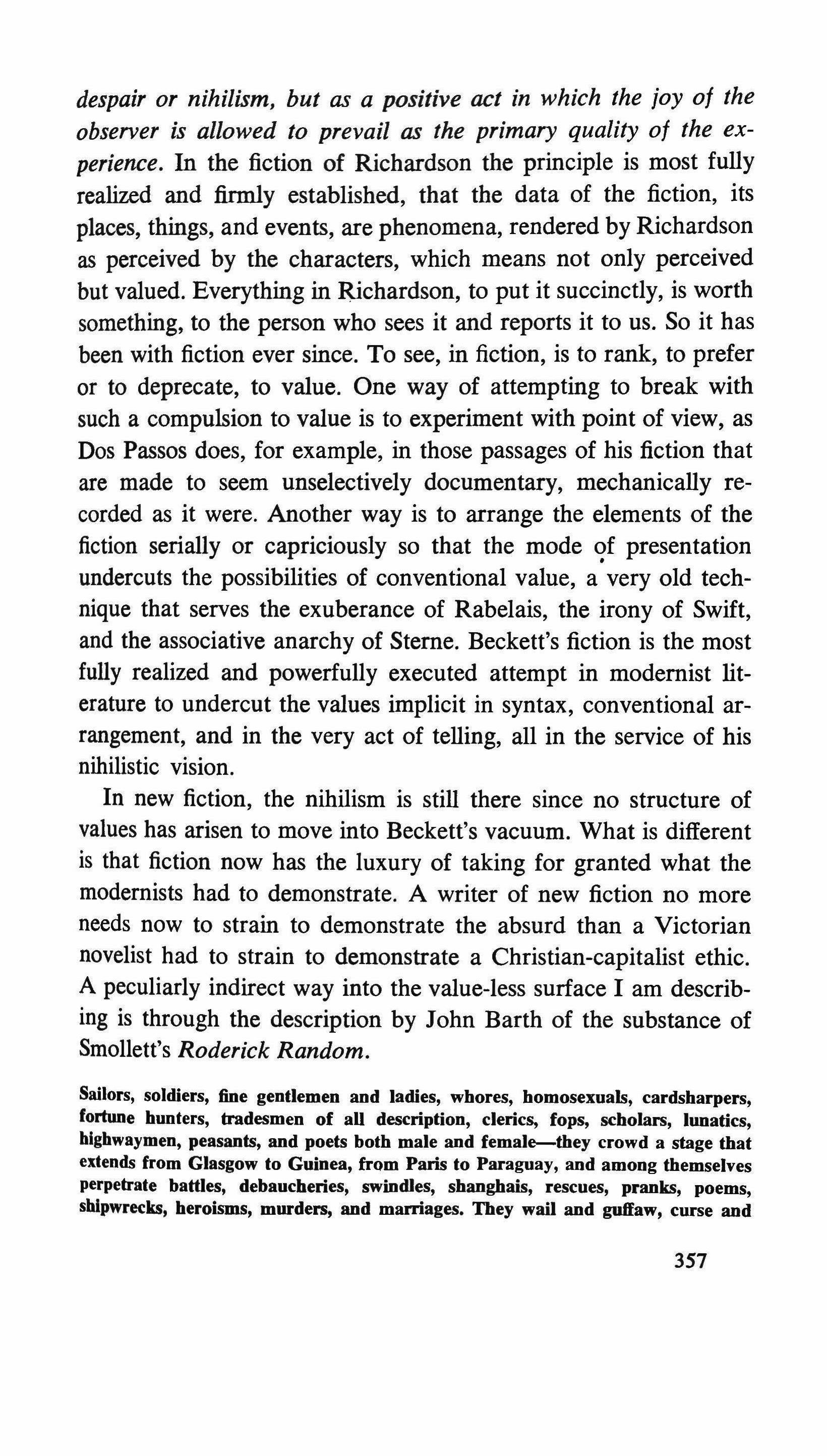
despair or nihilism, but as a positive act in which the joy 0/ the observer is allowed to prevail as the primary quality 0/ the experience. In the fiction of Richardson the principle is most fully realized and firmly established, that the data of the fiction, its places, things, and events, are phenomena, rendered by Richardson as perceived by the characters, which means not only perceived but valued. Everything in Richardson, to put it succinctly, is worth something, to the person who sees it and reports it to us. So it has been with fiction ever since. To see, in fiction, is to rank, to prefer or to deprecate, to value. One way of attempting to break with such a compulsion to value is to experiment with point of view, as Dos Passos does, for example, in those passages of his fiction that are made to seem unselectively documentary, mechanically recorded as it were. Another way is to arrange the elements of the fiction serially or capriciously so that the mode �f presentation undercuts the possibilities of conventional value, a very old technique that serves the exuberance of Rabelais, the irony of Swift, and the associative anarchy of Sterne. Beckett's fiction is the most fully realized and powerfully executed attempt in modernist literature to undercut the values implicit in syntax, conventional arrangement, and in the very act of telling, all in the service of his nihilistic vision.
In new fiction, the nihilism is still there since no structure of values has arisen to move into Beckett's vacuum. What is different is that fiction now has the luxury of taking for granted what the modernists had to demonstrate. A writer of new fiction no more needs now to strain to demonstrate the absurd than a Victorian novelist had to strain to demonstrate a Christian-capitalist ethic. A peculiarly indirect way into the value-less surface I am describing is through the description by John Barth of the substance of Smollett's Roderick Random.
Sailors, soldiers, fine gentlemen and ladies, whores, homosexuals, cardsharpers, fortune hunters, tradesmen of aU description, clerics, fops, scholars, lunatics, highwaymen, peasants, and poets both male and female-they crowd a stage that extends from Glasgow to Guinea, from Paris to Paraguay, and among themselves perpetrate battles, debaucheries, swindles, shanghais, rescues, pranks, poems, shipwrecks, heroisms, murders, and marriages. They wail and guffaw, curse and 357
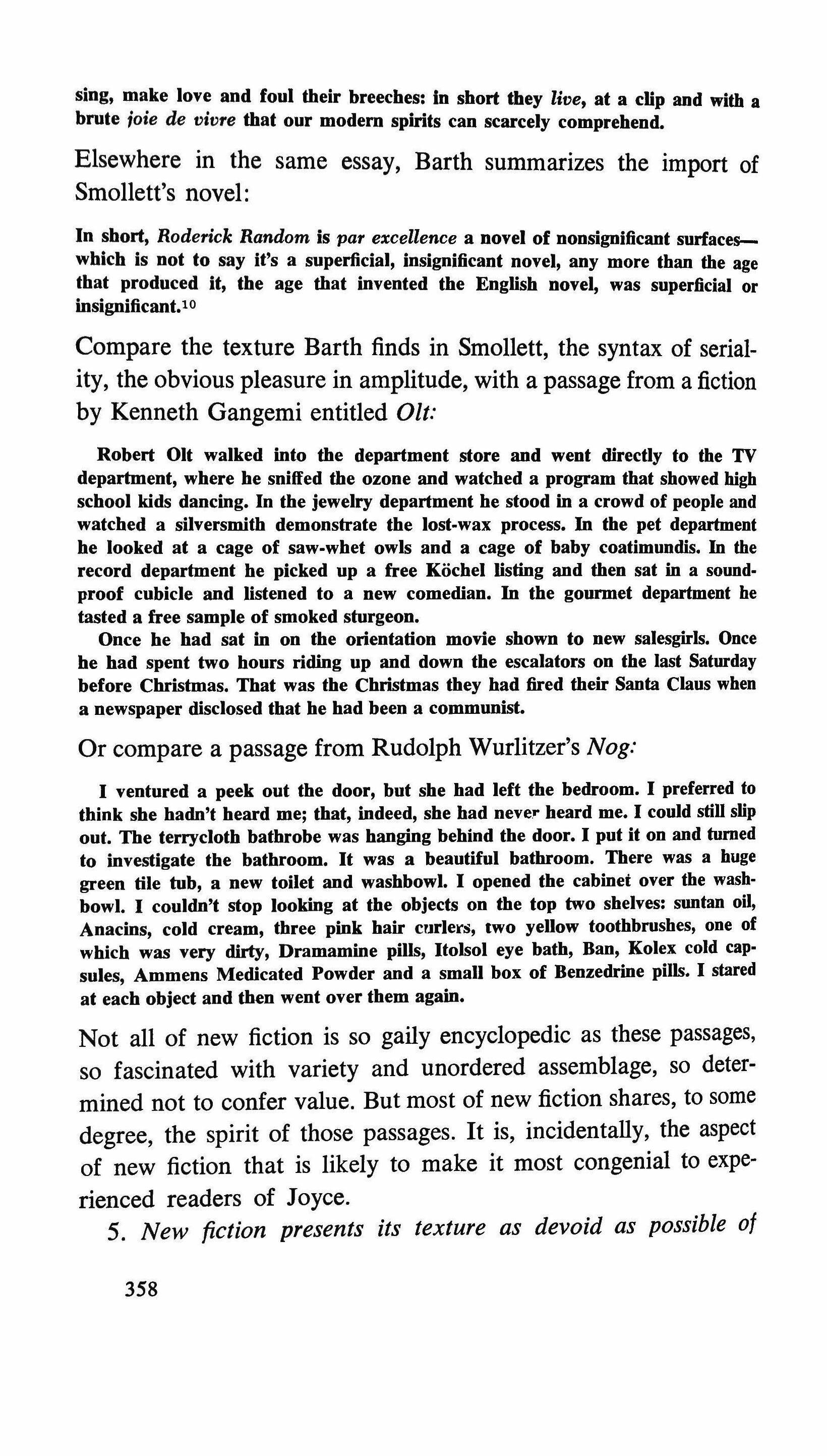
sing, make love and foul their breeches: in short they live, at a clip and with a brute ioie de vivre that our modern spirits can scarcely comprehend.
Elsewhere in the same essay, Barth summarizes the import of Smollett's novel:
In short, Roderick Random is par excellence a novel of nonsignificant surfaceswhich is not to say it's a superficial, insignificant novel, any more than the age that produced it, the age that invented the English novel, was superficial or insignificant.10
Compare the texture Barth finds in Smollett, the syntax of seriality, the obvious pleasure in amplitude, with a passage from a fiction by Kenneth Gangemi entitled Olt:
Robert Olt walked into the department store and went directly to the TV department, where he sniffed the ozone and watched a program that showed high school kids dancing. In the jewelry department he stood in a crowd of people and watched a silversmith demonstrate the lost-wax process. In the pet department he looked at a cage of saw-whet owls and a cage of baby coatimundis. In the record department he picked up a free Kochel listing and then sat in a soundproof cubicle and listened to a new comedian. In the gourmet department he tasted a free sample of smoked sturgeon.
Once he had sat in on the orientation movie shown to new salesgirls. Once he had spent two hours riding up and down the escalators on the last Saturday before Christmas. That was the Christmas they had fired their Santa Claus when a newspaper disclosed that he had been a communist.
Or compare a passage from Rudolph Wurlitzer's Nog:
I ventured a peek out the door, but she had left the bedroom. I preferred to think she hadn't heard me; that, indeed, she had neve" heard me. I could still slip out. The terrycloth bathrobe was hanging behind the door. I put it on and turned to investigate the bathroom. It was a beautiful bathroom. There was a huge green tile tub, a new toilet and washbowl. I opened the cabinet over the washbowl. I couldn't stop looking at the objects on the top two shelves: suntan oil, Anacins, cold cream, three pink hair curlers, two yellow toothbrushes, one of which was very dirty, Dramamine pills, ItoIsol eye bath, Ban, Kolex cold capsules, Ammens Medicated Powder and a small box of Benzedrine pills. I stared at each object and then went over them again.
Not all of new fiction is so gaily encyclopedic as these passages, so fascinated with variety and unordered assemblage, so determined not to confer value. But most of new fiction shares, to some degree, the spirit of those passages. It is, incidentally, the aspect of new fiction that is likely to make it most congenial to experienced readers of Joyce.
5 New fiction presents its texture as devoid as possible of
358

aesthetic and philosophical depth. In some sense, nearly all writers resist assignments to them of depth. Isherwood's character George, in A Single Man, who teaches English, asks his class what a novel by Huxley is "about." And the narrator comments: "Nearly all of them, despite their academic training, deep, deep down still regard this about business as a tiresomely sophisticated game. As for the minority who have cultivated the about approach until it has become second nature, who dream of writing an about book of their own one day, on Faulkner, James, or Conrad, proving definitively that all previous about books on that subject are about nothingthey aren't going to say anything yet awhile." Novelists and critics as disparate as Saul Bellow, Harry Levin, and Mary McCarthy have complained of the tendency of readers to find symbols where no symbols were intended. Every novelist, out of mere self-respect, is obliged to resist the conventionalized and mechanical methods of discovering "meaning," imputing system, stating the implicit in his works. Still, no one needs to be told that modern fiction is relentlessly symbolic, enthusiastically multi-leveled, that it invites exegesis like nothing since the Talmud. It is the single quality that most firmly unites such otherwise quite different writers as Lawrence, Mann, Broch, Silone, Malcolm Lowry, their intention to use those techniques that permit the greatest possible resonance and amplitude of signification and that insist at every point on the existence of unstated levels of "depth" that the surface of the fiction figures forth.
The contrary principle is expressed by Wylie Sypher. In scientific observation at the present time, in contrast to classic patterns of scientific thought, "the data are the system; the matter-of-fact concreteness may er may not be explained by natural law. Accidents happen, and accidents are real." Elsewhere, he allows the principle to broaden:
Like the recent scientist, the contemporary novelist or painter detects that the ordinary, the commonplace, the superficial, the quotidian is the very mystery most Inaccessible to reason and explanation and method. The immediate occasion is Sufficient unto itself, and this recognition has led to a new humility, as well as a new frustration. If the significance is on the surface, then the need for depth explanation has gone, and the contingent, the everyday happening, is more authen359

tic than the ultimate or absolute 'Che old systems of meaning-the Newtonian solid geometry locating things at appropriate distances or the theoretic order of Alberti's perspective, which foreshortened-are suspect. Novelist, painter, and scientist have given up foreshortening. Plot itself was a mode of foreshortening. To accept the accidental or casual is to recognize the irrationality of the obvious to dispense with the need for a logic accounting for everything by cause and effec� action and reacdon,n
Sypher's examples, in the case of fiction, come largely from the chosistes. But his discussion applies remarkably to American writers of new fiction, many of whom share next to nothing with the French writers, except a denial of depth. There is no clearer break than this between modernist (and late Victorian) fiction and new fiction-the implicit intention to let the surface be the meaning, let the possibility of a symbolistic level of reference be consistently undercut, let the data be the system, let there be nothing between the lines, as Barthelme puts it, but white space.
6. New fiction permits itself a degree of latitude from the illusionist tradition greater than in any body of fiction since the beginning of the novel. Classic fiction, of course, varies in the degree of its fidelity to an illusionist aesthetic, from the dull fidelity of Zola to the involutions and indirections of dozens of others whom we might place at some kind of polar extreme. It is difficult to imagine, however, that any classic work of fiction ever represents the wish that the reader apprehend it mainly as a selfreferential literary construct, or mainly allegory, or mainly myth, or mainly private vision. Always, in figures so various as Scott or James, Mme. de Lafayette or Tolstoy, we are compelled to say, in Trollope's phrase, yes, that is "the way we live now" or to say, yes, that is the way it must have been, at Bath or Lyme, Waterloo or Leningrad; that is the way it must have looked and sounded, what people must have said and thought. It is hard to see how fiction, in its classic formulations, could escape this common mimetic center without ceasing to be prose fiction and becoming something else.
Irving Howe, some years ago in an essay titled "Mass Society and Post-Modern Fiction," took note of the comparative lack of interest in social fact, in class, in institutions and manners that characterized the fiction that seemed most compelling at that time,
360
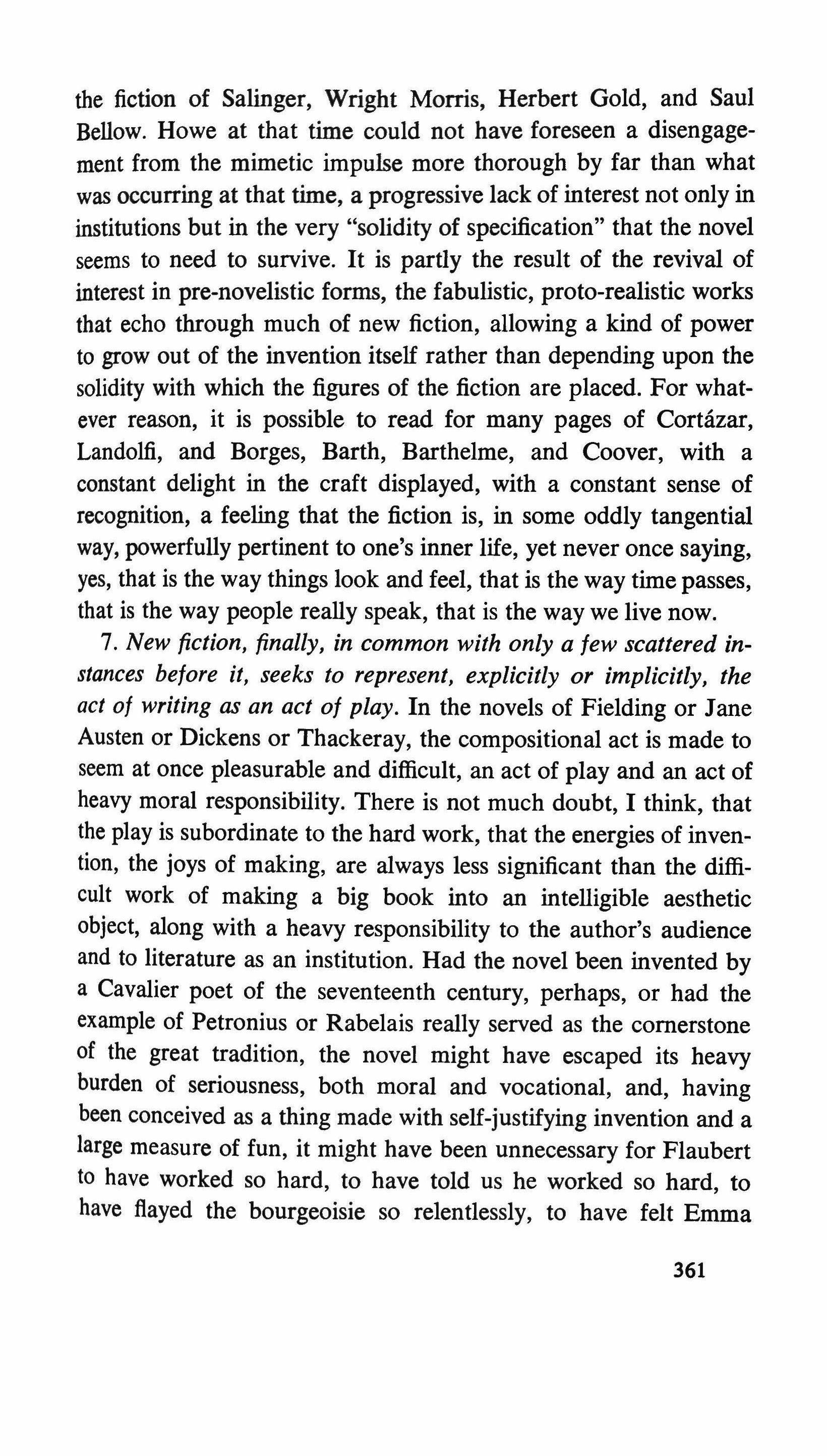
the fiction of Salinger, Wright Morris, Herbert Gold, and Saul Bellow. Howe at that time could not have foreseen a disengagement from the mimetic impulse more thorough by far than what was occurring at that time, a progressive lack of interest not only in institutions but in the very "solidity of specification" that the novel seems to need to survive. It is partly the result of the revival of interest in pre-novelistic forms, the fabulistic, proto-realistic works that echo through much of new fiction, allowing a kind of power to grow out of the invention itself rather than depending upon the solidity with which the figures of the fiction are placed. For whatever reason, it is possible to read for many pages of Cortazar, Landolfi, and Borges, Barth, Barthelme, and Coover, with a constant delight in the craft displayed, with a constant sense of recognition, a feeling that the fiction is, in some oddly tangential way, powerfully pertinent to one's inner life, yet never once saying, yes, that is the way things look and feel, that is the way time passes, that is the way people really speak, that is the way we live now.
7. New fiction, finally, in common with only a few scattered instances before it, seeks to represent, explicitly or implicitly, the act of writing as an act of play. In the novels of Fielding or Jane Austen or Dickens or Thackeray, the compositional act is made to seem at once pleasurable and difficult, an act of play and an act of heavy moral responsibility. There is not much doubt, I think, that the play is subordinate to the hard work, that the energies of invention, the joys of making, are always less significant than the difficult work of making a big book into an intelligible aesthetic object, along with a heavy responsibility to the author's audience and to literature as an institution. Had the novel been invented by a Cavalier poet of the seventeenth century, perhaps, or had the example of Petronius or Rabelais really served as the cornerstone of the great tradition, the novel might have escaped its heavy burden of seriousness, both moral and vocational, and, having been conceived as a thing made with self-justifying invention and a large measure of fun, it might have been unnecessary for Flaubert to have worked so hard, to have told us he worked so hard, to have flayed the bourgeoisie so relentlessly, to have felt Emma 361

Bovary's poison in his own vitals, to have sweat over every word. New fiction, on the other hand, elevates play to the very center of the complex of apparent motives that animate the work. Barth, in any given work, is doing many things: working very hard, thinking, shaping, hoping, giving up and starting over, planning, expecting, learning, imitating, trying not to imitate. It does not surprise me, how could it surprise anyone, to hear, through some dubious grapevine, that Barth is not writing, that he is in despair, having written himself out. Still, can there be any doubt that writing fiction is very centrally, for Barth, an act of play? One can differ with the particulars of Robert Scholes's The Fabulators; but I would not choose to differ with its donnee. New fiction can be differentiated from old on the basis of its fabulation, its willingness to allow the compositional act a self-conscious prominence and to invest that act with love, a sense of game, invention for its own sake, joy.
Notes
1. "What Was New About the 'New Species of Writing'?" Studies in the Novel, II (Summer, 1970), 118.
2. The Popular Novel in England, 1770-1800 (Lincoln, Nebraska, 1961), p. 5.
3. Counterstatement (Los Altos, Calif., 1953), p. 124.
4. The best source for this kind of experimentation is Eugene Wildman's anthology, Experiments in Prose (Chicago, 1969).
5. See, for example, the section entitled "Antagonism" in Renato Poggioli's The Theory of the Avant-Garde (New York, 1971), pp. 30-40.
6. "Notes on a New Sensibility," Partisan Review, XXXVI (1969), 460-477.
7. In Writers and Issues, ed. Theodore Solotaroff (New York, 1969), pp. 260-275.
8. Against Interpretation and Other Essays (New York, 1969), p. 298
9. Theory of Literature (New York, 1956), pp. 235-236.
10. "Afterword" to The Adventures of Roderick Random, Signet Edition (New York, 1964), pp. 478, 471.
11. Literature and Technology: The Alien Vision (New York, 1968), p. 240 and the entire section titled ''The Agnosticism of Craft."
362
The end of art as a spiritual project
ROBERT ONOPA

1
Although a connection between art and religion has been asserted in a variety of ways since the beginnings of Romanticism, the institutionalization of art into a formal religion has never taken hold. What has taken hold, however, at least in the premises of modernism, is the notion that the uses of art are very much like the uses of religion, that art can serve, in its own way, even the highest function which traditional religion purportedly serves, the function of transcendence. Through first examining the manifestations of this use-structure in modernist art, I want to examine and analyze the terms under which a class of modernist art itself invites us to use art to transcend the fallen world of history. Then I want to follow those arguments, especially in Anglo-American literary theory, which serve as the rationale for raising art to the status of something which can be used as religion is used. And finally, I want to subject this rationale to a little Marxist scrutiny. The application of the use-structure of religion to art is an important central premise of literary modernism, a premise with
TriQuarterly 363

roots in the Romantic tradition. In modernism, it has the consequence of dissociating art from history by making art-in Susan Sontag's terms-a spiritual project, one whose primary social function is to provide an escape from history. In the post-modernist intensification of modernist premises, art itself is seen as a structure of history, and anti-art is introduced as a strategy to redeem art from history and thus to qualify art for use as a spiritual project. I hope ultimately to show that this post-modernist strategy is counter-productive, and that, after all the evidence is in, the usestructure of religion has only questionable applicability to art.
But before such conclusions can be defended, it needs to be shown how this use-structure manifests itself in modernist art, and how its rationale is presented by Anglo-American literary theory.
2
To begin with, how is religion itself used? Religion attempts to provide an ahistorical explanation for-and a method for transcendence of-the human condition. It begins by recognizing the dissatisfactions man has with the conditions of existence and explains them as a defect in man's own condition. The defect is the result of a fall, for which man himself is sometimes responsible, but the defect can be remedied. As a remedy, religion offers a program of salvation from the fallen, this-worldly state, a program which promises future transcendence to a more desirable state--with comfort and consolation at the possibility of transcendence to make this world bearable in the meantime. The major problem of living in time, which is death, is thus dealt with by supplying man with a way to get outside of time (positing a separate, non-historical ontology). Religion also provides a description of the place to which one transcends, the timeless, non-fallen state of paradise.
To take an early example of the use of art as a spiritual project, one can extract just such descriptions and programs from Wordsworth's poetry. In "Nutting," Wordsworth explains the fall of man as a disunion with nature; in poems such as "Tintern Abbey"where memory is used to transcend time and the poetic imagination 'half creates' the world of sense to guarantee a connection
364
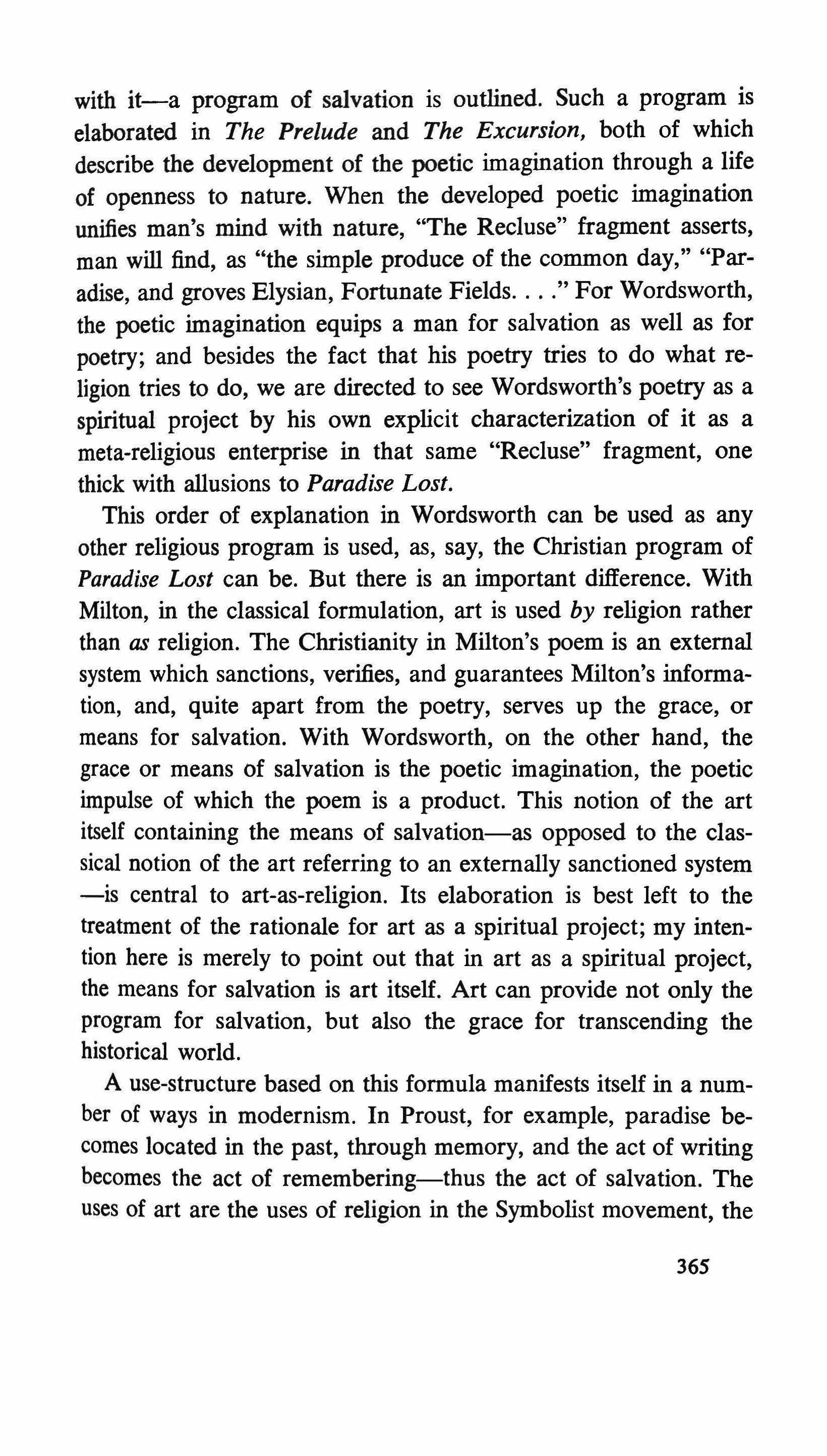
with it-a program of salvation is outlined. Such a program is elaborated in The Prelude and The Excursion, both of which describe the development of the poetic imagination through a life of openness to nature. When the developed poetic imagination unifies man's mind with nature, "The Recluse" fragment asserts, man will find, as "the simple produce of the common day," "Paradise, and groves Elysian, Fortunate Fields " For Wordsworth, the poetic imagination equips a man for salvation as well as for poetry; and besides the fact that his poetry tries to do what religion tries to do, we are directed to see Wordsworth's poetry as a spiritual project by his own explicit characterization of it as a meta-religious enterprise in that same "Recluse" fragment, one thick with allusions to Paradise Lost.
This order of explanation in Wordsworth can be used as any other religious program is used, as, say, the Christian program of Paradise Lost can be. But there is an important difference. With Milton, in the classical formulation, art is used by religion rather than as religion. The Christianity in Milton's poem is an external system which sanctions, verifies, and guarantees Milton's information, and, quite apart from the poetry, serves up the grace, or means for salvation. With Wordsworth, on the other hand, the grace or means of salvation is the poetic imagination, the poetic impulse of which the poem is a product. This notion of the art itself containing the means of salvation-as opposed to the classical notion of the art referring to an externally sanctioned system -is central to art-as-religion. Its elaboration is best left to the treatment of the rationale for art as a spiritual project; my intention here is merely to point out that in art as a spiritual project, the means for salvation is art itself. Art can provide not only the program for salvation, but also the grace for transcending the historical world.
A use-structure based on this formula manifests itself in a number of ways in modernism. In Proust, for example, paradise becomes located in the past, through memory, and the act of writing becomes the act of remembering-thus the act of salvation. The uses of art are the uses of religion in the Symbolist movement, the 365

Art for Art's Sake movement, in the avant-garde in general. A paradigm of the incorporation of this use-structure is the Dada movement (the Berlin group excepted), whose general tendencies, as Renato Poggioli treats them in The Theory of the Avant-Garde, parallel those of avant-garde art in general, and some of whose attitudes remain associated with notions of what art is and does today.
For a majority of the Dadaists, the fallen state of man is bourgeois society, the product of the rationalized systems of commercialism and industrialism. Jean Arp, co-founder of the Zurich Dada group and later Surrealist, describes man's fallen condition in his "Notes from a Diary":
today's representative of man is only a tiny button on a giant senseless machine. nothing in man is any longer substantial. the safe-deposit vault replaces the may night. how sweetly and plaintively the nightingale sings down there while man is studying the stock market. what a heady scent the lilac gives forth down there. man's head and reason are gelded, and are trained only in a certain kind of trickery. man's goal is money and every means of getting it is aU right with him.
As salvation lies for the Surrealists in liberating the psyche, for the Dadaists it lies in spontaneity, in destroying systems, or in 'non-building non-systems.' Just as the Surrealist psyche is liberated in Surrealist art, so too is Dadaist spontaneity incarnated in Dada work itself.
The end of the spontaneous endeavor is a renewal of man to, in Arp's words, "broad, clean living," a condition where: man is a beautiful dream. man lives in the sagalike country of utopia where the thing-in-itself tapdances with the categorical imperative.
Through spontaneity, then, man may transcend the fallen world to reach an ideal state of intuitive existence uncontaminated by historical reality. The means for transcendence is Dada itself.
The Dada movement, as Poggioli points out, has a strong iconoclastic tendency, so that part of the impetus of its spiritual project is to militate against religion of the traditional sort, though this does not prevent its own use as a spiritual project. When Dada manifestoes call for the requisition of churches by Dadaists, they do so for Dadaists to dispense knowledge of a higher order than
366

religion provides-knowledge, nonetheless, addressed to the same order of question. Nor does the anti-popularity of the avant-garde in general militate against its invitation to be used as religion is used. The fallen world, after all, is the world around the artist. He is not to worship it, nor seek its favor. There is nothing in the nature of a spiritual project which necessitates its being popular, or, for that matter, democratic.
In The Theory of the Avant-Garde, Poggioli describes avantgarde art in general as "fostering permanent spiritual revolution," a purpose-structure consonant with the use-pattern I have been describing. My point here is just to establish that this use-pattern manifests itself in the literature of modernism, and that manifestations can be found from the early Romantics to the present day. This use-structure is the one projected onto literature by passages such as the following one, from J.-K. Huysmans' A Rebours. Des Esseintes finds his longing to leave "the existence of which he was so heartily sick" contained in the literature he reads. While reading under the influence of this craving which in fact is poetry itself, to Oy far away from the contemporary society he was studying, he had Oed to an idy16c region where the sap boiled in the sunshine; he had dreamt of fantastic heavenly copulations, of long earthly ecstasies, of fertilizing showers of pollen falling into the palpitating genitals of flowers; he had arrived at a gigantic pantheism, and with the Garden of Eden in which he placed his Adam and Eve he had created, perhaps unconsciously, a prodigious Hindu poem.
For Des Esseintes, then, the poetic impulse is the perception of the fallen state of the world, the vehicle for escape, and a paradigm of paradise-all at the same time. There is not a great deal of difference between how Huysmans uses literature and the useStructure projected by the early poetry of W. B. Yeats. Nor is there much difference from the use-structure implied by Wallace Stevens' poetry; in "The Man with the Blue Guitar," for instance, Stevens suggests that poetry, which transports the world as it is "beyond the compass of change," "must take the place/Of empty heaven and its hymns
The idea that art can be used this way informs post-modernism as well, but the manifestations look somewhat different because
367

post-modernism more rigorously incorporates the modernist premonition that art itself and the materials of art (especially language) are part of the fallen historical world which man requires transcendence of-positing, in effect, art itself or the materials of art as the fallen world, contaminated by historicity; it responds by incorporating anti-art or anti-language elements into the artwork to detoxify it and produce a paradigm of an anti-fallen world, one less contaminated by the voided structure of art or the diseased materials. This purification ostensibly 'redeems' art from history, and thus makes it available for use as a spiritual project. In J. M. G. LeClezio's Book of Flights, for instance, LeClezio asserts that art is useless and systematically destroys his novel through the inclusion of non-narrative journal passages, anonymous meditations, self-criticisms, and statements that language is corrupt and in itself 'useless.' What results is a transcendent 'flight' from the fallen world through the work itself. Other versions of the post-modernist response, reacting to McLuhanesque injunctions that written language in particular is fallen, use writing based on oral models or the written transcription of spontaneous speech. Burroughs' collaborator, Brion Gysin, describes the technique of cutting up and re-assembling pages with a similar use for art in mind: if you want to challenge and change fate cut up words. Make them make a new world." And, as Susan Sontag points out in her sympathetic essay, "The Aesthetics of Silence," another technique is to incorporate the absence of art into the work itself through incorporating 'silence,' a procedure found in music in Cage's 4'33", and implied for literature in Beckett's desire for an art which expresses "nothing to express, no power to express, nothing from which to express, no desire to express ." While on the face of it a more modest enterprise than the use Huysmans asks of literature, the post-modernist via negativa is actually more absolute in its demand for transcendence. Sontag says:
In the light of the current myth, in which art aims to become a ''total experience," soliciting total attention, the strategies of impoverishment and reduction indicate the most exalted ambition art could adopt. Underneath what looks like a strenu-
368

ODS modesty, if not actual debility, is to be discerned an energetic secular blasphemy, the wish to attain the unfettered, unselective, total consciousness of "God."
In this way, the post-modernist use of art goes beyond the desire for escape from the world to a timeless paradise; it implies, even more than escape does, the desire for a direct transmutation of being from this-worldly to other-worldly, from historical to ahistorical, from human to divine.
These are, then, some of the ways in which the use-structure of religion is manifested in the literature of modernism. I cannot, of course, account for all of its manifestations or variations, though I do think that the pattern I have been presenting is the central one. Of more significance, I think, are the rationale and consequences of the argument itself.
3 Matthew Arnold, perhaps, is the best known exponent of art as a substitute for religion, and certain poems of his, such as "Memorial Verses" ("The end is everywhere.IArt still has truth, take refuge there "), do manifest a use-structure which calls for the use of art as a transcendent spiritual project. In his literary criticism, however, Arnold bases his hopes for poetry not on poetry's transcendent powers, but rather on poetry's capability for inducing human perfectibility through its reference to 'eternal' personal and social values, a generally classical position. So Arnold's criticism, except for brief passages, does not provide a rationale for the use of art as a spiritual project. On the other hand, from the theory of the autonomous imagination and from organic poetic theory come arguments which elevate the work of art to the status of a vehicle for ontological transcendence through art itself. I want to review briefly the development of these arguments in Anglo-American literary theory and criticism, and to point out some direct recommendations in the criticism to use art as religion. First, contained in Shelley's A Defence of Poetry is an elevation of poetry to a means of transcendence through the autonomy of 369
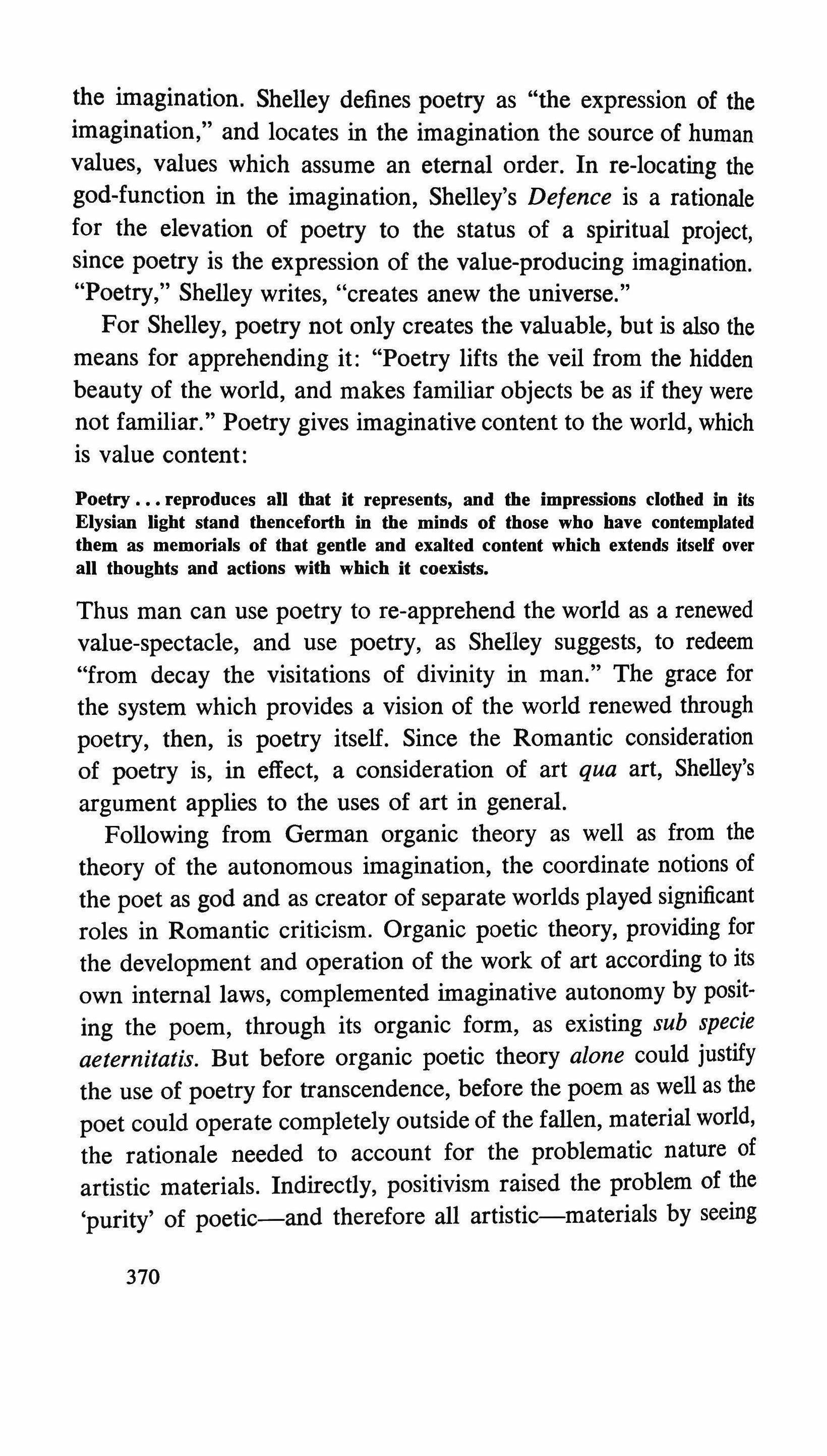
the imagination. Shelley defines poetry as "the expression of the imagination," and locates in the imagination the source of human values, values which assume an eternal order. In re-Iocating the god-function in the imagination, Shelley's Defence is a rationale for the elevation of poetry to the status of a spiritual project, since poetry is the expression of the value-producing imagination. "Poetry," Shelley writes, "creates anew the universe."
For Shelley, poetry not only creates the valuable, but is also the means for apprehending it: "Poetry lifts the veil from the hidden beauty of the world, and makes familiar objects be as if they were not familiar." Poetry gives imaginative content to the world, which is value content:
Poetry reproduces all that it represents, and the impressions clothed in its Elysian light stand thenceforth in the minds of those who have contemplated them as memorials of that gentle and exalted content which extends itself over all thoughts and actions with which it coexists.
Thus man can use poetry to re-apprehend the world as a renewed value-spectacle, and use poetry, as Shelley suggests, to redeem "from decay the visitations of divinity in man." The grace for the system which provides a vision of the world renewed through poetry, then, is poetry itself. Since the Romantic consideration of poetry is, in effect, a consideration of art qua art, Shelley's argument applies to the uses of art in general.
Following from German organic theory as well as from the theory of the autonomous imagination, the coordinate notions of the poet as god and as creator of separate worlds played significant roles in Romantic criticism. Organic poetic theory, providing for the development and operation of the work of art according to its own internal laws, complemented imaginative autonomy by positing the poem, through its organic form, as existing sub specie aeternitatis. But before organic poetic theory alone could justify the use of poetry for transcendence, before the poem as well as the poet could operate completely outside of the fallen, material world, the rationale needed to account for the problematic nature of artistic materials. Indirectly, positivism raised the problem of the 'purity' of poetic-and therefore all artistic-materials by seeing
370

poetry as a way of knowing, one whose propositional content was bound to history and accountable to the developing, historical world, just as science was. But as a way of knowing, poetry was vastly inferior, 'lies.' How could poetry be 'divine,' and claim to be sub specie aeternitatis if it was so often, in simple practical terms, wrong?
The mainstream of modernist Anglo-American criticism responded in a way that answered the Platonic objection by way of Plotinus rather than Aristotle. Prefigured by the early Romantics, it made a distinction between scientific and poetic discourse, assuming that the problem of artistic reference to the external world was, in effect, not relevant, since art is not used in the same way as science. The efficacy of the language of poetry, it was argued, as well as the efficacy of entire works, arose from their use in relating man to the cosmos, a benefit different in kind and superior to knowing about or materially changing the world. Thus, I. A. Richards resolved the issue in a characteristically modern way, separating use from content in art by creating a system whereby poetry provided the satisfactions of beliefs without necessary reference to the content of those beliefs-beliefs whose viability was in the process of being canceled by science anyway. Thus, the material and assertive element in art was able to slip outside of the time-bound, fallen world to where the organic form existed sub specie aeternitatis.
It was because of science, not despite science, that Richards wrote in Science and Poetry, "We shall be thrown back, as Matthew Arnold foresaw, on poetry. Poetry is capable of saving us." But for Richards, poetry could save us pretty much on its own. This is the use-structure which T. S. Eliot both documented and objected to in The Use of Poetry and the Use of Criticism. Eliot's main objection, however, was from the traditional Christian point of view; since the collapse of that point of view had been part of the reason poetry came to be used as a spiritual project, Eliot's Christian formula did not provide a viable alternative model. Significantly, however, Eliot's idea of 'impersonal' poetry tended to justify organic poetics, and assisted in the shift from 371
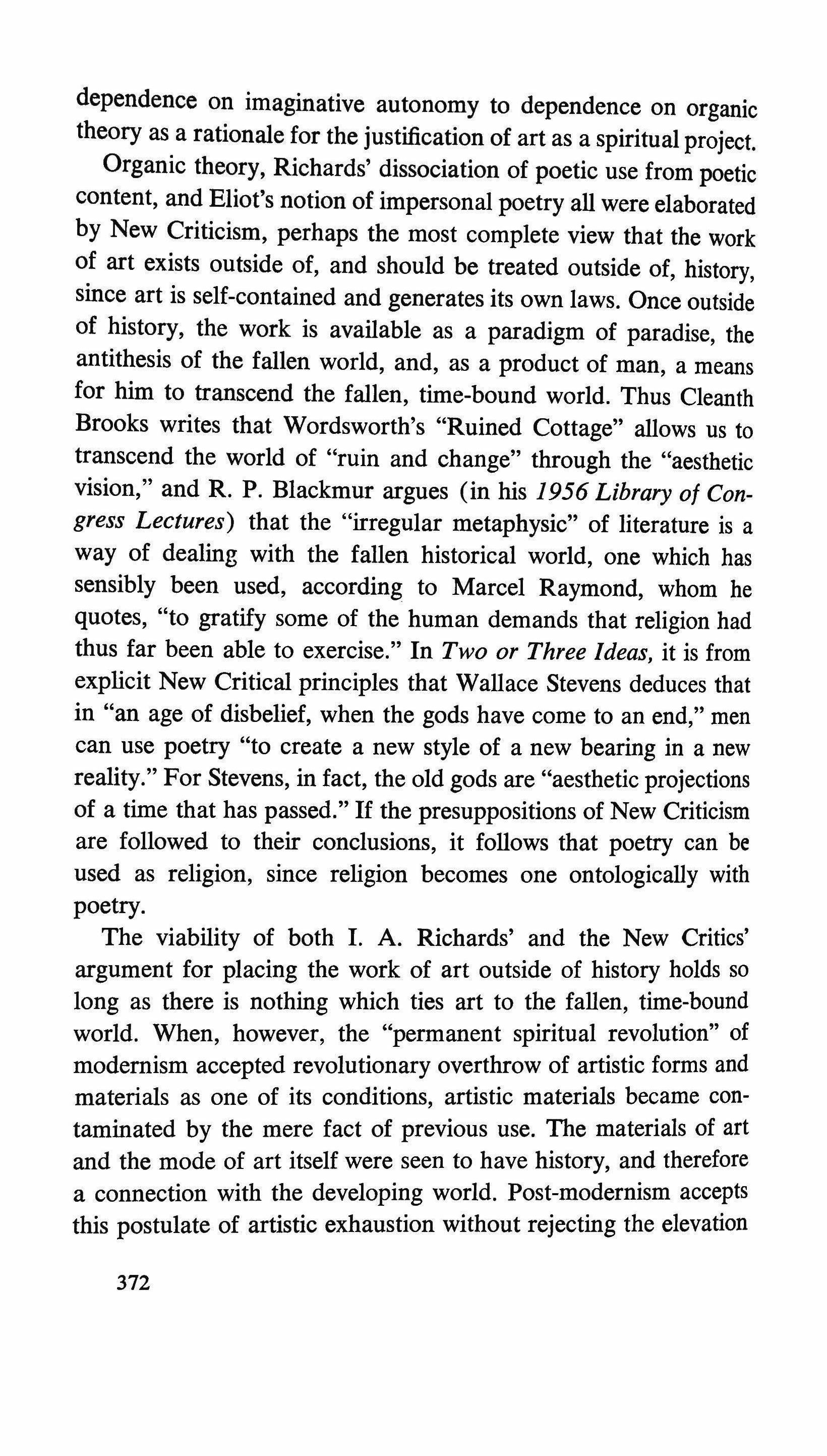
dependence on imaginative autonomy to dependence on organic theory as a rationale for the justification of art as a spiritual project. Organic theory, Richards' dissociation of poetic use from poetic content, and Eliot's notion of impersonal poetry all were elaborated by New Criticism, perhaps the most complete view that the work of art exists outside of, and should be treated outside of, history, since art is self-contained and generates its own laws. Once outside of history, the work is available as a paradigm of paradise, the antithesis of the fallen world, and, as a product of man, a means for him to transcend the fallen, time-bound world. Thus Cleanth Brooks writes that Wordsworth's "Ruined Cottage" allows us to transcend the world of "ruin and change" through the "aesthetic vision," and R. P. Blackmur argues (in his 1956 Library of Congress Lectures) that the "irregular metaphysic" of literature is a way of dealing with the fallen historical world, one which has sensibly been used, according to Marcel Raymond, whom he quotes, "to gratify some of the human demands that religion had thus far been able to exercise." In Two or Three Ideas, it is from explicit New Critical principles that Wallace Stevens deduces that in "an age of disbelief, when the gods have come to an end," men can use poetry "to create a new style of a new bearing in a new reality." For Stevens, in fact, the old gods are "aesthetic projections of a time that has passed." If the presuppositions of New Criticism are followed to their conclusions, it follows that poetry can be used as religion, since religion becomes one ontologically with poetry.
The viability of both I. A. Richards' and the New Critics' argument for placing the work of art outside of history holds so long as there is nothing which ties art to the fallen, time-bound world. When, however, the "permanent spiritual revolution" of modernism accepted revolutionary overthrow of artistic forms and materials as one of its conditions, artistic materials became contaminated by the mere fact of previous use. The materials of art and the mode of art itself were seen to have history, and therefore a connection with the developing world. Post-modernism accepts this postulate of artistic exhaustion without rejecting the elevation
372

of art to the status of a spiritual project, and the question for postmodernism becomes one of tactics to redeem art rather than the construction of a rationale (given the historicity of ideas as well, even the notion of a rationale is suspect, Cioran urges in The Fall into Time). A familiar post-modernist tactic, as we have seen, is to attempt to wrench art from the historical/commercial nexus through the incorporation of elements of anti-art into the work itself, or to transform the language in literary art. In The Theory of the Avant-Garde, Poggioli shows how this general strategy is implicit in the idea of modernism; with post-modernism, this strategy becomes central. As we have noted, Susan Sontag catalogues and analyzes a variety of tactics in "The Aesthetics of Silence," especially those which use 'silence' internal to the artwork in an effort to redeem it from its connections to the fallen world of the history of signs, signifiers, sound, speech, or writing. The applicability of the use-structure of religion to art is appropriate because the post-modernist position holds that art can save man from the fallen world of history, through itself, by saving itself from history. Sontag writes:
Behind the appeals for silence lies the wish for a perceptual and cultural clean slate. And, in its most hortatory and ambitious version, the advocacy of silence expresses a mythic project of total liberation. What's envisaged is nothing less than the liberation of the artist from himself, of art from the particular artwork, of art from history, of spirit from matter, of the mind from its perceptual and intellectual limitations.
The use of art to serve the transcendent functions of religion is central to modernism and post-modernism not only because the criticism often turns to the use-structure of religion to justify an analysis or judgment of a particular work-as Cleanth Brooks does in pointing out the transcendent element in Wordsworth, or as Susan Sontag does in her praise of Godard (in her essay, "Godard") for techniques which 'redeem' film. As I have tried to point out in the previous section, a whole class of modernist art invites such judgments. More importantly, in a way particular works themselves infrequently do, the rationale for the application of the use-structure of religion to art purports to present a formulation
373
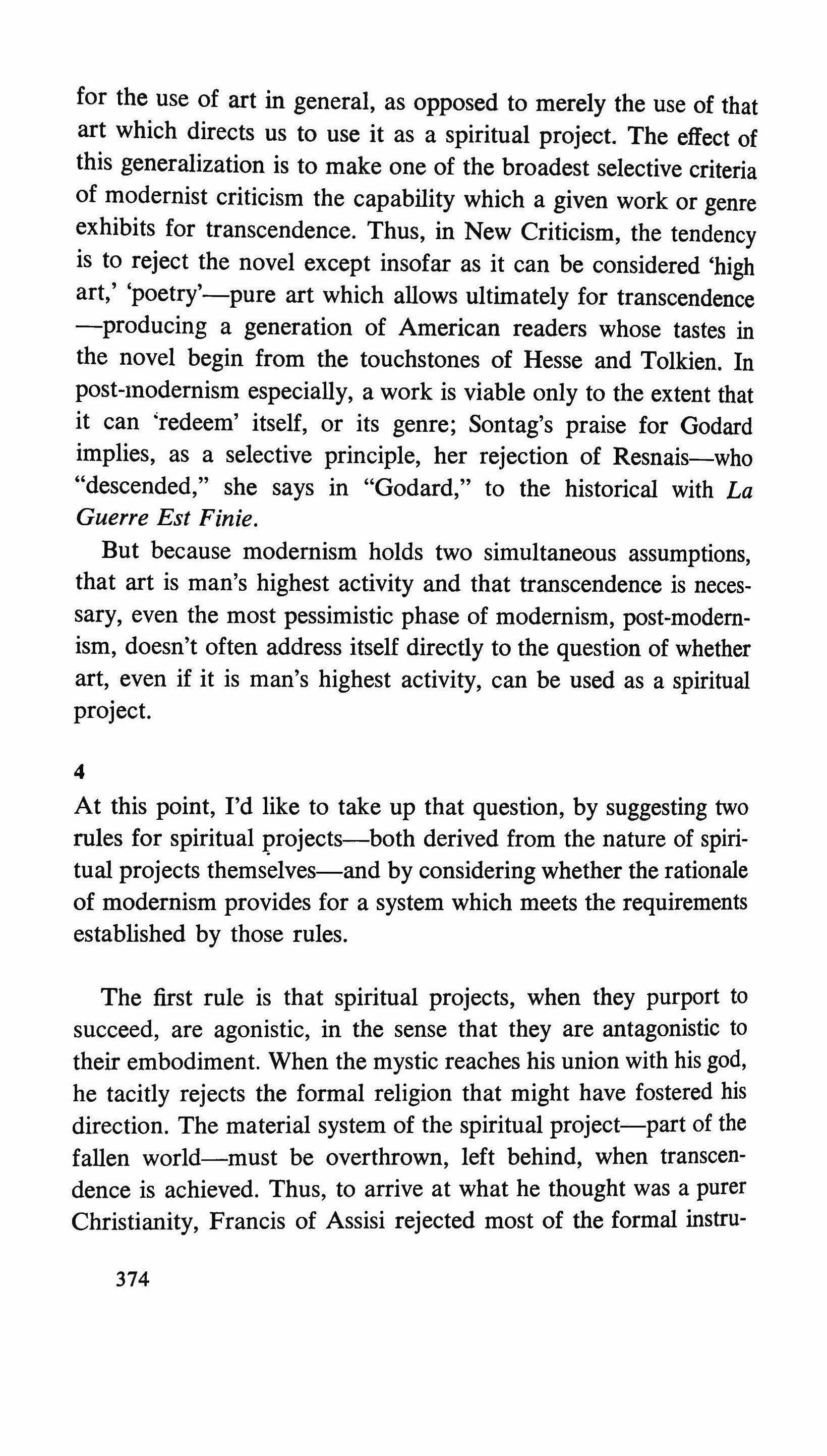
for the use of art in general, as opposed to merely the use of that art which directs us to use it as a spiritual project. The effect of this generalization is to make one of the broadest selective criteria of modernist criticism the capability which a given work or genre exhibits for transcendence. Thus, in New Criticism, the tendency is to reject the novel except insofar as it can be considered 'high art,' 'poetry'-pure art which allows ultimately for transcendence -producing a generation of American readers whose tastes in the novel begin from the touchstones of Hesse and Tolkien. In post-modernism especially, a work is viable only to the extent that it can 'redeem' itself, or its genre; Sontag's praise for Godard implies, as a selective principle, her rejection of Resnais-who "descended," she says in "Godard," to the historical with La Guerre Est Finie.
But because modernism holds two simultaneous assumptions, that art is man's highest activity and that transcendence is necessary, even the most pessimistic phase of modernism, post-modernism, doesn't often address itself directly to the question of whether art, even if it is man's highest activity, can be used as a spiritual project.
4
At this point, I'd like to take up that question, by suggesting two rules for spiritual projects-both derived from the nature of spiritual projects thems�lves-and by considering whether the rationale of modernism provides for a system which meets the requirements established by those rules.
The first rule is that spiritual projects, when they purport to succeed, are agonistic, in the sense that they are antagonistic to their embodiment. When the mystic reaches his union with his god, he tacitly rejects the formal religion that might have fostered his direction. The material system of the spiritual project-part of the fallen world-must be overthrown, left behind, when transcendence is achieved. Thus, to arrive at what he thought was a purer Christianity, Francis of Assisi rejected most of the formal instru-
374

ments for salvation provided by the Roman Church. The Protestant Reformation can be seen in much the same way, with the rejection of art in the churches as a corollary, not a separate, principle. Transcendence, after all, means going beyond, and what has been gone beyond must be left behind. Even the most popular current spiritual project, the use of hallucinogenic drugs, admits this agonism when it allows the superiority of going through LSD and peyote to beyond LSD and peyote via either the metabolic high of macrobiotics or the mental one of transcendental meditation.
Applied to the notion of art as a spiritual project, this means that, with transcendence, art gets left behind. This idea is anticipated, of course, by the agonism of post-modernist anti-art which Susan Sontag (in "The Aesthetics of Silence") explains this way:
The "spirit" seeking embodiment in art clashes with the ''material'' character of art itself. Art is unmasked as gratuitous, and the very concreteness of the artist's tools (and, particularly in the case of language, their historicity) appears as a trap. Practiced in a world furnished with second-hand perceptions, and specifically confounded by the treachery of words, the artist's activity is cursed with medlacy. Art becomes the enemy of the artist, for it denies him the reaIizationtbe transcendence-he desires.
While Sontag's discussion of this principle is confined to its application in post-modernist aesthetics, my impression is that its application is broader. Dante tells us that his poetry must fail to reproduce the beatific vision, and Wordsworth presents a situation at the end of the first book of The Excursion where the very language of poetry fails the poetic vision. The Dadaists find the rejection of Dada necessary to complete the liberating impulse which gives rise to Dada itself, just as the Futurists find the rejection of Futurism necessary to keep up with the future. The consequence of this rule is that when the use-structure of religion is applied to art, art itself must ultimately be rejected. The characteristic response of modernism to this rule, as we have seen, is to attempt to purify the contaminated medium. Beckett tries to 'out-talk' language, Burroughs tries physically to force it out of history, Joyce and Stein search for new patterns of speech, narrative rendition, and linguistic construction. With post-modernism, purification becomes cauterization, so that art is
375
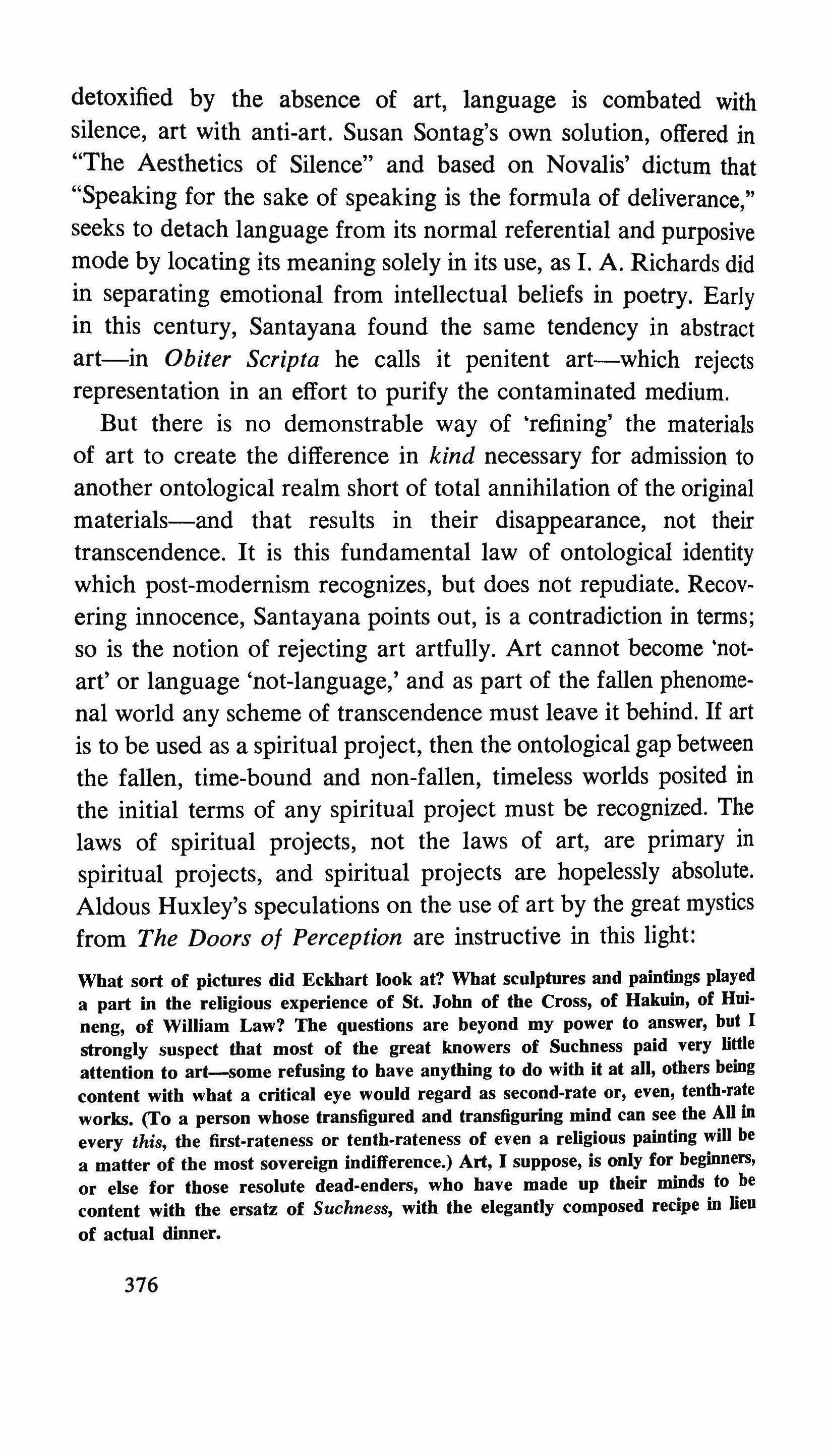
detoxified by the absence of art, language is combated with silence, art with anti-art. Susan Sontag's own solution, offered in "The Aesthetics of Silence" and based on Novalis' dictum that "Speaking for the sake of speaking is the formula of deliverance," seeks to detach language from its normal referential and purposive mode by locating its meaning solely in its use, as 1. A. Richards did in separating emotional from intellectual beliefs in poetry. Early in this century, Santayana found the same tendency in abstract art-in Obiter Scripta he calls it penitent art-which rejects representation in an effort to purify the contaminated medium.
But there is no demonstrable way of 'refining' the materials of art to create the difference in kind necessary for admission to another ontological realm short of total annihilation of the original materials-and that results in their disappearance, not their transcendence. It is this fundamental law of ontological identity which post-modernism recognizes, but does not repudiate. Recovering innocence, Santayana points out, is a contradiction in terms; so is the notion of rejecting art artfully. Art cannot become 'notart' or language 'not-language,' and as part of the fallen phenomenal world any scheme of transcendence must leave it behind. If art is to be used as a spiritual project, then the ontological gap between the fallen, time-bound and non-fallen, timeless worlds posited in the initial terms of any spiritual project must be recognized. The laws of spiritual projects, not the laws of art. are primary in spiritual projects, and spiritual projects are hopelessly absolute. Aldous Huxley's speculations on the use of art by the great mystics from The Doors of Perception are instructive in this light:
What sort of pictures did Eckhart look at? What sculptures and paintings played a part in the religious experience of St. John of the Cross, of Hakuin, of Huineng, of William Law? The questions are beyond my power to answer, but I strongly suspect that most of the great knowers of Suchness paid very little attention to art-some refusing to have anything to do with it at all, others being content with what a critical eye would regard as second-rate or, even, tenth-rate works. (To a person whose transfigured and transfiguring mind can see the All in every this, the first-rateness or tenth-rateness of even a religious painting will be a matter of the most sovereign indifference.) Art, I suppose, is only for beginners, or else for those resolute dead-enders, who have made up their minds to be content with the ersatz of Suchness, with the elegantly composed recipe in lieu of actual dinner. 376
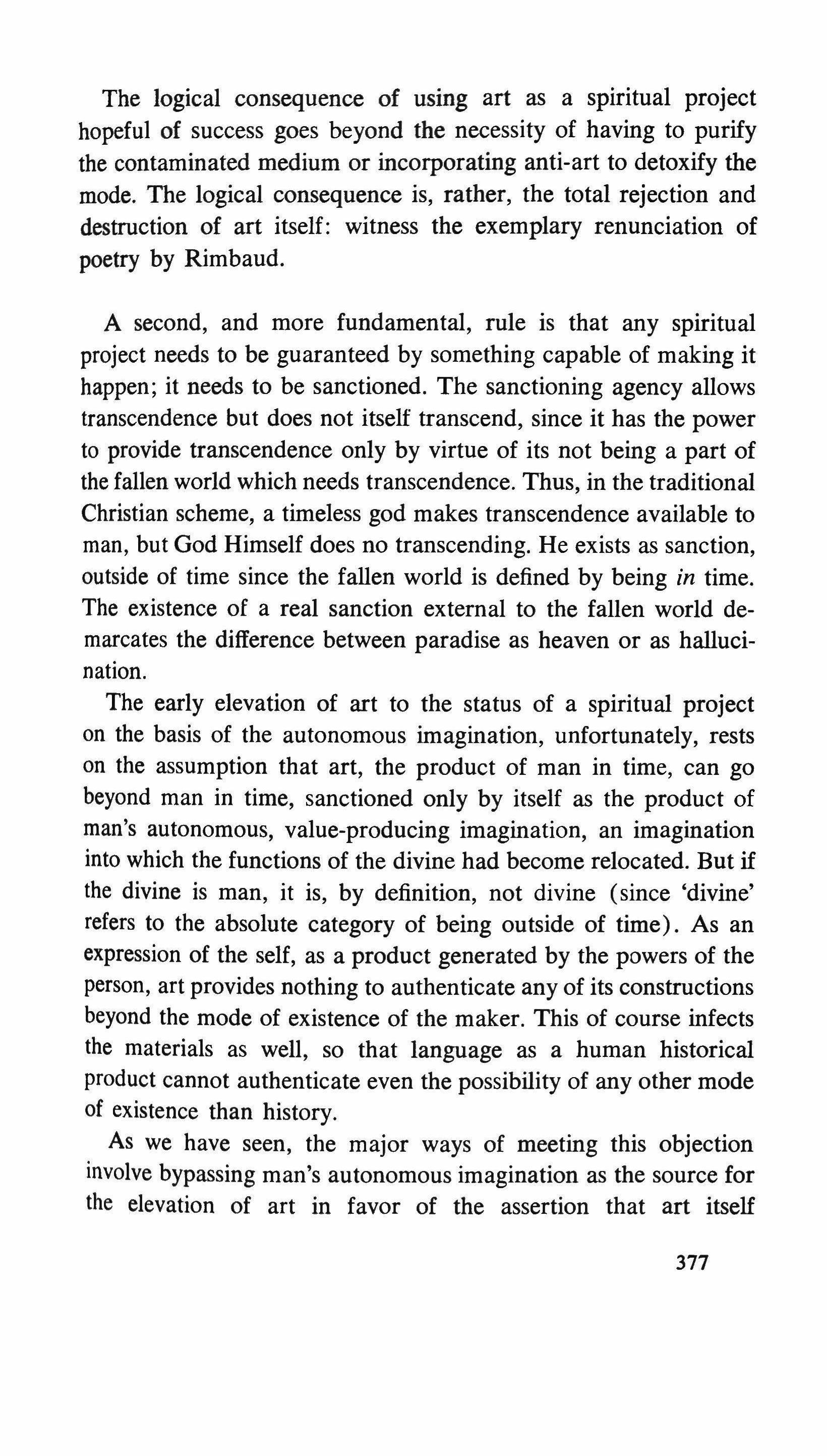
The logical consequence of using art as a spiritual project hopeful of success goes beyond the necessity of having to purify the contaminated medium or incorporating anti-art to detoxify the mode. The logical consequence is, rather, the total rejection and destruction of art itself: witness the exemplary renunciation of poetry by Rimbaud.
A second, and more fundamental, rule is that any spiritual project needs to be guaranteed by something capable of making it happen; it needs to be sanctioned. The sanctioning agency allows transcendence but does not itself transcend, since it has the power to provide transcendence only by virtue of its not being a part of the fallen world which needs transcendence. Thus, in the traditional Christian scheme, a timeless god makes transcendence available to man, but God Himself does no transcending. He exists as sanction, outside of time since the fallen world is defined by being in time. The existence of a real sanction external to the fallen world demarcates the difference between paradise as heaven or as hallucination.
The early elevation of art to the status of a spiritual project on the basis of the autonomous imagination, unfortunately, rests on the assumption that art, the product of man in time, can go beyond man in time, sanctioned only by itself as the product of man's autonomous, value-producing imagination, an imagination into which the functions of the divine had become relocated. But if the divine is man, it is, by definition, not divine (since 'divine' refers to the absolute category of being outside of time). As an expression of the self, as a product generated by the powers of the person, art provides nothing to authenticate any of its constructions beyond the mode of existence of the maker. This of course infects the materials as well, so that language as a human historical product cannot authenticate even the possibility of any other mode of existence than history.
As we have seen, the major ways of meeting this objection involve bypassing man's autonomous imagination as the source for the elevation of art in favor of the assertion that art itself
377

allows transcendence either by virtue of its form, which exists sub specie aeternitatis, or by virtue of the fact that art can be described as self-transcending in that it creates a separate, ahistorical, self-contained world. According to these arguments, art either participates in another ontological realm or it subsists entirely in another ontological realm. While I think these formulas are ultimately reducible to 'man-as-authenticator,' they meet objections on their own terms.
On the one hand, to the extent that these arguments depend on form as sub specie aeternitatis, they force a separation of form from content not possible except in abstraction, since form subsists only by virtue of the materials. Furthermore, they do not allow for what seem to me to be cultural and historical variations among ideas of 'perfect form'; nor do they specify any mechanism for transcendence. Geometry claimed participation in an eternal order before art did, yet no one has ever made the trip to a timeless paradise on a triangle, Pythagoras included, and no triangle of this world has ever made the trip on its own. Participation in abstract categories of perception does not provide the same benefits as participation in a timeless ontology, and cannot provide transcendence.
The complete organic argument holds that art is its own authority and sanction, that it is self-transcending, in part by virtue of the fact that each work itself creates a separate, self-contained world subject only to its own internal laws. Two problems arise here. First, the definition of self-containedness may be rendered as "not defined by relations, nor provision for relations necessary." Given this definition, when any principle or mechanism for relation is set into motion, self-containedness ceases to be absolute; and since a working principle of relation is necessary for transcendence, nothing can be both self-contained and transcending at the same time. Nor, for that matter, can anything be self-transcending. That is a flat contradiction in terms, since either 'self' or 'transcending' has to be sacrificed in the process. Pulling oneself up by one's bootstraps defies logic, not gravity; the act is impossible even in the condition of weightlessness.
378

Thus, under any of several schemes for the use of art as a vehicle for ontological transcendence, art can provide an authority no higher than itself, and Des Esseintes' dream of paradise, generated in his mind by literature and embodied in literature rather than by and in any change in his circumstances; remains a dream rather than transcendence. Without materials with a demonstrated and authenticated capacity for transcendence, and without the sanction of higher authority (though I do not mean to suggest that either of these exist), the spiritual project cannot succeed. Besides the historicity of artistic materials which would make transcendence destroy art itself, art cannot, in point of fact, be successfully used as religion.
5
Despite the unsurpnsmg nature of the arguments I have been presenting, and despite post-modernism's implicit recognition of their force through its rejection of art and implicit nihilism, the tendency for post-modernism is to maintain that art can be used for, and as, transcendence from the historical world of time and development. The result is an experiment whose outcome is forecast in its initial premises, a form of self-fulfilling prophecy, especially evident in the post-modernist introduction of anti-art into the artwork: in rationalizing the consequences of using art as a spiritual project into desperate strategies for the 'redemption' of art, post-modernism incites and contributes to the destruction of the very art which it set out to rehabilitate. In a sense, the novel is dying because it is being beaten to death, while after each beating the neo-comatose wreck is taken as evidence that the novel is dying. Especially in its post-modernist intensification, the unavoidable consequence of the modernist assumption that art can be used for ontological transcendence is the death of art. Art is dead, or inoperative, or 'useless' to the extent that it cannot provide transcendence from history; but as I hope I have shown, such impotence or 'uselessness' is a description only of art's inability to provide access to an ahistorical ontology. The death of art in post-modernist terms is co-substantial with 379

the death of man as a historical being. As Georg Lukacs has shown (in The Meaning of Contemporary Realism), the ontology of man in modernist literature is not actually an ontology but rather Geworfenheit ins Dasein, Heidegger's ahistorical 'thrownness into being.' In modernism, alienation is man's essential condition, not a condition caused by alienating technological and mercantile organization of the social order, though it may well be that alienation as a product of the historical world is, in fact, what art as a spiritual project seeks escape from by escaping the fallen world of history. Modernism uses art as a spiritual project to allow man-defined by modernism as an ahistorical being caught in the meaningless web of history-access to a timeless, ahistorical world. The real problem of living in time, embodied in the ruins of history, is thus dealt with not by any attempt to know and to operate on history, but rather by the use of art to allow man transcendence of history. As post-modernism demonstrates, however, the triumphal escape from the world can only take the form of suicide. Self-destruction is neither triumphal nor is it effectivesince the only change in the cosmos is the addition of a corpse. Lukacs has characterized modernism as "the destruction of literature." In its post-modernist intensification, the use of art as a spiritual project involves such hopeless contradiction that it should be regarded with embarrassment and terror.
The crux of the difficulty inherent in using art as a spiritual project is the effort to force man from time as a liberation from the historical world, an impossibility for simple ontological reasons. If one follows Lukacs and the Aristotelian tradition and assumes that man derives his being not from ahistorical postulates or does not resolve the problems of being alive in time outside of time, but rather derives his being and does his work within the conditions of history, another use-structure follows. Critical Realism points to the use of art as a material rather than spiritual project.
Art as a material project means picking up the broken threads of the social nature and the social function of literature. This
380

involves a retrenching in terms of the cosmic hopes of art as a spiritual project, but it also involves an expansion and enrichment of both art and criticism in terms of practical content. The material project accepts the condition of time-boundedness, recognizing history as the fundamental source of man's ontology. It defines history as the development in time of the 'other' and of the self, and locates character in the active interrelation between the two. Thus the Realist writer achieves his historical foundation through making the connection between the social order and character clear; the Realist critic achieves his historical foundation by grounding his evaluations and readings in an awareness of the social origins of style and substance in works of art. Both writers and critics have their lives, and their works, shaped by the world which develops in time--the world of the Vietnam war, the world in which they have to face their own aging and death. The material project, assuming that history is man's as well as man history's, simply asks for that work to address itself to history as a means of knowledge and eventual more responsible control, substituting the functional alternative of change for the dysfunctional alternative of escape.
Why literature and art in general came to be used as a spiritual project is not a difficult question. The basis for the elevation of art in the early Romantic period is imaginative autonomy as both a compensation for the fall of traditional spiritual projects and as an explanation for the seemingly ahistorical structures man applies to the world-such as the inherent rights of man. When religion fell because of historical circumstances, the question became "How else can transcendence be guaranteed?" rather than "So what?" since there was a political need for higher authority, even if it was only in man himself. Radical individualism, the absoluteness of the self, fulfilled that need. Radical individualism, a necessary assumption for the rise of the bourgeoisie and for the rise of democracy, became, in Marx's terms, a "superstructure," and assumed a life of its own. By the modernist period, radical individualism ceased to be regarded as a valid political response
381

to feudalism; incorporated into the premises of capitalism, bourgeois culture, and European imperialism, it became identified as man's ontology, his fundamental definition of being. What this means, in effect, is that modernism came to use art as religion for historical reasons rather than because of anything inherent in art's ontology. The historical reasons account for, but do not authenticate, the use of art as a spiritual project. They do, however, authenticate and verify the viability of using art and criticism as a material, historical project; and the recognition that history is a product of man's own response to social and political conditions defines the range of artistic and critical materials appropriate to the project of dealing with the problems of man as a product of history.
382
The myth ofthe postmodernist breakthrough GERALD GRAFF

The "postmodernist" tendency in literature and literary criticism has been characterized as a "breakthrough," a significant reversal of the dominant literary and sociocultural directions of the last two centuries. Literary critics such as Leslie Fiedler, Susan Sontag, George Steiner, Richard Poirier, and Ihab Hassan have written about this breakthrough, differing in their assessments of its merits and dangers but generally agreeing in their descriptions of what is taking place. What these critics see happening is the death of our traditional Western concept of art and literature, a concept which defined "high culture" as our most valuable repository of moral and spiritual wisdom. George Steiner has recently drawn attention to the disturbing implications of the fact that, in the Nazi regime, dedication to the highest "humanistic" interests was compatible with the acceptance of systematic murder. Others like Susan Sontag and Leslie Fiedler have suggested that the entire artistic tradition of the West is corrupted by a kind of imperialism of hyperrationality which is akin to the aggression and lust for conquest of bourgeois capitalist nations. Not only have the older social, moral, and epistemological claims for art seemingly been
TriQgarterly 383

discredited, but art has come to be seen as a form of complicity, another manifestation of the lies and hypocrisy through which the bourgeoisie has maintained its power.
But concurrent with this loss of confidence in the older claims of the moral efficacy and interpretive authority of art, there is said to have arisen a new sensibility, bringing a fresh redefinition of the role of art and culture. This new sensibility manifests itself in a variety of ways: in the refusal to take art "seriously" in the old sense, the use of art itself as a vehicle for exploding its traditional pretensions and for showing the vulnerability and tenuousness of art and language; in the rejection of the dominant academic tradition of analytic and interpretive criticism, which by reducing art to a set of intellectual abstractions tends to neutralize or domesticate its potentially liberating energies; in a generally less soberly rationalistic mode of consciousness, one that is more congenial to myth, tribal ritual, and visionary experience, grounded in a "protean," fluid, and undifferentiated concept of the self which is opposed to the repressed, "uptight" Western ego.
In summary, then, two strains can be discerned within the general complex of attitudes which have become associated with postmodernism: the apocalyptic and the visionary. These two strains may operate separately or in conjunction-later on it will be necessary to particularize them further. The first strain is dominated by the sense of the death of literature and criticism; literary culture assumes a posture acknowledging its own futility. The second strain, involving the resurrection of the new sensibility out of the ruins of the old civilization, expresses hopefulness for revolutionary changes in society through radical transformations in human consciousness. The more negative of these strains manifests itself in its purest form in the so-called "literature of silence," a literature which breaks with the traditions of romanticism and modernism by undermining the quasi-religious awe with which these earlier movements invested the creative imagination. The more positive strain involves not only a break with the past, but the attempt to envision and create a revolutionary future. Avant-garde critical thought has thus allied with radical social and political criticism,
384
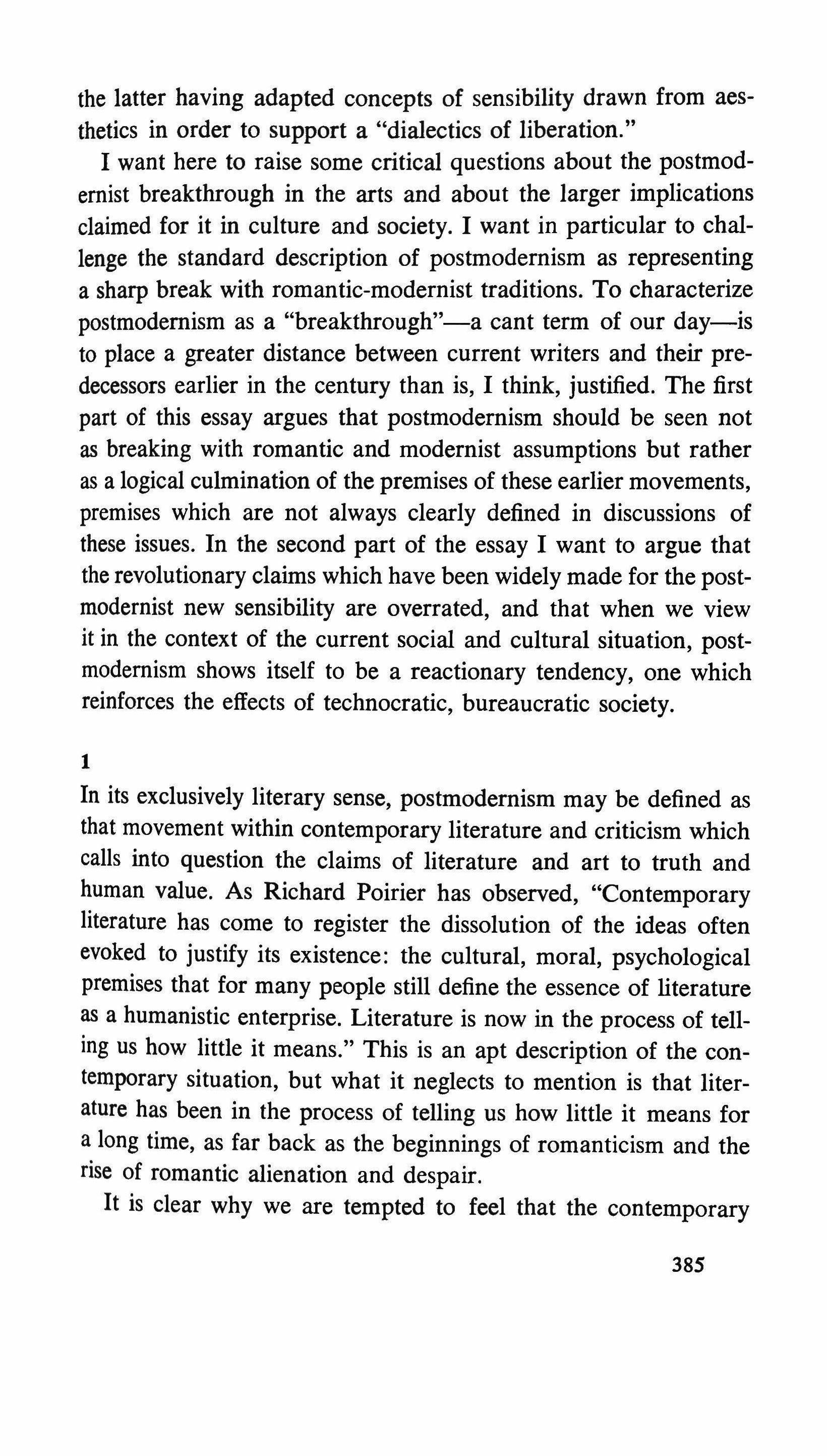
the latter having adapted concepts of sensibility drawn from aesthetics in order to support a "dialectics of liberation."
I want here to raise some critical questions about the postmodernist breakthrough in the arts and about the larger implications claimed for it in culture and society. I want in particular to challenge the standard description of postmodernism as representing a sharp break with romantic-modernist traditions. To characterize postmodernism as a "breakthrough"-a cant term of our day-is to place a greater distance between current writers and their predecessors earlier in the century than is, I think, justified. The first part of this essay argues that postmodernism should be seen not as breaking with romantic and modernist assumptions but rather as a logical culmination of the premises of these earlier movements, premises which are not always clearly defined in discussions of these issues. In the second part of the essay I want to argue that the revolutionary claims which have been widely made for the postmodernist new sensibility are overrated, and that when we view it in the context of the current social and cultural situation, postmodernism shows itself to be a reactionary tendency, one which reinforces the effects of technocratic, bureaucratic society.
1
In its exclusively literary sense, postmodernism may be defined as that movement within contemporary literature and criticism which calls into question the claims of literature and art to truth and human value. As Richard Poirier has observed, "Contemporary literature has come to register the dissolution of the ideas often evoked to justify its existence: the cultural, moral, psychological premises that for many people still define the essence of literature as a humanistic enterprise. Literature is now in the process of telling us how little it means." This is an apt description of the contemporary situation, but what it neglects to mention is that literature has been in the process of telling us how little it means for a long time, as far back as the beginnings of romanticism and the rise of romantic alienation and despair. It is clear why we are tempted to feel that the contemporary 385

popularity of anti-art and artistic self-parody represents a sharp reversal. It does not seem so long ago that writers like Rilke, Valery, Joyce, and Yeats preached a kind of salvation through art. For Rilke, as for Shelley and other romantics, poetry was "a mouth which else Nature would lack," the great agency for the restitution of values in an inherently valueless world. This belief in the constitutive power of the imagination which supported romantic and modernist writers, their confidence in the order and meaning reposed in high cultural tradition as a means of rescuing themselves from the chaos and fragmentation of a mass, industrialized society, appeared suddenly to have run its course by the mid-fifties. Since then, art and literature have increasingly incorporated a sense of irony and skepticism toward art's traditional pretensions to truth, high seriousness, and the profundity of "meaning." Whereas Eliot, Faulkner, and their imitators sometimes seemed to be writing with an eye to providing texts capable of being submitted to the complex critical "explications" of the New Critics, much of the literature of the last twenty years has been conditioned by the wish to remain invulnerable to critical analysis-the "opacity" of the New Novel being one case in point.
The conventions of postmodernist art systematically invert the respect for artistic truth and significance which had characterized modernism. In Donald Barthelme's anti-novel, Snow White, a questionnaire poses for the reader such questions as, "Has the work, for you, a metaphysical dimension?" Alain Robbe-Grillet writes and campaigns in behalf of a type of fiction in which "obviousness, transparency, precludes the existence of higher worlds, of any transcendence." Susan Sontag denounces the interpretation of works of art on the grounds that "to interpret is to impoverish, to deplete the world-in order to set up a shadow world of 'meanings.' Leslie Fiedler in an essay on modern poetry characterizes one of its chief tendencies as a revolt against "the platitude of meaning." Jacob Brackman, in his brief but illuminating study, The Put-On, describes this device in art and social behavior as an attempt to forestall by ridiculing in advance the raising of the
386
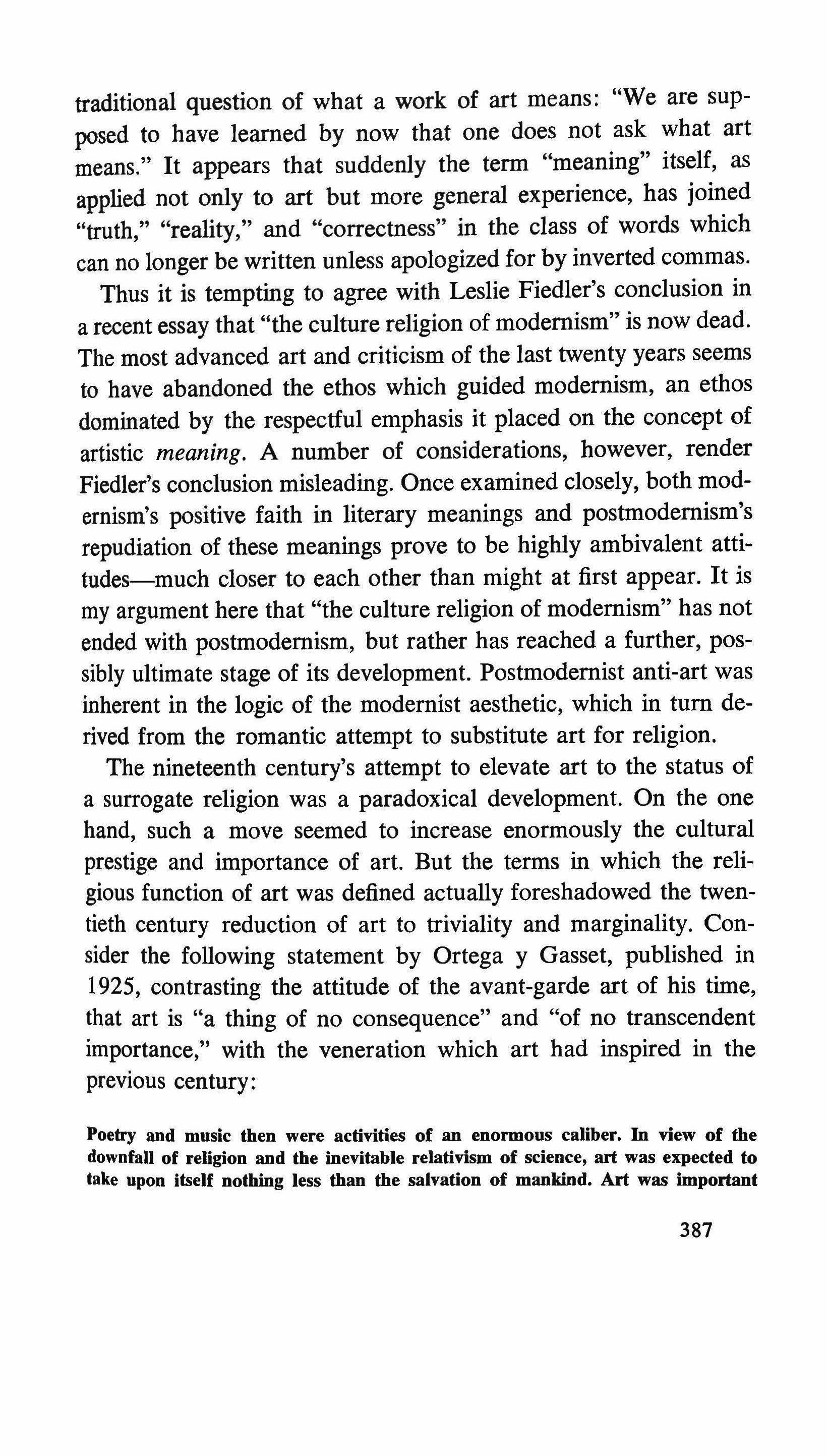
traditional question of what a work of art means: "We are supposed to have learned by now that one does not ask what art means." It appears that suddenly the term "meaning" itself, as applied not only to art but more general experience, has joined "truth," "reality," and "correctness" in the class of words which can no longer be written unless apologized for by inverted commas. Thus it is tempting to agree with Leslie Fiedler's conclusion in a recent essay that "the culture religion of modernism" is now dead. The most advanced art and criticism of the last twenty years seems to have abandoned the ethos which guided modernism, an ethos dominated by the respectful emphasis it placed on the concept of artistic meaning. A number of considerations, however, render Fiedler's conclusion misleading. Once examined closely, both modernism's positive faith in literary meanings and postmodernism's repudiation of these meanings prove to be highly ambivalent attitudes-much closer to each other than might at first appear. It is my argument here that "the culture religion of modernism" has not ended with postmodernism, but rather has reached a further, possibly ultimate stage of its development. Postmodernist anti-art was inherent in the logic of the modernist aesthetic, which in turn derived from the romantic attempt to substitute art for religion. The nineteenth century's attempt to elevate art to the status of a surrogate religion was a paradoxical development. On the one hand, such a move seemed to increase enormously the cultural prestige and importance of art. But the terms in which the religious function of art was defined actually foreshadowed the twentieth century reduction of art to triviality and marginality. Consider the following statement by Ortega y Gasset, published in 1925, contrasting the attitude of the avant-garde art of his time, that art is "a thing of no consequence" and "of no transcendent importance," with the veneration which art had inspired in the previous century:
Poetry and music then were activities of an enormous caliber. In view of the downfall of religion and the inevitable relativism of science, art was expected to take upon itself nothing less than the salvation of mankind. Art was important
387
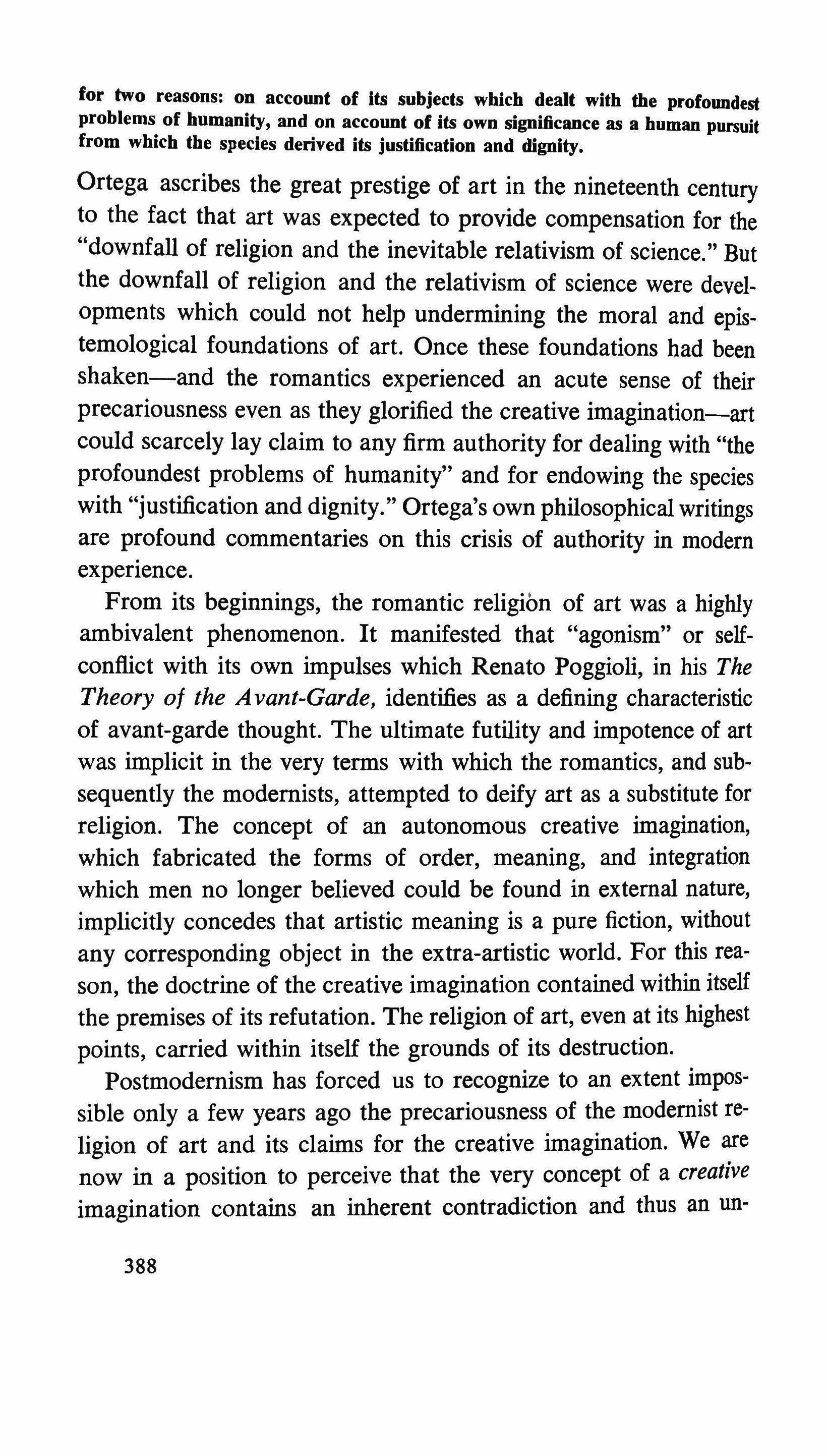
for two reasons: on account of its subjects which dealt with the profoundest problems of humanity, and on account of its own significance as a human pursuit from which the species derived its justification and dignity.
Ortega ascribes the great prestige of art in the nineteenth century to the fact that art was expected to provide compensation for the "downfall of religion and the inevitable relativism of science." But the downfall of religion and the relativism of science were developments which could not help undermining the moral and epistemological foundations of art. Once these foundations had been shaken-and the romantics experienced an acute sense of their precariousness even as they glorified the creative imagination-art could scarcely lay claim to any firm authority for dealing with "the profoundest problems of humanity" and for endowing the species with "justification and dignity." Ortega's own philosophical writings are profound commentaries on this crisis of authority in modern experience.
From its beginnings, the romantic religion of art was a highly ambivalent phenomenon. It manifested that "agonism" or selfconflict with its own impulses which Renato Poggioli, in his The Theory of the Avant-Garde, identifies as a defining characteristic of avant-garde thought. The ultimate futility and impotence of art was implicit in the very terms with which the romantics, and subsequently the modernists, attempted to deify art as a substitute for religion. The concept of an autonomous creative imagination, which fabricated the forms of order, meaning, and integration which men no longer believed could be found in external nature, implicitly concedes that artistic meaning is a pure fiction, without any corresponding object in the extra-artistic world. For this reason, the doctrine of the creative imagination contained within itself the premises of its refutation. The religion of art, even at its highest points, carried within itself the grounds of its destruction.
Postmodernism has forced us to recognize to an extent impossible only a few years ago the precariousness of the modernist religion of art and its claims for the creative imagination. We are now in a position to perceive that the very concept of a creative imagination contains an inherent contradiction and thus an un-
388
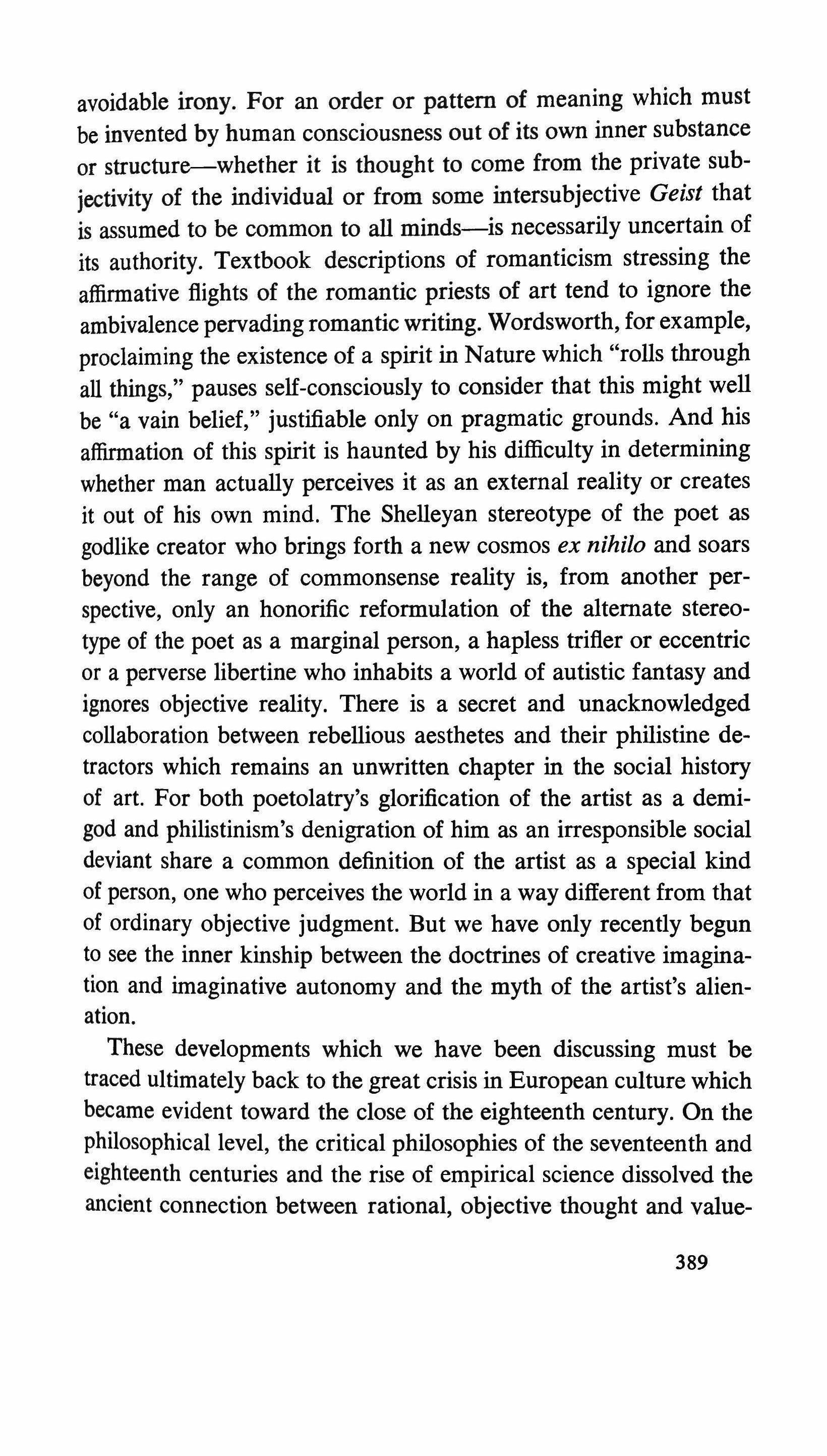
avoidable irony. For an order or pattern of meaning which must be invented by human consciousness out of its own inner substance or structure-whether it is thought to come from the private subjectivity of the individual or from some intersubjective Geist that is assumed to be common to all minds-is necessarily uncertain of its authority. Textbook descriptions of romanticism stressing the affirmative flights of the romantic priests of art tend to ignore the ambivalence pervading romantic writing. Wordsworth, for example, proclaiming the existence of a spirit in Nature which "rolls through all things," pauses self-consciously to consider that this might well be "a vain belief," justifiable only on pragmatic grounds. And his affirmation of this spirit is haunted by his difficulty in determining whether man actually perceives it as an external reality or creates it out of his own mind. The Shelleyan stereotype of the poet as godlike creator who brings forth a new cosmos ex nihilo and soars beyond the range of commonsense reality is, from another perspective, only an honorific reformulation of the alternate stereotype of the poet as a marginal person, a hapless trifler or eccentric or a perverse libertine who inhabits a world of autistic fantasy and ignores objective reality. There is a secret and unacknowledged collaboration between rebellious aesthetes and their philistine detractors which remains an unwritten chapter in the social history of art. For both poetolatry's glorification of the artist as a demigod and philistinism's denigration of him as an irresponsible social deviant share a common definition of the artist as a special kind of person, one who perceives the world in a way different from that of ordinary objective judgment. But we have only recently begun to see the inner kinship between the doctrines of creative imagination and imaginative autonomy and the myth of the artist's alienation.
These developments which we have been discussing must be traced ultimately back to the great crisis in European culture which became evident toward the close of the eighteenth century. On the philosophical level, the critical philosophies of the seventeenth and eighteenth centuries and the rise of empirical science dissolved the ancient connection between rational, objective thought and value-
389
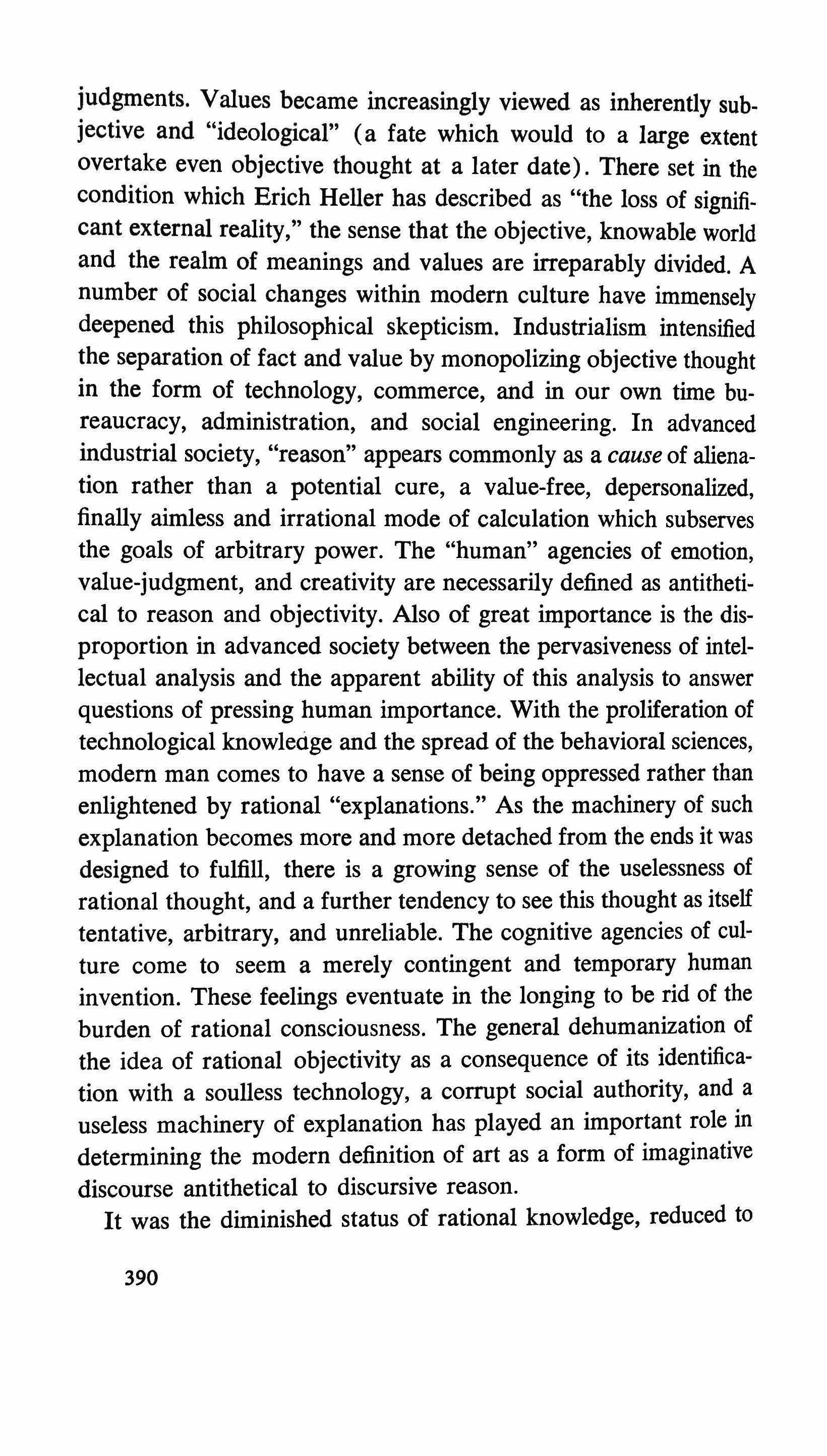
judgments. Values became increasingly viewed as inherently subjective and "ideological" (a fate which would to a large extent overtake even objective thought at a later date). There set in the condition which Erich Heller has described as "the loss of significant external reality," the sense that the objective, knowable world and the realm of meanings and values are irreparably divided. A number of social changes within modern culture have immensely deepened this philosophical skepticism. Industrialism intensified the separation of fact and value by monopolizing objective thought in the form of technology, commerce, and in our own time bureaucracy, administration, and social engineering. In advanced industrial society, "reason" appears commonly as a cause of alienation rather than a potential cure, a value-free, depersonalized, finally aimless and irrational mode of calculation which subserves the goals of arbitrary power. The "human" agencies of emotion, value-judgment, and creativity are necessarily defined as antithetical to reason and objectivity. Also of great importance is the disproportion in advanced society between the pervasiveness of intellectual analysis and the apparent ability of this analysis to answer questions of pressing human importance. With the proliferation of technological knowledge and the spread of the behavioral sciences, modem man comes to have a sense of being oppressed rather than enlightened by rational "explanations." As the machinery of such explanation becomes more and more detached from the ends it was designed to fulfill, there is a growing sense of the uselessness of rational thought, and a further tendency to see this thought as itself tentative, arbitrary, and unreliable. The cognitive agencies of culture come to seem a merely contingent and temporary human invention. These feelings eventuate in the longing to be rid of the burden of rational consciousness. The general dehumanization of the idea of rational objectivity as a consequence of its identification with a soulless technology, a corrupt social authority, and a useless machinery of explanation has played an important role in determining the modern definition of art as a form of imaginative discourse antithetical to discursive reason. It was the diminished status of rational knowledge, reduced to 390
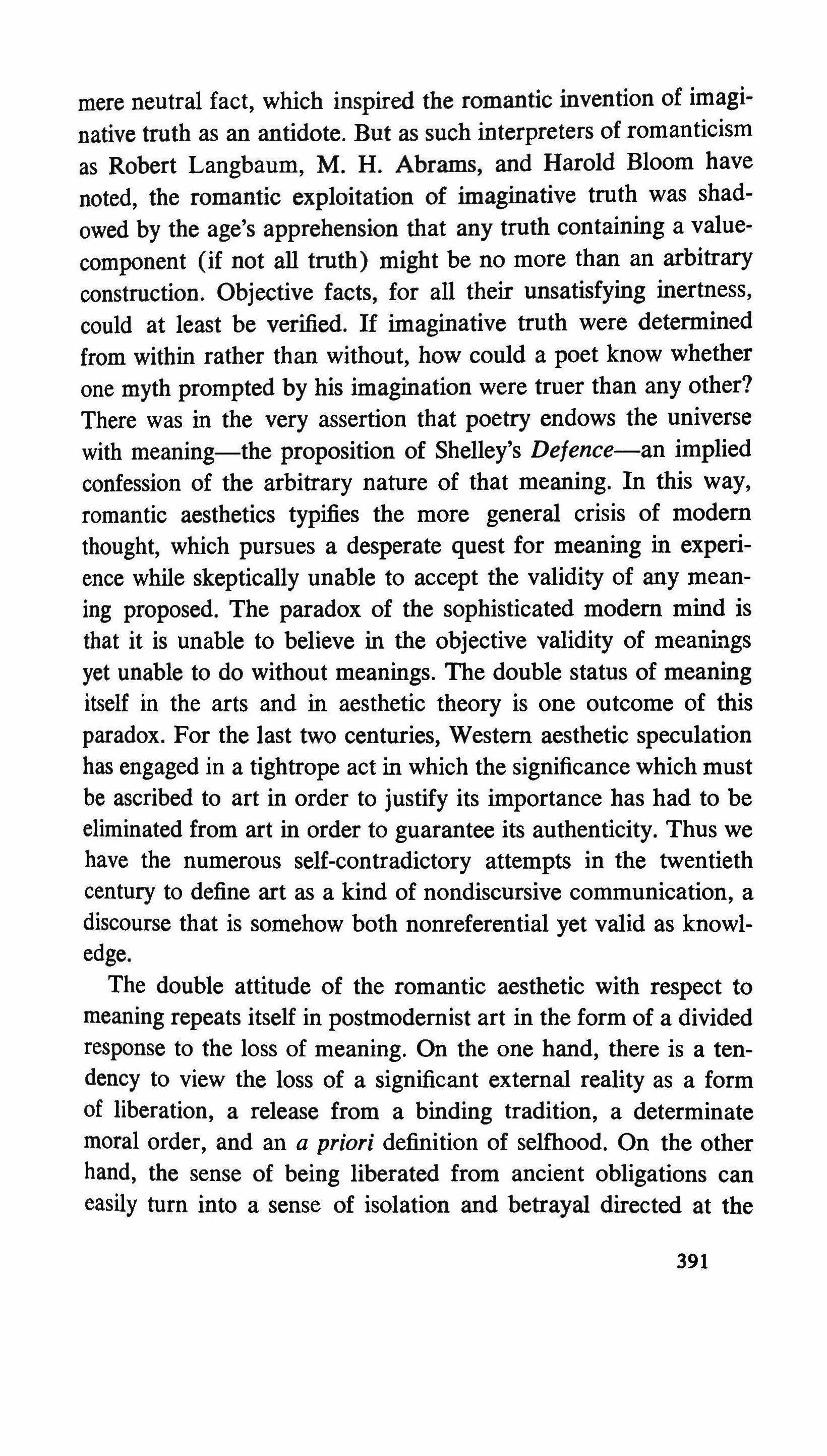
mere neutral fact, which inspired the romantic invention of imaginative truth as an antidote. But as such interpreters of romanticism as Robert Langbaum, M. H. Abrams, and Harold Bloom have noted, the romantic exploitation of imaginative truth was shadowed by the age's apprehension that any truth containing a valuecomponent (if not all truth) might be no more than an arbitrary construction. Objective facts, for all their unsatisfying inertness, could at least be verified. If imaginative truth were determined from within rather than without, how could a poet know whether one myth prompted by his imagination were truer than any other? There was in the very assertion that poetry endows the universe with meaning-the proposition of Shelley's Defence-an implied confession of the arbitrary nature of that meaning. In this way, romantic aesthetics typifies the more general crisis of modem thought, which pursues a desperate quest for meaning in experience while skeptically unable to accept the validity of any meaning proposed. The paradox of the sophisticated modem mind is that it is unable to believe in the objective validity of meanings yet unable to do without meanings. The double status of meaning itself in the arts and in aesthetic theory is one outcome of this paradox. For the last two centuries, Western aesthetic speculation has engaged in a tightrope act in which the significance which must be ascribed to art in order to justify its importance has had to be eliminated from art in order to guarantee its authenticity. Thus we have the numerous self-contradictory attempts in the twentieth century to define art as a kind of nondiscursive communication, a discourse that is somehow both nonreferential yet valid as knowledge.
The double attitude of the romantic aesthetic with respect to meaning repeats itself in postmodernist art in the form of a divided response to the loss of meaning. On the one hand, there is a tendency to view the loss of a significant external reality as a form of liberation, a release from a binding tradition, a determinate moral order, and an a priori definition of selfhood. On the other hand, the sense of being liberated from ancient obligations can easily tum into a sense of isolation and betrayal directed at the 391
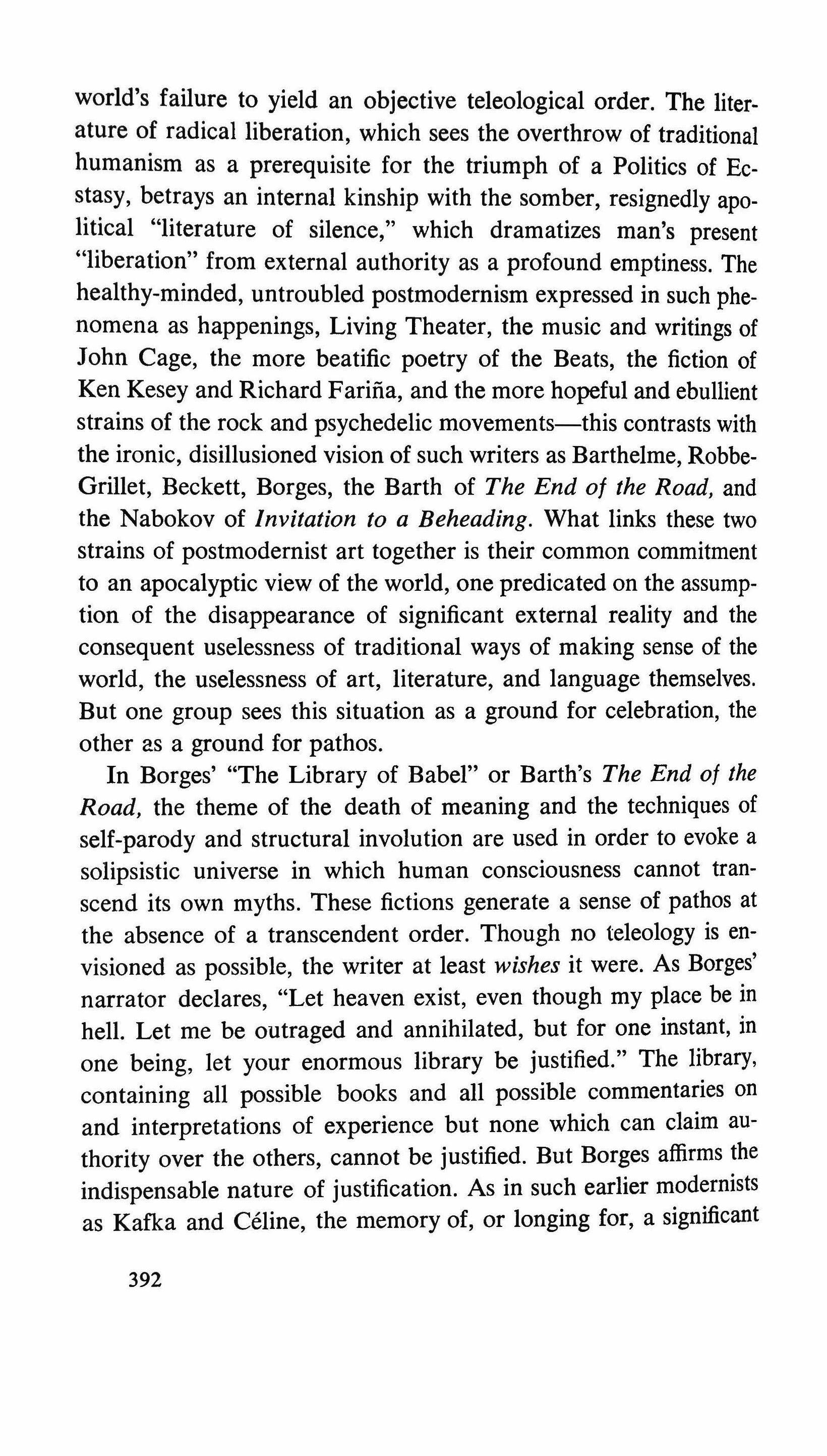
world's failure to yield an objective teleological order. The literature of radical liberation, which sees the overthrow of traditional humanism as a prerequisite for the triumph of a Politics of Ecstasy, betrays an internal kinship with the somber, resignedlyapolitical "literature of silence," which dramatizes man's present "liberation" from external authority as a profound emptiness. The healthy-minded, untroubled postmodernism expressed in such phenomena as happenings, Living Theater, the music and writings of John Cage, the more beatific poetry of the Beats, the fiction of Ken Kesey and Richard Fariiia, and the more hopeful and ebullient strains of the rock and psychedelic movements-this contrasts with the ironic, disillusioned vision of such writers as Barthelme, RobbeGrillet, Beckett, Borges, the Barth of The End of the Road, and the Nabokov of Invitation to a Beheading. What links these two strains of postmodernist art together is their common commitment to an apocalyptic view of the world, one predicated on the assumption of the disappearance of significant external reality and the consequent uselessness of traditional ways of making sense of the world, the uselessness of art, literature, and language themselves. But one group sees this situation as a ground for celebration, the other as a ground for pathos.
In Borges' "The Library of Babel" or Barth's The End of the Road, the theme of the death of meaning and the techniques of self-parody and structural involution are used in order to evoke a solipsistic universe in which human consciousness cannot transcend its own myths. These fictions generate a sense of pathos at the absence of a transcendent order. Though no teleology is envisioned as possible, the writer at least wishes it were. As Borges' narrator declares, "Let heaven exist, even though my place be in hell. Let me be outraged and annihilated, but for one instant, in one being, let your enormous library be justified." The library, containing all possible books and all possible commentaries on and interpretations of experience but none which can claim authority over the others, cannot be justified. But Borges affirms the indispensable nature of justification. As in such earlier modernists as Kafka and Celine, the memory of, or longing for, a significant
392
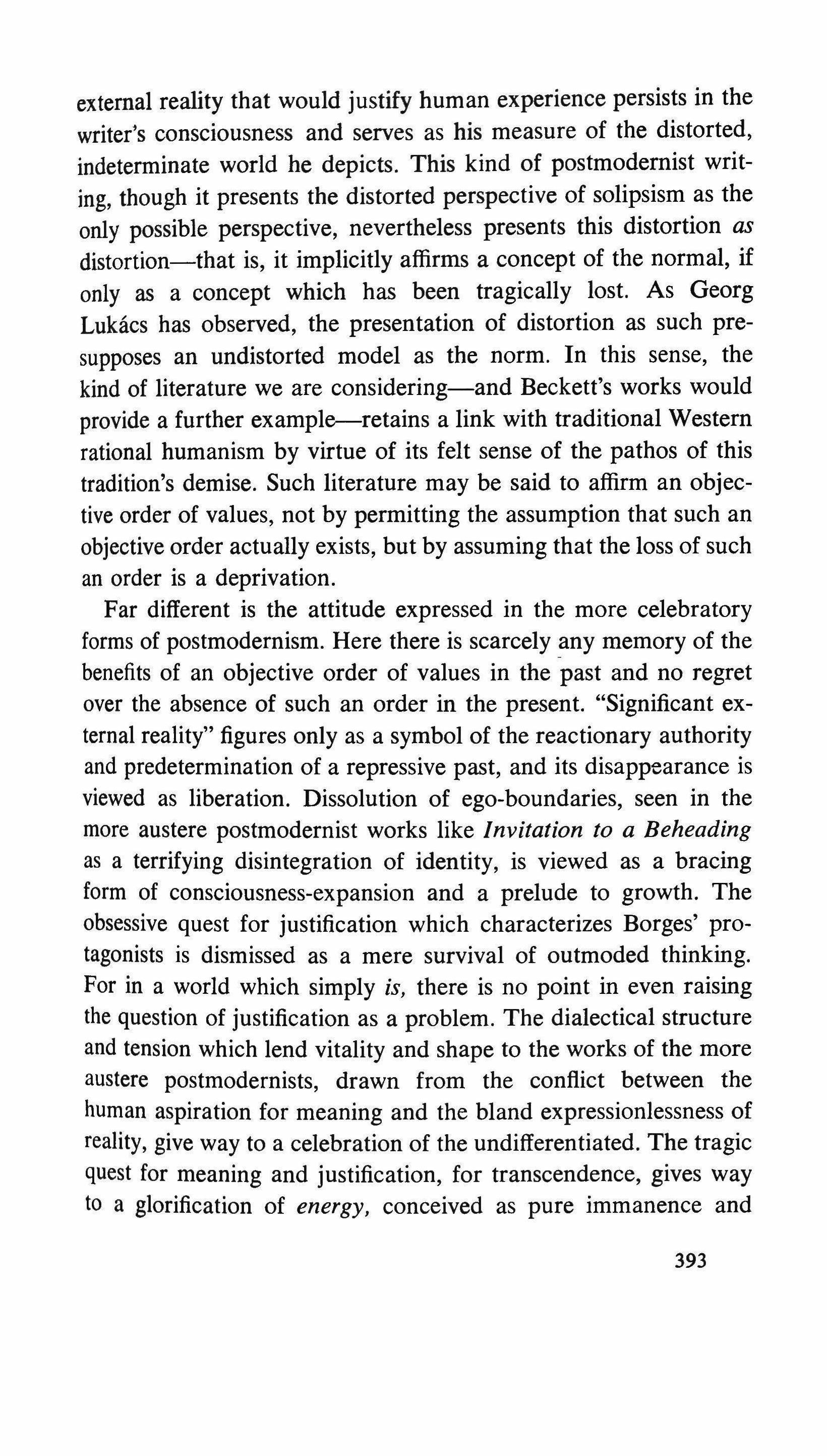
external reality that would justify human experience persists in the writer's consciousness and serves as his measure of the distorted, indeterminate world he depicts. This kind of postmodernist writing, though it presents the distorted perspective of solipsism as the only possible perspective, nevertheless presents this distortion as distortion-that is, it implicitly affirms a concept of the normal, if only as a concept which has been tragically lost. As Georg Lukacs has observed, the presentation of distortion as such presupposes an undistorted model as the norm. In this sense, the kind of literature we are considering-and Beckett's works would provide a further example-retains a link with traditional Western rational humanism by virtue of its felt sense of the pathos of this tradition's demise. Such literature may be said to affirm an objective order of values, not by permitting the assumption that such an objective order actually exists, but by assuming that the loss of such an order is a deprivation.
Far different is the attitude expressed in the more celebratory forms of postmodernism. Here there is scarcely _any memory of the benefits of an objective order of values in the past and no regret over the absence of such an order in the present. "Significant external reality" figures only as a symbol of the reactionary authority and predetermination of a repressive past, and its disappearance is viewed as liberation. Dissolution of ego-boundaries, seen in the more austere postmodernist works like Invitation to a Beheading as a terrifying disintegration of identity, is viewed as a bracing form of consciousness-expansion and a prelude to growth. The obsessive quest for justification which characterizes Borges' protagonists is dismissed as a mere survival of outmoded thinking. For in a world which simply is, there is no point in even raising the question of justification as a problem. The dialectical structure and tension which lend vitality and shape to the works of the more austere postmodernists, drawn from the conflict between the human aspiration for meaning and the bland expressionlessness of reality, give way to a celebration of the undifferentiated. The tragic quest for meaning and justification, for transcendence, gives way to a glorification of energy, conceived as pure immanence and 393

process. There is, in a sense, a kind of "transcendence" that is taken as the object of this liberationist stance, a transcendence of the past, of objective reality, of the commonly understood limits of everyday forms of perception. But this is a transcendence which has, by definition, no goal, no teleology, no definable way of completing itself, and thus it expresses itself as a benign celebration of the infinity of all being.
Susan Sontag, expressing this attitude in criticism, observes of art and the world: "Both are. Both need no justification; nor could they possibly have any." The exemplary posture for Miss Sontag becomes the acceptance of the totality without critical discrimination, a posture exemplified in the work of John Cage: "Cage proposes for our experience," Miss Sontag says, "a world in which it's never preferable to do other than we are doing or be elsewhere than we are. 'It is only irritating,' he says, 'to think one would like to be somewhere else. Here we are now.' Cage himself says: "We are intimate in advance with whatever will happen," not because history has any meaning or direction, but precisely because it is so pointless that to expect meaning is absurd. Thus distortion, far from being viewed as a deviation from any desired, if unattainable, norm, is taken to be the normal and proper condition of human expenence.
Wherea�, as we saw, austere postmodernism retains some sense of the conflict between human desire and the external world of circumstance which pervades classical tragic literature, ecstatic postmodernism merges conflicts into an undifferentiated unity of being. Where conflict does enter into the world of this latter kind of art, it is generated not by anything inherent in the nature of reality, but by artificial and removable institutional repressions, usually dramatized in the shape of crude stereotypes of technological, institutional repression of sexual energy. Tragedy is thus replaced by sentimental melodrama, typified, for instance, in such oppositions as that between the putatively "best minds" of Allen Ginsberg's generation and "Moloch," or between Ken Kesey's "Big Nurse" and the sexually omnipotent hero, McMurphy, of One Flew over the Cuckoo's Nest.
394
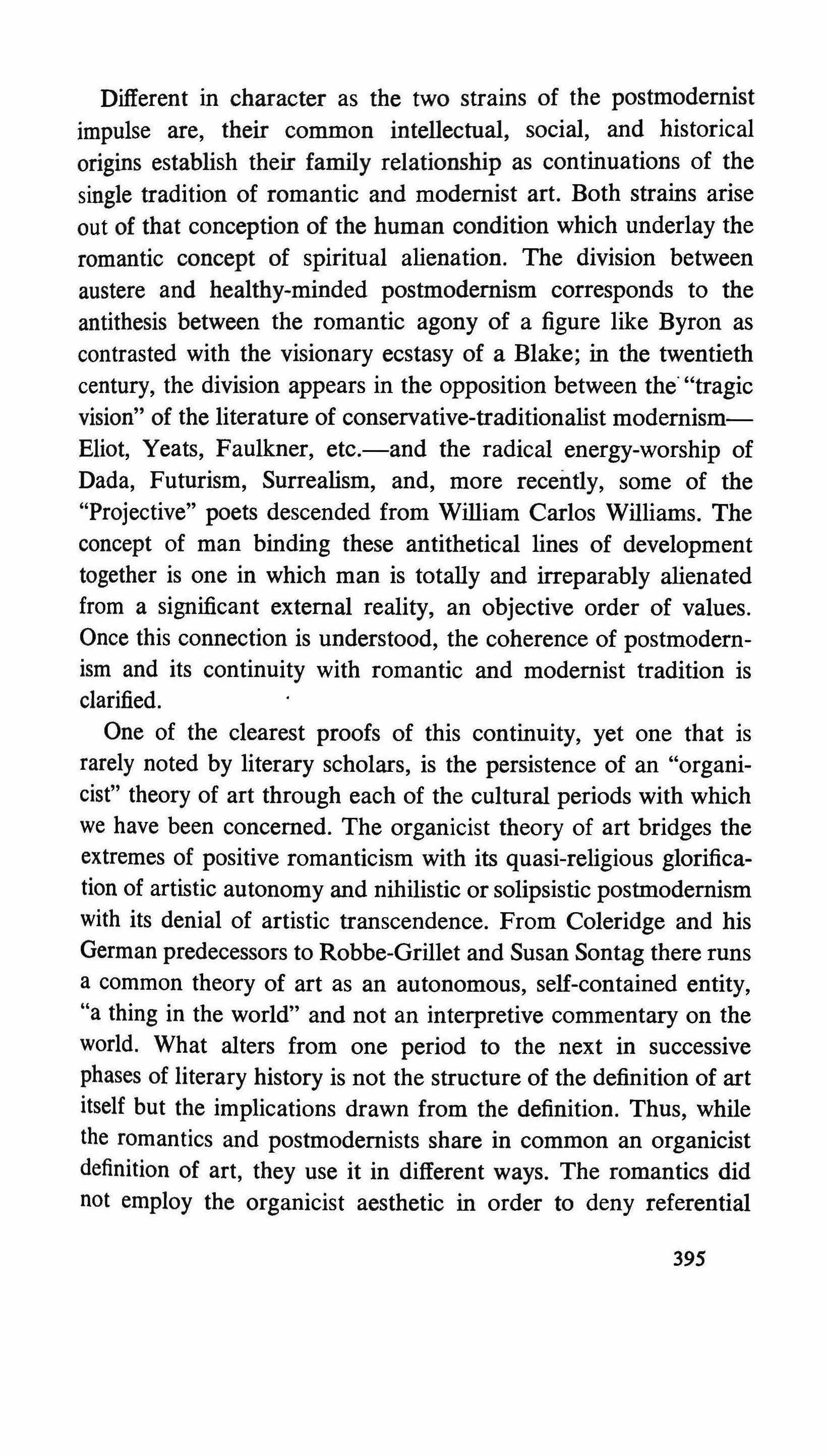
Different in character as the two strains of the postmodernist impulse are, their common intellectual, social, and historical origins establish their family relationship as continuations of the single tradition of romantic and modernist art. Both strains arise out of that conception of the human condition which underlay the romantic concept of spiritual alienation. The division between austere and healthy-minded postmodernism corresponds to the antithesis between the romantic agony of a figure like Byron as contrasted with the visionary ecstasy of a Blake; in the twentieth century, the division appears in the opposition between the' "tragic vision" of the literature of conservative-traditionalist modemismEliot, Yeats, Faulkner, etc.-and the radical energy-worship of Dada, Futurism, Surrealism, and, more recently, some of the "Projective" poets descended from William Carlos Williams. The concept of man binding these antithetical lines of development together is one in which man is totally and irreparably alienated from a significant external reality, an objective order of values. Once this connection is understood, the coherence of postmodernism and its continuity with romantic and modernist tradition is clarified.
One of the clearest proofs of this continuity, yet one that is rarely noted by literary scholars, is the persistence of an "organicist" theory of art through each of the cultural periods with which we have been concerned. The organicist theory of art bridges the extremes of positive romanticism with its quasi-religious glorification of artistic autonomy and nihilistic or solipsistic postmodernism with its denial of artistic transcendence. From Coleridge and his German predecessors to Robbe-Grillet and Susan Sontag there runs a common theory of art as an autonomous, self-contained entity, "a thing in the world" and not an interpretive commentary on the world. What alters from one period to the next in successive phases of literary history is not the structure of the definition of art itself but the implications drawn from the definition. Thus, while the romantics and postmodernists share in common an organicist definition of art, they use it in different ways. The romantics did not employ the organicist aesthetic in order to deny referential 395

meaning and teleology to art. Their formulations, however, anticipated the contemporary employment of this aesthetic to that end. It was Coleridge who made the famous assertion, crucial in the development of modern criticism, that a good poem should "contain in itself the reason why it is so and so, and not otherwise." This statement of principle begs the question of what a good poem is since it defines poetic value as conformity to the poem's "self' yet refrains from characterizing that self. The confusion of this aesthetic principle parallels the confusion of the age with respect to the 'definition of human nature, and it reflects the deterioration of the ancient integrated world-view. That world-view had been able to say what things are and had not needed to fall back on tautologies of self-reference. Nevertheless, the circularity of Coleridge's organic principle has not prevented it from compelling assent from influential modern authors, critics, and aestheticians, who ignore the fact that the idea rests on a concept of "self-containment" which neither Coleridge nor anyone after him has succeeded in clarifying. Nor has it been noted that a literal application of the organic principle, which, it must be admitted, Coleridge himself did not choose to make, destroys the possibility of ascribing meaning to a work of art-or else renders the concept of such meaning inconsistent with aesthetic theory. The logical consequence of the organicist principle is to fence off the work of art from intellectual references, meanings, and concepts, things which must be dismissed as "outside" or "extrinsic" to the work of art, not "self-contained" within it. Though Coleridge and his contemporaries did not drive the logic of organicism to such reductive conclusions-they were still powerfully influenced by their classical heritage of mimesis-this logic in itself tends toward the view that a work of art finally "means itself." From this position it is only a further step to the idea that a work of art has no meaning at all.
In advancing his organic principle, Coleridge did not think of himself as reducing or attenuating the scope of literature. On the contrary, by making the imagination an organic faculty, Coleridge sought to identify the uniquely valuable element of literature, the 396
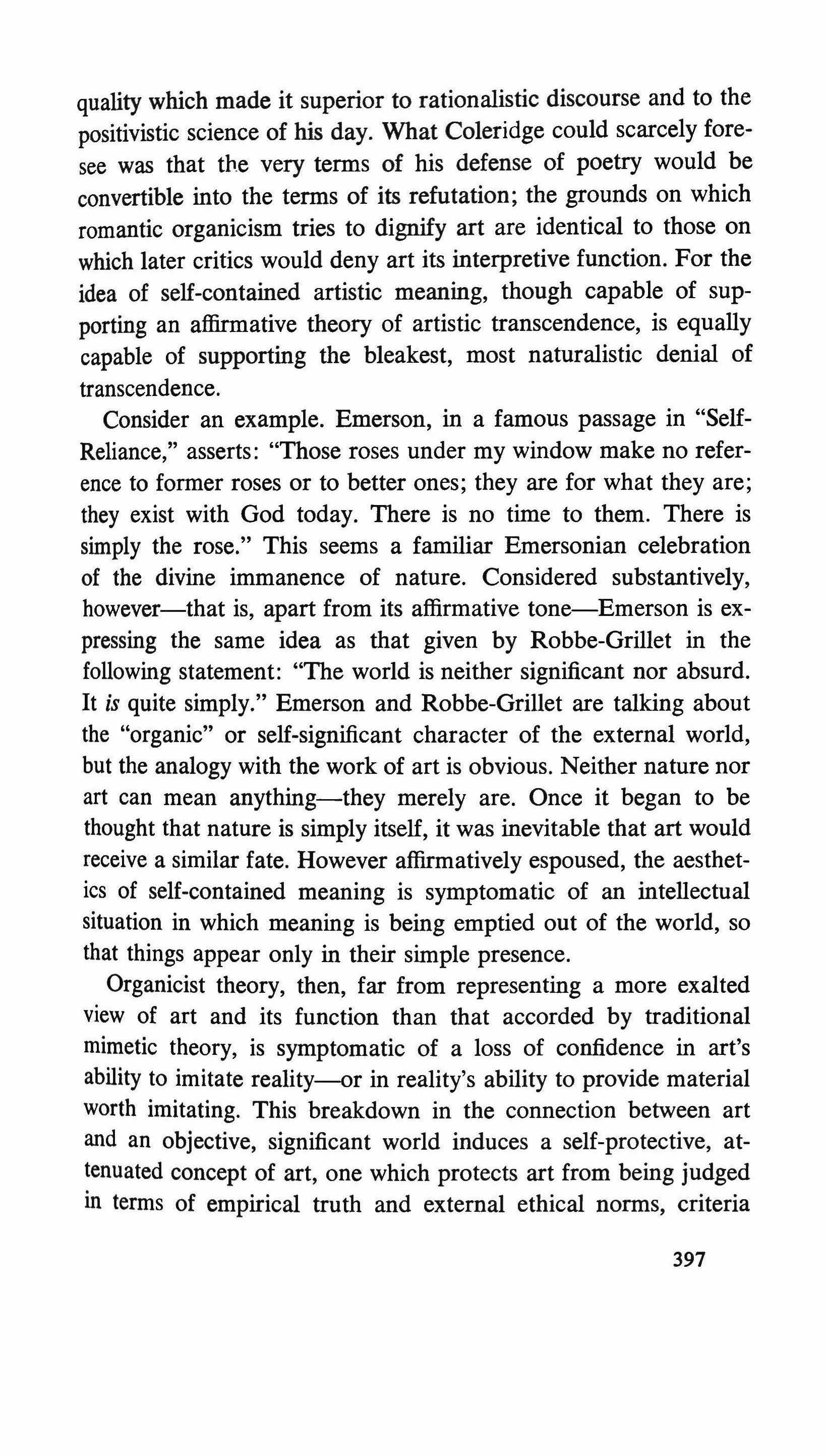
quality which made it superior to rationalistic discourse and to the positivistic science of his day. What Coleridge could scarcely foresee was that the very terms of his defense of poetry would be convertible into the terms of its refutation; the grounds on which romantic organicism tries to dignify art are identical to those on which later critics would deny art its interpretive function. For the idea of self-contained artistic meaning, though capable of supporting an affirmative theory of artistic transcendence, is equally capable of supporting the bleakest, most naturalistic denial of transcendence.
Consider an example. Emerson, in a famous passage in "SelfReliance," asserts: "Those roses under my window make no reference to former roses or to better ones; they are for what they are; they exist with God today. There is no time to them. There is simply the rose." This seems a familiar Emersonian celebration of the divine immanence of nature. Considered substantively, however-that is, apart from its affirmative tone-Emerson is expressing the same idea as that given by Robbe-Grillet in the following statement: "The world is neither significant nor absurd. It is quite simply." Emerson and Robbe-Grillet are talking about the "organic" or self-significant character of the external world, but the analogy with the work of art is obvious. Neither nature nor art can mean anything-they merely are. Once it began to be thought that nature is simply itself, it was inevitable that art would receive a similar fate. However affirmatively espoused, the aesthetics of self-contained meaning is symptomatic of an intellectual situation in which meaning is being emptied out of the world, so that things appear only in their simple presence. Organicist theory, then, far from representing a more exalted view of art and its function than that accorded by traditional mimetic theory, is symptomatic of a loss of confidence in art's ability to imitate reality--or in reality'S ability to provide material worth imitating. This breakdown in the connection between art and an objective, significant world induces a self-protective, attenuated concept of art, one which protects art from being judged in terms of empirical truth and external ethical norms, criteria 397

which, it is felt, art can no longer meet. That this "penitent art," as George Santayana termed it, often boasts of its lofty spiritual mission is immaterial. The grounds underlying the organicist defense of art are logically identical to the grounds on which contemporary intellectuals despair of art and deny art's ability to interpret reality: the view that art inhabits a universe stripped of teleology and is doomed only to "mean itself."
Twentieth century restatements of organicism, as in such theorists as Croce, Cassirer, Langer, Frye, and the American New Critics, have effectively extended this theory's latent hostility to the concept of artistic meaning. The present century has witnessed the culmination of the revolt against the ancient idea that a work of art "says" something, communicates some more or less humanly important "matter." There is no more telling evidence of the despairing situation of humanistic intellectuals, whether they are aware of it or not, than the fact that art, according to their most favored conception of it, is incapable of asserting beliefs, convictions, or hypotheses-or is regarded as inferior art if it makes a point of doing so. According to the main tradition of modern aesthetics, art deals with experience only as myth, psychology, or language-not as objective truth. It is held that art supplies frames of reference which "organize" or "order" the randomness of experience into coherent patterns. But this artistic "ordering" of experience is not seen as capable of being authenticated by anything in the objective structure of the experience itself. Consequently, the artist and the reader are expected to "believe" in the reality of this aesthetic order only provisionally, as a kind of mythic assent. It is felt that either there are no beliefs one can legitimately risk affirming or else that the belief-affirming modes of expression have been hopelessly discredited. Though they do not admit it, the theorists mentioned above have not succeeded in giving art any stronger cognitive and epistemological foundations than were provided by the "pseudo-statement" theory of I. A. Richards and the Logical Positivists. This failure of modern aesthetic theory to find an interpretive function for art has helped prepare the
398

ground for the narcissism and self-contempt which mark postmodernist aesthetics.
Twentieth century aestheticians would dispute the accusation that the theory of artistic autonomy does away with artistic meaning. These theorists popularly distinguish between the "nondiscursive" meaning characteristic of art and the inferior propositional meanings of science, logic, and practical discourse. (See, for example, Susanne Langer's theory of "presentational symbols.") Their attempts to reconcile the principle of autonomy, however, with the presence of significant meaning in art have not met with notable success. Organicist theories repeatedly tend toward confused formulations which rescue themselves by contradiction and paradox. Thus the most assiduous American exponent of organic theory, Murray Krieger, attempts to reconcile a "contextualist" aesthetic with an aesthetic which will permit art to refer to the world by resorting to "miraculism" as the only possible way out: "The literary work is able miraculously to satisfy both propositions at once, being at once totally thematic and totally aesthetic, answerable to itself only by being answerable to the outside world." This kind of credo quia impossibile in literary criticism could not help undermining the interpretive claims of literature itself. The organicist theorizing of the 'forties and 'fifties not only helped to dethrone the ancient theory of art as mimesis. Having toppled the older aesthetic, the new theory proved incapable of resisting the attacks of its own skepticism turned against itself. The organicist theory has thus proved vulnerable in recent years to precisely the same kind of attacks which its advocates had once leveled at representational theories of art. This vulnerability is seen in current attacks on the New Critics by postmodernist spokesmen. It is both ironic and fitting that the New Critics should have been dethroned from critical preeminence by the weight of arguments they themselves perfected. The New Criticism engaged in the paradoxical endeavor to defend poetic meaning by arguing that "a poem should not mean but be." In this respect they manifested that ambivalence toward meaning
399

which is endemic to modern thinking about art. It requires only a modicum of historical sense to see that when Susan Sontag now indicts New Critical-style interpretation of literature, she does so on the ground of the very crime for which the New Critics had condemned their own critical opponents, namely, "the heresy of paraphrase." The New Critics were masters of interpretation who had a profound skepticism of interpretation. Their theory of literature was in conflict with their method. While their close explications of specific texts called attention to the importance of meaning in literature, their theoretical arguments spread or reinforced suspicion of the notion that literature can even be said to have anything so discursive and didactic as a meaning. That the New Critics are in the 'seventies routinely disparaged as meaningmongers and hyperintellectualizers reveals the power, and the continuing cultural prestige, of the anti-intellectual skepticism which they helped to further. Here is a significant example of the way in which ideas latent in the modernist tradition have come to be turned against modernism.
If postmodernism, then, has superseded romanticism, modernism, and the culture religion of art, it has done so with weapons forged by these earlier movements. An illustration of postmodernism's love-hate relationship with its cultural precursors is found in Donald Barthelme's Snow White, one of the postmodernist works that is most skillful in its deployment of the literary past in a subversive way. A passage from the novel helps show how Barthelme assimilates aspects of modernism so as parodically to undermine them:
"Try to be a man about whom nothing is known," our father said, when we were young. Our father said several other interesting things, but we have forgotten what they were Our father was a man about whom nothing was known. Nothing is known about him still. He gave us the recipes. He was not very interesting. A tree is more interesting. A suitcase is more interesting. A canned good is more interesting.
Barthelme here parodies the advice which Henry James had offered to the aspiring fiction writer: "Try to be one of the people on whom nothing is lost." Barthelme inverts the assumptions about character, psychology, and the authority of the artist upon which
400
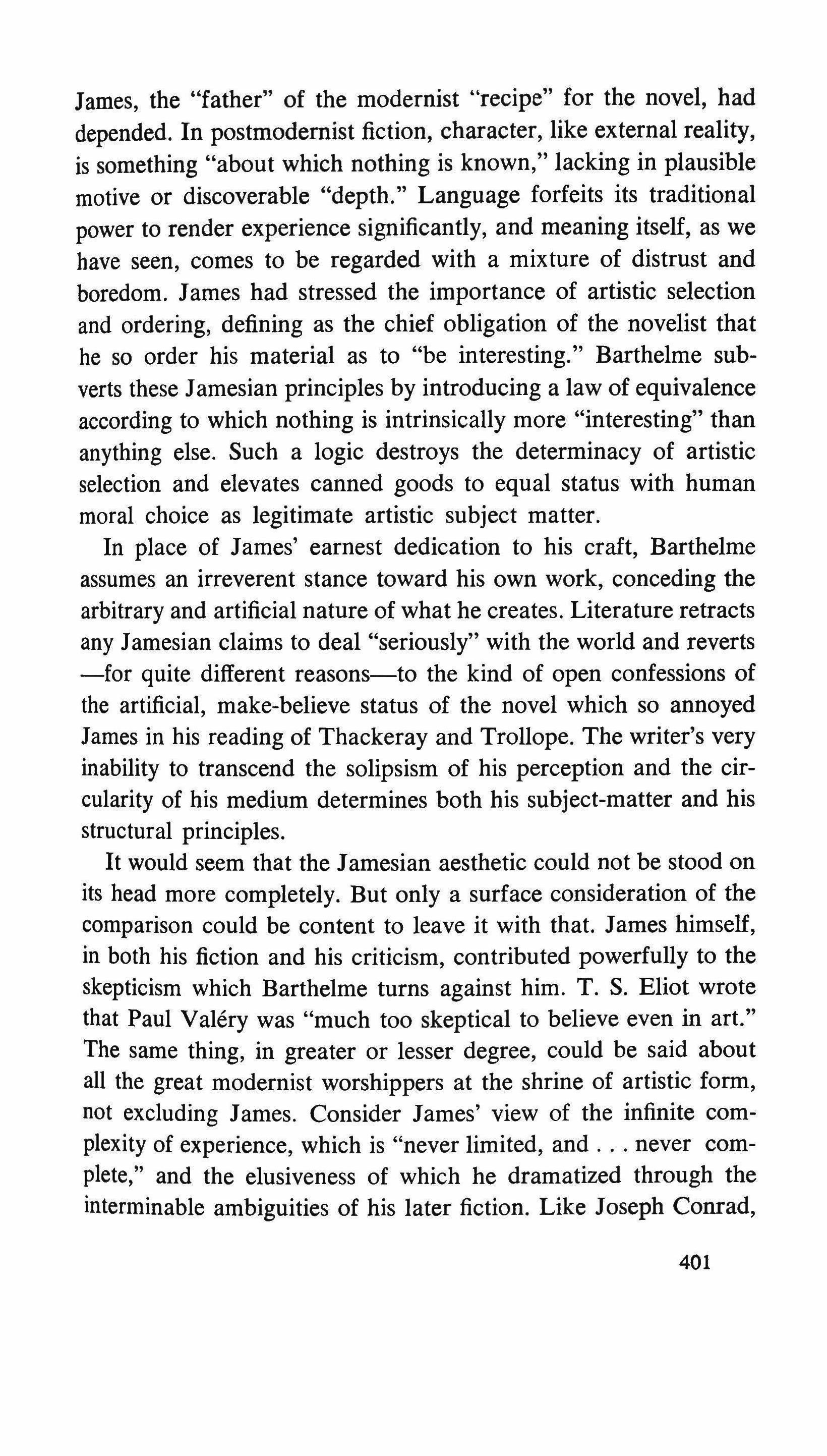
James, the "father" of the modernist "recipe" for the novel, had depended. In postmodernist fiction, character, like external reality, is something "about which nothing is known," lacking in plausible motive or discoverable "depth." Language forfeits its traditional power to render experience significantly, and meaning itself, as we have seen, comes to be regarded with a mixture of distrust and boredom. James had stressed the importance of artistic selection and ordering, defining as the chief obligation of the novelist that he so order his material as to "be interesting." Barthelme subverts these Jamesian principles by introducing a law of equivalence according to which nothing is intrinsically more "interesting" than anything else. Such a logic destroys the determinacy of artistic selection and elevates canned goods to equal status with human moral choice as legitimate artistic subject matter.
In place of James' earnest dedication to his craft, Barthelme assumes an irreverent stance toward his own work, conceding the arbitrary and artificial nature of what he creates. Literature retracts any Jamesian claims to deal "seriously" with the world and reverts -for quite different reasons-to the kind of open confessions of the artificial, make-believe status of the novel which so annoyed James in his reading of Thackeray and Trollope. The writer's very inability to transcend the solipsism of his perception and the circularity of his medium determines both his subject-matter and his structural principles.
It would seem that the Jamesian aesthetic could not be stood on its head more completely. But only a surface consideration of the comparison could be content to leave it with that. James himself, in both his fiction and his criticism, contributed powerfully to the skepticism which Barthelme turns against him. T. S. Eliot wrote that Paul Valery was "much too skeptical to believe even in art." The same thing, in greater or lesser degree, could be said about all the great modernist worshippers at the shrine of artistic form, not excluding James. Consider James' view of the infinite complexity of experience, which is "never limited, and never complete," and the elusiveness of which he dramatized through the interminable ambiguities of his later fiction. Like Joseph Conrad, 401
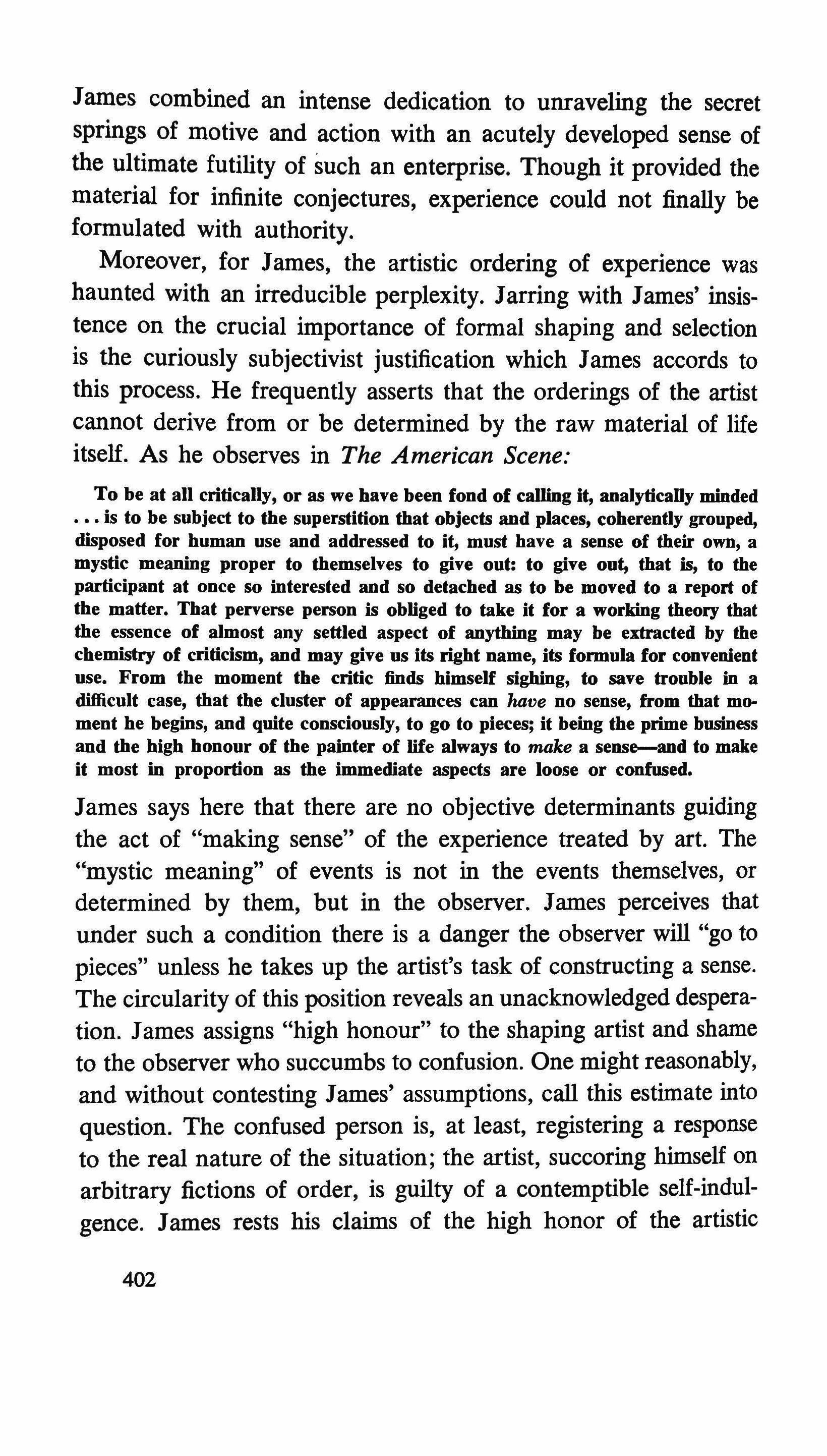
James combined an intense dedication to unraveling the secret springs of motive and action with an acutely developed sense of the ultimate futility of such an enterprise. Though it provided the material for infinite conjectures, experience could not finally be formulated with authority.
Moreover, for James, the artistic ordering of experience was haunted with an irreducible perplexity. Jarring with James' insistence on the crucial importance of formal shaping and selection is the curiously subjectivist justification which James accords to this process. He frequently asserts that the orderings of the artist cannot derive from or be determined by the raw material of life itself. As he observes in The American Scene:
To be at all critically, or as we have been fond of calling it, analytically minded is to be subject to the superstition that objects and places, coherently grouped, disposed for human use and addressed to it, must have a sense of their own, a mystic meaning proper to themselves to give out: to give out, that is, to the participant at once so interested and so detached as to be moved to a report of the matter. That perverse person is obliged to take it for a working theory that the essence of almost any settled aspect of anything may be extracted by the chemistry of criticism, and may give us its right name, its formula for convenient use. From the moment the critic finds himself sighing, to save trouble in a difficult case, that the cluster of appearances can have no sense, from that moment he begins, and quite consciously, to go to pieces; it being the prime bnsiness and the high honour of the painter of life always to make a sense-and to make it most in proportion as the immediate aspects are loose or confused.
James says here that there are no objective determinants guiding the act of "making sense" of the experience treated by art. The "mystic meaning" of events is not in the events themselves, or determined by them, but in the observer. James perceives that under such a condition there is a danger the observer will "go to pieces" unless he takes up the artist's task of constructing a sense. The circularity of this position reveals an unacknowledged desperation. James assigns "high honour" to the shaping artist and shame to the observer who succumbs to confusion. One might reasonably, and without contesting James' assumptions, call this estimate into question. The confused person is, at least, registering a response to the real nature of the situation; the artist, succoring himself on arbitrary fictions of order, is guilty of a contemptible self-indulgence. James rests his claims of the high honor of the artistic
402

process on the profoundly damaging admission that artistic order is not grounded in anything outside itself. In effect, James' assumptions and those of Henry Adams, who in his Education played the part of the desperately bewildered observer, are not far apart.
Similarly, the transition from James to his parodist, Barthelme, involves not so great a distance as might be supposed. James' art and his aesthetic assumptions prefigure, if they do not acknowledge, the sense of the loss of belief in a significant external reality which is the explicit theme of postmodernism. James' characteristic gesture is to try to rise above this loss by imposing upon experience an imaginative, aesthetic order, and he rests his faith in traditional resources of language and narrative structure as means to this end. The postmodernist, Barthelme, perceiving that any such imposed order is arbitrary, cannot take it seriously as a solution to the problem; he thus takes the modernist's traditional seriousnesswhich the modernist himself could not justify-as a target of parody. In this fashion, postmodernism exploits the radically nihilistic and skeptical premises latent in literary thinking since the romantic period. Whereas modernists such as James, Eliot, and Wallace Stevens turned to art-defined as the imposition of human order upon chaos-as an antidote for that "immense panorama of futility and anarchy which is contemporary history," as Eliot called his age, the postmodernists have recognized that under such conceptions of art and of history it makes no sense to regard art as providing any more consolation than any other discredited cultural institution, secular or religious. Postmodernism signifies that the nightmare of history, as modernism defined history, has overtaken modernism itself. For if history is seen as an unintelligible flux of phenomena, lacking in inherent significance and structure, then no exertions of the shaping, ordering imagination can be anything but a dishonest refuge from truth.
1
Numerous literary and cultural critics have spread the view that the postmodernist literary sensibility is part of a larger cultural revolution that is sweeping away the outmoded bourgeois con-
403
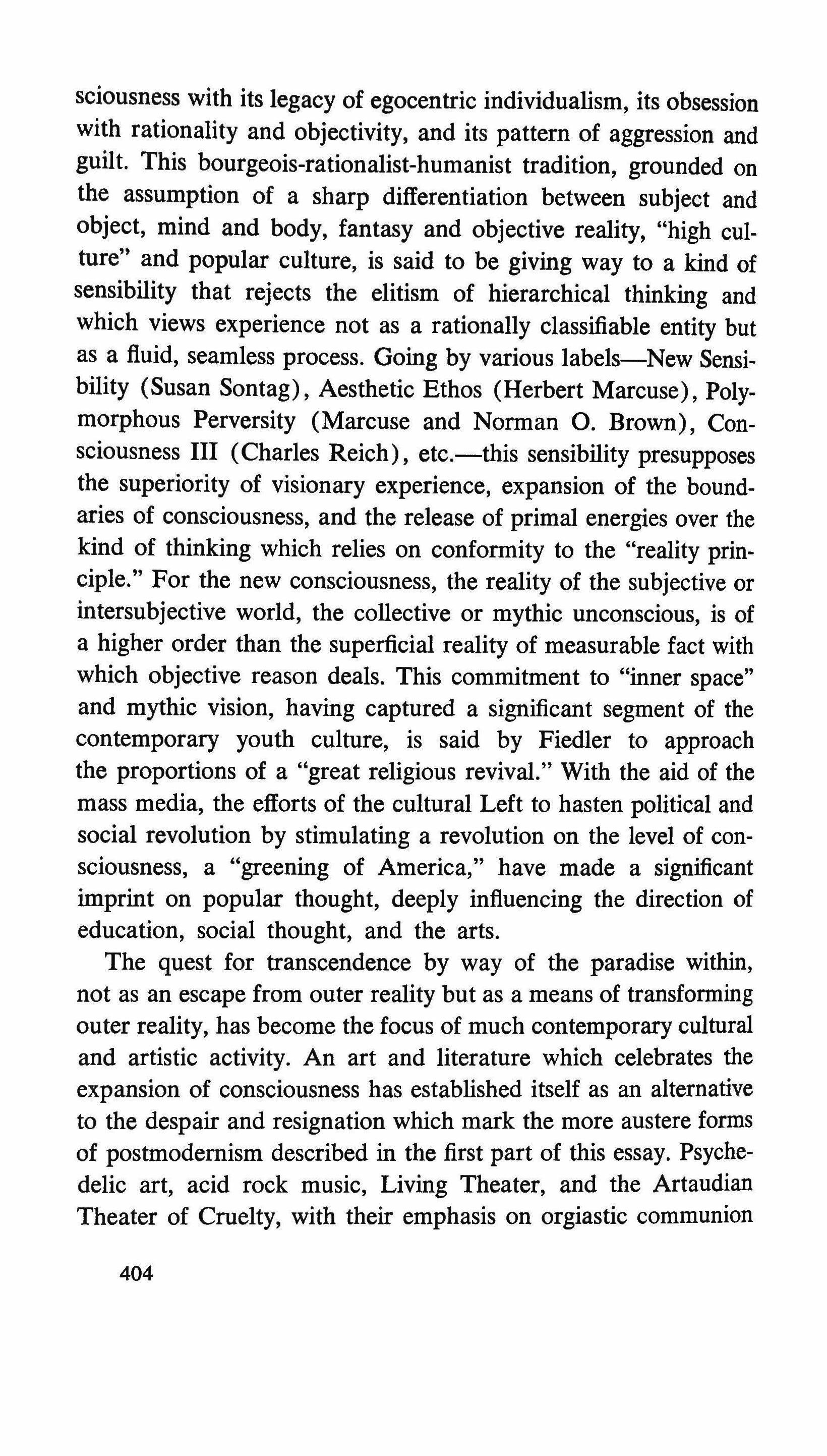
sciousness with its legacy of egocentric individualism, its obsession with rationality and objectivity, and its pattern of aggression and guilt. This bourgeois-rationalist-humanist tradition, grounded on the assumption of a sharp differentiation between subject and object, mind and body, fantasy and objective reality, "high culture" and popular culture, is said to be giving way to a kind of sensibility that rejects the elitism of hierarchical thinking and which views experience not as a rationally classifiable entity but as a fluid, seamless process. Going by various labels-New Sensibility (Susan Sontag), Aesthetic Ethos (Herbert Marcuse), Polymorphous Perversity (Marcuse and Norman O. Brown), Consciousness III (Charles Reich), etc.-this sensibility presupposes the superiority of visionary experience, expansion of the boundaries of consciousness, and the release of primal energies over the kind of thinking which relies on conformity to the "reality principle." For the new consciousness, the reality of the subjective or intersubjective world, the collective or mythic unconscious, is of a higher order than the superficial reality of measurable fact with which objective reason deals. This commitment to "inner space" and mythic vision, having captured a significant segment of the contemporary youth culture, is said by Fiedler to approach the proportions of a "great religious revival." With the aid of the mass media, the efforts of the cultural Left to hasten political and social revolution by stimulating a revolution on the level of consciousness, a "greening of America," have made a significant imprint on popular thought, deeply influencing the direction of education, social thought, and the arts.
The quest for transcendence by way of the paradise within, not as an escape from outer reality but as a means of transforming outer reality, has become the focus of much contemporary cultural and artistic activity. An art and literature which celebrates the expansion of consciousness has established itself as an alternative to the despair and resignation which mark the more austere forms of postmodernism described in the first part of this essay. Psychedelic art, acid rock music, Living Theater, and the Artaudian Theater of Cruelty, with their emphasis on orgiastic communion
404
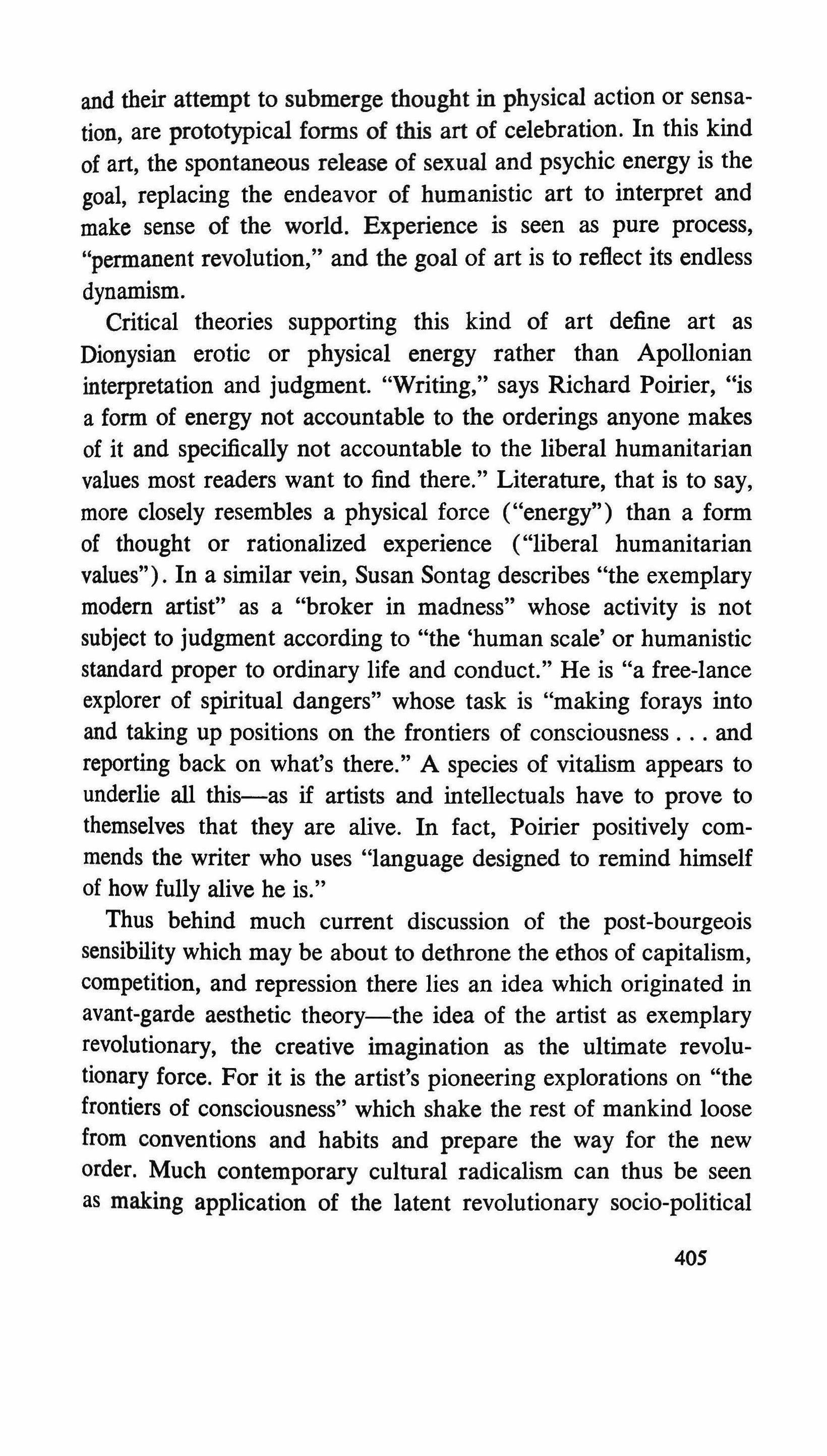
and their attempt to submerge thought in physical action or sensation, are prototypical forms of this art of celebration. In this kind of art, the spontaneous release of sexual and psychic energy is the goal, replacing the endeavor of humanistic art to interpret and make sense of the world. Experience is seen as pure process, "permanent revolution," and the goal of art is to reflect its endless dynamism.
Critical theories supporting this kind of art define art as Dionysian erotic or physical energy rather than Apollonian interpretation and judgment. "Writing," says Richard Poirier, "is a form of energy not accountable to the orderings anyone makes of it and specifically not accountable to the liberal humanitarian values most readers want to find there." Literature, that is to say, more closely resembles a physical force ("energy") than a form of thought or rationalized experience ("liberal humanitarian values"). In a similar vein, Susan Sontag describes "the exemplary modem artist" as a "broker in madness" whose activity is not subject to judgment according to "the 'human scale' or humanistic standard proper to ordinary life and conduct." He is "a free-lance explorer of spiritual dangers" whose task is "making forays into and taking up positions on the frontiers of consciousness and reporting back on what's there." A species of vitalism appears to underlie all this-as if artists and intellectuals have to prove to themselves that they are alive. In fact, Poirier positively commends the writer who uses "language designed to remind himself of how fully alive he is."
Thus behind much current discussion of the post-bourgeois sensibility which may be about to dethrone the ethos of capitalism, competition, and repression there lies an idea which originated in avant-garde aesthetic theory-the idea of the artist as exemplary revolutionary, the creative imagination as the ultimate revolutionary force. For it is the artist's pioneering explorations on "the frontiers of consciousness" which shake the rest of mankind loose from conventions and habits and prepare the way for the new order. Much contemporary cultural radicalism can thus be seen as making application of the latent revolutionary socio-political 405

content of a certain kind of aesthetics to contemporary society. If art is seen as a kind of autonomous myth, something that turns its back on objective reality and reason, then art represents the essential form of liberated, anti-bourgeois sensibility. Insofar as art refuses to comply with the expectation that it hold the mirror up to nature and present a criticism of life, it has to that degree helped to frustrate and weaken the epistemological realism upon which bourgeois culture is based. The humanistic aesthetic, subjugating art to the extra-aesthetic objective reality which it is supposed to imitate, enslaves the imagination to the order of probable cause and effect. The all but axiomatic opposition in modem aesthetics between discursive and expressive meaning, between language as communicative sign vs. language as infrareferential symbol, comes to correspond to the political distinction between human liberation and enslavement to a tyrannical social order. The work of art, an autonomous universe of pure possibility unchained to the empirical or the normative orders, exemplifies the realm of freedom against that of necessity.
Paradoxically, it is an ostensibly hermetic and conservative concept of art" which underlies this radical aesthetic. In earlier romantic and modernist art, the visionary aesthetic was often used to justify a withdrawal into the privileged sanctuary of high art, a fastidious disengagement from mass society. Earlier formalist movements, e.g., the French Symbolists, the English Decadents, T. S. Eliot, .Ezra Pound, T. E. Hulme, had associated themselves with conservative social attitudes. The conservatism of these writers, however, came out of a deep distrust of bourgeois industrialism and capitalism. Moreover, the "traditions" to which these writers sometimes appealed were defined in mythic terms, that is, as a timeless unconscious archetype which opposed the rational consciousness and consecutive logic of modem bourgeois culture. (Eliot's concept of tradition, sometimes mistakenly identified with classical and Renaissance precedents, is in fact of this modernist, anti-rationalist stamp.) The current adaptation of formalist aesthetic ideas for revolutionary goals thus exploits the hostility to bourgeois rationalism already latent in conservative
406

formalism. Though critics like Sontag, Poirier, and Richard Gilman condemn as a "confusion of realms" efforts to make art an instrument of political purposes, their view of the artistic use of the imagination is identical to that expounded by Herbert Marcuse in An Essay on Liberation, who sees the "aesthetic ethos" as the prototype of the revolutionary consciousness.
The kind of aesthetics in question, of course, would hardly qualify as radical in the sense associated with programmatic Leftist politics. As Fiedler observes, the radicalism of the new sensibility is antithetical to that of conventional Marxism, the Marxists being "last ditch defenders of rationality, intrinsically hostile to an age of myth and passion, fantasy and sentimentality." Indeed, some of the attitudes expressed by radical artists appear downright conservative. John Cage's work, for instance, expresses uncritical approval of the status quo and hostility to doctrinaire revolutionary ideology. Such an attitude qualifies as radical, however, in the sense relevant here: it is predicated on the glorification of a form of undifferentiated, mythic consciousness which is valued insofar as it is subversive of rational categorization. Moreover, Cage's acquiescence to things as they are presupposes that they are presently to be transformed by the dynamics of history and technological development without necessitating exertions of human will.
Radical critics attempt to discredit objective consciousness by showing its essentially historical and contingent character. Objective thought, they argue, far from being the climax of man's struggle, is at best a stage in the evolution of consciousness preparatory to the culminating stage of reunification of sensibility. At worst, objective consciousness is a delusive and dangerous historical myth that has rationalized the interests of class and power and inflicted incalculable destruction in the form of military and economic aggression and psychic repression. Thus Susan Sontag cites "the damage that Western 'Faustian' man, with his idealism, his magnificent art, his sense of intellectual adventure, his world-devouring energies for conquest, has already done, and further threatens to do." In a similar vein, Richard Gilman asserts 407
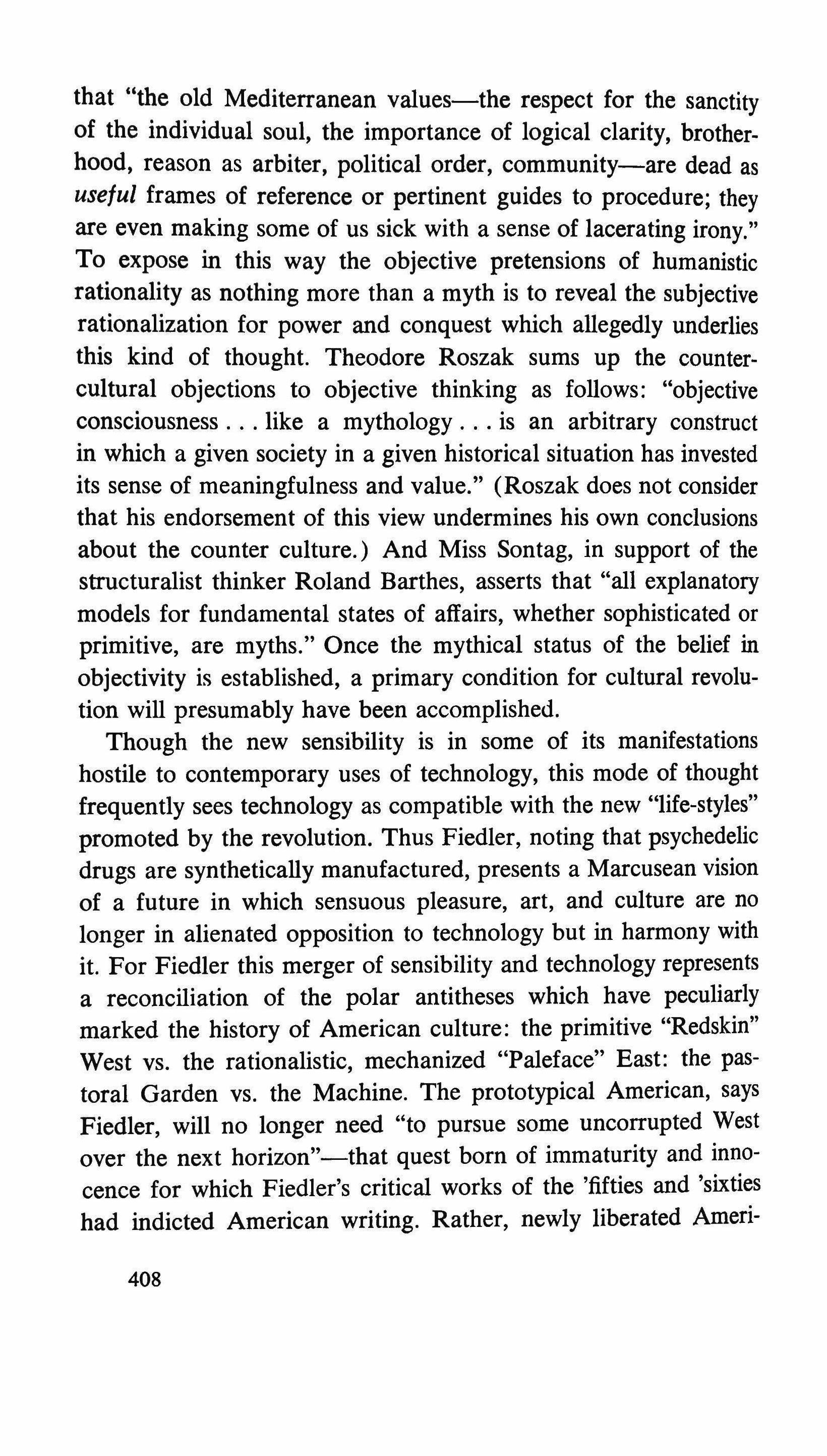
that "the old Mediterranean values-the respect for the sanctity of the individual soul, the importance of logical clarity, brotherhood, reason as arbiter, political order, community-are dead as useful frames of reference or pertinent guides to procedure; they are even making some of us sick with a sense of lacerating irony." To expose in this way the objective pretensions of humanistic rationality as nothing more than a myth is to reveal the subjective rationalization for power and conquest which allegedly underlies this kind of thought. Theodore Roszak sums up the countercultural objections to objective thinking as follows: "objective consciousness like a mythology is an arbitrary construct in which a given society in a given historical situation has invested its sense of meaningfulness and value." (Roszak does not consider that his endorsement of this view undermines his own conclusions about the counter culture.) And Miss Sontag, in support of the structuralist thinker Roland Barthes, asserts that "all explanatory models for fundamental states of affairs, whether sophisticated or primitive, are myths." Once the mythical status of the belief in objectivity is established, a primary condition for cultural revolution will presumably have been accomplished. Though the new sensibility is in some of its manifestations hostile to contemporary uses of technology, this mode of thought frequently sees technology as compatible with the new "life-styles" promoted by the revolution. Thus Fiedler, noting that psychedelic drugs are synthetically manufactured, presents a Marcusean vision of a future in which sensuous pleasure, art, and culture are no longer in alienated opposition to technology but in harmony with it. For Fiedler this merger of sensibility and technology represents a reconciliation of the polar antitheses which have peculiarly marked the history of American culture: the primitive "Redskin" West vs. the rationalistic, mechanized "Paleface" East: the pastoral Garden vs. the Machine. The prototypical American, says Fiedler, will no longer need "to pursue some uncorrupted West over the next horizon"-that quest born of immaturity and innocence for which Fiedler's critical works of the 'fifties and 'sixties had indicted American writing. Rather, newly liberated Ameri-
408

cans in the post-humanist society will "make a thousand little Wests in the interstices of a machine civilization on its steel and concrete back," living "the tribal life among and with the support of machines." The goal, then, of cultural revolution becomes not the destruction of technology but its reorientation away from the rationalist ethos and toward the goals of vision and organic consciousness.
A frequent target of radical attack has been the humanities establishment in the universities, held up as typical of the repressive rationalism and elitism which on a larger scale pervades American society as a whole. Susan Sontag's polemics against interpretation and the charges of mandarin Arnoldian traditionalism leveled by such critics as Fiedler, Poirier, and Louis Kampf illustrate the tendency of this kind of criticism to insinuate that the chief ills of modern humanities scholarship, criticism, and teaching lie in their traditionalism, their resistance to innovation, their excessive intellectualism, and their refusal to abandon rigidly defined, patrician canons of artistic taste. According to Fiedler, for example, contemporary criticism has yet to free itself from the hierarchical standards established by the New Critics of the 'forties and 'fifties, which Fiedler characterizes as "the finicky canons of the genteel tradition and the culture religion of modernism, from which Eliot thought he had escaped-but to which, in fact, he only succeeded in giving a High Anglican tone." Fiedler calls for a new criticism appropriate to the postmodernist view of reality, a criticism more eclectic, subjective, and whimsical in its approach, viewing the literary "text" not as an objective entity to be analyzed but as a fluid nexus of possibilities to be experienced, something which merges with the subjective associations of the critic.
It should be clear from the preceding sketch that the radical position we have been examining tends to reduce all cultural issues, whether literary or social, to the same basic dialectic in which nonrational energy opposes repressive rationalism and traditionalism. This kind of analysis seems to me vulnerable in several respects. To define the repressive nature of contemporary
409

establishments in this way is to misunderstand the relationship between power and intellectual culture. Unlike the situation in commercial, craft, and agrarian societies, social authority and political and economic power in advanced industrial society are relatively independent of intellectual culture. Whereas power and authority once depended on at least the theoretical sanction of moral and intellectual institutions-the church, the arts, the humanistic branches of education-modern authority is increasingly capable of operating without such sanctions. Manipulating opinion by means of the mass media, or, where that is not practicable, simply ignoring questions of principle, modern forms of power do not need to claim to be legitimized by a world-view or a set of values derived from intellectual culture. Whereas power once justified itself in terms of a single, culturally received interpretation of experience, modern power operates within a culture of radical ideological dissonance; pluralism-as opposed to any traditional absolutist dogma-is the reigning philosophy of the establishment.
Of course modern technological society can scarcely be termed pluralistic with reference to its distribution of wealth and power, but it is highly pluralistic in matters of ideology and style. In this area, modern society is restless, obsessed with novelty, and tolerant of any innovation so long as it does not threaten to disturb the objective distribution of power. Far from representing the last vestiges of tradition, corporate-technological society is hostile to tradition and to the fixity of traditional standards, which are seen as inhibiting growth and progress. As J. H. Plumb observes in The Death of the Past, "Industrial society does not need the past. Its intellectual and emotional orientation is toward change rather than conservation, toward exploitation and consumption. The new methods, new processes, new forms of living of scientific and industrial society have no sanction in the past and no roots in it. The past becomes, therefore, a matter of curiosity, of nostalgia, a sentimentality." It is precisely its freedom from any inherited ideological principles which makes it so easy for corporate-technological society to co-opt the ideologies and styles
410

of cultural and artistic revolutionaries and to exploit them for material profit.
The theory of the excessively "rational" character of modem establishments proves no less misleading when submitted to examination. In corporate-technological society, processes of production, distribution, and consumption tend to become autonomous, justifying themselves with reference to mere growth and efficiency and expelling considerations of extrinsic social and moral utility. Bureaucratic institutions tend to follow no rationale beyond that of their self-perpetuation and expansion and no values beyond quantitative production and technical efficiency. In short, the type of "rationality" in which this kind of society specializes is a purely functional or instrumental rationality, that is, a rationality devoted to expediting goals which have not themselves been rationally determined and are not subjected to rational criticism. It is this trivial, dehumanized rationality which cultural radicals take to be the essence of the rational consciousness they condemn. In this faulty analysis, reason, once assumed to be man's chief remedy for human alienation, comes to be seen as one of the chief causes of alienation. This misleading diagnosis of the disease of modem culture as a "hypertrophy of the intellect," to quote Susan Sontag's phrase, inevitably results in the proliferation of quixotically antirationalistic cures for cultural ills.
When we tum to the situation in the humanities and the university departments of literature, we find numerous parallels with the conditions just described in the larger corporate-technological society. It is a commonplace that humanistic studies have enjoyed marked advances in the present century in methodological sophistication and quantitative production. It was such advances that led Randall Jarrell, in a well-known essay several years ago, to label the age an "age of criticism." Jarrell's essay anticipated the feeling of fatigue and disillusionment which many had begun to feel and which has since intensified toward the rationalistic, systematic analysis of art. But such labels as Jarrell's are misleading when they are taken to suggest that criticism in the twentieth century has become more genuinely rational in the sense of being 411

more aware of its aims and goals. As criticism has proliferated and its methodologies have become ever more systematic and flexible, there has been no concomitant advance in relation to the more central questions of what art and literature and the study of them are for-what they aim to accomplish. On the contrary, advances on the instrumental level have been accompanied by an increasing incoherence and confusion on the level of substance-a development which parallels the course of the larger corporate-technological society. As criticism has advanced in methodological rationality there has been a corresponding erosion regarding the collective sense of the rationale of literary study. The demoralization which has resulted from this in the teaching of literature can scarcely be estimated.
With the deterioration of coherence in the rationale of the humanities, humanistic studies in the universities have largely abandoned the traditional goals of humane education and succumbed to the general bureaucratization and technicization of education which has absorbed the university as a whole. In the modern university, bureaucratic administration increasingly replaces philosophical ideas and values as the central "meaning" of the university, a development which ideological pluralism enormously intensifies; since no world-view or theory held within the university has the authority to speak for the whole, the whole becomes so diffuse, fragmented, and incoherent that only the mechanics of administration remain as a binding force. The pluralism of the university as a whole is echoed within each of its departments. In literary studies, pluralism manifests itself in the gentleman's agreement that all critical "approaches," and, by inference, all assumptions about the nature of literature, are potentially valid. The triumph of pluralism is usually heralded as a great victory for free inquiry and in part justifiably so. But it is a truth which has been too often misused to evade questions of definition. By impartially sanctioning a plurality of goals, purposes, and methods as valid objects of humanistic activity, the humanities have protected themselves from having to define their
412
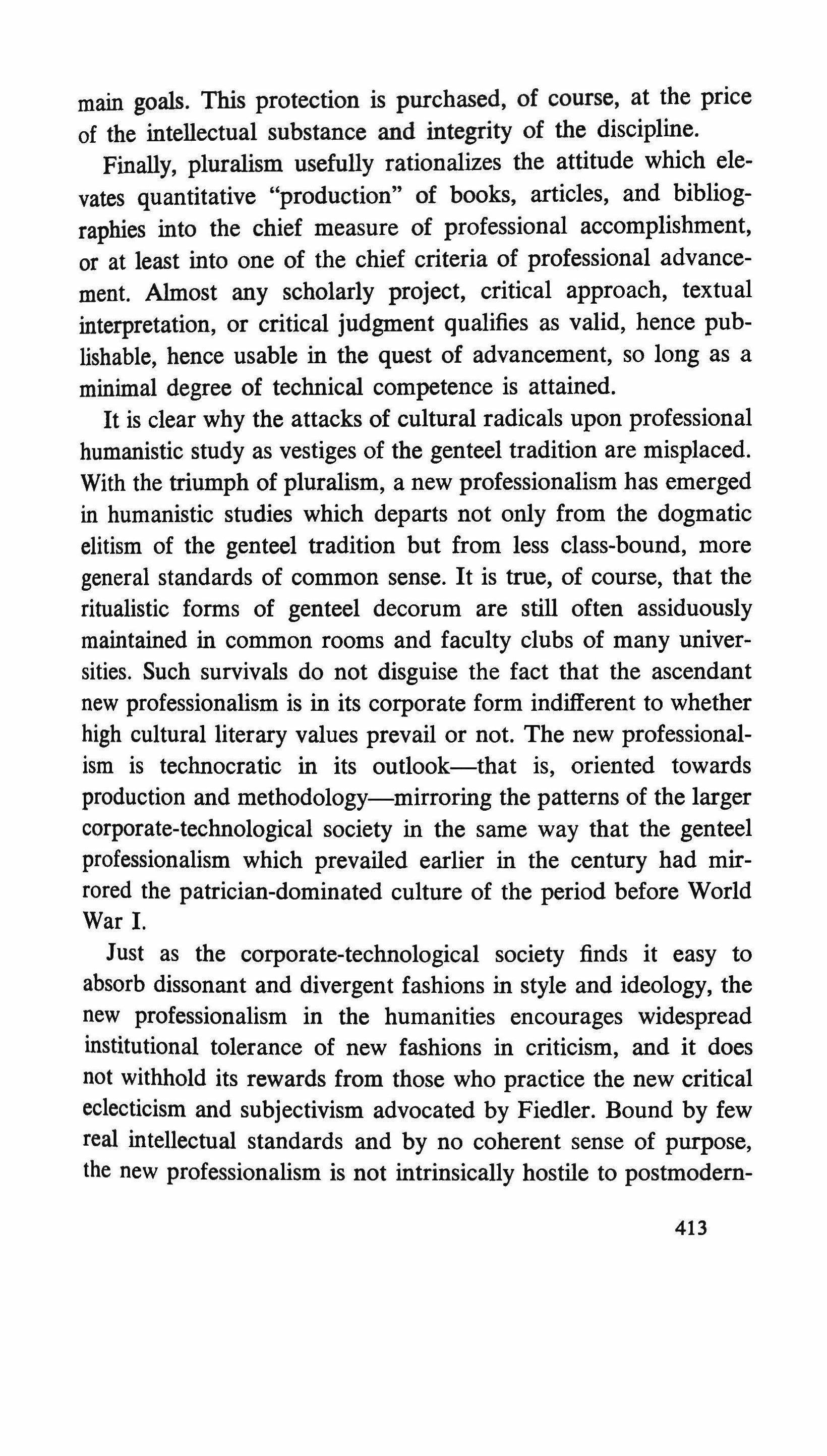
main goals. This protection is purchased, of course, at the price of the intellectual substance and integrity of the discipline.
Finally, pluralism usefully rationalizes the attitude which elevates quantitative "production" of books, articles, and bibliographies into the chief measure of professional accomplishment, or at least into one of the chief criteria of professional advancement. Almost any scholarly project, critical approach, textual interpretation, or critical judgment qualifies as valid, hence publishable, hence usable in the quest of advancement, so long as a minimal degree of technical competence is attained.
It is clear why the attacks of cultural radicals upon professional humanistic study as vestiges of the genteel tradition are misplaced. With the triumph of pluralism, a new professionalism has emerged in humanistic studies which departs not only from the dogmatic elitism of the genteel tradition but from less class-bound, more general standards of common sense. It is true, of course, that the ritualistic forms of genteel decorum are still often assiduously maintained in common rooms and faculty clubs of many universities. Such survivals do not disguise the fact that the ascendant new professionalism is in its corporate form indifferent to whether high cultural literary values prevail or not. The new professionalism is technocratic in its outlook-that is, oriented towards production and methodology-mirroring the patterns of the larger corporate-technological society in the same way that the genteel professionalism which prevailed earlier in the century had mirrored the patrician-dominated culture of the period before World War I.
Just as the corporate-technological society finds it easy to absorb dissonant and divergent fashions in style and ideology, the new professionalism in the humanities encourages widespread institutional tolerance of new fashions in criticism, and it does not withhold its rewards from those who practice the new critical eclecticism and SUbjectivism advocated by Fiedler. Bound by few real intellectual standards and by no coherent sense of purpose, the new professionalism is not intrinsically hostile to postmodern-
413

ist anti-rationalism and other revolutionary styles in literature and culture. Indeed, courses exploiting this kind of subject matter have become one of the chief means by which universities now lure students and tuition. In the scholarly and critical journals, critical approaches ranging from modestly "far out" to radically "hip" are not unwelcome. It may be supposed that the new professionalism will depend more and more on such new critical fashions in order to fill its ever more demanding production quotas.
In recommending an eclectic, subjectivistic approach to criticism based on an open, indeterminate conception of the literary text, Fiedler fails to notice that something answering to this description has been institutionalized for some time. Theories of the inexhaustible ambiguity and "polysemous meaning" of literary texts have popularized the view that these texts have no determinate meaning, that their meaning is a function of the speculation brought to them by readers and critics. This theory of interpretation in an extreme form has been promoted by Northrop Frye, among others, who asserts that "all literary works without exception" are "like a picnic to which the author brings the words and the reader the meaning." Though not subjectivistic in its intent, Frye's view points clearly in that direction in its implications (conflicting oddly with Frye's aim of establishing a scientific basis for criticism). As Frederic Crews points out, the assumption governing Frye's theories is that "each critic is free to adopt the 'approach' that suits his fancy, and most of the approaches prove to be little more than analogical vocabularies lending an air of exactitude to whatever the critic feels like discussing What does it matter whether we call ourselves Thomists or Aristotelians or phenomenologists, provided we don't take our method too solemnly or show impatience with our neighbor's?"
Influenced by critics such as Frye, Fiedler, and the "radical historicists" whom E. D. Hirsch attacked in his book, Validity in Interpretation, many now conceive interpretation as the application to the text of "analogical vocabularies," myths reflecting the interests of the interpreter but having no more determinate rela-
414

tion to the text than any alternate set of myths. In acceding to this prestigious view, the new professionalism in literary study makes its accommodation, in its own way, with the postmodernist view of the indeterminacy of truth, the impossibility of an objective point of view. Moreover, this open-ended conception of interpretation, by relaxing the rules of evidence and inference which formerly inhibited free critical improvisation, proves highly congenial to the production demands of the new professionalism. In humanistic culture and in the larger society, the condition is the same. The establishment has renounced humanistic standards, and its rationality turns out on inspection to be a pseudo-rationality. Hence the conception of revolution sponsored by cultural revolutionaries, consisting of a release of nonrational energies and a violent break from the humanistic tradition, is bound to backfire and reinforce the powers it aims to subvert. This is but to say that the conception of cultural revolution favored by the avant-garde over the last century has come to a dead end. Advanced industrial society has outstripped the avant-garde by incorporating in its own form the avant-garde's main values-the worship of change, dynamic energy, and autonomous process, the contempt for tradition and critical norms. With the technocratic and bureaucratic transformation of the old bourgeois values into the values of the age of consumption, the arch antagonist against which the avant-garde revolted and against which it defined itself has all but disappeared. Yet cultural radicals continue to cling to the threadbare dialectic which opposes vital energy to the rigidities of reason and tradition, even though this way of conceiving revolution is irrelevant to a technological, consumptionoriented society. Those critics like Philip Rahv who compare the contemporary avant garde unfavorably with that of the earlier years of the century miss the point when they diagnose the problem as a case of the present generation's susceptibility to the attraction of "trendy" popularity, What such critics fail to realize is that the contemporary avant garde is operating according to the same general aesthetic and cultural principles which motivated their predecessors. What has changed is the situation, in partie-
415
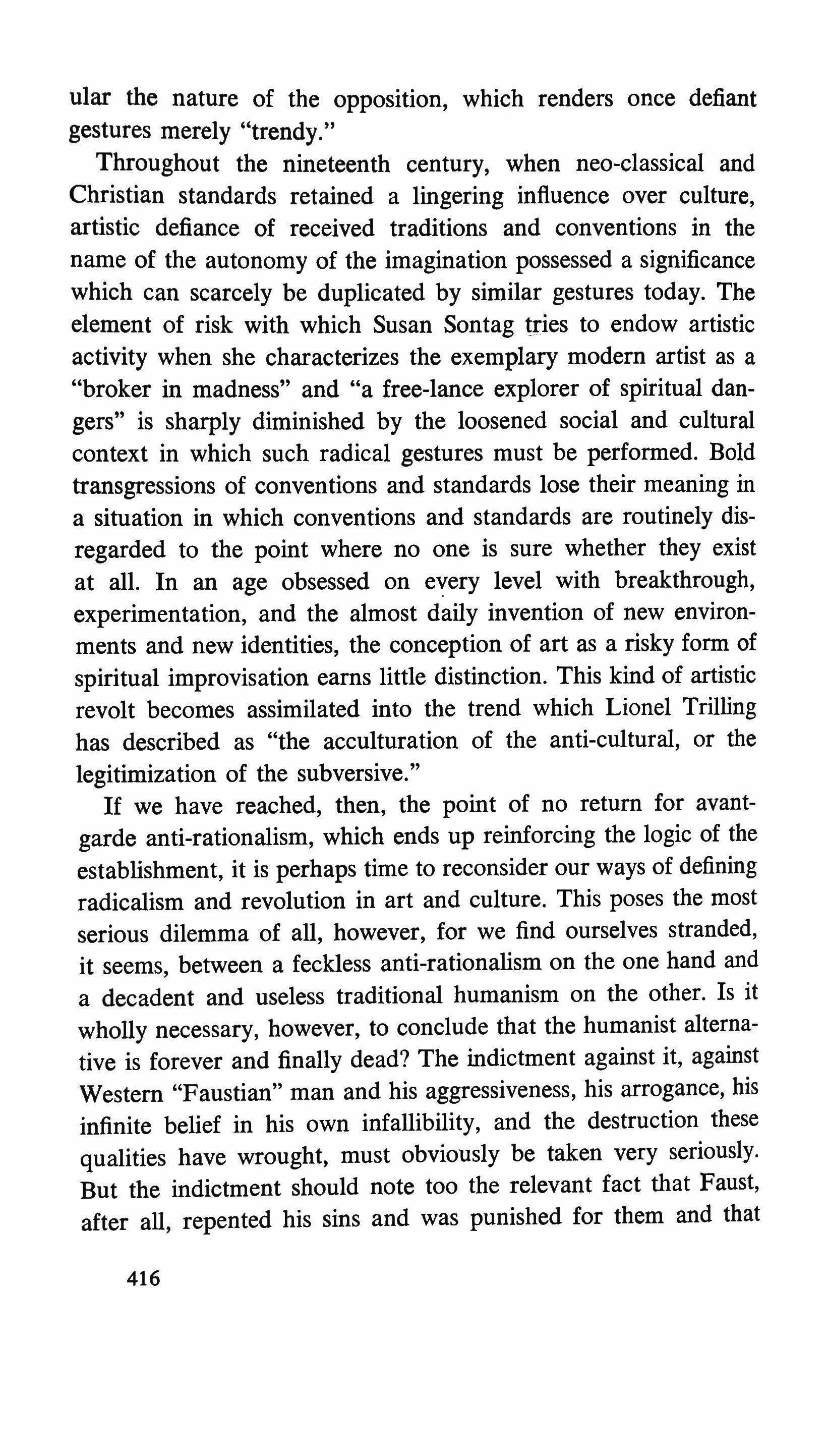
ular the nature of the opposition, which renders once defiant gestures merely "trendy."
Throughout the nineteenth century, when neo-classical and Christian standards retained a lingering influence over culture, artistic defiance of received traditions and conventions in the name of the autonomy of the imagination possessed a significance which can scarcely be duplicated by similar gestures today. The element of risk with which Susan Sontag tries to endow artistic activity when she characterizes the exemplary modern artist as a "broker in madness" and "a free-lance explorer of spiritual dangers" is sharply diminished by the loosened social and cultural context in which such radical gestures must be performed. Bold transgressions of conventions and standards lose their meaning in a situation in which conventions and standards are routinely disregarded to the point where no one is sure whether they exist at all. In an age obsessed on every level with breakthrough, experimentation, and the almost daily invention of new environments and new identities, the conception of art as a risky form of spiritual improvisation earns little distinction. This kind of artistic revolt becomes assimilated into the trend which Lionel Trilling has described as "the acculturation of the anti-cultural, or the legitimization of the subversive."
If we have reached, then, the point of no return for avantgarde anti-rationalism, which ends up reinforcing the logic of the establishment, it is perhaps time to reconsider our ways of defining radicalism and revolution in art and culture. This poses the most serious dilemma of all, however, for we find ourselves stranded, it seems, between a feckless anti-rationalism on the one hand and a decadent and useless traditional humanism on the other. Is it wholly necessary, however, to conclude that the humanist alternative is forever and finally dead? The indictment against it, against Western "Faustian" man and his aggressiveness, his arrogance, his infinite belief in his own infallibility, and the destruction these qualities have wrought, must obviously be taken very seriously. But the indictment should note too the relevant fact that Faust, after all, repented his sins and was punished for them and that
416
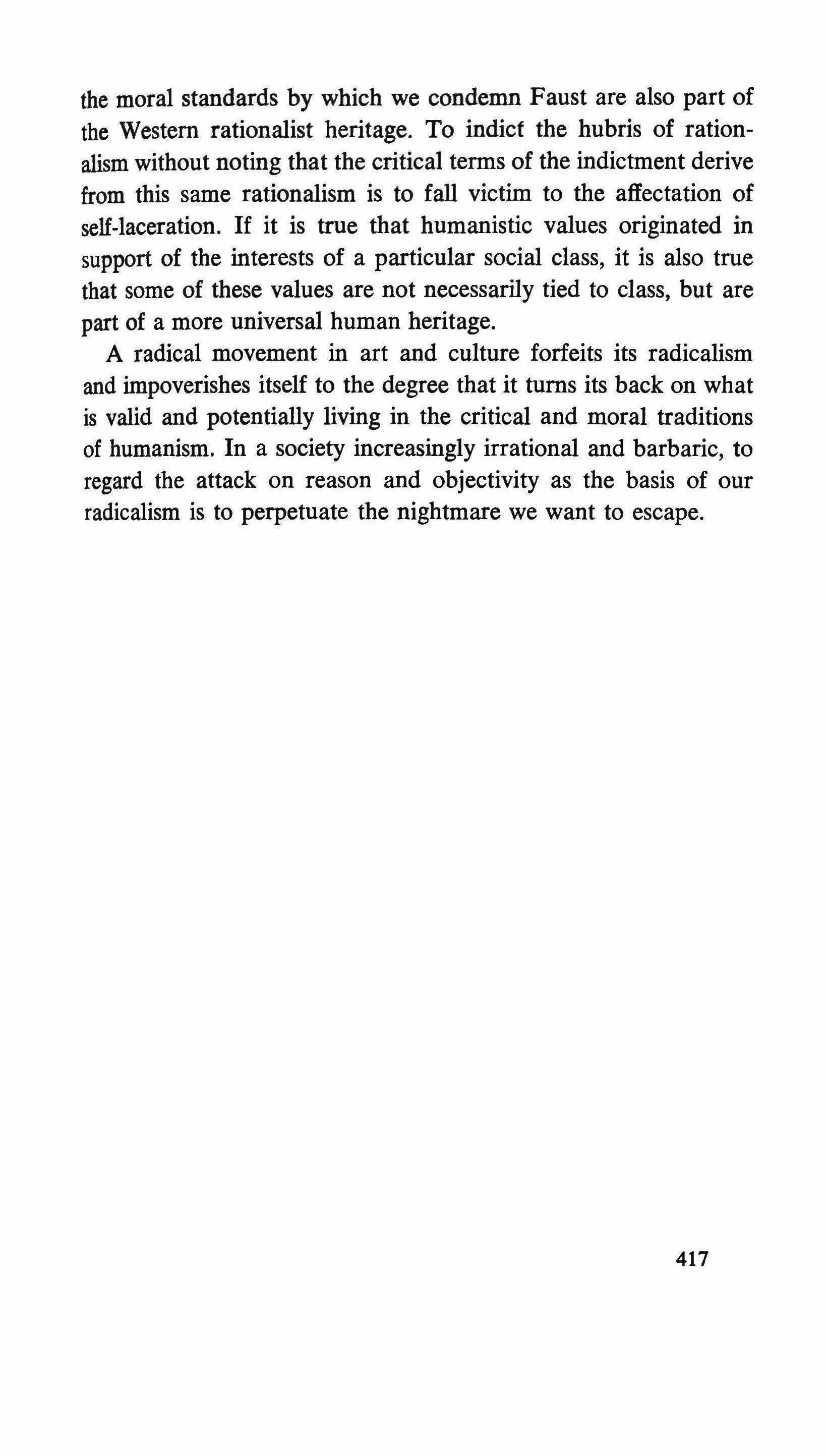
the moral standards by which we condemn Faust are also part of the Western rationalist heritage. To indict the hubris of rationalism without noting that the critical terms of the indictment derive from this same rationalism is to fall victim to the affectation of self-laceration. If it is true that humanistic values originated in support of the interests of a particular social class, it is also true that some of these values are not necessarily tied to class, but are part of a more universal human heritage.
A radical movement in art and culture forfeits its radicalism and impoverishes itself to the degree that it turns its back on what is valid and potentially living in the critical and moral traditions of humanism. In a society increasingly irrational and barbaric, to regard the attack on reason and objectivity as the basis of our radicalism is to perpetuate the nightmare we want to escape.
417

Contributors
ALVIN GREENBERG teaches English at Macalester College. His recent publications include a novel, Going Nowhere (Simon & Schuster), and a book of poems, The House of the Would-Be Gardener (New Rivers Press). JERRY BUMPUS has published his work in numerous literary magazines. His novel Anaconda is available from December magazine, Box 274, Western Springs, Illinois. WARREN FINE is the author of four books of fiction, the most recent of which is Their Family (Knopf). ROBERT COOVER's most recent publications are Pricksongs & Descants, a collection of short stories, and A Theological Position, a collection of plays, both of which were published by E. P. Dutton. His play The Kid is currently at the American Place Theater in New York City. A. B. PAULSON teaches at Dartmouth. "2" is his first published work. WALTER ABISH, author of a collection of poems, Duel Site (Tibor de Nagy), is at work on a book, The R in Godard, or the Invention of Living. He was born in China, where he spent his time digging tiny holes in bathroom walls. He later turned to writing. ALAIN ROBBEGRILLET lives in France. GERALD GRAFF lives in Evanston. He is the author of Poetic Statement and Critical Dogma (Northwestern University Press), a critique of modern poetic theorists. His essay, "A report on oxymoronism," appeared in TriQuarterly 18. W. B. SCOTT is Professor of Dramatic Literature at Northwestern University, and author of a large unpublished study of Bogdan Tomasevie, the Bosnian playwright and man-about-town. (It was the publication in 1934 of the three volumes of Tomasevie by the epic poet Radoslav Vukeic that precipitated the fierce student riots that year in Trebinje and other cities.)
RUSSELL EDSON's first two books are The Very Thing That Happens (New Directions) and What a Man Can See (The Jargon Society). The Childhood of an Equestrian (Harper & Row) and The Clam Theater (Wesleyan University Press) will appear this year. M. G. STEPHENS' novel, Season at Coole, was recently published by E. P. Dutton. He spent this past summer by the sea and wrote a novella, The Violent Heart of a Gentle Man.
PATRICK CAHILL lives in San Francisco where he is completing a second book of fiction-a trilogy of stories-and writing poetry. The excerpt from Harlequin's Numbers in this issue is his first published
418
work. STANLEY ELKIN's "The Making of Ashenden" will appear as part of a collection of novellas to be published by Random House in September of this year. His most recent book is The Dick Gibson Show (Random House).
ROBERT ONOPA's poetry has been appearing in little magazines since 1967. He is presently doing graduate work at Northwestern University.
JOYCE CAROL OATES's "Meredith Dawe" is from her novel Do with Me What You Will (a legal term), scheduled to be published this fall by Vanguard.
JONATHAN BAUMBACH has published two novels, A Man to Conjure With and What Comes Next, and a work of literary criticism, The Landscape of Nightmare (NYU Press). His stories, essays, and reviews have appeared in numerous national magazines. A forthcoming novel is called Reruns. THOMAS McGUANE mayor may not live in Key West, like he says. In any case he has recently been seen in Cleveland with Evangeline Bart, the filmmaker. According to Miss Bart, he is a moneyhungry anarchist who is enormously motivated by fear of old age and memories of disciplinary probation in school. PHILIP STEVICK teaches at Temple University and is the editor of the anthology of contemporary short fiction Anti-Story (Free Press). He has built a cabin in the woods, also a clavichord. HENRY H. ROTH's "Love Zap" is from a novel being written under contract to Simon & Schuster. He has published more than seventy short stories in a variety of literary magazines. Lillibulero Press will publish a chapbook of his stories this year. He has recently completed a novel called Poliakogg.
PATRICIA SOUTHGATE has published poems and stories in a number of literary magazines, including Evergreen Review and Paris Review, and has translated works by Albertine Sarrazin, Marguerite Duras, Bernard Clavel, and Jean Paul Sartre. Her translation of Jean Paul Aron's "The Office on Derision" appeared in TriQuarterly 4.
CHARLES NEWMAN's A Child's History of America will be published by Swallow this fall. JOE McBRIEN first went to sea with the Cunard Line in 1915. He has been a member of both British and American Merchant Marines. "New York to Nova Scotia, New Brunswick" is his first published work. ELWOOD H. SMITH's work was included in the recent 73rd Chicago and Vicinity Exhibition at the Art Institute of Chicago. He has just compJeted illustrating a children's book to be published by J. Phillip O'Hara.

419

Now available to libraries and subscribers.


































































































































































































































 W.B.S.
W.B.S.










































































































































































































